

Contributors:
Jonathan Williams
Eric Mottram
Jules Chametzky
Edward Keith Whittaker
Raymond Rosenthal
Anthony Burgess
Herbert Miller
Kay Boyle
ArnoKarlen
William O'Rourke
William M. Ryan
Adele Z. Silver
Donald J. Paquette
Gilbert Sorrentino
Ronald Johnson
Thomas Meyer
Guy Davenport
Josepbine Herbst
John Wain
Allen Tate
Paul Metcalf
Karl Shapiro
Hugh Kenner
IhabHassan
Frank Macshane
Fred Moramarco
Harold Billings
Kim Taylor
Robert Kelly
Arnold Gassan
Paul Carroll
August Derleth
Harold Rosenberg

Norman Holmes Pearson
Irving Rosenthal
Sid Chaplin CidCorman
Douglas Woolf
Edwin Seaver
Victor Weybright
James Laughlin
Theodore Wilentz Coburn Britton
Walter Lowenfels
James Broughton Muriel Rukeyser
Thomas Merton
Thomas McGrath
Joel Oppenheimer
Gus Blaisdell
Philip O'Connor
Gilbert Neiman
Jack Kerouac
Stanley Burnshaw
Christopher Middleton
Ronald Bayes
Philip Whalen
Anselm Hollo
Anthony Kerrigan
Frederick Eckmann
Keith Wilson
LarryEigner
Edward Dahlberg
R. B. Kitaj
AND OTHERS
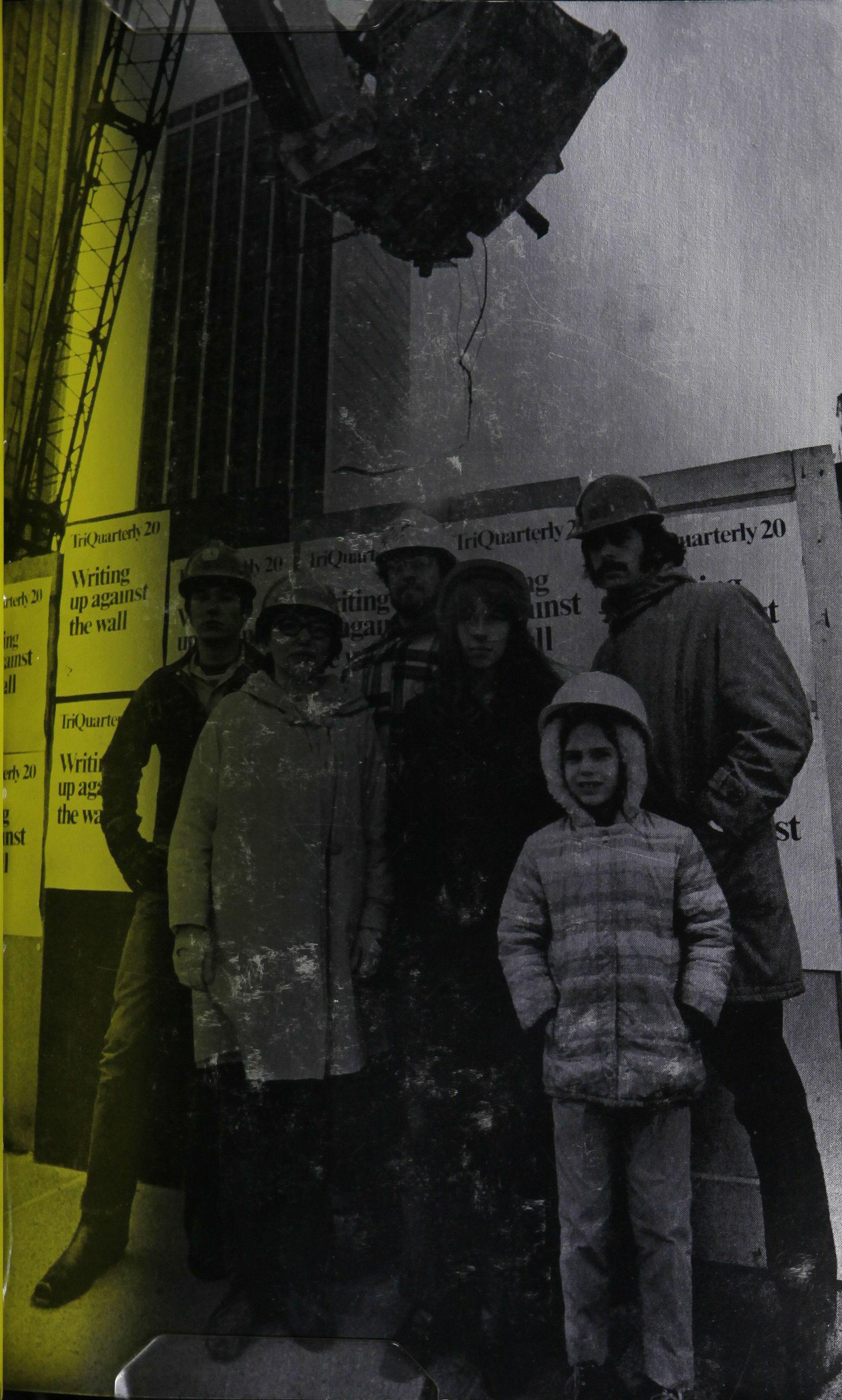

EDITOR
MANAGING EDITOR
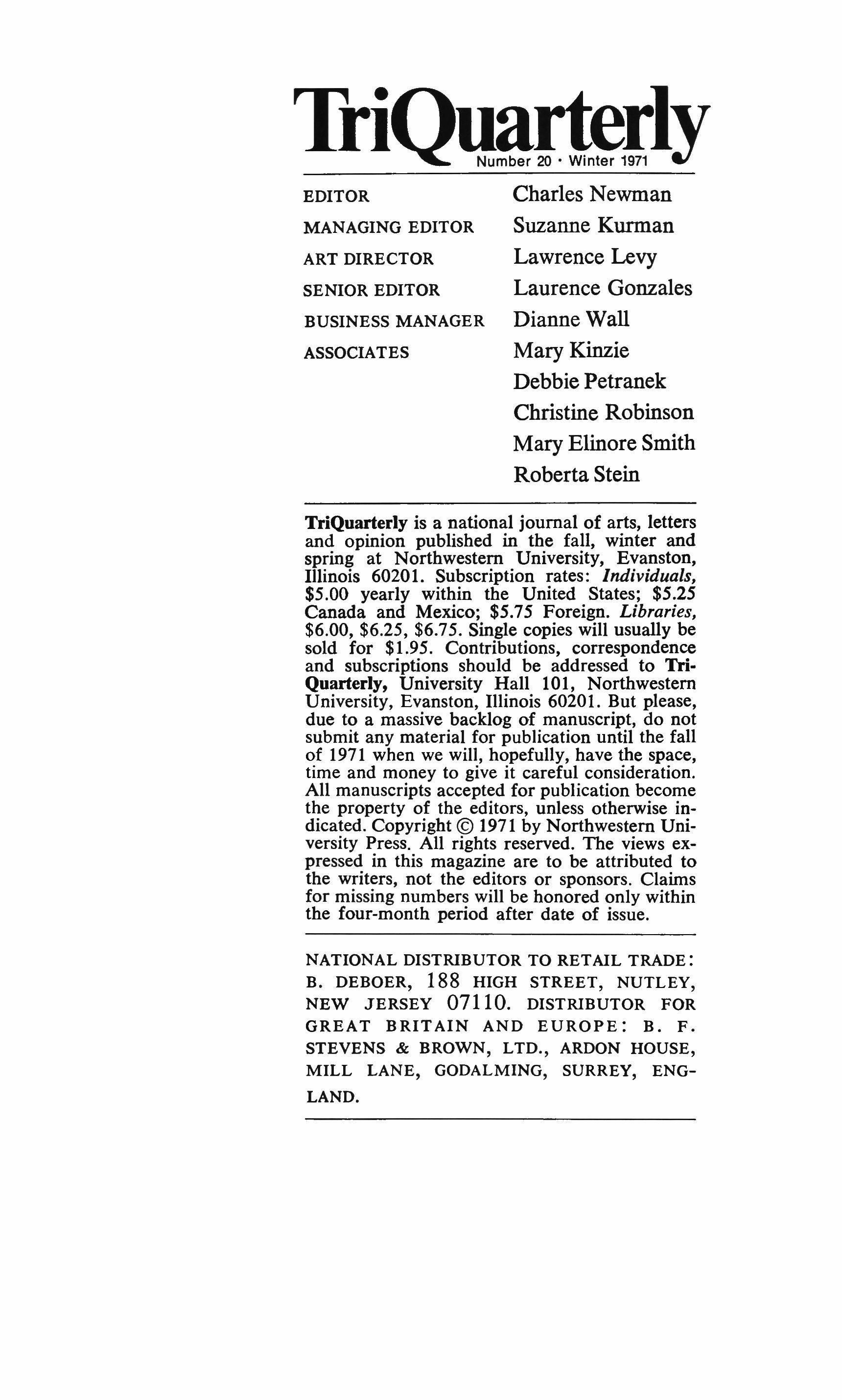
Charles Newman
Suzanne Kurman
ART DIRECTOR Lawrence Levy
SENIOR EDITOR Laurence Gonzales
BUSINESS MANAGER
ASSOCIATES
Dianne Wall
Mary Kinzie
Debbie Petranek
Christine Robinson
Mary Elinore Smith
Roberta Stein
TriQuarterly is a national journal of arts, letters and opinion published in the fall, winter and spring at Northwestern University, Evanston, Illinois 60201. Subscription rates: Individuals, $5.00 yearly within the United States; $5.25 Canada and Mexico; $5.75 Foreign. Libraries, $6.00, $6.25, $6.75. Single copies will usually be sold for $1.95. Contributions, correspondence and subscriptions should be addressed to TrlQuarterly, University Hall 101, Northwestern University, Evanston, Illinois 60201. But please, due to a massive backlog of manuscript, do not submit any material for publication until the fall of 1971 when we will, hopefully, have the space, time and money to give it careful consideration. All manuscripts accepted for publication become the property of the editors, unless otherwise indicated. Copyright © 1971 by Northwestern University Press. All rights reserved. The views expressed in this magazine are to be attributed to the writers, not the editors or sponsors. Claims for missing numbers will be honored only within the four-month period after date of issue.
NATIONAL DISTRIBUTOR TO RETAIL TRADE: B. DEBOER, 188 HIGH STREET, NUTLEY, NEW JERSEY 07110. DISTRIBUTOR FOR GREAT BRITAIN AND EUROPE: B. F. STEVENS & BROWN, LTD., ARDON HOUSE, MILL LANE, GODALMING, SURREY, ENGLAND.
Essays

J. M. G. LeCLEZIO
MAURICE MERLEAU-PONTY
EDWARDW. SAID
GEORGE STEINER
MICHEL BUTOR
TONY TANNER
MORSE PECKHAM
ANNE MANGEL
FERDINAND KRIWET
ALBERT J. GUERARD
E. M. CIORAN
CHARLES NEWMAN
The great city of literature translated by Richard Howard 5
The prose of the world translated and with an afterword by John O'Neill 9
Abecedarium culturae: structuralism, absence, writing 33
Linguistics & poetics 73
Painting words translated by Joy N. Humes 98
Necessary landscapes and luminous deteriorations: on Hawkes 145
The virtues of superficialty 180
Maxwell's demon, entropy, information: the crying of lot 49 194
Decomposition of the literary unit: Notes on visually perceptible literature translated by Ruth Koenig 209 Was Lia de Putti dead at 22? 255 from "The fall into time": The tree of life
On sickness, Skeptic & barbarian translated by Richard Howard 369
On Cioran 406
JOHN HAWKES
WILLIAM H. GASS
Fiction
from "The blood oranges" 113 from "The tunnel"
Why windows are important to me 285
JOYCE CAROL OATES
YVESVELAN

CAROL EMSHWILLER
HERBERT GOLD
RICHARD HOWARD
An American adventure 312 Je 328
translated by Stanley E. Gray Lib 344
Song of the first and last beatnik 352
Poetry
November, 1899 131
JACK ANDERSON Information 253
GARY MARGOLIS Injunction 253
LUCIEN STRYK
BOB RAINES
Letter to Jean-Paul Baudot, at Christmas 284
Epistemology love list 11 pm vision 308
SAPPHO 16, translated and with an afterword by John Frederick Nims 310
JOHN MATTHIAS
AIME CESAIRE
Three love songs for U.P.!' 325
The thunder's son 350 The wheel 351 translated by Michael Benedikt
Cover TriQuarterly staff photo by Jonas Dovydenas, headgear by Tony Adams
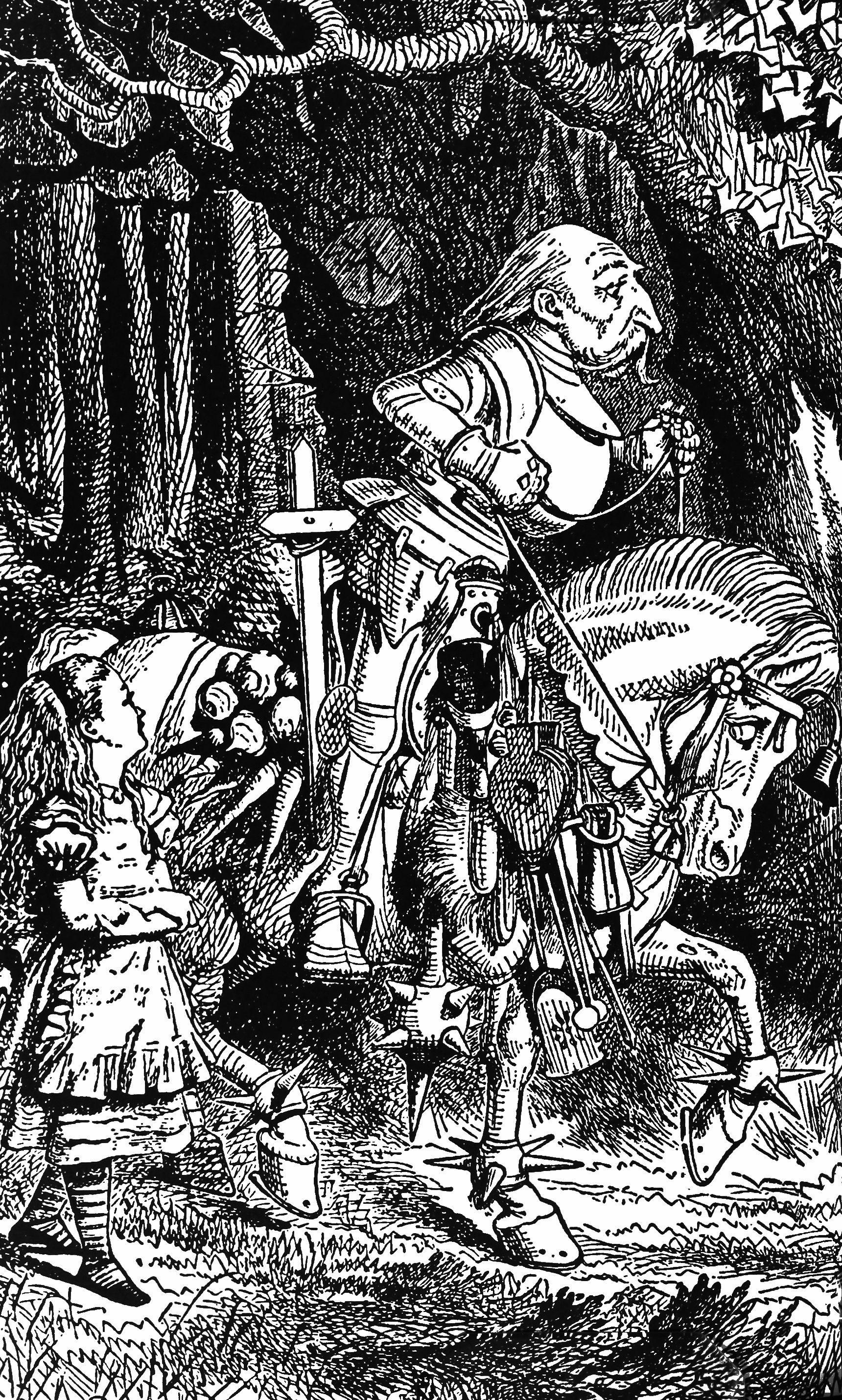
The great city of literature
J. M. G. LeCLEZIO
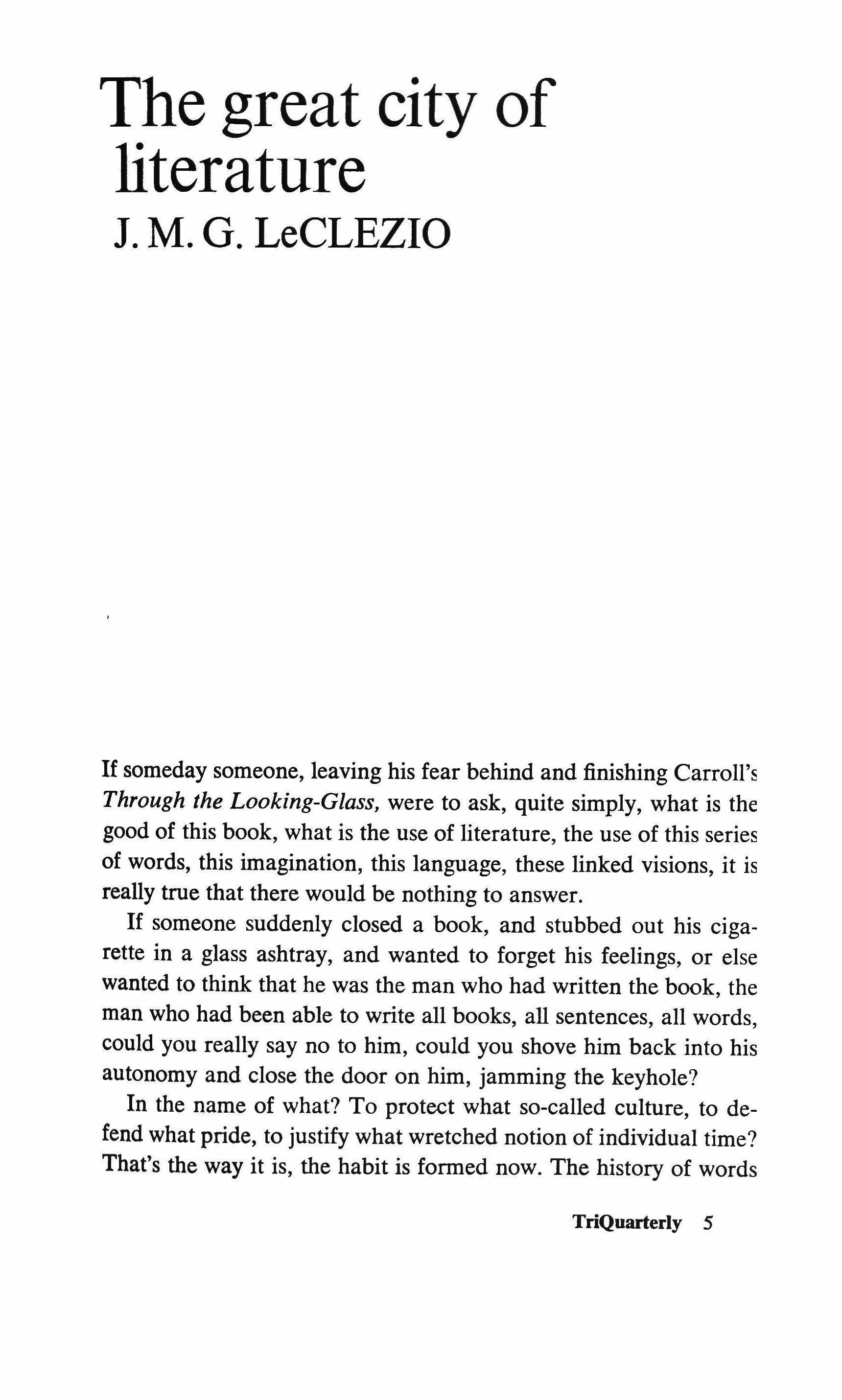
If someday someone, leaving his fear behind and finishing Carroll's Through the Looking-Glass, were to ask, quite simply, what is the good of this book, what is the use of literature, the use of this series of words, this imagination, this language, these linked visions, it is really true that there would be nothing to answer.
If someone suddenly closed a book, and stubbed out his cigarette in a glass ashtray, and wanted to forget his feelings, or else wanted to think that he was the man who had written the book, the man who had been able to write all books, all sentences, all words, could you really say no to him, could you shove him back into his autonomy and close the door on him, jamming the keyhole?
In the name of what? To protect what so-called culture, to defend what pride, to justify what wretched notion of individual time? That's the way it is, the habit is formed now. The history of words
TriQuarterJy 5
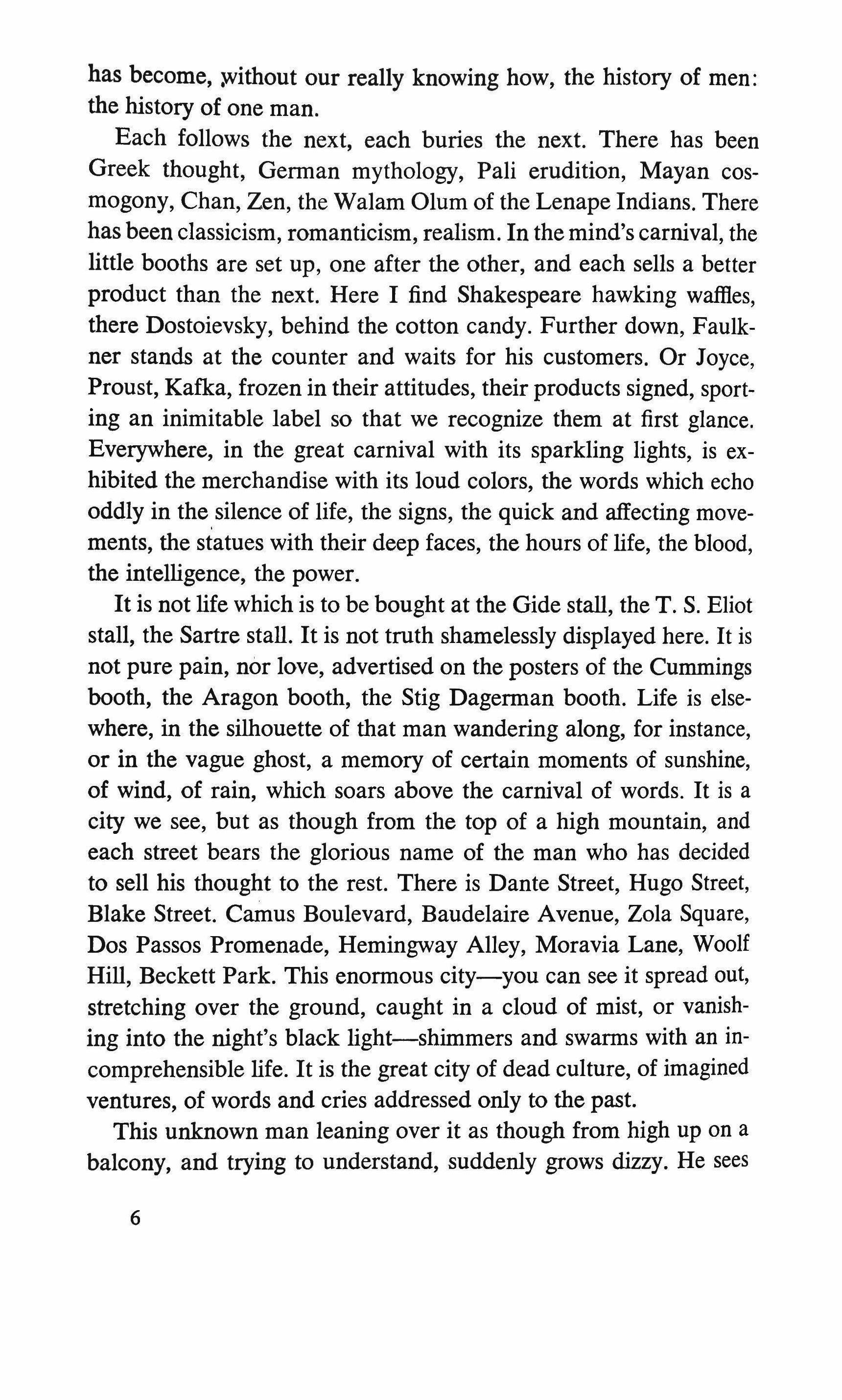
has become, without our really knowing how, the history of men: the history of one man.
Each follows the next, each buries the next. There has been Greek thought, German mythology, Pali erudition, Mayan cosmogony, Chan, Zen, the Walam Olum of the Lenape Indians. There has been classicism, romanticism, realism. In the mind's carnival, the little booths are set up, one after the other, and each sells a better product than the next. Here I find Shakespeare hawking waiHes, there Dostoievsky, behind the cotton candy. Further down, Faulkner stands at the counter and waits for his customers. Or Joyce, Proust, Kafka, frozen in their attitudes, their products signed, sporting an inimitable label so that we recognize them at first glance. Everywhere, in the great carnival with its sparkling lights, is exhibited the merchandise with its loud colors, the words which echo oddly in the,silence of life, the signs, the quick and affecting movements, the statues with their deep faces, the hours of life, the blood, the intelligence, the power.
It is not life which is to be bought at the Gide stall, the T. S. Eliot stall, the Sartre stall. It is not truth shamelessly displayed here. It is not pure pain, nor love, advertised on the posters of the Cummings booth, the Aragon booth, the Stig Dagerman booth. Life is elsewhere, in the silhouette of that man wandering along, for instance, or in the vague ghost, a memory of certain moments of sunshine, of wind, of rain, which soars above the carnival of words. It is a city we see, but as though from the top of a high mountain, and each street bears the glorious name of the man who has decided to sell his thought to the rest. There is Dante Street, Hugo Street, Blake Street. Camus Boulevard, Baudelaire Avenue, Zola Square, Dos Passos Promenade, Hemingway Alley, Moravia Lane, Woolf Hill, Beckett Park. This enormous city-you can see it spread out, stretching over the ground, caught in a cloud of mist, or vanishing into the night's black light-shimmers and swarms with an incomprehensible life. It is the great city of dead culture, of imagined ventures, of words and cries addressed only to the past.
This unknown man leaning over it as though from high up on a balcony, and trying to understand, suddenly grows dizzy. He sees
6
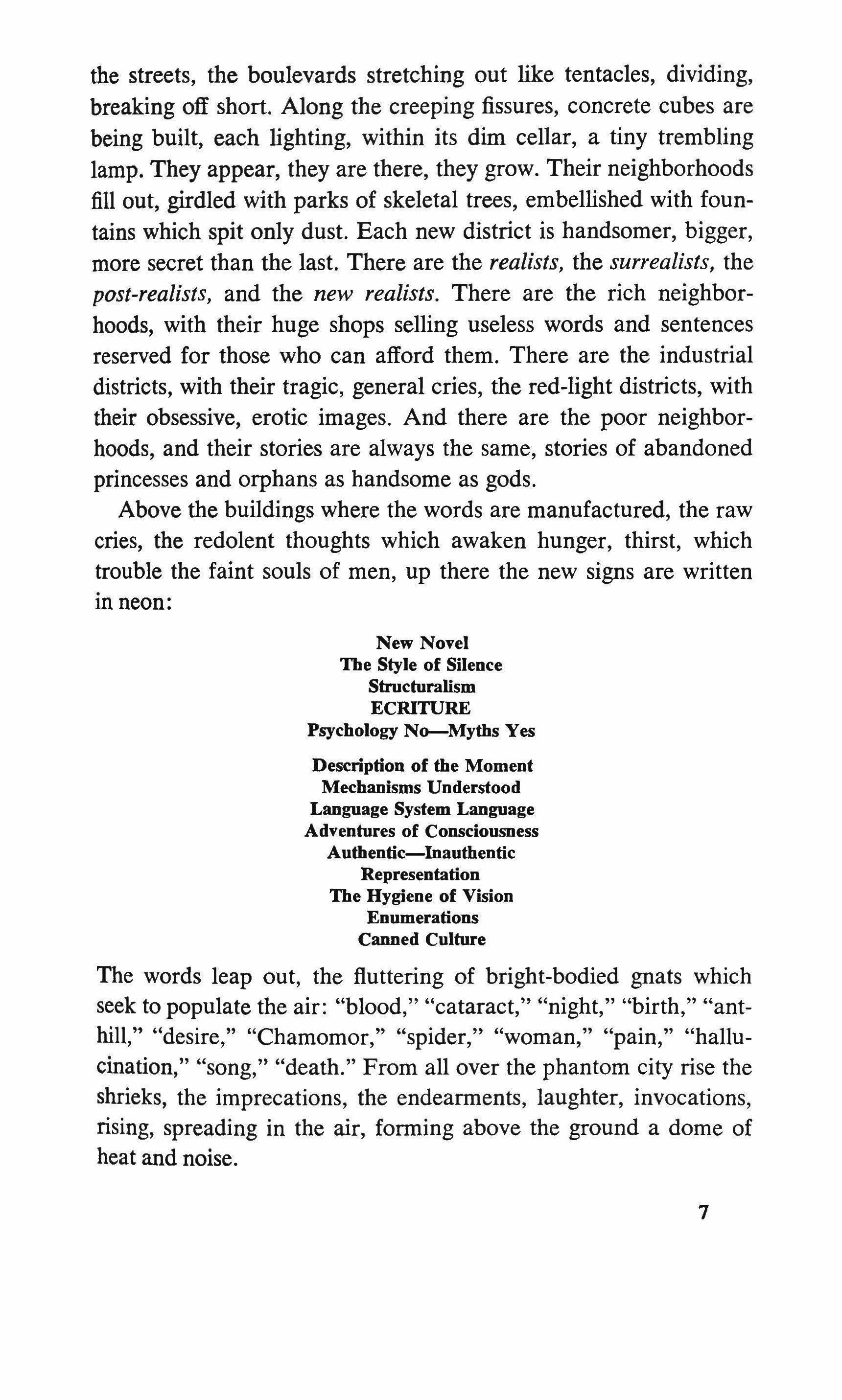
the streets, the boulevards stretching out like tentacles, dividing, breaking off short. Along the creeping fissures, concrete cubes are being built, each lighting, within its dim cellar, a tiny trembling lamp. They appear, they are there, they grow. Their neighborhoods fill out, girdled with parks of skeletal trees, embellished with fountains which spit only dust. Each new district is handsomer, bigger, more secret than the last. There are the realists, the surrealists, the post-realists, and the new realists. There are the rich neighborhoods, with their huge shops selling useless words and sentences reserved for those who can afford them. There are the industrial districts, with their tragic, general cries, the red-light districts, with their obsessive, erotic images. And there are the poor neighborhoods, and their stories are always the same, stories of abandoned princesses and orphans as handsome as gods.
Above the buildings where the words are manufactured, the raw cries, the redolent thoughts which awaken hunger, thirst, which trouble the faint souls of men, up there the new signs are written in neon:
New Novel
The Style of Silence
Structuralism
ECRITURE
Psychology No-Myths Yes
Description of the Moment
Mechanisms Understood
Language System Language
Adventures of Consciousness
Authentic-Inauthentic
Representation
The Hygiene of Vision
Enumerations
Canned Culture
The words leap out, the fluttering of bright-bodied gnats which seek to populate the air: "blood," "cataract," "night," "birth," "anthill," "desire," "Chamomor," "spider," "woman," "pain," "hallucination," "song," "death." From all over the phantom city rise the shrieks, the imprecations, the endearments, laughter, invocations, rising, spreading in the air, forming above the ground a dome of heat and noise.
7
And suddenly the man overlooking the city notices the very place where his soul dwells. He recognizes the street, the house, the room where he was born, where he will die. He thought he was out of reach, 'yet he has become a vendor like the rest. He will take this from Tolstoy, that from Salinger. Then he will manufacture in the back of his shop the merchandise which will bear his name.
There is nothing new, nothing will ever be invented. Only this commerce, the true commerce of the language of men, which develops, parodies itself, lies or tells the truth of feeling, in order to conquer the silence of the other languages. He will discover nothing, will teach nothing to the rest. In the huge living-dead city, all the inhabitants are the same, no one knows more than the others.
In Tel Aviv, Canton, Djakarta, Marseilles, Chicago, the millions of hallucinated ants live together: the great city of literature has no other reasons.
Then, if someday someone finished the last page of Through the Looking-Glass wondering who wrote this book, and why, and where human thought is heading, we can always try to answer:
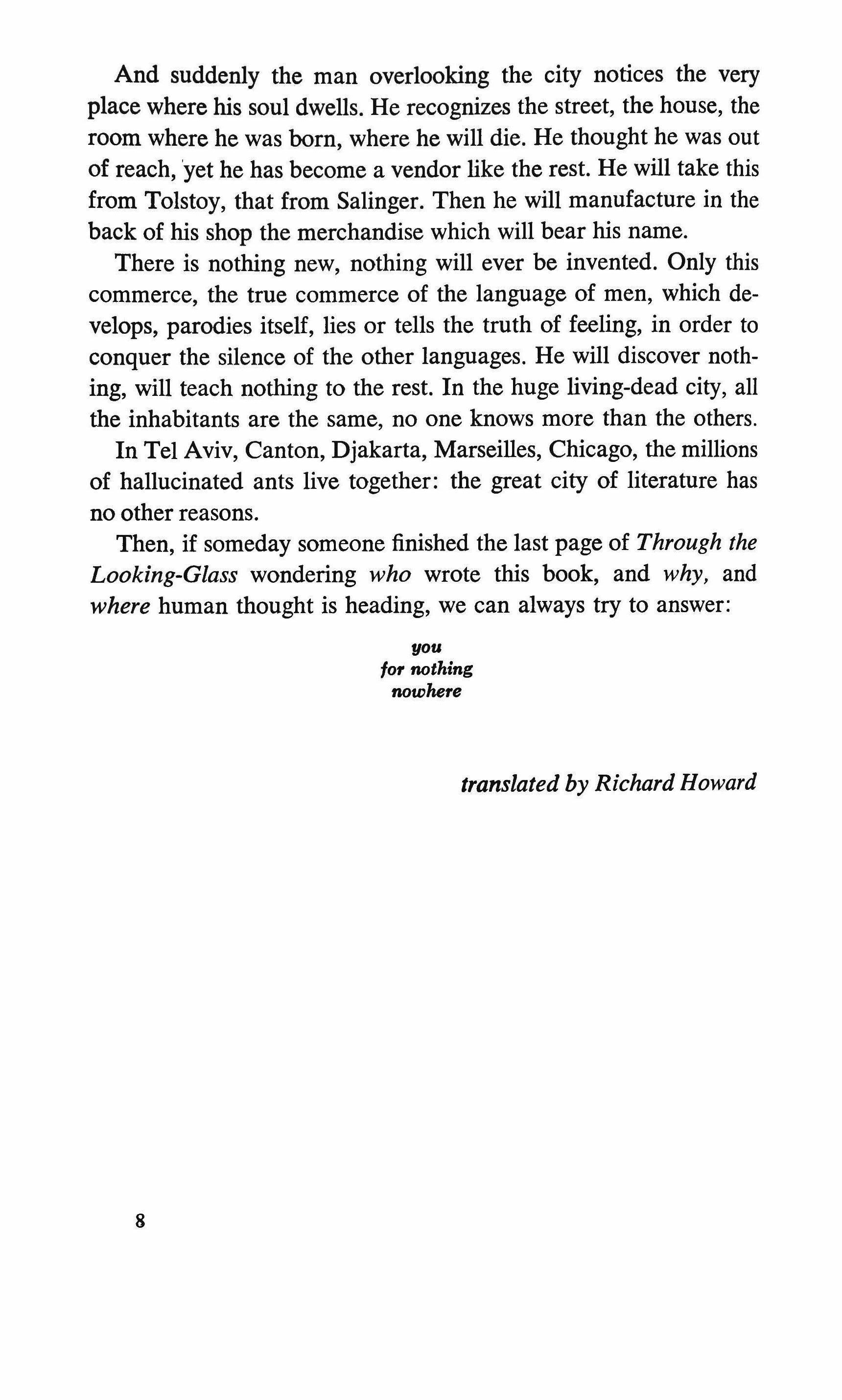 translated by Richard Howard
translated by Richard Howard
you fo, nothing nouihere
8
The prose of the world
MAURICE MERLEAU-PONTY
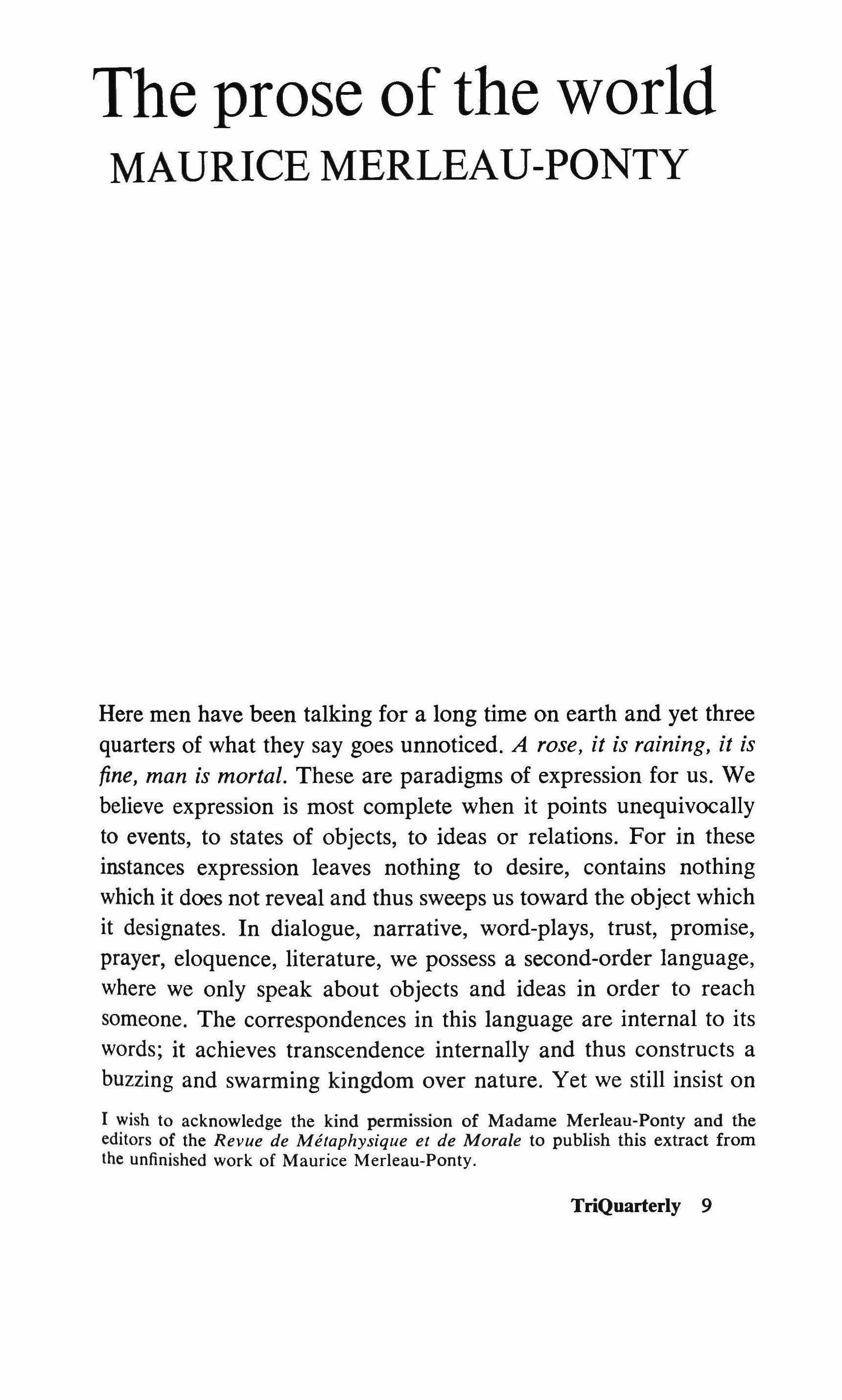
Here men have been talking for a long time on earth and yet three quarters of what they say goes unnoticed. A rose, it is raining, it is fine, man is mortal. These are paradigms of expression for us. We believe expression is most complete when it points unequivocally to events, to states of objects, to ideas or relations. For in these instances expression leaves nothing to desire, contains nothing which it does not reveal and thus sweeps us toward the object which it designates. In dialogue, narrative, word-plays, trust, promise, prayer, eloquence, literature, we possess a second-order language, where we only speak about objects and ideas in order to reach someone. The correspondences in this language are internal to its words; it achieves transcendence internally and thus constructs a buzzing and swarming kingdom over nature. Yet we still insist on I wish to acknowledge the kind permission of Madame Merleau-Ponty and the editors of the Revue de Metaphysique et de Morale to publish this extract from the unfinished work of Maurice Merleau-Ponty.
TriQuartedy 9
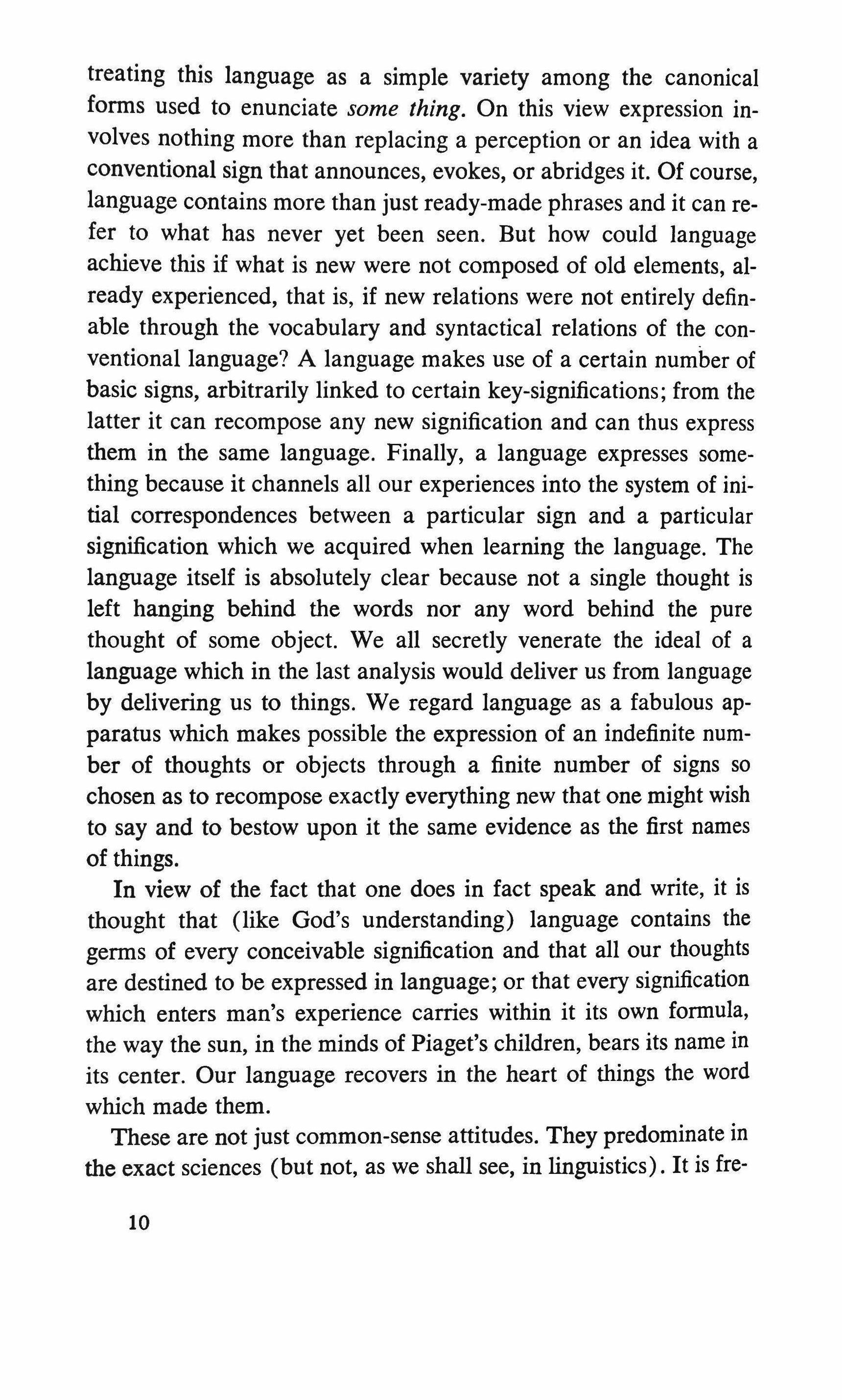
treating this language as a simple variety among the canonical forms used to enunciate some thing. On this view expression involves nothing more than replacing a perception or an idea with a conventional sign that announces, evokes, or abridges it. Of course, language contains more than just ready-made phrases and it can refer to what has never yet been seen. But how could language achieve this if what is new were not composed of old elements, already experienced, that is, if new relations were not entirely definable through the vocabulary and syntactical relations of the conventionallanguage? A language makes use of a certain number of basic signs, arbitrarily linked to certain key-significations; from the latter it can recompose any new signification and can thus express them in the same language. Finally, a language expresses something because it channels all our experiences into the system of initial correspondences between a particular sign and a particular signification which we acquired when learning the language. The language itself is absolutely clear because not a single thought is left hanging behind the words nor any word behind the pure thought of some object. We all secretly venerate the ideal of a language which in the last analysis would deliver us from language by delivering us to things. We regard language as a fabulous apparatus which makes possible the expression of an indefinite number of thoughts or objects through a finite number of signs so chosen as to recompose exactly everything new that one might wish to say and to bestow upon it the same evidence as the first names of things.
In view of the fact that one does in fact speak and write, it is thought that (like God's understanding) language contains the germs of every conceivable signification and that all our thoughts are destined to be expressed in language; or that every signification which enters man's experience carries within it its own formula, the way the sun, in the minds of Piaget's children, bears its name in its center. Our language recovers in the heart of things the word which made them.
These are not just common-sense attitudes. They predominate in the exact sciences (but not, as we shall see, in linguistics). It is fre-
10
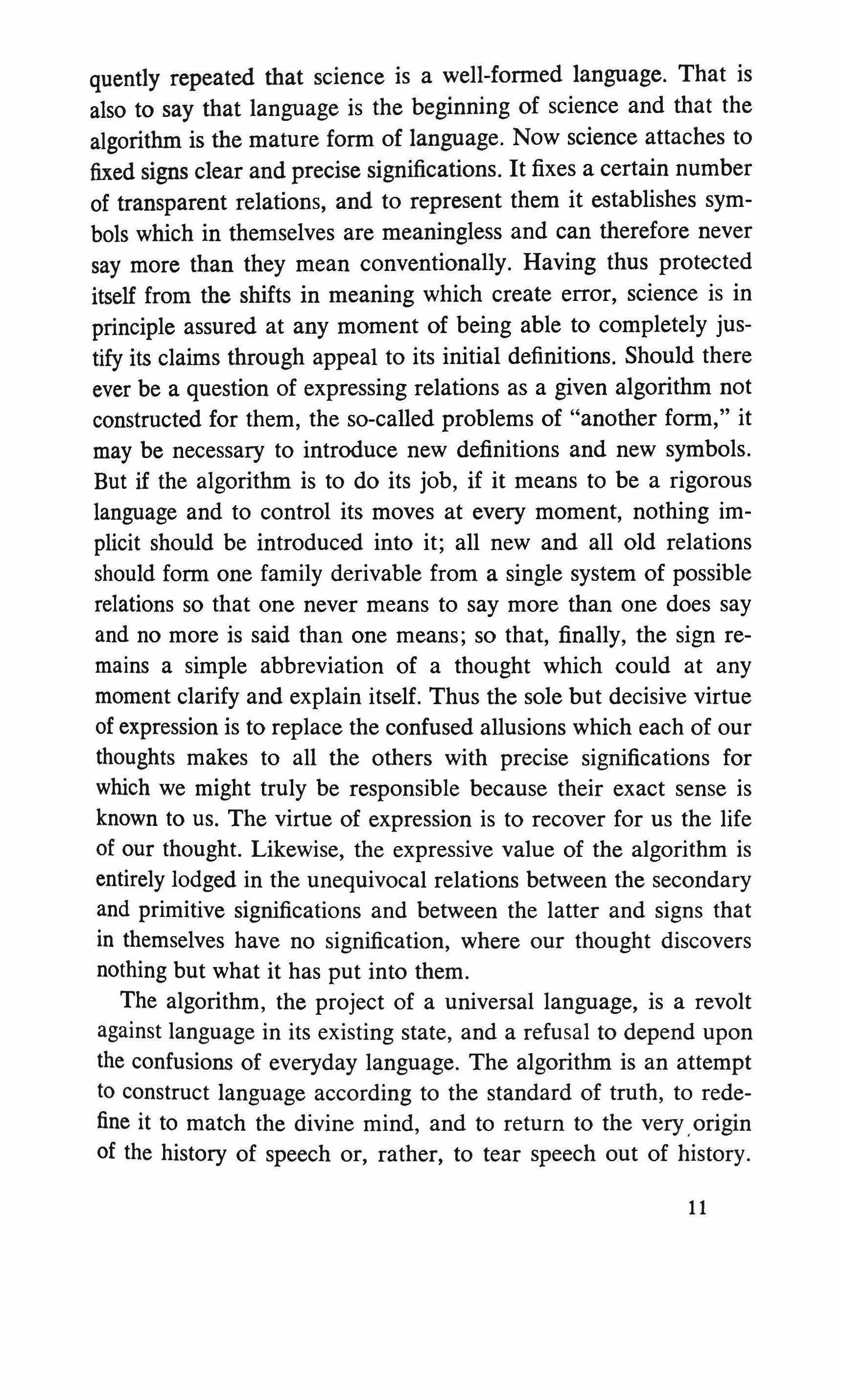
quently repeated that science is a well-formed language. That is also to say that language is the beginning of science and that the algorithm is the mature form of language. Now science attaches to fixed signs clear and precise significations. It fixes a certain number of transparent relations, and to represent them it establishes symbols which in themselves are meaningless and can therefore never say more than they mean conventionally. Having thus protected itself from the shifts in meaning which create error, science is in principle assured at any moment of being able to completely justify its claims through appeal to its initial definitions. Should there ever be a question of expressing relations as a given algorithm not constructed for them, the so-called problems of "another form," it may be necessary to introduce new definitions and new symbols. But if the algorithm is to do its job, if it means to be a rigorous language and to control its moves at every moment, nothing implicit should be introduced into it; all new and all old relations should form one family derivable from a single system of possible relations so that one never means to say more than one does say and no more is said than one means; so that, finally, the sign remains a simple abbreviation of a thought which could at any moment clarify and explain itself. Thus the sole but decisive virtue of expression is to replace the confused allusions which each of our thoughts makes to all the others with precise significations for which we might truly be responsible because their exact sense is known to us. The virtue of expression is to recover for us the life of our thought. Likewise, the expressive value of the algorithm is entirely lodged in the unequivocal relations between the secondary and primitive significations and between the latter and signs that in themselves have no signification, where our thought discovers nothing but what it has put into them.
The algorithm, the project of a universal language, is a revolt against language in its existing state, and a refusal to depend upon the confusions of everyday language. The algorithm is an attempt to construct language according to the standard of truth, to redefine it to match the divine mind, and to return to the very,origin of the history of speech or, rather, to tear speech out of history.
11
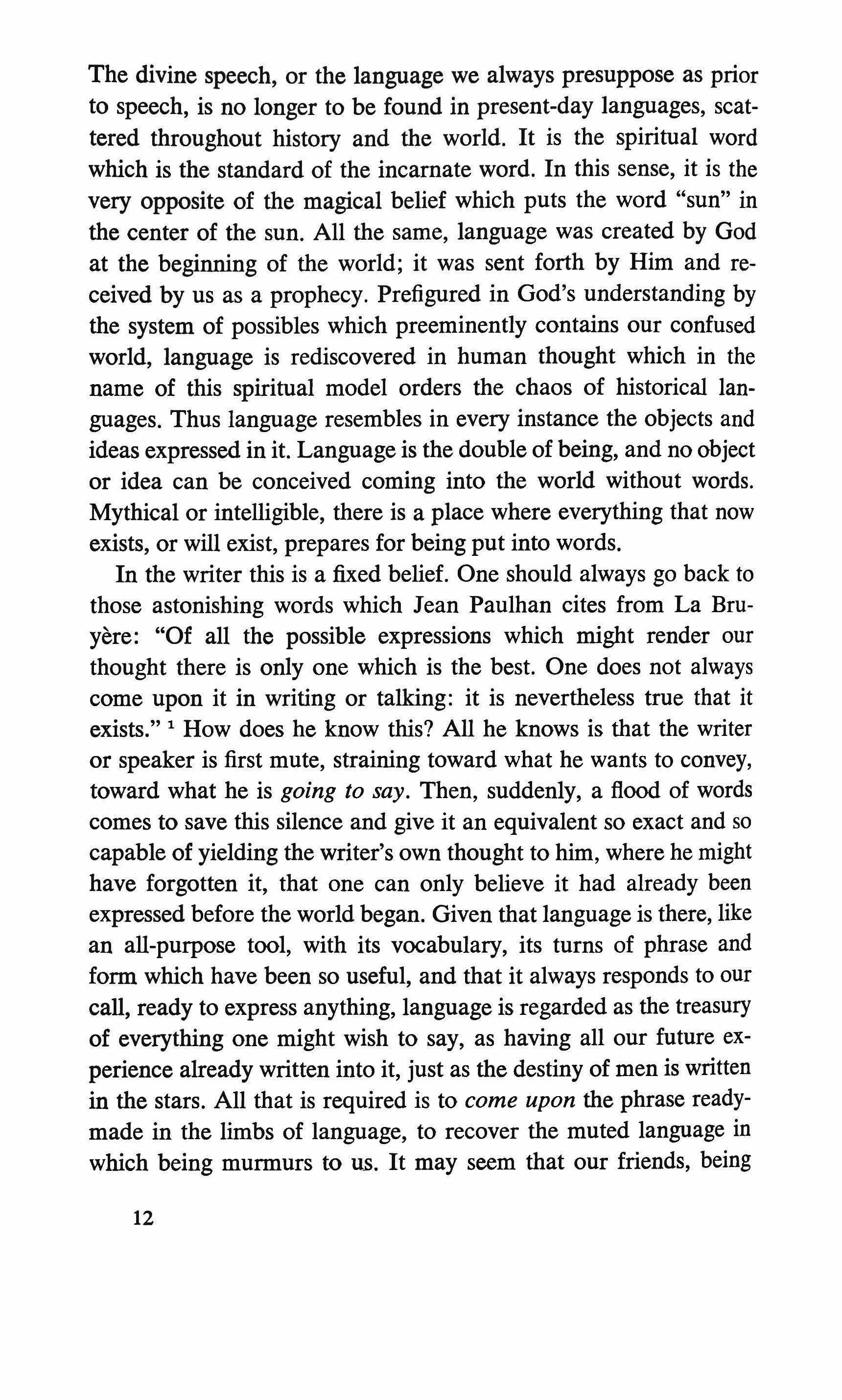
The divine speech, or the language we always presuppose as prior to speech, is no longer to be found in present-day languages, scattered throughout history and the world. It is the spiritual word which is the standard of the incarnate word. In this sense, it is the very opposite of the magical belief which puts the word "sun" in the center of the sun. All the same, language was created by God at the beginning of the world; it was sent forth by Him and received by us as a prophecy. Prefigured in God's understanding by the system of possibles which preeminently contains our confused world, language is rediscovered in human thought which in the name of this spiritual model orders the chaos of historical languages. Thus language resembles in every instance the objects and ideas expressed in it. Language is the double of being, and no object or idea can be conceived coming into the world without words.
Mythical or intelligible, there is a place where everything that now exists, or will exist, prepares for being put into words.
In the writer this is a fixed belief. One should always go back to those astonishing words which Jean Paulhan cites from La Bruyere: "Of all the possible expressions which might render our thought there is only one which is the best. One does not always come upon it in writing or talking: it is nevertheless true that it exists." 1 How does he know this? All he knows is that the writer or speaker is first mute, straining toward what he wants to convey, toward what he is going to say. Then, suddenly, a flood of words comes to save this silence and give it an equivalent so exact and so capable of yielding the writer's own thought to him, where he might have forgotten it, that one can only believe it had already been expressed before the world began. Given that language is there, like an all-purpose tool, with its vocabulary, its turns of phrase and form which have been so useful, and that it always responds to our call, ready to express anything, language is regarded as the treasury of everything one might wish to say, as having all our future experience already written into it, just as the destiny of men is written in the stars. All that is required is to come upon the phrase readymade in the limbs of language, to recover the muted language in which being murmurs to us. It may seem that our friends, being
12

who they are, could not be called by any other name, that in naming them we simply deciphered what was called for by eyes of that color, a face like that, that walk-though some are misnamed and all their lives carry a false name or pseudonym (like a wig or mask) In the same way, expression and what is expressed strangely alternate and through a sort of false rebirth make us feel that the word had inhabited the thing from all eternity.
But if men unearth a prehistoric language spoken in things, or if beneath our stammerings there is a golden age of language in which words once adhered to the objects themselves, then communication involves no mystery. I point to a world around me which already speaks, just as I point my finger toward an object which was already in the visual field of others. It is said that physiognomic expressions are equivocal in themselves and that reddening in the face may be taken for pleasure, shame, anger, or passion, according to the context. In the same way, a linguistic expression may arouse nothing in the mind of an observer. For it shows him in silence things whose name he already knows because he is their name. But let us leave aside the myth of a language of things, or, rather, let us take it in its sublime form, as a universal language which contains in advance everything it might have to express because its words and syntax reflect the fundamental possibles and their articulations. The implications are the same. The word possesses no virtue of its own; there is no power hidden in it. It is a pure sign standing for a pure signification. The person speaking is coding his thought. He substitutes his thoughts with a visible or sonorous pattern which is nothing but sounds in the air or ink spots on the paper. Thought understands itself and is self-sufficient; it translates itself in a message which is not its vehicle and only conveys it unequivocally to another mind which can read the message because it habitually attaches the same signification to the respective signs, whether ruled by human conventions or by some divine institution. In any case, we never find among our words any that we have not put there ourselves. Communication is an appearance; it never brings us anything truly new. How could communication possibly carry us beyond our own powers of reflection since the
13

signs it employs could never tell us anything if in the background we did not already have the signification? It may be true that when we watch signals in the night like Fa15rice, or the fast and slow moving letters in a flashing neon sign, we feel we are watching the birth of the news. Something pulsates and comes alive: the thought of man shrouded somewhere in the distance. But, actually, this is only a mirage. If I were not present to perceive the rhythm and pick out the moving letters there would only be a meaningless clicking on and off, like the twinkling of the stars; there would be nothing but lights clicking on and off mechanically. Even the news of a death or a disaster brought to me by telegram is not entirely news; I only receive this news because I already know that deaths and disasters are possible. Certainly, there is something more than just this in the way men experience language. They cannot restrain themselves from a chat with a famous author; they visit him the way people visit Saint Peter's statue. They have a mute faith in the secret virtues of communication. They don't need to be told that news is news; they know that it is no help to have often thought of death so long as one has not learned of the death of a loved one. But the moment they begin to reflect upon language instead of living it they cannot see how one could accord language such power. After all, we understand what is said to us because we know in advance the meaning of the words spoken to us.j We only understand what we already know and never set ourselves any problem that we are not able to resolve. Consider the model of two thinking subjects closed in their signification-between them messages circulate which convey nothing and are only the occasion for each subject to observe what he already knew-and when the one speaks and the other listens their thoughts reproduce one another, but unwittingly and never face to face. Such a theory of language would result, ultimately (as Paulhan says), "in everything happening between them as though language had not existed." 2
II
Indeed, one of the effects of language is to efface itself to the t Marginal note: Describe the contrast between meaning which is at hand and meaning which is in the process of creation.
14

extent that expression comes across. As I become engrossed in a book I no longer see the letters on the page nor do I recall turning the page. Through all the letters and on every page I continually seek and find the same incidents, the same events even to the point of not noticing the light or perspective in which they are presented. Similarly, in naive perception I see a man over there who has a man's shape although I could only say what his "apparent size" was by closing one eye, fragmenting the visual field, destroying the background, and projecting the whole spectacle onto an illusory plane in which every fragment is compared to some close object such as my pencil and thus assigned a specific size. It is impossible to make the comparison with both eyes open. Then my pencil is a near object; things far away are far away and between them and my pencil there is no common reference. Or, rather, if I succeed in making the comparison for one object in the visual field I cannot manage it for the rest of them at the same time. The man over there is neither one inch nor five feet tall; he is a man in the distance. His height is there like a meaning which lies within him but not like an observable trait, for I am totally unaware of any signs by which I might spot it. In the same way, a great book, a play, or a poem is there in my memory en bloc. I can, of course, by recalling what I read or heard, remember a particular passage, word, situation, or shift in the action. But when I do this, I am dealing with a recollection which is unique and retains its evidence independently of these details; for it is as unique and as inexhaustible as the sight of an object. When a conversation involves me and, for once, gives me the feeling of really talking to someone, I forget none of it and the next day I could relate it to anyone interested in it. But if it really excites me like a book I do not have to recollect a series of quite distinct aspects of it. I still have it in my hands like something I hold, wrapped up in my memory; and all I have to do is to return to the incident for everything-the interlocutor's gestures, his smiles, his hesitations and his words-to reappear in their proper place. When someone-an author or a friend-succeeds in expressing himself, the signs are immediately forgotten; all that re-
15
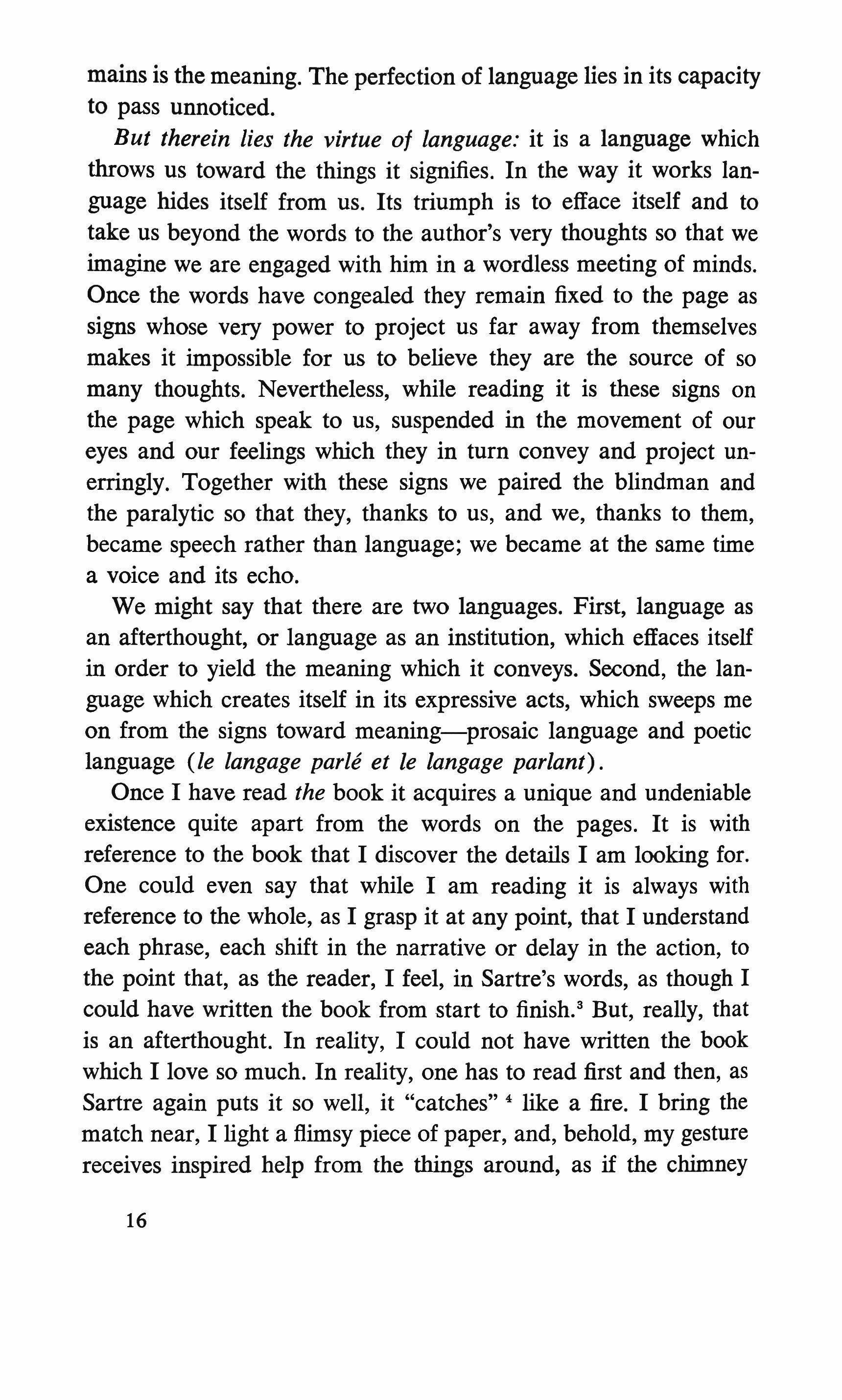
mains is the meaning. The perfection of language lies in its capacity to pass unnoticed.
But therein lies the virtue of language: it is a language which throws us toward the things it signifies. In the way it works language hides itself from us. Its triumph is to efface itself and to take us beyond the words to the author's very thoughts so that we imagine we are engaged with him in a wordless meeting of minds. Once the words have congealed they remain fixed to the page as signs whose very power to project us far away from themselves makes it impossible for us to believe they are the source of so many thoughts. Nevertheless, while reading it is these signs on the page which speak to us, suspended in the movement of our eyes and our feelings which they in turn convey and project unerringly. Together with these signs we paired the blindman and the paralytic so that they, thanks to us, and we, thanks to them, became speech rather than language; we became at the same time a voice and its echo.
We might say that there are two languages. First, language as an afterthought, or language as an institution, which effaces itself in order to yield the meaning which it conveys. Second, the language which creates itself in its expressive acts, which sweeps me on from the signs toward meaning-prosaic language and poetic language (Ie langage parle et le langage parlant).
Once I have read the book it acquires a unique and undeniable existence quite apart from the words on the pages. It is with reference to the book that I discover the details I am looking for. One could even say that while I am reading it is always with reference to the whole, as I grasp it at any point, that I understand each phrase, each shift in the narrative or delay in the action, to the point that, as the reader, I feel, in Sartre's words, as though I could have written the book from start to finish." But, really, that is an afterthought. In reality, I could not have written the book which I love so much. In reality, one has to read first and then, as Sartre again puts it so well, it "catches" 4 like a fire. I bring the match near, I light a flimsy piece of paper, and, behold, my gesture receives inspired help from the things around, as if the chimney
16
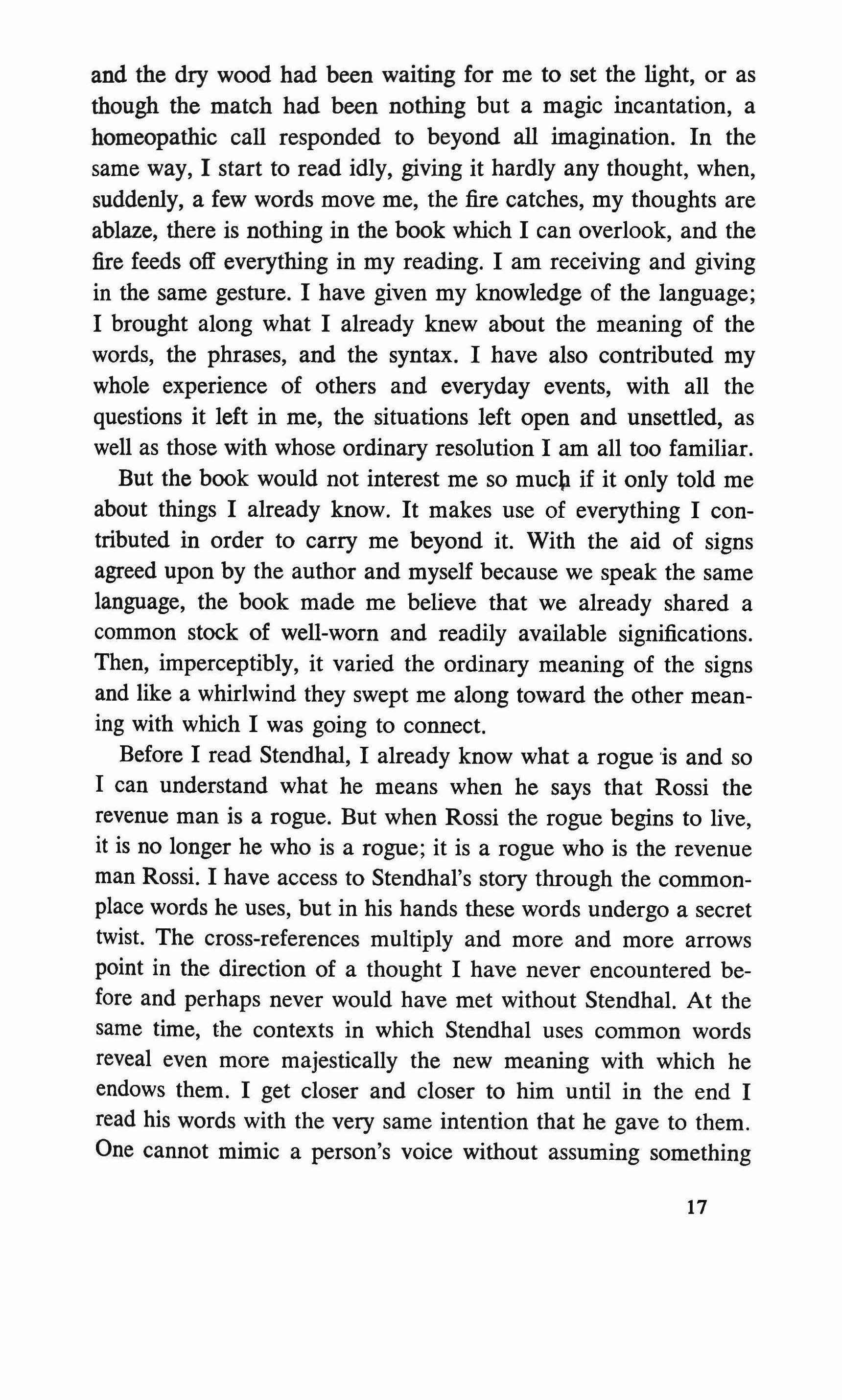
and the dry wood had been waiting for me to set the light, or as though the match had been nothing but a magic incantation, a homeopathic call responded to beyond all imagination. In the same way, I start to read idly, giving it hardly any thought, when, suddenly, a few words move me, the fire catches, my thoughts are ablaze, there is nothing in the book which I can overlook, and the fire feeds off everything in my reading. I am receiving and giving in the same gesture. I have given my knowledge of the language; I brought along what I already knew about the meaning of the words, the phrases, and the syntax. I have also contributed my whole experience of others and everyday events, with all the questions it left in me, the situations left open and unsettled, as well as those with whose ordinary resolution I am all too familiar. But the book would not interest me so much if it only told me about things I already know. It makes use of everything I contributed in order to carry me beyond it. With the aid of signs agreed upon by the author and myself because we speak the same language, the book made me believe that we already shared a common stock of well-worn and readily available significations. Then, imperceptibly, it varied the ordinary meaning of the signs and like a whirlwind they swept me along toward the other meaning with which I was going to connect.
Before I read Stendhal, I already know what a rogue 'is and so I can understand what he means when he says that Rossi the revenue man is a rogue. But when Rossi the rogue begins to live, it is no longer he who is a rogue; it is a rogue who is the revenue man Rossi. I have access to Stendhal's story through the commonplace words he uses, but in his hands these words undergo a secret twist. The cross-references multiply and more and more arrows point in the direction of a thought I have never encountered before and perhaps never would have met without Stendhal. At the same time, the contexts in which Stendhal uses common words reveal even more majestically the new meaning with which he endows them. I get closer and closer to him until in the end I read his words with the very same intention that he gave to them. One cannot mimic a person's voice without assuming something
17

of his physiognomy and even his personal style. In the same way, the author's voice results in my assuming his thoughts. Common words and familiar events, like jealousy or a duel, which at first immerse us in the everyday world, suddenly function as emissaries from the world of Stendhal. Although the final effect is not for me to dwell within Stendhal's lived experience, it does at least bring me into the imaginary self and the internal dialogue Stendhal held with it for fifty years, while he was coining it in his works. It is only then that the reader or the author can say with Paulhan, "In this light at least, I have been you." 5
I create Stendhal; I am Stendhal while reading him. But that is because first of all he knew how to bring me to dwell within him. The reader's sovereignty is only imaginary, given that he draws all his force from that infernal machine called the book, the apparatus for making significations. The relations between the reader and the book are like those loves in which one partner dominates at first because he is more proud or more temperamental, and then that gives way, and it is the other, more wise and more silent, who rules. The expressive moment occurs where the relationship reverses itself, where the book takes possession of the reader.
Prosaic language is the language the reader brings with him; it is the stock of accepted relations between signs and familiar significations without which he could never have begun to read; it constitutes the literature of the language; thus it is also Stendhal's work once it has been understood and added to the cultural heritage.
But poetic language is the call of the book to the unprejudiced reader; it is the operation through which a conventional arrangement of signs and significations gets altered and in turn transfigures each internal element so that in the end a new signification is secreted. It is the effect through which Stendhal's own language comes to life in the reader's mind henceforth for his own use. Once I have acquired this language, I can easily delude myself that I could have understood it by myself. That is because it has transformed me and made me capable of understanding it.
18
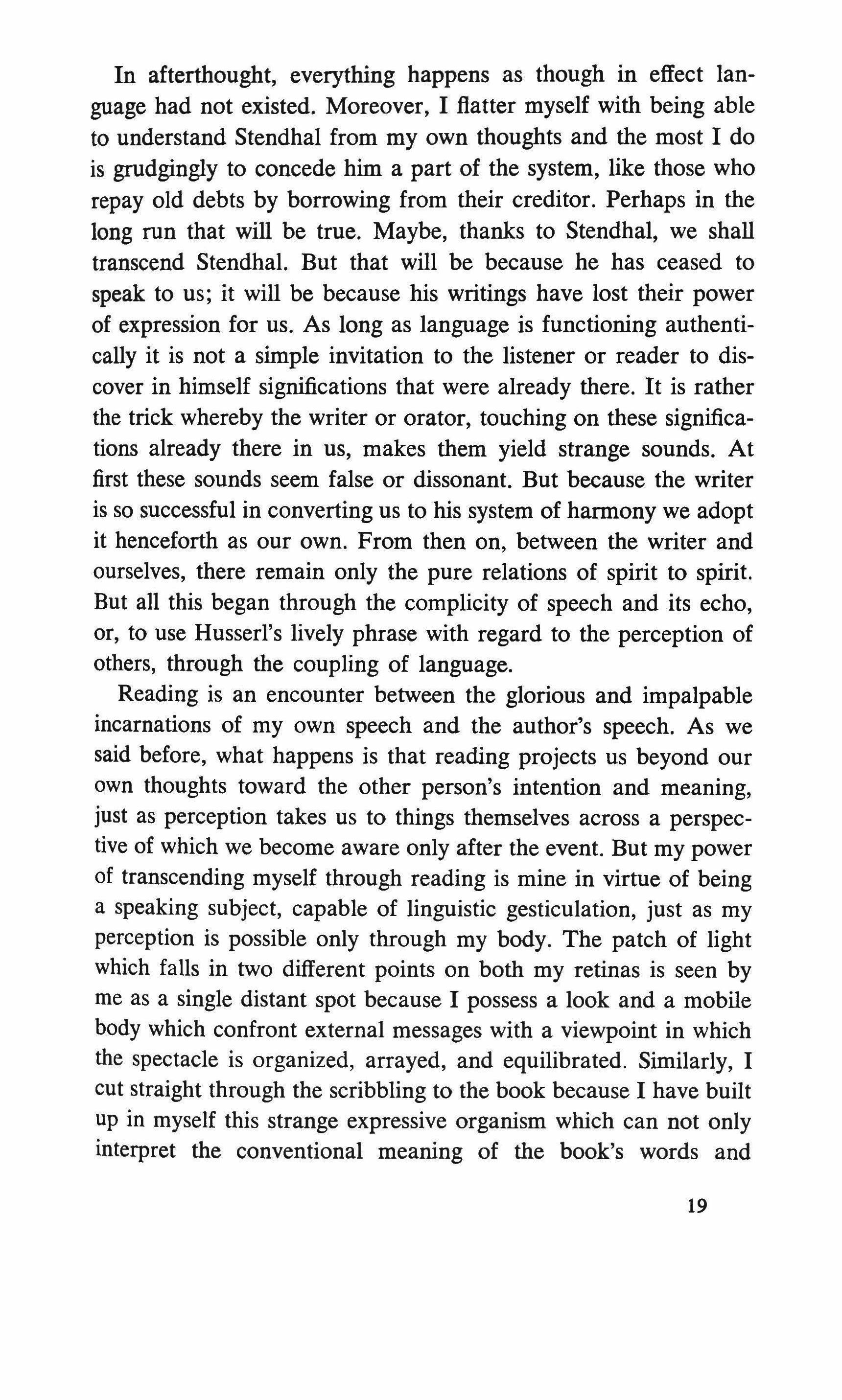
In afterthought, everything happens as though in effect language had not existed. Moreover, I flatter myself with being able to understand Stendhal from my own thoughts and the most I do is grudgingly to concede him a part of the system, like those who repay old debts by borrowing from their creditor. Perhaps in the long run that will be true. Maybe, thanks to Stendhal, we shall transcend Stendhal. But that will be because he has ceased to speak to us; it will be because his writings have lost their power of expression for us. As long as language is functioning authentically it is not a simple invitation to the listener or reader to discover in himself significations that were already there. It is rather the trick whereby the writer or orator, touching on these significations already there in us, makes them yield strange sounds. At first these sounds seem false or dissonant. But because the writer is so successful in converting us to his system of harmony we adopt it henceforth as our own. From then on, between the writer and ourselves, there remain only the pure relations of spirit to spirit. But all this began through the complicity of speech and its echo, or, to use Husserl's lively phrase with regard to the perception of others, through the coupling of language.
Reading is an encounter between the glorious and impalpable incarnations of my own speech and the author's speech. As we said before, what happens is that reading projects us beyond our own thoughts toward the other person's intention and meaning, just as perception takes us to things themselves across a perspective of which we become aware only after the event. But my power of transcending myself through reading is mine in virtue of being a speaking subject, capable of linguistic gesticulation, just as my perception is possible only through my body. The patch of light which falls in two different points on both my retinas is seen by me as a single distant spot because I possess a look and a mobile body which confront external messages with a viewpoint in which the spectacle is organized, arrayed, and equilibrated. Similarly, I cut straight through the scribbling to the book because I have built up in myself this strange expressive organism which can not only interpret the conventional meaning of the book's words and 19

techniques but can even allow itself to be transformed by the book and endowed by it with new organs. One can have no idea of the power of language until one has taken stock of that working or constitutive language which emerges when the constituted language, suddenly off-center and out of equilibrium, reorganizes itself to teach the reader-and even the author-what he never knew how to think or say. Language leads us to the things themselves to the precise extent that it is signification before having a signification. If we concede language only its secondary function, it is because we presuppose the first as given. It is because we make it depend upon an awareness of truth whereas it is actually the vehicle of truth. In this way we are putting language before language.
We shall attempt elsewhere t to develop these remarks more fully in a theory of expression and truth. It will be necessary then to clarify or explicate the experience of speech in terms of what we know from the sciences of psychology, behavior disorders, and linguistics. It would also be necessary to consider those philosophical positions which claim to resolve the problem of expression by treating it as a species among the pure acts of signification which philosophical reflection makes perfectly clear to us. But that is not our task at present. We simply mean to initiate such a study by trying to illustrate the function of expression in literature. We reserve a more complete explanation for another work, as mentioned above. However, it is, of course, unusual to begin a study of expression with, say, its most complex function and to proceed from there to the simpler ones. We therefore have to justify the procedure by making it clear that the phenomenon of expression, as it appears in literary speech, is no curiosity or introspective fantasy marginal to the philosophy or science of language. It has to be shown that the phenomenon of expression belongs both to the scientific study of language and to literary experience and that these two studies overlap. How could there
t For references to Merleau-Ponty's projected writings see "An Unpublished Text by Maurice Merleau-Ponty: A Prospectus of His Work," in The Primacy of Perception, edited, with an Introduction, by James M. Edie, Evanston, Northwestern University Press, 1964. Translator.
20
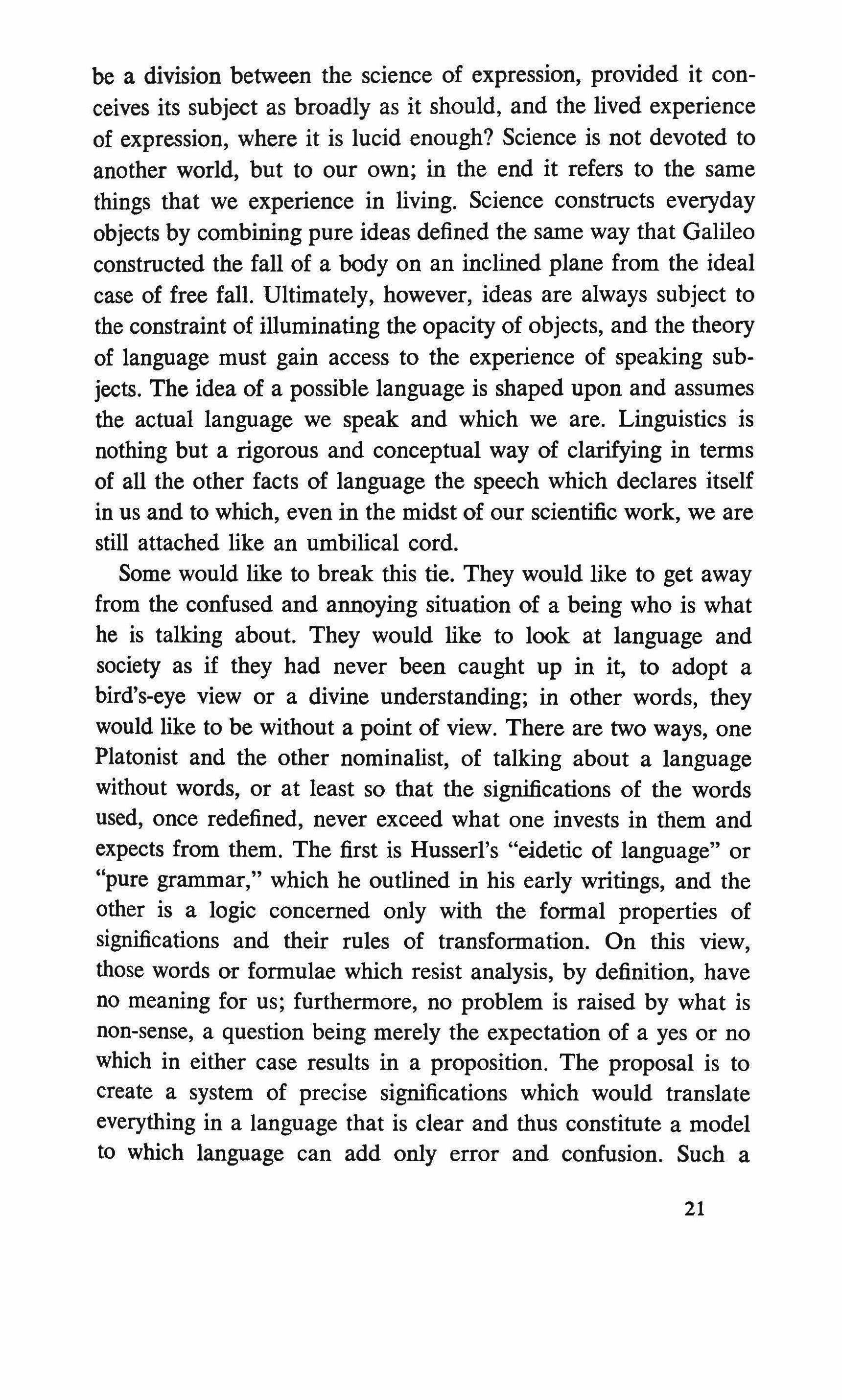
be a division between the science of expression, provided it conceives its subject as broadly as it should, and the lived experience of expression, where it is lucid enough? Science is not devoted to another world, but to our own; in the end it refers to the same things that we experience in living. Science constructs everyday objects by combining pure ideas defined the same way that Galileo constructed the fall of a body on an inclined plane from the ideal case of free fall. Ultimately, however, ideas are always subject to the constraint of illuminating the opacity of objects, and the theory of language must gain access to the experience of speaking subjects. The idea of a possible language is shaped upon and assumes the actual language we speak and which we are. Linguistics is nothing but a rigorous and conceptual way of clarifying in terms of all the other facts of language the speech which declares itself in us and to which, even in the midst of our scientific work, we are still attached like an umbilical cord.
Some would like to break this tie. They would like to get away from the confused and annoying situation of a being who is what he is talking about. They would like to look at language and society as if they had never been caught up in it, to adopt a bird's-eye view or a divine understanding; in other words, they would like to be without a point of view. There are two ways, one Platonist and the other nominalist, of talking about a language without words, or at least so that the significations of the words used, once redefined, never exceed what one invests in them and expects from them. The first is Husserl's "eidetic of language" or "pure grammar," which he outlined in his early writings, and the other is a logic concerned only with the formal properties of significations and their rules of transformation. On this view, those words or formulae which resist analysis, by definition, have no meaning for us; furthermore, no problem is raised by what is non-sense, a question being merely the expectation of a yes or no which in either case results in a proposition. The proposal is to create a system of precise significations which would translate everything in a language that is clear and thus constitute a model to which language can add only error and confusion. Such a
21
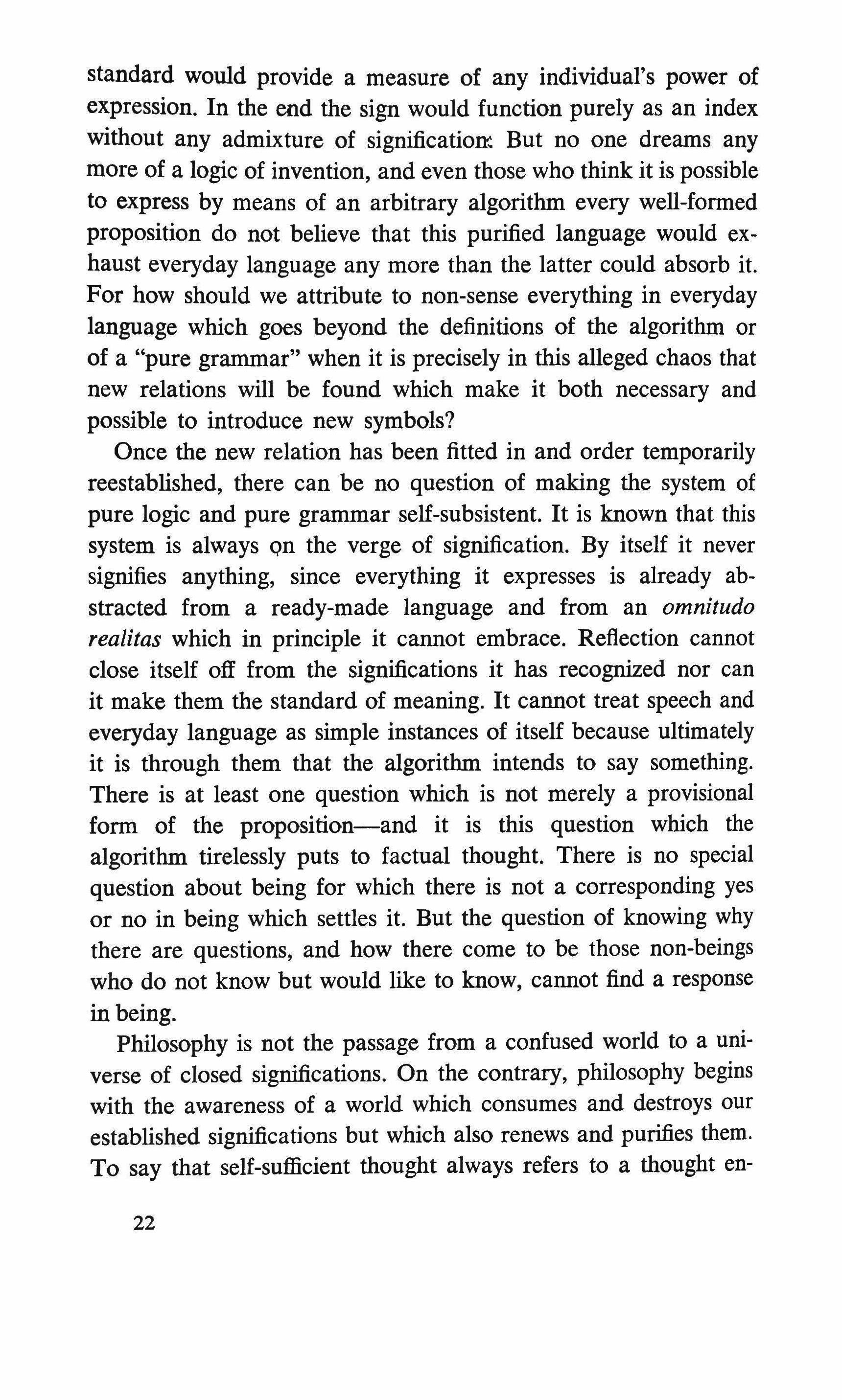
standard would provide a measure of any individual's power of expression. In the end the sign would function purely as an index without any admixture of signification But no one dreams any more of a logic of invention, and even those who think it is possible to express by means of an arbitrary algorithm every well-formed proposition do not believe that this purified language would exhaust everyday language any more than the latter could absorb it. For how should we attribute to non-sense everything in everyday language which goes beyond the definitions of the algorithm or of a "pure grammar" when it is precisely in this alleged chaos that new relations will be found which make it both necessary and possible to introduce new symbols?
Once the new relation has been fitted in and order temporarily reestablished, there can be no question of making the system of pure logic and pure grammar self-subsistent. It is known that this system is always on the verge of signification. By itself it never signifies anything, since everything it expresses is already abstracted from a ready-made language and from an omnitudo realitas which in principle it cannot embrace. Reflection cannot close itself off from the significations it has recognized nor can it make them the standard of meaning. It cannot treat speech and everyday language as simple instances of itself because ultimately it is through them that the algorithm intends to say something. There is at least one question which is not merely a provisional form of the proposition-and it is this question which the algorithm tirelessly puts to factual thought. There is no special question about being for which there is not a corresponding yes or no in being which settles it. But the question of knowing why there are questions, and how there come to be those non-beings who do not know but would like to know, cannot find a response in being.
Philosophy is not the passage from a confused world to a universe of closed significations. On the contrary, philosophy begins with the awareness of a world which consumes and destroys our established significations but which also renews and purifies them. To say that self-sufficient thought always refers to a thought en-
22
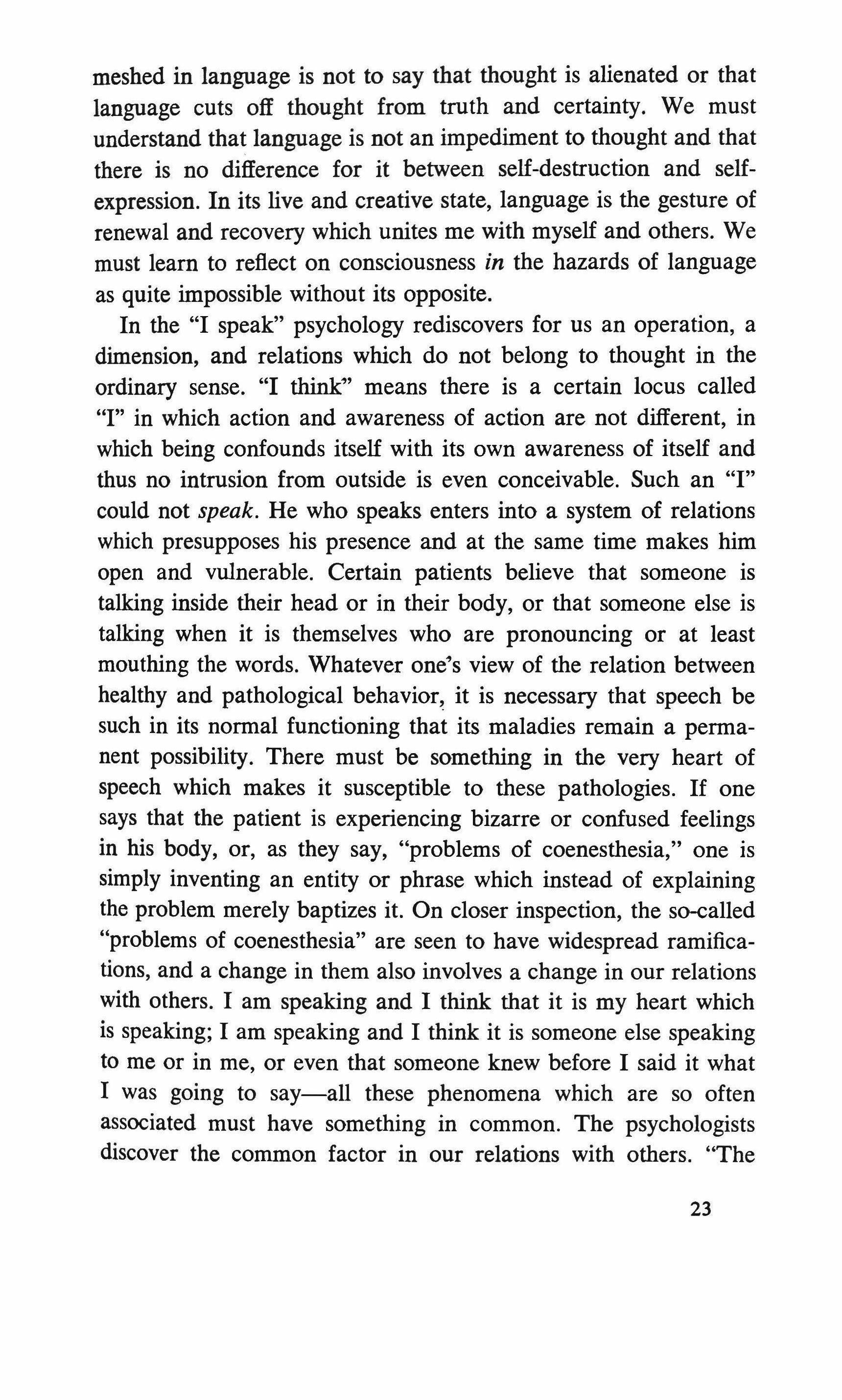
meshed in language is not to say that thought is alienated or that language cuts off thought from truth and certainty. We must understand that language is not an impediment to thought and that there is no difference for it between self-destruction and selfexpression. In its live and creative state, language is the gesture of renewal and recovery which unites me with myself and others. We must learn to reflect on consciousness in the hazards of language as quite impossible without its opposite.
In the "I speak" psychology rediscovers for us an operation, a dimension, and relations which do not belong to thought in the ordinary sense. "I think" means there is a certain locus called "I" in which action and awareness of action are not different, in which being confounds itself with its own awareness of itself and thus no intrusion from outside is even conceivable. Such an "I" could not speak. He who speaks enters into a system of relations which presupposes his presence and at the same time makes him open and vulnerable. Certain patients believe that someone is talking inside their head or in their body, or that someone else is talking when it is themselves who are pronouncing or at least mouthing the words. Whatever one's view of the relation between healthy and pathological behavior, it is necessary that speech be such in its normal functioning that its maladies remain a permanent possibility. There must be something in the very heart of speech which makes it susceptible to these pathologies. If one says that the patient is experiencing bizarre or confused feelings in his body, or, as they say, "problems of coenesthesia," one is simply inventing an entity or phrase which instead of explaining the problem merely baptizes it. On closer inspection, the so-called "problems of coenesthesia" are seen to have widespread ramifications, and a change in them also involves a change in our relations with others. I am speaking and I think that it is my heart which is speaking; I am speaking and I think it is someone else speaking to me or in me, or even that someone knew before I said it what I was going to say-all these phenomena which are so often associated must have something in common. The psychologists discover the common factor in our relations with others. "The
23
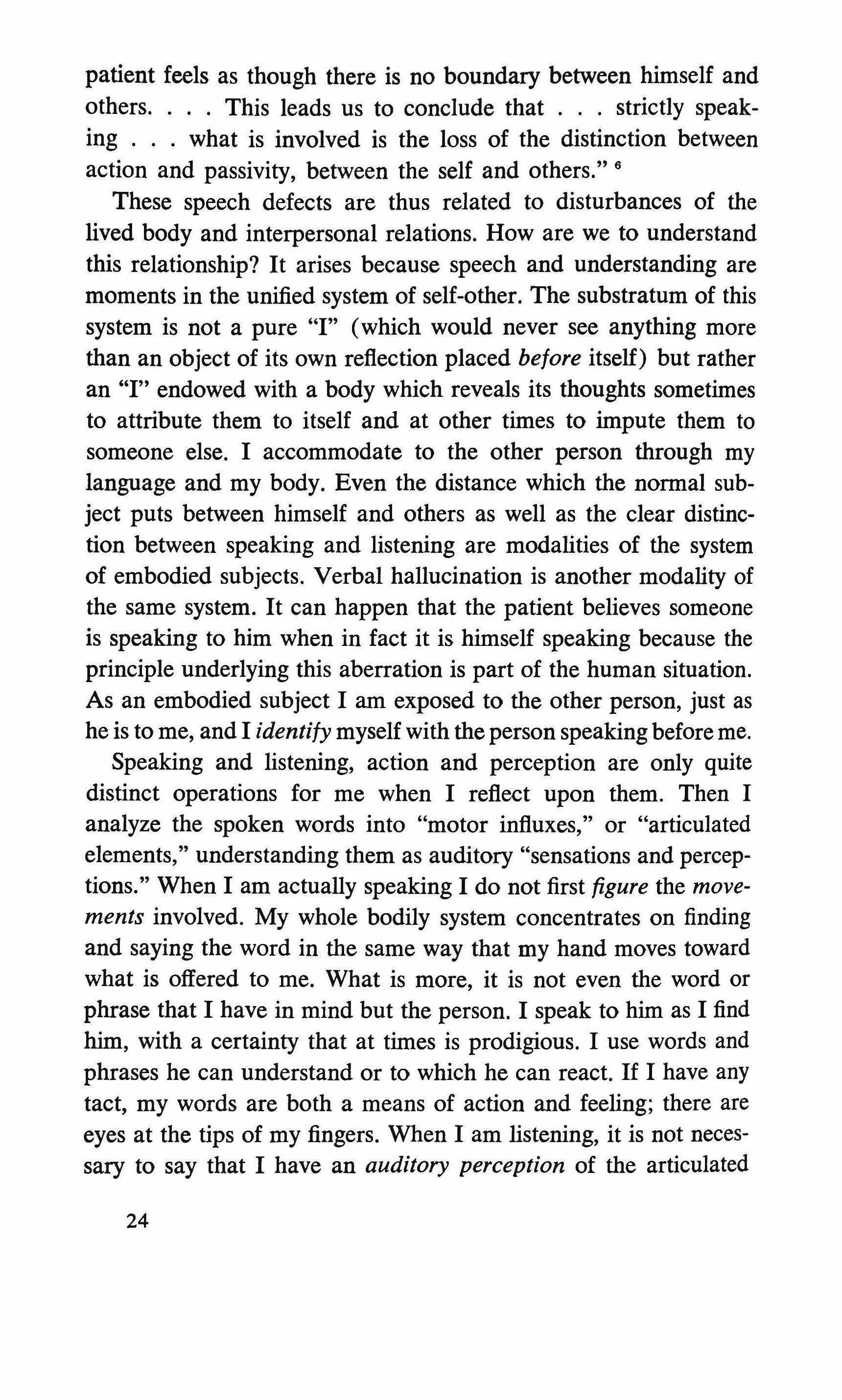
patient feels as though there is no boundary between himself and others. This leads us to conclude that strictly speaking what is involved is the loss of the distinction between action and passivity, between the self and others." 6
These speech defects are thus related to disturbances of the lived body and interpersonal relations. How are we to understand this relationship? It arises because speech and understanding are moments in the unified system of self-other. The substratum of this system is not a pure "I" (which would never see anything more than an object of its own reflection placed before itself) but rather an "I" endowed with a body which reveals its thoughts sometimes to attribute them to itself and at other times to impute them to someone else. I accommodate to the other person through my language and my body. Even the distance which the normal subject puts between himself and others as well as the clear distinction between speaking and listening are modalities of the system of embodied subjects. Verbal hallucination is another modality of the same system. It can happen that the patient believes someone is speaking to him when in fact it is himself speaking because the principle underlying this aberration is part of the human situation. As an embodied subject I am exposed to the other person, just as he is to me, and I identify myself with the person speaking before me.
Speaking and listening, action and perception are only quite distinct operations for me when I reflect upon them. Then I analyze the spoken words into "motor influxes," or "articulated elements," understanding them as auditory "sensations and perceptions." When I am actually speaking I do not first figure the movements involved. My whole bodily system concentrates on finding and saying the word in the same way that my hand moves toward what is offered to me. What is more, it is not even the word or phrase that I have in mind but the person. I speak to him as I find him, with a certainty that at times is prodigious. I use words and phrases he can understand or to which he can react. If I have any tact, my words are both a means of action and feeling; there are eyes at the tips of my fingers. When I am listening, it is not necessary to say that I have an auditory perception of the articulated
24

sounds but that the conversation pronounces itself within me. It summons me and grips me; it develops and inhabits me to the point that I cannot tell what comes from me and what from it.
Whether speaking or listening, I project myself into the other person, I introduce him into my own self and our conversation resembles a struggle between two athletes in a tug-of-war. The speaking "I" abides in its body. Rather than imprisoning it, language is like a magic machine for transporting the "I" into the other person's perspective. "There is in language, a two-way action: one which is induced by our own presence and another which we bring about in the socius by regarding him as being outside ourselves." 7 Language continuously reminds me that the "incomparable monster" which I am when silent can, through speech, be brought into the presence of another myself who recreates every word I say and sustains me in reality as well. There can only be speech (and in the end personality) for an "I" which contains the germ of depersonalization. Speaking and listening not only presuppose thought but what is even more essential, for it is practically the foundation of thought-the capacity to allow ourselves to be pulled down and rebuilt again by the other person before us, by others who may come along, and in principle by anyone. The same transcendence which we found in the literary uses of speech can also be found in everyday language. This transcendence arises the moment I refuse to content myself with the established language, which in effect is a way of silencing me, and as soon as I truly speak to someone. Formerly, psychologists regarded language as merely a series of images, a verbal hallucination or a purely imaginary exuberance. Their critics regarded language as the simple product of a pure mental function. We now regard language as the reverberation of my relations with myself and with others.
It is natural, after all, that the psychologist's analysis of man's speech should emphasize the way we express ourselves in language. But that does not prove that that is the primary function of speech. If I am to communicate with another person I must first have available a language which names the things he and I can see. The
2S
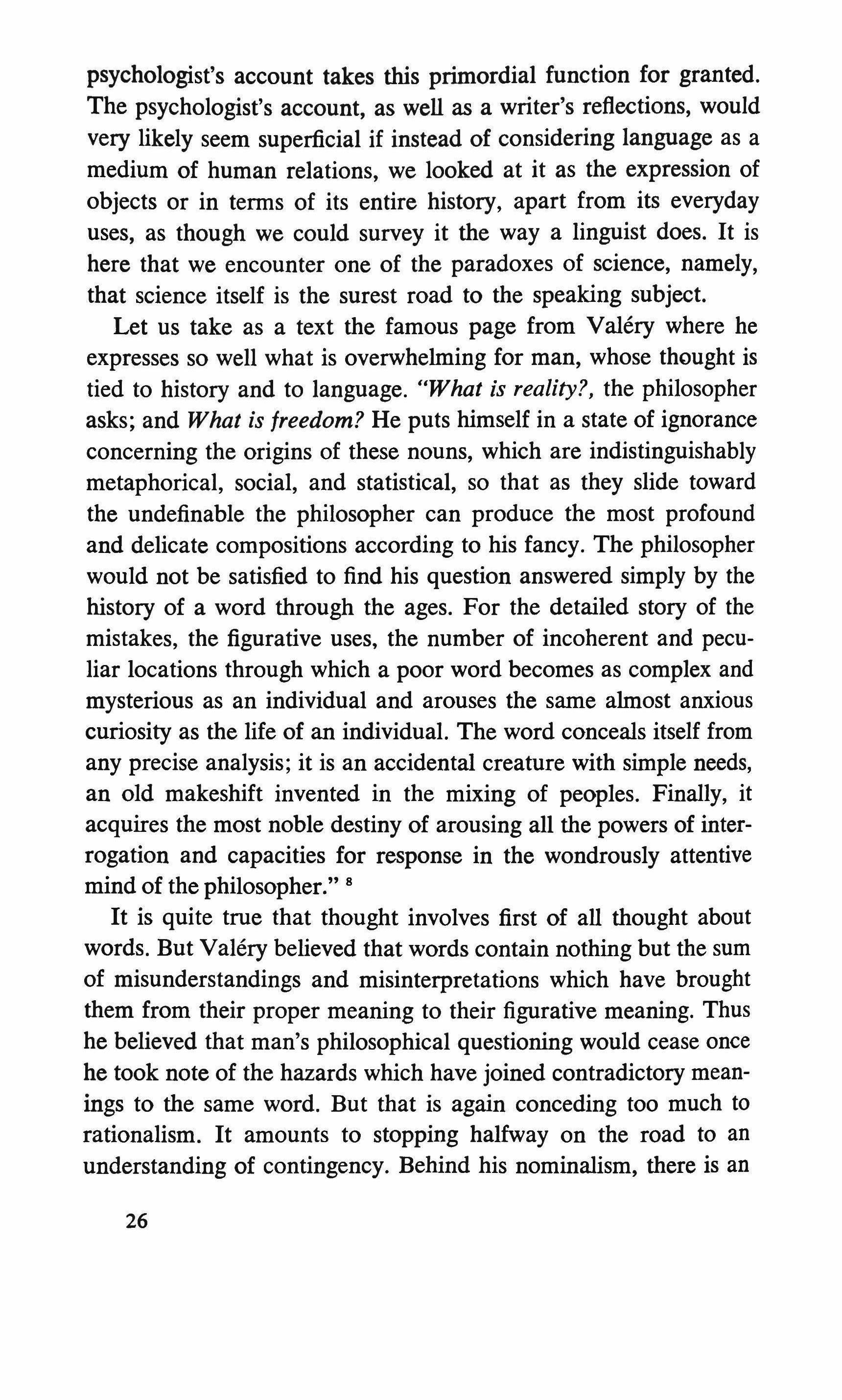
psychologist's account takes this primordial function for granted. The psychologist's account, as well as a writer's reflections, would very likely seem superficial if instead of considering language as a medium of human relations, we looked at it as the expression of objects or in terms of its entire history, apart from its everyday uses, as though we could survey it the way a linguist does. It is here that we encounter one of the paradoxes of science, namely, that science itself is the surest road to the speaking subject.
Let us take as a text the famous page from Valery where he expresses so well what is overwhelming for man, whose thought is tied to history and to language. "What is reality?, the philosopher asks; and What is freedom? He puts himself in a state of ignorance concerning the origins of these nouns, which are indistinguishably metaphorical, social, and statistical, so that as they slide toward the undefinable the philosopher can produce the most profound and delicate compositions according to his fancy. The philosopher would not be satisfied to find his question answered simply by the history of a word through the ages. For the detailed story of the mistakes, the figurative uses, the number of incoherent and peculiar locations through which a poor word becomes as complex and mysterious as an individual and arouses the same almost anxious curiosity as the life of an individual. The word conceals itself from any precise analysis; it is an accidental creature with simple needs, an old makeshift invented in the mixing of peoples. Finally, it acquires the most noble destiny of arousing all the powers of interrogation and capacities for response in the wondrously attentive mind of the philosopher." 8
It is quite true that thought involves first of all thought about words. But Valery believed that words contain nothing but the sum of misunderstandings and misinterpretations which have brought them from their proper meaning to their figurative meaning. Thus he believed that man's philosophical questioning would cease once he took note of the hazards which have joined contradictory meanings to the same word. But that is again conceding too much to rationalism. It amounts to stopping halfway on the road to an understanding of contingency. Behind his nominalism, there is an
26
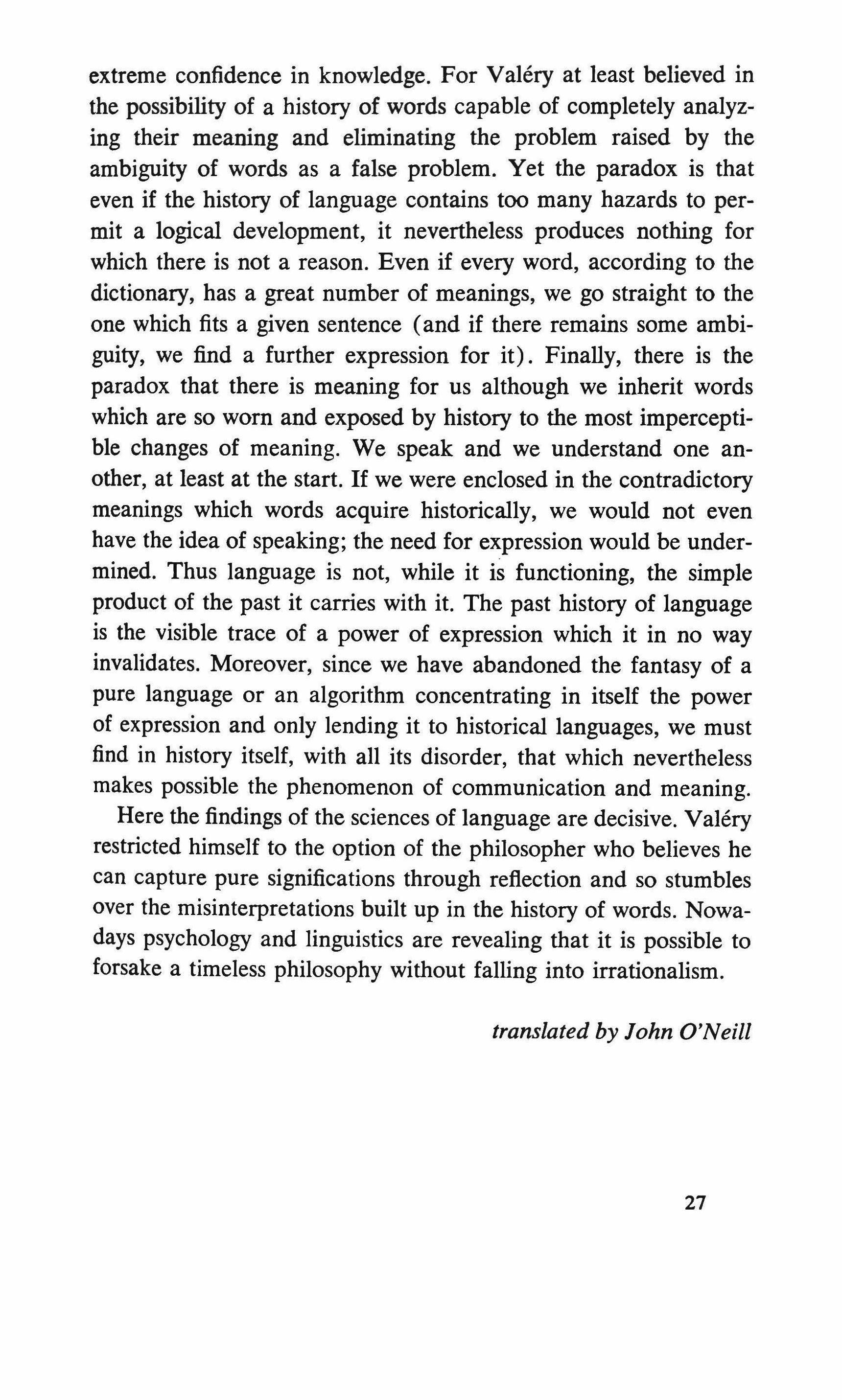
extreme confidence in knowledge. For Valery at least believed in the possibility of a history of words capable of completely analyzing their meaning and eliminating the problem raised by the ambiguity of words as a false problem. Yet the paradox is that even if the history of language contains too many hazards to permit a logical development, it nevertheless produces nothing for which there is not a reason. Even if every word, according to the dictionary, has a great number of meanings, we go straight to the one which fits a given sentence (and if there remains some ambiguity, we find a further expression for it). Finally, there is the paradox that there is meaning for us although we inherit words which are so worn and exposed by history to the most imperceptible changes of meaning. We speak and we understand one another, at least at the start. If we were enclosed in the contradictory meanings which words acquire historically, we would not even have the idea of speaking; the need for expression would be undermined. Thus language is not, while it is functioning, the simple product of the past it carries with it. The past history of language is the visible trace of a power of expression which it in no way invalidates. Moreover, since we have abandoned the fantasy of a pure language or an algorithm concentrating in itself the power of expression and only lending it to historical languages, we must find in history itself, with all its disorder, that which nevertheless makes possible the phenomenon of communication and meaning. Here the findings of the sciences of language are decisive. Valery restricted himself to the option of the philosopher who believes he can capture pure significations through reflection and so stumbles over the misinterpretations built up in the history of words. Nowadays psychology and linguistics are revealing that it is possible to forsake a timeless philosophy without falling into irrationalism.
translated by Iohn O'Neill
27
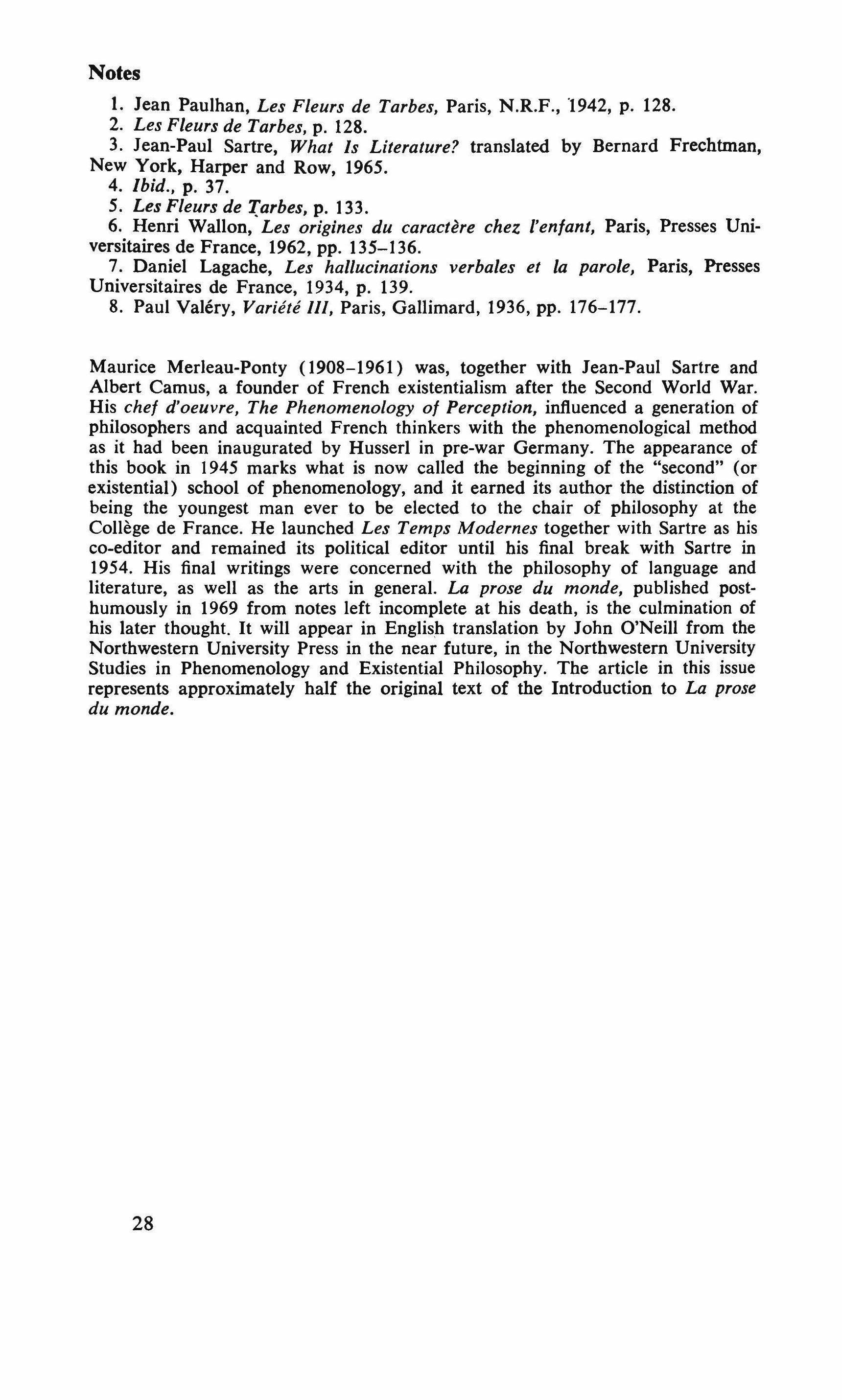
1. Jean Paulhan, Les Fleurs de Tarbes, Paris, N.R.F., 1942, p. 128.
2. Les Fleurs de Tarbes, p. 128.
3. Jean-Paul Sartre, What Is Literature? translated by Bernard Frechtman, New York, Harper and Row, 1965.
4. Ibld., p. 37.
5. Les Fleurs de Tarbes, p. 133.
6. Henri WaHon, Les origines du caractere chez l'enjant, Paris, Presses Universitaires de France, 1962, pp. 135-136.
7. Daniel Lagache, Les hallucinations verbales et la parole, Paris, Presses Universitaires de France, 1934, p. 139.
8. Paul Valery, Variete Ill, Paris, Gallimard, 1936, pp. 176-177.
Maurice Merleau-Ponty (1908-1961) was, together with Jean-Paul Sartre and Albert Camus, a founder of French existentialism after the Second World War. His chei d'oeuvre, The Phenomenology 01 Perception, influenced a generation of philosophers and acquainted French thinkers with the phenomenological method as it had been inaugurated by Husserl in pre-war Germany. The appearance of this book in 1945 marks what is now called the beginning of the "second" (or existential) school of phenomenology, and it earned its author the distinction of being the youngest man ever to be elected to the chair of philosophy at the College de France. He launched Les Temps Modernes together with Sartre as his co-editor and remained its political editor until his final break with Sartre in 1954. His final writings were concerned with the philosophy of language and literature, as well as the arts in general. La prose du monde, published posthumously in 1969 from notes left incomplete at his death, is the culmination of his later thought. It will appear in English translation by John O'Neill from the Northwestern University Press in the near future, in the Northwestern University Studies in Phenomenology and Existential Philosophy. The article in this issue represents approximately half the original text of the Introduction to La prose du monde.
Notes
28
Language and embodiment: an afterword JOHN O'NEILL
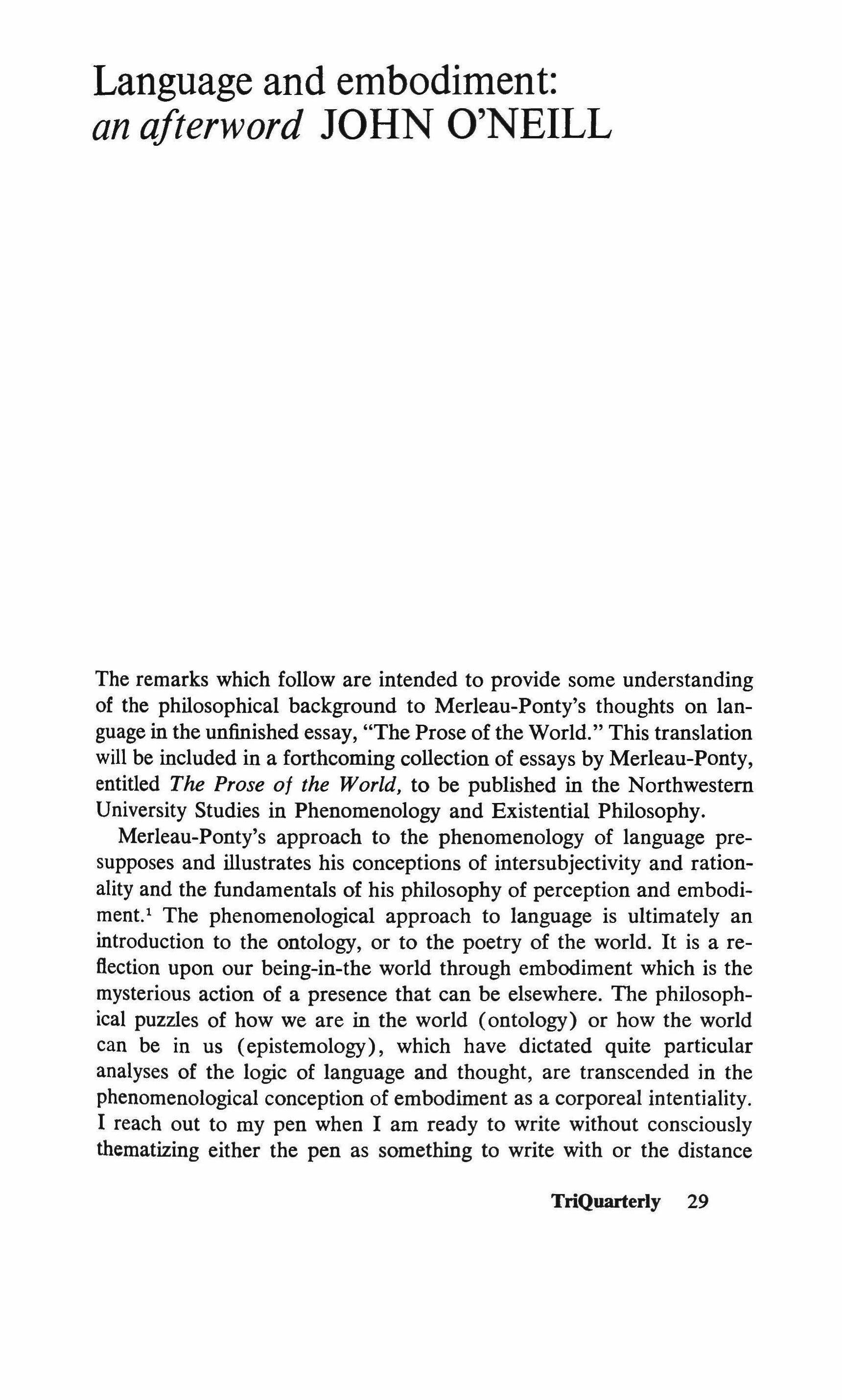
The remarks which follow are intended to provide some understanding of the philosophical background to Merleau-Ponty's thoughts on language in the unfinished essay, "The Prose of the World." This translation will be included in a forthcoming collection of essays by Merleau-Ponty, entitled The Prose of the World, to be published in the Northwestern University Studies in Phenomenology and Existential Philosophy.
Merleau-Ponty's approach to the phenomenology of language presupposes and illustrates his conceptions of intersubjectivity and rationality and the fundamentals of his philosophy of perception and embodiment.' The phenomenological approach to language is ultimately an introduction to the ontology, or to the poetry of the world. It is a reflection upon our being-in-the world through embodiment which is the mysterious action of a presence that can be elsewhere. The philosophical puzzles of how we are in the world (ontology) or how the world can be in us (epistemology), which have dictated quite particular analyses of the logic of language and thought, are transcended in the phenomenological conception of embodiment as a corporeal intentiality. I reach out to my pen when I am ready to write without consciously thematizing either the pen as something to write with or the distance
TriQuarterly 29
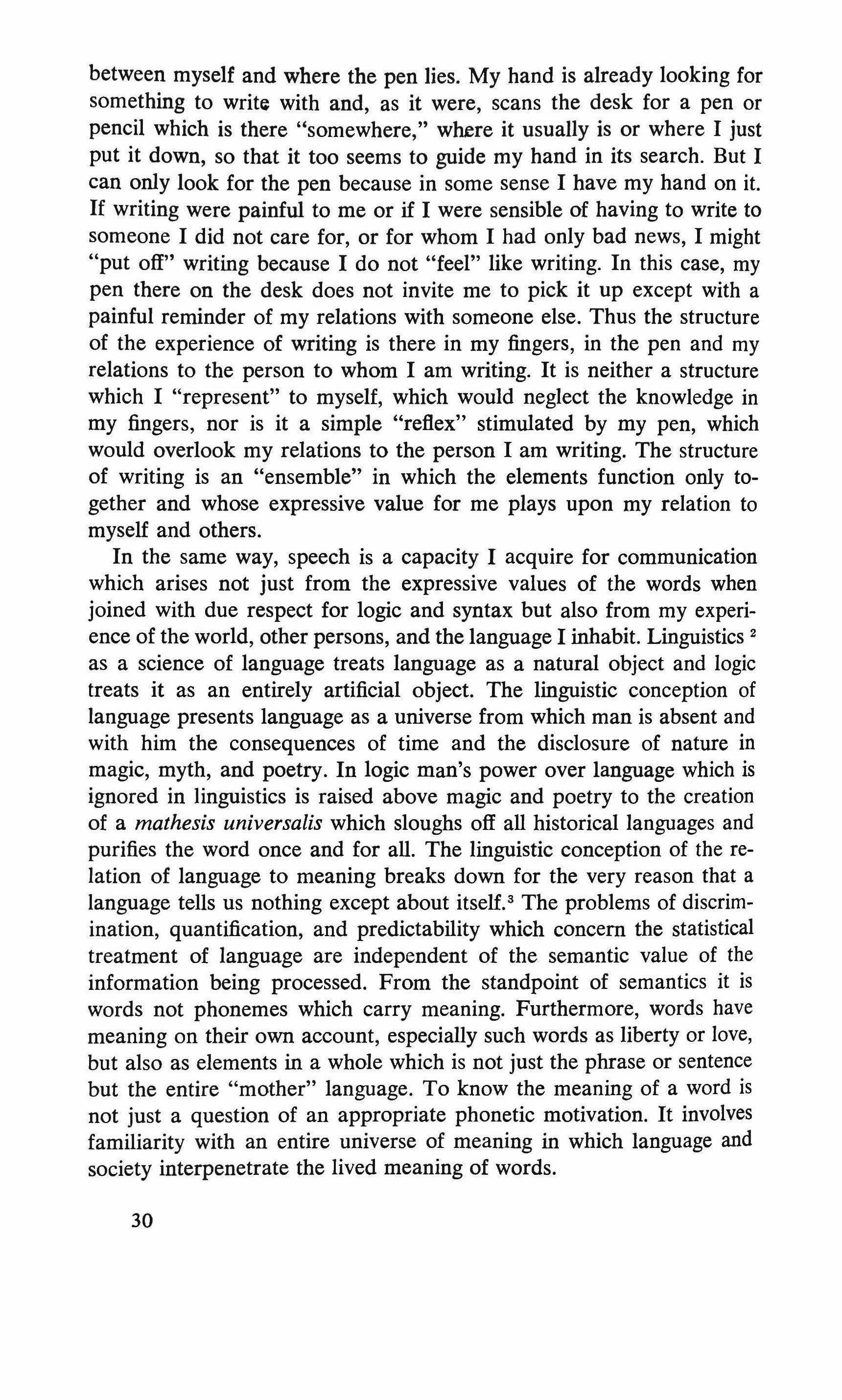
between myself and where the pen lies. My hand is already looking for something to write with and, as it were, scans the desk for a pen or pencil which is there "somewhere," where it usually is or where I just put it down, so that it too seems to guide my hand in its search. But I can only look for the pen because in some sense I have my hand on it. If writing were painful to me or if I were sensible of having to write to someone I did not care for, or for whom I had only bad news, I might "put off" writing because I do not "feel" like writing. In this case, my pen there on the desk does not invite me to pick it up except with a painful reminder of my relations with someone else. Thus the structure of the experience of writing is there in my fingers, in the pen and my relations to the person to whom I am writing. It is neither a structure which I "represent" to myself, which would neglect the knowledge in my fingers, nor is it a simple "reflex" stimulated by my pen, which would overlook my relations to the person I am writing. The structure of writing is an "ensemble" in which the elements function only together and whose expressive value for me plays upon my relation to myself and others.
In the same way, speech is a capacity I acquire for communication which arises not just from the expressive values of the words when joined with due respect for logic and syntax but also from my experience of the world, other persons, and the language I inhabit. Linguistics 2 as a science of language treats language as a natural object and logic treats it as an entirely artificial object. The linguistic conception of language presents language as a universe from which man is absent and with him the consequences of time and the disclosure of nature in magic, myth, and poetry. In logic man's power over language which is ignored in linguistics is raised above magic and poetry to the creation of a mathesis universalis which sloughs off all historical languages and purifies the word once and for all. The linguistic conception of the relation of language to meaning breaks down for the very reason that a language tells us nothing except about itself." The problems of discrimination, quantification, and predictability which concern the statistical treatment of language are independent of the semantic value of the information being processed. From the standpoint of semantics it is words not phonemes which carry meaning. Furthermore, words have meaning on their own account, especially such words as liberty or love, but also as elements in a whole which is not just the phrase or sentence but the entire "mother" language. To know the meaning of a word is not just a question of an appropriate phonetic motivation. It involves familiarity with an entire universe of meaning in which language and society interpenetrate the lived meaning of words.
30

Language like culture is often regarded as a tool or an instrument of thought. But then language is a tool which accomplishes far more and is far less logical than we might like it to be. It is full of ambiguity and in general far too luxuriant for the taste of positivist philosophers. As a tool language seems to use us as much as we use it; and in this it is more like the rest of our general culture, which we cannot use without inhabiting it. Ultimately, language like culture defeats any attempt to conceive it as a system capable of revealing the genesis of its own meaning. This is because we are the language we are talking about. That is to say, we are the material truth of language through our body, which is a natural language. It is through our body that we can speak of the world because the world in tum speaks to us through the body. "In my book the body lives in and moves through space and is the home of a full human personality. The words I write are adapted to express first one of its functions then another. In Lestrygonians the stomach dominates and the rhythm of the episode is that of the peristaltic movement." "But the minds, the thoughts of the characters," I began. "H they had no body they would have no mind," said Joyce. ''It's all one. Walking towards his lunch my hero, Leopold Bloom, thinks of his wife, and says to himself, 'Molly's legs are out of plumb.' At another time of day he might have expressed the same thought without any underthought of food. But I want the reader to understand always through suggestion rather than direct statement." 4
Since human perception falls upon a world in which we are enclosed our expression of the world in language and art can never be a simple introduction to the prose of the world apart from its poetry. We express the world through the poetics of our being-in-the world, beginning with the first act of perception which brings into being the perspective of form and ground through which the invisible and ineffable speaks and becomes visible in us. All other cultural gestures are continuous with the first institution of human labor, speech and art through which the world takes root in us. In this sense, we may consider talk, reading, writing, and love as institutions, that is to say, polarizations of the established and the new. We may, for example, distinguish between the institution of language as an objective structure studied by linguistics and speech, which is the use-value language acquires when turned toward expression and the institution of new meanings. We start by reading an author, leaning at first upon the common associations of his words until, gradually, the words begin to flow in us and to open us to an original sound which is the writer's voice borrowing from us an understanding that until then we did not know was ours to offer. Yet it comes only from what we ourselves brought to the book, our knowledge of the language, of ourselves, and life's questions which we share with the author. Once we have acquired the author's style of thinking
31

our lives interweave in a presence which is the anticipation of the whole of the author's intention and its simultaneous recovery which continues the understanding.' In talking and listening to one another we make an accommodation through language and the body in which we grow older together. We encroach upon one another from each other's time, words, and looks what we are looking for in ourselves. In this way our mind and self may be thought of as an institution which we inhabit with others in a system of presences which includes Socrates or Sartre just as much as our friends in the room.
"When I speak or understand, I experience that presence of others in myself or of myself in others which is the stumbling-block of the theory of intersubjectivity. I experience that presence of what is represented which is the stumbling-block of the theory of time, and I finally understand what is meant by Busserl's enigmatic statement, 'Transcendental subjectivity is intersubjectivity.' To the extent that what I say has meaning, I am a different 'other' for myself when I am speaking; and I understand, I no longer know who is speaking and who is listening." 6
Through language I discover myself and others, in talking, listening, reading, and writing. It is language which makes possible that aesthetic distance between myself and the world through which I can speak about the world and the world in tum speak in me. Our thoughts and purposes are embodied in bodily gestures which in the act of expression structure themselves toward habit and spontaneity, and thus we make our world.
Finally, what we may learn from Merleau-Ponty's approach to the phenomenology of language is that expression is always an act of selfimprovisation in which we borrow from the world, from others, and from our own past efforts. Language is the child in us which speaks of the world in order to know who he is.
Notes
1. John O'Neill, "Perception, Expression and History in the Philosophy of Maurice Merleau-Ponty," Social Research, Vol. 34, No.1, Spring 1967, pp. 47-66.
2. Merleau-Ponty's conception of linguistics depends very much upon his own interpretations of Husserl's views on the ontogenesis of speech and his interpolation of a social psychology to complement Saussure's linguistics. Cf. Maurice Lagueux, "MerIeau-Ponty et la linguistique de Saussure," Dialogue, Canadian Philosophical Review, Vol. IV, No.3, 1965, pp. 351-364.
3. For the relations between language, linguistics, logic, and semantics see Mikel Dufrenne, Language and Philosophy, translated by Henry B. Veatch with a Foreword by Paul Henle, Bloomington, Indiana University Press, 1963.
4. Frank Budgen, James Joyce and the Making of Ulysses, Bloomington, Indiana University Press, 1960, p. 21.
5. Maurice MerIeau-Ponty, "On the Phenomenology of Language," Signs, translated by Richard C. McCleary, Evanston, Northwestern University Press, 1964.
6. Signs, p. 97.
32
Abecedarium culturae: structuralism, absence, writing
EDWARD w. SAID
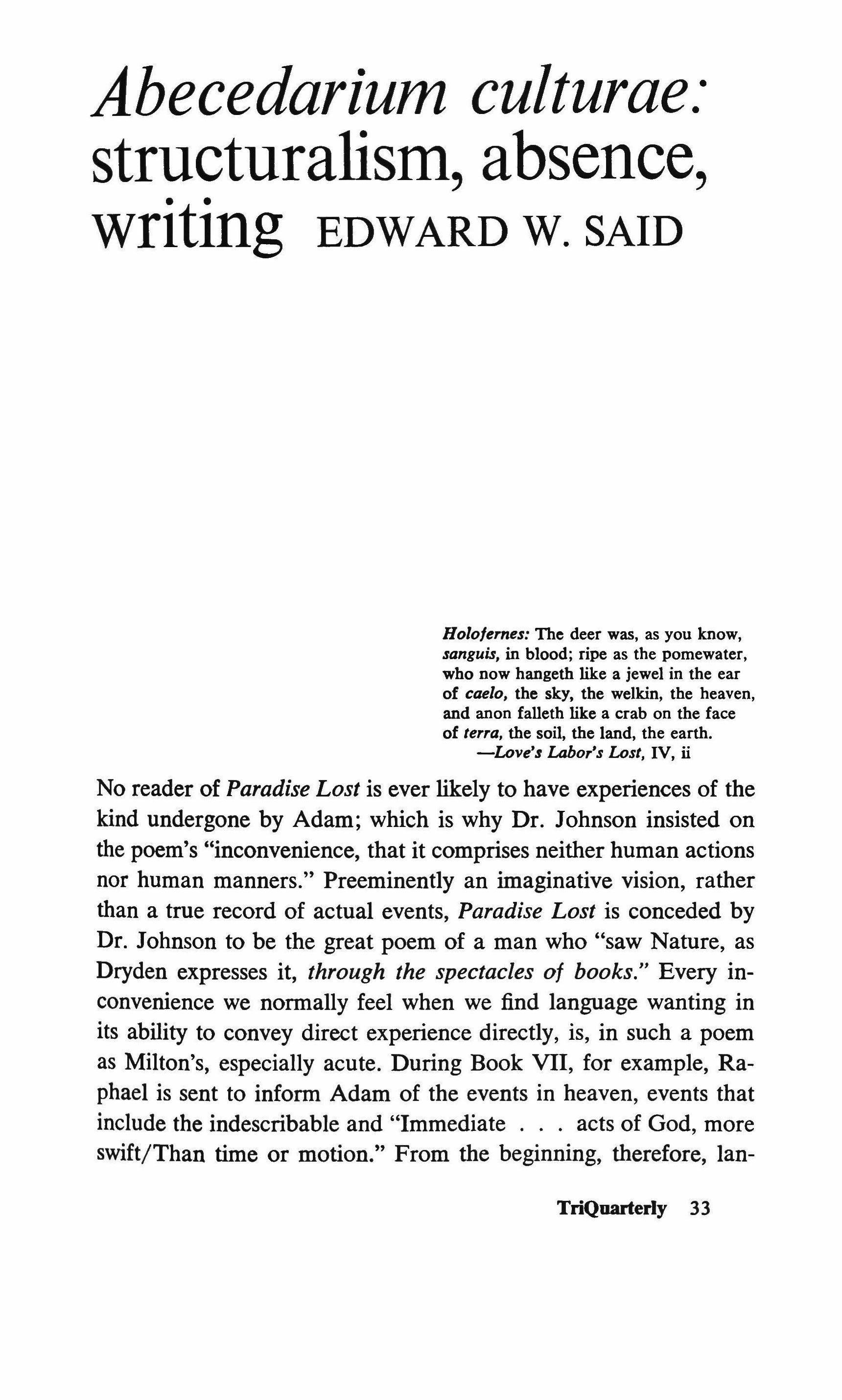
Holoiemes: The deer was, as you know, sanguis, in blood; ripe as the pomewater, who now hangeth like a jewel in the ear of caelo, the sky, the welkin, the heaven, and anon falleth like a crab on the face of terra, the soil, the land, the earth. -Love's Labor's Lost, IV, ii
No reader of Paradise Lost is ever likely to have experiences of the kind undergone by Adam; which is why Dr. Johnson insisted on the poem's "inconvenience, that it comprises neither human actions nor human manners." Preeminently an imaginative vision, rather than a true record of actual events, Paradise Lost is conceded by Dr. Johnson to be the great poem of a man who "saw Nature, as Dryden expresses it, through the spectacles of books." Every inconvenience we normally feel when we find language wanting in its ability to convey direct experience directly, is, in such a poem as Milton's, especially acute. During Book VII, for example, Raphael is sent to inform Adam of the events in heaven, events that include the indescribable and "Immediate acts of God, more swift/Than time or motion." From the beginning, therefore, lan-
TriQuarterJy 33
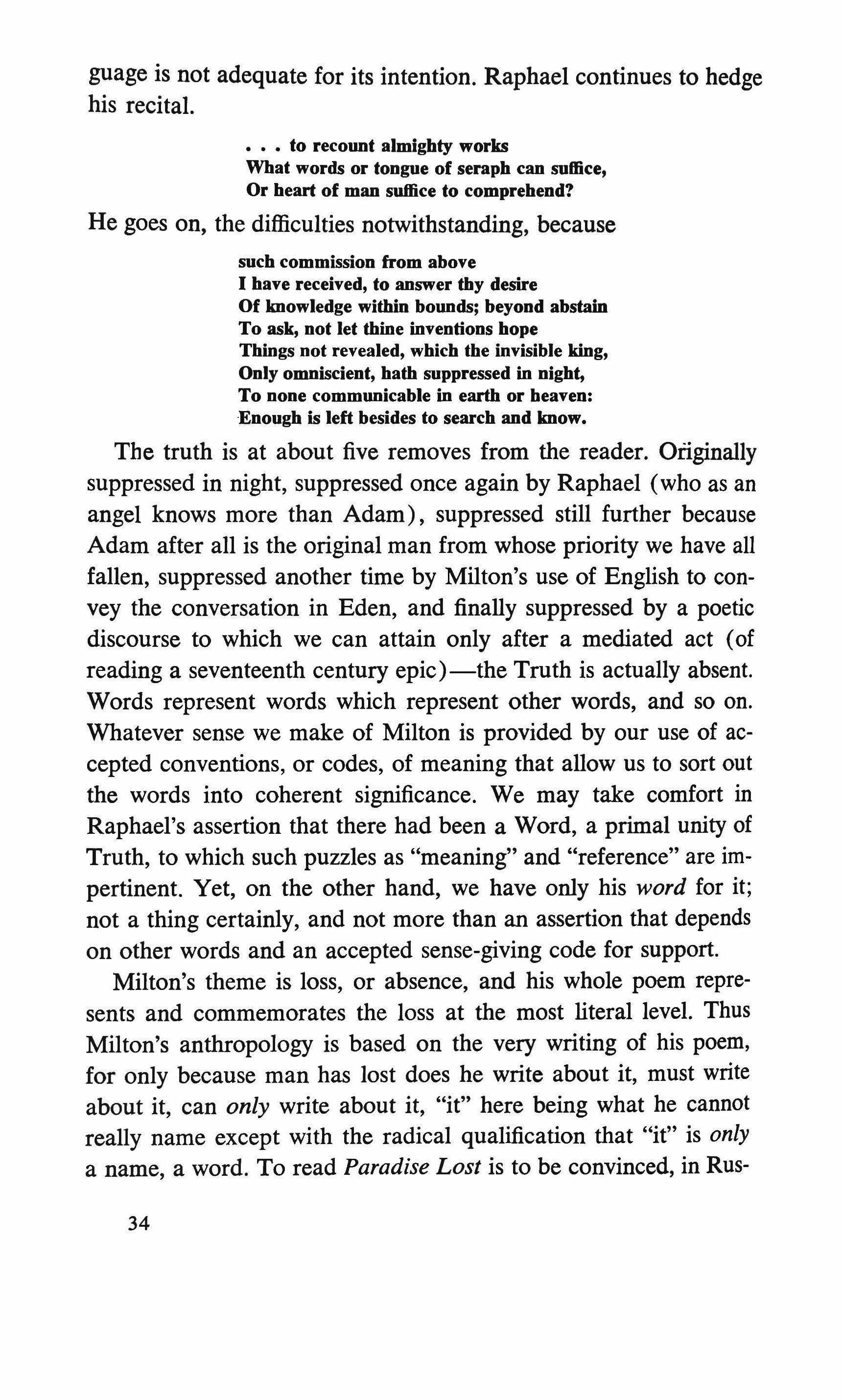
guage is not adequate for its intention. Raphael continues to hedge his recital.
to recount almighty works
What words or tongue of seraph can suffice, Or heart of man suffice to comprehend?
He goes on, the difficulties notwithstanding, because such commission from above
I have received, to answer thy desire Of knowledge within bounds; beyond abstain
To ask, not let thine inventions hope Things not revealed, which the invisible king, Only omniscient, hath suppressed in night, To none communicable in earth or heaven: Enough is left besides to search and know.
The truth is at about five removes from the reader. Originally suppressed in night, suppressed once again by Raphael (who as an angel knows more than Adam), suppressed still further because Adam after all is the original man from whose priority we have all fallen, suppressed another time by Milton's use of English to convey the conversation in Eden, and finally suppressed by a poetic discourse to which we can attain only after a mediated act (of reading a seventeenth century epic)-the Truth is actually absent. Words represent words which represent other words, and so on. Whatever sense we make of Milton is provided by our use of accepted conventions, or codes, of meaning that allow us to sort out the words into coherent significance. We may take comfort in Raphael's assertion that there had been a Word, a primal unity of Truth, to which such puzzles as "meaning" and "reference" are impertinent. Yet, on the other hand, we have only his word for it; not a thing certainly, and not more than an assertion that depends on other words and an accepted sense-giving code for support.
Milton's theme is loss, or absence, and his whole poem represents and commemorates the loss at the most literal level. Thus Milton's anthropology is based on the very writing of his poem, for only because man has lost does he write about it, must write about it, can only write about it, "it" here being what he cannot really name except with the radical qualification that "it" is only a name, a word. To read Paradise Lost is to be convinced, in Rus-
34

kin's phrase, of the idea of power: by its sheer duration and presence, and by its capacity for making sense despite the absence at its center, Milton's verse seems to have overpowered the void within it. Only when one questions the writing literally does the obvious disjunction between words and reality become troublesome. Words are endless analogies for each other. Outside the monotonous sequence of analogies, we presume, is a primeval Origin, but that, like Paradise, is lost forever. Language is a sequel to or supplement of the beginning event, man's Fall: language is one of the actions that succeeds the lost Origin. Human discourse, like Paradise Lost, lives with the memory of origins long since violently cut off from it: having begun, discourse can never recover its origins in the unity and unspoken Word of God's Being. This, we know, is the human paradigm incarnated in Paradise Lost.
Dr. Johnson's reservations about the poem do not prevent him from reading it; the common-sense difficulties he experiences (the poem's length, the lack in it of human interest) are to him adjuncts to, examples of, Milton's intransigence that trouble Milton's poetic achievement. When, however, Milton's great poem is read with the disquieting sense that what we are watching in the poem is an "ontology of nothingness" l-an infinite regress of truths permanently hidden behind words-then we accept the governing awareness of French structuralism. For while it is, I think, inappropriate to force an ideological unity upon the structuralists, it is apt to see them the way they very often see others, as inhabiting and constituting a certain level of consciousness with its own sense of difference from others, its own idioms, patterns, ambitions, and narrative rhythm.
Of them all, it is Michel Foucault who has become, in Roland Barthes' words, the very thing his works describe: 2 a consciousness awakened to the troubled conditions of modern knowledge. 3 Foucault is, to use Blackmur's phrase, a technique of trouble. As history is gradually unveiled in Foucault's work, we do not watch an easy chronicle of events but a succession of functional conditions that enable the existence not only of knowledge, but of man himself: 4 hence the subtitle "an archaeology of human sciences" to 3S

Les Mots et les choses. Permanently hampered by language, which is the first, and in a sense the last, instrument at its disposal, Foucault's job of getting to the bottom yields only the repeated and much-modulated assertion that man is a temporary interruption, a figure of thought, of the already-begun (le deja commence). Any human investigation (and here the relevance of Wittgenstein's later work is crucial) is actually bound up in the nature of language. The interpretation of evidence, for example, is exegesis. But when we ask the question "exegesis of what?" we commit ourselves totally to a perpetual series of the preposition 0/; the modern form of criticism, according to Foucault, is philology as an analysis of what is being said in the depth of the discourse." Just as there is no beginning to the process of exegesis, there is also no end:
In the sixteenth century, interpretation went from the world (things and a text at the same time) to the divine Word which was deciphered in the world; our Interpretation, the one which in any case has been ours since the nineteenth century, goes from men, from God, from knowledge or chimeras, to the words that make them aU possible; and what is discovered is not the sovereignty of a primal dis· course but the fact that before the least of our utterances, we have already been dominated and paralyzed by language.s
The drama of Foucault's work is that he is always coming to terms with language as both the constricting horizon and the energizing atmosphere within and by which all human activity must be understood. Two of Foucault's major works (Histoire de fa folie a l'age classique and Les Mots et les chases) describe respectively how language has permitted the social discriminations of "otherness," and the cognitive connections between the orders of "sameness"; in the former work it is madness, isolated in a silence outside rational language, that is made by society to carry the weight of an alienated "otherness," and in the latter work it is through the powers of language that words are made into a universal collection of signs for everything. As with most of the structuralists Foucault must presume a conceptual unity-variously called an epistemological field, an epistemological unity, or episteme-that anchors and informs linguistic usage at any given time in history; yet to the structuralists' credit it must also be said that the presumption is often made with no attempt to palm it off as anything more than a
36
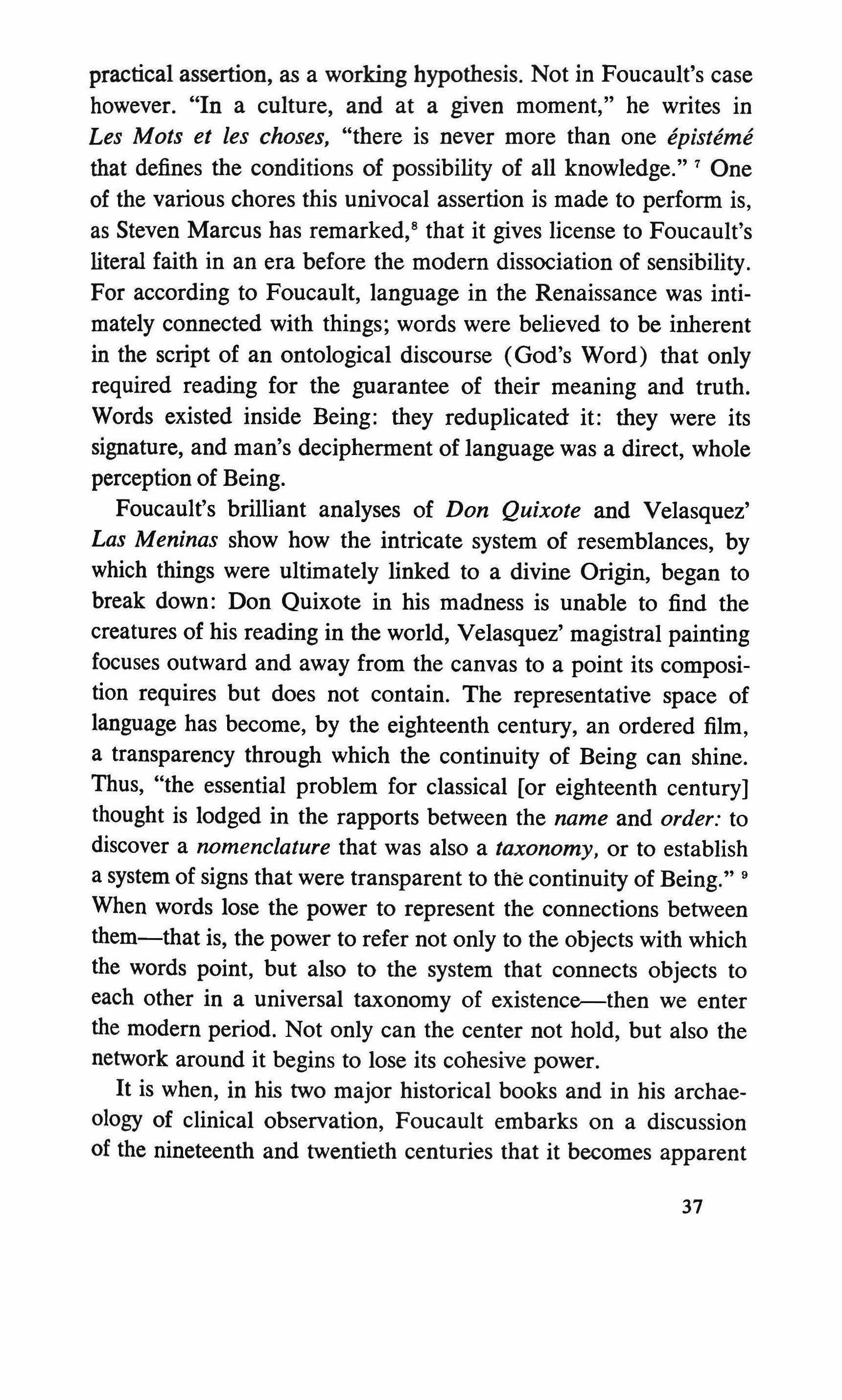
practical assertion, as a working hypothesis. Not in Foucault's case however. "In a culture, and at a given moment," he writes in Les Mots et les chases, "there is never more than one episteme that defines the conditions of possibility of all knowledge." 7 One of the various chores this univocal assertion is made to perform is, as Steven Marcus has remarked," that it gives license to Foucault's literal faith in an era before the modem dissociation of sensibility. For according to Foucault, language in the Renaissance was intimately connected with things; words were believed to be inherent in the script of an ontological discourse (God's Word) that only required reading for the guarantee of their meaning and truth. Words existed inside Being: they reduplicated it: they were its signature, and man's decipherment of language was a direct, whole perception of Being.
Foucault's brilliant analyses of Don Quixote and Velasquez' Las Meninas show how the intricate system of resemblances, by which things were ultimately linked to a divine Origin, began to break down: Don Quixote in his madness is unable to find the creatures of his reading in the world, Velasquez' magistral painting focuses outward and away from the canvas to a point its composition requires but does not contain. The representative space of language has become, by the eighteenth century, an ordered film, a transparency through which the continuity of Being can shine. Thus, "the essential problem for classical [or eighteenth century] thought is lodged in the rapports between the name and order: to discover a nomenclature that was also a taxonomy, or to establish a system of signs that were transparent to the continuity of Being." 9 When words lose the power to represent the connections between them-that is, the power to refer not only to the objects with which the words point, but also to the system that connects objects to each other in a universal taxonomy of existence-then we enter the modern period. Not only can the center not hold, but also the network around it begins to lose its cohesive power.
It is when, in his two major historical books and in his archaeology of clinical observation, Foucault embarks on a discussion of the nineteenth and twentieth centuries that it becomes apparent
37

how much his vision of history preceding the modern age is projected back from his apprehension of the contemporary. For like every one of the structuralists, Foucault is obsessed with the inescapable fact of ontological discontinuity. In language, for example, "the thing being represented falls outside of the representation itself"; 10 thus the signifying power of language far exceeds, indeed overwhelms, what is being signified. Another example: the emergence of the idea of man (whose advent Foucault associates exclusively with the early nineteenth century) coincides with the breakdown in the representative power of language. Man therefore is what essentially resists language; he becomes what Foucault calls an "empirico-transcendent doublet," 11 two parallel zones of actual raw human experience on the one hand and human transcendence on the other, that together are alien to discourse. And discourse is the "analytic of finitude" which comprises modern knowledge and which is made possible by man's alienation from it, for, according to Foucault, the discourse of modern knowledge always hungers for what it cannot fully grasp or totally represent. Thus knowledge is perpetually in search of its elusive subject. Here again the fact of discontinuity--or difference, as it is also called-is paramount.
Finally, the densely and portentously argued theme of Les Mots et les choses (a book whose literary and philosophical implications are almost frighteningly vast) is occupied with the vacant spaces between things, words, ideas. In the eighteenth century the possibility of representing things in space-as in a painting--derived from the acceptance of temporal succession which thereby allowed the constitution of spatial simultaneity; the fact that objects could exist together in the privileged space of a painting depended upon an unquestioned belief in the continuing forward movement of time. Spatial togetherness was conceived to be an emanation out of temporal succession. Yet in the modern era the profound sense of spatial distance between things, that separates like things from each other, permits the modern mind to contemplate time as only a dream of succession, as a promise of unity or of a return to the Origin." Above all, time is the most tenuous of the spatial con-
38
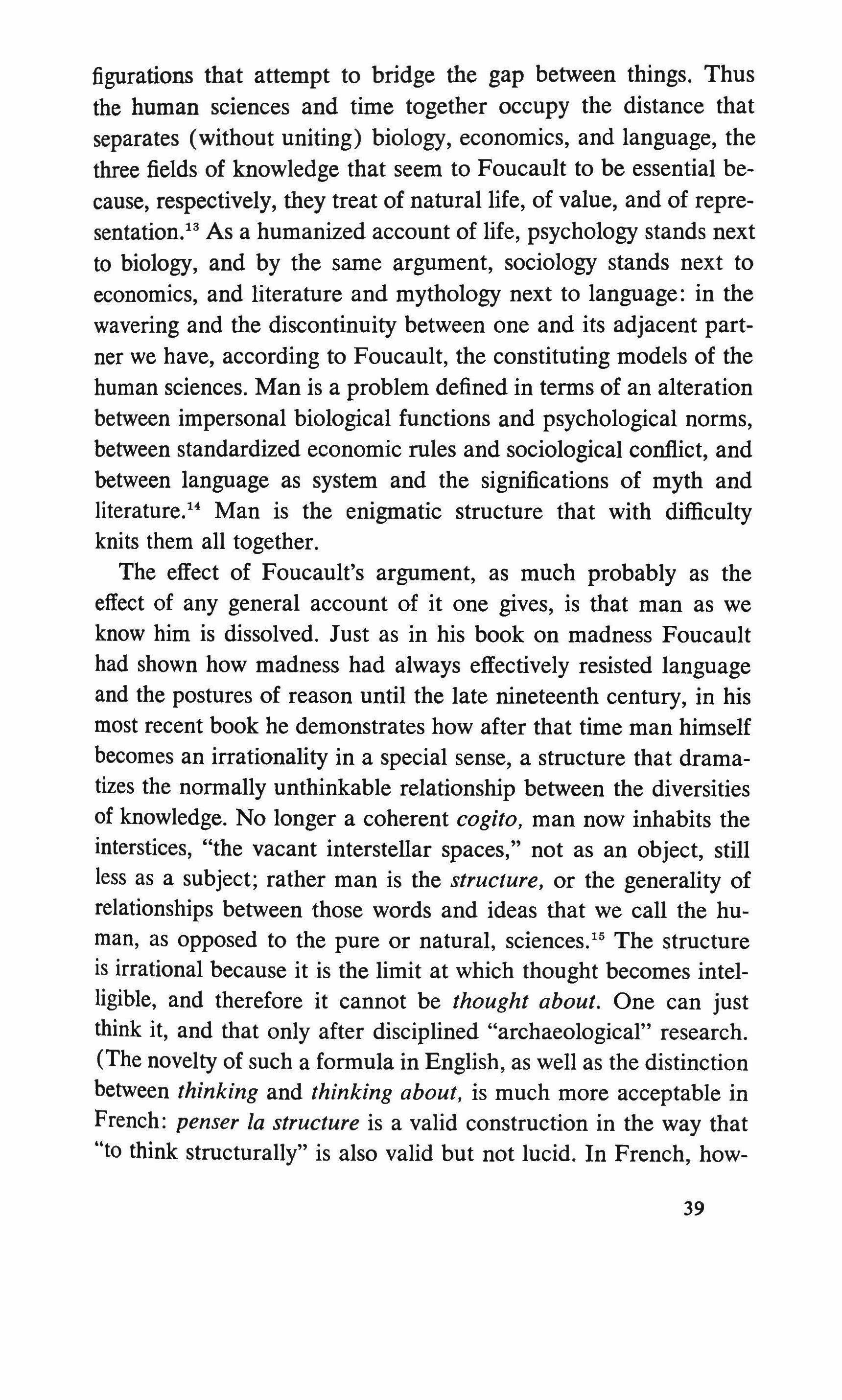
figurations that attempt to bridge the gap between things. Thus the human sciences and time together occupy the distance that separates (without uniting) biology, economics, and language, the three fields of knowledge that seem to Foucault to be essential because, respectively, they treat of natural life, of value, and of representation." As a humanized account of life, psychology stands next to biology, and by the same argument, sociology stands next to economics, and literature and mythology next to language: in the wavering and the discontinuity between one and its adjacent partner we have, according to Foucault, the constituting models of the human sciences. Man is a problem defined in terms of an alteration between impersonal biological functions and psychological norms, between standardized economic rules and sociological conflict, and between language as system and the significations of myth and literature." Man is the enigmatic structure that with difficulty knits them all together.
The effect of Foucault's argument, as much probably as the effect of any general account of it one gives, is that man as we know him is dissolved. Just as in his book on madness Foucault had shown how madness had always effectively resisted language and the postures of reason until the late nineteenth century, in his most recent book he demonstrates how after that time man himself becomes an irrationality in a special sense, a structure that dramatizes the normally unthinkable relationship between the diversities of knowledge. No longer a coherent cogito, man now inhabits the interstices, "the vacant interstellar spaces," not as an object, still less as a subject; rather man is the structure, or the generality of relationships between those words and ideas that we call the human, as opposed to the pure or natural, sciences." The structure is irrational because it is the limit at which thought becomes intelligible, and therefore it cannot be thought about. One can just think it, and that only after disciplined "archaeological" research. (The novelty of such a formula in English, as well as the distinction between thinking and thinking about, is much more acceptable in French: penser la structure is a valid construction in the way that "to think structurally" is also valid but not lucid. In French, how-
39

ever, it is easier to argue-as Foucault and the structuralists dothat thinking about is reflexive, and hence rational, whereas thinking itself is mere activity, and hence irrational.) Knowledge therefore is a closed system of knowledge for or of man by man. And, finally, since knowledge can only be formulated in language, linguistics becomes more a perception than an explanation of man: 16 man is the positive domain, the field, of science and knowledge, but he is not the object of science."
One can therefore say that there is a ''human science" not simply wherever man is concerned, but rather wherever one analyzes, in the appropriate dimension of the non-conscious, those norms, rules, and significant ensembles that reveal to consciousness the conditions and the forms of its ceatents.ie
The eccentricity of so bleak and anti-humanistic a view of man is reflected even in Foucault's prose. Despite the frequently astonishing lucidity of his dissections of intellectual ventures from Cervantes through Linnaeus and Adam Smith to Nietzsche and Freud, one is overcome by a prose style whose grasp of an author or idea is exceedingly particular but whose direction and aspirations are tremendously general: like Holofernes, Foucault is usually to be found overglancing the superscript. For if, by tradition and education, we are trained to take man as the concrete universal, the pivot and center of awareness, then in Foucault's prose, and concurrently by his argument, we are made to lose our grip on man. If we are inclined to think of man as an entity resisting the flux of experience, then because of Foucault and of linguistics, ethnology, and psychoanalysis man is dissolved in the overarching waves, the quanta, the striations of language itself, turning finally into little more than a constituted subject, a speaking pronoun, fixed indecisively in the eternal, ongoing rush of discourse.
Foucault's man is well described in Roland Barthes' clever phrase, "a metaphor without brakes" (metaphore sans [rein)," There is an uncanny resemblance between this view of man and that other remarkable dissolution of man in discourse which is Conrad's Heart of Darkness. After having described Kurtz as "just a word for me," Marlow continues:
40
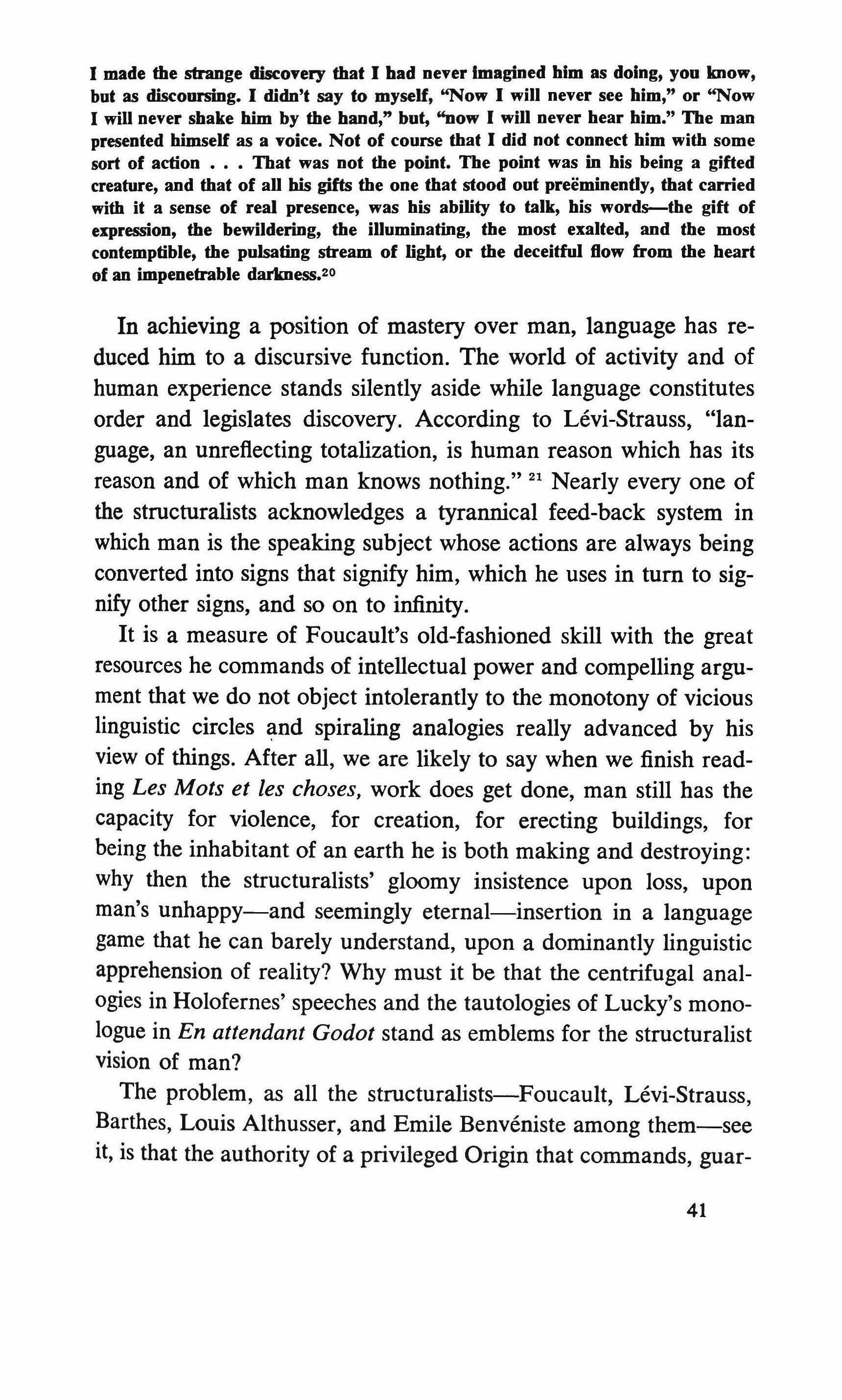
I made the strange discovery that I had never Imagined him as doing, you know, but as discoursing. I didn't say to myseH, "Now I will never see him," or "Now I will never shake him by the hand," but, "now I will never hear him." The man presented himseH as a voice. Not of course that I did not connect him with some sort of action That was not the point. The point was in his being a gifted creature, and that of aU his gifts the one that stood out preeminently, that carried with it a sense of real presence, was his ability to talk, his words-the gift of expression, the bewildering, the illuminating, the most exalted, and the most contemptible, the pulsating stream of light, or the deceitful flow from the heart of an impenetrable darlmess.20
In achieving a position of mastery over man, language has reduced him to a discursive function. The world of activity and of human experience stands silently aside while language constitutes order and legislates discovery. According to Levi-Strauss, "language, an unreflecting totalization, is human reason which has its reason and of which man knows nothing." 21 Nearly every one of the structuralists acknowledges a tyrannical feed-back system in which man is the speaking subject whose actions are always being converted into signs that signify him, which he uses in tum to signify other signs, and so on to infinity.
It is a measure of Foucault's old-fashioned skill with the great resources he commands of intellectual power and compelling argument that we do not object intolerantly to the monotony of vicious linguistic circles and spiraling analogies really advanced by his view of things. After all, we are likely to say when we finish reading Les Mots et les chases, work does get done, man still has the capacity for violence, for creation, for erecting buildings, for being the inhabitant of an earth he is both making and destroying: why then the structuralists' gloomy insistence upon loss, upon man's unhappy-and seemingly eternal-insertion in a language game that he can barely understand, upon a dominantly linguistic apprehension of reality? Why must it be that the centrifugal analogies in Holofernes' speeches and the tautologies of Lucky's monologue in En attendant Godot stand as emblems for the structuralist vision of man?
The problem, as all the structuralists-Foucault, Levi-Strauss, Barthes, Louis Althusser, and Emile Benveniste among them-see it, is that the authority of a privileged Origin that commands, guar-
41

antees, and perpetuates meaning has been removed. Why this has happened does not seem as important as the fact of its happening, and this fact, as we saw, is already accepted in Paradise Lost. In other words, man now lives in a circle without a center, or in a maze without a way out. If, for example, we try to think of action's beginning we must articulate the beginning in language. And since language for us is a system of written signs, the "first" sign is a momentary exigency of the discourse, never an absolute terminal. So there is no such thing as a beginning for language; or, if there is one, it is an unthinkable event since, as Emile Benveniste puts it in one of his trenchant essays, we cannot think without language," and language makes only a token concession to a beginning. The categories of thought and language are identical. To complicate matters further, we generally locate origins before beginnings, since the Origin is a state from which the beginnings of action move forward: retrospectively considered, then, the Origin is a condition or state that permits beginning. Foucault's way of showing the loss both of a beginning and of the Origin behind it is to study the way in which eighteenth century thought about language underwent massive change during the nineteenth century. Whereas during the classical age the derivation, designation, and articulation of words were thought to be functions of the consistent transparency by which words reflected Being, in the nineteenth century derivation gave up its place to a mere theory of linguistic families (in the work of the German philologist Bopp) designation ceded to a theory of verbal radicals, and articulation was replaced by a theory of internal variations within language." Being, in short, was swallowed up in the internal analysis of language.
As a result of these momentous changes, words now simply double back on themselves: this is why the verb dedoubler turns up incessantly in all structuralist writing. It is no longer possible either to designate a beginning or to think of an origin except, in both cases, as concessions to the empty fact of priority. Strictly speaking, a beginning to a modern mind only occupies the temporal place in thought that a speaking subject would in a passage of
42
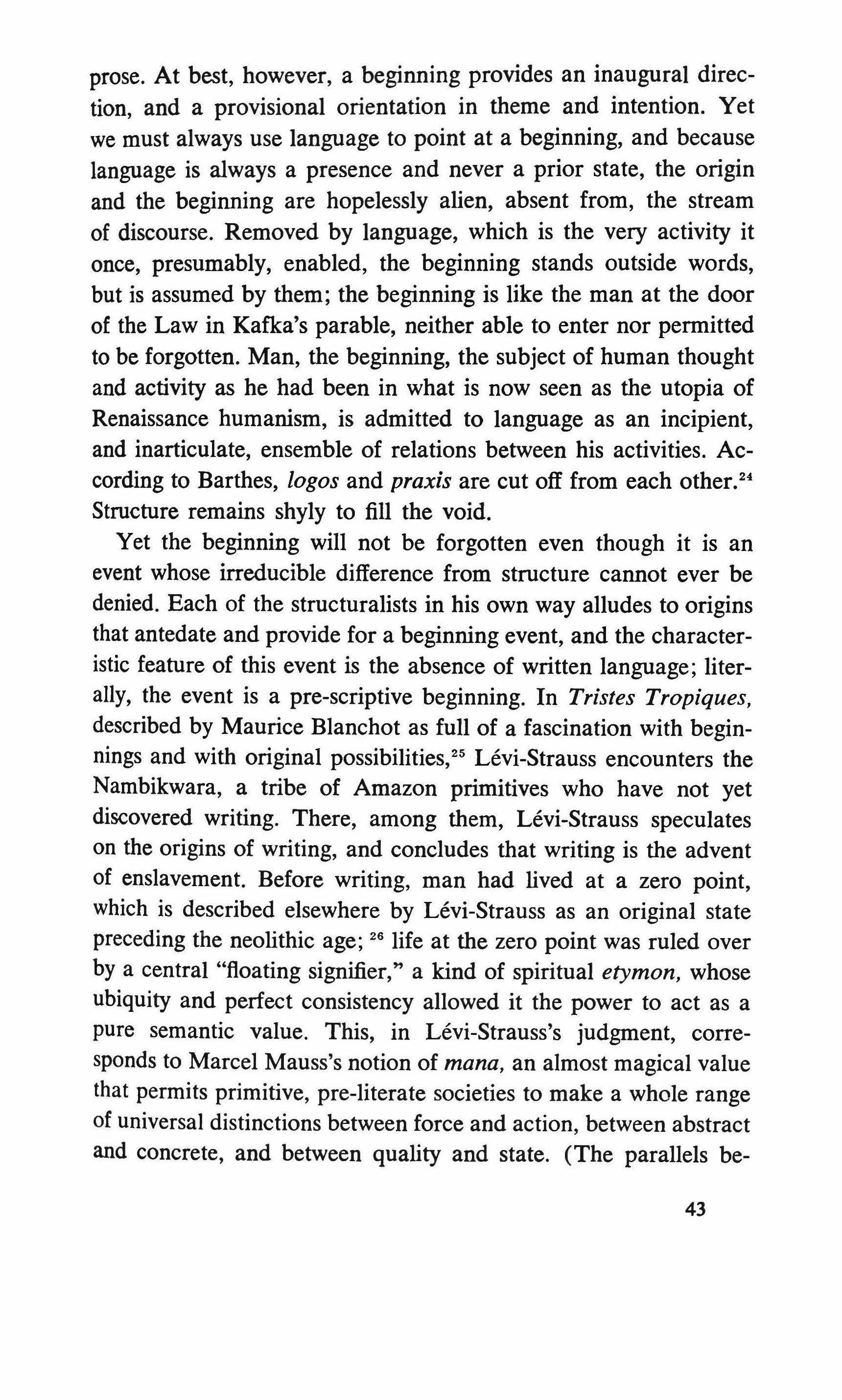
prose. At best, however, a beginning provides an inaugural direction, and a provisional orientation in theme and intention. Yet we must always use language to point at a beginning, and because language is always a presence and never a prior state, the origin and the beginning are hopelessly alien, absent from, the stream of discourse. Removed by language, which is the very activity it once, presumably, enabled, the beginning stands outside words, but is assumed by them; the beginning is like the man at the door of the Law in Kafka's parable, neither able to enter nor permitted to be forgotten. Man, the beginning, the subject of human thought and activity as he had been in what is now seen as the utopia of Renaissance humanism, is admitted to language as an incipient, and inarticulate, ensemble of relations between his activities. According to Barthes, logos and praxis are cut off from each other." Structure remains shyly to fill the void.
Yet the beginning will not be forgotten even though it is an event whose irreducible difference from structure cannot ever be denied. Each of the structuralists in his own way alludes to origins that antedate and provide for a beginning event, and the characteristic feature of this event is the absence of written language; literally, the event is a pre-scriptive beginning. In Tristes Tropiques, described by Maurice Blanchot as full of a fascination with beginnings and with original possibilities," Levi-Strauss encounters the Nambikwara, a tribe of Amazon primitives who have not yet discovered writing. There, among them, Levi-Strauss speculates on the origins of writing, and concludes that writing is the advent of enslavement. Before writing, man had lived at a zero point, which is described elsewhere by Levi-Strauss as an original state preceding the neolithic age; 26 life at the zero point was ruled over by a central "floating signifier," a kind of spiritual etymon, whose ubiquity and perfect consistency allowed it the power to act as a pure semantic value. This, in Levi-Strauss's judgment, corresponds to Marcel Mauss's notion of mana, an almost magical value that permits primitive, pre-literate societies to make a whole range of universal distinctions between force and action, between abstract and concrete, and between quality and state. (The parallels be-
43

tween pre-literalism and Eden before the Fall are fascinating indeed). One beautifully functional key, mana, therefore unlocks every signifier because it is the Origin of all signifiers.
The point here, however, is that Levi-Strauss is attempting, like Foucault in his analysis of madness, to describe a society and a state to which civilized man can have no real access; this partially explains the enigmatic use of words like magic and zero, as well as the quasi-fantastic air running through these descriptions. Because the observing ethnologist is a product of literate society, and because anthropology itself is subject to the enslaving laws of literacy, the zero-state is a forbidden paradise to which literacy penetrates only at the same critical moment that the paradise is being obliterated. In the encounter between pre-literacy and literacy the latter always wins; the illiterate natives learn how to write. In teaching the primitives (a process recorded with moving philosophic precision in Tristes Tropiques) civilization disturbs the equanimity and calm of a univocal society in which spoken words and concrete objects had been intertwined in a complex but profoundly logical unity. For a while, nevertheless, the ethnologist can observe a society making its traumatic entry at the beginning of literacy, leaving the zero-Origin behind it forever. (The tragedy is, as Levi-Strauss observed in a recent essay, that anthropology inevitably brings and forcibly introduces writing to primitive society-in a kind of rape-thereby destroying once and for all a peace never again to be enjoyed in non-literate solitude.")
To sum up, then, the process is as follows: zero, followed by the beginning of writing (literacy), followed by enslavement, which is our present situation. Writing means submission to the logic of language, and the loss of a central and univocal resource of meaning.
There are two primitive states. One, the zero stability of preliterate society, the other the moment at which writing begins to be learned: in fine, the Origin, and the beginning. Yet only one can be actually described (in writing, of course) by the field anthropologist who is recording its loss, and metaphorically evoked by the linguist who notes its absence: and this is the beginning,
44
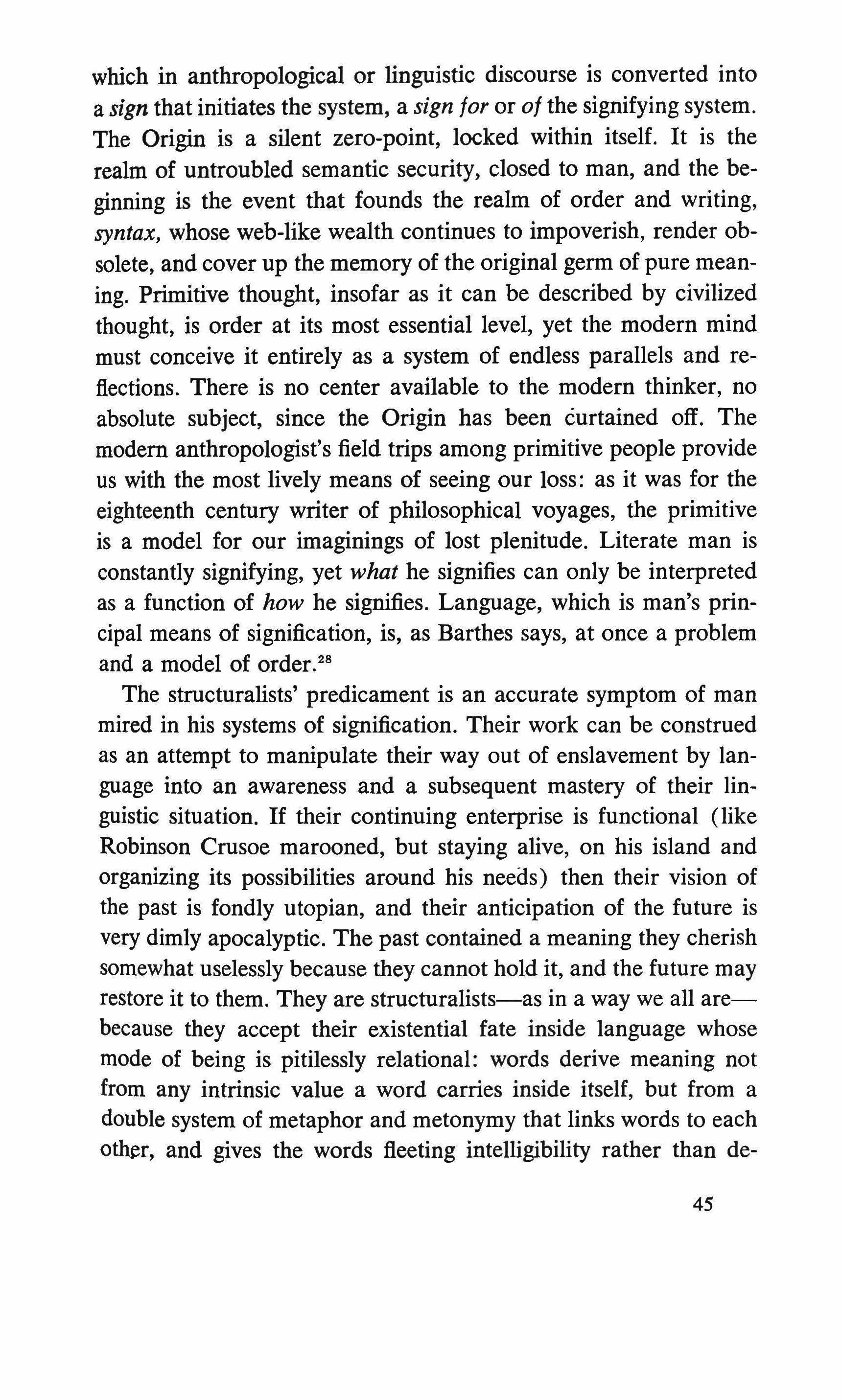
which in anthropological or linguistic discourse is converted into a sign that initiates the system, a sign for or of the signifying system. The Origin is a silent zero-point, locked within itself. It is the realm of untroubled semantic security, closed to man, and the beginning is the event that founds the realm of order and writing, syntax, whose web-like wealth continues to impoverish, render obsolete, and cover up the memory of the original germ of pure meaning. Primitive thought, insofar as it can be described by civilized thought, is order at its most essential level, yet the modern mind must conceive it entirely as a system of endless parallels and reflections. There is no center available to the modern thinker, no absolute subject, since the Origin has been curtained off. The modem anthropologist's field trips among primitive people provide us with the most lively means of seeing our loss: as it was for the eighteenth century writer of philosophical voyages, the primitive is a model for our imaginings of lost plenitude. Literate man is constantly signifying, yet what he signifies can only be interpreted as a function of how he signifies. Language, which is man's principal means of signification, is, as Barthes says, at once a problem and a model of order."
The structuralists' predicament is an accurate symptom of man mired in his systems of signification. Their work can be construed as an attempt to manipulate their way out of enslavement by language into an awareness and a subsequent mastery of their linguistic situation. If their continuing enterprise is functional (like Robinson Crusoe marooned, but staying alive, on his island and organizing its possibilities around his needs) then their vision of the past is fondly utopian, and their anticipation of the future is very dimly apocalyptic. The past contained a meaning they cherish somewhat uselessly because they cannot hold it, and the future may restore it to them. They are structuralists-as in a way we all arebecause they accept their existential fate inside language whose mode of being is pitilessly relational: words derive meaning not from any intrinsic value a word carries inside itself, but from a double system of metaphor and metonymy that links words to each other, and gives the words fleeting intelligibility rather than de-
45
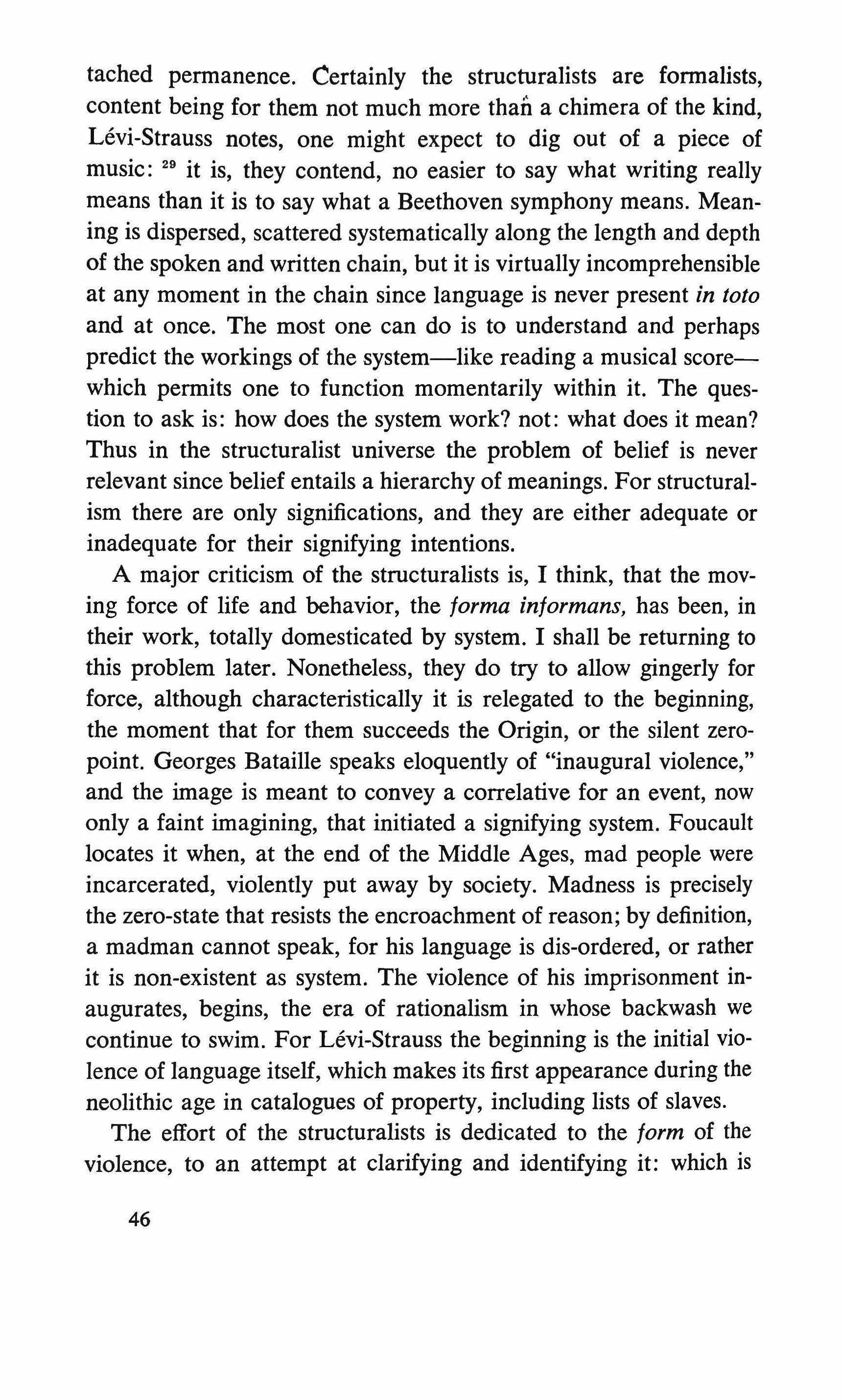
tached permanence. Certainly the structuralists are formalists, content being for them not much more than a chimera of the kind, Levi-Strauss notes, one might expect to dig out of a piece of music: 29 it is, they contend, no easier to say what writing really means than it is to say what a Beethoven symphony means. Meaning is dispersed, scattered systematically along the length and depth of the spoken and written chain, but it is virtually incomprehensible at any moment in the chain since language is never present in toto and at once. The most one can do is to understand and perhaps predict the workings of the system-like reading a musical scorewhich permits one to function momentarily within it. The question to ask is: how does the system work? not: what does it mean? Thus in the structuralist universe the problem of belief is never relevant since belief entails a hierarchy of meanings. For structuralism there are only significations, and they are either adequate or inadequate for their signifying intentions.
A major criticism of the structuralists is, I think, that the moving force of life and behavior, the forma informans, has been, in their work, totally domesticated by system. I shall be returning to this problem later. Nonetheless, they do try to allow gingerly for force, although characteristically it is relegated to the beginning, the moment that for them succeeds the Origin, or the silent zeropoint. Georges Bataille speaks eloquently of "inaugural violence," and the image is meant to convey a correlative for an event, now only a faint imagining, that initiated a signifying system. Foucault locates it when, at the end of the Middle Ages, mad people were incarcerated, violently put away by society. Madness is precisely the zero-state that resists the encroachment of reason; by definition, a madman cannot speak, for his language is dis-ordered, or rather it is non-existent as system. The violence of his imprisonment inaugurates, begins, the era of rationalism in whose backwash we continue to swim. For Levi-Strauss the beginning is the initial violence of language itself, which makes its first appearance during the neolithic age in catalogues of property, including lists of slaves.
The effort of the structuralists is dedicated to the form of the violence, to an attempt at clarifying and identifying it: which is
46
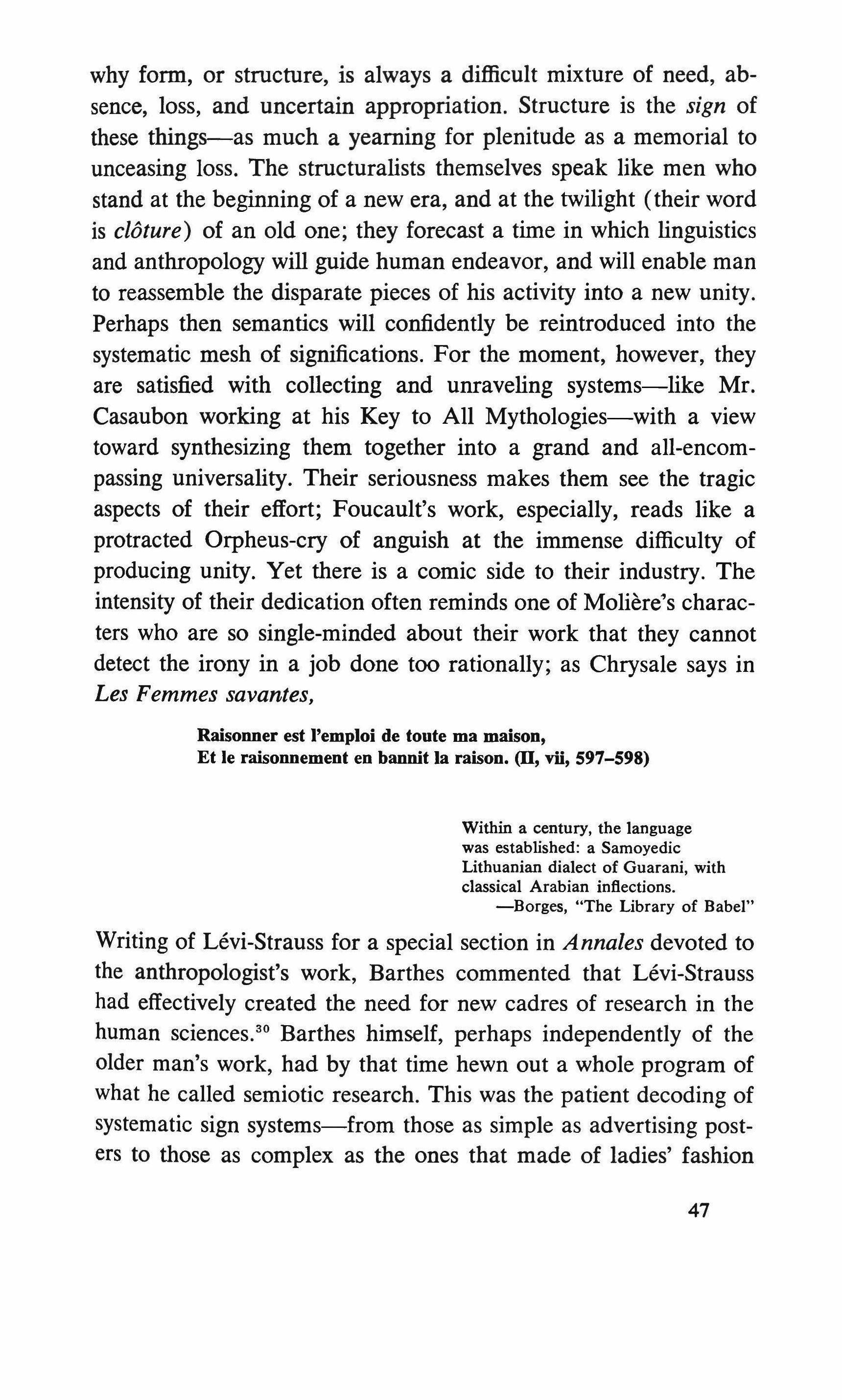
why form, or structure, is always a difficult mixture of need, absence, loss, and uncertain appropriation. Structure is the sign of these things-as much a yearning for plenitude as a memorial to unceasing loss. The structuralists themselves speak like men who stand at the beginning of a new era, and at the twilight (their word is cloture) of an old one; they forecast a time in which linguistics and anthropology will guide human endeavor, and will enable man to reassemble the disparate pieces of his activity into a new unity. Perhaps then semantics will confidently be reintroduced into the systematic mesh of significations. For the moment, however, they are satisfied with collecting and unraveling systems-like Mr. Casaubon working at his Key to All Mythologies-with a view toward synthesizing them together into a grand and all-encompassing universality. Their seriousness makes them see the tragic aspects of their effort; Foucault's work, especially, reads like a protracted Orpheus-cry of anguish at the immense difficulty of producing unity. Yet there is a comic side to their industry. The intensity of their dedication often reminds one of Moliere's characters who are so single-minded about their work that they cannot detect the irony in a job done too rationally; as Chrysale says in Les Femmes savantes,
Raisonner est I'emploi de toute ma maison, Et Ie raisonnement en bannit la raison. (D, vii, 597-598)
Within a century, the language was established: a Samoyedic Lithuanian dialect of Guarani, with classical Arabian inflections. -Borges, "The Library of Babel"
Writing of Levi-Strauss for a special section in Annales devoted to the anthropologist's work, Barthes commented that Levi-Strauss had effectively created the need for new cadres of research in the human sciences." Barthes himself, perhaps independently of the older man's work, had by that time hewn out a whole program of what he called semiotic research. This was the patient decoding of systematic sign systems-from those as simple as advertising posters to those as complex as the ones that made of ladies' fashion
47
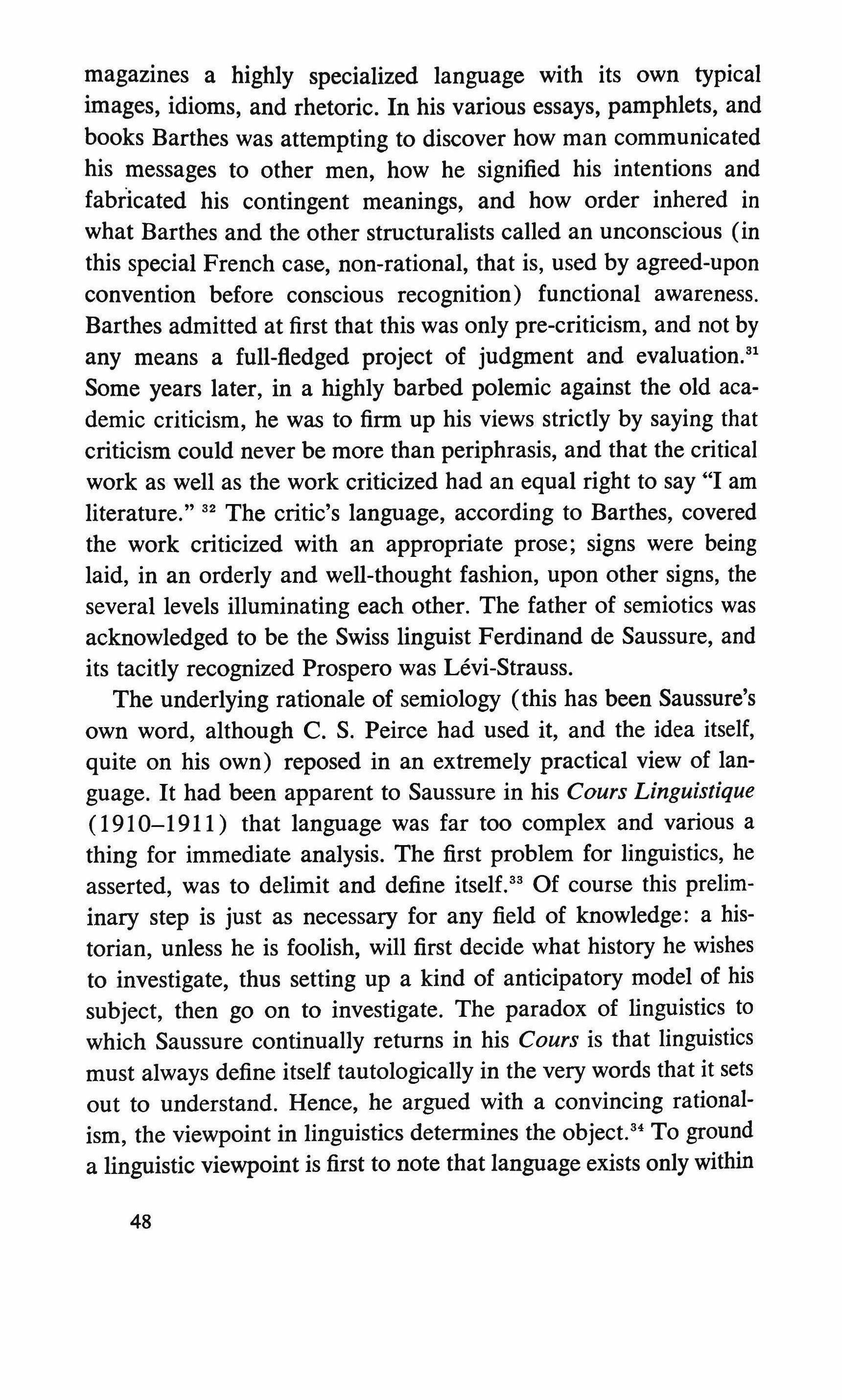
magazines a highly specialized language with its own typical images, idioms, and rhetoric. In his various essays, pamphlets, and books Barthes was attempting to discover how man communicated his messages to other men, how he signified his intentions and fabricated his contingent meanings, and how order inhered in what Barthes and the other structuralists called an unconscious (in this special French case, non-rational, that is, used by agreed-upon convention before conscious recognition) functional awareness. Barthes admitted at first that this was only pre-criticism, and not by any means a full-fledged project of judgment and evaluation."
Some years later, in a highly barbed polemic against the old academic criticism, he was to firm up his views strictly by saying that criticism could never be more than periphrasis, and that the critical work as well as the work criticized had an equal right to say "I am literature." 32 The critic's language, according to Barthes, covered the work criticized with an appropriate prose; signs were being laid, in an orderly and well-thought fashion, upon other signs, the several levels illuminating each other. The father of semiotics was acknowledged to be the Swiss linguist Ferdinand de Saussure, and its tacitly recognized Prospero was Levi-Strauss.
The underlying rationale of semiology (this has been Saussure's own word, although C. S. Peirce had used it, and the idea itself, quite on his own) reposed in an extremely practical view of language. It had been apparent to Saussure in his Cours Linguistique ( 1910-1911) that language was far too complex and various a thing for immediate analysis. The first problem for linguistics, he asserted, was to delimit and define itself." Of course this preliminary step is just as necessary for any field of knowledge: a historian, unless he is foolish, will first decide what history he wishes to investigate, thus setting up a kind of anticipatory model of his subject, then go on to investigate. The paradox of linguistics to which Saussure continually returns in his Cours is that linguistics must always define itself tautologically in the very words that it sets out to understand. Hence, he argued with a convincing rationalism, the viewpoint in linguistics determines the object. 34 To ground a linguistic viewpoint is first to note that language exists only within
48
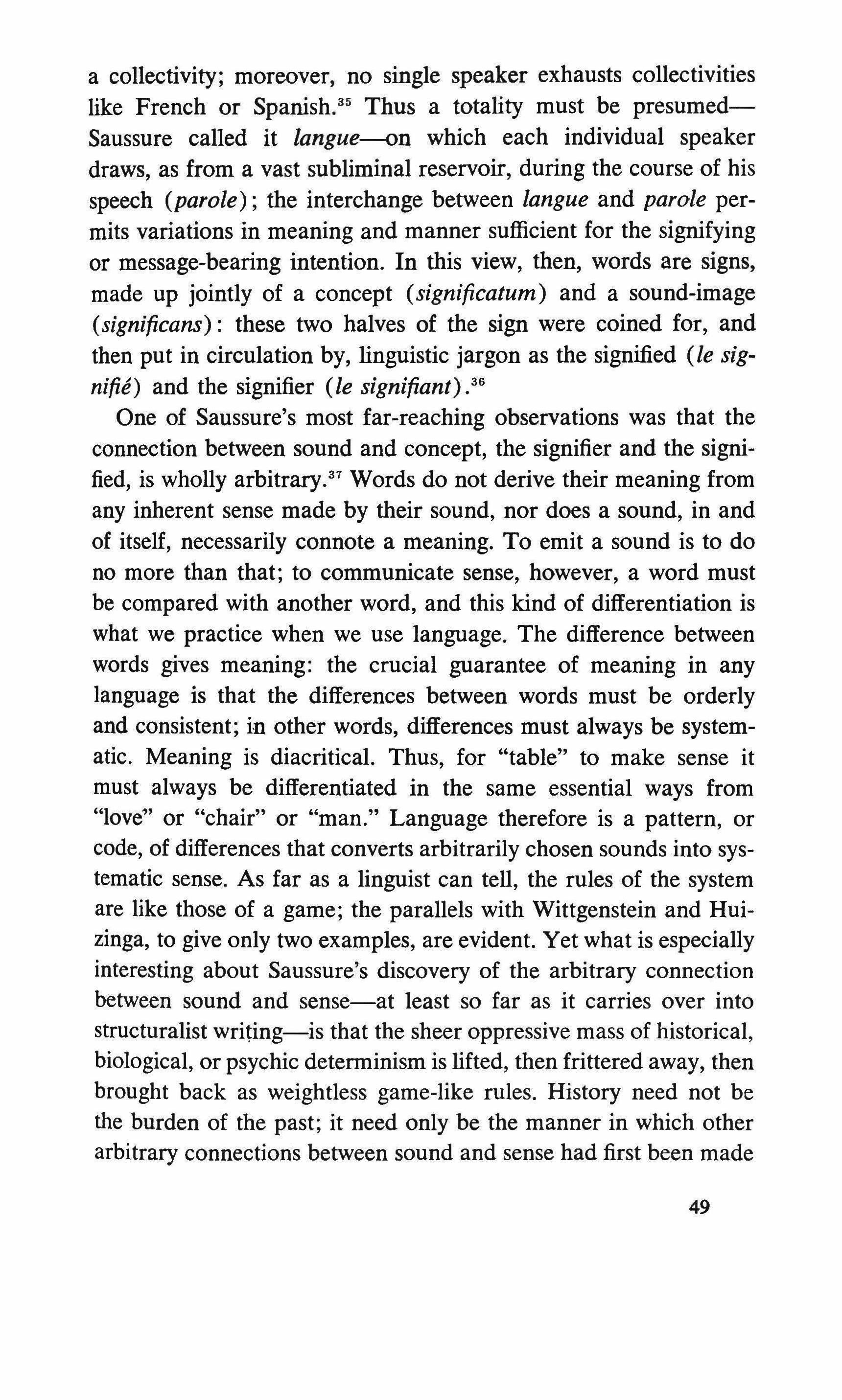
a collectivity; moreover, no single speaker exhausts collectivities like French or Spanish." Thus a totality must be presumedSaussure called it langue--on which each individual speaker draws, as from a vast subliminal reservoir, during the course of his speech (parole); the interchange between langue and parole permits variations in meaning and manner sufficient for the signifying or message-bearing intention. In this view, then, words are signs, made up jointly of a concept (significatum) and a sound-image (significans): these two halves of the sign were coined for, and then put in circulation by, linguistic jargon as the signified (Ie signifie) and the signifier (Ie signifiant). 36
One of Saussure's most far-reaching observations was that the connection between sound and concept, the signifier and the signified, is wholly arbitrary." Words do not derive their meaning from any inherent sense made by their sound, nor does a sound, in and of itself, necessarily connote a meaning. To emit a sound is to do no more than that; to communicate sense, however, a word must be compared with another word, and this kind of differentiation is what we practice when we use language. The difference between words gives meaning: the crucial guarantee of meaning in any language is that the differences between words must be orderly and consistent; in other words, differences must always be systematic. Meaning is diacritical. Thus, for "table" to make sense it must always be differentiated in the same essential ways from "love" or "chair" or "man." Language therefore is a pattern, or code, of differences that converts arbitrarily chosen sounds into systematic sense. As far as a linguist can tell, the rules of the system are like those of a game; the parallels with Wittgenstein and Huizinga, to give only two examples, are evident. Yet what is especially interesting about Saussure's discovery of the arbitrary connection between sound and sense-at least so far as it carries over into structuralist writing-is that the sheer oppressive mass of historical, biological, or psychic determinism is lifted, then frittered away, then brought back as weightless game-like rules. History need not be the burden of the past; it need only be the manner in which other arbitrary connections between sound and sense had first been made
49

then conventionalized into common use. The interpretation of language is an aesthetic activity and, so to speak, a release from the tyranny of time and history. This is why Edmund Leach has written of Levi-Strauss's structural and linguistic interpretations of kinship systems (which rely on Saussure's method of systematic decipherment of arbitrarily connected signifier and signified) that it is possible to undertake them for the aesthetic pleasure of the exercise." In most structuralist writings, sign analysis is done with a sort of neutral mental glee taken in the task. In structuralism we rarely have any sense of Freud's tragic realization that civilization, and language, are repressers of man, nor do we sense any of the pain of Nietzsche's frenzied leaps against an obdurate wall of history and custom, nor any of Heidegger's patient and yet agonized doom within language. For the most part the structuralists are adjusted to language and civilization (for them the two are coterminous); they take culture for what it rationally is, and they do not rebel against it.
The importance of Saussure's work for the contemporary structuralists is far too complicated to be examined here. The chief rule of procedure all of them seem to have learned from him, however, is that no matter how small the task there has to be explicit delimitation of the problem. Borrowing from Andre Martinet-and ob-. viously echoing Saussure-Barthes speaks cogently of the necessity of pertinence, which he calls a principled decision to describe facts from only one point of view, even to the exclusion of all others." Most of the time Saussure's rule of delimitation is used to reduce, in order to make manageable for scrutiny, a very large body of phenomena. Quite aside from its obvious practical advantages Saussure's procedural rule has, from the standpoint of a structuralist critic, certain moral and emotional advantages as well. In the first place, when he is confronted with an enormous hodgepodge of data, the critic can cut his way through it by asserting the existence of a problem within the mass. It is remarkable that in the work of every structuralist, Barthes, Levi-Strauss, Foucault, Lucien Sebag, and Louis Althusser included, the same methodological first step that unites critical discernment with violence always turns up: this
50
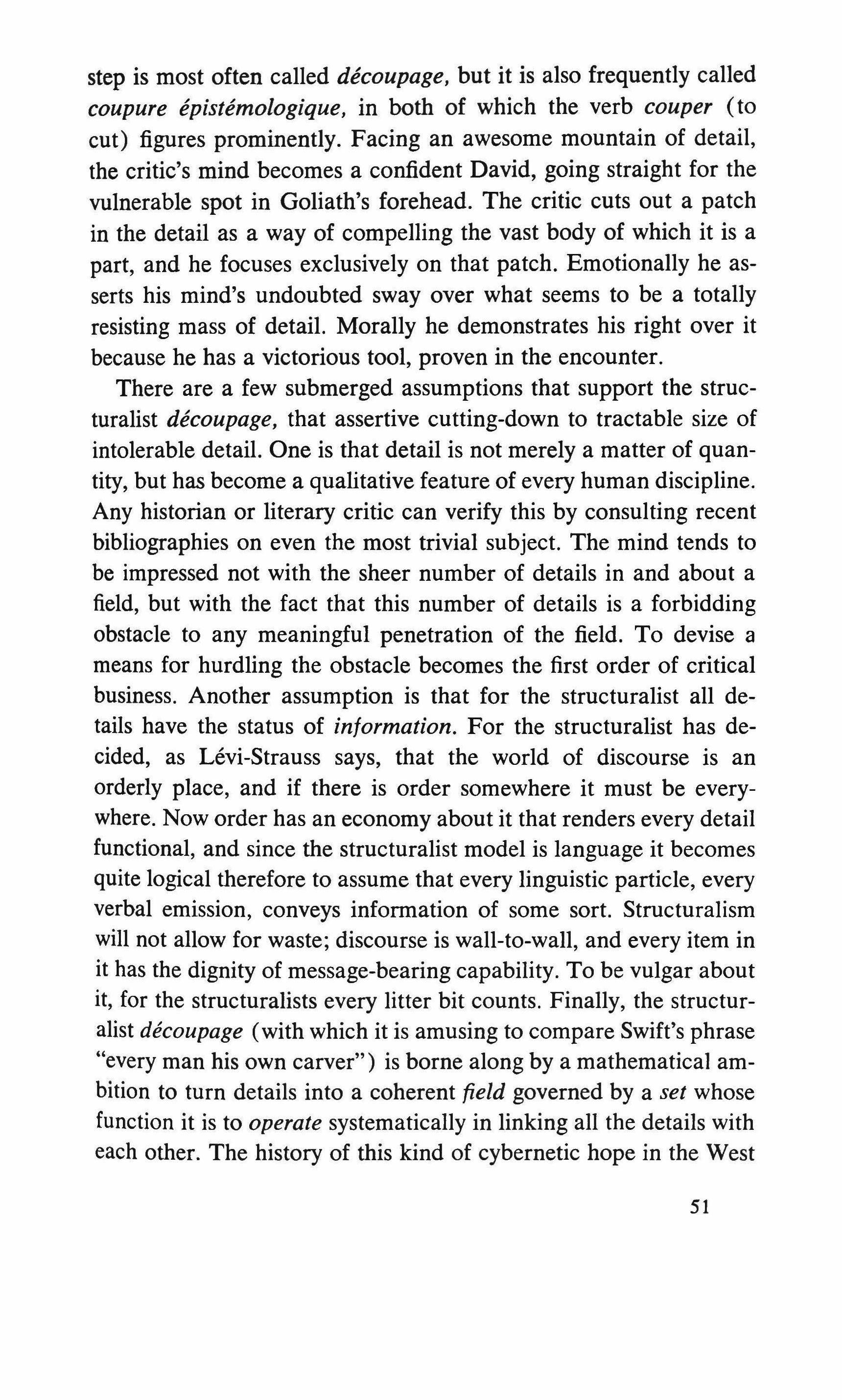
step is most often called decoupage, but it is also frequently called coupure epistemologique, in both of which the verb couper (to cut) figures prominently. Facing an awesome mountain of detail, the critic's mind becomes a confident David, going straight for the vulnerable spot in Goliath's forehead. The critic cuts out a patch in the detail as a way of compelling the vast body of which it is a part, and he focuses exclusively on that patch. Emotionally he asserts his mind's undoubted sway over what seems to be a totally resisting mass of detail. Morally he demonstrates his right over it because he has a victorious tool, proven in the encounter.
There are a few submerged assumptions that support the structuralist decoupage, that assertive cutting-down to tractable size of intolerable detail. One is that detail is not merely a matter of quantity, but has become a qualitative feature of every human discipline. Any historian or literary critic can verify this by consulting recent bibliographies on even the most trivial subject. The mind tends to be impressed not with the sheer number of details in and about a field, but with the fact that this number of details is a forbidding obstacle to any meaningful penetration of the field. To devise a means for hurdling the obstacle becomes the first order of critical business. Another assumption is that for the structuralist all details have the status of information. For the structuralist has decided, as Levi-Strauss says, that the world of discourse is an orderly place, and if there is order somewhere it must be everywhere. Now order has an economy about it that renders every detail functional, and since the structuralist model is language it becomes quite logical therefore to assume that every linguistic particle, every verbal emission, conveys information of some sort. Structuralism will not allow for waste; discourse is wall-to-wall, and every item in it has the dignity of message-bearing capability. To be vulgar about it, for the structuralists every litter bit counts. Finally, the structuralist decoupage (with which it is amusing to compare Swift's phrase "every man his own carver") is borne along by a mathematical ambition to turn details into a coherent field governed by a set whose function it is to operate systematically in linking all the details with each other. The history of this kind of cybernetic hope in the West
51

is a long one; it includes the Greek atomists, Lucretius, Leibnitz, and Descartes, then more recently Frege and Wiener, and finally the structuralists. It also finds its way imaginatively and pedagogically into Browne's Garden 0/ Cyrus, the dictionaries, encyclopedias, anatomies, catalogues, and universal grammars of the seventeenth and eighteenth centuries, Flaubert's Dictionnaire des idees recues, and Borges' Aleph. For the structuralists, then, decoupage validates the operation of a functional corpora prima that drives off the shrewish inanity of unlimited detail.
In a retrospective comment on his Les Structures elementaires de la parente Levi-Strauss noted how in that work he had "chosen a field that could, at first glance, have called attention to itself only for its incoherent and contingent nature, [yet he] had tried to show that it was possible to reduce all of it to a very small number of significant propositions." 40 Kinship systems present a bewildering variety of customs that repel a synthetic overview, yet it is by projecting the existence in them of a set of rules which makes the entire corpus a working whole that the mind can then absorb the mass as a significant entity. And this is precisely what Levi-Strauss did. Barthes' manifesto for structuralism hinges on his statement that applauds the method as an activity first of decomposing works-of literature, for instance-into their simplest functional forms, then of re-composing them into wholes dominated by what he called a sovereign motor principle." This had been the scheme employed by V. I. Propp, one of the Russian formalists, in The Morphology 0/ the Folktale. Foucault's method of decoupage is to reduce the vagaries of history to a set of alterations between modes of perceiving difference and sameness. Rene Girard's Mensonge romantique et verite romanesque views the history of the novel as a set of variations on an essential but enormously fecund "triangular model" of desire. "A basic contention," of Girard's book, "is that the great writers apprehend intuitively and concretely, through the medium of their art, if not formally, the system in which they were first imprisoned together with their contemporaries." 42 Finally, Louis Althusser's Marxism has for its method a way of pulling from a text what Althusser calls its problematic, which is a special mode
52

the text has of taking hold of its subject. Regardless how complicated a philosophy, or political program, is, it can be grasped by the mind as an attempt "ideologically" to see the world for a particular end, and this end, as well as the program itself, can be formulated as a problematic, or specific generality. In every one of the examples given above the critic orders his data first by delimiting the field in terms of a specific problem, then by deducing a rationale from his initial delimitation, then by applying this rationale in detail to all the material in an effort to make the material work, or perform systematically. All of this reductive activity goes on in the critic's writing, which is not only his instrument and the mode of his activity but also the common fabric in which all human actions are recorded and given a relative stability and intelligibility.
The linguistic apprehension-or perception-of reality is, of course, the most important cutting-down to size. We tend to accept this decoupage when we read a novelist, for example, but it seems more extreme when it is found to be the operating bias of the historian, the sociologist, and even of the psychoanalyst, particularly when only meager allowances are made for brute reality as a mere symbolic fiction. Levi-Strauss fatalistically marks the fundamental opposition between the discontinuities of symbolism (in this case, one supposes, the totem-like world of objects that symbolize values, our everyday world) and the continuity of knowledge, that is, between the world and the mind." The grand model of knowledge therefore is language-as-writing, the most continuous of man's enterprises and the one that covers all man's activity with the sheen of prose. At bottom structuralism is a set of attitudes to and of writing: grammatology. In writing, the structuralist can enact his work actually and actively; his attention to his work is a disciplined pertinence. As science, structuralism is meta-linguistic, language studying language, linguistic consciousness appropriating linguistic competence and performance.
When Levi-Strauss speaks of primitive thought (la pensee sauvage) he is not only describing the way in which the primitive thinks, but also thought itself, as it is, atrophied in its essential about-to-be-thought-about-something. Levi-Strauss wishes to de-
53
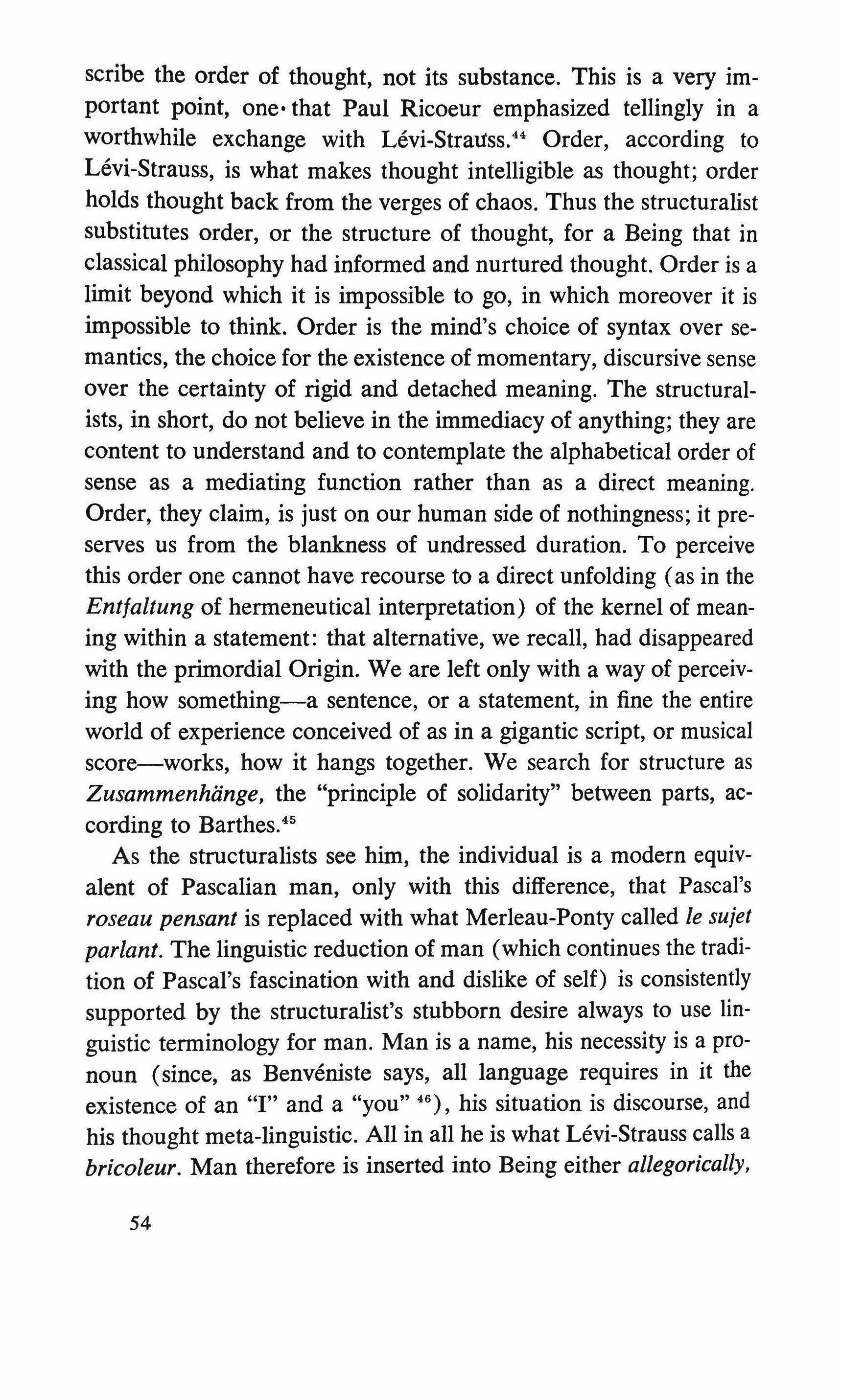
scribe the order of thought, not its substance. This is a very important point, one' that Paul Ricoeur emphasized tellingly in a worthwhile exchange with Levi-Strauss." Order, according to Levi-Strauss, is what makes thought intelligible as thought; order holds thought back from the verges of chaos. Thus the structuralist substitutes order, or the structure of thought, for a Being that in classical philosophy had informed and nurtured thought. Order is a limit beyond which it is impossible to go, in which moreover it is impossible to think. Order is the mind's choice of syntax over semantics, the choice for the existence of momentary, discursive sense over the certainty of rigid and detached meaning. The structuralists, in short, do not believe in the immediacy of anything; they are content to understand and to contemplate the alphabetical order of sense as a mediating function rather than as a direct meaning. Order, they claim, is just on our human side of nothingness; it preserves us from the blankness of undressed duration. To perceive this order one cannot have recourse to a direct unfolding (as in the Entjaltung of hermeneutical interpretation) of the kernel of meaning within a statement: that alternative, we recall, had disappeared with the primordial Origin. We are left only with a way of perceiving how something-a sentence, or a statement, in fine the entire world of experience conceived of as in a gigantic script, or musical score-works, how it hangs together. We search for structure as Zusammenhiinge, the "principle of solidarity" between parts, according to Barthes."
As the structuralists see him, the individual is a modern equivalent of Pascalian man, only with this difference, that Pascal's roseau pensant is replaced with what Merleau-Ponty called Ie sujet parlant. The linguistic reduction of man (which continues the tradition of Pascal's fascination with and dislike of self) is consistently supported by the structuralist's stubborn desire always to use linguistic terminology for man. Man is a name, his necessity is a pronoun (since, as Benveniste says, all language requires in it the existence of an "I" and a "you" 46), his situation is discourse, and his thought meta-linguistic. All in all he is what Levi-Strauss calls a bricoleur. Man therefore is inserted into Being either allegorically,
54
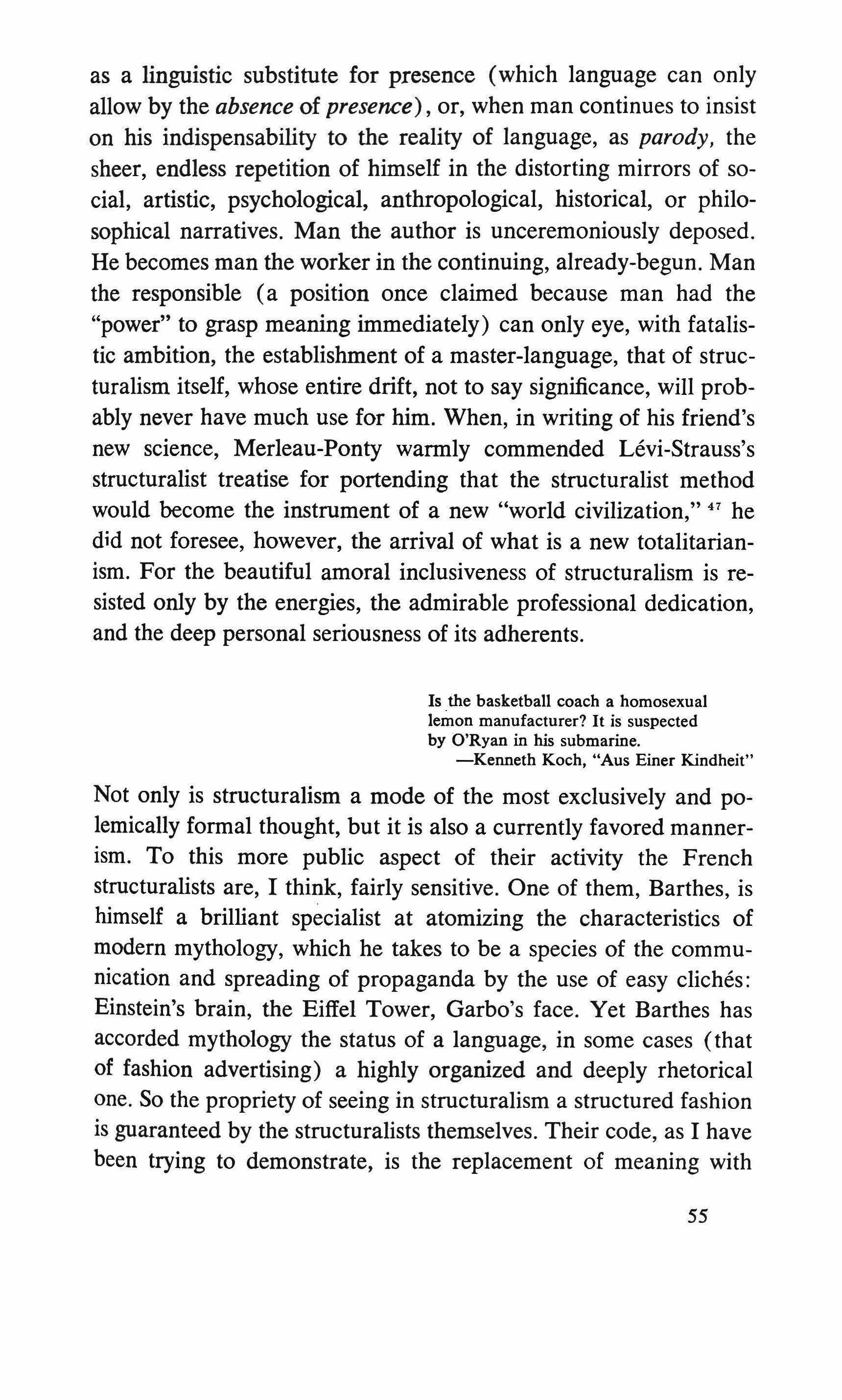
as a linguistic substitute for presence (which language can only allow by the absence of presence), or, when man continues to insist on his indispensability to the reality of language, as parody, the sheer, endless repetition of himself in the distorting mirrors of social, artistic, psychological, anthropological, historical, or philosophical narratives. Man the author is unceremoniously deposed. He becomes man the worker in the continuing, already-begun. Man the responsible (a position once claimed because man had the "power" to grasp meaning immediately) can only eye, with fatalistic ambition, the establishment of a master-language, that of structuralism itself, whose entire drift, not to say significance, will probably never have much use for him. When, in writing of his friend's new science, Merleau-Ponty warmly commended Levi-Strauss's structuralist treatise for portending that the structuralist method would become the instrument of a new "world civilization," 47 he did not foresee, however, the arrival of what is a new totalitarianism. For the beautiful amoral inclusiveness of structuralism is resisted only by the energies, the admirable professional dedication, and the deep personal seriousness of its adherents.
Is the basketball coach a homosexual lemon manufacturer? It is suspected by O'Ryan in his submarine.
-Kenneth Koch, "Aus Einer Kindheit"
Not only is structuralism a mode of the most exclusively and polemically formal thought, but it is also a currently favored mannerism. To this more public aspect of their activity the French structuralists are, I think, fairly sensitive. One of them, Barthes, is himself a brilliant specialist at atomizing the characteristics of modern mythology, which he takes to be a species of the communication and spreading of propaganda by the use of easy cliches: Einstein's brain, the Eiffel Tower, Garbo's face. Yet Barthes has accorded mythology the status of a language, in some cases (that of fashion advertising) a highly organized and deeply rhetorical one. So the propriety of seeing in structuralism a structured fashion is guaranteed by the structuralists themselves. Their code, as I have been trying to demonstrate, is the replacement of meaning with
55
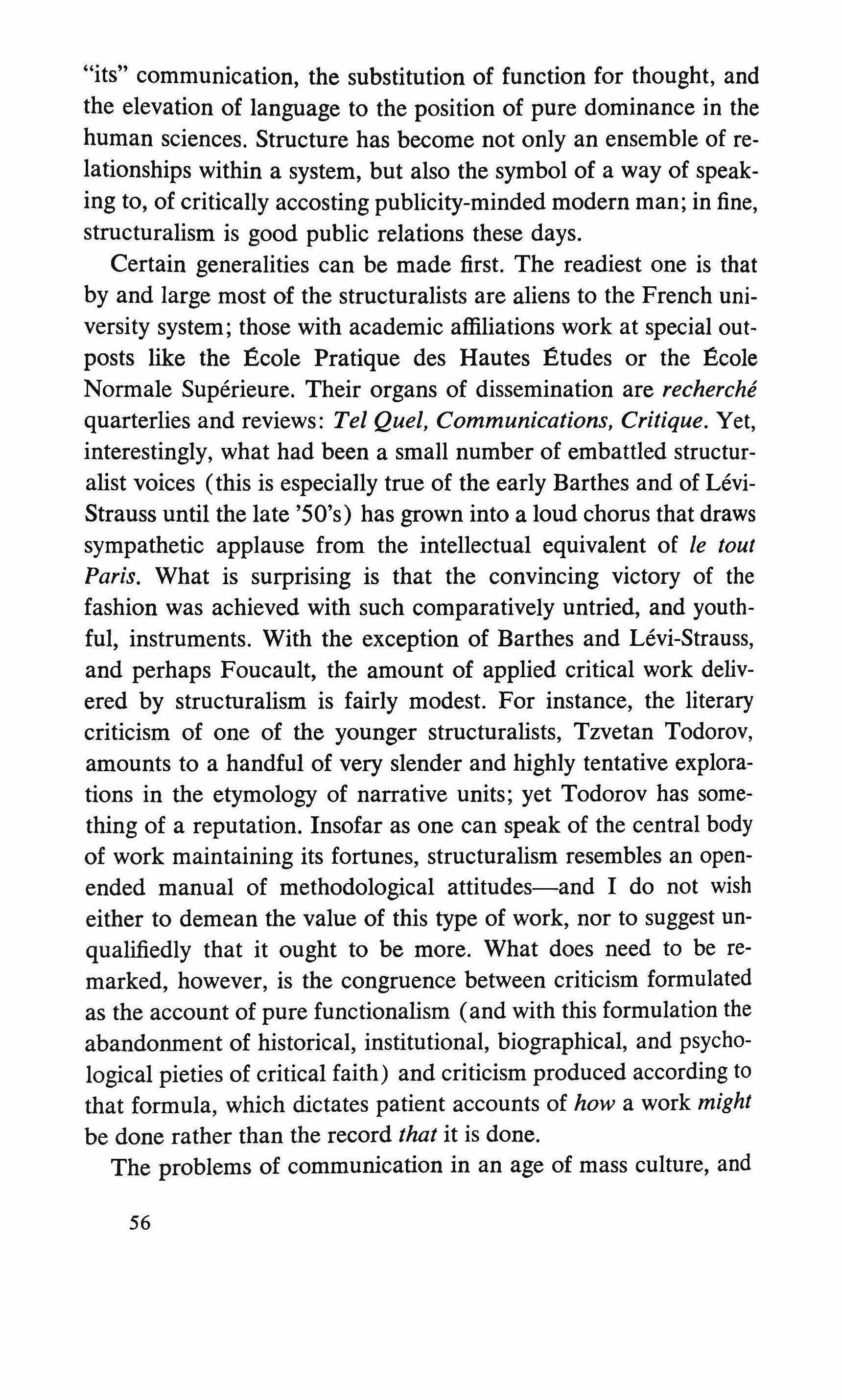
"its" communication, the substitution of function for thought, and the elevation of language to the position of pure dominance in the human sciences. Structure has become not only an ensemble of relationships within a system, but also the symbol of a way of speaking to, of critically accosting publicity-minded modern man; in fine, structuralism is good public relations these days.
Certain generalities can be made first. The readiest one is that by and large most of the structuralists are aliens to the French university system; those with academic affiliations work at special outposts like the Bcole Pratique des Hautes Etudes or the Ecole Normale Superieure, Their organs of dissemination are recherche quarterlies and reviews: Tel Quel, Communications, Critique. Yet, interestingly, what had been a small number of embattled structuralist voices (this is especially true of the early Barthes and of LeviStrauss until the late '50's) has grown into a loud chorus that draws sympathetic applause from the intellectual equivalent of Ie tout Paris. What is surprising is that the convincing victory of the fashion was achieved with such comparatively untried, and youthful, instruments. With the exception of Barthes and Levi-Strauss, and perhaps Foucault, the amount of applied critical work delivered by structuralism is fairly modest. For instance, the literary criticism of one of the younger structuralists, Tzvetan Todorov, amounts to a handful of very slender and highly tentative explorations in the etymology of narrative units; yet Todorov has something of a reputation. Insofar as one can speak of the central body of work maintaining its fortunes, structuralism resembles an openended manual of methodological attitudes-and I do not wish either to demean the value of this type of work, nor to suggest unqualifiedly that it ought to be more. What does need to be remarked, however, is the congruence between criticism formulated as the account of pure functionalism (and with this formulation the abandonment of historical, institutional, biographical, and psychological pieties of critical faith) and criticism produced according to that formula, which dictates patient accounts of how a work might be done rather than the record that it is done.
The problems of communication in an age of mass culture, and
56
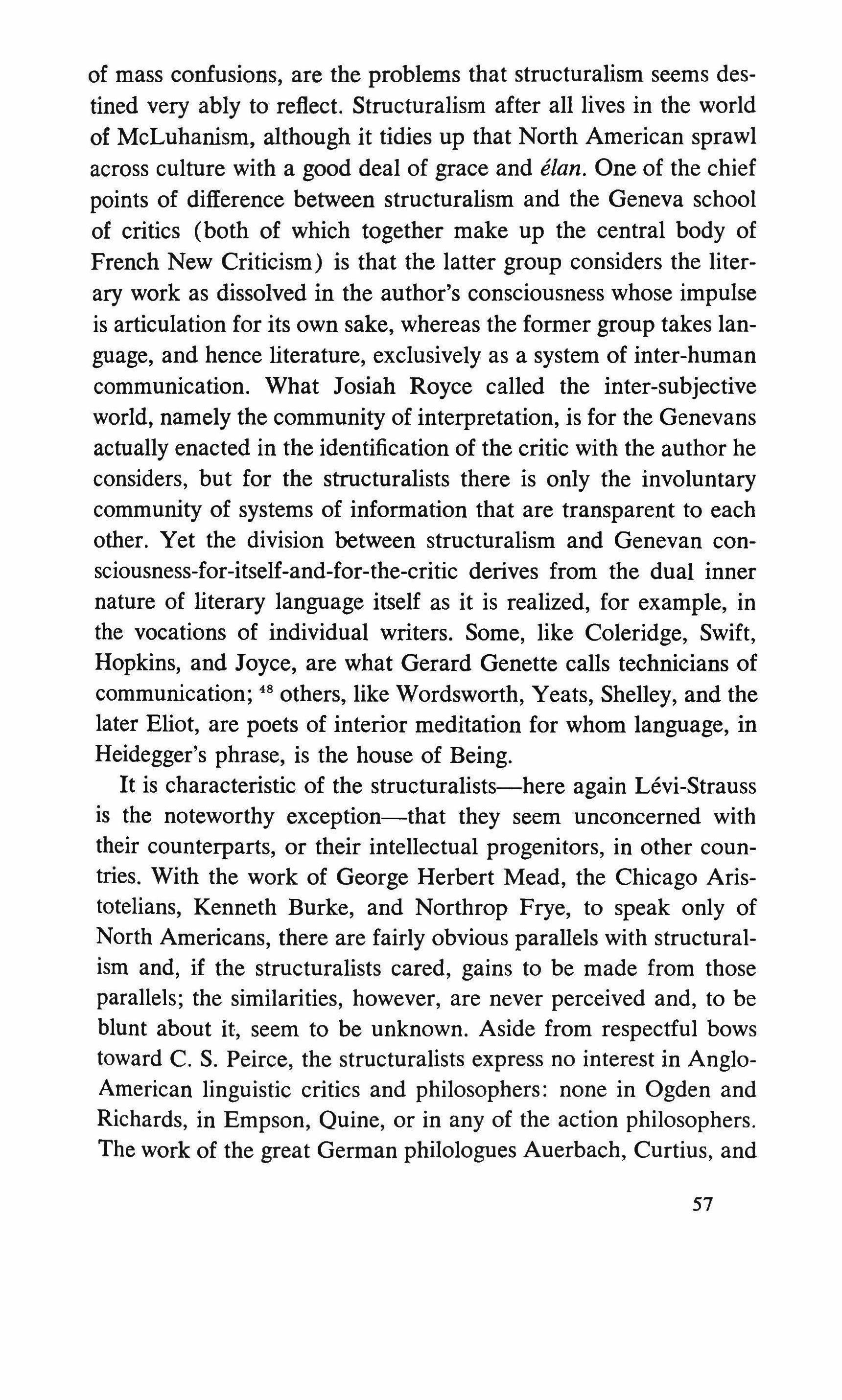
of mass confusions, are the problems that structuralism seems destined very ably to reflect. Structuralism after all lives in the world of McLuhanism, although it tidies up that North American sprawl across culture with a good deal of grace and elan. One of the chief points of difference between structuralism and the Geneva school of critics (both of which together make up the central body of French New Criticism) is that the latter group considers the literary work as dissolved in the author's consciousness whose impulse is articulation for its own sake, whereas the former group takes language, and hence literature, exclusively as a system of inter-human communication. What Josiah Royce called the inter-subjective world, namely the community of interpretation, is for the Genevans actually enacted in the identification of the critic with the author he considers, but for the structuralists there is only the involuntary community of systems of information that are transparent to each other Yet the division between structuralism and Genevan consciousness-for-itself-and-for-the-critic derives from the dual inner nature of literary language itself as it is realized, for example, in the vocations of individual writers. Some, like Coleridge, Swift, Hopkins, and Joyce, are what Gerard Genette calls technicians of communication; 48 others, like Wordsworth, Yeats, Shelley, and the later Eliot, are poets of interior meditation for whom language, in Heidegger's phrase, is the house of Being.
It is characteristic of the structuralists-here again Levi-Strauss is the noteworthy exception-that they seem unconcerned with their counterparts, or their intellectual progenitors, in other countries. With the work of George Herbert Mead, the Chicago Aristotelians, Kenneth Burke, and Northrop Frye, to speak only of North Americans, there are fairly obvious parallels with structuralism and, if the structuralists cared, gains to be made from those parallels; the similarities, however, are never perceived and, to be blunt about it, seem to be unknown. Aside from respectful bows toward C. S. Peirce, the structuralists express no interest in AngloAmerican linguistic critics and philosophers: none in Ogden and Richards, in Empson, Quine, or in any of the action philosophers. The work of the great German philologues Auerbach, Curtius, and 57

Spitzer seems not to have made much of an impression either, although one would think that the universality and the scope of German romance philology (with its origins in Goethe's idea of Weltliteratur) might have suggested at least one other model of linguistic research integrally organized. The same is true of the discipline of comparative literature, whose relevance is nevertheless recognizable in structuralism's enterprise when the latter is viewed as the science of comparative communication. Still the disparity between structuralism as an essentializing and universalizing activity and its insularity remains an odd one. For that matter, though, the outside world has repaid the structuralists. Aside from the alert attention of TLS, and a few appreciative essays here and there, little serious attention has been paid France's latest intellectual venture." Wherever else it is placed, structuralism belongs, with Gallic preciosity, to what Harry Levin has called the Alexandrianism of our time. 50 The organization of a structuralist work is always ingenious, sometimes even more interesting than the matter it discusses. The assenting response to Barthes' call for new cadres of research is immediately felt in the effort expended in putting together one or another structuralist book. Levi-Strauss's books present a surface of dazzling arrangement, whether one reads a page or the table of contents. The choice of subject matter in Foucault's work, as much as in Barthes', Genette's, Althusser's, or Jacques Lacan's, is always novel and unexpected; the unkindest cut of all would be to call such novelty, with Raymond Piccard, "dogmatic impressionism." The styles are almost always difficult, whether because they are technical, or because they reveal writing turning back on itself to consider, questioningly, its validity and principles. The salutary effect of structuralism is more than the providing of criticism with a few handy catch-phrases or with florid tricks. Structuralism has demonstrated the value of determinedly rational examination, it has displaced the prior mystique of mere appreciation passing itself off as scholarship, and has even stimulated novelists (like Robbe-Grillet and Butor) to a just ascertainment of their work. Beyond that structuralism has given and received fairly. As Barthes has noted, structuralism sits securely beside developments
58
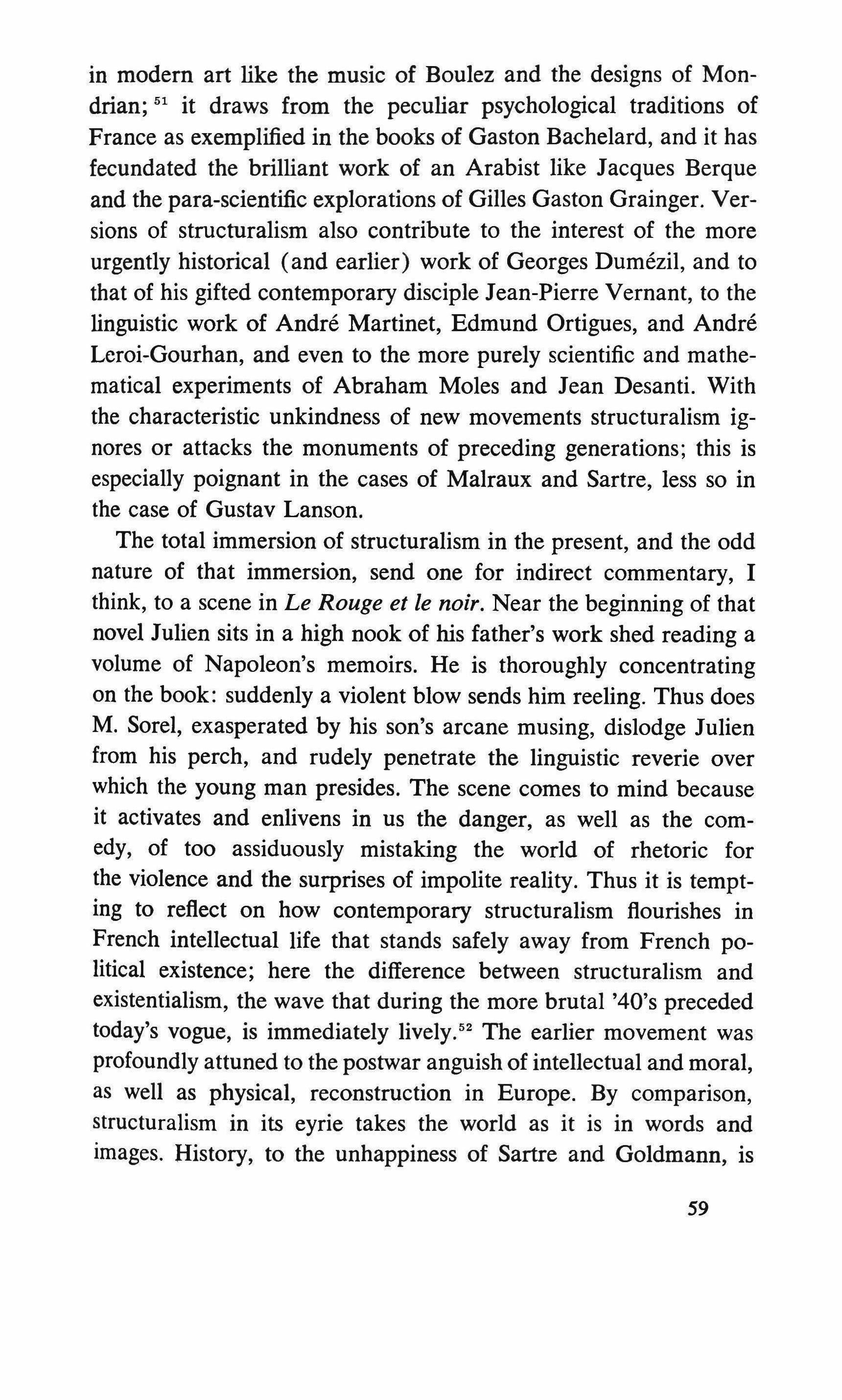
in modem art like the music of Boulez and the designs of Mondrian; 51 it draws from the peculiar psychological traditions of France as exemplified in the books of Gaston Bachelard, and it has fecundated the brilliant work of an Arabist like Jacques Berque and the para-scientific explorations of Gilles Gaston Grainger. Versions of structuralism also contribute to the interest of the more urgently historical (and earlier) work of Georges Dumezil, and to that of his gifted contemporary disciple Jean-Pierre Vernant, to the linguistic work of Andre Martinet, Edmund Ortigues, and Andre Leroi-Gourhan, and even to the more purely scientific and mathematical experiments of Abraham Moles and Jean Desanti. With the characteristic unkindness of new movements structuralism ignores or attacks the monuments of preceding generations; this is especially poignant in the cases of Malraux and Sartre, less so in the case of Gustav Lanson.
The total immersion of structuralism in the present, and the odd nature of that immersion, send one for indirect commentary, I think, to a scene in Le Rouge et le noir. Near the beginning of that novel Julien sits in a high nook of his father's work shed reading a volume of Napoleon's memoirs. He is thoroughly concentrating on the book: suddenly a violent blow sends him reeling. Thus does M. Sorel, exasperated by his son's arcane musing, dislodge Julien from his perch, and rudely penetrate the linguistic reverie over which the young man presides. The scene comes to mind because it activates and enlivens in us the danger, as well as the comedy, of too assiduously mistaking the world of rhetoric for the violence and the surprises of impolite reality. Thus it is tempting to reflect on how contemporary structuralism flourishes in French intellectual life that stands safely away from French political existence; here the difference between structuralism and existentialism, the wave that during the more brutal '40's preceded today's vogue, is immediately lively. 52 The earlier movement was profoundly attuned to the postwar anguish of intellectual and moral, as well as physical, reconstruction in Europe. By comparison, structuralism in its eyrie takes the world as it is in words and images. History, to the unhappiness of Sartre and Goldmann, is
59

relegated by structuralism to the less troublesome status of diachrony, a realm that shrugs off as interruption anything that disturbs the stable polity of synchrony, which is a calm realm of simultaneity and systematic relationships.
The gravest problem with which structuralism has yet wholeheartedly to deal is how to account seriously for change and force, how to assimilate the powerful and sometimes wasteful behavioral activity of man-what Blackmur calls the Moha-to the lovely numenous order of structure. In Foucault's roughly chronological narratives we find one period of thought, one style in history, ceding its place to another. Foucault's description of man as "a rent in the order of things, in any case, a configuration traced by the new position man has recently taken in the realm of knowledge" 53 does scarcely more than recite, as inevitable, the quasifact of man's disruptive appearance. Man does violence to order, but the gash is immediately repaired by the heedless persistence of order. At no point in the over thirteen hundred pages of his archaeological work does Foucault really attempt to connect the cementing energy of persistence with the destructive introduction of novelty that replaces one period with another. It is as if, like nuclear elements with an assigned half-life, periods simply live and pass off, leaving their place to be covered up in the same slot by other periods.
In Levi-Strauss's work we find the recognition of force made in terms, once again, of disruption. In examining the constant passage, in both directions within society, between ideas and images he acknowledges a certain measure of contingence and arbitrariness; the systematic organization of society, he concedes regretfully, is endangered by wars, epidemics, and famines.54 The relation between order and disorder therefore is one of opposition, yet it is expressed not by the society itself-or at least, not necessarily by the society-but for the society by the observer who stands outside it. As Levi-Strauss says in another place, structure will only appear as the result of observation practiced from the outside; 55 hence order, or structure, is available for analysis from the outside, but society's process, or force, can never be grasped because
60

(Levi-Strauss himself makes the point) that is entirely within the perspective of the social individual engaged in his own historical becoming. In Totemism Levi-Strauss speaks of the internalization ("trying on [oneself] modes of thought taken from elsewhere or simply imagined" 56) that permitted Bergson and Rousseau to apprehend what goes on in the mind of man. This internalization of course allows the modern anthropologist to understand what goes on in an observed primitive society.
The situation can now be stated as follows: Within a society a certain energy is acting to make it a society. Outside the society stands an observer who notes constants (included in the kind of essential structure Levi-Strauss himself had observed in Les Structures elementaires de La parente, for example) which, in turn, are internalized and tested by the observer for their logic and coherence. The force or energy or entropy of a society, that which keeps it inserted in its ongoing historical actuality, thus is a transparency through which observations on the structure beyond it can be made. Two kinds of force can be distinguished: one, easily gotten by; the other, the force of observation, which though essentially, and curiously, contemplative has the power to penetrate through the seeming opacity of a foreign culture to a lucidity beyond. All of this, as I said above, seems to take into consideration a conflict between system and contingency which, within a society, always oppose each other. Yet at the beginning of the anthropological observation discontinuity is granted, while at the other end of the observation, discontinuity has already been assembled into a transparent force that had yielded very easily to the observation just practiced. Although the structuralist avers the power of disruption and discontinuity he replaces it later with a transparent coherence that is very little more than the power of an object, or a society, to be observed. Put in linguistic terms, force and energy are converted exclusively into the power of signification, which exists to be read, to be semiotically deciphered. This is linguacentricity pushed very far indeed. The quality of things that makes them significant is almost an ideal third term between language on the one hand and men and the world on the
61
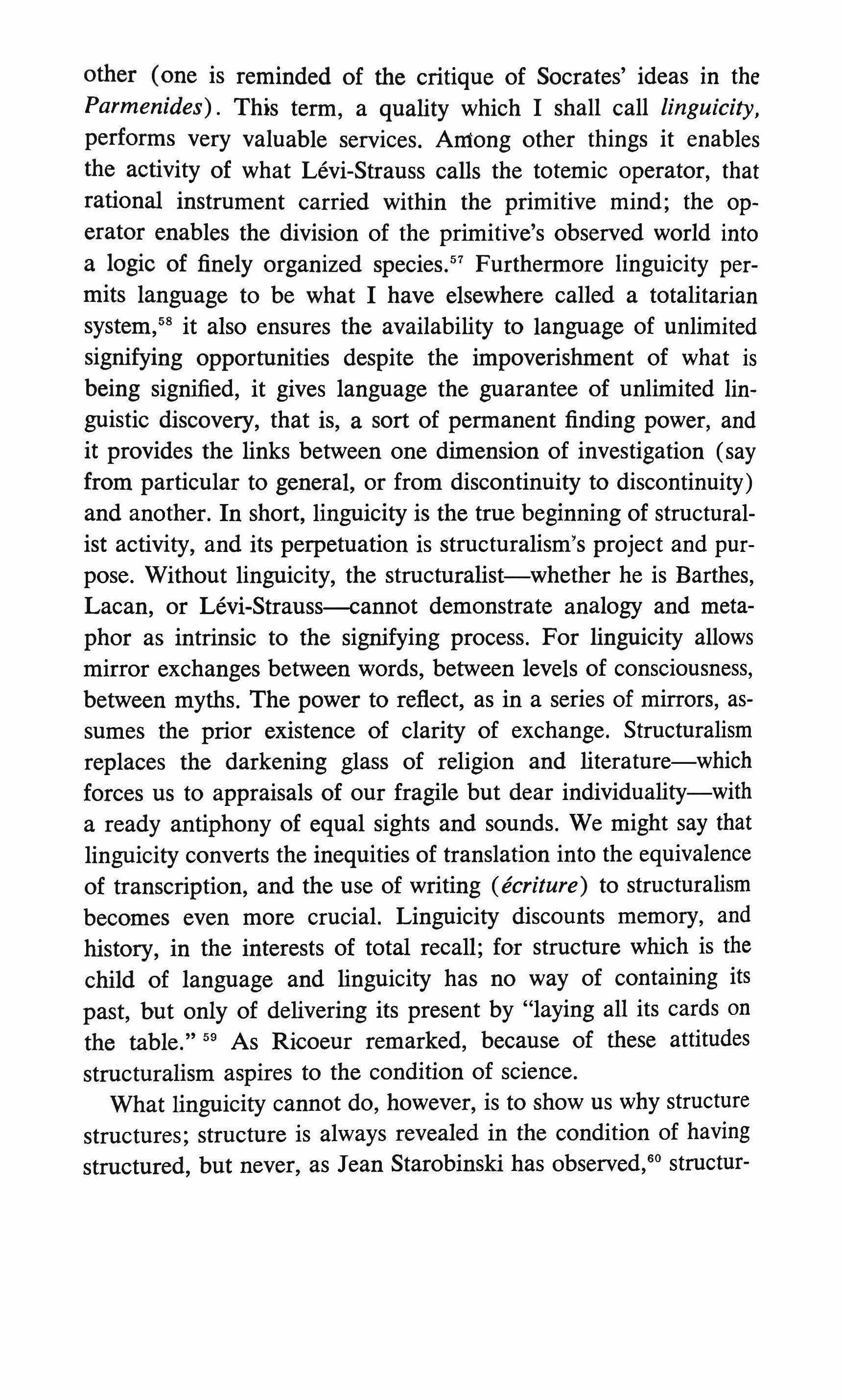
other (one is reminded of the critique of Socrates' ideas in the Parmenides). This term, a quality which I shall call linguicity, performs very valuable services. Among other things it enables the activity of what Levi-Strauss calls the totemic operator, that rational instrument carried within the primitive mind; the operator enables the division of the primitive's observed world into a logic of finely organized species. 57 Furthermore linguicity permits language to be what I have elsewhere called a totalitarian system," it also ensures the availability to language of unlimited signifying opportunities despite the impoverishment of what is being signified, it gives language the guarantee of unlimited linguistic discovery, that is, a sort of permanent finding power, and it provides the links between one dimension of investigation (say from particular to general, or from discontinuity to discontinuity) and another. In short, linguicity is the true beginning of structuralist activity, and its perpetuation is structuralism's project and purpose. Without linguicity, the structuralist-whether he is Barthes, Lacan, or Levi-Strauss-cannot demonstrate analogy and metaphor as intrinsic to the signifying process. For linguicity allows mirror exchanges between words, between levels of consciousness, between myths. The power to reflect, as in a series of mirrors, assumes the prior existence of clarity of exchange. Structuralism replaces the darkening glass of religion and literature-which forces us to appraisals of our fragile but dear individuality-with a ready antiphony of equal sights and sounds. We might say that linguicity converts the inequities of translation into the equivalence of transcription, and the use of writing (ecriture) to structuralism becomes even more crucial. Linguicity discounts memory, and history, in the interests of total recall; for structure which is the child of language and linguicity has no way of containing its past, but only of delivering its present by "laying all its cards on the table." 59 As Ricoeur remarked, because of these attitudes structuralism aspires to the condition of science. What linguicity cannot do, however, is to show us why structure structures; structure is always revealed in the condition of having structured, but never, as Jean Starobinski has observed," structur-
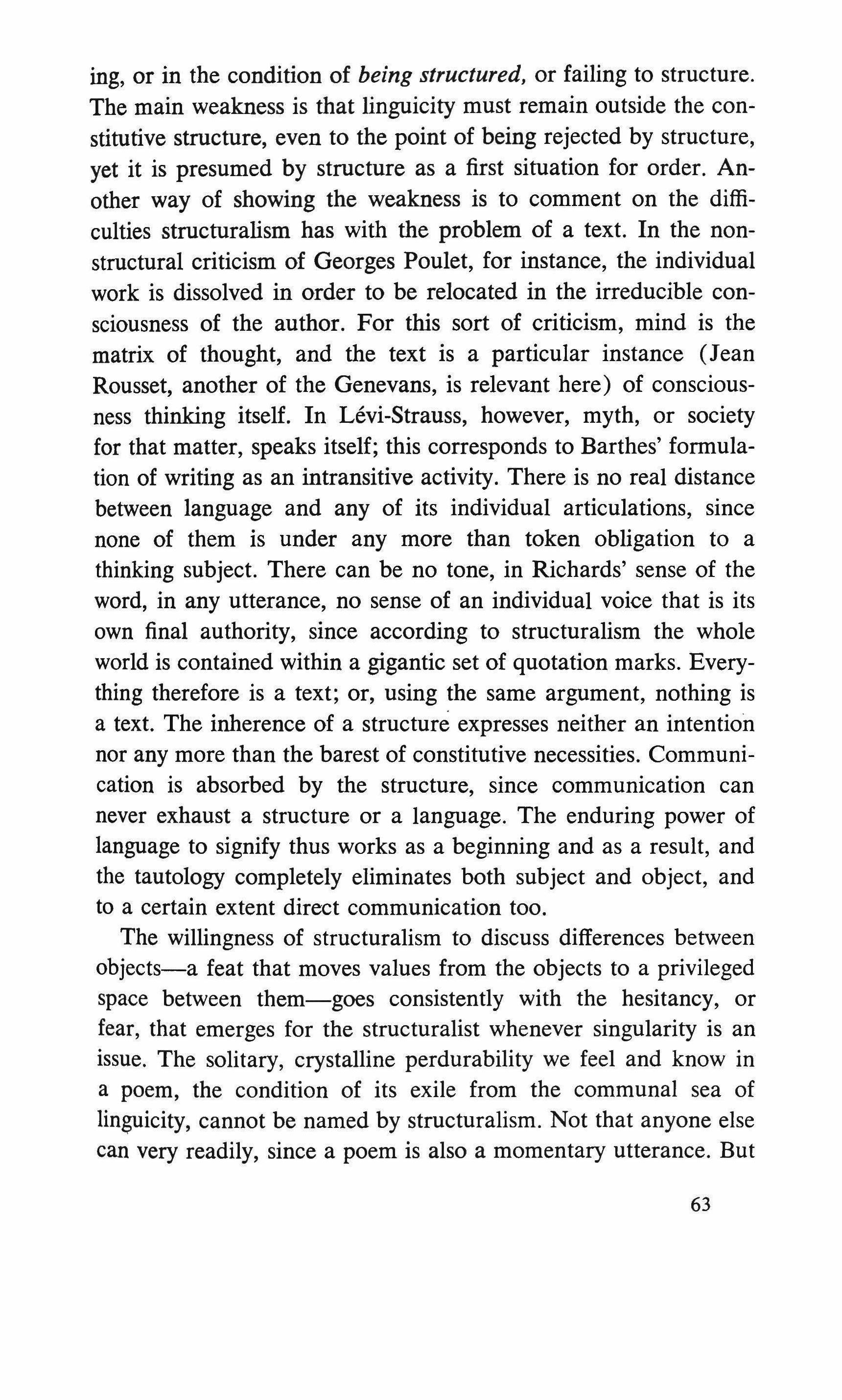
ing, or in the condition of being structured, or failing to structure. The main weakness is that linguicity must remain outside the constitutive structure, even to the point of being rejected by structure, yet it is presumed by structure as a first situation for order. Another way of showing the weakness is to comment on the difficulties structuralism has with the problem of a text. In the nonstructural criticism of Georges Poulet, for instance, the individual work is dissolved in order to be relocated in the irreducible consciousness of the author. For this sort of criticism, mind is the matrix of thought, and the text is a particular instance (Jean Rousset, another of the Genevans, is relevant here) of consciousness thinking itself. In Levi-Strauss, however, myth, or society for that matter, speaks itself; this corresponds to Barthes' formulation of writing as an intransitive activity. There is no real distance between language and any of its individual articulations, since none of them is under any more than token obligation to a thinking subject. There can be no tone, in Richards' sense of the word, in any utterance, no sense of an individual voice that is its own final authority, since according to structuralism the whole world is contained within a gigantic set of quotation marks. Everything therefore is a text; or, using the same argument, nothing is a text. The inherence of a structure expresses neither an intention nor any more than the barest of constitutive necessities. Communication is absorbed by the structure, since communication can never exhaust a structure or a language. The enduring power of language to signify thus works as a beginning and as a result, and the tautology completely eliminates both subject and object, and to a certain extent direct communication too.
The willingness of structuralism to discuss differences between objects-a feat that moves values from the objects to a privileged space between them-goes consistently with the hesitancy, or fear, that emerges for the structuralist whenever singularity is an issue. The solitary, crystalline perdurability we feel and know in a poem, the condition of its exile from the communal sea of linguicity, cannot be named by structuralism. Not that anyone else can very readily, since a poem is also a momentary utterance. But
63

the effort of naming is at least possible outside structuralism if only because one can acknowledge an unknown and keep it live in thought. Structuralism's holding power over its subject matter is tenuous: this is at once a strength, when it reminds us of the provisionality of our efforts, and a weakness, when it commits us to an irretrievable past and the dimensionless obsolescence of the future.
As the ground of structuralism, linguicity requires the notion of play within rules to sustain a minimum of discourse (which Barthes calls prose). 61 Linguicity seems to generate and then lay down rules of intelligibility by which things appear as telling language, rather than as random bursts of being. As used in structuralism's arguments, these rules are a nexus binding utterances into progressively clear units, the more one works out their possibilities. Thus by lifting aside one set of signifiers (as we did in those lines from Paradise Lost) as two or more occur in, for example, works of literature, the threatening jumble of direct presence is channeled off into examples of recognized convention. The structuralist decoding or reducing of the object to a set of utterances collected into general rhetorical order somewhat resembles the process of resolving literature into archetypes, a kind of criticism practiced commonly in the United States. The structuralists, and the archetypalists, always wish to avoid direct encounters with language. Instead they weaken the full-throated spoken chain into a series of signifiers, all of which exist in the chain's linguicity, like the plural meanings of words in a pun. Linguicity forces us, perhaps against our will, to read language and reality together as if they were cleverly hidden in each other.
The trouble with this esoteric view of language is, first of all, that rules ensure the safety and the captivity of signification: in a sense, therefore, structuralism is conservatively safeguarding the assured certainty of its own activity. For every contingency a rule can be discovered lurking in linguicity. Secondly, the number of rules is, also conservatively, kept to a workable minimum. To be willing to admit (a) that there are no rules for some situations and (b) that there is no limit to the number of rules, would mean the ne-
64

cessity of believing (a) in an infinite vocabulary and (b) in a finally useless catalogue of infinite rules. And these latter two eventualities the structuralist will not admit. Borges' Ireneo Funes does admit this, however, and he is locked in "the stammering grandeur" of his vertiginous world of bewildering particulars. Linguicity is one extreme; Funes, and art, are another; we are really in between.
Of all the structuralists, it is only Levi-Strauss+ who, in Susan Sontag's apt description," can be considered as willing to confront knowledge as an intellectual adventure. The closed circle of associates, the writing for a like-minded audience, the coterie atmosphere of most structuralist writing-all these tend to shut the structuralist off from the uninitiated reader. In contrast, LeviStrauss has, we feel, risked the awful dangers of incoherence and the trails of exposure to a totally foreign experience in the effort to rescue meaning out of human existence. His work has been a retrospective summa that covers the adventure with nervously delicate prose; as Barthes observes in another connection, writing such as Levi-Strauss's continues the original field-work, but does not reduce it. 63
We come finally to the very recent writing of Jacques Derrida. Three books by him appeared in 1967 (in addition to a translation, with an introduction, of Husserl's Ursprung der Geometrie) : L'Ecriture et la difference, De la grammatologie, and La Voix et le phenomene. A philosopher in his own right, he deserves mention in an essay on structuralism because his work is a critique, by grotesque explication, of the structuralists. Thus like Nietzsche's outpouring of philosophy that is already in the throes of its selfdestruction, Derrida's writing converts the principles of structuralism into surreal, large things whose over-accurate relationship to the original versions mocks, overwhelms, and plays havoc with them. The sense of structuralism is, in Derrida, writ large, too large. The inflation is evident on many levels. First in the organization of his books, which make normal structural preciosity look primly demure. De la grammatologie, for instance, is a study of t Because it is remarkably difficult I have excluded the psychoanalytical research of Jacques Lacan, whose discoveries, although resembling the structuralists' in mode, have created a field all his own.
65
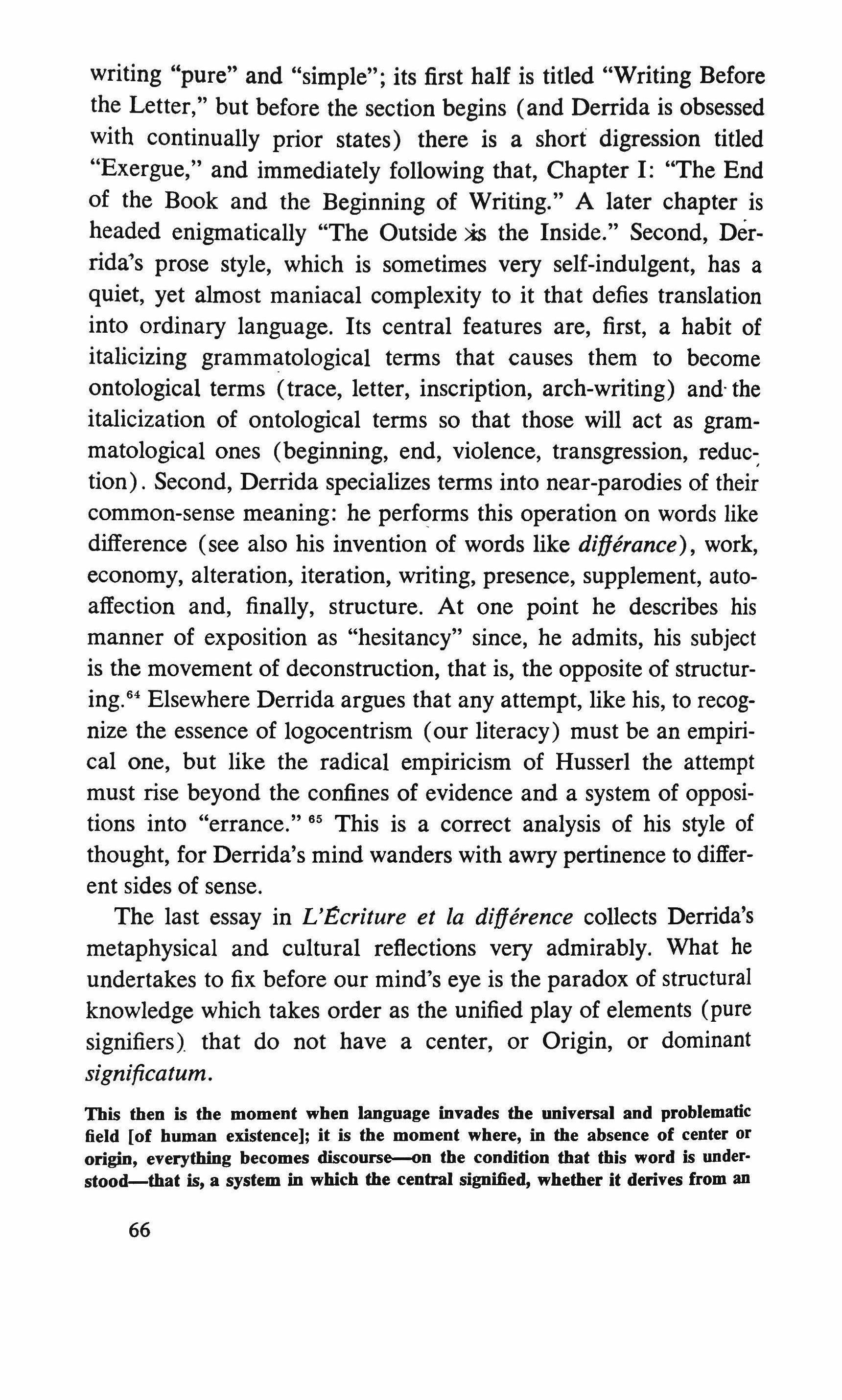
writing "pure" and "simple"; its first half is titled "Writing Before the Letter," but before the section begins (and Derrida is obsessed with continually prior states) there is a short digression titled "Exergue," and immediately following that, Chapter I: "The End of the Book and the Beginning of Writing." A later chapter is headed enigmatically "The Outside xs the Inside." Second, Derrida's prose style, which is sometimes very self-indulgent, has a quiet, yet almost maniacal complexity to it that defies translation into ordinary language. Its central features are, first, a habit of italicizing grammatological terms that causes them to become ontological terms (trace, letter, inscription, arch-writing) and- the italicization of ontological terms so that those will act as grammatological ones (beginning, end, violence, transgression, reduction). Second, Derrida specializes terms into near-parodies of their common-sense meaning: he performs this operation on words like difference (see also his invention of words like differance), work, economy, alteration, iteration, writing, presence, supplement, autoaffection and, finally, structure. At one point he describes his manner of exposition as "hesitancy" since, he admits, his subject is the movement of deconstruction, that is, the opposite of structuring." Elsewhere Derrida argues that any attempt, like his, to recognize the essence of logocentrism (our literacy) must be an empirical one, but like the radical empiricism of Husser! the attempt must rise beyond the confines of evidence and a system of oppositions into "errance." 65 This is a correct analysis of his style of thought, for Derrida's mind wanders with awry pertinence to different sides of sense.
The last essay in L'Ecriture et 1a difference collects Derrida's metaphysical and cultural reflections very admirably. What he undertakes to fix before our mind's eye is the paradox of structural knowledge which takes order as the unified play of elements (pure signifiers). that do not have a center, or Origin, or dominant significatum.
This then is the moment when language invades the universal and problematic field [of human existence]; it is the moment where, in the absence of center or origin, everything becomes discourse-on the condition that this word is understood-that is, a system in which the central signified, whether it derives from an
66
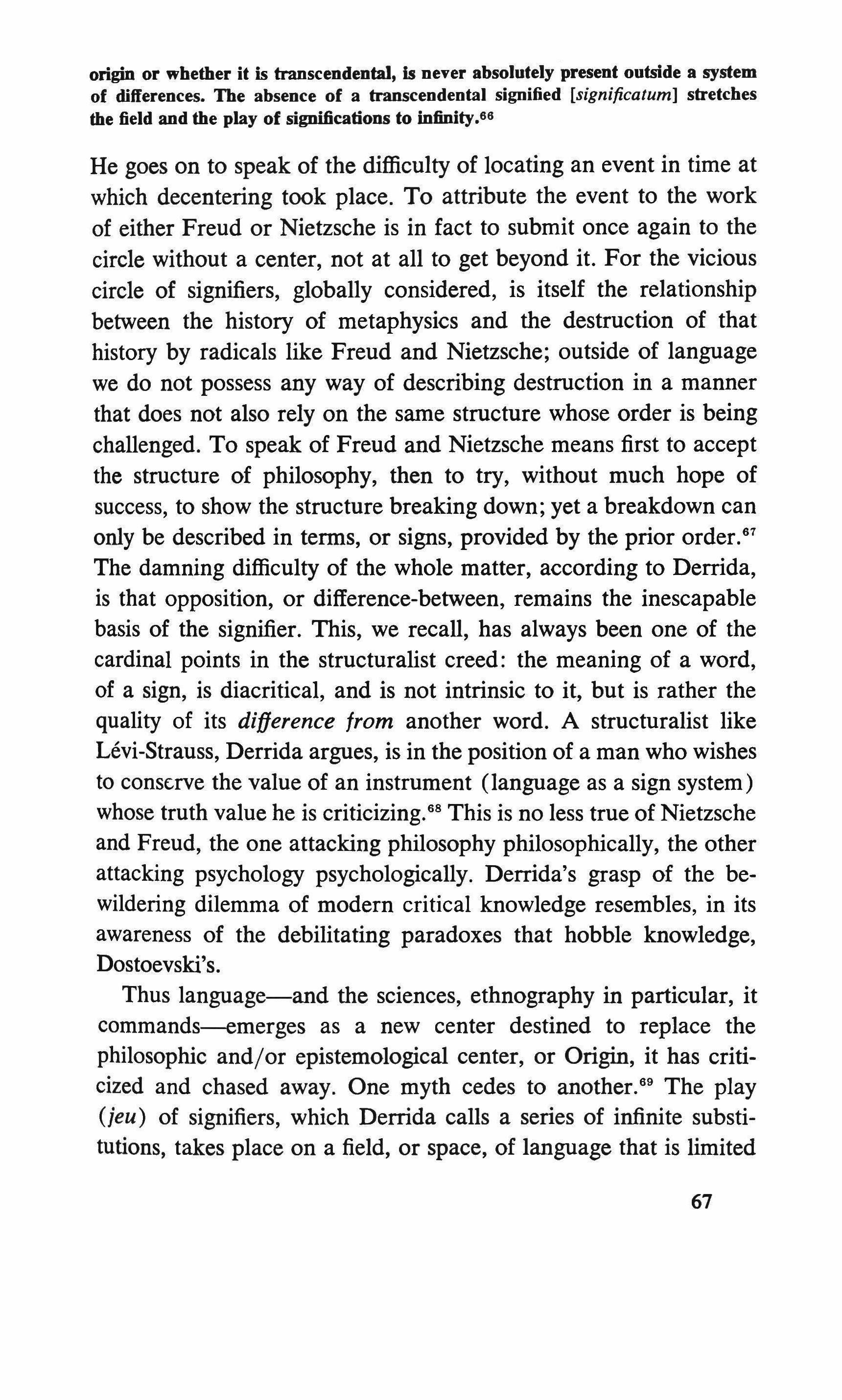
origin or whether it is transcendental, is never absolutely present outside a system of differences. The absence of a transcendental signified [signi/icatum] stretches the field and the play of significations to infinity.ss
He goes on to speak of the difficulty of locating an event in time at which decentering took place. To attribute the event to the work of either Freud or Nietzsche is in fact to submit once again to the circle without a center, not at all to get beyond it. For the vicious circle of signifiers, globally considered, is itself the relationship between the history of metaphysics and the destruction of that history by radicals like Freud and Nietzsche; outside of language we do not possess any way of describing destruction in a manner that does not also rely on the same structure whose order is being challenged. To speak of Freud and Nietzsche means first to accept the structure of philosophy, then to try, without much hope of success, to show the structure breaking down; yet a breakdown can only be described in terms, or signs, provided by the prior order. 67 The damning difficulty of the whole matter, according to Derrida, is that opposition, or difference-between, remains the inescapable basis of the signifier. This, we recall, has always been one of the cardinal points in the structuralist creed: the meaning of a word, of a sign, is diacritical, and is not intrinsic to it, but is rather the quality of its difference from another word. A structuralist like Levi-Strauss, Derrida argues, is in the position of a man who wishes to conserve the value of an instrument (language as a sign system) whose truth value he is criticizing." This is no less true of Nietzsche and Freud, the one attacking philosophy philosophically, the other attacking psychology psychologically. Derrida's grasp of the bewildering dilemma of modern critical knowledge resembles, in its awareness of the debilitating paradoxes that hobble knowledge, Dostoevski's.
Thus language-and the sciences, ethnography in particular, it commands-emerges as a new center destined to replace the philosophic and/or epistemological center, or Origin, it has criticized and chased away. One myth cedes to another." The play (jeu) of signifiers, which Derrida calls a series of infinite substitutions, takes place on a field, or space, of language that is limited 67
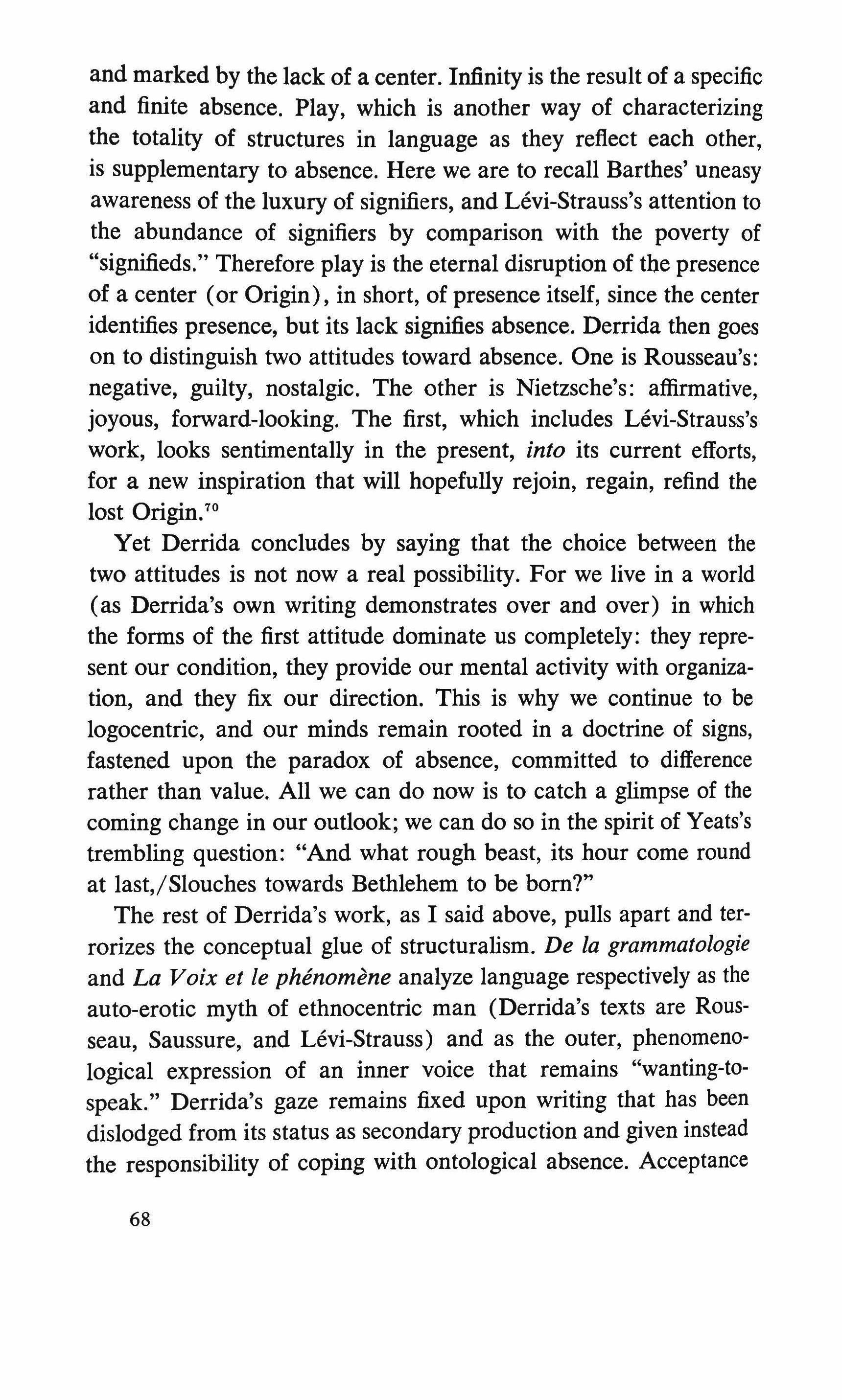
and marked by the lack of a center. Infinity is the result of a specific and finite absence. Play, which is another way of characterizing the totality of structures in language as they reflect each other, is supplementary to absence. Here we are to recall Barthes' uneasy awareness of the luxury of signifiers, and Levi-Strauss's attention to the abundance of signifiers by comparison with the poverty of "signifieds." Therefore play is the eternal disruption of the presence of a center (or Origin), in short, of presence itself, since the center identifies presence, but its lack signifies absence. Derrida then goes on to distinguish two attitudes toward absence. One is Rousseau's: negative, guilty, nostalgic. The other is Nietzsche's: affirmative, joyous, forward-looking. The first, which includes Levi-Strauss's work, looks sentimentally in the present, into its current efforts, for a new inspiration that will hopefully rejoin, regain, refind the lost Origin. 70
Yet Derrida concludes by saying that the choice between the two attitudes is not now a real possibility. For we live in a world (as Derrida's own writing demonstrates over and over) in which the forms of the first attitude dominate us completely: they represent our condition, they provide our mental activity with organization, and they fix our direction. This is why we continue to be logocentric, and our minds remain rooted in a doctrine of signs, fastened upon the paradox of absence, committed to difference rather than value. All we can do now is to catch a glimpse of the coming change in our outlook; we can do so in the spirit of Yeats's trembling question: "And what rough beast, its hour come round at last,/Slouches towards Bethlehem to be born?"
The rest of Derrida's work, as I said above, pulls apart and terrorizes the conceptual glue of structuralism. De la grammatologie and La Voix et le phenomene analyze language respectively as the auto-erotic myth of ethnocentric man (Derrida's texts are Rousseau, Saussure, and Levi-Strauss) and as the outer, phenomenological expression of an inner voice that remains "wanting-tospeak." Derrida's gaze remains fixed upon writing that has been dislodged from its status as secondary production and given instead the responsibility of coping with ontological absence. Acceptance
68
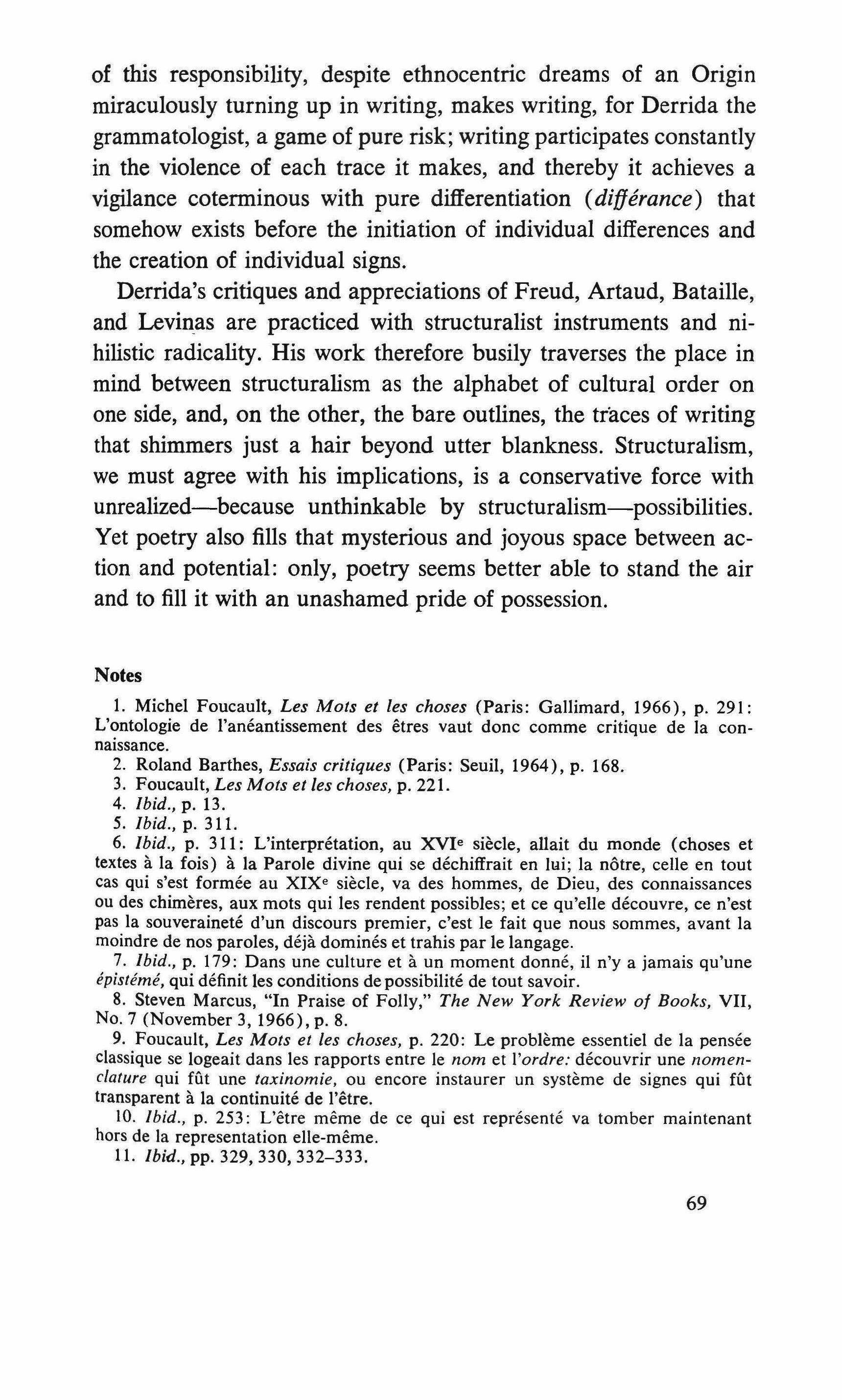
of this responsibility, despite ethnocentric dreams of an Origin miraculously turning up in writing, makes writing, for Derrida the grammatologist, a game of pure risk; writing participates constantly in the violence of each trace it makes, and thereby it achieves a vigilance coterminous with pure differentiation (difJ-erance) that somehow exists before the initiation of individual differences and the creation of individual signs.
Derrida's critiques and appreciations of Freud, Artaud, Bataille, and Levinas are practiced with structuralist instruments and nihilistic radicality. His work therefore busily traverses the place in mind between structuralism as the alphabet of cultural order on one side, and, on the other, the bare outlines, the traces of writing that shimmers just a hair beyond utter blankness. Structuralism, we must agree with his implications, is a conservative force with unrealized-because unthinkable by structuralism-possibilities. Yet poetry also fills that mysterious and joyous space between action and potential: only, poetry seems better able to stand the air and to fill it with an unashamed pride of possession.
Notes
1. Michel Foucault, Les Mots et les choses (Paris: Gallimard, 1966), p. 291: L'ontologie de I'aneantissement des etres vaut done comme critique de la connaissance.
2. Roland Barthes, Essais critiques (Paris: Seuil, 1964), p. 168.
3. Foucault, Les Mots et les choses, p. 221.
4. lbid., p. 13.
5. Ibid., p. 311.
6. lbid., p. 311: L'interpretation, au XVle siecle, al1ait du monde (choses et textes a la fois) a la Parole divine qui se dechiffrait en lui; la notre, celle en tout cas qui s'est formee au XIX· siecle, va des hommes, de Dieu, des connaissances ou des chimeres, aux mots qui les rendent possibles; et ce qu'elle decouvre, ce n'est pas la souverainete d'un discours premier, c'est le fait que nous sommes, avant la moindre de nos paroles, deja domines et trahis par le langage.
7. Ibid., p. 179: Dans une culture et a un moment donne, il n'y a jamais qu'une episteme, qui definit les conditions de possibilite de tout savoir.
8. Steven Marcus, "In Praise of Folly," The New York Review of Books, VII, No.7 (November 3,1966), p. 8.
9. Foucault, Les Mots et les choses, p. 220: Le probleme essentiel de la pensee classique se logeait dans les rapports entre Ie nom et l'ordre: decouvrir une nomenclature qui flit une taxinomie, ou encore instaurer un systerne de signes qui ffit transparent a la continuite de l'etre,
10. Ibid., p. 253: L'etre merne de ce qui est represente va tomber maintenant hors de la representation elle-rnerne.
11. lbid., pp. 329,330,332-333.
69

12. Ibid., p. 351.
13. Ibid., p. 365.
14. Ibid., p. 368.
15. Ibid., p. 376.
16. Ibid., p. 393.
17. Ibid., p. 378.
18. Ibid., p. 376: On dira done qu'il y a "science humaine" non pas partout ou il est question de l'homme, mais partout ou on analyse, dans la dimension propre a l'inconscient, des normes, des regles, des ensembles signifiants qui devoilent a la conscience les conditions de ses formes et de ses contenus.
19. Barthes, La Tour EiDel (Lausanne: Delpire, 1964), p. 82.
20. Joseph Conrad, Youth and Two Other Stories (Garden City, New York: Doubleday, 1924), pp. 112-113.
21. Claude Levi-Strauss, The Savage Mind (Chicago: University of Chicago Press, 1966), p. 252; La Pensee sauvage (Paris: Pion, 1962), p. 334: Totalisation non reflexive, la langue est une raison humaine qui a ses raisons, et que l'homme ne connait pas.
22. Emile Benveniste, Problemes de linguistlque generale (Paris: Gallimard, 1966), p. 70.
23. Foucault, Les Mots et les choses, p. 201.
24. Barthes, Essais critiques, p. 264.
25. Maurice Blanchot, "L'Homme au point zero," La Nouvelle Revue Franraise, XL (1956), 689.
26. Georges Charbonnier, Entretiens avec Claude Levi-Strauss (Paris: Pion, 1961), pp. 30, 31, 32 et passim; also, Levi-Strauss, "Introduction a l'oeuvre de Marcel Mauss," in Soclologie et Anthropologie by Marcel Mauss (Paris: Presses Universitaires de France, 1950), p. xlix.
27. Levi-Strauss, ''The Disappearance of Man," The New York Review of Books, vn, No.1 (July 28,1966), p. 7.
28. Barthes, Essais critiques, p. 274.
29. Levi-Strauss, Le cru et le cuit (Paris: Pion, 1964), pp. 23-34.
30. Barthes, "Les Sciences humaines et l'oeuvre de Levi-Strauss," Annales, VI (1964), 1085-1086.
31. Barthes, Michelet par lui-meme (Paris: Seuil, 1965), page facing frontispiece.
32. Barthes, Critique et verite (Paris: Seuil, 1966), p. 71.
33. Ferdinand de Saussure, Cours de Linguistique Generate (Paris: Payot, 1949), 4th edition, p. 20.
34. Ibid., p. 23.
35. Ibid., p. 30.
36. Ibid., p. 99.
37. Ibid., p. 100.
38. Edmund Leach, "The Legitimacy of Solomon: Some Structural Aspects of Old Testament History," Archives Europeennes de Sociologie, vn, No.1 (1966), 70.
39. Barthes, "Elements de semiologie," Communications, No.4 (1965), pp. 132-133.
40. Levi-Strauss, "Reponses a quelques questions," Esprit, No. 11 (1963), p. 630: j'avais done choisi un domaine qui pouvait, au premier abord, se signaler par son caractere incoherent et contingent, et dont j'ai essaye de montrer qu'il etait possible de Ie reduire a un tres petit nombre de porpositions signifiantes.
41. Barthes, Essais critiques, pp. 215-217.
42. Rene Girard, Deceit, Desire, and the Novel: Self and Other in Literary Structure, translated by Yvonne Freccero (Baltimore: The Johns Hopkins Press, 1965), pp. 2-3.
43. Levi-Strauss, "Introduction a l'oeuvre de Marcel Mauss," p. xxvii.
70
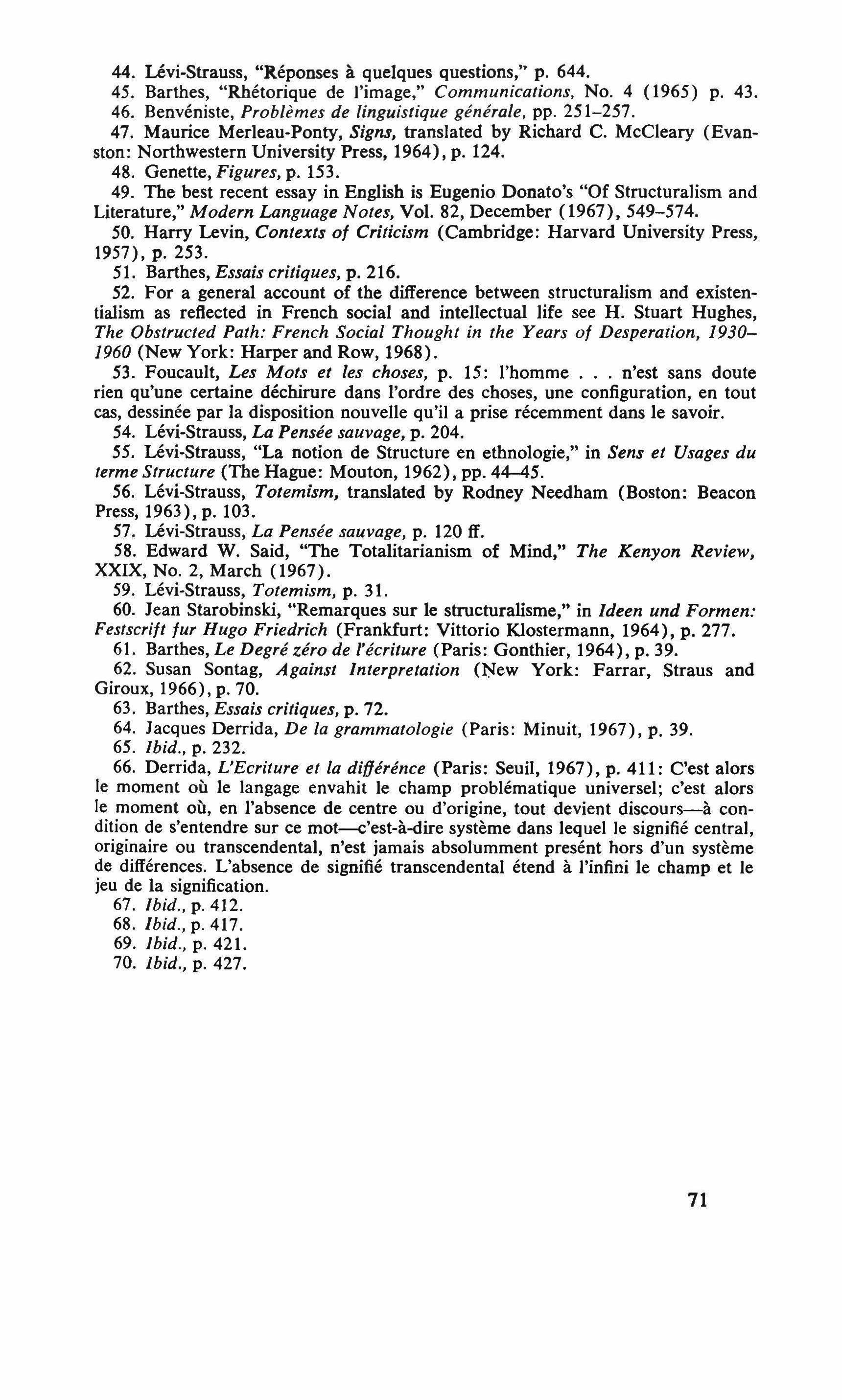
44. Levi-Strauss, "Reponses Ii quelques questions," p. 644.
45. Barthes, "Rhetorique de l'image," Communications, No. 4 (1965) p. 43.
46. Benveniste, Problemes de linguistique generaLe, pp. 251-257.
47. Maurice Merleau-Ponty, Signs, translated by Richard C. McCleary (Evanston: Northwestern University Press, 1964), p. 124.
48. Genette, Figures, p. 153.
49. The best recent essay in English is Eugenio Donato's "Of Structuralism and Literature," Modern Language Notes, Vol. 82, December (1967), 549-574.
50. Harry Levin, Contexts of Criticism (Cambridge: Harvard University Press, 1957), p. 253.
51. Barthes, Essais critiques, p. 216.
52. For a general account of the difference between structuralism and existentialism as reflected in French social and intellectual life see H. Stuart Hughes, The Obstructed Path: French SociaL Thought in the Years of Desperation, 19301960 (New York: Harper and Row, 1968).
53. Foucault, Les Mots et les choses, p. 15: I'homme n'est sans doute rien qu'une certaine dechirure dans l'ordre des choses, une configuration, en tout cas, dessinee par la disposition nouvelle qu'il a prise recemment dans Ie savoir.
54. Levi-Strauss, La Pensee sauvage, p. 204.
55. Levi-Strauss, "La notion de Structure en ethnologie," in Sens et Usages du terme Structure (The Hague: Mouton, 1962), pp. 44-45.
56. Levi-Strauss, Totemism, translated by Rodney Needham (Boston: Beacon Press, 1963),p. 103.
57. Levi-Strauss, La Pensee sauvage, p. 120 ff.
58. Edward W. Said, "The Totalitarianism of Mind," The Kenyon Review, XXIX, No.2, March (1967).
59. Levi-Strauss, Totemism, p. 31.
60. Jean Starobinski, "Remarques sur Ie structuralisme," in Ideen und Formen: Festscrift fur Hugo Friedrich (Frankfurt: Vittorio Klostermann, 1964), p. 277.
61. Barthes, Le Degre zero de l'ecriture (Paris: Gonthier, 1964), p. 39.
62. Susan Sontag, Against Interpretation (New York: Farrar, Straus and Giroux, 1966), p. 70.
63. Barthes, Essais critiques, p. 72.
64. Jacques Derrida, De La grammatoLogie (Paris: Minuit, 1967), p. 39.
65. lbid., p. 232.
66. Derrida, L'Ecriture et La difference (Paris: SeuiI, 1967), p. 411: C'est alors Ie moment ou Ie langage envahit Ie champ problematique universel; c'est alors Ie moment ou, en I'absence de centre ou d'origine, tout devient discours-e-a condition de s'entendre sur ce mot=-c'est-a-dire systeme dans lequel Ie signifie central, originaire ou transcendental, n'est jamais absolumment present hors d'un systerne de differences. L'absence de signifie transcendental etend a I'infini Ie champ et le jeu de la signification.
67. Ibid., p. 412.
68. Ibid., p. 417.
69. lbid., p. 421.
70. Ibid., p. 427.
71
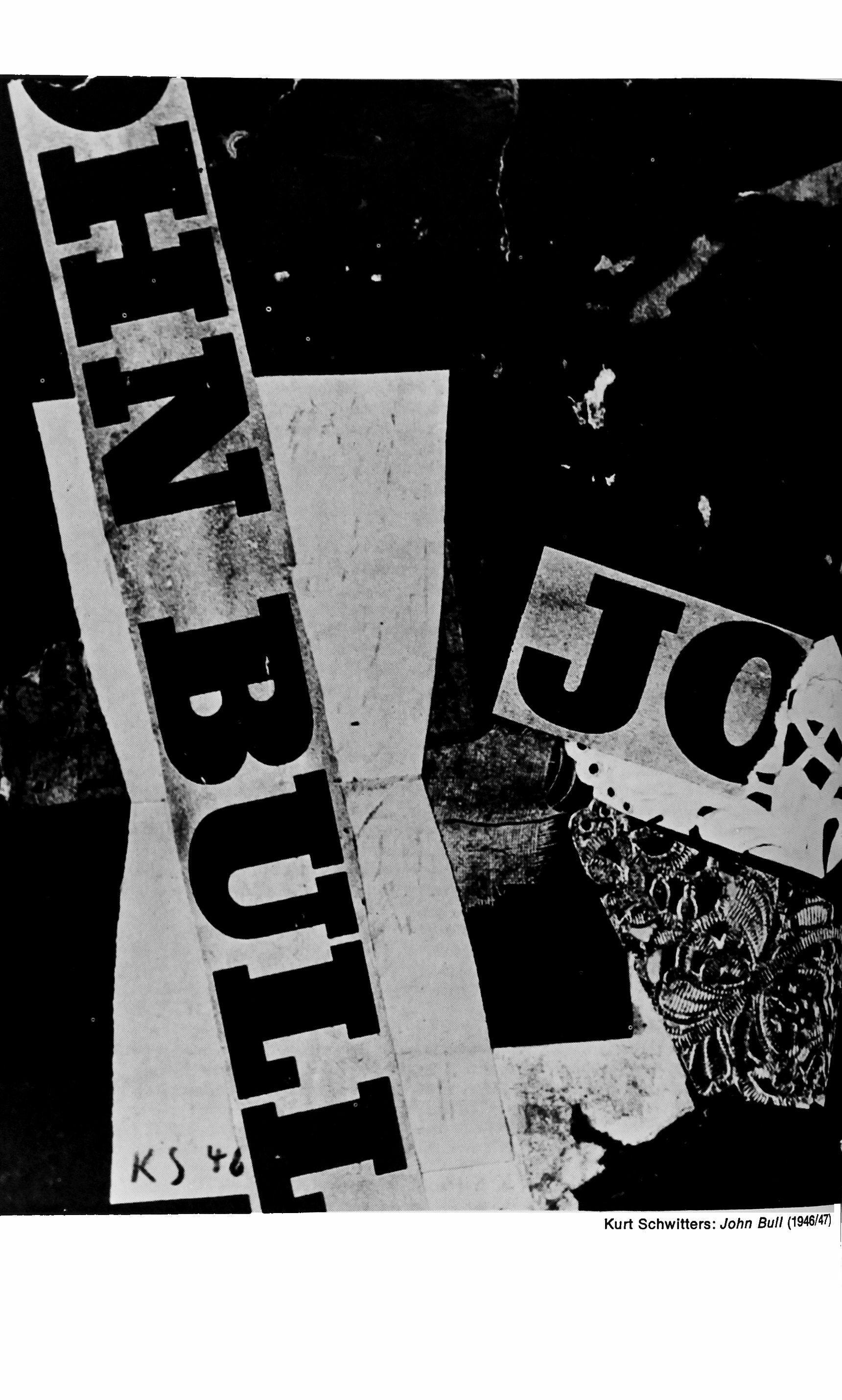
Linguistics & poetics
GEORGE STEINER

1
The naked truism that 'all literature is language' states both the self-evidence and great difficulty of my argument. All literatureoral or written, lyric or prosaic, archaic or modern-is language in a condition of special use. Every literary form-the incantation of the Bushman or a nouveau roman, a rhyming doggerel on the lavatory wall or St. John of the Cross' "Songs of the soul in rapture at having arrived at the height of perfection, which is union with God by the road of spiritual negation," King Lear or The Mousetrap-is no more and no less than a language act, a combination of linguistic units. There can, conceivably, be language without literature (artificial or computer languages may satisfy this negative condition): there can be no literature without language. Mallarme's dictum that poems are made not of ideas but of words cuts deep.
Literature is 'language in a condition of special use.' Here our difficulties begin. What is that condition? No articulate statement, one might almost say, no phonetic act or inscription but is susceptible of communicating emotion and, in a sustaining context, of conveying beauty. All signals we emit are potentially resonant with values and intensities beyond those of bare information. Zola
TriQuarterly 73
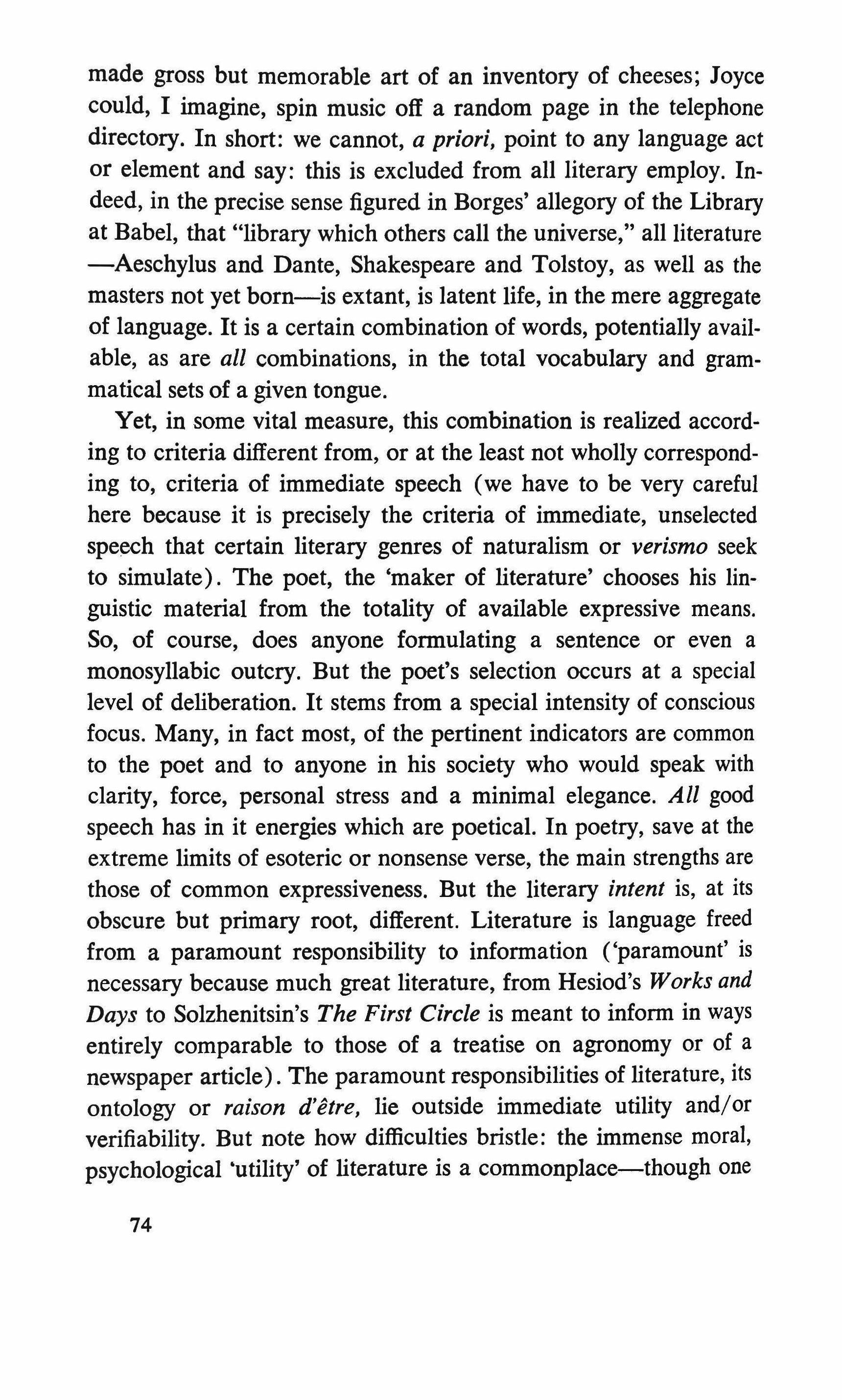
made gross but memorable art of an inventory of cheeses; Joyce could, I imagine, spin music off a random page in the telephone directory. In short: we cannot, a priori, point to any language act or element and say: this is excluded from all literary employ. Indeed, in the precise sense figured in Borges' allegory of the Library at Babel, that "library which others call the universe," all literature -Aeschylus and Dante, Shakespeare and Tolstoy, as well as the masters not yet born-is extant, is latent life, in the mere aggregate of language. It is a certain combination of words, potentially available, as are all combinations, in the total vocabulary and grammatical sets of a given tongue.
Yet, in some vital measure, this combination is realized according to criteria different from, or at the least not wholly corresponding to, criteria of immediate speech (we have to be very careful here because it is precisely the criteria of immediate, unselected speech that certain literary genres of naturalism or verismo seek to simulate). The poet, the 'maker of literature' chooses his linguistic material from the totality of available expressive means. So, of course, does anyone formulating a sentence or even a monosyllabic outcry. But the poet's selection occurs at a special level of deliberation. It stems from a special intensity of conscious focus. Many, in fact most, of the pertinent indicators are common to the poet and to anyone in his society who would speak with clarity, force, personal stress and a minimal elegance. All good speech has in it energies which are poetical. In poetry, save at the extreme limits of esoteric or nonsense verse, the main strengths are those of common expressiveness. But the literary intent is, at its obscure but primary root, different. Literature is language freed from a paramount responsibility to information ('paramount' is necessary because much great literature, from Hesiod's Works and Days to Solzhenitsin's The First Circle is meant to inform in ways entirely comparable to those of a treatise on agronomy or of a newspaper article). The paramount responsibilities of literature, its ontology or raison d'etre, lie outside immediate utility and/or verifiability. But note how difficulties bristle: the immense moral, psychological 'utility' of literature is a commonplace-though one
74
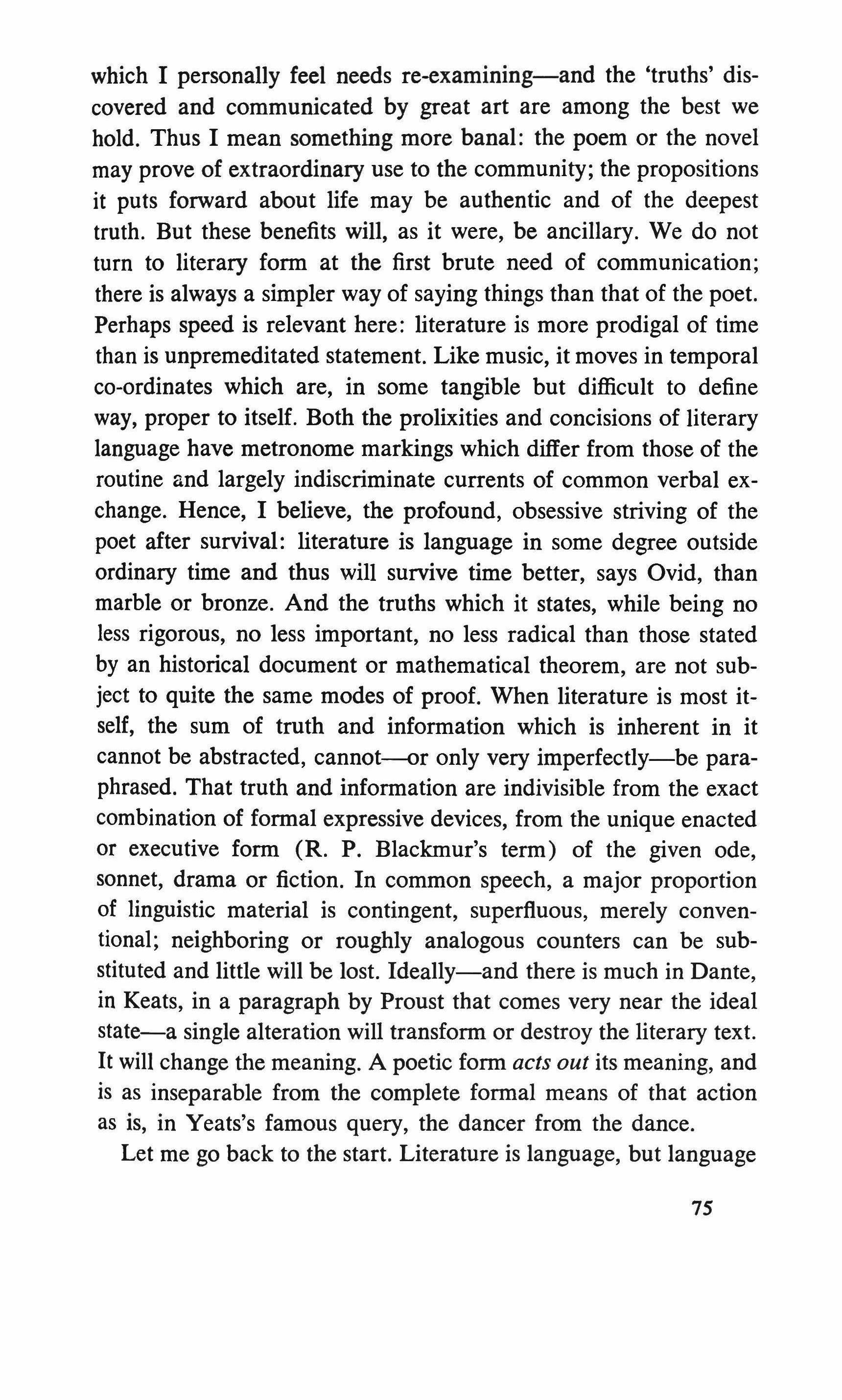
which I personally feel needs re-examining-and the 'truths' discovered and communicated by great art are among the best we hold. Thus I mean something more banal: the poem or the novel may prove of extraordinary use to the community; the propositions it puts forward about life may be authentic and of the deepest truth. But these benefits will, as it were, be ancillary. We do not turn to literary form at the first brute need of communication; there is always a simpler way of saying things than that of the poet. Perhaps speed is relevant here: literature is more prodigal of time than is unpremeditated statement. Like music, it moves in temporal co-ordinates which are, in some tangible but difficult to define way, proper to itself. Both the prolixities and concisions of literary language have metronome markings which differ from those of the routine and largely indiscriminate currents of common verbal exchange. Hence, I believe, the profound, obsessive striving of the poet after survival: literature is language in some degree outside ordinary time and thus will survive time better, says Ovid, than marble or bronze. And the truths which it states, while being no less rigorous, no less important, no less radical than those stated by an historical document or mathematical theorem, are not subject to quite the same modes of proof. When literature is most itself, the sum of truth and information which is inherent in it cannot be abstracted, cannot--or only very imperfectly-be paraphrased. That truth and information are indivisible from the exact combination of formal expressive devices, from the unique enacted or executive form (R. P. Blackmur's term) of the given ode, sonnet, drama or fiction. In common speech, a major proportion of linguistic material is contingent, superfluous, merely conventional; neighboring or roughly analogous counters can be substituted and little will be lost. Ideally-and there is much in Dante, in Keats, in a paragraph by Proust that comes very near the ideal state-a single alteration will transform or destroy the literary text. It will change the meaning. A poetic form acts out its meaning, and is as inseparable from the complete formal means of that action as is, in Yeats's famous query, the dancer from the dance. Let me go back to the start. Literature is language, but language 7S
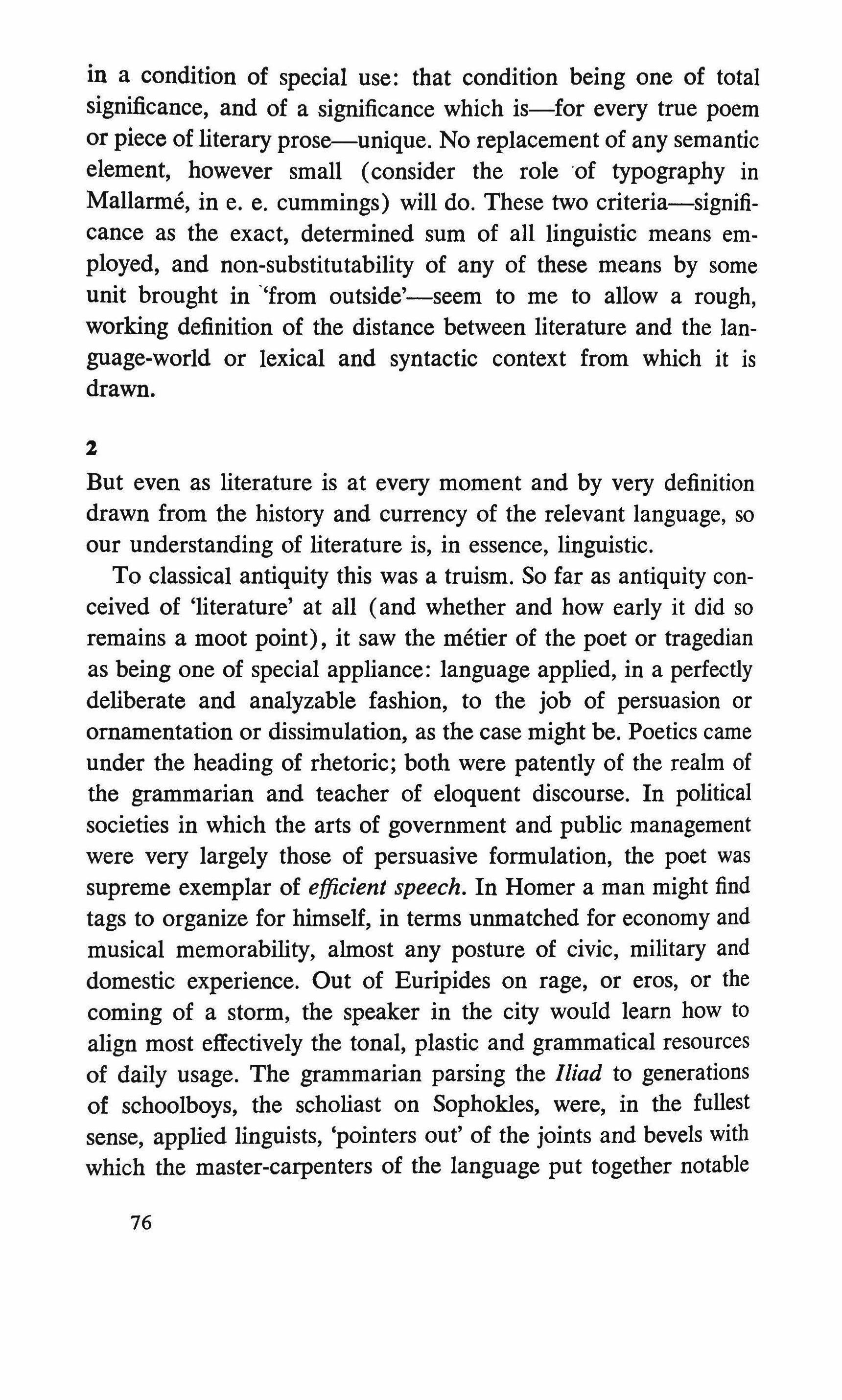
in a condition of special use: that condition being one of total significance, and of a significance which is-for every true poem or piece of literary prose-unique. No replacement of any semantic element, however small (consider the role 'of typography in Mallarme, in e. e. cummings) will do. These two criteria-significance as the exact, determined sum of all linguistic means employed, and non-substitutability of any of these means by some unit brought in "from outside'-seem to me to allow a rough, working definition of the distance between literature and the language-world or lexical and syntactic context from which it is drawn.
2
But even as literature is at every moment and by very definition drawn from the history and currency of the relevant language, so our understanding of literature is, in essence, linguistic.
To classical antiquity this was a truism. So far as antiquity conceived of 'literature' at all (and whether and how early it did so remains a moot point), it saw the metier of the poet or tragedian as being one of special appliance: language applied, in a perfectly deliberate and analyzable fashion, to the job of persuasion or ornamentation or dissimulation, as the case might be. Poetics came under the heading of rhetoric; both were patently of the realm of the grammarian and teacher of eloquent discourse. In political societies in which the arts of government and public management were very largely those of persuasive formulation, the poet was supreme exemplar of efficient speech. In Homer a man might find tags to organize for himself, in terms unmatched for economy and musical memorability, almost any posture of civic, military and domestic experience. Out of Euripides on rage, or eros, or the coming of a storm, the speaker in the city would learn how to align most effectively the tonal, plastic and grammatical resources of daily usage. The grammarian parsing the Iliad to generations of schoolboys, the scholiast on Sophokles, were, in the fullest sense, applied linguists, 'pointers out' of the joints and bevels with which the master-carpenters of the language put together notable
76
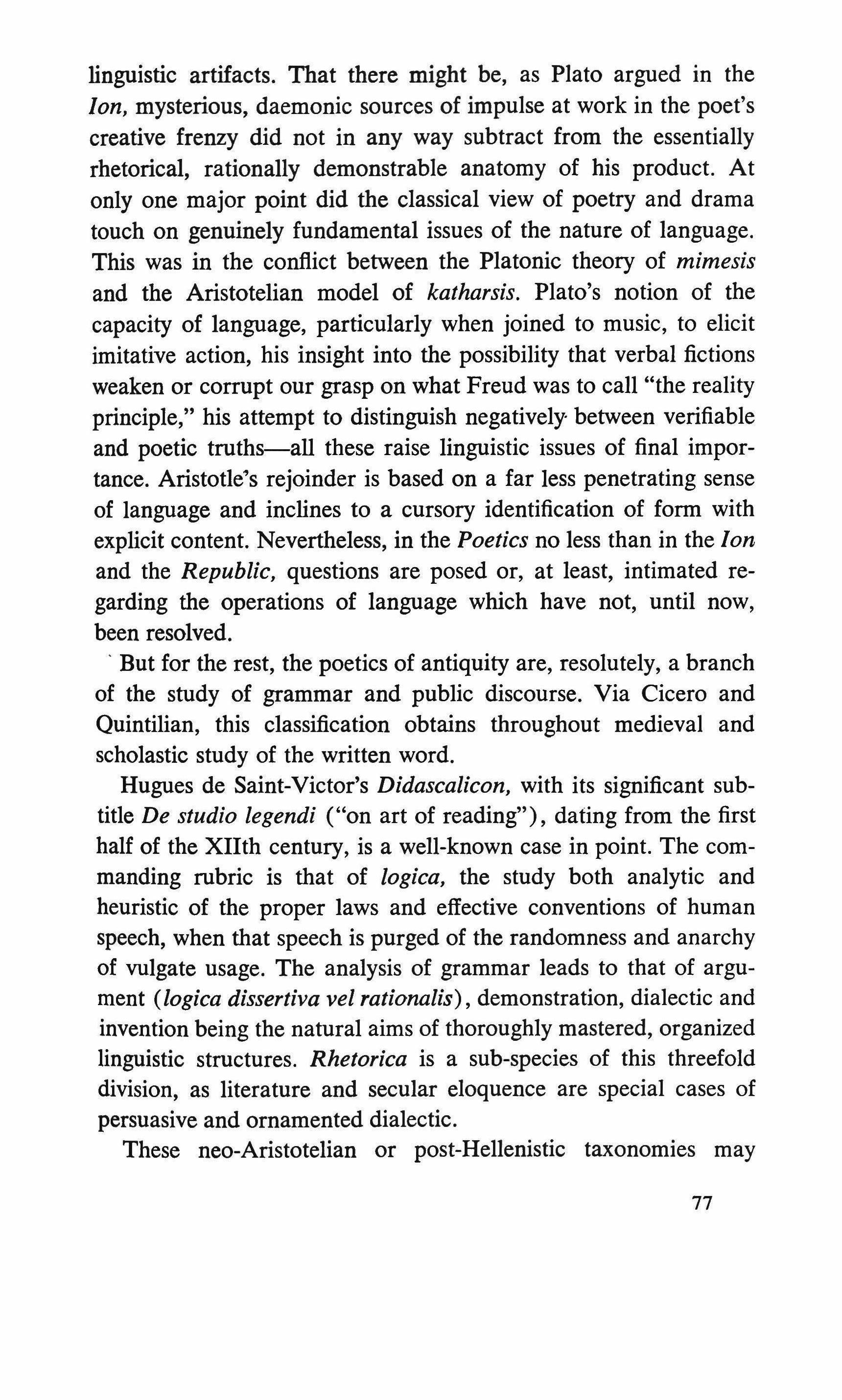
linguistic artifacts. That there might be, as Plato argued in the lon, mysterious, daemonic sources of impulse at work in the poet's creative frenzy did not in any way subtract from the essentially rhetorical, rationally demonstrable anatomy of his product. At only one major point did the classical view of poetry and drama touch on genuinely fundamental issues of the nature of language. This was in the conflict between the Platonic theory of mimesis and the Aristotelian model of katharsis. Plato's notion of the capacity of language, particularly when joined to music, to elicit imitative action, his insight into the possibility that verbal fictions weaken or corrupt our grasp on what Freud was to call "the reality principle," his attempt to distinguish negatively between verifiable and poetic truths-all these raise linguistic issues of final importance. Aristotle's rejoinder is based on a far less penetrating sense of language and inclines to a cursory identification of form with explicit content. Nevertheless, in the Poetics no less than in the Ion and the Republic, questions are posed or, at least, intimated regarding the operations of language which have not, until now, been resolved
But for the rest, the poetics of antiquity are, resolutely, a branch of the study of grammar and public discourse. Via Cicero and Quintilian, this classification obtains throughout medieval and scholastic study of the written word.
Hugues de Saint-Vietor's Didascalicon, with its significant subtitle De studio legendi ("on art of reading"), dating from the first half of the XIIth century, is a well-known case in point. The commanding rubric is that of logica, the study both analytic and heuristic of the proper laws and effective conventions of human speech, when that speech is purged of the randomness and anarchy of vulgate usage. The analysis of grammar leads to that of argument (logica dissertiva vel rationalis), demonstration, dialectic and invention being the natural aims of thoroughly mastered, organized linguistic structures. Rhetorica is a sub-species of this threefold division, as literature and secular eloquence are special cases of persuasive and ornamented dialectic. These neo-Aristotelian or post-Hellenistic taxonomies may
77

strike us as arbitrary or imperceptive. But they brought with them a scruple and strength of actual linguistic practice which constitute one of the real, and all but extinct, glories of the Western inquisitive tradition. Exegetists from the XIIth century to Scaliger possessed a knowledge of prosodic forms, a feel for the live and technical fibers of grammar, a familiarity with the syntactic sources of pathos, violence and sublimity, which we can hardly pretend to equal. They may have worked at the surface of language but it was a surface intricately mapped-and far more literature than romantic theory would have us suppose is surface, conventionally impelled and publicly construed. Scholastic and Renaissance grammarians knew that whatever else he may be, the great writer is a technician, an artisan exhibiting profound but ultimately public, understandable skills. The great grammarians of Port Royal in the XVIIth century, who are so much invoked in current debate on transformational grammars, were the direct heirs of this tradition of scholastic rhetoric.
Why the XVIIIth century should have been so largely indifferent to the linguistic structures underlying literature is a problem which, to the best of my knowledge, has been little looked into. The reasons are probably far-reaching. The XVIIIth century ideal was, fundamentally, one of lucid paraphrase: the lyric or dramatic genre being an elevation, an embellishment of a content which could, in turn, be extracted from the poem and laid out in everyday prose. Those criteria of intelligibility, robust clarity and ordered sequence which give the best of neo-classic and Augustan writing its distinctive urbane force, were, in the genuine sense, prosaic. Moreover that universal civility which the XVIIIth century strove for-the notion that almost the entirety of felt and thought life could be articulated in elegant but unobtrusive French-militated against any warier, more penetrative view of the limits or local depths of language. To these factors we must add a characteristic vein, which will run ever-broadening through the Victorian and modem periods, of Horatian-Christian moralizing. The work of literature was to be judged not as a linguistic artifact, defining its own stylized, extra-territorial standards of truth and relevance: it
78

was to be seen for its explicit ethical content, and judged accordingly. Dr. Leavis' judgment of Samuel Johnson's Shakespeare criticism can stand for an essential trait of the entire Augustan age:
Not really appreciating the poetry, he cannot appreciate the dramatic organization; more generally, he cannot appreciate the ways in which not only Shakespeare's drama but all works of art act their moral judgements. For Johnson a thing is stated, or it isn't there.
Or to put it otherwise: the XVIIIth century values great literature in spite of rather than because of the language in which it has what is to us its unique, determining life.
But it was precisely in the late XVIIIth century, with Sir William Jones's famous paper of 1786 on Sanskrit and its relations to Greek and Latin, that comparative linguistics in the modem sense got under way. By the 1820's many of what we now recognize as the essential, deep problems in the study of language had been clearly posed.
3
That August Wilhelm von Schlegel should, at the same time, be a literary critic of major importance, one whose stress on the organic nature of a work of art exercised great influence on the entire romantic movement, and Professor of Sanskrit in Bonn, aptly illustrates the new mood. It is from the early XIXth century on that technical linguistics, the philosophy of language and the study of literature will engage in a joint-though often interrupted and mutually suspicious-collaborative enterprise. And they will do so with an awareness of complexities and a sense of discriminations between possible disciplines very different from the confident classifications of literature and rhetoric made by ancient and medieval grammarians.
In Coleridge almost every aspect of the modern note is struck at once and with a resonance reaching to our own day. I have in mind chapters xv through xxii of the Biographia Literaria, texts in which a poetic and a linguistic sensibility conjoin with a perceptive acuity, breadth of exact inference and consciousness of the orders of difficulty involved which I would still judge unsurpassed. Cole-
79
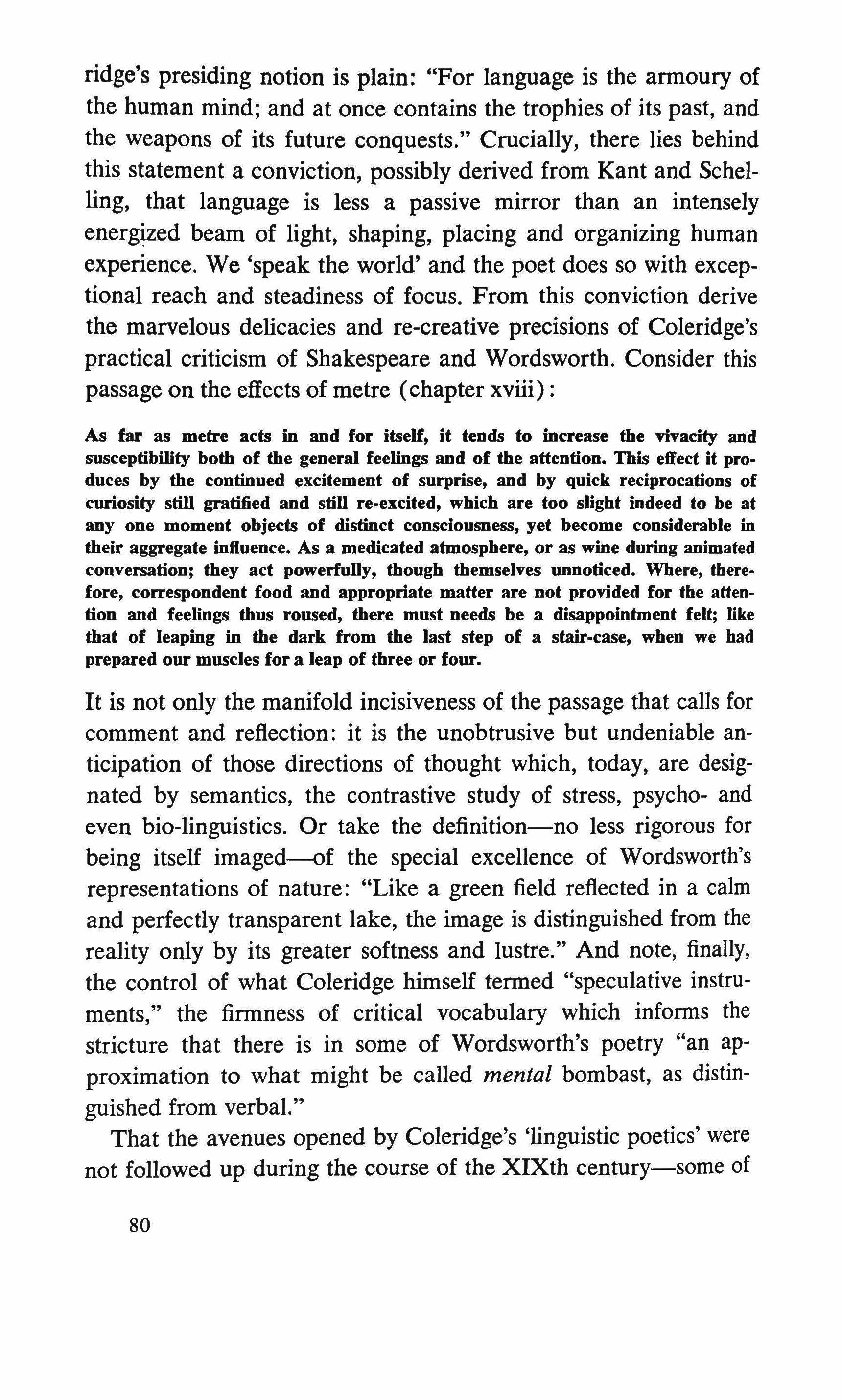
ridge's presiding notion is plain: "For language is the armoury of the human mind; and at once contains the trophies of its past, and the weapons of its future conquests." Crucially, there lies behind this statement a conviction, possibly derived from Kant and Schelling, that language is less a passive mirror than an intensely energized beam of light, shaping, placing and organizing human experience. We 'speak the world' and the poet does so with exceptional reach and steadiness of focus. From this conviction derive the marvelous delicacies and re-creative precisions of Coleridge's practical criticism of Shakespeare and Wordsworth. Consider this passage on the effects of metre (chapter xviii) :
As far as metre acts in and for itself, it tends to increase the vivacity and susceptibility both of the general feelings and of the attention. This effect it produces by the continued excitement of surprise, and by quick reciprocations of curiosity still gratified and still re-exclted, which are too slight indeed to be at anyone moment objects of distinct consciousness, yet become considerable in their aggregate inftuence. As a medicated atmosphere, or as wine during animated conversation; they act powerfully, though themselves unnoticed. Where, therefore, correspondent food and appropriate matter are not provided for the attention and feelings thus roused, there must needs be a disappointment felt; like that of leaping in the dark from the last step of a stair-case, when we had prepared our muscles for a leap of three or four.
It is not only the manifold incisiveness of the passage that calls for comment and reflection: it is the unobtrusive but undeniable anticipation of those directions of thought which, today, are designated by semantics, the contrastive study of stress, psycho- and even bio-linguistics. Or take the definition-no less rigorous for being itself imaged-of the special excellence of Wordsworth's representations of nature: "Like a green field reflected in a calm and perfectly transparent lake, the image is distinguished from the reality only by its greater softness and lustre." And note, finally, the control of what Coleridge himself termed "speculative instruments," the firmness of critical vocabulary which informs the stricture that there is in some of Wordsworth's poetry "an approximation to what might be called mental bombast, as distinguished from verbal."
That the avenues opened by Coleridge's 'linguistic poetics' were not followed up during the course of the XIXth century-some of
80

Baudelaire's critical writings being an exception, though an exception directed most trenchantly toward art rather than literatureis, in part, an accident of the availability or absence of personal genius. There are respects in which Coleridge had no immediate successor but Newman. But more emphatically, the two great energies of XIXth century literary study were moralizing-the tradition which leads from Dr. Johnson to Matthew Arnold and, ultimately, to Leavis-and historicist. With such representative critics as Sainte-Beuve and Taine (in this case Edmund Wilson is the modern heir), the study of literature was made resolutely historical-sociological. Comparative linguistics, with its marked successes in establishing the genetics and morphology of IndoEuropean languages, ran parallel to the understanding of literature. Mutual contacts were few and superficial.
But it is Coleridge's presence which stands most vivid and premonitory when the modem 'language revolution' gets under way at the turn of our century.
4
As I have sought to show elsewhere, this revolution had many congruent sources. That re-examination of the foundations of mathematical logic which we associate with Hilbert, Frege and the early work of Russell led both to the development of modern symbolic logic and to the key recognition that such logic, no less than mathematics itself, was a code, an information structure, with dilemmas and potentialities relevant to the understanding of language. The work of Cassirer on the essentially symbolic nature of human expression (work ultimately rooted in Vico and Coleridge) touched at more than one point on that of the symbolic and mathematical logicians. Though initially unaware of the fact, even resistant to it, the psychoanalytic movement was, fundamentally, an exploration of language habits, of the verbal gestures of consciousness; the raw material of the psychoanalytic process is inevitably linguistic. The insights of psychoanalysis into the neurophysiology of mental life remain conjectural; its disclosures in the realm of linguistic usage and taboo, of semantic ambivalence and
81
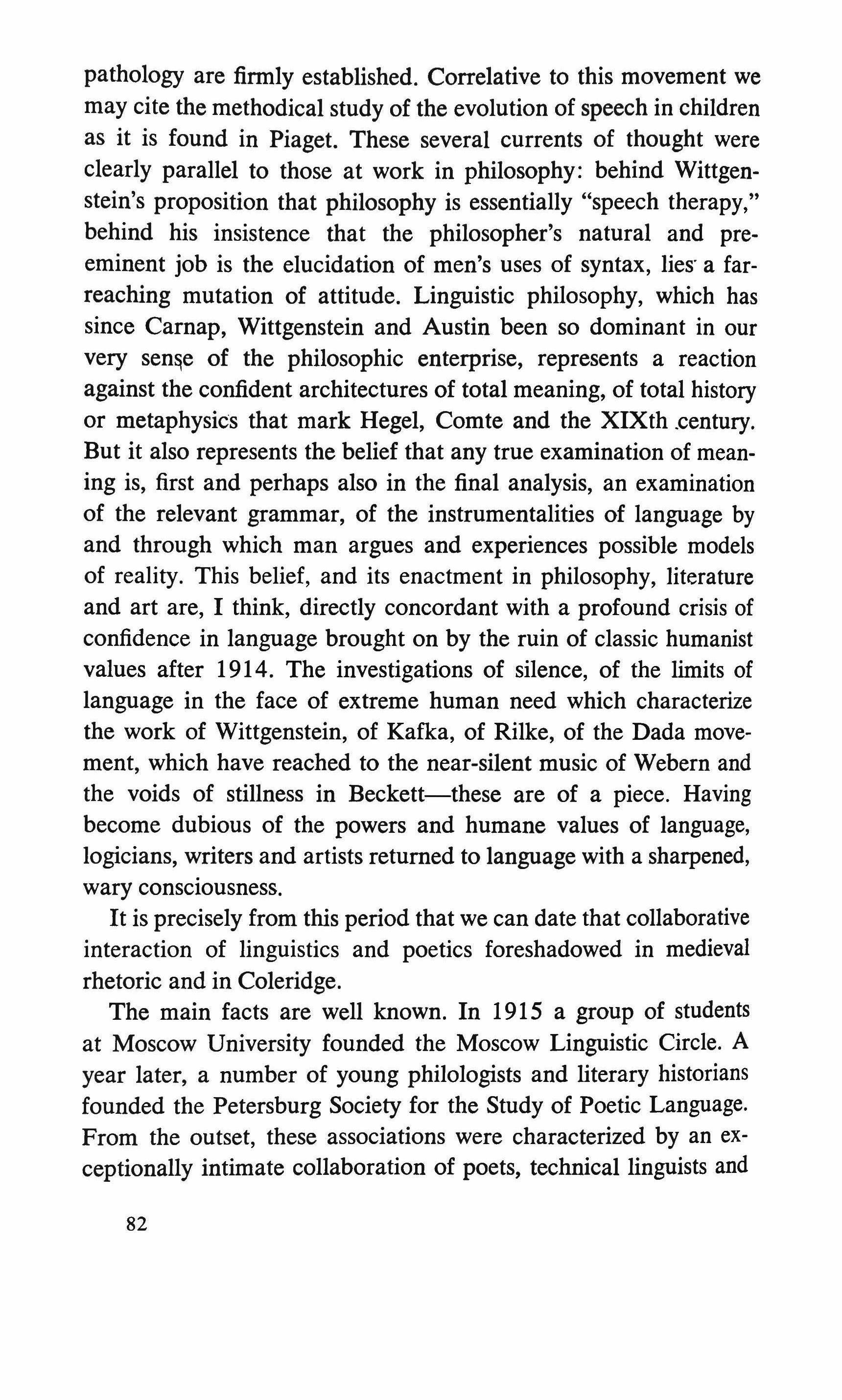
pathology are firmly established. Correlative to this movement we may cite the methodical study of the evolution of speech in children as it is found in Piaget. These several currents of thought were clearly parallel to those at work in philosophy: behind Wittgenstein's proposition that philosophy is essentially "speech therapy," behind his insistence that the philosopher's natural and preeminent job is the elucidation of men's uses of syntax, lies' a farreaching mutation of attitude. Linguistic philosophy, which has since Carnap, Wittgenstein and Austin been so dominant in our very sense of the philosophic enterprise, represents a reaction against the confident architectures of total meaning, of total history or metaphysics that mark Hegel, Comte and the XIXth .century. But it also represents the belief that any true examination of meaning is, first and perhaps also in the final analysis, an examination of the relevant grammar, of the instrumentalities of language by and through which man argues and experiences possible models of reality. This belief, and its enactment in philosophy, literature and art are, I think, directly concordant with a profound crisis of confidence in language brought on by the ruin of classic humanist values after 1914. The investigations of silence, of the limits of language in the face of extreme human need which characterize the work of Wittgenstein, of Kafka, of Rilke, of the Dada movement, which have reached to the near-silent music of Webern and the voids of stillness in Beckett-these are of a piece. Having become dubious of the powers and humane values of language, logicians, writers and artists returned to language with a sharpened, wary consciousness.
It is precisely from this period that we can date that collaborative interaction of linguistics and poetics foreshadowed in medieval rhetoric and in Coleridge.
The main facts are well known. In 1915 a group of students at Moscow University founded the Moscow Linguistic Circle. A year later, a number of young philologists and literary historians founded the Petersburg Society for the Study of Poetic Language. From the outset, these associations were characterized by an exceptionally intimate collaboration of poets, technical linguists and 82
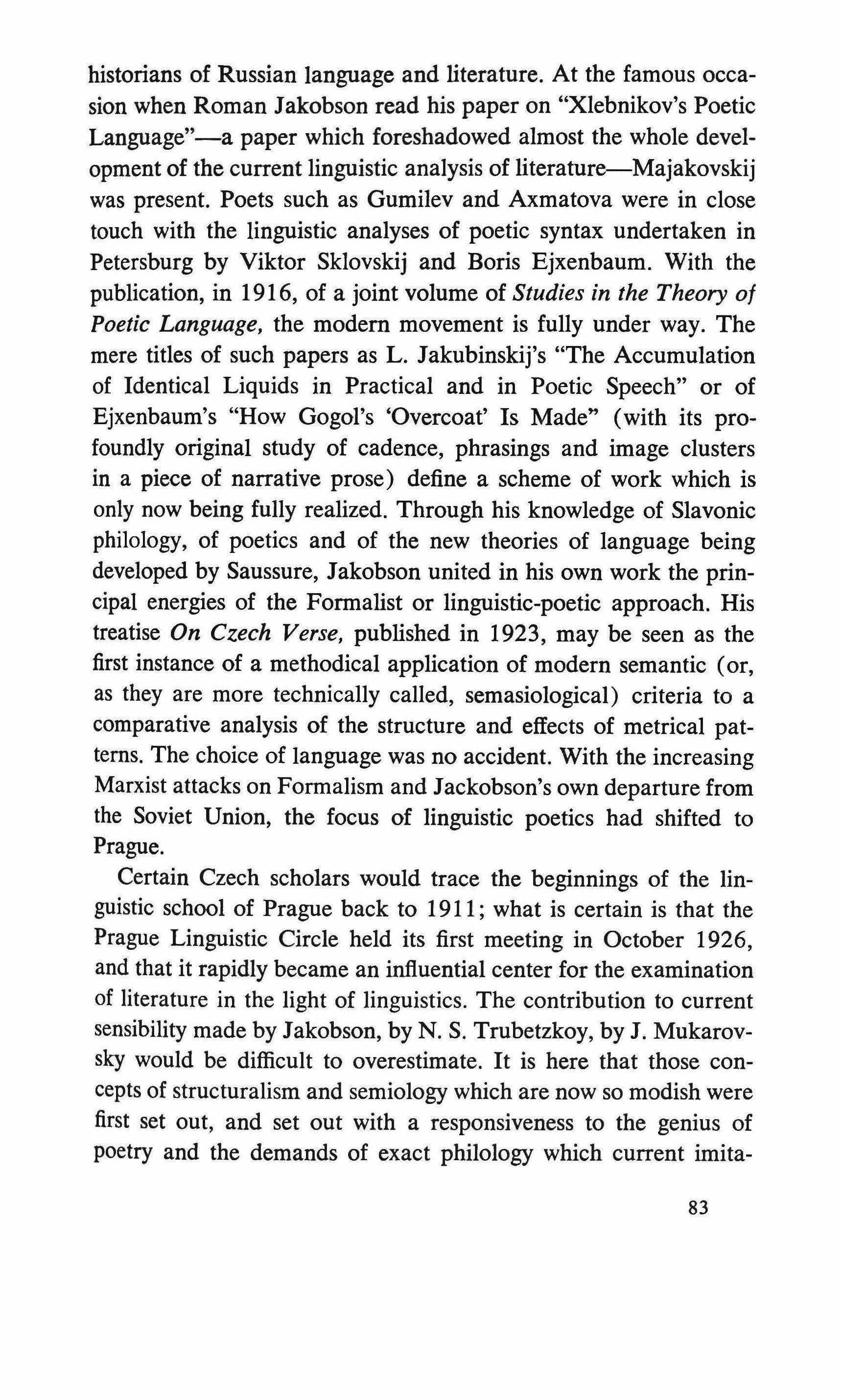
historians of Russian language and literature. At the famous occasion when Roman Jakobson read his paper on "Xlebnikov's Poetic Language"-a paper which foreshadowed almost the whole development of the current linguistic analysis of literature-Majakovskij was present. Poets such as Gumilev and Axmatova were in close touch with the linguistic analyses of poetic syntax undertaken in Petersburg by Viktor Sklovskij and Boris Ejxenbaum. With the publication, in 1916, of a joint volume of Studies in the Theory of Poetic Language, the modem movement is fully under way. The mere titles of such papers as L. Jakubinskij's "The Accumulation of Identical Liquids in Practical and in Poetic Speech" or of Ejxenbaum's "How Gogol's 'Overcoat' Is Made" (with its profoundly original study of cadence, phrasings and image clusters in a piece of narrative prose) define a scheme of work which is only now being fully realized. Through his knowledge of Slavonic philology, of poetics and of the new theories of language being developed by Saussure, Jakobson united in his own work the principal energies of the Formalist or linguistic-poetic approach. His treatise On Czech Verse, published in 1923, may be seen as the first instance of a methodical application of modern semantic (or, as they are more technically called, semasiological) criteria to a comparative analysis of the structure and effects of metrical patterns. The choice of language was no accident. With the increasing Marxist attacks on Formalism and Jackobson's own departure from the Soviet Union, the focus of linguistic poetics had shifted to Prague.
Certain Czech scholars would trace the beginnings of the linguistic school of Prague back to 1911; what is certain is that the Prague Linguistic Circle held its first meeting in October 1926, and that it rapidly became an influential center for the examination of literature in the light of linguistics. The contribution to current sensibility made by Jakobson, by N. S. Trubetzkoy, by 1. Mukarovsky would be difficult to overestimate. It is here that those concepts of structuralism and semiology which are now so modish were first set out, and set out with a responsiveness to the genius of poetry and the demands of exact philology which current imita-
83
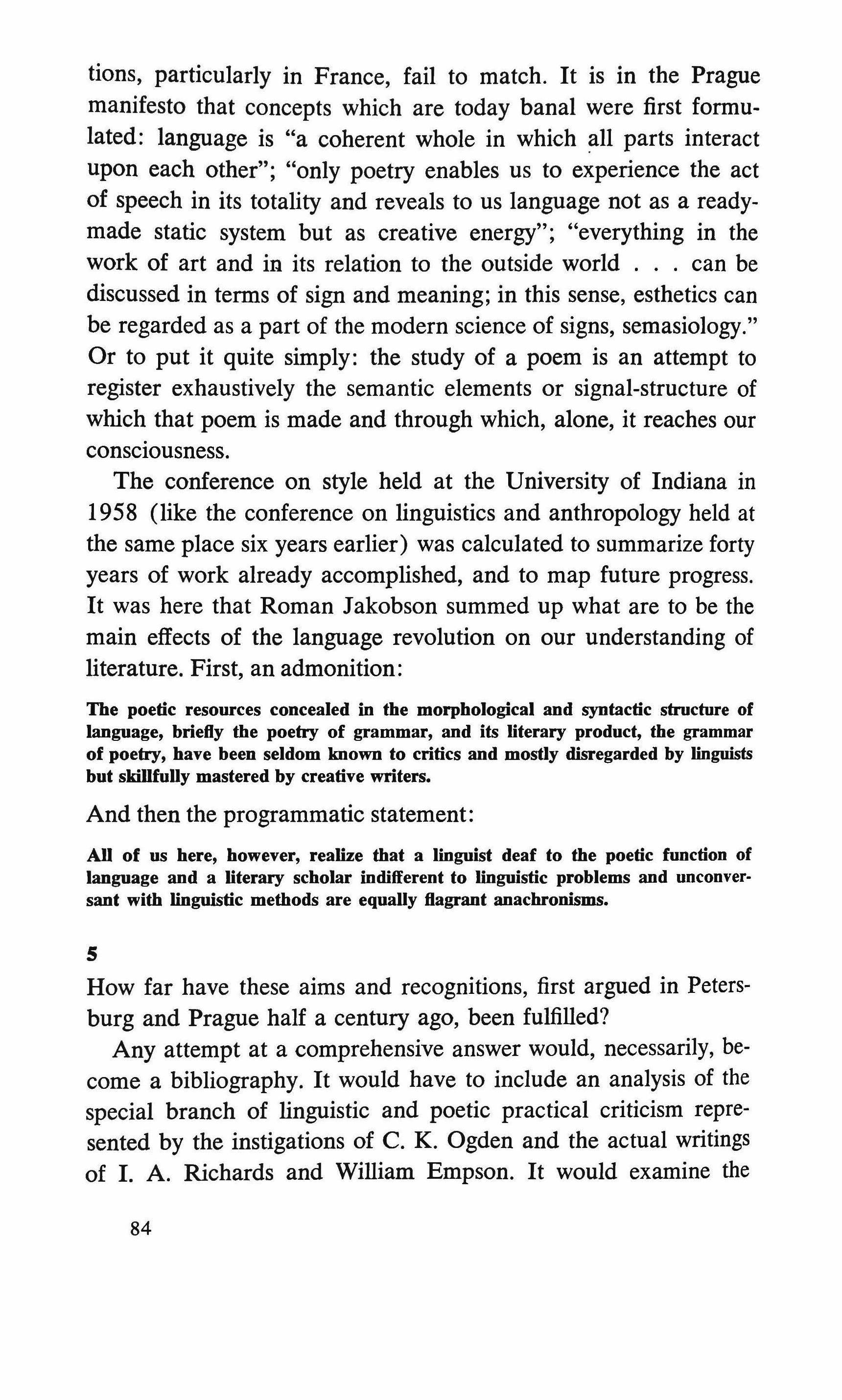
tions, particularly in France, fail to match. It is in the Prague manifesto that concepts which are today banal were first formulated: language is "a coherent whole in which all parts interact upon each other"; "only poetry enables us to experience the act of speech in its totality and reveals to us language not as a readymade static system but as creative energy"; "everything in the work of art and in its relation to the outside world can be discussed in terms of sign and meaning; in this sense, esthetics can be regarded as a part of the modern science of signs, semasiology." Or to put it quite simply: the study of a poem is an attempt to register exhaustively the semantic elements or signal-structure of which that poem is made and through which, alone, it reaches our consciousness.
The conference on style held at the University of Indiana in 1958 (like the conference on linguistics and anthropology held at the same place six years earlier) was calculated to summarize forty years of work already accomplished, and to map future progress. It was here that Roman Jakobson summed up what are to be the main effects of the language revolution on our understanding of literature. First, an admonition:
The poetic resources concealed in the morphological and syntactic structure of language, briefly the poetry of grammar, and its literary product, the grammar of poetry, have been seldom known to critics and mostly disregarded by linguists but skillfully mastered by creative writers.
And then the programmatic statement:
AIl of us here, however, realize that a linguist deaf to the poetic function of language and a literary scholar indifferent to linguistic problems and unconversant with linguistic methods are equally flagrant anachronisms.
5
How far have these aims and recognitions, first argued in Petersburg and Prague half a century ago, been fulfilled?
Any attempt at a comprehensive answer would, necessarily, become a bibliography. It would have to include an analysis of the special branch of linguistic and poetic practical criticism represented by the instigations of C. K. Ogden and the actual writings of I. A. Richards and William Empson. It would examine the
84

fragmentary but formidably suggestive 'hermeneutic' criticism of Walter Benjamin, with its endeavor to combine a linguistic with a sociological methodology in the reading of baroque drama and of Baudelaire. It would want to say a good deal (though so far as I am concerned, abrasively) of the 'semiotics,' 'semiology' and 'structural grammatology' presently flourishing in France. It would invite close valuation of a number of key texts: Josephine Miles's "More Semantics of Poetry" (1940), John Crowe Ransom's "Wanted: An Ontological Critic" (1941), Christine Brooke-Rose's A Grammar of Metaphor (1958), I. A. Richards' "Poetic Process and Literary Analysis" and Jakobson's "Linguistics and Poetics" (both in 1960), Samuel R. Levin's "Poetry and Grammaticalness" ( 1964). Professor Stephen Ullmann's studies of the syntax of the French novel would be highly relevant as well as Donald Davies' two incisive books on energy and structure in English verse. One would want to look closely at the fascinating analyses of coding, information patterns and narrative structure in primitive or archaic folk songs and oral recitation made by T. A. Sebeok and Tzvetan Todorov. Already the terrain is very large and impossible to judge according to any single criterion of intent or success.
Nevertheless, the charge that all this deployment of linguistic resources, of philosophic intelligence, of trained sensibility to the poetic life of language has not really contributed all that much to our reading of a poem cannot be ignored. Time and again, it will be said, the application of sophisticated semantic categories, the quasi-mathematical dismemberment of a literary text, the lexical and syntactic elaboration of its armature produce conclusions that are either unconvincingly esoteric or platitudinous. Surely we had no need of Jakobson or Saussure to tell us that the juxtaposition of Anglo-Saxon with Latinate words in a Shakespearean line makes for dramatic contrast, or that the stressed array of sharp vowel sounds in a poem by Mallarme-e-the letter i for examplemakes for distinct effects of brittle whiteness and chill. And, above all, what have linguistics, semiology, psycholinguistics contributed to the root wonder of invention, to our understanding of the 85

pathology are firmly established. Correlative to this movement we may cite the methodical study of the evolution of speech in children as it is found in Piaget. These several currents of thought were clearly parallel to those at work in philosophy: behind Wittgenstein's proposition that philosophy is essentially "speech therapy," behind his insistence that the philosopher's natural and preeminent job is the elucidation of men's uses of syntax, lies' a farreaching mutation of attitude. Linguistic philosophy, which has since Carnap, Wittgenstein and Austin been so dominant in our very sense of the philosophic enterprise, represents a reaction against the confident architectures of total meaning, of total history or metaphysics that mark Hegel, Comte and the XIXth .century. But it also represents the belief that any true examination of meaning is, first and perhaps also in the final analysis, an examination of the relevant grammar, of the instrumentalities of language by and through which man argues and experiences possible models of reality. This belief, and its enactment in philosophy, literature and art are, I think, directly concordant with a profound crisis of confidence in language brought on by the ruin of classic humanist values after 1914. The investigations of silence, of the limits of language in the face of extreme human need which characterize the work of Wittgenstein, of Kafka, of Rilke, of the Dada movement, which have reached to the near-silent music of Webern and the voids of stillness in Beckett-these are of a piece. Having become dubious of the powers and humane values of language, logicians, writers and artists returned to language with a sharpened, wary consciousness.
It is precisely from this period that we can date that collaborative interaction of linguistics and poetics foreshadowed in medieval rhetoric and in Coleridge.
The main facts are well known. In 1915 a group of students at Moscow University founded the Moscow Linguistic Circle. A year later, a number of young philologists and literary historians founded the Petersburg Society for the Study of Poetic Language. From the outset, these associations were characterized by an exceptionally intimate collaboration of poets, technical linguists and 82

historians of Russian language and literature. At the famous occasion when Roman Jakobson read his paper on "Xlebnikov's Poetic Language"-a paper which foreshadowed almost the whole development of the current linguistic analysis of literature-Majakovskij was present. Poets such as Gumilev and Axmatova were in close touch with the linguistic analyses of poetic syntax undertaken in Petersburg by Viktor Sklovskij and Boris Ejxenbaum. With the publication, in 1916, of a joint volume of Studies in the Theory of Poetic Language, the modem movement is fully under way. The mere titles of such papers as L. Jakubinskij's "The Accumulation of Identical Liquids in Practical and in Poetic Speech" or of Ejxenbaum's "How Gogol's 'Overcoat' Is Made" (with its profoundly original study of cadence, phrasings and image clusters in a piece of narrative prose) define a scheme of work which is only now being fully realized. Through his knowledge of Slavonic philology, of poetics and of the new theories of language being developed by Saussure, Jakobson united in his own work the principal energies of the Formalist or linguistic-poetic approach. His treatise On Czech Verse, published in 1923, may be seen as the first instance of a methodical application of modern semantic (or, as they are more technically called, semasiological) criteria to a comparative analysis of the structure and effects of metrical patterns. The choice of language was no accident. With the increasing Marxist attacks on Formalism and Jackobson's own departure from the Soviet Union, the focus of linguistic poetics had shifted to Prague.
Certain Czech scholars would trace the beginnings of the linguistic school of Prague back to 1911; what is certain is that the Prague Linguistic Circle held its first meeting in October 1926, and that it rapidly became an influential center for the examination of literature in the light of linguistics. The contribution to current sensibility made by Jakobson, by N. S. Trubetzkoy, by J. Mukarovsky would be difficult to overestimate. It is here that those concepts of structuralism and semiology which are now so modish were first set out, and set out with a responsiveness to the genius of poetry and the demands of exact philology which current imita-
83

process whereby certain human beings find words which are profoundly new yet somehow occasion in the reader of the poem a mystery of immediate recognition?
To plead the exceeding difficulty of the whole business is no evasion. It turns out that a complete formal analysis of even the most rudimentary acts of speech poses almost intractable problems of method and definition. Even the existence or rigorous designation of morphemes as "the smallest individually meaningful elements in the utterances of a language" is not universally accepted, and there have been recent attempts to define the atomic parts of speech in terms even more restrictive or more grammatically active (i.e. the use of the notion of 'sememes'). A glance at any current work in transformational generative grammar shows what intricate operations and philosophically or psychologically conjectural presuppositions are enlisted in the normative description of the simplest three- or four-word sentences and phrase-units. Dr. Leavis' admonition, though I regard it as ultimately mistaken or over-simplified, that "language, in the full sense, in the full concrete reality eludes the cognizance of any form of linguistic science," is worth keeping in mind. Indeed, whether there is, as yet, a genuine 'linguistic science,' as distinct from a body of preliminary hypotheses and partial empirical donnees, is highly arguable.
Translate these difficulties into what is, nearly by definition, the most complex of all semantic phenomena, a poem, a major literary text, and the fantastic complication of the job becomes obvious. Each of the elements of the act of communication which linguistics seeks to define and formalize assumes, in literature, an exponential force and intricacy. In decoding or analyzing formally simple messages, linguistics and semiology come up against obstinate problems of context. How far back must the computer or human recipient read in order to be certain of the right sense of the particular phrase or even single word? In a poem, perhaps even in a work of the length of a novel by Flaubert, the relevant context is total. Every single verbal and syntactic building block bears on the meaning of any particular passage. Between that passage or line of verse and the sum of the work reciprocal qualifications, illumina-
86
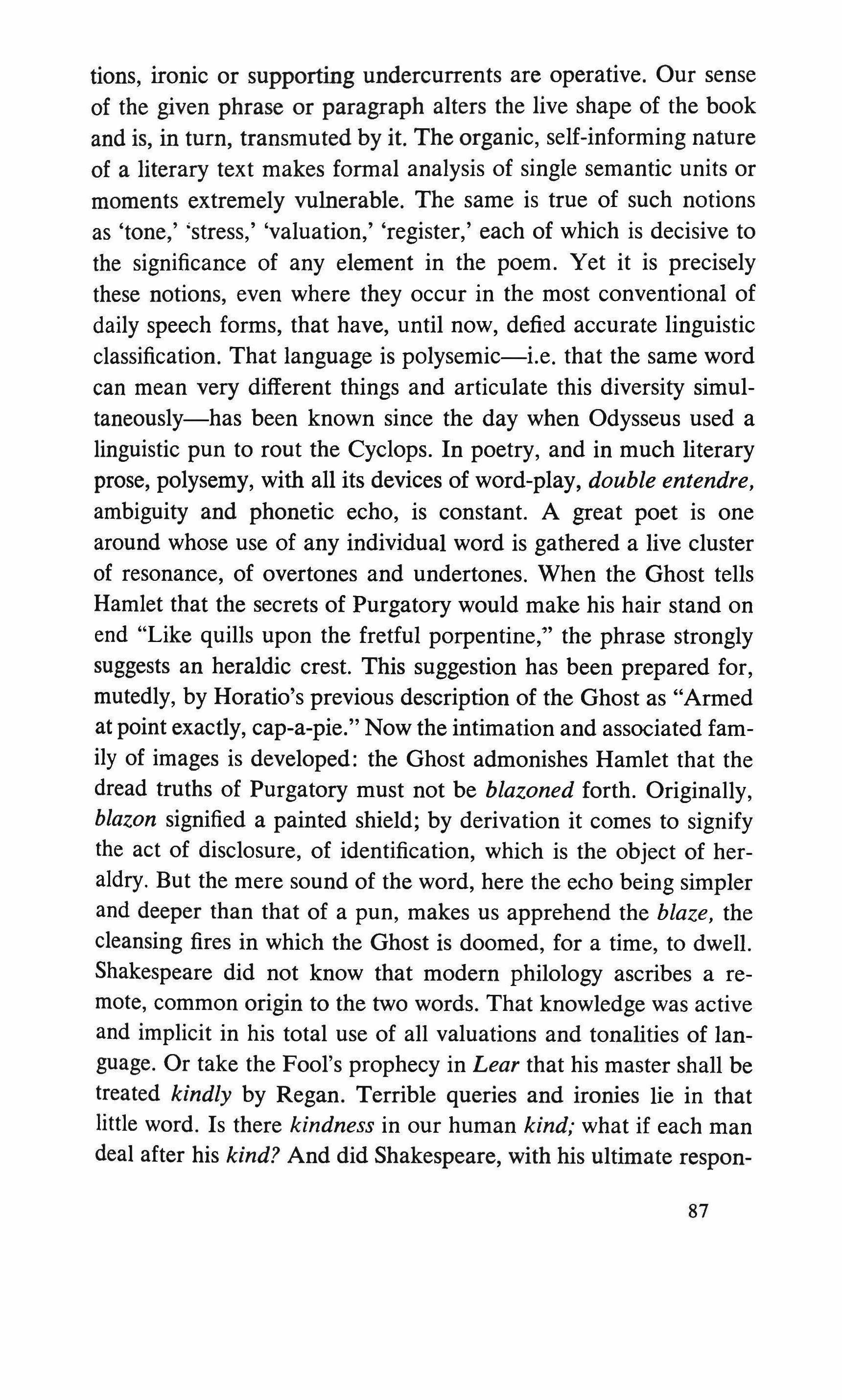
tions, ironic or supporting undercurrents are operative. Our sense of the given phrase or paragraph alters the live shape of the book and is, in turn, transmuted by it. The organic, self-informing nature of a literary text makes formal analysis of single semantic units or moments extremely vulnerable. The same is true of such notions as 'tone,' 'stress,' 'valuation,' 'register,' each of which is decisive to the significance of any element in the poem. Yet it is precisely these notions, even where they occur in the most conventional of daily speech forms, that have, until now, defied accurate linguistic classification. That language is polysemic-Le. that the same word can mean very different things and articulate this diversity simultaneously-has been known since the day when Odysseus used a linguistic pun to rout the Cyclops. In poetry, and in much literary prose, polysemy, with all its devices of word-play, double entendre, ambiguity and phonetic echo, is constant. A great poet is one around whose use of any individual word is gathered a live cluster of resonance, of overtones and undertones. When the Ghost tells Hamlet that the secrets of Purgatory would make his hair stand on end "Like quills upon the fretful porpentine," the phrase strongly suggests an heraldic crest. This suggestion has been prepared for, mutedly, by Horatio's previous description of the Ghost as "Armed at point exactly, cap-a-pie." Now the intimation and associated family of images is developed: the Ghost admonishes Hamlet that the dread truths of Purgatory must not be blazoned forth. Originally, blazon signified a painted shield; by derivation it comes to signify the act of disclosure, of identification, which is the object of heraldry. But the mere sound of the word, here the echo being simpler and deeper than that of a pun, makes us apprehend the blaze, the cleansing fires in which the Ghost is doomed, for a time, to dwell. Shakespeare did not know that modern philology ascribes a remote, common origin to the two words. That knowledge was active and implicit in his total use of all valuations and tonalities of language. Or take the Fool's prophecy in Lear that his master shall be treated kindly by Regan. Terrible queries and ironies lie in that little word. Is there kindness in our human kind; what if each man deal after his kind? And did Shakespeare, with his ultimate respon-
87
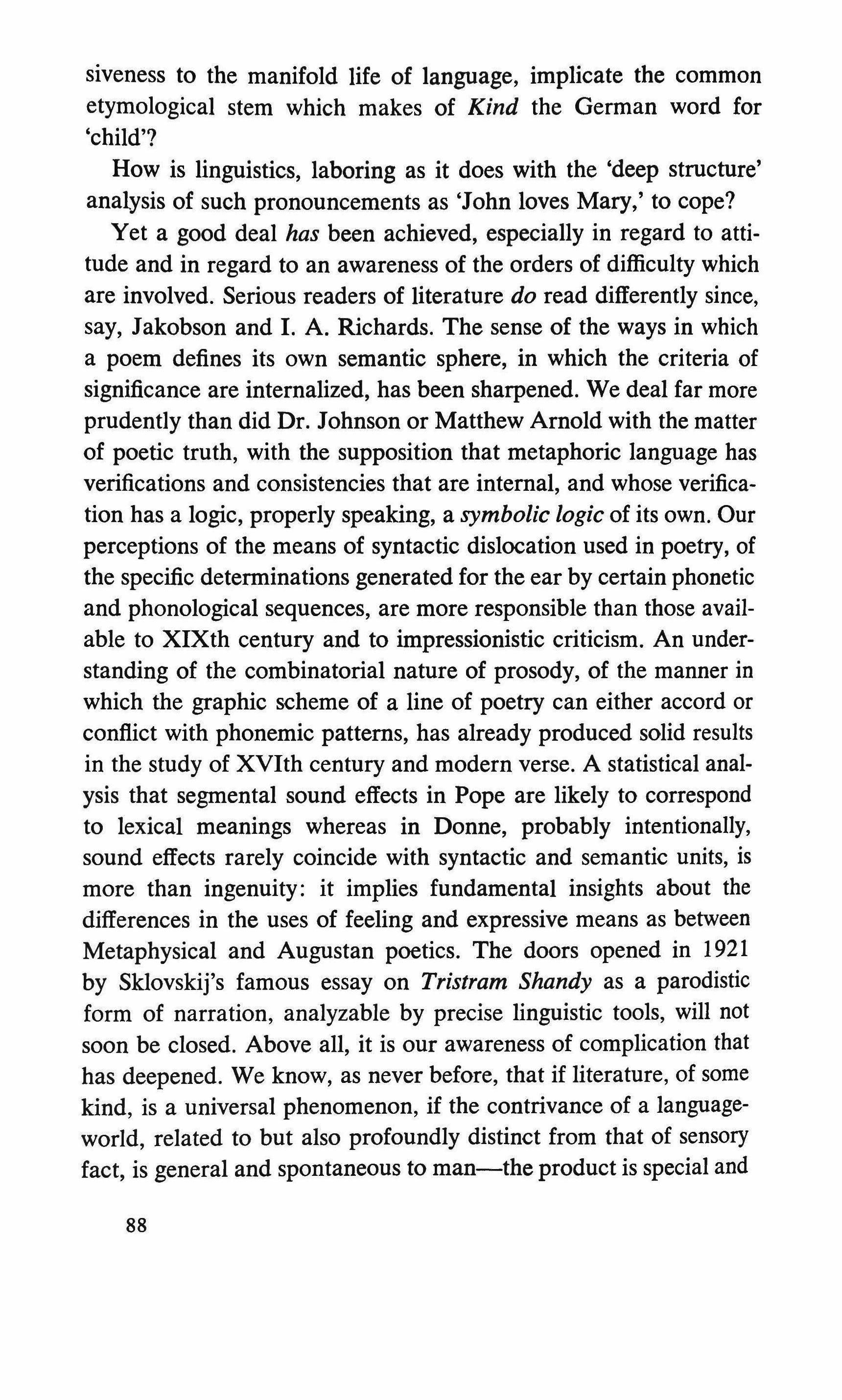
siveness to the manifold life of language, implicate the common etymological stem which makes of Kind the German word for 'child'?
How is linguistics, laboring as it does with the 'deep structure' analysis of such pronouncements as 'John loves Mary,' to cope?
Yet a good deal has been achieved, especially in regard to attitude and in regard to an awareness of the orders of difficulty which are involved. Serious readers of literature do read differently since, say, Jakobson and I. A. Richards. The sense of the ways in which a poem defines its own semantic sphere, in which the criteria of significance are internalized, has been sharpened. We deal far more prudently than did Dr. Johnson or Matthew Arnold with the matter of poetic truth, with the supposition that metaphoric language has verifications and consistencies that are internal, and whose verification has a logic, properly speaking, a symbolic logic of its own. Our perceptions of the means of syntactic dislocation used in poetry, of the specific determinations generated for the ear by certain phonetic and phonological sequences, are more responsible than those available to XIXth century and to impressionistic criticism. An understanding of the combinatorial nature of prosody, of the manner in which the graphic scheme of a line of poetry can either accord or conflict with phonemic patterns, has already produced solid results in the study of XVlth century and modern verse. A statistical analysis that segmental sound effects in Pope are likely to correspond to lexical meanings whereas in Donne, probably intentionally, sound effects rarely coincide with syntactic and semantic units, is more than ingenuity: it implies fundamental insights about the differences in the uses of feeling and expressive means as between Metaphysical and Augustan poetics. The doors opened in 1921 by Sklovskij's famous essay on Tristram Shandy as a parodistic form of narration, analyzable by precise linguistic tools, will not soon be closed. Above all, it is our awareness of complication that has deepened. We know, as never before, that if literature, of some kind, is a universal phenomenon, if the contrivance of a languageworld, related to but also profoundly distinct from that of sensory fact, is general and spontaneous to man-the product is special and
88
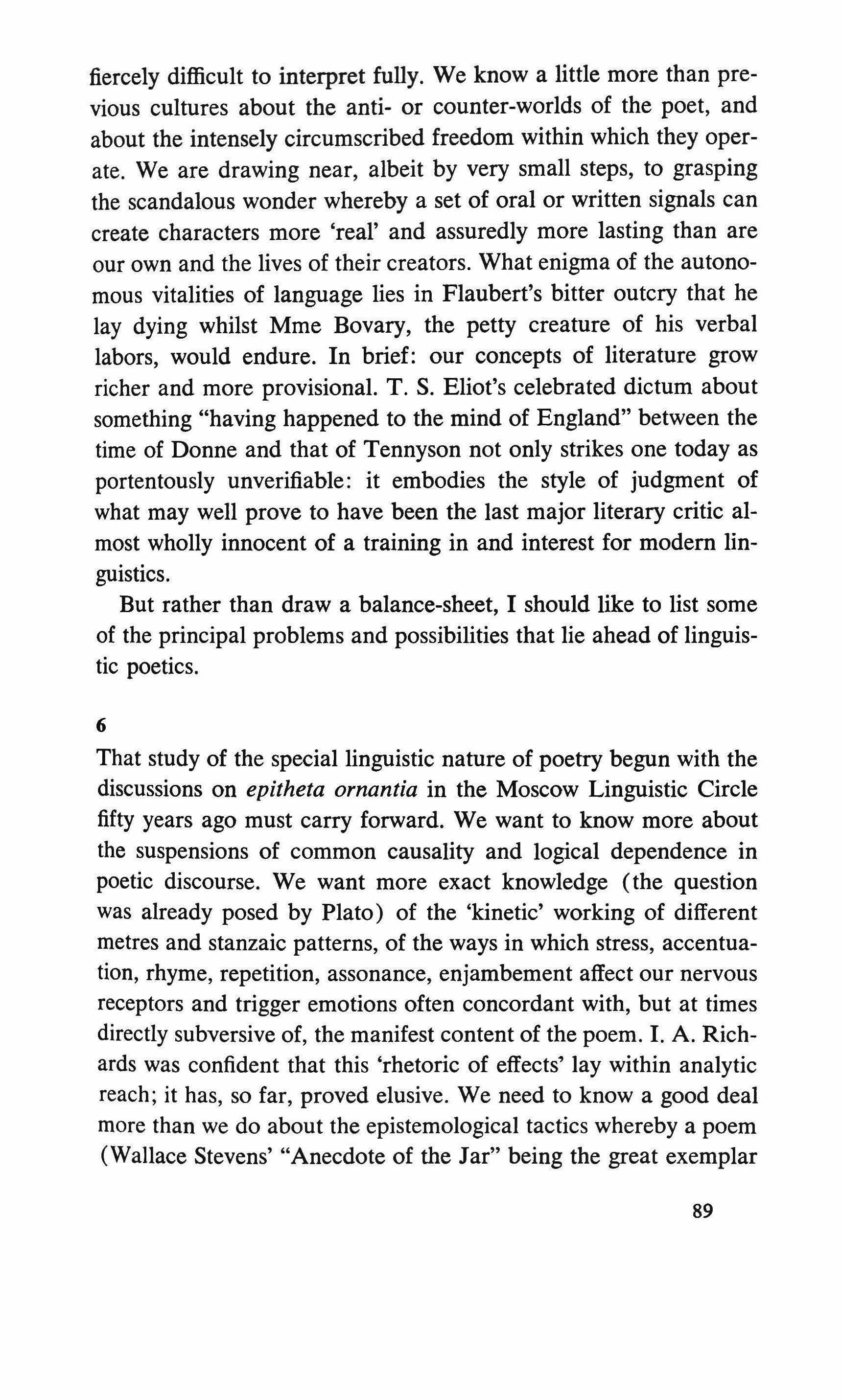
fiercely difficult to interpret fully. We know a little more than previous cultures about the anti- or counter-worlds of the poet, and about the intensely circumscribed freedom within which they operate. We are drawing near, albeit by very small steps, to grasping the scandalous wonder whereby a set of oral or written signals can create characters more 'real' and assuredly more lasting than are our own and the lives of their creators. What enigma of the autonomous vitalities of language lies in Flaubert's bitter outcry that he lay dying whilst Mme Bovary, the petty creature of his verbal labors, would endure. In brief: our concepts of literature grow richer and more provisional. T. S. Eliot's celebrated dictum about something "having happened to the mind of England" between the time of Donne and that of Tennyson not only strikes one today as portentously unverifiable: it embodies the style of judgment of what may well prove to have been the last major literary critic almost wholly innocent of a training in and interest for modem linguistics.
But rather than draw a balance-sheet, I should like to list some of the principal problems and possibilities that lie ahead of linguistic poetics.
6
That study of the special linguistic nature of poetry begun with the discussions on epitheta ornantia in the Moscow Linguistic Circle fifty years ago must carry forward. We want to know more about the suspensions of common causality and logical dependence in poetic discourse. We want more exact knowledge (the question was already posed by Plato) of the 'kinetic' working of different metres and stanzaic patterns, of the ways in which stress, accentuation, rhyme, repetition, assonance, enjambement affect our nervous receptors and trigger emotions often concordant with, but at times directly subversive of, the manifest content of the poem. I. A. Richards was confident that this 'rhetoric of effects' lay within analytic reach; it has, so far, proved elusive. We need to know a good deal more than we do about the epistemological tactics whereby a poem (Wallace Stevens' "Anecdote of the Jar" being the great exemplar
89
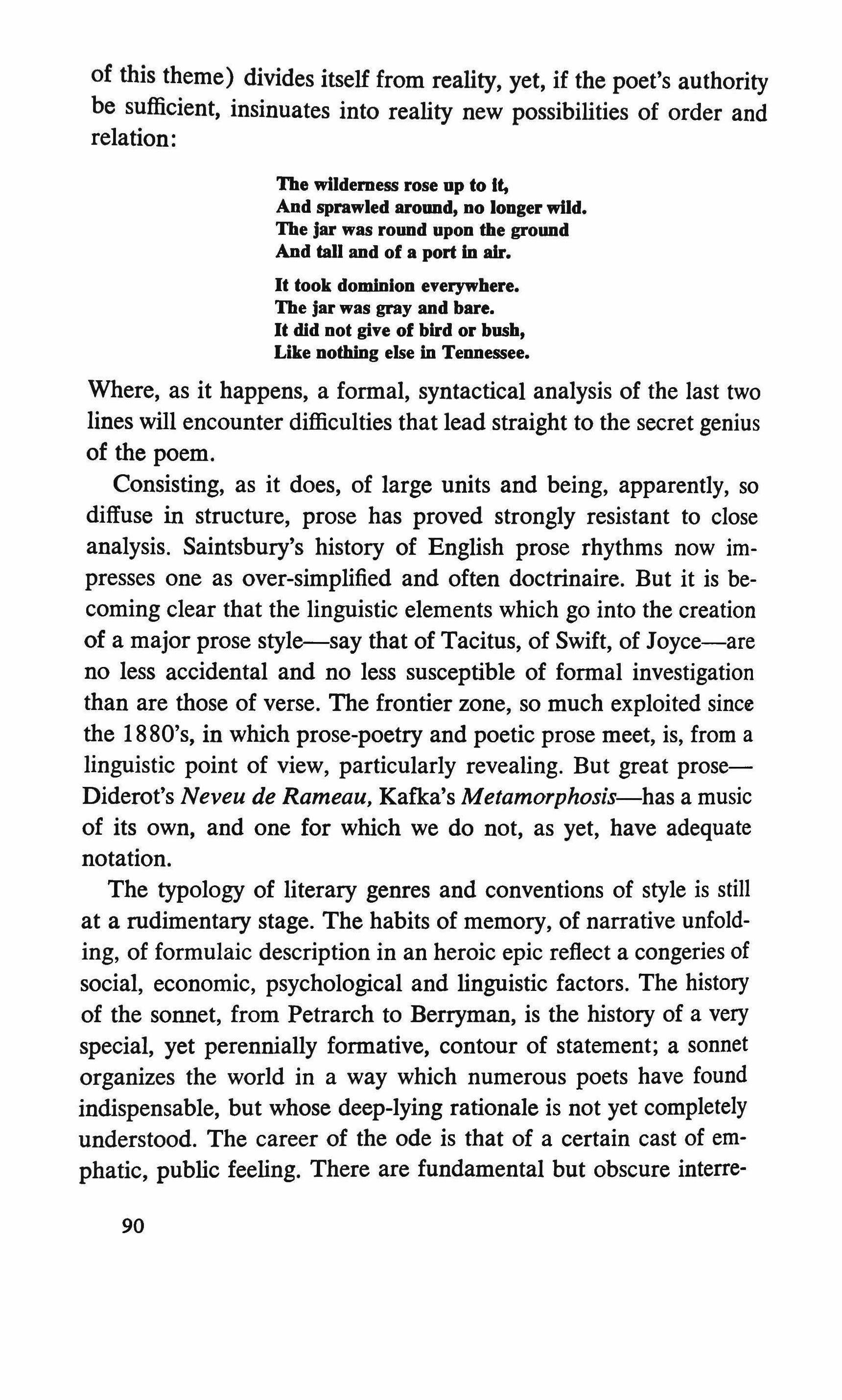
of this theme) divides itself from reality, yet, if the poet's authority be sufficient, insinuates into reality new possibilities of order and relation:
The wilderness rose up to It, Aod sprawled around, no longer wild. The jar was round upou the ground Aod tall and of a port In air. It took domlnlon everywhere. The jar was gray and bare. It did not give of bird or bosh, Like nothlng else In Teunessee.
Where, as it happens, a formal, syntactical analysis of the last two lines will encounter difficulties that lead straight to the secret genius of the poem.
Consisting, as it does, of large units and being, apparently, so diffuse in structure, prose has proved strongly resistant to close analysis. Saintsbury's history of English prose rhythms now impresses one as over-simplified and often doctrinaire. But it is becoming clear that the linguistic elements which go into the creation of a major prose style-say that of Tacitus, of Swift, of Joyce-are no less accidental and no less susceptible of formal investigation than are those of verse. The frontier zone, so much exploited since the 1880's, in which prose-poetry and poetic prose meet, is, from a linguistic point of view, particularly revealing. But great proseDiderot's Neveu de Rameau, Kafka's Metamorphosis-has a music of its own, and one for which we do not, as yet, have adequate notation.
The typology of literary genres and conventions of style is still at a rudimentary stage. The habits of memory, of narrative unfolding, of formulaic description in an heroic epic reflect a congeries of social, economic, psychological and linguistic factors. The history of the sonnet, from Petrarch to Berryman, is the history of a very special, yet perennially formative, contour of statement; a sonnet organizes the world in a way which numerous poets have found indispensable, but whose deep-lying rationale is not yet completely understood. The career of the ode is that of a certain cast of emphatic, public feeling. There are fundamental but obscure interre-
90
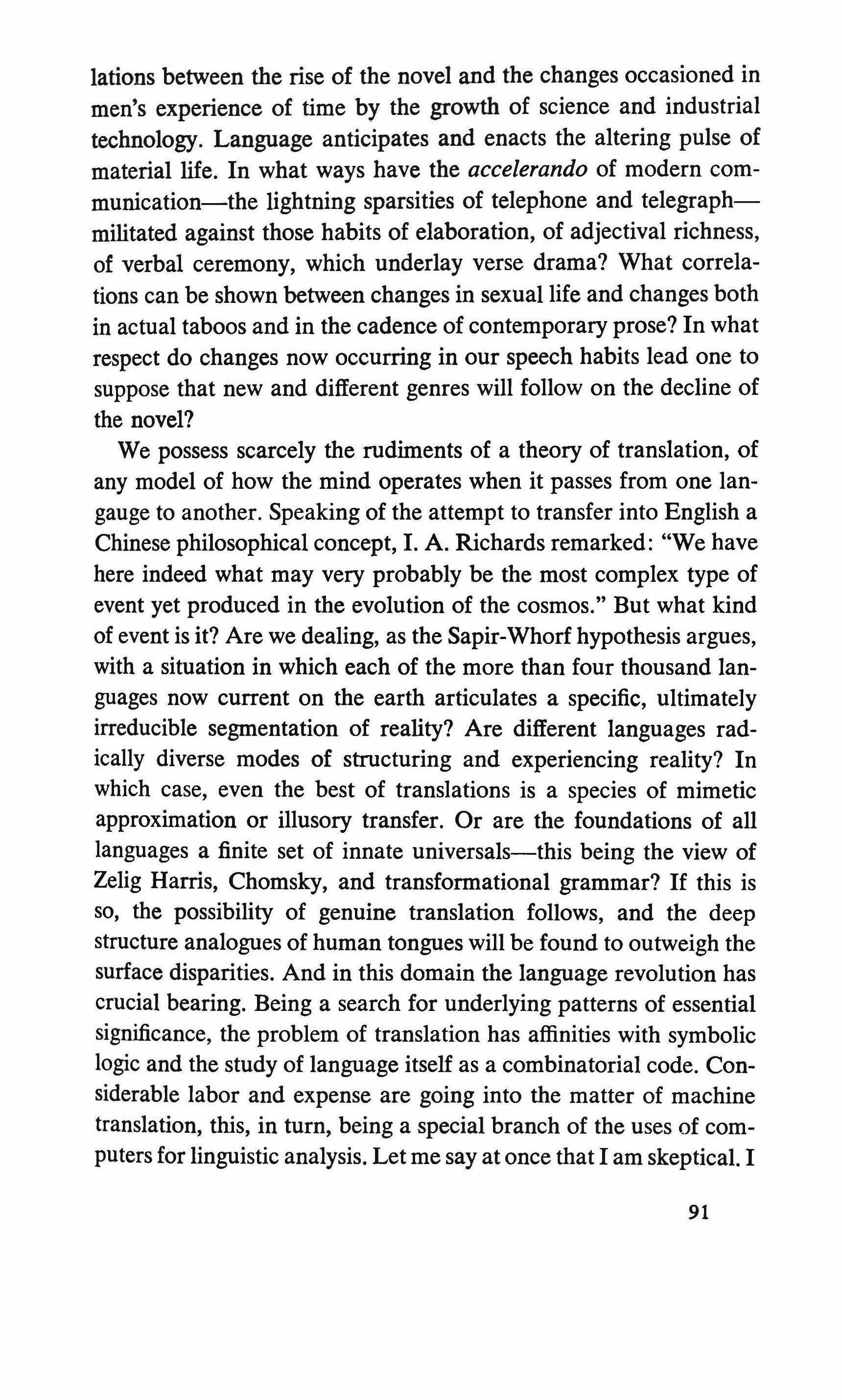
lations between the rise of the novel and the changes occasioned in men's experience of time by the growth of science and industrial technology. Language anticipates and enacts the altering pulse of material life. In what ways have the accelerando of modern communication-the lightning sparsities of telephone and telegraphmilitated against those habits of elaboration, of adjectival richness, of verbal ceremony, which underlay verse drama? What correlations can be shown between changes in sexual life and changes both in actual taboos and in the cadence of contemporary prose? In what respect do changes now occurring in our speech habits lead one to suppose that new and different genres will follow on the decline of the novel?
We possess scarcely the rudiments of a theory of translation, of any model of how the mind operates when it passes from one langauge to another. Speaking of the attempt to transfer into English a Chinese philosophical concept, I. A. Richards remarked: "We have here indeed what may very probably be the most complex type of event yet produced in the evolution of the cosmos." But what kind of event is it? Are we dealing, as the Sapir-Whorf hypothesis argues, with a situation in which each of the more than four thousand languages now current on the earth articulates a specific, ultimately irreducible segmentation of reality? Are different languages radically diverse modes of structuring and experiencing reality? In which case, even the best of translations is a species of mimetic approximation or illusory transfer. Or are the foundations of all languages a finite set of innate universals-this being the view of Zelig Harris, Chomsky, and transformational grammar? If this is so, the possibility of genuine translation follows, and the deep structure analogues of human tongues will be found to outweigh the surface disparities. And in this domain the language revolution has crucial bearing. Being a search for underlying patterns of essential significance, the problem of translation has affinities with symbolic logic and the study of language itself as a combinatorial code. Considerable labor and expense are going into the matter of machine translation, this, in turn, being a special branch of the uses of computers for linguistic analysis. Let me say at once that I am skeptical. I
91
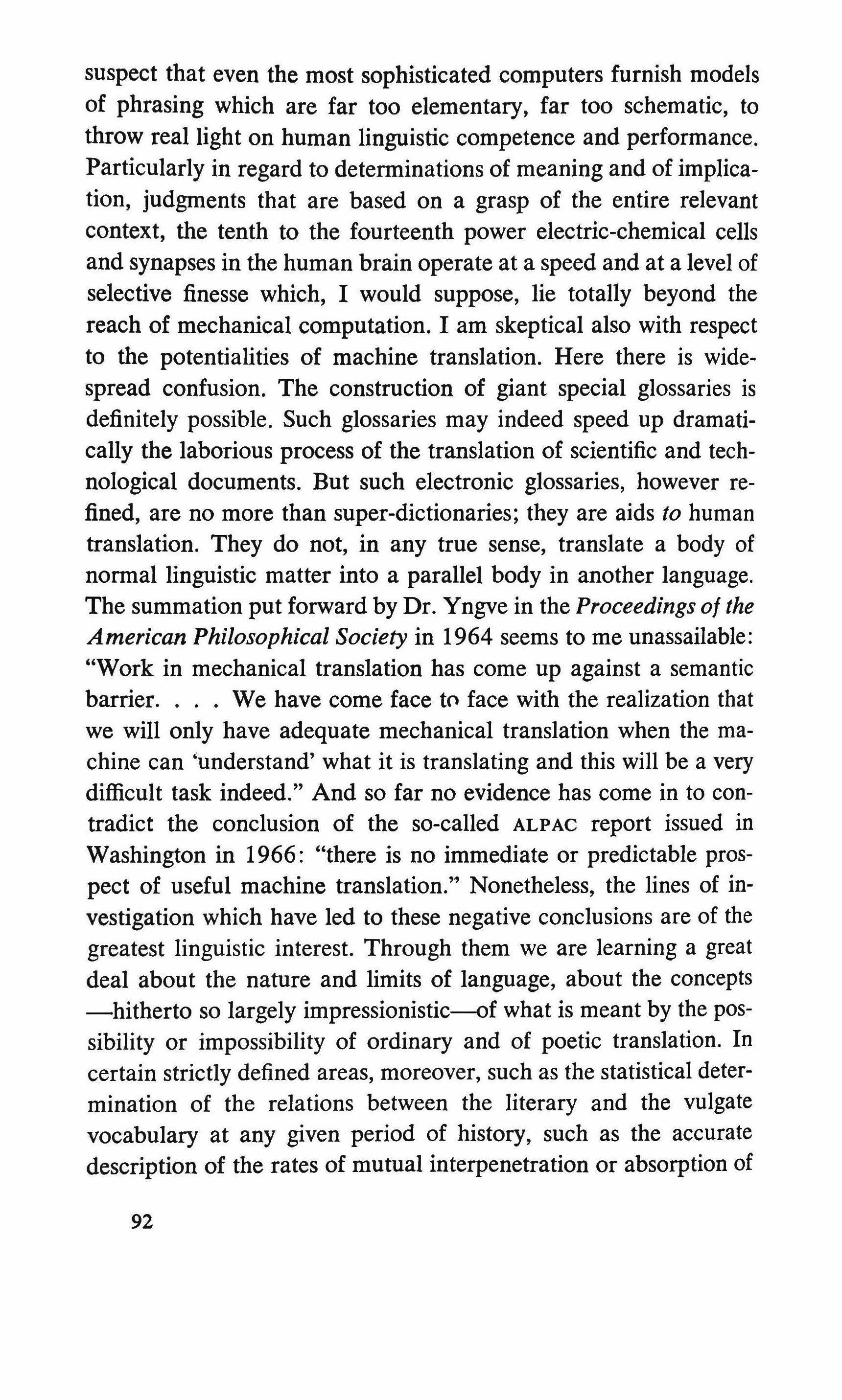
suspect that even the most sophisticated computers furnish models of phrasing which are far too elementary, far too schematic, to throw real light on human linguistic competence and performance. Particularly in regard to determinations of meaning and of implication, judgments that are based on a grasp of the entire relevant context, the tenth to the fourteenth power electric-chemical cells and synapses in the human brain operate at a speed and at a level of selective finesse which, I would suppose, lie totally beyond the reach of mechanical computation. I am skeptical also with respect to the potentialities of machine translation. Here there is widespread confusion. The construction of giant special glossaries is definitely possible. Such glossaries may indeed speed up dramatically the laborious process of the translation of scientific and technological documents. But such electronic glossaries, however refined, are no more than super-dictionaries; they are aids to human translation. They do not, in any true sense, translate a body of normal linguistic matter into a parallel body in another language. The summation put forward by Dr. Yngve in the Proceedings of the American Philosophical Society in 1964 seems to me unassailable: "Work in mechanical translation has come up against a semantic barrier We have come face to face with the realization that we will only have adequate mechanical translation when the machine can 'understand' what it is translating and this will be a very difficult task indeed." And so far no evidence has come in to contradict the conclusion of the so-called ALPAC report issued in Washington in 1966: "there is no immediate or predictable prospect of useful machine translation." Nonetheless, the lines of investigation which have led to these negative conclusions are of the greatest linguistic interest. Through them we are learning a great deal about the nature and limits of language, about the concepts -hitherto so largely impressionistic-of what is meant by the possibility or impossibility of ordinary and of poetic translation. In certain strictly defined areas, moreover, such as the statistical determination of the relations between the literary and the vulgate vocabulary at any given period of history, such as the accurate description of the rates of mutual interpenetration or absorption of
92

different languages, or in the analytic mapping of lexical and grammatical habits in a particular author or body of anonymous work (the Pauline epistles, the Junius letters), computers do have a useful role. Indeed it is exactly at the point where they fail that they may tell us most of the singular genius of language and of the 'language animal.'
Beyond all these questions, immensely difficult as they are, lie even deeper queries and possibilities of study. Are certain languages more apt for literature than others? All societies of which we have knowledge devise and perform music. By no means all have a literature, except in the most rudimentary and vaguely expanded sense of the term. Are the primary factors social, economic, geographic? Or is there in the very structure of certain languages a latency of poetic invention? Was there that in ancient Hebrew and Greek which generated lasting forms of symbolic statement, whereas neighboring cultures, Egypt for example, produced ritual texts, but not the free, non-utilitarian play of fiction? Man is a primate who can lie, who can make counter-factual statements. What quality in the fabric of certain languages has transmuted this strange capacity into literature? Are certain tongues more anchored in the material truths of reality than are others? What of the poetics and metaphysics of the future tense, that scandalous marvel whereby the human mind preempts a tomorrow which the living speaker will not experience and whose very existence is a piece of syntactic inference? Is poetry, in some deep sense, always part remembrance and part prophecy-the very reality of past and future being wholly a convention of language? Do certain so-called primitive tongues, whose tense and case systems are far more ramified than those in, say, Greek, French or English, inhibit the development of literature just because they have affixed to reality too numerous and too precisely decisive labels?
There is the profoundly disturbing question of linguistic entropy. Do great languages 'run down,' do they lose their speed and accuracy of creative reflex? Do they close windows in their community rather than open them? Is there in languages-Hebrew and Chinese being the fantastically interesting exceptions-a life
93
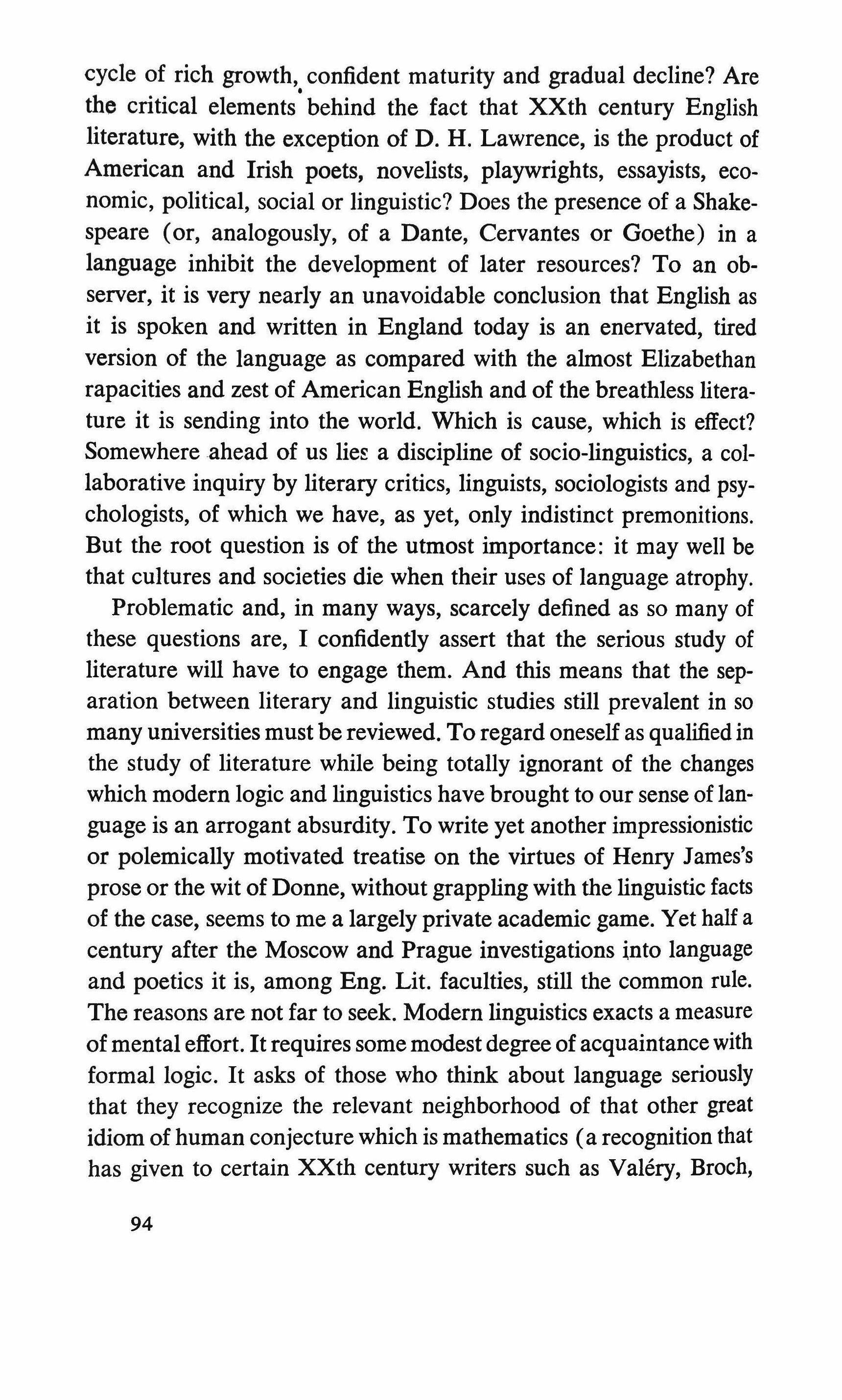
cycle of rich growth, confident maturity and gradual decline? Are the critical elements behind the fact that XXth century English literature, with the exception of D. H. Lawrence, is the product of American and Irish poets, novelists, playwrights, essayists, economic, political, social or linguistic? Does the presence of a Shakespeare (or, analogously, of a Dante, Cervantes or Goethe) in a language inhibit the development of later resources? To an observer, it is very nearly an unavoidable conclusion that English as it is spoken and written in England today is an enervated, tired version of the language as compared with the almost Elizabethan rapacities and zest of American English and of the breathless literature it is sending into the world. Which is cause, which is effect? Somewhere ahead of us lies a discipline of socio-linguistics, a collaborative inquiry by literary critics, linguists, sociologists and psychologists, of which we have, as yet, only indistinct premonitions. But the root question is of the utmost importance: it may well be that cultures and societies die when their uses of language atrophy.
Problematic and, in many ways, scarcely defined as so many of these questions are, I confidently assert that the serious study of literature will have to engage them. And this means that the separation between literary and linguistic studies still prevalent in so many universities must be reviewed. To regard oneself as qualified in the study of literature while being totally ignorant of the changes which modern logic and linguistics have brought to our sense of language is an arrogant absurdity. To write yet another impressionistic or polemically motivated treatise on the virtues of Henry James's prose or the wit of Donne, without grappling with the linguistic facts of the case, seems to me a largely private academic game. Yet half a century after the Moscow and Prague investigations into language and poetics it is, among Eng. Lit. faculties, still the common rule. The reasons are not far to seek. Modern linguistics exacts a measure of mental effort. It requires some modest degree of acquaintancewith formal logic. It asks of those who think about language seriously that they recognize the relevant neighborhood of that other great idiom of human conjecture which is mathematics (a recognition that has given to certain XXth century writers such as Valery, Broch,
94
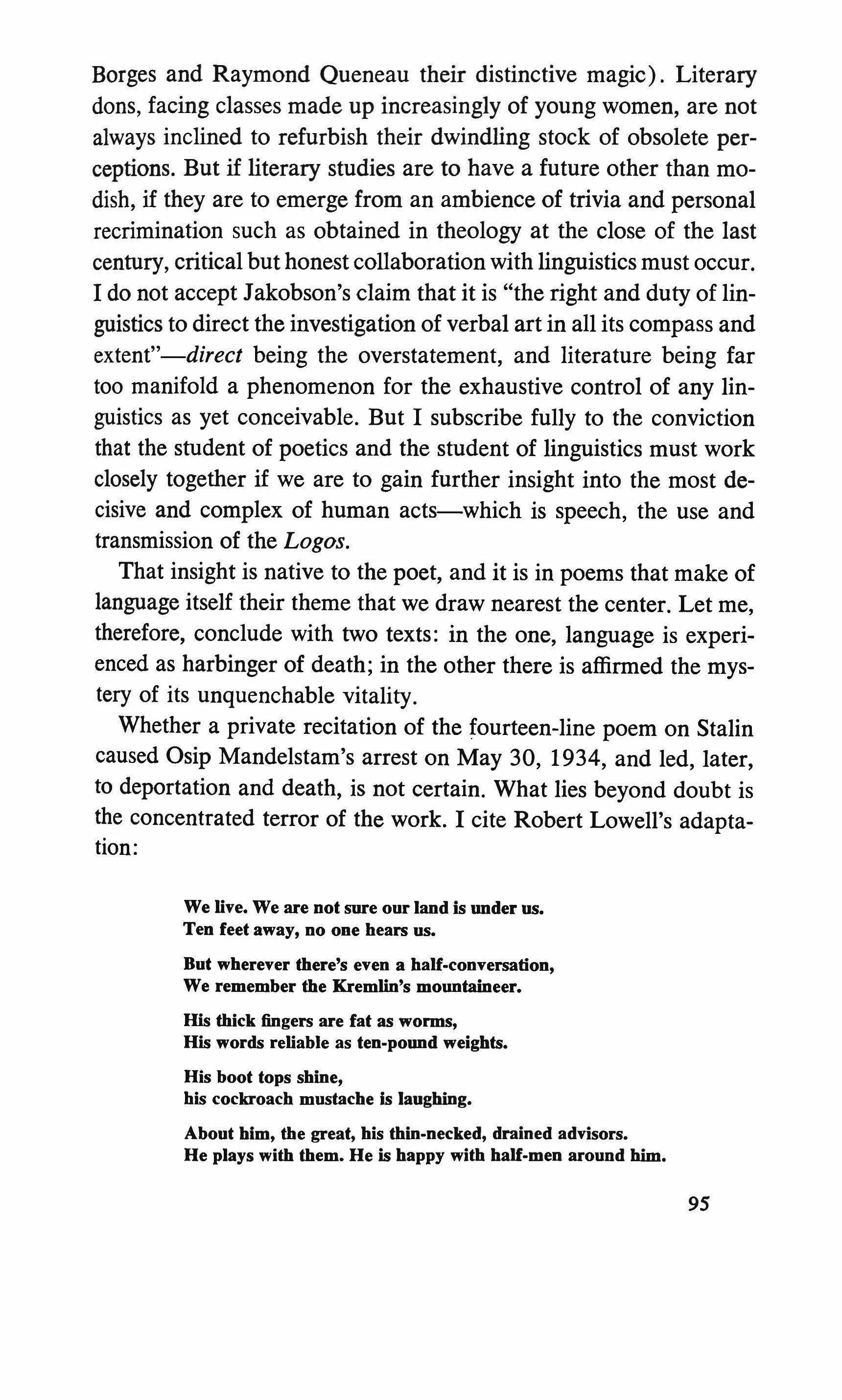
Borges and Raymond Queneau their distinctive magic). Literary dons, facing classes made up increasingly of young women, are not always inclined to refurbish their dwindling stock of obsolete perceptions. But if literary studies are to have a future other than modish, if they are to emerge from an ambience of trivia and personal recrimination such as obtained in theology at the close of the last century, critical but honest collaboration with linguistics must occur. I do not accept Jakobson's claim that it is "the right and duty of linguistics to direct the investigation of verbal art in all its compass and extent"-direct being the overstatement, and literature being far too manifold a phenomenon for the exhaustive control of any linguistics as yet conceivable. But I subscribe fully to the conviction that the student of poetics and the student of linguistics must work closely together if we are to gain further insight into the most decisive and complex of human acts-which is speech, the use and transmission of the Logos.
That insight is native to the poet, and it is in poems that make of language itself their theme that we draw nearest the center. Let me, therefore, conclude with two texts: in the one, language is experienced as harbinger of death; in the other there is affirmed the mystery of its unquenchable vitality.
Whether a private recitation of the fourteen-line poem on Stalin caused Osip Mandelstam's arrest on May 30, 1934, and led, later, to deportation and death, is not certain. What lies beyond doubt is the concentrated terror of the work. I cite Robert Lowell's adaptation:
We live. We are not sure our land is under us. Ten feet away, no one hears us.
But wherever there's even a half-conversation, We remember the Kremlin's mountaineer.
His thick fingers are fat as worms, His words reliable as ten-pound weights.
His boot tops shine, his cockroach mustache is laughing.
About him, the great, his thin-necked, drained advisors. He plays with them. He is happy with half-men around him.
9S
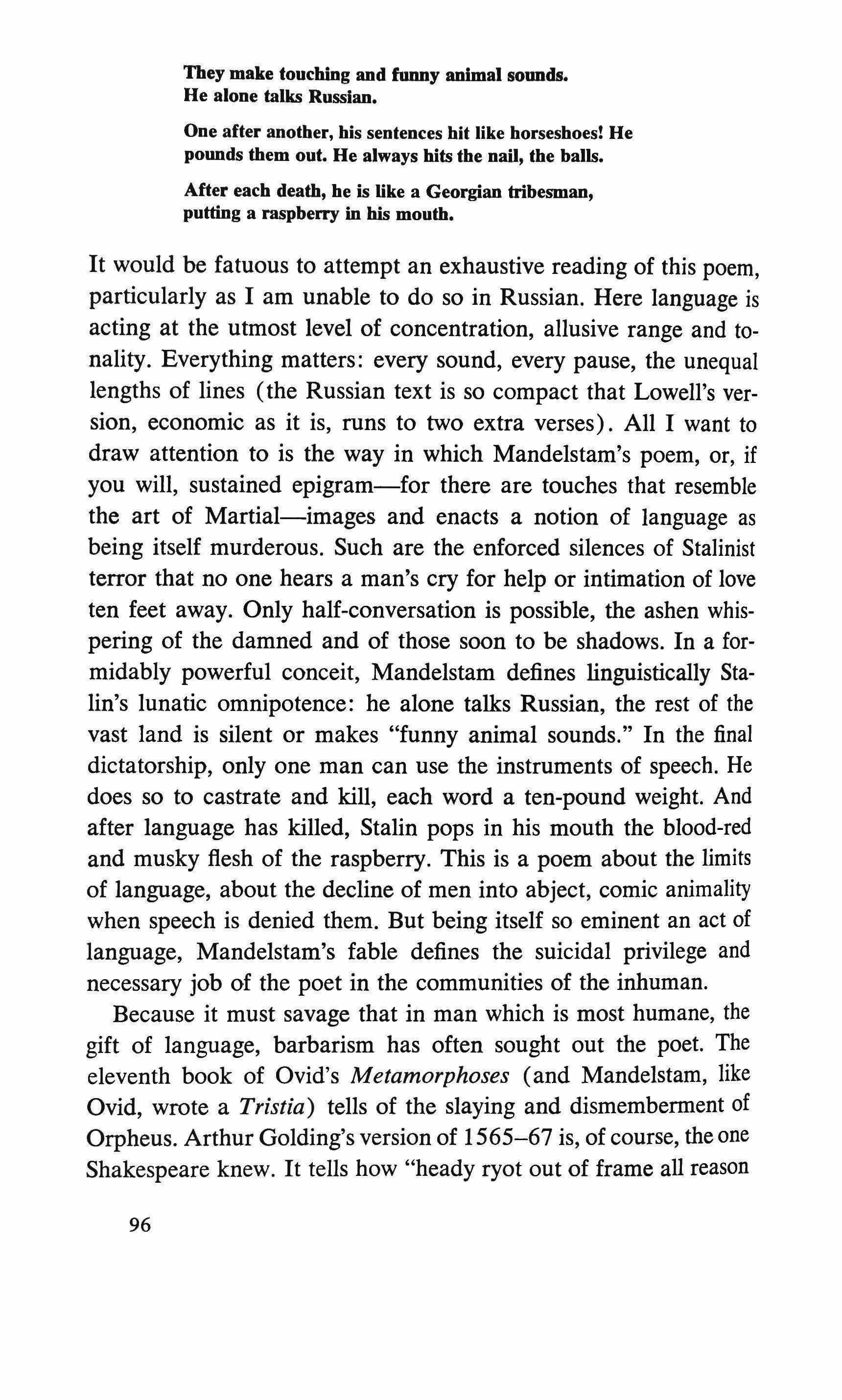
They make touching and funny animal sounds. He alone talks Russian.
One after another, his sentences hit like horseshoes! He pounds them out. He always hits the nail, the balls.
After each death, he is like a Georgian tribesman, putting a raspberry in his mouth.
It would be fatuous to attempt an exhaustive reading of this poem, particularly as I am unable to do so in Russian. Here language is acting at the utmost level of concentration, allusive range and tonality. Everything matters: every sound, every pause, the unequal lengths of lines (the Russian text is so compact that Lowell's version, economic as it is, runs to two extra verses). All I want to draw attention to is the way in which Mandelstam's poem, or, if you will, sustained epigram-for there are touches that resemble the art of Martial-images and enacts a notion of language as being itself murderous. Such are the enforced silences of Stalinist terror that no one hears a man's cry for help or intimation of love ten feet away. Only half-conversation is possible, the ashen whispering of the damned and of those soon to be shadows. In a formidably powerful conceit, Mandelstam defines linguistically Stalin's lunatic omnipotence: he alone talks Russian, the rest of the vast land is silent or makes "funny animal sounds." In the final dictatorship, only one man can use the instruments of speech. He does so to castrate and kill, each word a ten-pound weight. And after language has killed, Stalin pops in his mouth the blood-red and musky flesh of the raspberry. This is a poem about the limits of language, about the decline of men into abject, comic animality when speech is denied them. But being itself so eminent an act of language, Mandelstam's fable defines the suicidal privilege and necessary job of the poet in the communities of the inhuman. Because it must savage that in man which is most humane, the gift of language, barbarism has often sought out the poet. The eleventh book of Ovid's Metamorphoses (and Mandelstam, like Ovid, wrote a Tristia) tells of the slaying and dismemberment of Orpheus. Arthur Golding's version of 1565-67 is, of course, the one Shakespeare knew. It tells how "heady ryot out of frame all reason
96
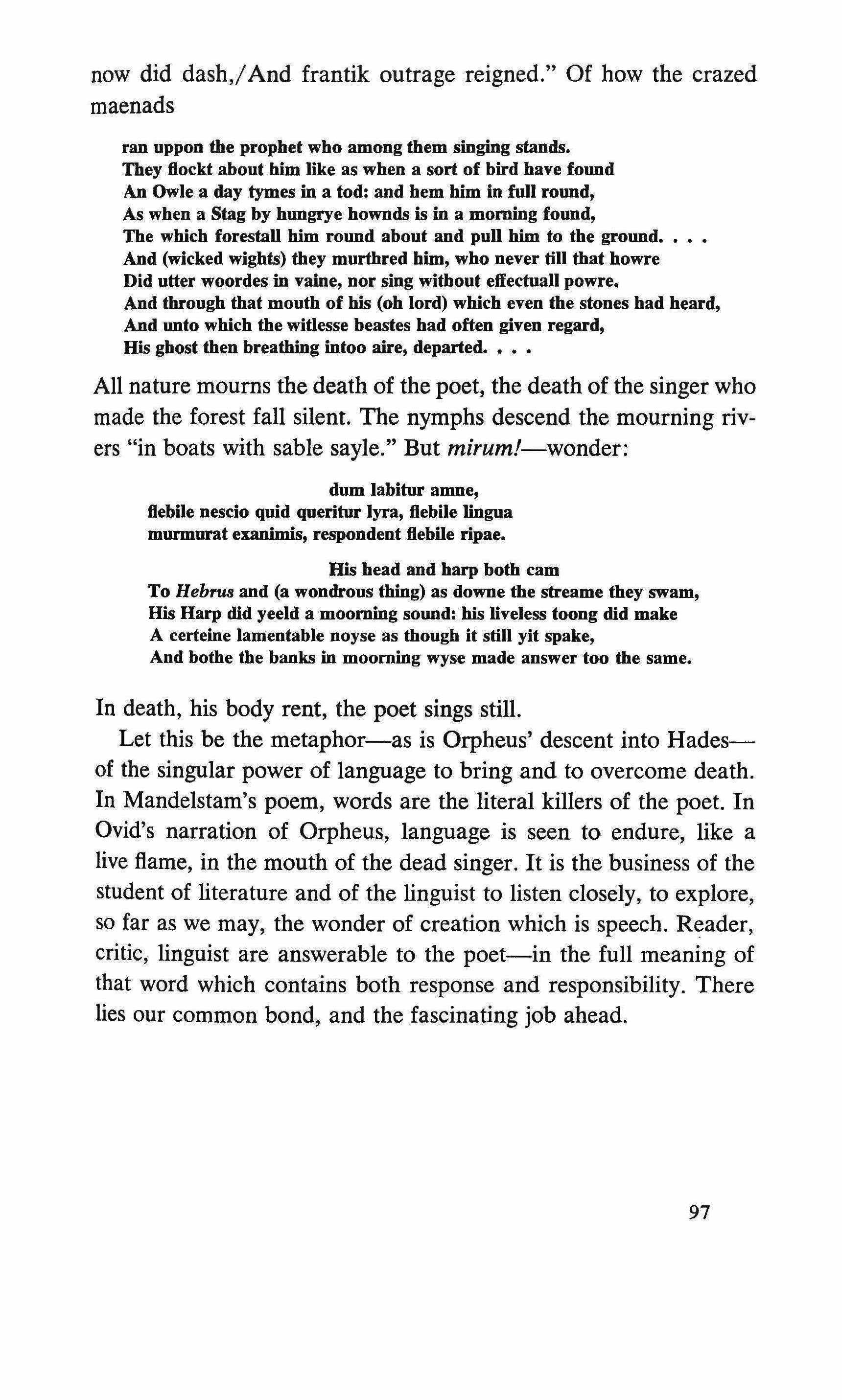
now did dash,!And frantik outrage reigned." Of how the crazed maenads
ran uppon the prophet who among them singing stands. They flockt about him like as when a sort of bird have found
An Owle a day tymes in a tod: and hem him in full round,
As when a Stag by hungrye hownds is in a morning found, The which forestall him round about and pull him to the ground. And (wicked wights) they murthred him, who never till that howre Did utter woordes in vaine, nor sing without effectuall powre, And through that mouth of his (oh lord) which even the stones had heard, And unto which the witlesse beastes had often given regard, His ghost then breathing intoo aire, departed.
All nature mourns the death of the poet, the death of the singer who made the forest fall silent. The nymphs descend the mourning rivers "in boats with sable sayle." But mirum!-wonder:
dum labitur amne, flebile nescio quid queritur lyra, flebile lingua murmurat exanimis, respondent flebile ripae.
His head and harp both cam
To HebTU8 and (a wondrous thing) as downe the streame they swam, His Harp did yeeld a moorning sound: his liveless toong did make A certeine lamentable noyse as though it still yit spake, And bothe the banks in moorning wyse made answer too the same.
In death, his body rent, the poet sings still.
Let this be the metaphor-as is Orpheus' descent into Hadesof the singular power of language to bring and to overcome death. In Mandelstam's poem, words are the literal killers of the poet. In Ovid's narration of Orpheus, language is seen to endure, like a live flame, in the mouth of the dead singer. It is the business of the student of literature and of the linguist to listen closely, to explore, so far as we may, the wonder of creation which is speech. Reader, critic, linguist are answerable to the poet-in the full meaning of that word which contains both response and responsibility. There lies our common bond, and the fascinating job ahead.
97
Painting words
MICHEL BUTOR
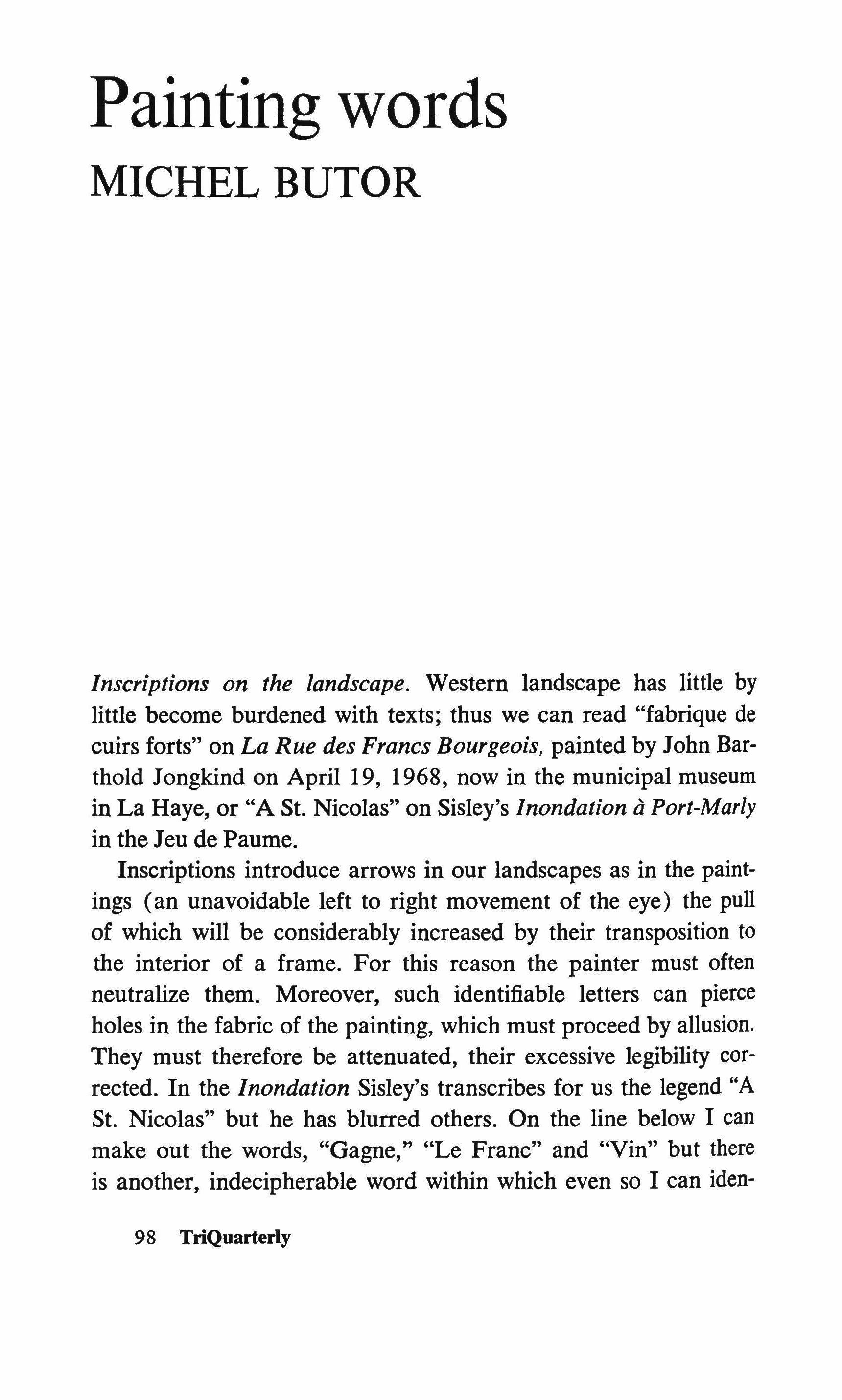
Inscriptions on the landscape. Western landscape has little by little become burdened with texts; thus we can read "fabrique de cuirs forts" on La Rue des Francs Bourgeois, painted by John Barthold Jongkind on April 19, 1968, now in the municipal museum in La Haye, or "A St. Nicolas" on Sisley's Inondation a Port-Marly in the Jeu de Paume.
Inscriptions introduce arrows in our landscapes as in the paintings (an unavoidable left to right movement of the eye) the pull of which will be considerably increased by their transposition to the interior of a frame. For this reason the painter must often neutralize them. Moreover, such identifiable letters can pierce holes in the fabric of the painting, which must proceed by allusion. They must therefore be attenuated, their excessive legibility corrected. In the Inondation Sisley's transcribes for us the legend "A St. Nicolas" but he has blurred others. On the line below I can make out the words, "Gagne," "Le Franc" and "Vin" but there is another, indecipherable word within which even so I can iden-
98 TriQuarterly
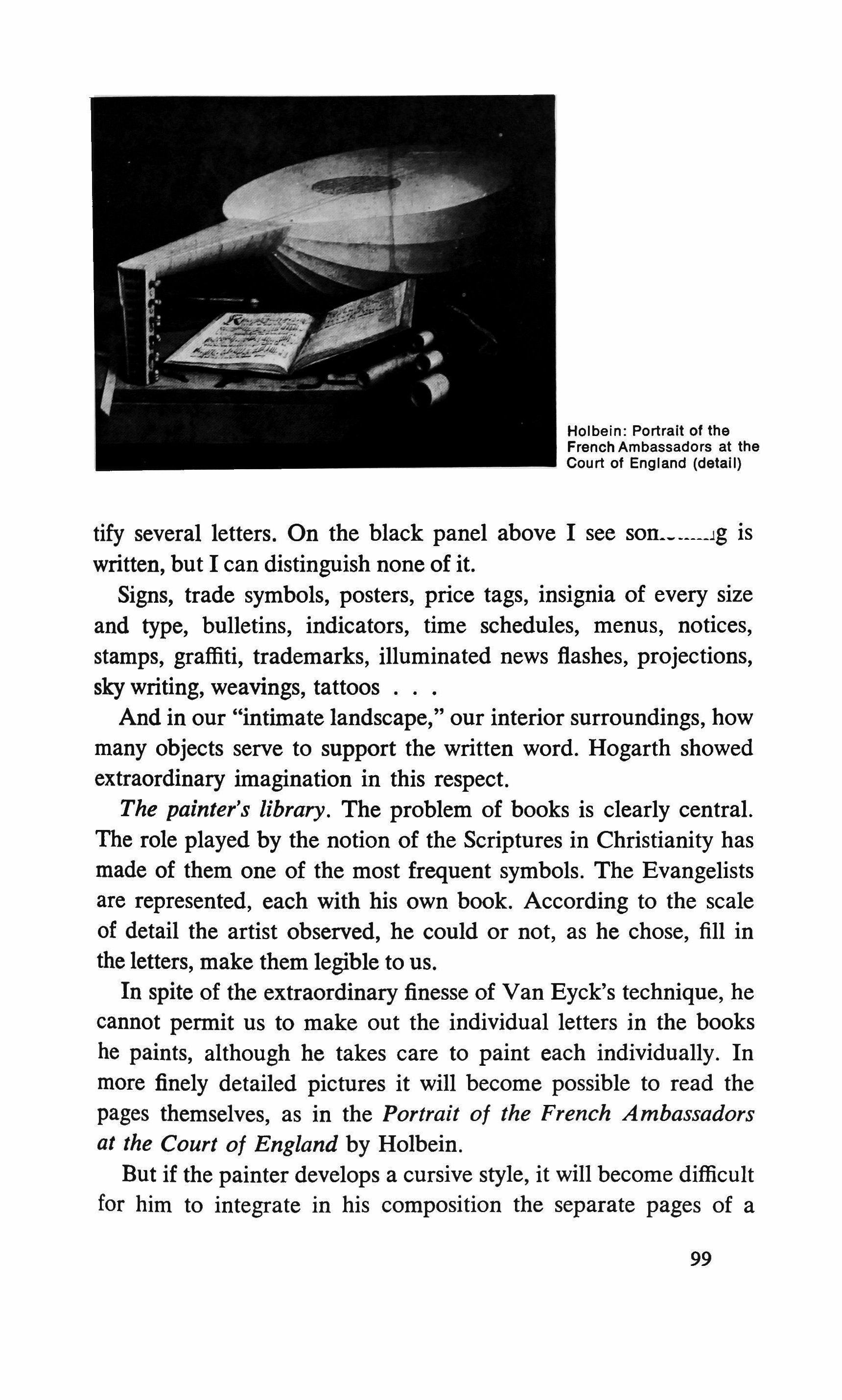
tify several letters. On the black panel above I see son lg is written, but I can distinguish none of it.
Signs, trade symbols, posters, price tags, insignia of every size and type, bulletins, indicators, time schedules, menus, notices, stamps, graffiti, trademarks, illuminated news flashes, projections, sky writing, weavings, tattoos
And in our "intimate landscape," our interior surroundings, how many objects serve to support the written word. Hogarth showed extraordinary imagination in this respect.
The painter's library. The problem of books is clearly central. The role played by the notion of the Scriptures in Christianity has made of them one of the most frequent symbols. The Evangelists are represented, each with his own book. According to the scale of detail the artist observed, he could or not, as he chose, fill in the letters, make them legible to us.
In spite of the extraordinary finesse of Van Eyck's technique, he cannot permit us to make out the individual letters in the books he paints, although he takes care to paint each individually. In more finely detailed pictures it will become possible to read the pages themselves, as in the Portrait of the French Ambassadors at the Court of England by Holbein.
But if the painter develops a cursive style, it will become difficult for him to integrate in his composition the separate pages of a
Holbein: Portrait of the French Ambassadors at the Court of England (detail)
99
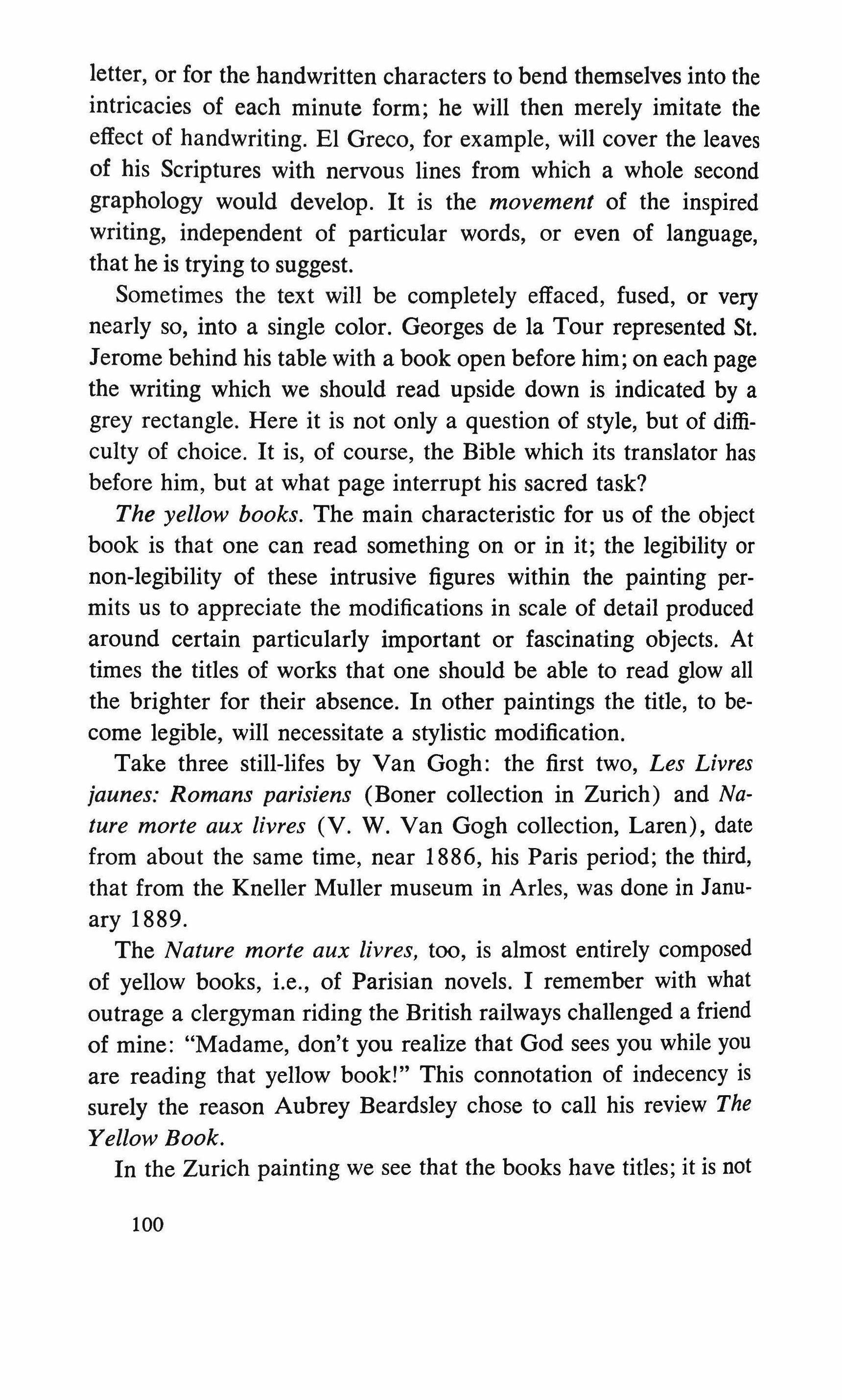
letter, or for the handwritten characters to bend themselves into the intricacies of each minute form; he will then merely imitate the effect of handwriting. El Greco, for example, will cover the leaves of his Scriptures with nervous lines from which a whole second graphology would develop. It is the movement of the inspired writing, independent of particular words, or even of language, that he is trying to suggest.
Sometimes the text will be completely effaced, fused, or very nearly so, into a single color. Georges de la Tour represented St. Jerome behind his table with a book open before him; on each page the writing which we should read upside down is indicated by a grey rectangle. Here it is not only a question of style, but of difficulty of choice. It is, of course, the Bible which its translator has before him, but at what page interrupt his sacred task?
The yellow books. The main characteristic for us of the object book is that one can read something on or in it; the legibility or non-legibility of these intrusive figures within the painting permits us to appreciate the modifications in scale of detail produced around certain particularly important or fascinating objects. At times the titles of works that one should be able to read glow all the brighter for their absence. In other paintings the title, to become legible, will necessitate a stylistic modification.
Take three still-lifes by Van Gogh: the first two, Les Livres jaunes: Romans parisiens (Boner collection in Zurich) and Nature morte aux livres (V. W. Van Gogh collection, Laren), date from about the same time, near 1886, his Paris period; the third, that from the Kneller Muller museum in ArIes, was done in January 1889.
The Nature morle aux livres, too, is almost entirely composed of yellow books, i.e., of Parisian novels. I remember with what outrage a clergyman riding the British railways challenged a friend of mine: "Madame, don't you realize that God sees you while you are reading that yellow book!" This connotation of indecency is surely the reason Aubrey Beardsley chose to call his review The Yellow Book.
In the Zurich painting we see that the books have titles; it is not
100
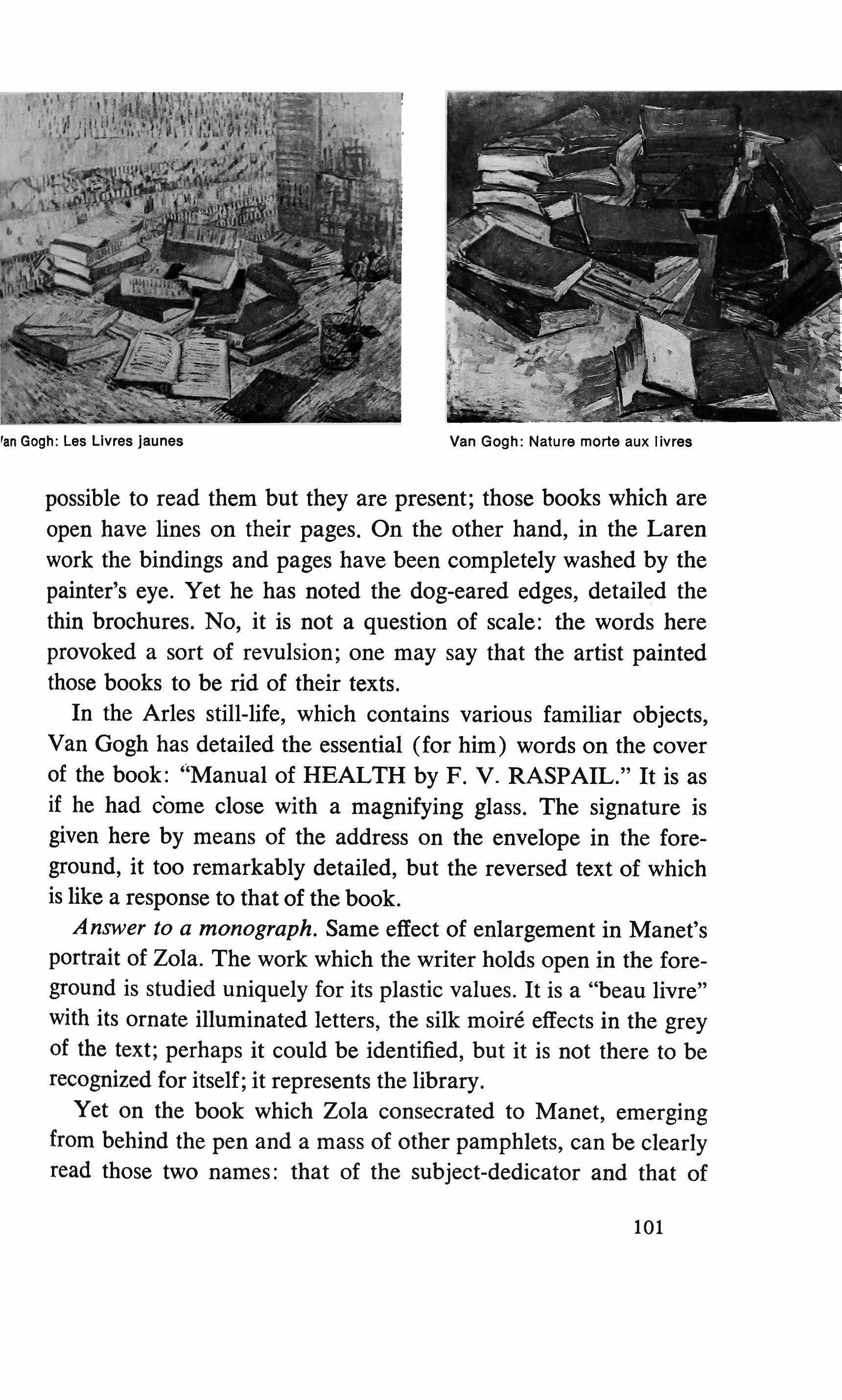
possible to read them but they are present; those books which are open have lines on their pages. On the other hand, in the Laren work the bindings and pages have been completely washed by the painter's eye. Yet he has noted the dog-eared edges, detailed the thin brochures. No, it is not a question of scale: the words here provoked a sort of revulsion; one may say that the artist painted those books to be rid of their texts.
In the ArIes still-life, which contains various familiar objects, Van Gogh has detailed the essential (for him) words on the cover of the book: "Manual of HEALTH by F. V. RASPAIL." It is as if he had come close with a magnifying glass. The signature is given here by means of the address on the envelope in the foreground, it too remarkably detailed, but the reversed text of which is like a response to that of the book.
Answer to a monograph. Same effect of enlargement in Manet's portrait of Zola. The work which the writer holds open in the foreground is studied uniquely for its plastic values. It is a "beau livre" with its ornate illuminated letters, the silk moire effects in the grey of the text; perhaps it could be identified, but it is not there to be recognized for itself; it represents the library.
Yet on the book which Zola consecrated to Manet, emerging from behind the pen and a mass of other pamphlets, can be clearly read those two names: that of the subject-dedicator and that of
ran Gogh: Les Livres jaunes
Van Gogh: Nature morte aux Iivres
101
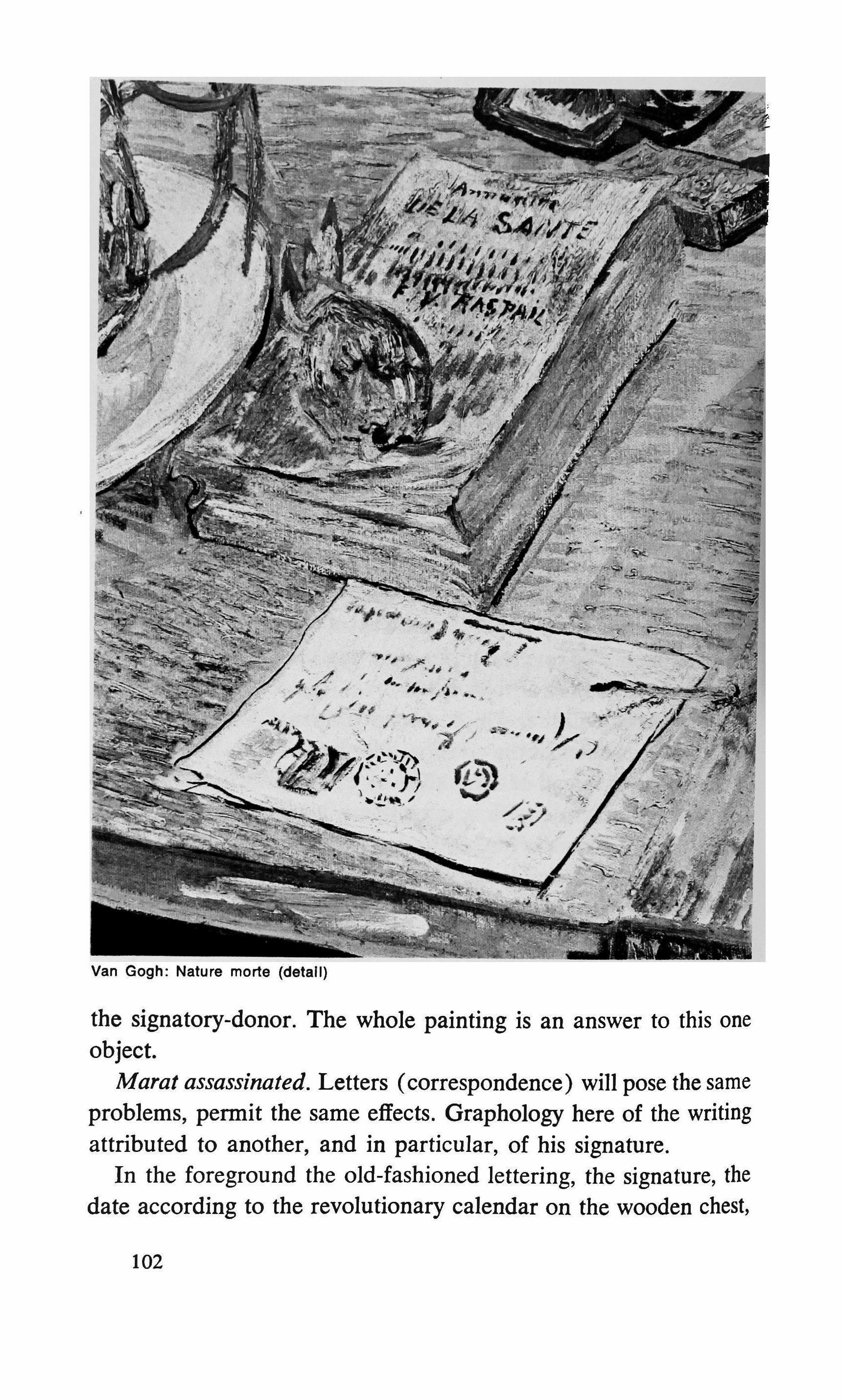
the signatory-donor. The whole painting is an answer to this one object.
Marat assassinated. Letters (correspondence) will pose the same problems, permit the same effects. Graphology here of the writing attributed to another, and in particular, of his signature.
In the foreground the old-fashioned lettering, the signature, the date according to the revolutionary calendar on the wooden chest,
Van Gogh: Nature morte (detail)
102
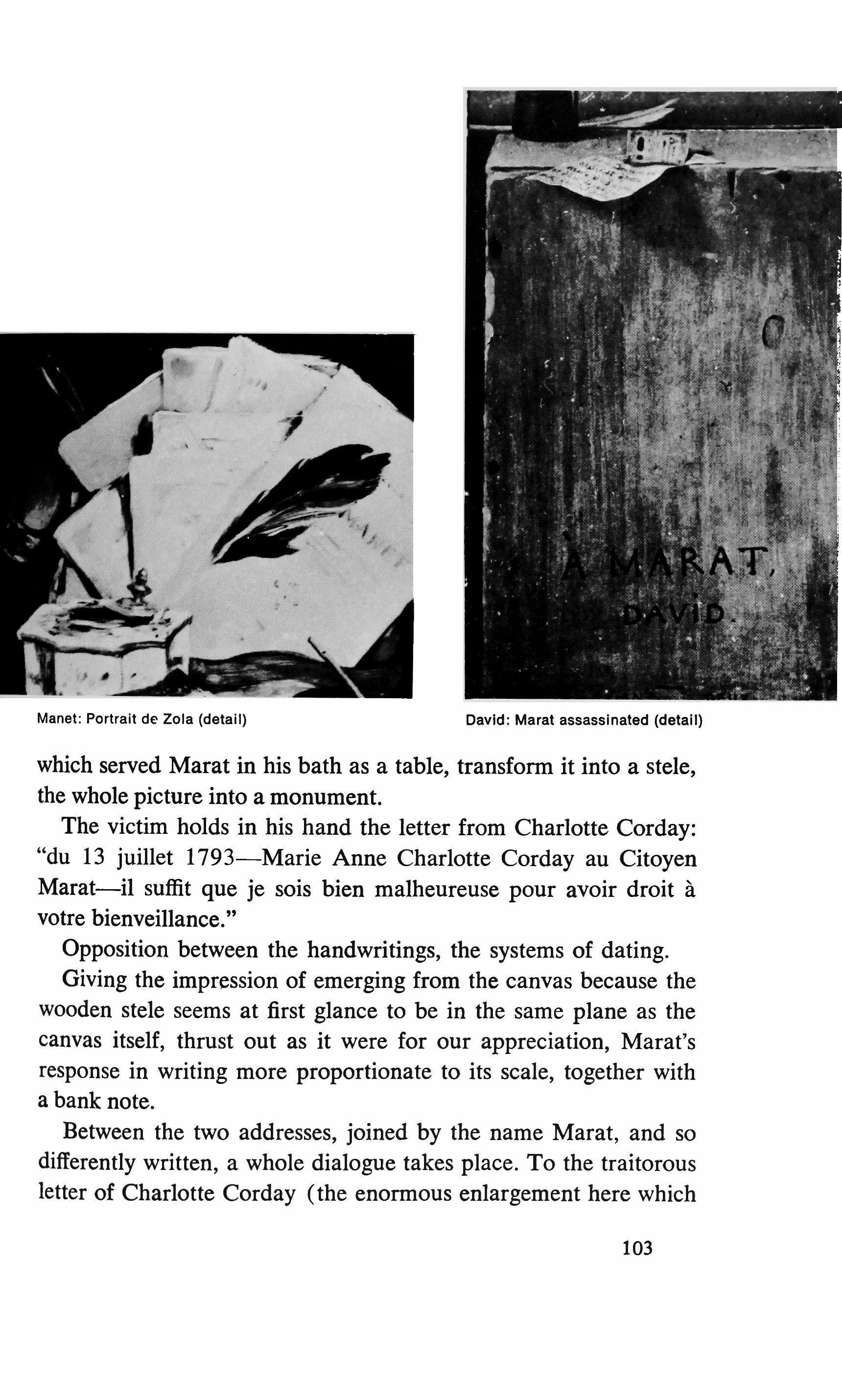
which served Marat in his bath as a table, transform it into a stele, the whole picture into a monument.
The victim holds in his hand the letter from Charlotte Corday: "du 13 juillet 1793-Marie Anne Charlotte Corday au Citoyen Marat-il suffit que je sois bien malheureuse pour avoir droit a votre bienveillance."
Opposition between the handwritings, the systems of dating.
Giving the impression of emerging from the canvas because the wooden stele seems at first glance to be in the same plane as the canvas itself, thrust out as it were for our appreciation, Marat's response in writing more proportionate to its scale, together with a bank note.
Between the two addresses, joined by the name Marat, and so differently written, a whole dialogue takes place. To the traitorous letter of Charlotte Corday (the enormous enlargement here which 103
Manet: Portrait de Zola (detail)
David: Marat assassinated (detail)
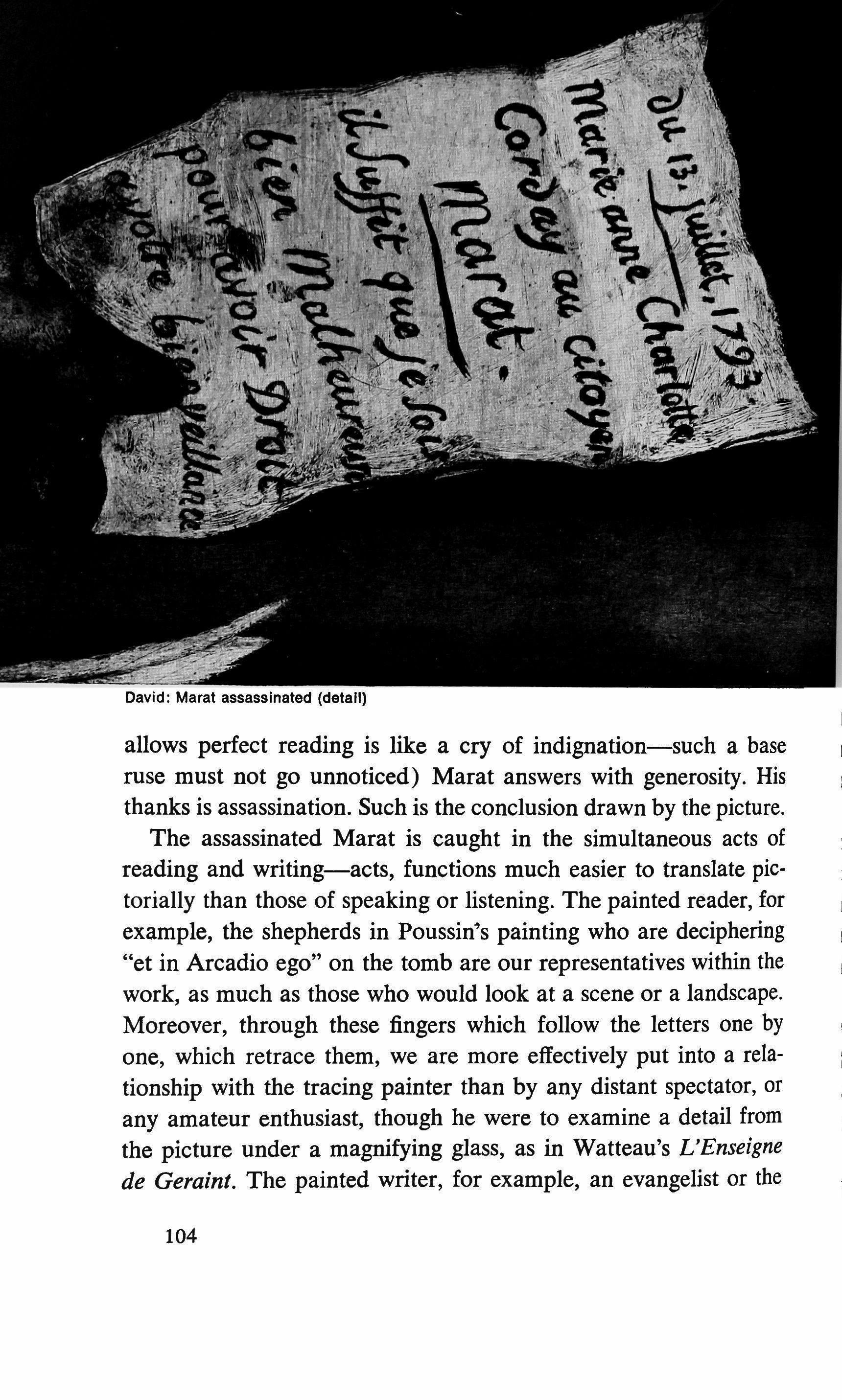
David: Marat assassinated (detail)
allows perfect reading is like a cry of indignation-such a base ruse must not go unnoticed) Marat answers with generosity. His thanks is assassination. Such is the conclusion drawn by the picture.
The assassinated Marat is caught in the simultaneous acts of reading and writing-acts, functions much easier to translate pictorially than those of speaking or listening. The painted reader, for example, the shepherds in Poussin's painting who are deciphering "et in Arcadio ego" on the tomb are our representatives within the work, as much as those who would look at a scene or a landscape. Moreover, through these fingers which follow the letters one by one, which retrace them, we are more effectively put into a relationship with the tracing painter than by any distant spectator, or any amateur enthusiast, though he were to examine a detail from the picture under a magnifying glass, as in Watteau's L'Enseigne de Geraint. The painted writer, for example, an evangelist or the
104

secretary of King Theonat in Carpaccio's Legend of Saint Ursula, represents the painter, but in a different way of course than the painted painter when he looks at the model in his studio whom he will represent on canvas; this time it is the painter who looks at his canvas, like a first spectator, to put on it the inscription, especially the title and signature.
The relationships between the subject (real or not) and the real painter and spectator are reflected in the themes of the model, of the painter and of the spectator. Sometimes in the same picture they are reflected on another level in the themes of the text, of the writer, and of the reader. In the writer the painter paints himself as already the spectator; in the reader he paints the spectator as already the painter.
David wants the spectator to identify with Marat, the reader: would we not, like him, have been taken in by such a lie? He wants us to identify himself with Marat, the writer, and to consider him as generous as the latter, menaced by the same knife thrust. He is Marat's continuation.
As for Charlotte Corday, the painting destroys her. She was there, however, between the reading and the act of writing, but the fact that one could make a hero of her victim by such a pictorial monument has caused her to disappear forever. Faceless, the murder is signed onlyby a few lying lines.
David makes us uncover this lie, a particular instance of the omnipresent lie; he wants us to feel the shadow of the knife ready to strike us, and, offering himself to it to protect us, he wants to lift this threat from us: the knife hidden beneath the lines is thus unmasked, caught in the painting, by virtue of which no knife can henceforth dip into such blood.
All that which, in Marat's activity, stood for love of truth, the struggle against poverty, true liberation (the blood which he, Marat, had caused to run is washed-for David-in Marat's own, this bath of purification) should be consolidated in what the painting begins. Never an act more authentically revolutionary.
Printing. Stacks of manuscripts in the Portrait of George Gisze by Holbein, or the caricature of the Tax Collectors by Marinus
105
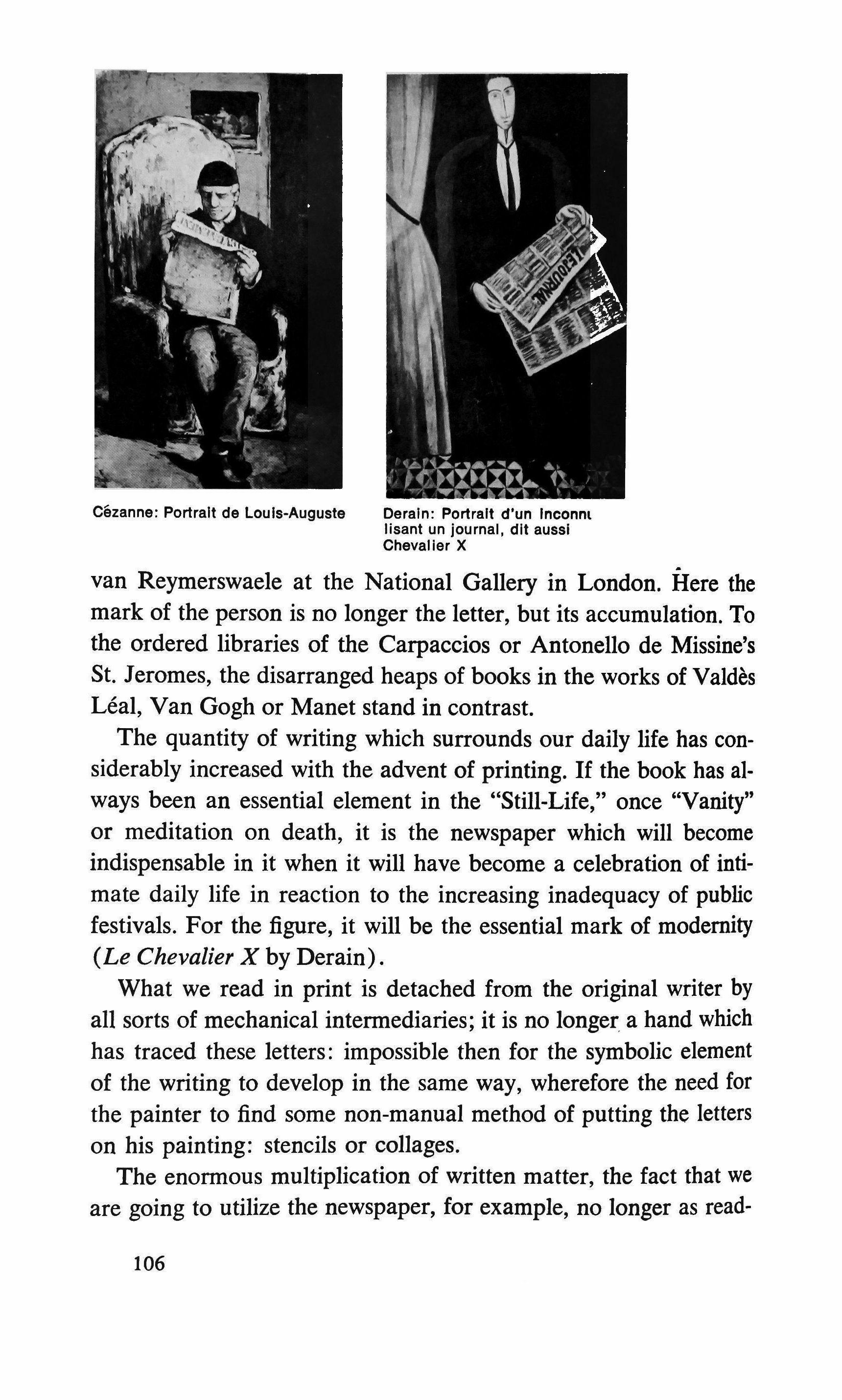
van Reymerswaele at the National Gallery in London, Here the mark of the person is no longer the letter, but its accumulation. To the ordered libraries of the Carpaccios or Antonello de Missine's St. Jeromes, the disarranged heaps of books in the works of Valdes Leal, Van Gogh or Manet stand in contrast.
The quantity of writing which surrounds our daily life has considerably increased with the advent of printing. If the book has always been an essential element in the "Still-Life," once "Vanity" or meditation on death, it is the newspaper which will become indispensable in it when it will have become a celebration of intimate daily life in reaction to the increasing inadequacy of public festivals. For the figure, it will be the essential mark of modernity (Le Chevalier X by Derain).
What we read in print is detached from the original writer by all sorts of mechanical intermediaries; it is no longer a hand which has traced these letters: impossible then for the symbolic element of the writing to develop in the same way, wherefore the need for the painter to find some non-manual method of putting the letters on his painting: stencils or collages.
The enormous multiplication of written matter, the fact that we are going to utilize the newspaper, for example, no longer as read-
Cezanne: Portrait de Louis-Auguste
Deraln: Portrait d'un Inconm Iisant un journal, dlt aussi Chevalier X
106
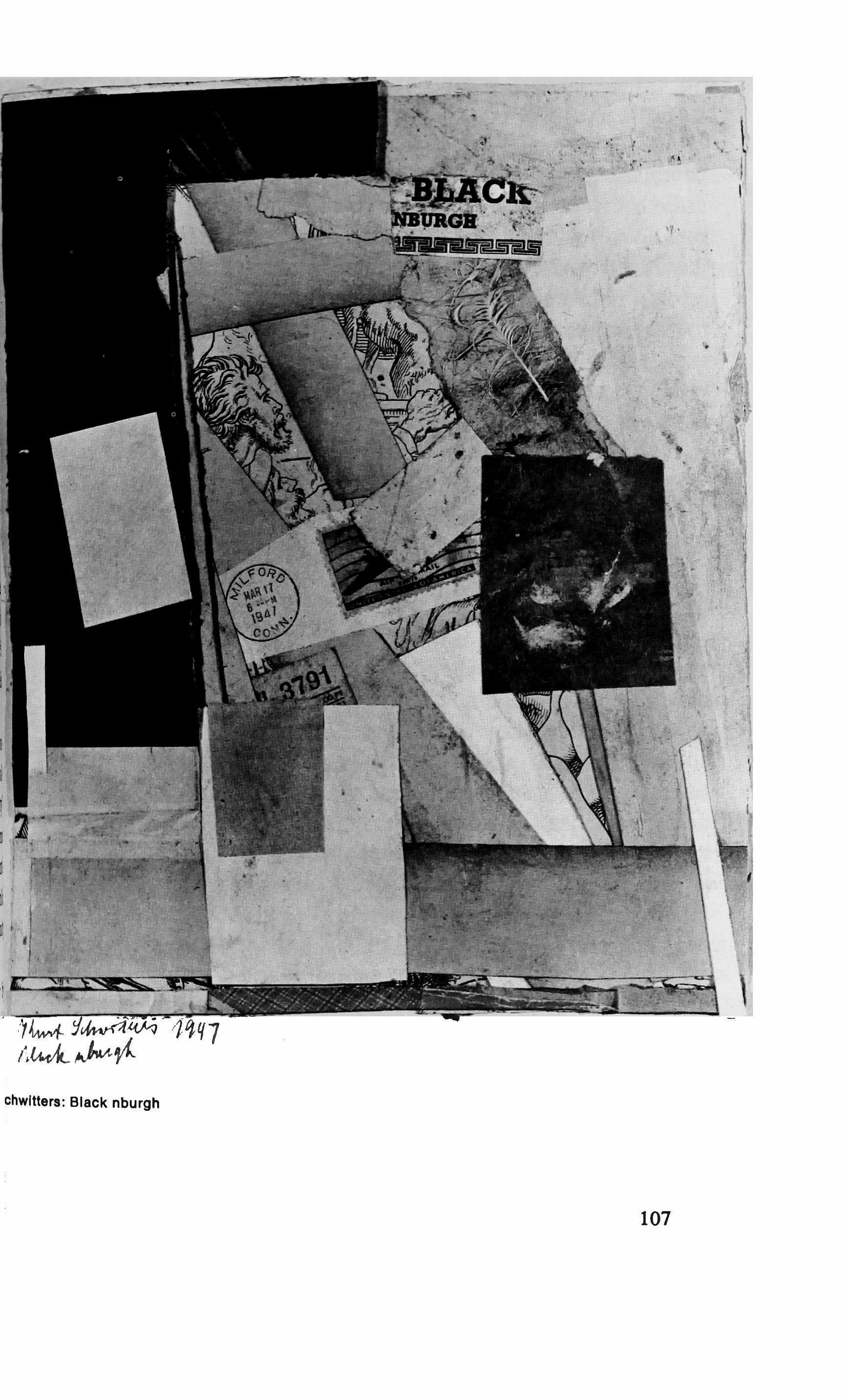
107
chwltters: Black nburgh
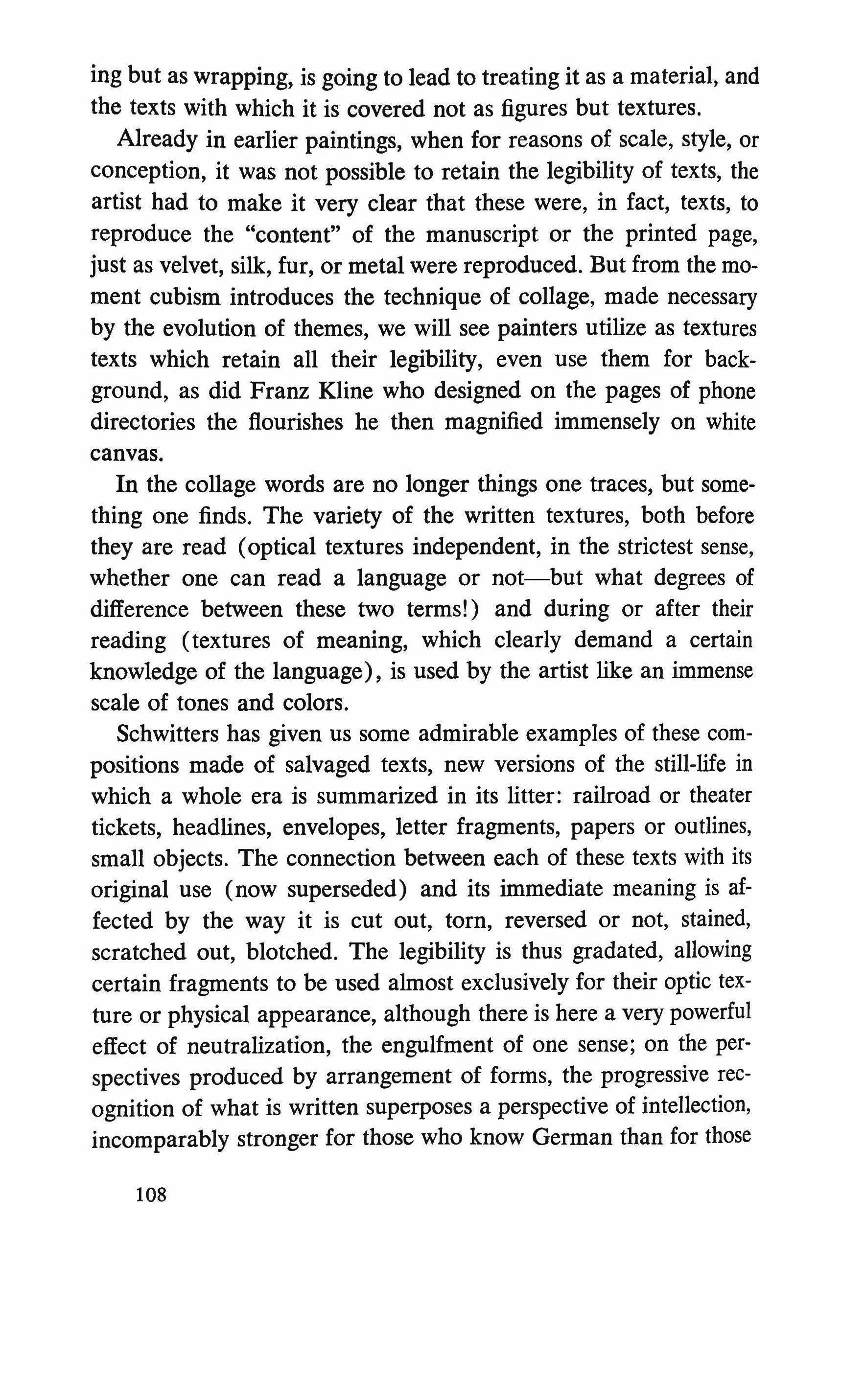
ing but as wrapping, is going to lead to treating it as a material, and the texts with which it is covered not as figures but textures.
Already in earlier paintings, when for reasons of scale, style, or conception, it was not possible to retain the legibility of texts, the artist had to make it very clear that these were, in fact, texts, to reproduce the "content" of the manuscript or the printed page, just as velvet, silk, fur, or metal were reproduced. But from the moment cubism introduces the technique of collage, made necessary by the evolution of themes, we will see painters utilize as textures texts which retain all their legibility, even use them for background, as did Franz Kline who designed on the pages of phone directories the flourishes he then magnified immensely on white canvas.
In the collage words are no longer things one traces, but something one finds. The variety of the written textures, both before they are read (optical textures independent, in the strictest sense, whether one can read a language or not-but what degrees of difference between these two terms!) and during or after their reading (textures of meaning, which clearly demand a certain knowledge of the language), is used by the artist like an immense scale of tones and colors.
Schwitters has given us some admirable examples of these compositions made of salvaged texts, new versions of the still-life in which a whole era is summarized in its litter: railroad or theater tickets, headlines, envelopes, letter fragments, papers or outlines, small objects. The connection between each of these texts with its original use (now superseded) and its immediate meaning is affected by the way it is cut out, torn, reversed or not, stained, scratched out, blotched. The legibility is thus gradated, allowing certain fragments to be used almost exclusively for their optic texture or physical appearance, although there is here a very powerful effect of neutralization, the engulfment of one sense; on the perspectives produced by arrangement of forms, the progressive recognition of what is written superposes a perspective of intellection, incomparably stronger for those who know German than for those
108
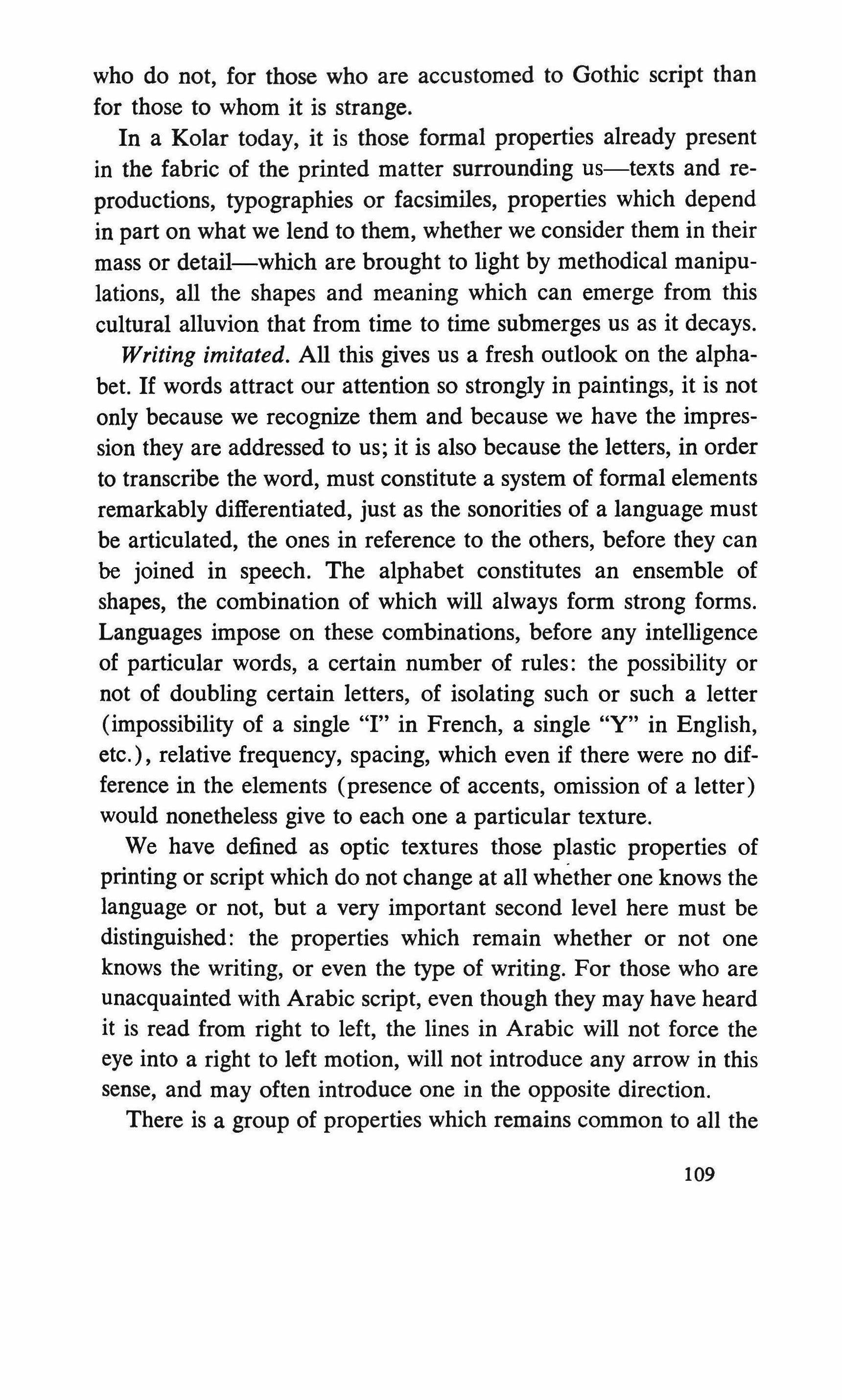
who do not, for those who are accustomed to Gothic script than for those to whom it is strange.
In a Kolar today, it is those formal properties already present in the fabric of the printed matter surrounding us-texts and reproductions, typographies or facsimiles, properties which depend in part on what we lend to them, whether we consider them in their mass or detail-which are brought to light by methodical manipulations, all the shapes and meaning which can emerge from this cultural alluvion that from time to time submerges us as it decays.
Writing imitated. All this gives us a fresh outlook on the alphabet. If words attract our attention so strongly in paintings, it is not only because we recognize them and because we have the impression they are addressed to us; it is also because the letters, in order to transcribe the word, must constitute a system of formal elements remarkably differentiated, just as the sonorities of a language must be articulated, the ones in reference to the others, before they can be joined in speech. The alphabet constitutes an ensemble of shapes, the combination of which will always form strong forms. Languages impose on these combinations, before any intelligence of particular words, a certain number of rules: the possibility or not of doubling certain letters, of isolating such or such a letter (impossibility of a single "I" in French, a single "Y" in English, etc.), relative frequency, spacing, which even if there were no difference in the elements (presence of accents, omission of a letter) would nonetheless give to each one a particular texture.
We have defined as optic textures those plastic properties of printing or script which do not change at all whether one knows the language or not, but a very important second level here must be distinguished: the properties which remain whether or not one knows the writing, or even the type of writing. For those who are unacquainted with Arabic script, even though they may have heard it is read from right to left, the lines in Arabic will not force the eye into a right to left motion, will not introduce any arrow in this sense, and may often introduce one in the opposite direction.
There is a group of properties which remains common to all the
109
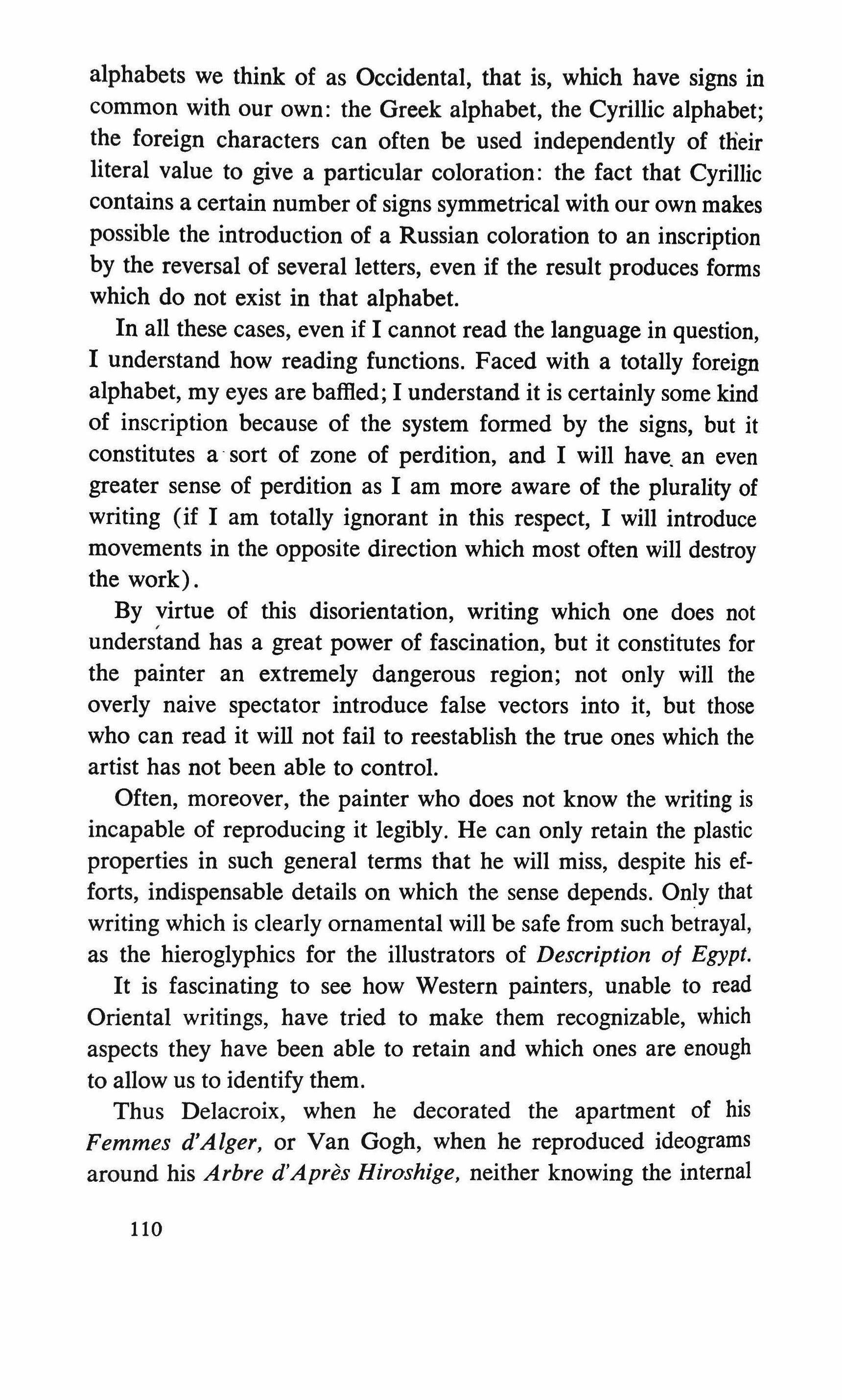
alphabets we think of as Occidental, that is, which have signs in common with our own: the Greek alphabet, the Cyrillic alphabet; the foreign characters can often be used independently of their literal value to give a particular coloration: the fact that Cyrillic contains a certain number of signs symmetrical with our own makes possible the introduction of a Russian coloration to an inscription by the reversal of several letters, even if the result produces forms which do not exist in that alphabet.
In all these cases, even if I cannot read the language in question, I understand how reading functions. Faced with a totally foreign alphabet, my eyes are baffled; I understand it is certainly some kind of inscription because of the system formed by the signs, but it constitutes a sort of zone of perdition, and I will have. an even greater sense of perdition as I am more aware of the plurality of writing (if I am totally ignorant in this respect, I will introduce movements in the opposite direction which most often will destroy the work).
By yirtue of this disorientation, writing which one does not understand has a great power of fascination, but it constitutes for the painter an extremely dangerous region; not only will the overly naive spectator introduce false vectors into it, but those who can read it will not fail to reestablish the true ones which the artist has not been able to control.
Often, moreover, the painter who does not know the writing is incapable of reproducing it legibly. He can only retain the plastic properties in such general terms that he will miss, despite his efforts, indispensable details on which the sense depends. Only that writing which is clearly ornamental will be safe from such betrayal, as the hieroglyphics for the illustrators of Description of Egypt. It is fascinating to see how Western painters, unable to read Oriental writings, have tried to make them recognizable, which aspects they have been able to retain and which ones are enough to allow us to identify them.
Thus Delacroix, when he decorated the apartment of his Femmes d'Alger, or Van Gogh, when he reproduced ideograms around his Arbre d'Apres Hiroshige, neither knowing the internal
110
�,._-�.p� � �:-)./
In:1��. .'fF.(J:JC

Kandlnsky: Succession
rules for these types of writing, which elements must be respected for the sense to be clear, which might be deformed or omitted (and we know what a prodigious variety of forms these rules affect), analyzed the shapes imprecisely. Even so, both succeeded in reproducing for us a "Japanese" or an "Arabic" which we unhesitatingly identify.
Invented writings. In order to answer the challenge presented by a foreign script, painters are ofttimes going to openly invent writing, this time foreign to everyone, which will allow them to introduce into the painting a zone of controlled disorientation.
They are going to paint the fact of not knowing how to read, the magic which writing holds for the analphabetic.
Thus in Le Printemps of 1914, Chirico unrolls a manuscript covered with signs which recall "Solomon's Clavicles." The fact that there are vestiges of Western letters and the disposition of lines make us attribute a left to right reading to the text.
'-.
111
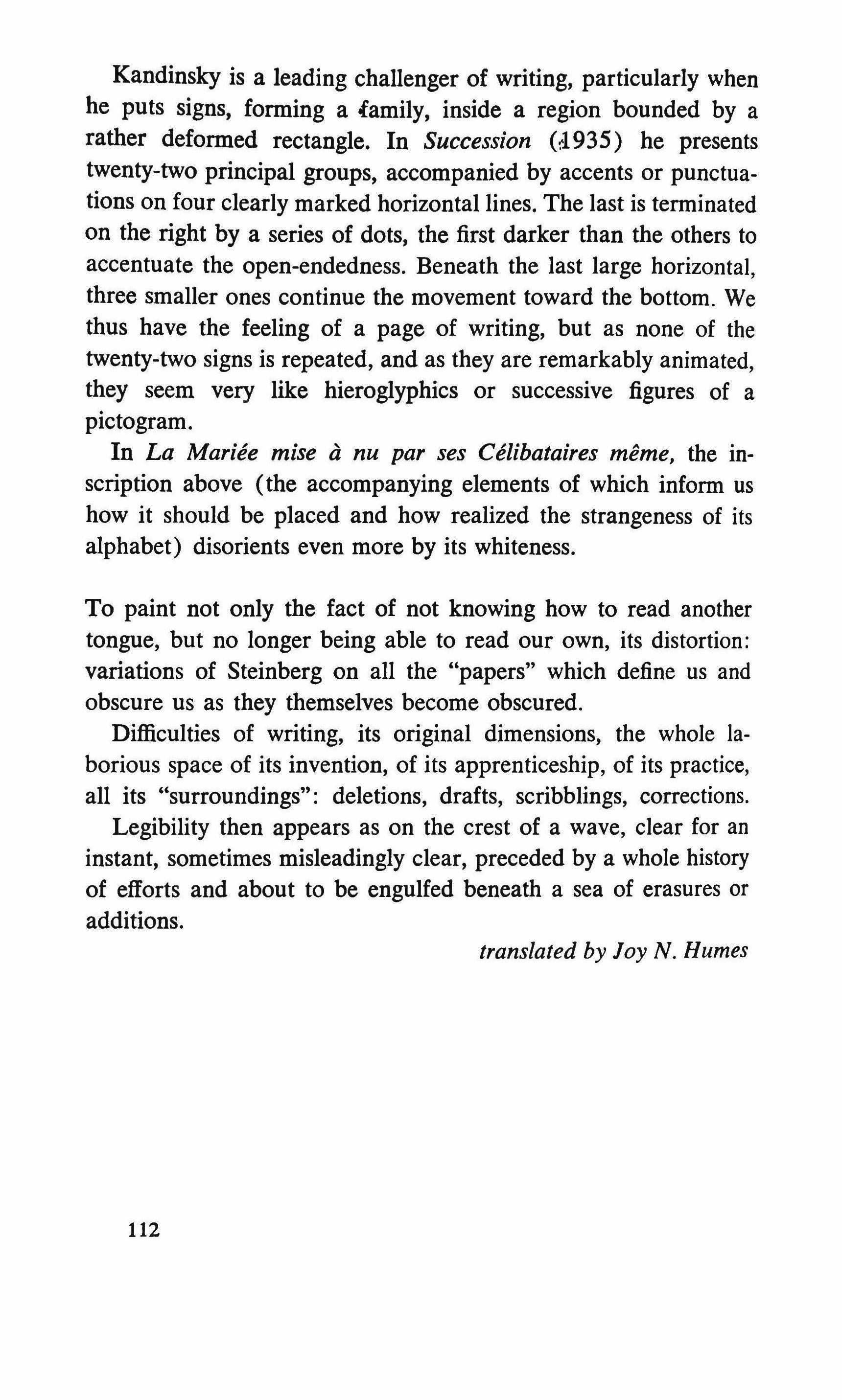
Kandinsky is a leading challenger of writing, particularly when he puts signs, forming a family, inside a region bounded by a rather deformed rectangle. In Succession (�1935) he presents twenty-two principal groups, accompanied by accents or punctuations on four clearly marked horizontal lines. The last is terminated on the right by a series of dots, the first darker than the others to accentuate the open-endedness. Beneath the last large horizontal, three smaller ones continue the movement toward the bottom. We thus have the feeling of a page of writing, but as none of the twenty-two signs is repeated, and as they are remarkably animated, they seem very like hieroglyphics or successive figures of a pictogram.
In La Mariee mise a nu par ses Celibataires meme, the inscription above (the accompanying elements of which inform us how it should be placed and how realized the strangeness of its alphabet) disorients even more by its whiteness.
To paint not only the fact of not knowing how to read another tongue, but no longer being able to read our own, its distortion: variations of Steinberg on all the "papers" which define us and obscure us as they themselves become obscured.
Difficulties of writing, its original dimensions, the whole laborious space of its invention, of its apprenticeship, of its practice, all its "surroundings": deletions, drafts, scribblings, corrections.
Legibility then appears as on the crest of a wave, clear for an instant, sometimes misleadingly clear, preceded by a whole history of efforts and about to be engulfed beneath a sea of erasures or additions.
translated by Joy N. Humes
112
from "The blood oranges"
JOHN HAWKES

Obviously the two birds mating on the horizon were for me a sign, an emblem, a mysterious medallion, a good omen. They augured well for the time I had spent with Catherine and for my own future in the electrified field of Love's art. But as I pedaled once more between the funeral cypresses and approached the villa, I found myself wondering if even I might not give way now to primitive thinking and believe that in the brief twining of that dark blue feathery pair I had actually witnessed Catherine's dead husband and my own slim-limbed wife clasping each to each the sweet mutual dream which only months before had been denied them by the brief gust of catastrophe that had swept among us. Yes, Hugh and Fiona in the shape of birds and finding each other, so to speak, in final stationary flight. Could it have been? I smiled to realize that the pleasure and truth of the vision were worth pondering.
Youth has no monopoly on love. The sap does not flow solely in the young. In all my adventures and in all my diligent but unemo-
TriQuarterJy 113

tional study of sex literature I found nothing to justify the happy expressions of total self-confidence we generally read in the superficially attractive faces of so many younger men and still younger girls. Jaunty, spritely people with trim bodies and unclouded eyes are not necessarily the most capable of those thrust into the center of the pink tapestry. After all, at the height of our season Fiona and Hugh were almost forty. Catherine had passed that mark by several years, while I was already two or three long leaps beyond middle age. Furthermore, we were a quartet of tall and large-boned lovers aged in the wood. Too big for mere caprice, too old to waste time and yet old enough to appreciate immodesty, we were all four of us imposing in height, in weight, in blood pressure, in chest expansion. All except Hugh, perhaps, who always said that his long thin legs were the legs of the Christ and whose spare fishy chest was actually day by day collapsing, though like me Hugh was nonetheless capable of carrying either Fiona or Catherine across one naked shoulder without stumbling or shortness of breath. Body to body, arms about each other's waists, our undergarments and bathing apparel dangling together on a line strung hasti1y between the two villas, or each standing separately and exhibiting his characteristic gesture-Catherine with her hands at her sides, Hugh clutching his impertinent camera, Fiona unconsciously holding her breasts in hands as bold and sensitive as Leonardo's, I bare-chested and cigarette in mouth and staring with bland eyes at a full glass lifted high in my weathered fingers-at the height of our brief season and in the four fully matured figures of our quartet, anyone with an eye for sex would have recognized an experience, purpose and continuity only hinted at in the poignant stances of young girls with thumbs hooked in bikinis and brown legs stiffly apart. There were four of us then, not merely two, and in our quaternion the vintage sap flowed freely, flowed and bled and boiled as it may never again. Can youth make such claims? And what can poor Rosella ever know of all this? But I have no regrets and the old artist, Love, is unpredictable.
114
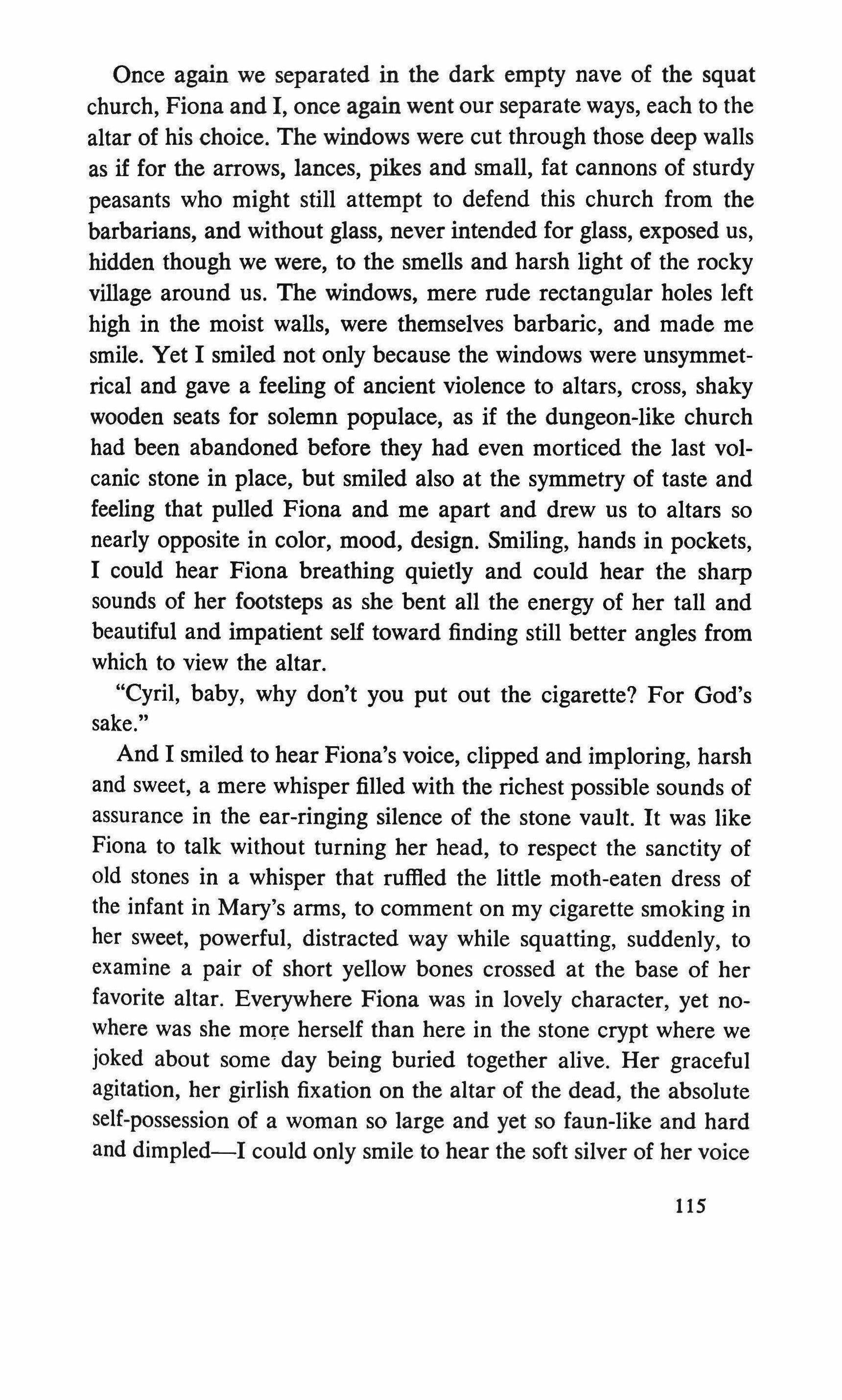
Once again we separated in the dark empty nave of the squat church, Fiona and I, once again went our separate ways, each to the altar of his choice. The windows were cut through those deep walls as if for the arrows, lances, pikes and small, fat cannons of sturdy peasants who might still attempt to defend this church from the barbarians, and without glass, never intended for glass, exposed us, hidden though we were, to the smells and harsh light of the rocky village around us. The windows, mere rude rectangular holes left high in the moist walls, were themselves barbaric, and made me smile. Yet I smiled not only because the windows were unsymmetrical and gave a feeling of ancient violence to altars, cross, shaky wooden seats for solemn populace, as if the dungeon-like church had been abandoned before they had even morticed the last volcanic stone in place, but smiled also at the symmetry of taste and feeling that pulled Fiona and me apart and drew us to altars so nearly opposite in color, mood, design. Smiling, hands in pockets, I could hear Fiona breathing quietly and could hear the sharp sounds of her footsteps as she bent all the energy of her tall and beautiful and impatient self toward finding still better angles from which to view the altar.
"Cyril, baby, why don't you put out the cigarette? For God's sake."
And I smiled to hear Fiona's voice, clipped and imploring, harsh and sweet, a mere whisper filled with the richest possible sounds of assurance in the ear-ringing silence of the stone vault. It was like Fiona to talk without turning her head, to respect the sanctity of old stones in a whisper that ruffled the little moth-eaten dress of the infant in Mary's arms, to comment on my cigarette smoking in her sweet, powerful, distracted way while squatting, suddenly, to examine a pair of short yellow bones crossed at the base of her favorite altar. Everywhere Fiona was in lovely character, yet nowhere was she more herself than here in the stone crypt where we joked about some day being buried together alive. Her graceful agitation, her girlish fixation on the altar of the dead, the absolute self-possession of a woman so large and yet so faun-like and hard and dimpled-I could only smile to hear the soft silver of her voice
115

and to see my athletic angel merging her fluted flesh with those cold shadows.
"What's the matter with my cigarette?" I whispered across the nave in a deep and gentle echo as rich in reverence as Fiona's. "The little boys have been relieving themselves back there in the darkness. Smell it?"
And moving suddenly, putting her hands on her full hips, squatting again with the dream-like rhythms of some tall thin animal in a stricken field: "Cyril. You're making me nervous, baby. OK?"
Then my own slow, bemused, vigorous whisper: "If the little boys can make water, I can smoke."
How like the two of us to spend each day these long minutes together and yet apart in this little medieval fortress of cold passion, how like us to choose these different altars. Hands in pockets, brief cigarette still in my mouth, I lounged against my own small altar, which was of white marble and was devoted to gold, to fresh flowers, to the wooden Virgin recently lacquered in bright blue paint and stiffly cradling the crude doll dressed in his rotting and moth-eaten gown of real lace. The two crowns, the sightless eyes, the feeling of water sprinkled over the whole thing and the sunlight that warmed altar and shoulders alike-here I could lounge suspended in a childish array of cheerful artifacts quite appropriate to my luminous good nature, good taste, good heart, with my back to all this could still bask in the happy presence of the crooked statuette and rigid doll and smile, laugh aloud, take my time watching Fiona trying to penetrate the secrets of that other altar so absurdly opposite from mine.
"My God, I've found the skeleton of a child. Head, ribs, hands, feet-the whole works. How could they do it?"
A moment before she had been sitting on her heels, with the open yellow lambskin coat drawn tight across her widened buttocks, but now, never at rest, she was standing on tiptoe directly in front of that black and white altar, while with my usual pleasure I noted her straight legs, her narrow calves stretching with a kind of girlish muscular determination, her hands spread wide and resting firmly
116
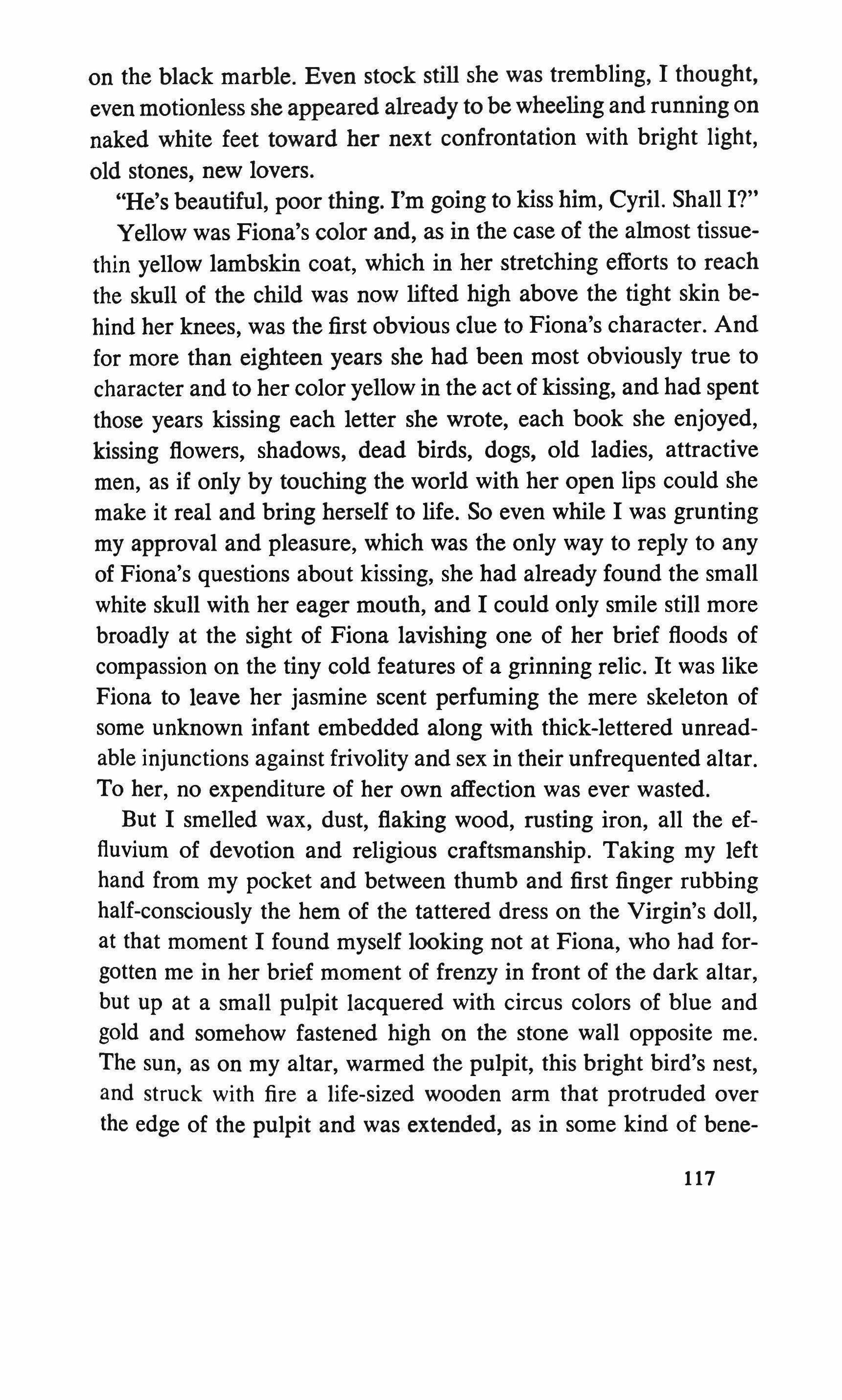
on the black marble. Even stock still she was trembling, I thought, even motionless she appeared already to be wheeling and running on naked white feet toward her next confrontation with bright light, old stones, new lovers.
"He's beautiful, poor thing. I'm going to kiss him, Cyril. Shall I?"
Yellow was Fiona's color and, as in the case of the almost tissuethin yellow lambskin coat, which in her stretching efforts to reach the skull of the child was now lifted high above the tight skin behind her knees, was the first obvious clue to Fiona's character. And for more than eighteen years she had been most obviously true to character and to her color yellow in the act of kissing, and had spent those years kissing each letter she wrote, each book she enjoyed, kissing flowers, shadows, dead birds, dogs, old ladies, attractive men, as if only by touching the world with her open lips could she make it real and bring herself to life. So even while I was grunting my approval and pleasure, which was the only way to reply to any of Fiona's questions about kissing, she had already found the small white skull with her eager mouth, and I could only smile still more broadly at the sight of Fiona lavishing one of her brief floods of compassion on the tiny cold features of a grinning relic. It was like Fiona to leave her jasmine scent perfuming the mere skeleton of some unknown infant embedded along with thick-lettered unreadable injunctions against frivolity and sex in their unfrequented altar. To her, no expenditure of her own affection was ever wasted.
But I smelled wax, dust, flaking wood, rusting iron, all the effluvium of devotion and religious craftsmanship. Taking my left hand from my pocket and between thumb and first finger rubbing half-consciously the hem of the tattered dress on the Virgin's doll, at that moment I found myself looking not at Fiona, who had forgotten me in her brief moment of frenzy in front of the dark altar, but up at a small pulpit lacquered with circus colors of blue and gold and somehow fastened high on the stone wall opposite me. The sun, as on my altar, warmed the pulpit, this bright bird's nest, and struck with fire a life-sized wooden arm that protruded over the edge of the pulpit and was extended, as in some kind of bene-
117
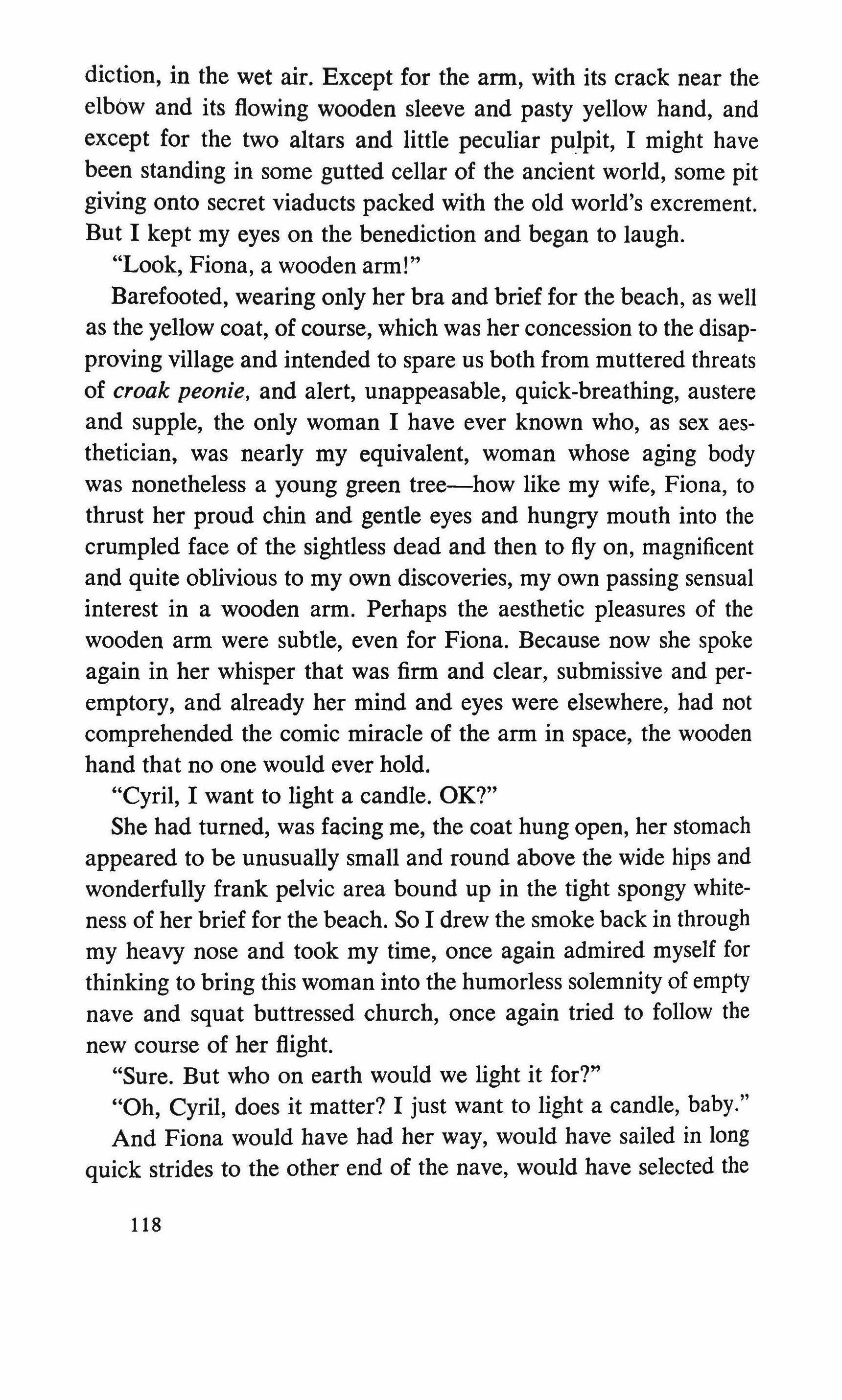
diction, in the wet air. Except for the arm, with its crack near the elbow and its flowing wooden sleeve and pasty yellow hand, and except for the two altars and little peculiar pulpit, I might have been standing in some gutted cellar of the ancient world, some pit giving onto secret viaducts packed with the old world's excrement. But I kept my eyes on the benediction and began to laugh.
"Look, Fiona, a wooden arm!"
Barefooted, wearing only her bra and brief for the beach, as well as the yellow coat, of course, which was her concession to the disapproving village and intended to spare us both from muttered threats of croak peonie, and alert, unappeasable, quick-breathing, austere and supple, the only woman I have ever known who, as sex aesthetician, was nearly my equivalent, woman whose aging body was nonetheless a young green tree-how like my wife, Fiona, to thrust her proud chin and gentle eyes and hungry mouth into the crumpled face of the sightless dead and then to fly on, magnificent and quite oblivious to my own discoveries, my own passing sensual interest in a wooden arm. Perhaps the aesthetic pleasures of the wooden arm were subtle, even for Fiona. Because now she spoke again in her whisper that was firm and clear, submissive and peremptory, and already her mind and eyes were elsewhere, had not comprehended the comic miracle of the arm in space, the wooden hand that no one would ever hold.
"Cyril, I want to light a candle. OK?"
She had turned, was facing me, the coat hung open, her stomach appeared to be unusually small and round above the wide hips and wonderfully frank pelvic area bound up in the tight spongy whiteness of her brief for the beach. So I drew the smoke back in through my heavy nose and took my time, once again admired myself for thinking to bring this woman into the humorless solemnity of empty nave and squat buttressed church, once again tried to follow the new course of her flight.
"Sure. But who on earth would we light it for?"
"Oh, Cyril, does it matter? I just want to light a candle, baby."
And Fiona would have had her way, would have sailed in long quick strides to the other end of the nave, would have selected the
118
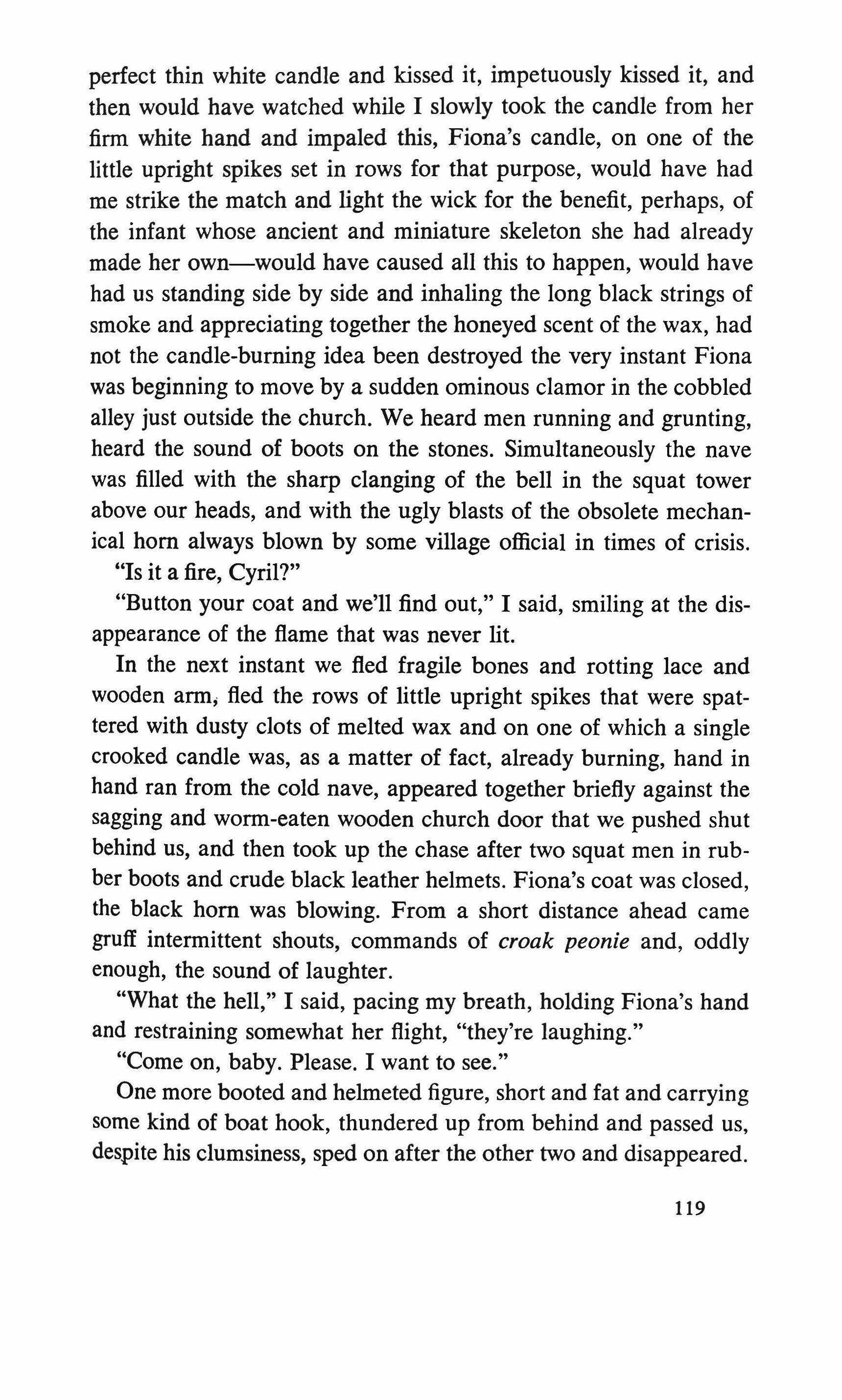
perfect thin white candle and kissed it, impetuously kissed it, and then would have watched while I slowly took the candle from her finn white hand and impaled this, Fiona's candle, on one of the little upright spikes set in rows for that purpose, would have had me strike the match and light the wick for the benefit, perhaps, of the infant whose ancient and miniature skeleton she had already made her own-would have caused all this to happen, would have had us standing side by side and inhaling the long black strings of smoke and appreciating together the honeyed scent of the wax, had not the candle-burning idea been destroyed the very instant Fiona was beginning to move by a sudden ominous clamor in the cobbled alley just outside the church. We heard men running and grunting, heard the sound of boots on the stones. Simultaneously the nave was filled with the sharp clanging of the bell in the squat tower above our heads, and with the ugly blasts of the obsolete mechanical horn always blown by some village official in times of crisis.
"Is it a fire, Cyril?"
"Button your coat and we'll find out," I said, smiling at the disappearance of the flame that was never lit.
In the next instant we fled fragile bones and rotting lace and wooden arm; fled the rows of little upright spikes that were spattered with dusty clots of melted wax and on one of which a single crooked candle was, as a matter of fact, already burning, hand in hand ran from the cold nave, appeared together briefly against the sagging and worm-eaten wooden church door that we pushed shut behind us, and then took up the chase after two squat men in rubber boots and crude black leather helmets. Fiona's coat was closed, the black hom was blowing. From a short distance ahead came gruff intermittent shouts, commands of croak peonie and, oddly enough, the sound of laughter.
"What the hell," I said, pacing my breath, holding Fiona's hand and restraining somewhat her flight, "they're laughing."
"Come on, baby. Please. I want to see."
One more booted and helmeted figure, short and fat and carrying some kind of boat hook, thundered up from behind and passed us, despite his clumsiness, sped on after the other two and disappeared.
119
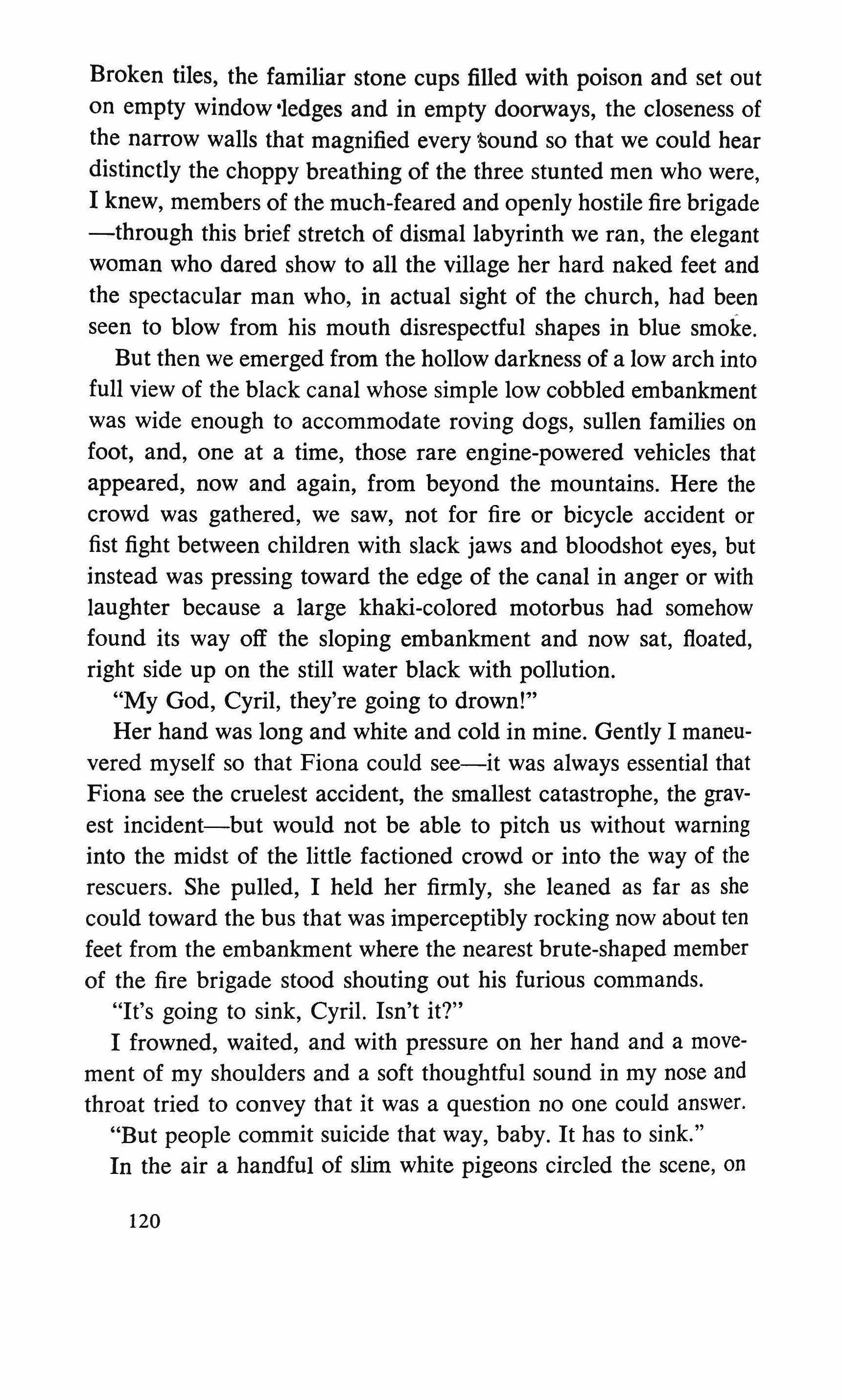
Broken tiles, the familiar stone cups filled with poison and set out on empty window 'ledges and in empty doorways, the closeness of the narrow walls that magnified every sound so that we could hear distinctly the choppy breathing of the three stunted men who were, I knew, members of the much-feared and openly hostile fire brigade -through this brief stretch of dismal labyrinth we ran, the elegant woman who dared show to all the village her hard naked feet and the spectacular man who, in actual sight of the church, had been seen to blow from his mouth disrespectful shapes in blue smoke.
But then we emerged from the hollow darkness of a low arch into full view of the black canal whose simple low cobbled embankment was wide enough to accommodate roving dogs, sullen families on foot, and, one at a time, those rare engine-powered vehicles that appeared, now and again, from beyond the mountains. Here the crowd was gathered, we saw, not for fire or bicycle accident or fist fight between children with slack jaws and bloodshot eyes, but instead was pressing toward the edge of the canal in anger or with laughter because a large khaki-colored motorbus had somehow found its way off the sloping embankment and now sat, floated, right side up on the still water black with pollution.
"My God, Cyril, they're going to drown!"
Her hand was long and white and cold in mine. Gently I maneuvered myself so that Fiona could see-it was always essential that Fiona see the cruelest accident, the smallest catastrophe, the gravest incident-but would not be able to pitch us without warning into the midst of the little factioned crowd or into the way of the rescuers. She pulled, I held her firmly, she leaned as far as she could toward the bus that was imperceptibly rocking now about ten feet from the embankment where the nearest brute-shaped member of the fire brigade stood shouting out his furious commands.
"It's going to sink, Cyril. Isn't it?"
I frowned, waited, and with pressure on her hand and a movement of my shoulders and a soft thoughtful sound in my nose and throat tried to convey that it was a question no one could answer.
"But people commit suicide that way, baby. It has to sink."
In the air a handful of slim white pigeons circled the scene, on
120
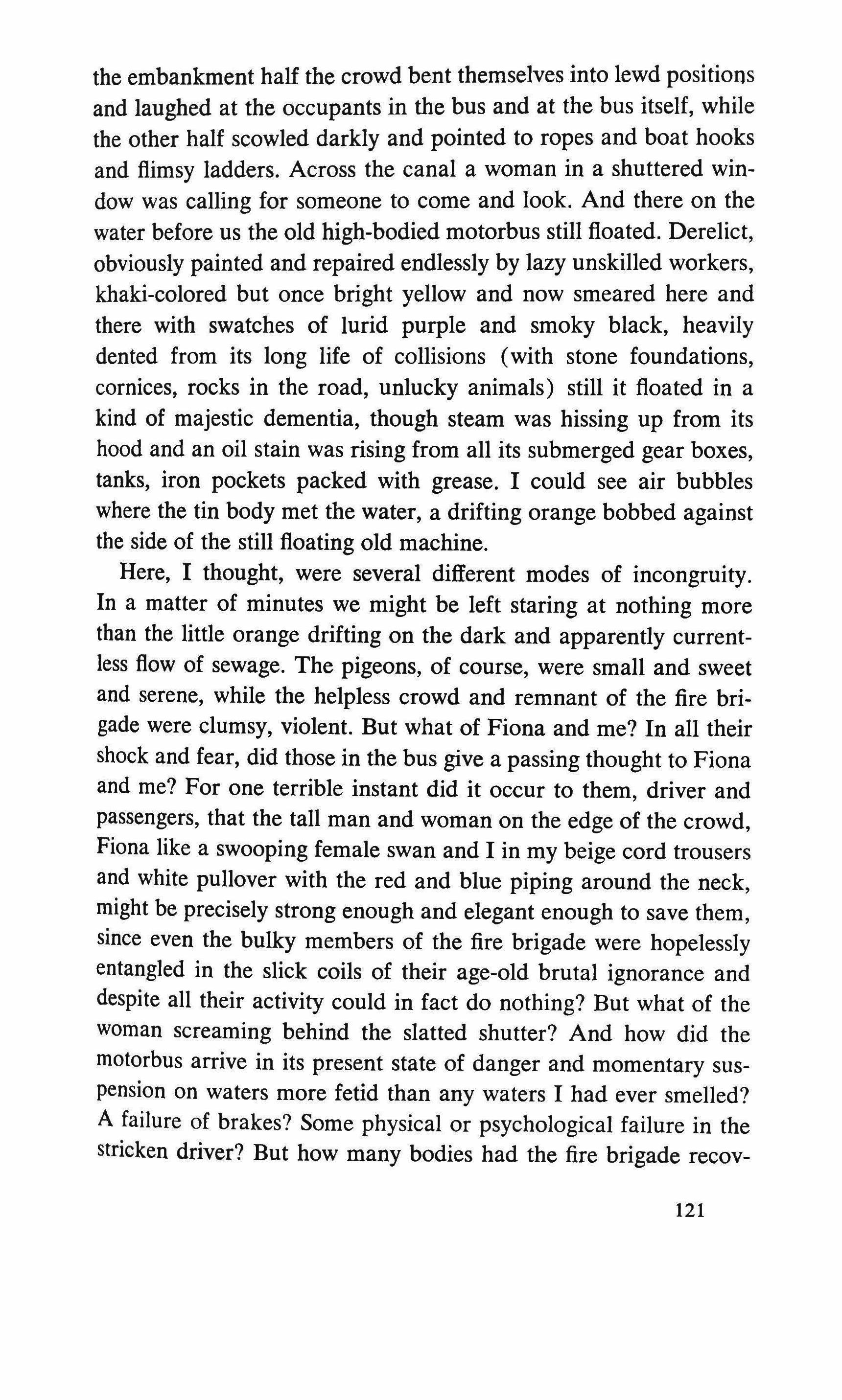
the embankment half the crowd bent themselves into lewd positions and laughed at the occupants in the bus and at the bus itself, while the other half scowled darkly and pointed to ropes and boat hooks and flimsy ladders. Across the canal a woman in a shuttered window was calling for someone to come and look. And there on the water before us the old high-bodied motorbus still floated. Derelict, obviously painted and repaired endlessly by lazy unskilled workers, khaki-colored but once bright yellow and now smeared here and there with swatches of lurid purple and smoky black, heavily dented from its long life of collisions (with stone foundations, cornices, rocks in the road, unlucky animals) still it floated in a kind of majestic dementia, though steam was hissing up from its hood and an oil stain was rising from all its submerged gear boxes, tanks, iron pockets packed with grease. I could see air bubbles where the tin body met the water, a drifting orange bobbed against the side of the still floating old machine.
Here, I thought, were several different modes of incongruity. In a matter of minutes we might be left staring at nothing more than the little orange drifting on the dark and apparently currentless flow of sewage. The pigeons, of course, were small and sweet and serene, while the helpless crowd and remnant of the fire brigade were clumsy, violent. But what of Fiona and me? In all their shock and fear, did those in the bus give a passing thought to Fiona and me? For one terrible instant did it occur to them, driver and passengers, that the tall man and woman on the edge of the crowd, Fiona like a swooping female swan and I in my beige cord trousers and white pullover with the red and blue piping around the neck, might be precisely strong enough and elegant enough to save them, since even the bulky members of the fire brigade were hopelessly entangled in the slick coils of their age-old brutal ignorance and despite all their activity could in fact do nothing? But what of the woman screaming behind the slatted shutter? And how did the motorbus arrive in its present state of danger and momentary suspension on waters more fetid than any waters I had ever smelled? A failure of brakes? Some physical or psychological failure in the stricken driver? But how many bodies had the fire brigade recov-
121
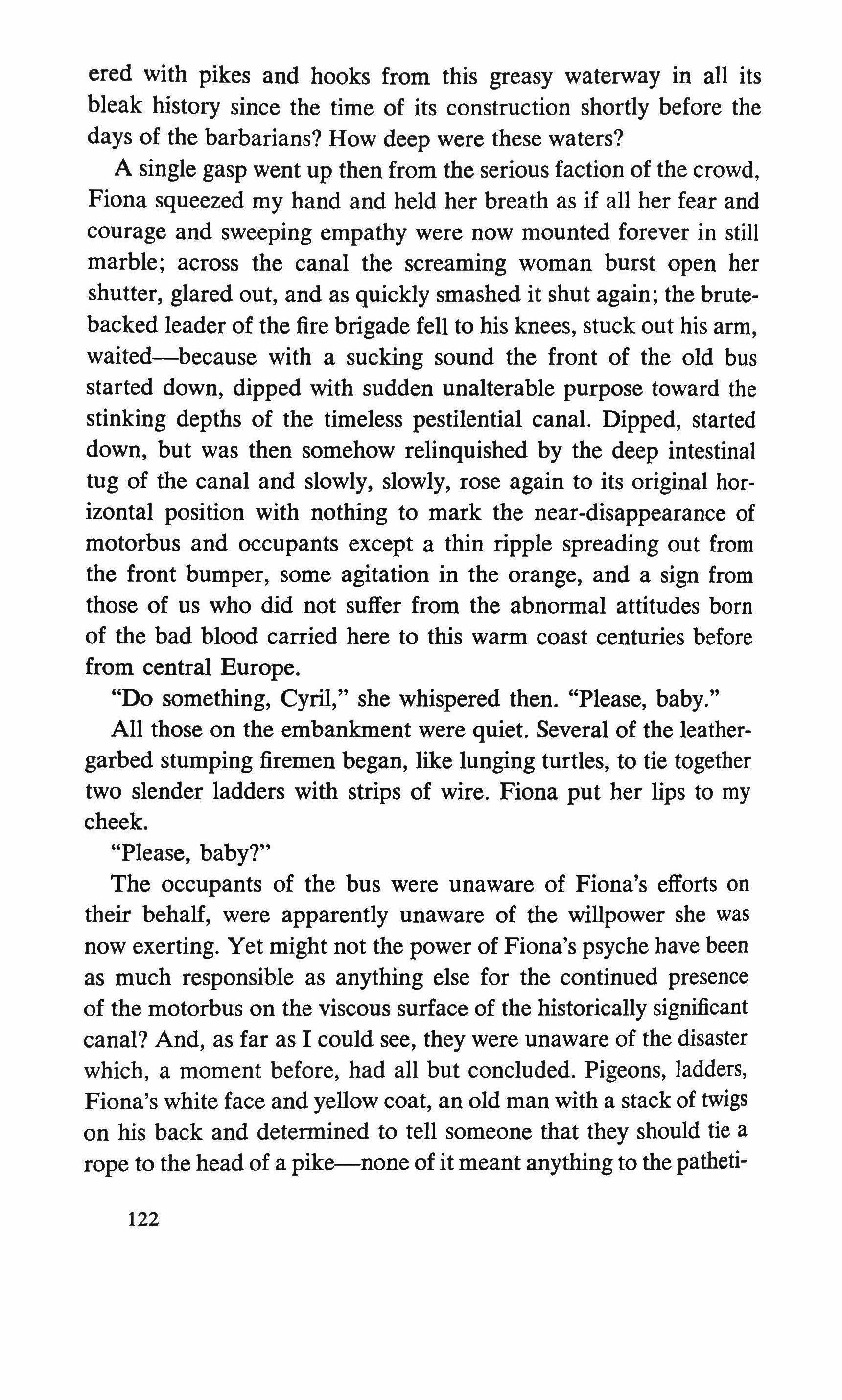
ered with pikes and hooks from this greasy waterway in all its bleak history since the time of its construction shortly before the days of the barbarians? How deep were these waters?
A single gasp went up then from the serious faction of the crowd, Fiona squeezed my hand and held her breath as if all her fear and courage and sweeping empathy were now mounted forever in still marble; across the canal the screaming woman burst open her shutter, glared out, and as quickly smashed it shut again; the brutebacked leader of the fire brigade fell to his knees, stuck out his arm, waited-because with a sucking sound the front of the old bus started down, dipped with sudden unalterable purpose toward the stinking depths of the timeless pestilential canal. Dipped, started down, but was then somehow relinquished by the deep intestinal tug of the canal and slowly, slowly, rose again to its original horizontal position with nothing to mark the near-disappearance of motorbus and occupants except a thin ripple spreading out from the front bumper, some agitation in the orange, and a sign from those of us who did not suffer from the abnormal attitudes born of the bad blood carried here to this warm coast centuries before from central Europe.
"Do something, Cyril," she whispered then. "Please, baby."
All those on the embankment were quiet. Several of the leathergarbed stumping firemen began, like lunging turtles, to tie together two slender ladders with strips of wire. Fiona put her lips to my cheek.
"Please, baby?"
The occupants of the bus were unaware of Fiona's efforts on their behalf, were apparently unaware of the willpower she was now exerting. Yet might not the power of Fiona's psyche have been as much responsible as anything else for the continued presence of the motorbus on the viscous surface of the historically significant canal? And, as far as I could see, they were unaware of the disaster which, a moment before, had all but concluded. Pigeons, ladders, Fiona's white face and yellow coat, an old man with a stack of twigs on his back and determined to tell someone that they should tie a rope to the head of a pike-none of it meant anything to the patheti-
122
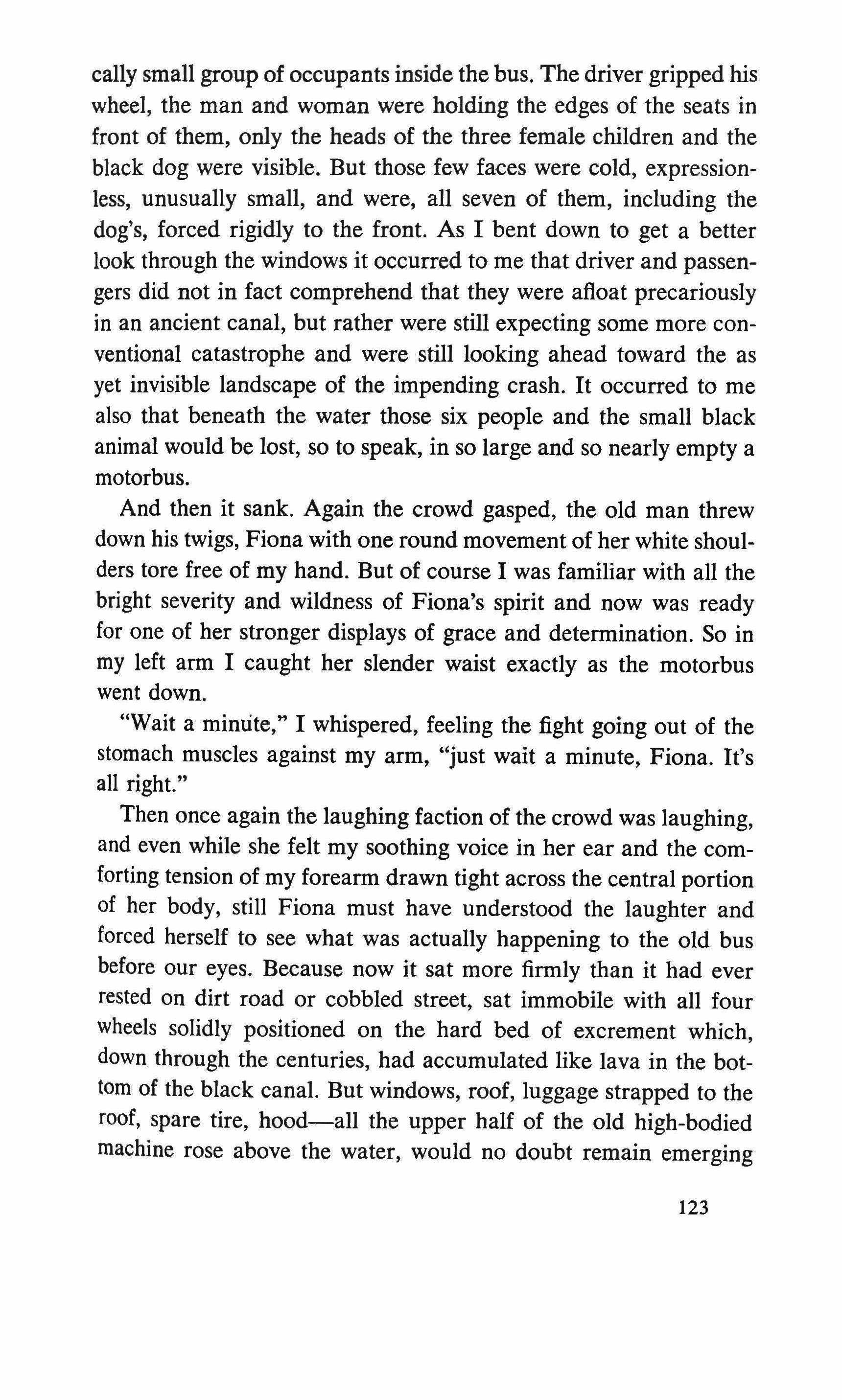
cally small group of occupants inside the bus. The driver gripped his wheel, the man and woman were holding the edges of the seats in front of them, only the heads of the three female children and the black dog were visible. But those few faces were cold, expressionless, unusually small, and were, all seven of them, including the dog's, forced rigidly to the front. As I bent down to get a better look through the windows it occurred to me that driver and passengers did not in fact comprehend that they were afloat precariously in an ancient canal, but rather were still expecting some more conventional catastrophe and were still looking ahead toward the as yet invisible landscape of the impending crash. It occurred to me also that beneath the water those six people and the small black animal would be lost, so to speak, in so large and so nearly empty a motorbus.
And then it sank. Again the crowd gasped, the old man threw down his twigs, Fiona with one round movement of her white shoulders tore free of my hand. But of course I was familiar with all the bright severity and wildness of Fiona's spirit and now was ready for one of her stronger displays of grace and determination. So in my left arm I caught her slender waist exactly as the motorbus went down.
"Wait a minute," I whispered, feeling the fight going out of the stomach muscles against my arm, "just wait a minute, Fiona. It's all right."
Then once again the laughing faction of the crowd was laughing, and even while she felt my soothing voice in her ear and the comforting tension of my forearm drawn tight across the central portion of her body, still Fiona must have understood the laughter and forced herself to see what was actually happening to the old bus before our eyes. Because now it sat more firmly than it had ever rested on dirt road or cobbled street, sat immobile with all four wheels solidly positioned on the hard bed of excrement which, down through the centuries, had accumulated like lava in the bottom of the black canal. But windows, roof, luggage strapped to the roof, spare tire, hood-all the upper half of the old high-bodied machine rose above the water, would no doubt remain emerging
123

from the motionless water as long as the canal walls stood and there were sudden figures to shout croak peonie and tip the contents of stinking buckets into the holes and stone gutters that fed the very smell of time. The waters were not deep (how like these villagers and members of the fire brigade and the old men not to know the depth of their own canal), not deep, yet deep enough to rise well above the wheels, to flood the interior of the bus at least as' high as the knees of the still unmoving occupants, with its black weight to anchor the motorbus where it sat forever. In all the village there was no hoist to lift it, no barge to drag it down to the mouth of the canal. But even if they could, would red-eyed peasants ever take the trouble to remove the enormous old motorbus from a canal that had once been choked with the bodies of dead barbarians? I knew they would not.
"Baby, look! That little girl is waving at me!"
Then Fiona snatched my face into her two hands, kissed me, wheeled about and waved back at the child, while even above the shouts and clatter of the fire brigade we heard, suddenly, the muffled terror-stricken yelps of the black dog that was now jumping from seat to seat up and down the long water-filled interior of the half-sunken bus. Momentarily out of sight, it reappeared with wet shredded ears and tail, with wet fur slick on its belly and on its. short black sturdy legs, had obviously fallen, had been swimming and barking in the fetid water between the seats. And now the woman was attempting to wade to the help of the smaller children who were kneeling, apparently, on the wooden seats, the oldest girl was waving timidly at Fiona, the tall black-haired man was stooping and holding to his chest an armful of photographic equipment and grinning.
"Oh, Cyril, baby, he's handsome! And look at his wife!"
The sucking of the boots of the brute-backed leader of the fire brigade, the sound of shattering glass, the wheezing and laughter and shouts of the crowd, all of whom clearly suffered from some congenital rasping respiratory disease, the thin high cries of the sopping wet dog-suddenly through all this abrasive noise I heard, as if directly into my left ear, the strong but milky vocal qualities
124

of Fiona's voice which told me, in sense and tone, that she was once more making one of her aesthetic evaluations.
"My God, he's handsome. Just look at him!"
She had twisted her head in one direction, her shoulders in another, at the same time twisted her hips in the same direction as her sharp-featured and happily agitated face, and out of all this sinuous exertion and equilibrium had come her voice, her judgment, another fresh gift of discovery which, as usual, she gave to me swiftly and without hesitation. Fiona's voice was a column of air shaped, I knew, like the living column that was her body. Fiona's mind had all the strength and elegance and unpredictability of her tall body. Her eye was sure to see what even I might not see. When she spoke, her voice remade the world. Of course I could never twist and flex myself as Fiona did, could never breathe as rapidly as Fiona breathed or match her sudden jasmine-scented flights. But with each of her gifts I felt some reflection of what she felt, was able to become a kind of low-grade reflector of Fiona's life. So now I listened, lit one of my clumsy yellow cigarettes, glanced around at all the illiterate faces and powerful but sagging shoulders, and then leaned down again for another and better look at the man in the half-sunken bus. Fiona was already waving again at the white-faced girl.
Stroked my chin, leaned down, frowned a little, and got some intensity into my large brown eyes, until suddenly I caught him there knee-deep in the excremental waters, from all the chaos of dog and children and large unsmiling wife, was able to isolate his grinning face and for a moment to hold him still, so to speak, for appraisal.
She was right. As usual Fiona had made another good aesthetic judgment. Because the tall black-haired man stooping and grinning in the bus window was dressed, I could see, in a powdery blue tweed jacket and black turtleneck shirt which was a combination that had always been one of Fiona's favorites. More important perhaps he had a well-weathered face, a face not tanned and darkened in the wind and sun like mine, for instance, but so weathered and pebbled, so grained and whitened in darkness and cold rain that it
125

resembled stone. Gray stone. I knew I had never before seen the thin lips, narrow bright boyish eyes, high sand-blasted cheekbones, pointed ears, black hair curling across his forehead and curling in a few odd ringlets in what appeared to be a beard newly grown. Yet I recognized his face immediately because its exact replica, an image of St. Peter that was perfect except for the broken ears, had been chiseled along with the head of St. Paul into the granite arch of the entrance to the squat church where one candle, I knew, was still burning. St. Peter in stone. No wonder Fiona called his striking features to my attention. Any woman would have found St. Peter attractive. And in the case of my wife, how could Fiona help appreciating a face whose exact replica we had seen and admired during every one of our rambling visits to the squat church? On every one of our visits the stone face, with its delicacy and strength and pleasing malice, had invariably caused Fiona to hold her breasts while standing perfectly still and gazing up at it. Now of course she was busily waving at the frightened child.
But then the tall figure with the saintly goatish face was grinning, not to himself, not at Fiona, but directly at me, and in that instant I recognized that we were friends already and, seeing the empty powdery blue sleeve bent double and fastened with a large safety pin just below the shoulder, realized that for some reason Fiona had failed to comment on his obvious deformity, which to me was now the most interesting thing about him, and realized with a silent laugh that it was in my power to lead them both to the exact spot where his missing arm was hidden.
"He's great, Fiona. But did you notice his arm?"
I would have liked to see her face at that moment, but she went on waving. And then it was too late. Because suddenly the hatless driver and stunted members of the fire brigade began to cooperate, made large gestures with hairy hands, splashed into the water, manipulated the ladders tied together with vine and thongs, found the escape hatch in the roof of the bus, pushed and pulled and cried croak peonie beneath the slow wheeling of the pigeons, cut loose the baggage on the roof, and mingled together inside the bus and then again waist-deep in the canal, bumped and struggled
126
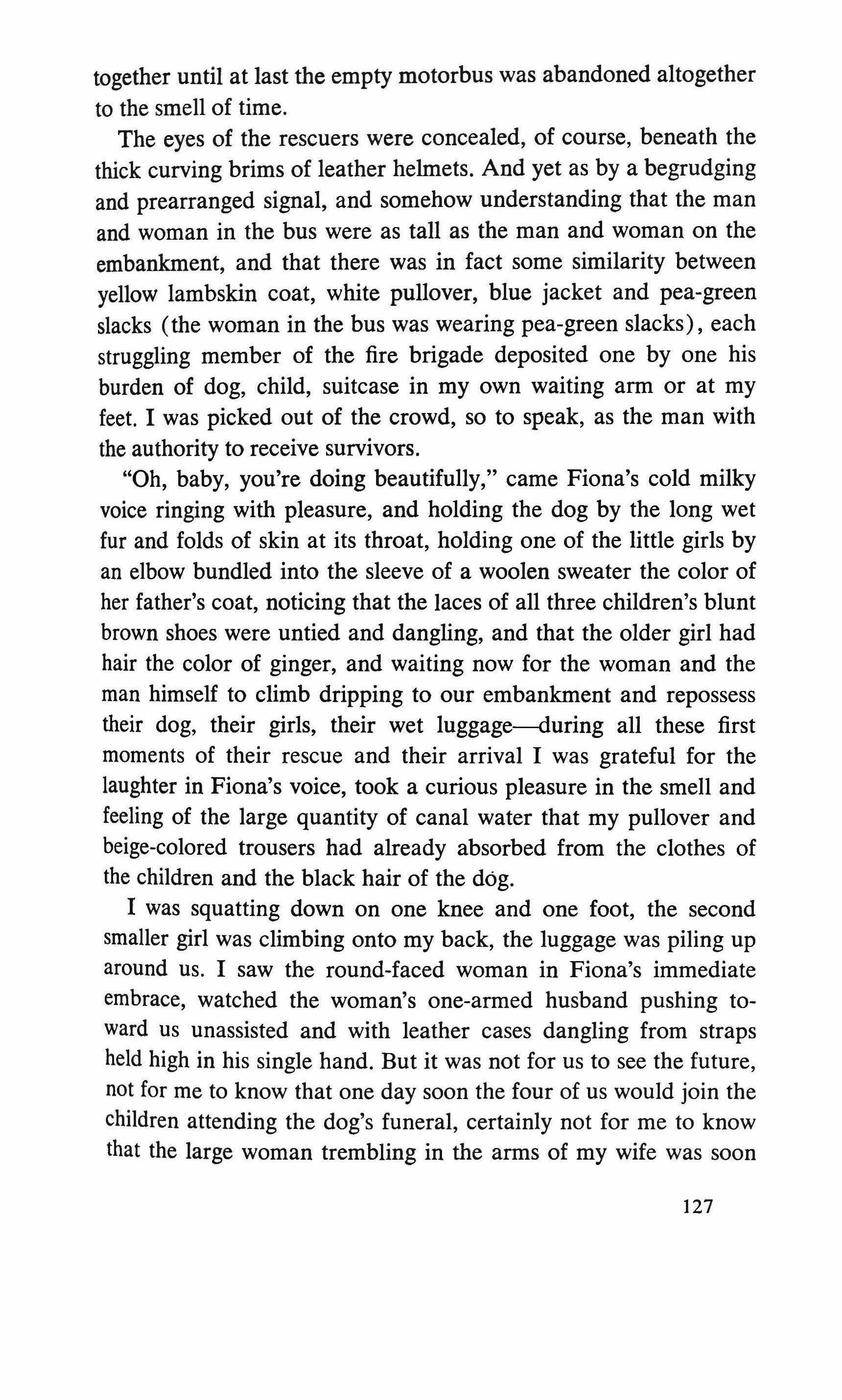
together until at last the empty motorbus was abandoned altogether to the smell of time.
The eyes of the rescuers were concealed, of course, beneath the thick curving brims of leather helmets. And yet as by a begrudging and prearranged signal, and somehow understanding that the man and woman in the bus were as tall as the man and woman on the embankment, and that there was in fact some similarity between yellow lambskin coat, white pullover, blue jacket and pea-green slacks (the woman in the bus was wearing pea-green slacks), each struggling member of the fire brigade deposited one by one his burden of dog, child, suitcase in my own waiting arm or at my feet. I was picked out of the crowd, so to speak, as the man with the authority to receive survivors.
"Oh, baby, you're doing beautifully," came Fiona's cold milky voice ringing with pleasure, and holding the dog by the long wet fur and folds of skin at its throat, holding one of the little girls by an elbow bundled into the sleeve of a woolen sweater the color of her father's coat, noticing that the laces of all three children's blunt brown shoes were untied and dangling, and that the older girl had hair the color of ginger, and waiting now for the woman and the man himself to climb dripping to our embankment and repossess their dog, their girls, their wet luggage--during all these first moments of their rescue and their arrival I was grateful for the laughter in Fiona's voice, took a curious pleasure in the smell and feeling of the large quantity of canal water that my pullover and beige-colored trousers had already absorbed from the clothes of the children and the black hair of the dog.
I was squatting down on one knee and one foot, the second smaller girl was climbing onto my back, the luggage was piling up around us. I saw the round-faced woman in Fiona's immediate embrace, watched the woman's one-armed husband pushing toward us unassisted and with leather cases dangling from straps held high in his single hand. But it was not for us to see the future, not for me to know that one day soon the four of us would join the children attending the dog's funeral, certainly not for me to know that the large woman trembling in the arms of my wife was soon
127
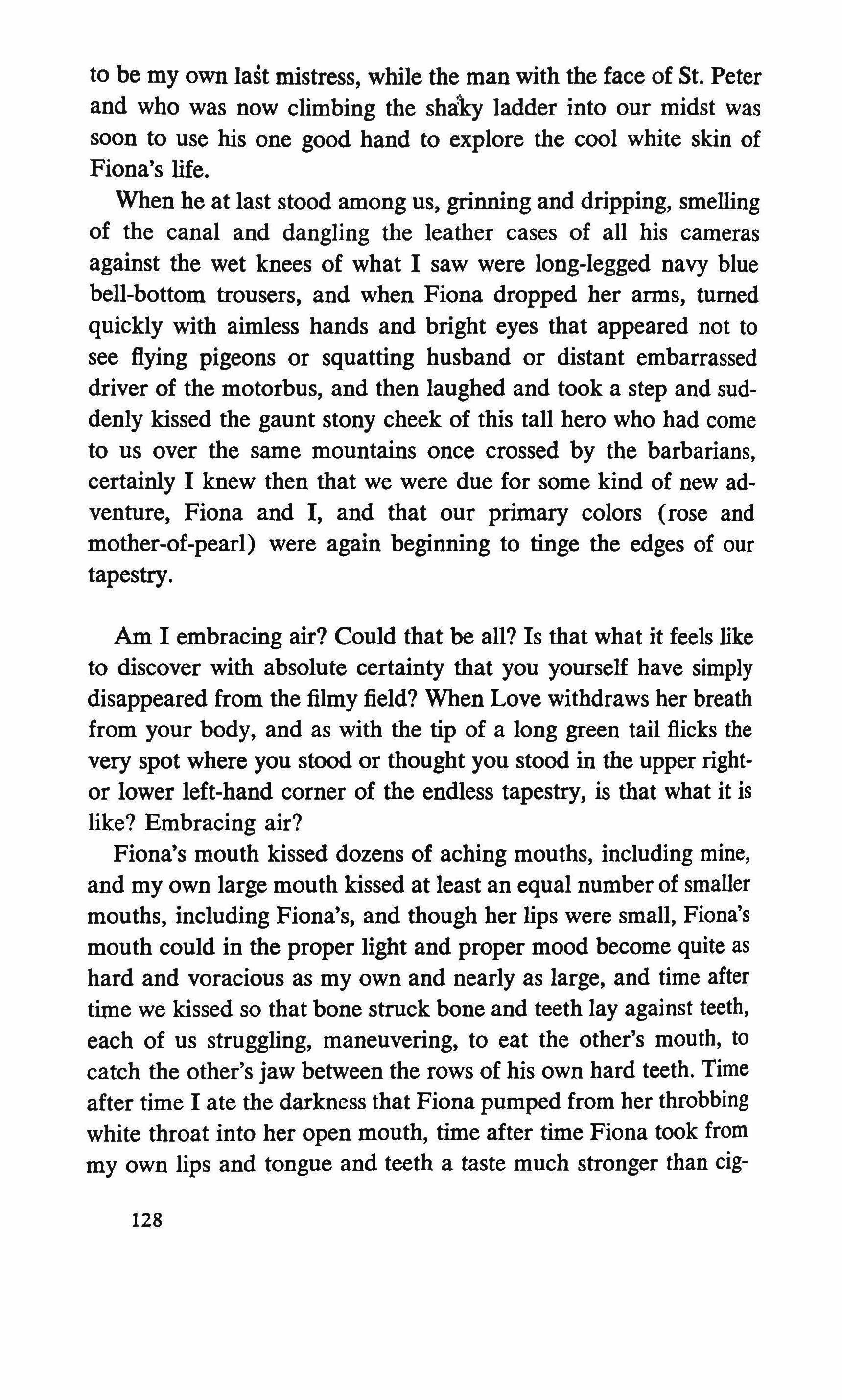
to be my own last mistress, while the man with the face of St. Peter and who was now climbing the shaky ladder into our midst was soon to use his one good hand to explore the cool white skin of Fiona's life.
When he at last stood among us, grinning and dripping, smelling of the canal and dangling the leather cases of all his cameras against the wet knees of what I saw were long-legged navy blue bell-bottom trousers, and when Fiona dropped her arms, turned quickly with aimless hands and bright eyes that appeared not to see flying pigeons or squatting husband or distant embarrassed driver of the motorbus, and then laughed and took a step and suddenly kissed the gaunt stony cheek of this tall hero who had come to us over the same mountains once crossed by the barbarians, certainly I knew then that we were due for some kind of new adventure, Fiona and I, and that our primary colors (rose and mother-of-pearl) were again beginning to tinge the edges of our tapestry.
Am I embracing air? Could that be all? Is that what it feels like to discover with absolute certainty that you yourself have simply disappeared from the filmy field? When Love withdraws her breath from your body, and as with the tip of a long green tail flicks the very spot where you stood or thought you stood in the upper rightor lower left-hand corner of the endless tapestry, is that what it is like? Embracing air?
Fiona's mouth kissed dozens of aching mouths, including mine, and my own large mouth kissed at least an equal number of smaller mouths, including Fiona's, and though her lips were small, Fiona's mouth could in the proper light and proper mood become quite as hard and voracious as my own and nearly as large, and time after time we kissed so that bone struck bone and teeth lay against teeth, each of us struggling, maneuvering, to eat the other's mouth, to catch the other's jaw between the rows of his own hard teeth. Time after time I ate the darkness that Fiona pumped from her throbbing white throat into her open mouth, time after time Fiona took from my own lips and tongue and teeth a taste much stronger than cig-
128

arettes or wine or breath sweeteners. For my part no flavor discovered in a kiss ever aroused my oral greed as did the special flavor I always found in Fiona's mouth, a special taste of mint tinged with that faint suggestion of decay which I drew each time from the very roots of her perfect teeth.
Is it then more pompous lyricism to talk, to chew, to blow smoke rings, to breathe-when I am no longer able to look at Fiona or talk with her or run my finger along the curve of her smallest rib or put my mouth to hers? Are memory and clairvoyance mere twin languorous drafts of rose-tinted air? Or to notice Rosella's raw hips beneath her mangy skirt and then not even to seize them for a moment in friendly hands, or to allow Rosella to sleep alone at the far end of my villa without so much as one clandestine visit from a man who was once master of the clandestine visit, or to do no more than smile at a few of Hugh's now faded photographs of naked girls, or to explain to Rosella in a language she cannot understand exactly what pleasures await us when the veil of dormancy dissolves-are all these further instances of mere wind feathering endlessly through hands, fingers, empty arms? Should I be feeling some kind of loss, some hollow pain? Or am I dying? Already dead?
But it is hardly a fault to have lived my life, and still to live it, without knowing pain. And dormancy, memory, clairvoyance, what more could I want? My dormancy is my hive, my honey pot, my sleeping castle, the golden stall in which the white bull lies quite alive and dreaming. For me the still air is thicker than leaves, and if memory gives me back the grape-tasting game and bursting sun, clairvoyance returns to me in a different way my wife, my last mistress, the little golden sheep who over her shoulder turns small bulging eyes in my direction. But not Hugh. He is gone for good. And Hugh is the man who died for the sake of love, not me. I prefer dormancy to a broken neck.
129

ROBERT BROWNING AND PEN BROWNING, VENICE, 1889.
Returning from one of his frequent visits to Asolo, Robert Browning died at the age of 77 in the Ca' Rezzonico, a Venetian palace which his son "Pen" and his daughter-in-law Fanny, an American millionairess, had bought and converted into a surprisingly habitable residence. It was here that news was brought to the old poet that his latest book, Asolando, had sold out upon the day of its publication in London. "How gratifying," he murmured, and died. "Ba" is of course Elizabeth Barrett Browning, who had died in 1861, when her son was 12. (Photo from Robert Browning: A Portrait, by Betty Miller, published by Charles Scribner's Sons, 1953.)
130
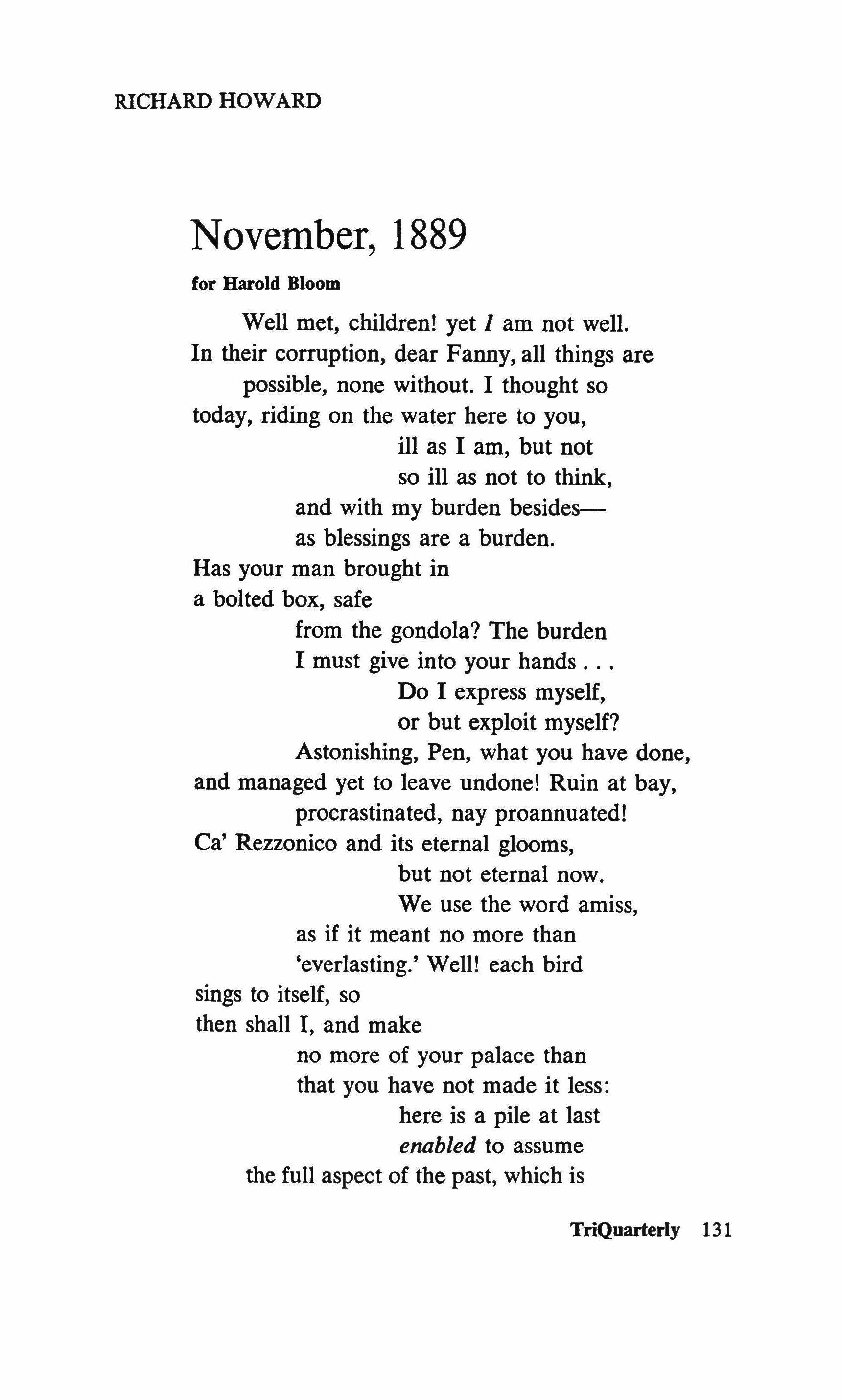
November, 1889
for
Harold Bloom
Well met, children! yet 1 am not well. In their corruption, dear Fanny, all things are possible, none without. I thought so today, riding on the water here to you, ill as I am, but not so ill as not to think, and with my burden besidesas blessings are a burden. Has your man brought in a bolted box, safe from the gondola? The burden I must give into your hands Do I express myself, or but exploit myself? Astonishing, Pen, what you have done, and managed yet to leave undone! Ruin at bay, procrastinated, nay proannuated! Ca' Rezzonico and its eternal glooms, but not eternal now. We use the word amiss, as if it meant no more than 'everlasting.' Well! each bird sings to itself, so then shall I, and make no more of your palace than that you have not made it less: here is a pile at last enabled to assume the full aspect of the past, which is
RICHARD HOWARD
TriQuarterly 131
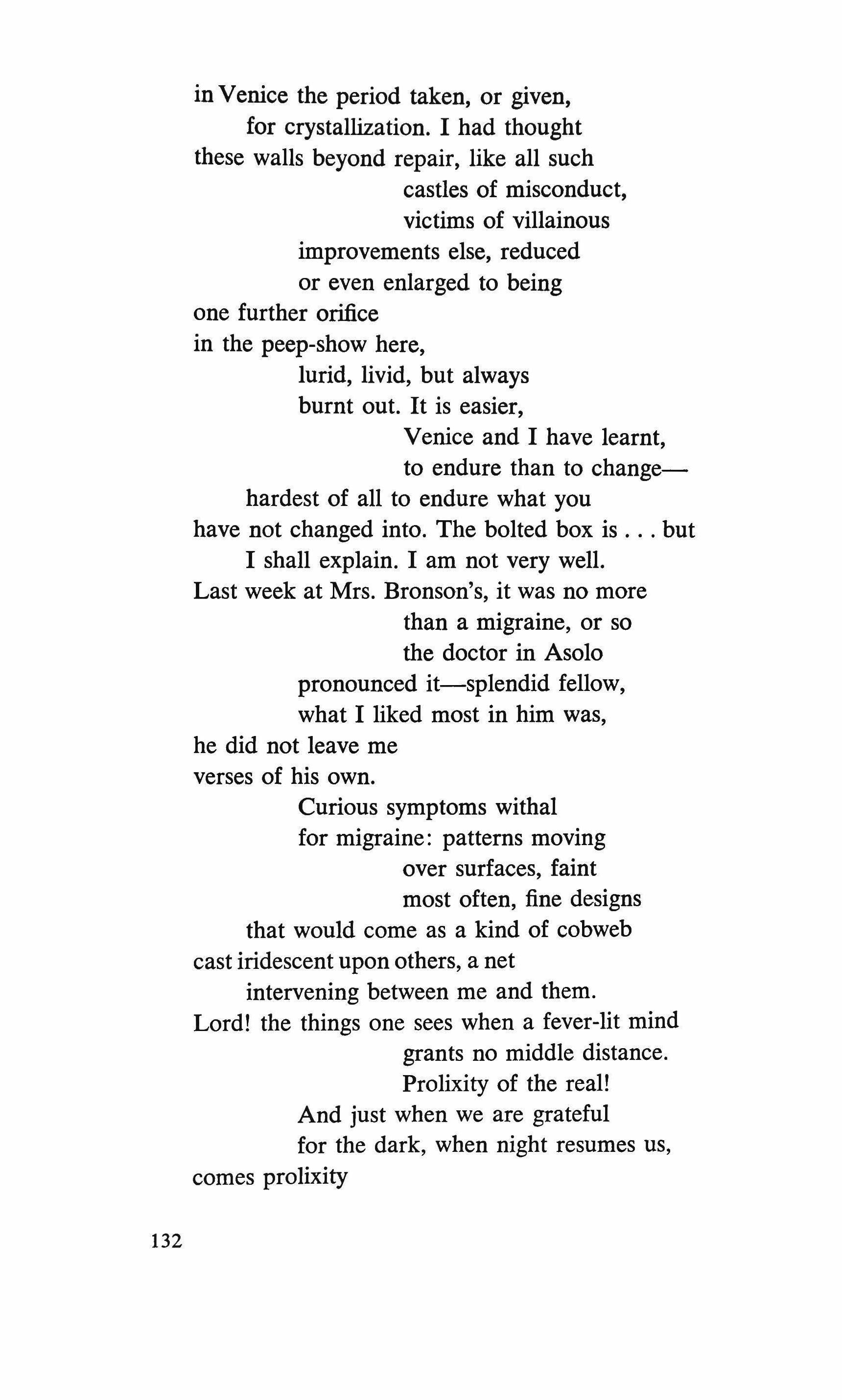
in Venice the period taken, or given, for crystallization. I had thought these walls beyond repair, like all such castles of misconduct, victims of villainous improvements else, reduced or even enlarged to being one further orifice in the peep-show here, lurid, livid, but always burnt out. It is easier, Venice and I have learnt, to endure than to changehardest of all to endure what you have not changed into. The bolted box is but I shall explain. I am not very well. Last week at Mrs. Bronson's, it was no more than a migraine, or so the doctor in Asolo pronounced it-splendid fellow, what I liked most in him was, he did not leave me verses of his own.
Curious symptoms withal for migraine: patterns moving over surfaces, faint most often, fine designs that would come as a kind of cobweb cast iridescent upon others, a net intervening between me and them. Lord! the things one sees when a fever-lit mind grants no middle distance.
Prolixity of the real! And just when we are grateful for the dark, when night resumes us, comes prolixity
132
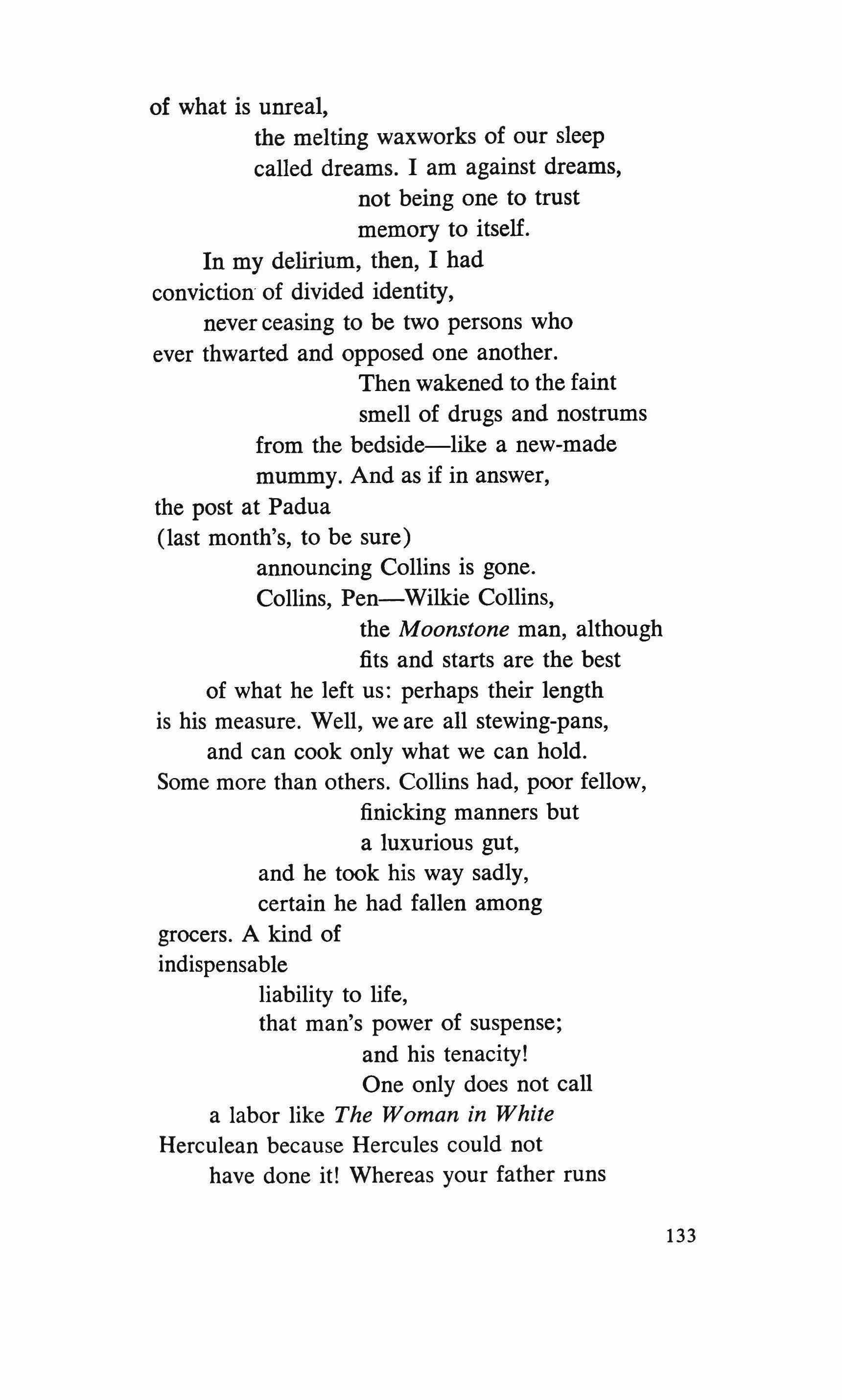
of what is unreal, the melting waxworks of our sleep called dreams. I am against dreams, not being one to trust memory to itself.
In my delirium, then, I had conviction of divided identity, never ceasing to be two persons who ever thwarted and opposed one another. Then wakened to the faint smell of drugs and nostrums from the bedside-like a new-made mummy. And as if in answer, the post at Padua (last month's, to be sure) announcing Collins is gone. Collins, Pen-Wilkie Collins, the Moonstone man, although fits and starts are the best of what he left us: perhaps their length is his measure. Well, we are all stewing-pans, and can cook only what we can hold. Some more than others. Collins had, poor fellow, finicking manners but a luxurious gut, and he took his way sadly, certain he had fallen among grocers. A kind of indispensable liability to life, that man's power of suspense; and his tenacity! One only does not call a labor like The Woman in White Herculean because Hercules could not have done it! Whereas your father runs
133
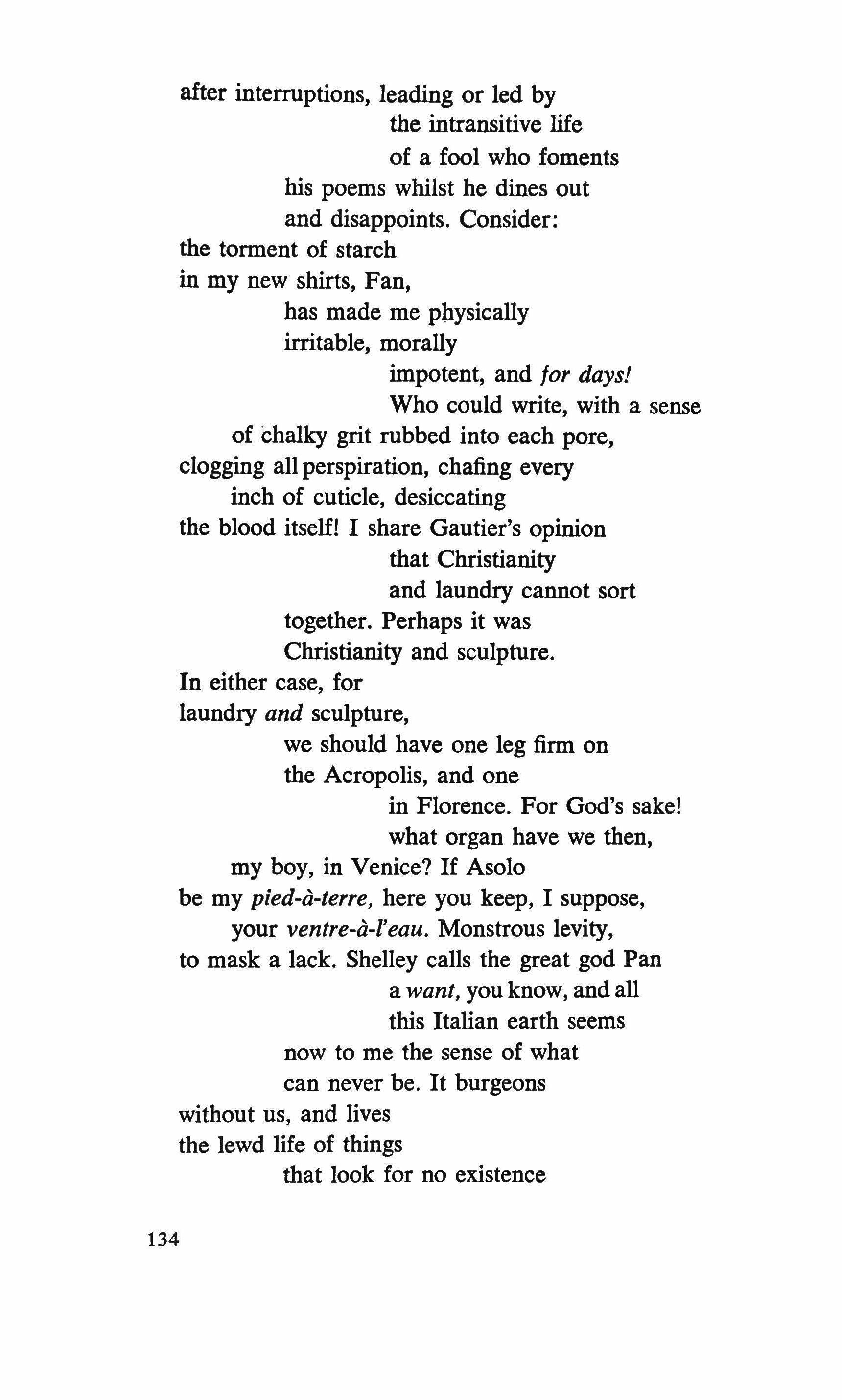
after interruptions, leading or led by the intransitive life of a fool who foments his poems whilst he dines out and disappoints. Consider: the torment of starch in my new shirts, Fan, has made me physically irritable, morally impotent, and for days! Who could write, with a sense of chalky grit rubbed into each pore, clogging all perspiration, chafing every inch of cuticle, desiccating the blood itself I share Gautier's opinion that Christianity and laundry cannot sort together. Perhaps it was Christianity and sculpture. In either case, for laundry and sculpture, we should have one leg firm on the Acropolis, and one in Florence. For God's sake! what organ have we then, my boy, in Venice? If Asolo be my pied-a-terre, here you keep, I suppose, your ventre-a-l'eau. Monstrous levity, to mask a lack. Shelley calls the great god Pan a want, you know, and all this Italian earth seems now to me the sense of what can never be. It burgeons without us, and lives the lewd life of things that look for no existence
134

but in themselves. The canal I came by-leave it and it comprehends you not.
Worse, the admiration of mountains, surely a Calvinist plot: strange confusion, among minds defiant of meaning, between the mere lofty and the beautiful. If mountains tum a tree into a fir, fancy what they can do with a man! Italy lets us know it: the life of April sunlight has to die; it is now quite dead, and I have another kind of life.
Beauties there, of course, but coming only in bursts, coming to a mind long crumpled (till the creases stay), coming only in escapes from the thing itself! Take Asolo, that long Virgilian country round abouthalf mystery and half morality, but then! then the scramble of rural royalty, with royal thoughts! 'It is, at bottom, would you not say, sir, a criticism of life?' I: 'Rather take it at the top, burning ever upward to its blank point of bliss.'
Sumptuous, of course, the dinner, views from the villa entrancing, as you know: the valley full of mist and looking like a sea of absinthe, distant hills rising from it, forming the shore
135

of Purgatory, past Acheron. And the Russian duchess looked on indifferent, staring as she ate, watching the Brenta as if she were but watching the Grand Duke's body pass by: 'What is there, that you make so much of, in water?'leaving off the lobster-'I am quite tired of it. There it goes: flow flow flow, always the same.' She demands to see me here, a princess by birth, a nihilist by trade! offers a rendezvous, my dears, at her hotel, that I may explain stanzas she found obscure. I suppose it is dangerous, if you have not had the advantage of dying, to attempt a description of death, and afterwards there are, unfortunately, obstacles in the way though Ba came not to believe in those either. It is all rigmarole and rhodomontade, even at the hands of a Grand Duchess practicing mesmerism and miracles on all sides. I sink to precious trifling, yet better than the fate of a fallen rocket that likely will be mine as well. I neither hope nor deserve to be loved by anybody, nor much, nor at all, yet
136
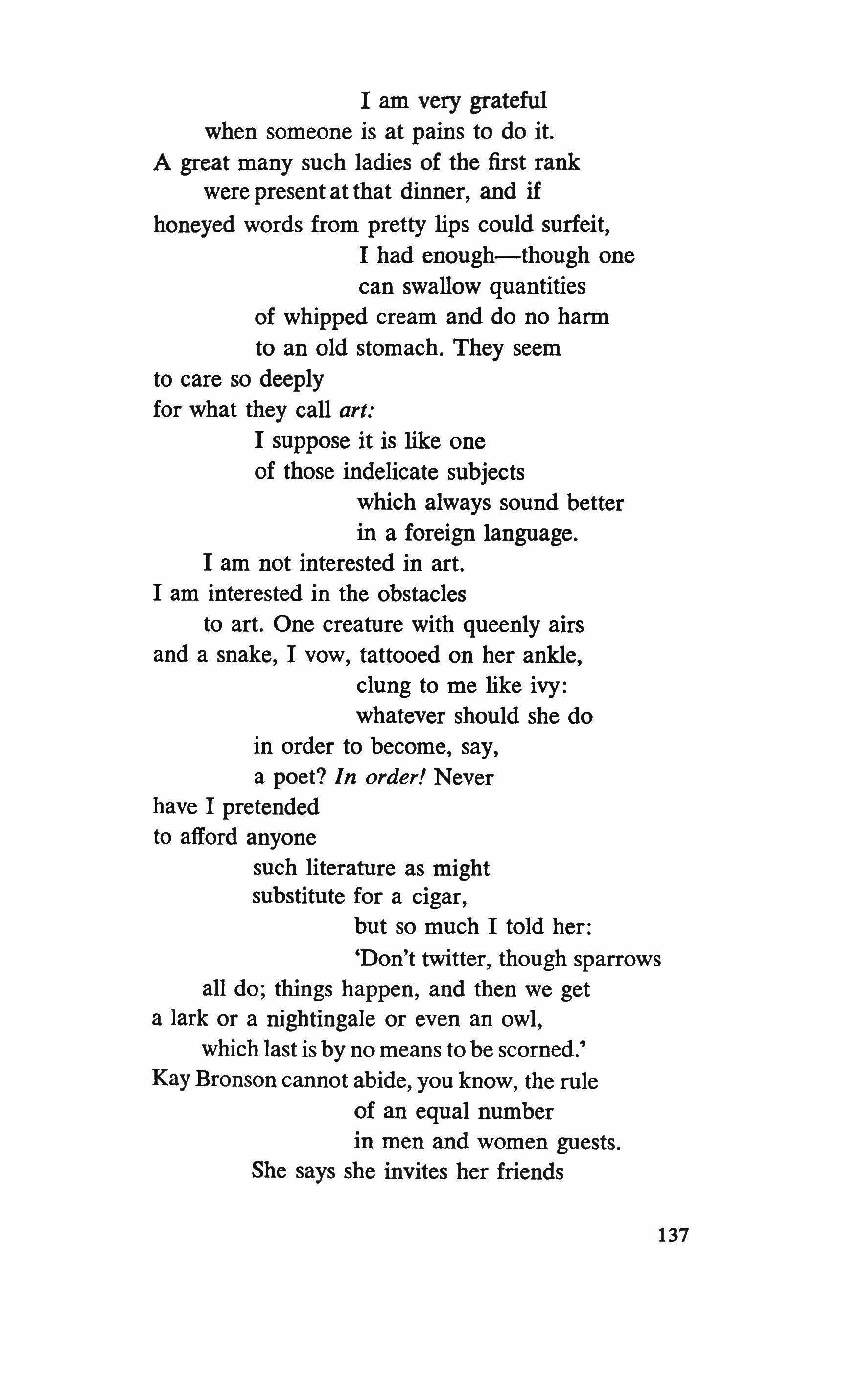
I am very grateful when someone is at pains to do it. A great many such ladies of the first rank were present at that dinner, and if honeyed words from pretty lips could surfeit, I had enough-though one can swallow quantities of whipped cream and do no harm to an old stomach. They seem to care so deeply for what they call art: I suppose it is like one of those indelicate subjects which always sound better in a foreign language.
I am not interested in art. I am interested in the obstacles to art. One creature with queenly airs and a snake, I vow, tattooed on her ankle, clung to me like ivy: whatever should she do in order to become, say, a poet? In order! Never have I pretended to afford anyone such literature as might substitute for a cigar, but so much I told her: 'Don't twitter, though sparrows all do; things happen, and then we get a lark or a nightingale or even an owl, which last is by no means to be scorned.'
Kay Bronson cannot abide, you know, the rule of an equal number in men and women guests. She says she invites her friends
137

for conversation, not mating. Even so, there are surprises. Walking in the woods with my snake-lady, I said: 'Let us sit here'; then, after regarding me steadily a moment, her pale eyes glowing like grapes, she said: 'You may make love to me, if you like.' The old have death, and the young have love, but death comes once-love over and over. Or is it to the old that death comes back and back, and love no longer at all? I told her, it was for poetry I ate and drank and dressed and had my being, but she would not let me go. To be quit of her and them is a godsend to me, for all the graying wreck of nature here, where if not divine it is diabolic. I said I was not well, yet well or ill, up at the villa I am a man smothered with society of women, like a duck with onions. I will not be Victorian in their way: I would be Albertian!
In the one year, Ba died, then Albert died.
Ours were the Great Marriages, I cannot help but think, for I know ours to be, still, the Great Bereavements, the weeds worn so long neither the Queen
138
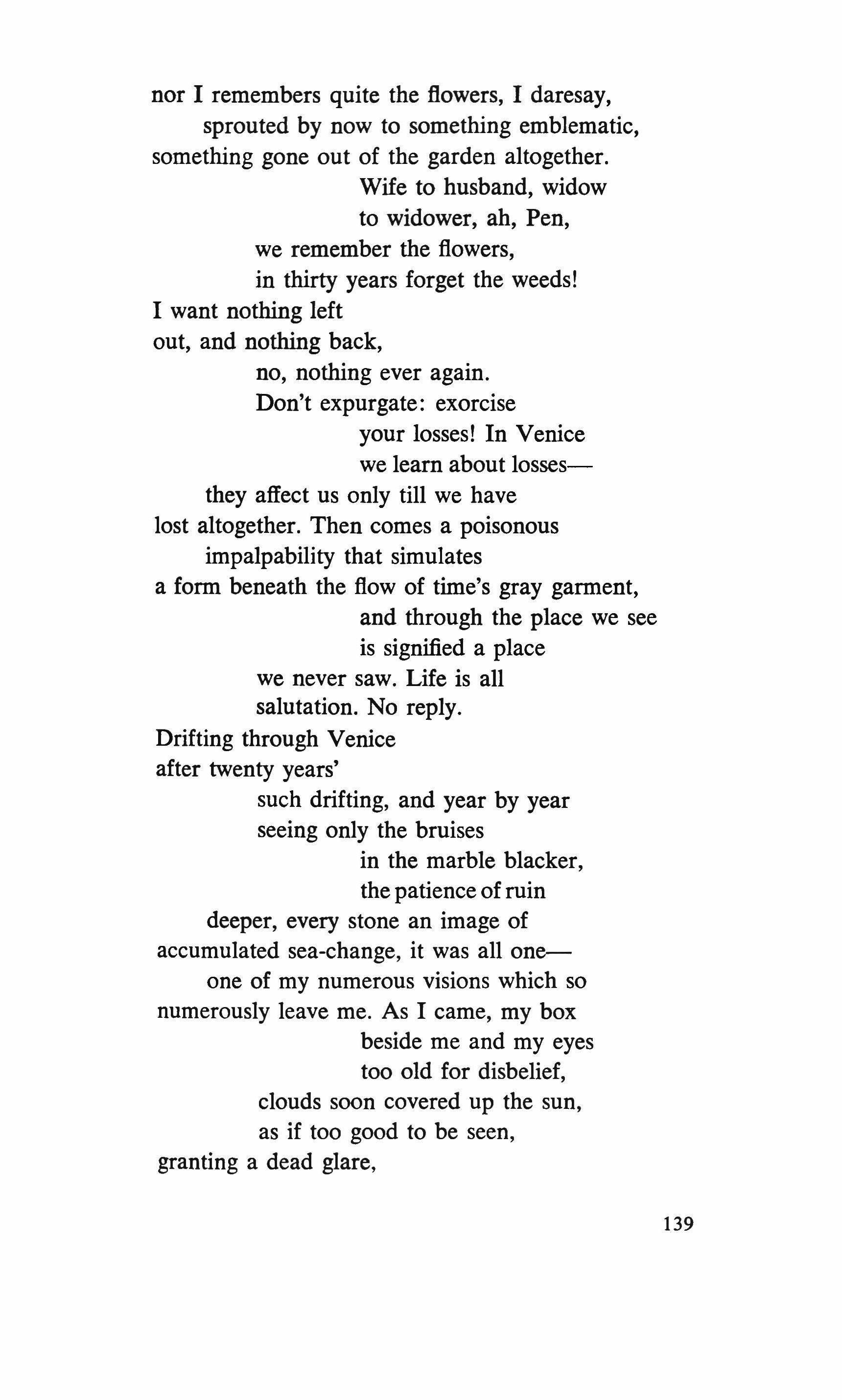
nor I remembers quite the flowers, I daresay, sprouted by now to something emblematic, something gone out of the garden altogether. Wife to husband, widow to widower, ah, Pen, we remember the flowers, in thirty years forget the weeds! I want nothing left out, and nothing back, no, nothing ever again. Don't expurgate: exorcise your losses! In Venice we learn about lossesthey affect us only till we have lost altogether. Then comes a poisonous impalpability that simulates a form beneath the flow of time's gray garment, and through the place we see is signified a place we never saw. Life is all salutation. No reply. Drifting through Venice after twenty years' such drifting, and year by year seeing only the bruises in the marble blacker, the patience of ruin deeper, every stone an image of accumulated sea-change, it was all oneone of my numerous visions which so numerously leave me. As I came, my box beside me and my eyes too old for disbelief, clouds soon covered up the sun, as if too good to be seen, granting a dead glare,
139

visions from the verge shadowless in the steel air, unaccountable, violent against an ultimate horizon. At that hour the ends of the earth were closing in, and I thought: my boy, my Pen, cold walls hold him among shades and silences, mostly darkness there, under a grim incessant sky grayer with each moment since Asolo. It was a pale departure into this perfect decrepitude, suffering this dim disgrace of daylight as the noiseless town neared us. Neared us! We could not even creep to it, but Venice rose up out of the sea to meet us, a momentary shape made magnificent by perennial touching. Ah, Fanny, there are times I can guess what you good young Americans must feel, timesI feel them too--when we are nothing but the heirs of an humiliating splendor. As you have taught me, it takes a great deal to make one successful American, but to make one happy Venetian takes a mere handful of life among old stones. Indeed, if there be disagreeable things in Venice, nothing is so disagreeable as the visitors, jostling for boats
140
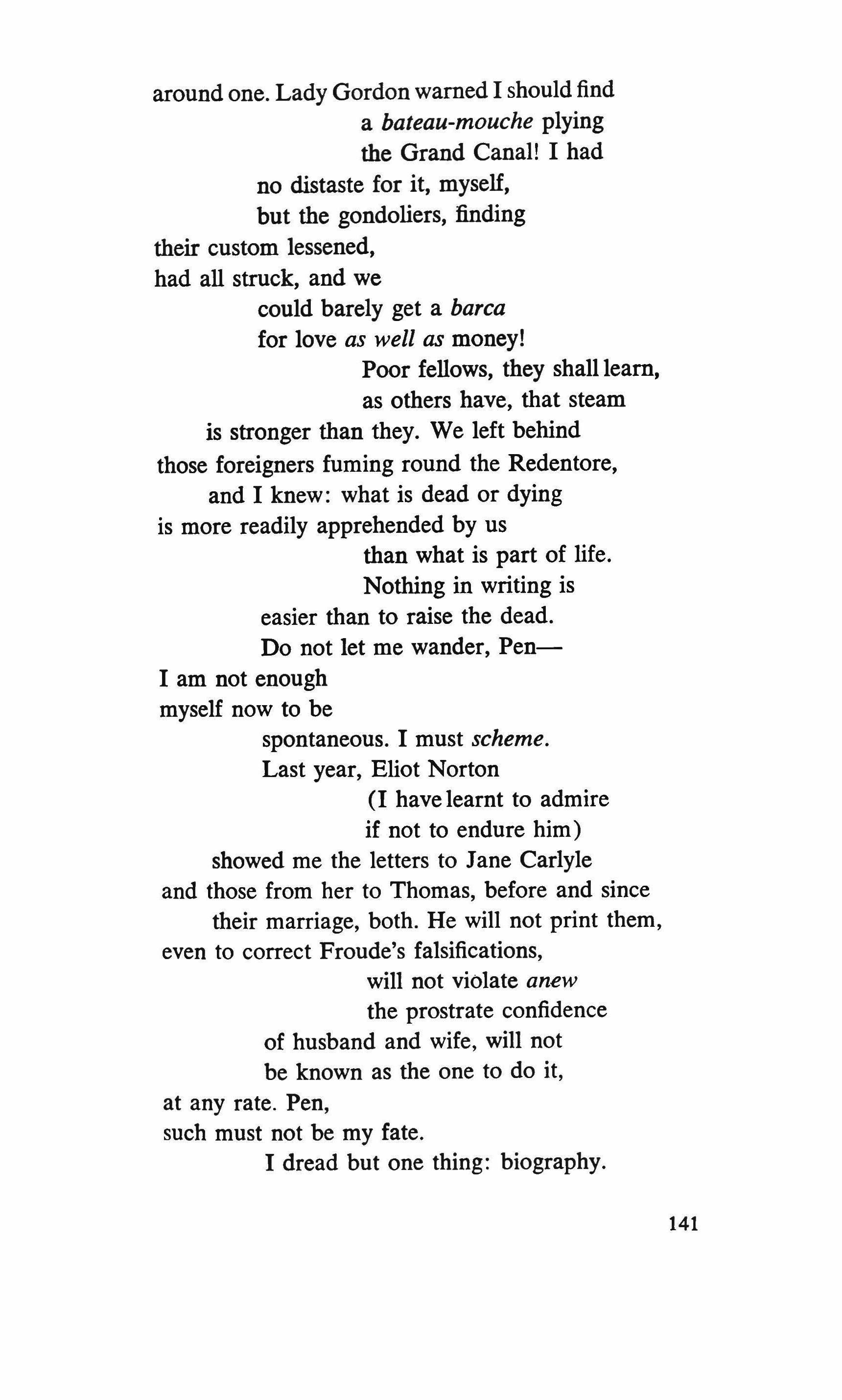
around one. Lady Gordon warned I should find a bateau-mouche plying the Grand Canal! I had no distaste for it, myself, but the gondoliers, finding their custom lessened, had all struck, and we could barely get a barca for love as well as money! Poor fellows, they shall learn, as others have, that steam is stronger than they. We left behind those foreigners fuming round the Redentore, and I knew: what is dead or dying is more readily apprehended by us than what is part of life. Nothing in writing is easier than to raise the dead. Do not let me wander, PenI am not enough myself now to be spontaneous. I must scheme. Last year, Eliot Norton (I have learnt to admire if not to endure him) showed me the letters to Jane Carlyle and those from her to Thomas, before and since their marriage, both. He will not print them, even to correct Froude's falsifications, will not violate anew the prostrate confidence of husband and wife, will not be known as the one to do it, at any rate. Pen, such must not be my fate. I dread but one thing: biography.
141
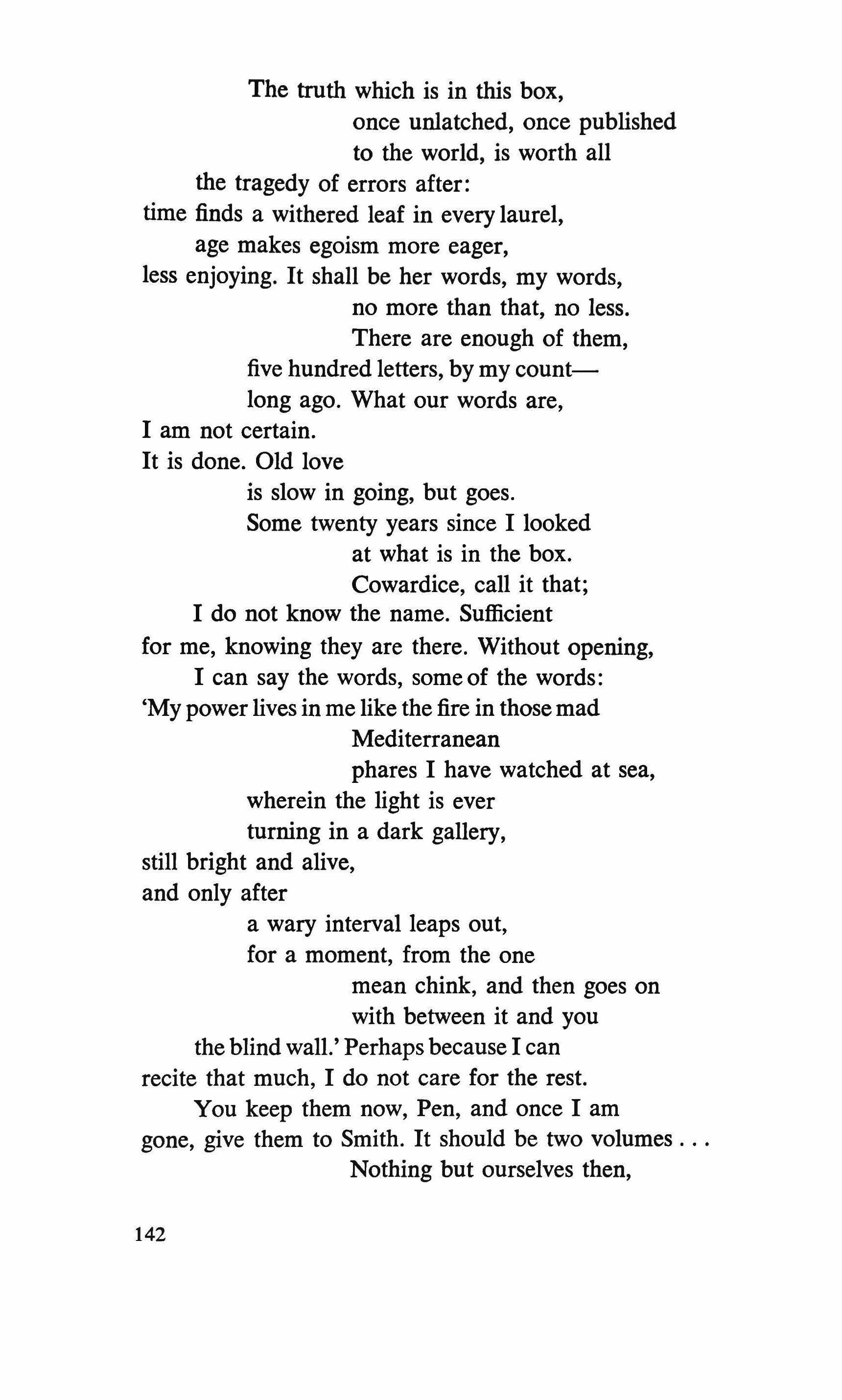
The truth which is in this box, once unlatched, once published to the world, is worth all the tragedy of errors after: time finds a withered leaf in every laurel, age makes egoism more eager, less enjoying. It shall be her words, my words, no more than that, no less. There are enough of them, five hundred letters, by my countlong ago. What our words are, I am not certain. It is done. Old love is slow in going, but goes. Some twenty years since I looked at what is in the box. Cowardice, call it that; I do not know the name. Sufficient for me, knowing they are there. Without opening, I can say the words, some of the words: 'My power lives in me like the fire in those mad Mediterranean phares I have watched at sea, wherein the light is ever turning in a dark gallery, still bright and alive, and only after a wary interval leaps out, for a moment, from the one mean chink, and then goes on with between it and you the blind wall.' Perhaps because I can recite that much, I do not care for the rest. You keep them now, Pen, and once I am gone, give them to Smith. It should be two volumes Nothing but ourselves then,
142
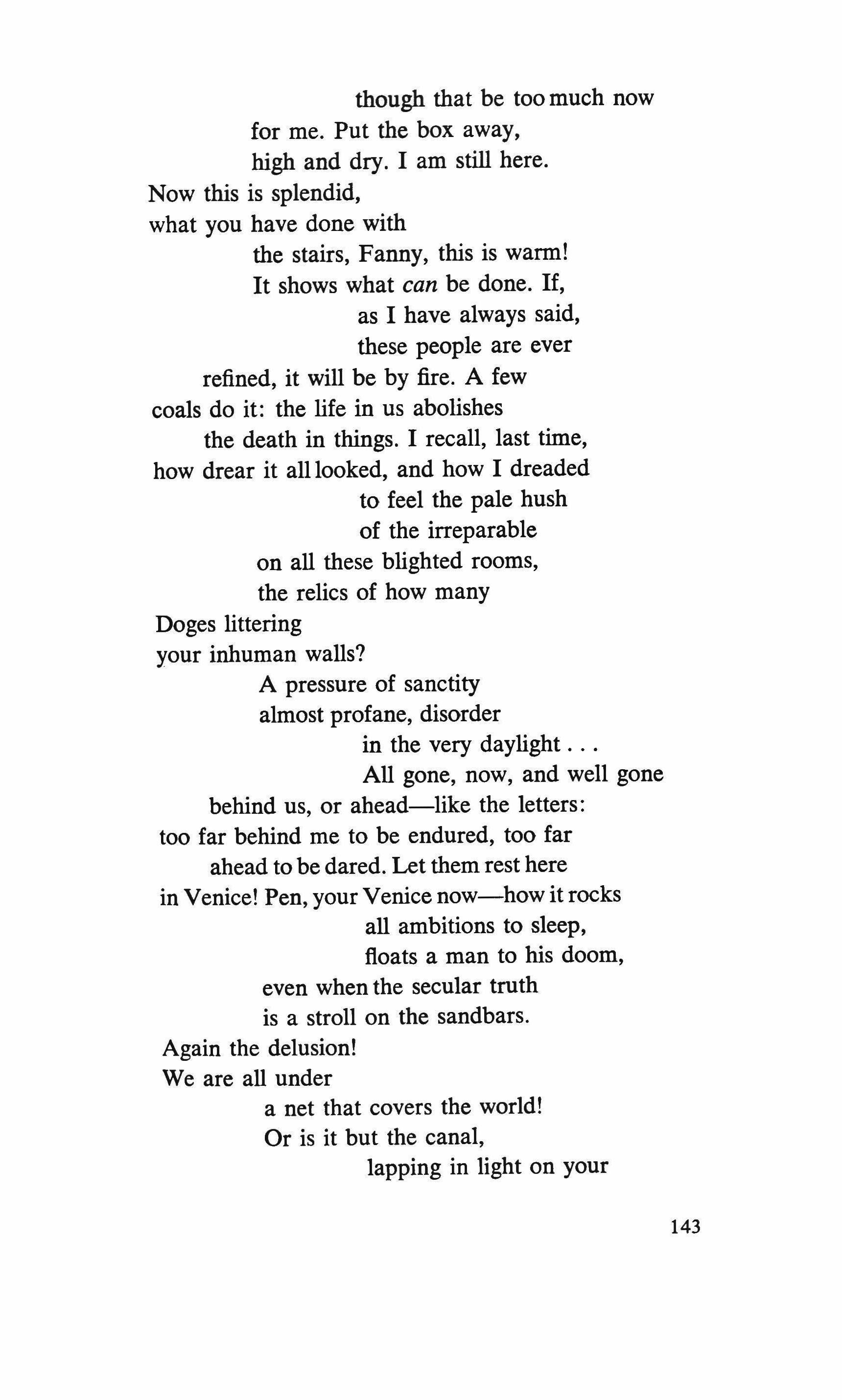
though that be too much now for me. Put the box away, high and dry. I am still here. Now this is splendid, what you have done with the stairs, Fanny, this is warm! It shows what can be done. If, as I have always said, these people are ever refined, it will be by fire. A few coals do it: the life in us abolishes the death in things. I recall, last time, how drear it all looked, and how I dreaded to feel the pale hush of the irreparable on all these blighted rooms, the relics of how many Doges littering your inhuman walls?
A pressure of sanctity almost profane, disorder in the very daylight
All gone, now, and well gone behind us, or ahead-like the letters: too far behind me to be endured, too far ahead to be dared. Let them rest here in Venice! Pen, your Venice now-how it rocks all ambitions to sleep, floats a man to his doom, even when the secular truth is a stroll on the sandbars.
Again the delusion!
We are all under a net that covers the world! Or is it but the canal, lapping in light on your
143
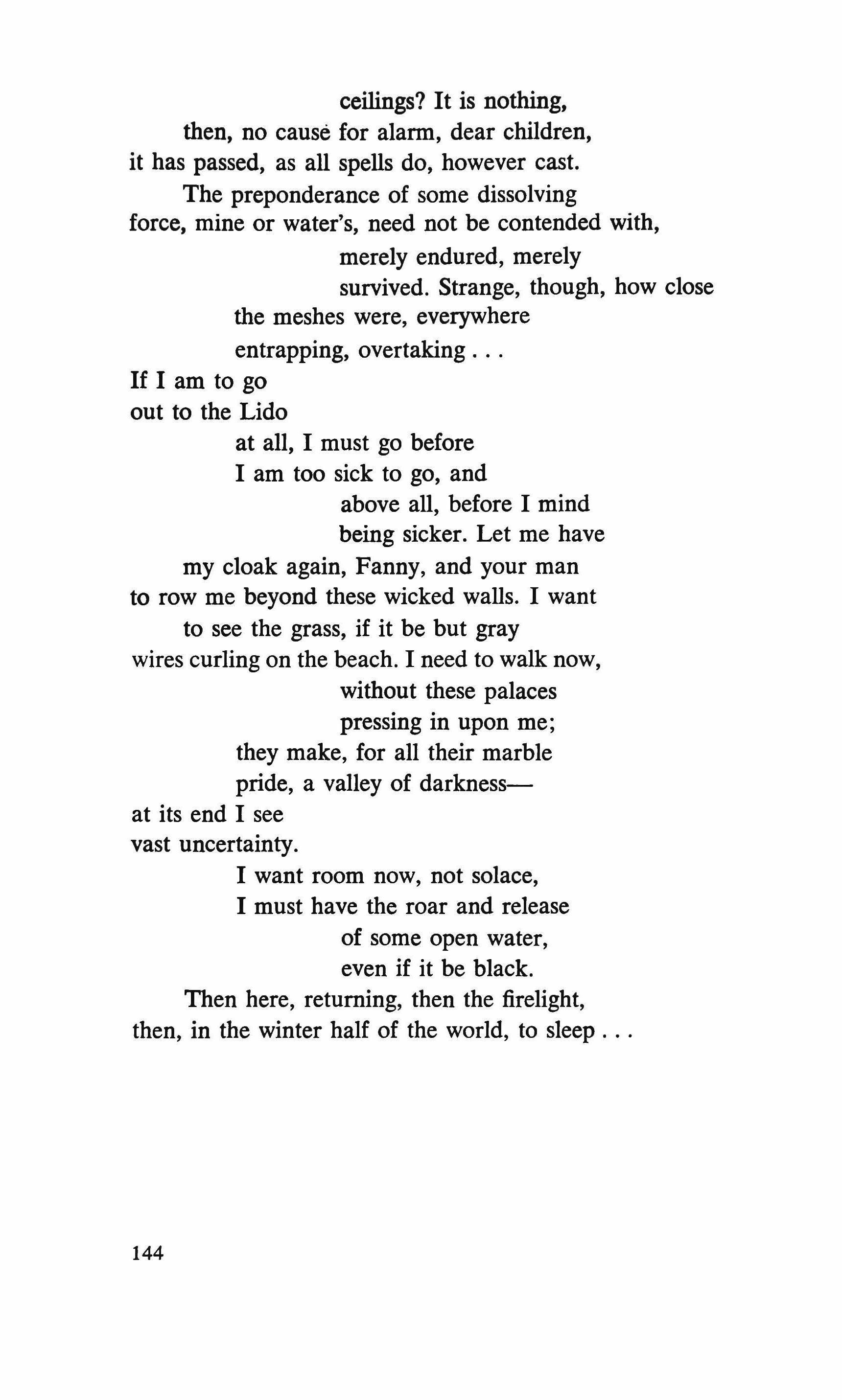
ceilings? It is nothing, then, no cause for alarm, dear children, it has passed, as all spells do, however cast. The preponderance of some dissolving force, mine or water's, need not be contended with, merely endured, merely survived. Strange, though, how close the meshes were, everywhere entrapping, overtaking
If I am to go out to the Lido at all, I must go before I am too sick to go, and above all, before I mind being sicker. Let me have my cloak again, Fanny, and your man to row me beyond these wicked walls. I want to see the grass, if it be but gray wires curling on the beach. I need to walk now, without these palaces pressing in upon me; they make, for all their marble pride, a valley of darknessat its end I see vast uncertainty.
I want room now, not solace, I must have the roar and release of some open water, even if it be black. Then here, returning, then the firelight, then, in the winter half of the world, to sleep
144
Necessary landscapes and luminous deteriorations
TONY TANNER
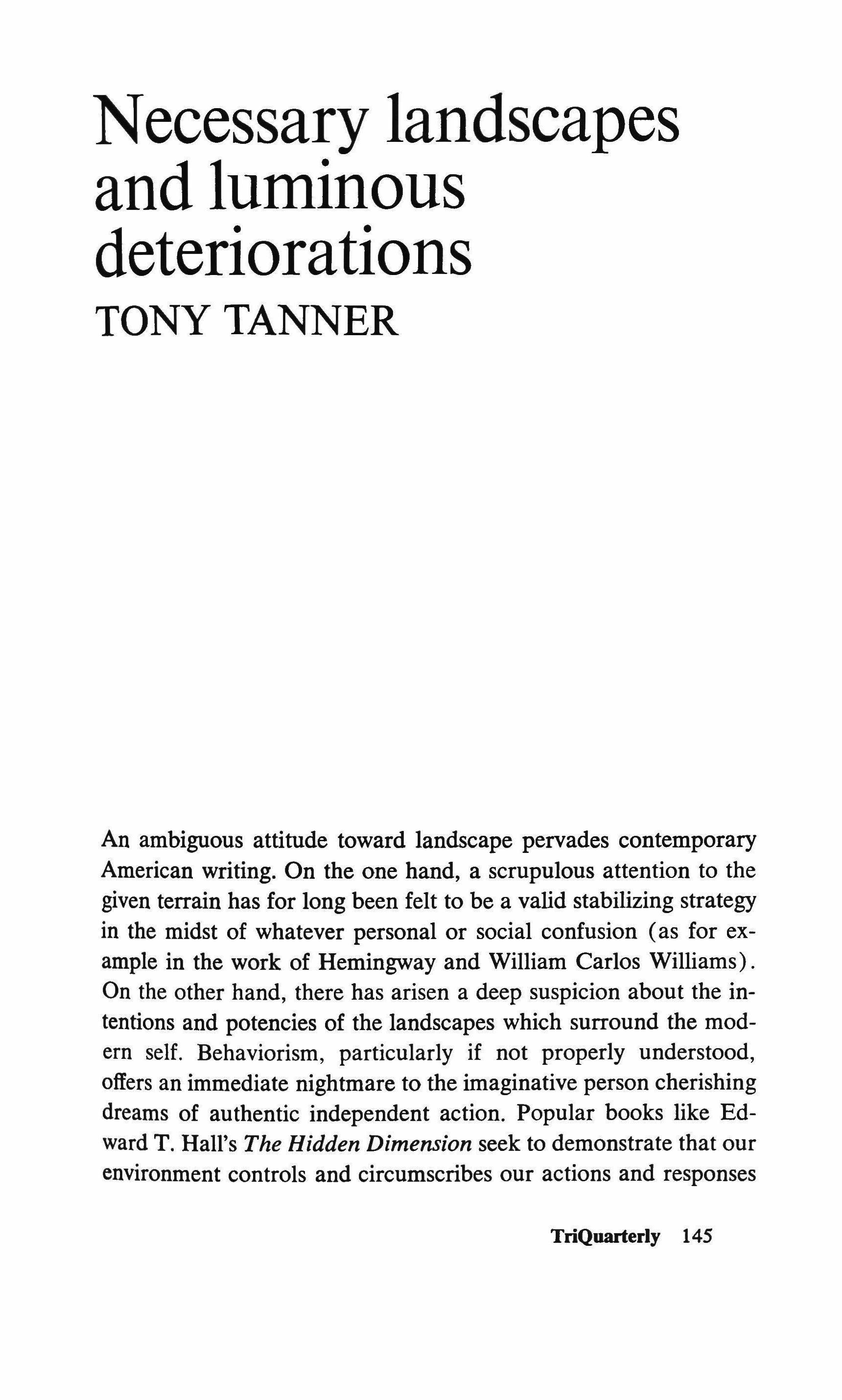
An ambiguous attitude toward landscape pervades contemporary American writing. On the one hand, a scrupulous attention to the given terrain has for long been felt to be a valid stabilizing strategy in the midst of whatever personal or social confusion (as for example in the work of Hemingway and William Carlos Williams).
On the other hand, there has arisen a deep suspicion about the intentions and potencies of the landscapes which surround the modern self. Behaviorism, particularly if not properly understood, offers an immediate nightmare to the imaginative person cherishing dreams of authentic independent action. Popular books like Edward T. Hall's The Hidden Dimension seek to demonstrate that our environment controls and circumscribes our actions and responses
TriQuarterly
145
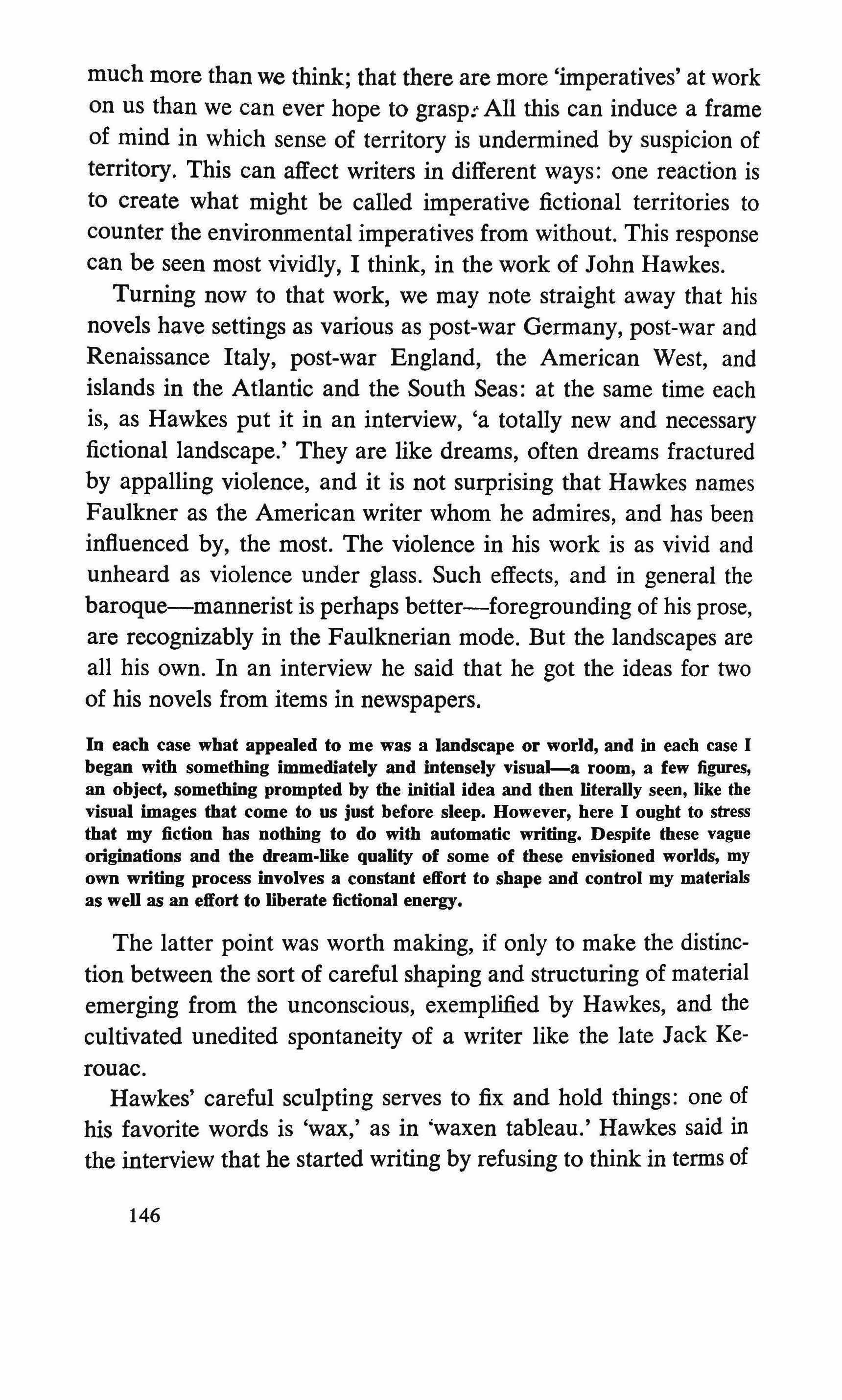
much more than we think; that there are more 'imperatives' at work on us than we can ever hope to grasp: All this can induce a frame of mind in which sense of territory is undermined by suspicion of territory. This can affect writers in different ways: one reaction is to create what might be called imperative fictional territories to counter the environmental imperatives from without. This response can be seen most vividly, I think, in the work of John Hawkes.
Turning now to that work, we may note straight away that his novels have settings as various as post-war Germany, post-war and Renaissance Italy, post-war England, the American West, and islands in the Atlantic and the South Seas: at the same time each is, as Hawkes put it in an interview, 'a totally new and necessary fictional landscape.' They are like dreams, often dreams fractured by appalling violence, and it is not surprising that Hawkes names Faulkner as the American writer whom he admires, and has been influenced by, the most. The violence in his work is as vivid and unheard as violence under glass. Such effects, and in general the baroque-mannerist is perhaps better-foregrounding of his prose, are recognizably in the Faulknerian mode. But the landscapes are all his own. In an interview he said that he got the ideas for two of his novels from items in newspapers.
In each case what appealed to me was a landscape or world, and in each case I began with something immediately and intensely visual-a room, a few figures, an object, something prompted by the initial idea and then literally seen, like the visual images that come to us just before sleep. However, here I ought to stress that my fiction has nothing to do with automatic writing. Despite these vague originations and the dream-like quality of some of these envisioned worlds, my own writing process involves a constant effort to shape and control my materials as well as an effort to liberate fictional energy.
The latter point was worth making, if only to make the distinction between the sort of careful shaping and structuring of material emerging from the unconscious, exemplified by Hawkes, and the cultivated unedited spontaneity of a writer like the late Jack Kerouac.
Hawkes' careful SCUlpting serves to fix and hold things: one of his favorite words is 'wax,' as in 'waxen tableau.' Hawkes said in the interview that he started writing by refusing to think in terms of
146
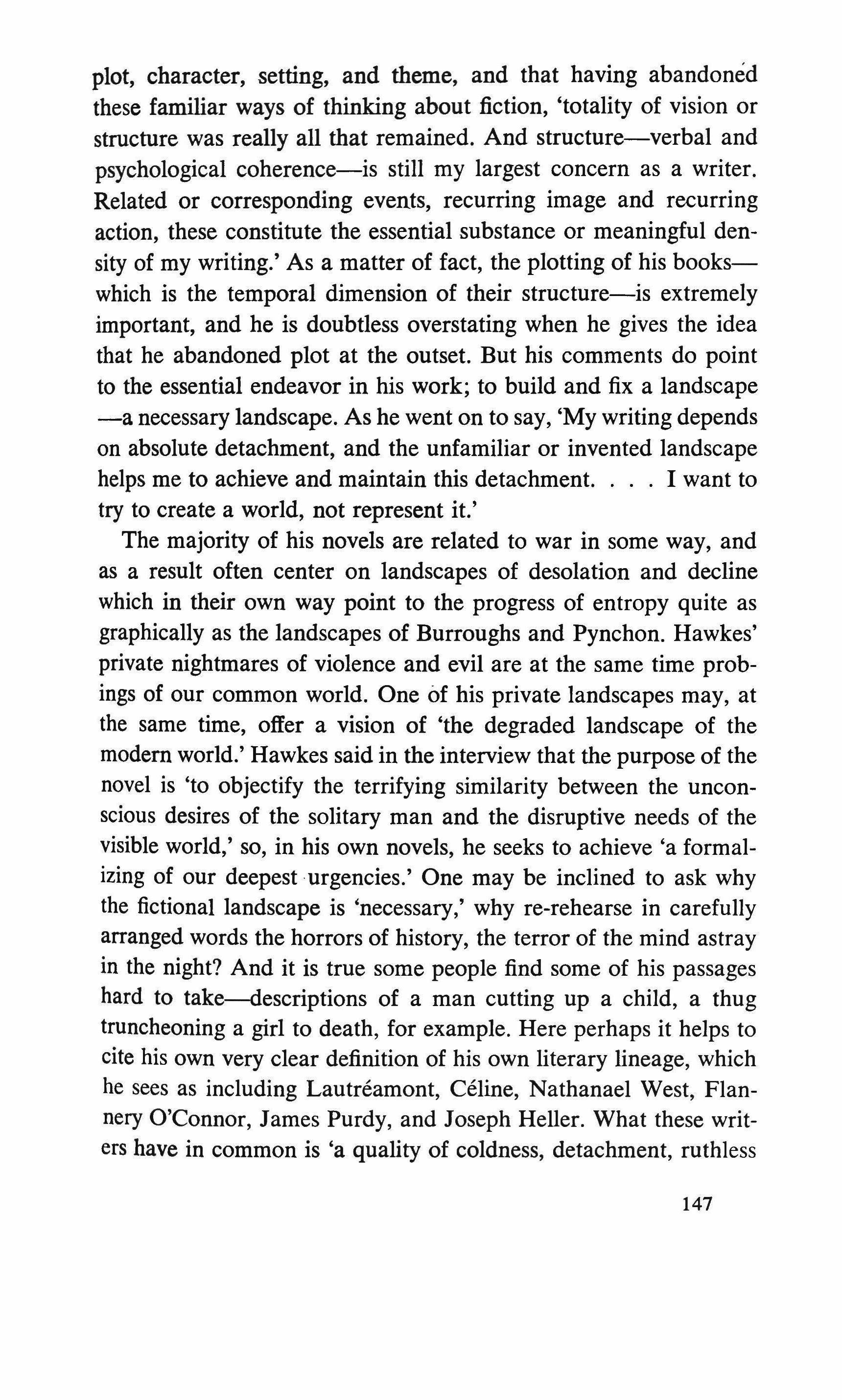
plot, character, setting, and theme, and that having abandoned these familiar ways of thinking about fiction, 'totality of vision or structure was really all that remained. And structure-verbal and psychological coherence-is still my largest concern as a writer. Related or corresponding events, recurring image and recurring action, these constitute the essential substance or meaningful density of my writing.' As a matter of fact, the plotting of his bookswhich is the temporal dimension of their structure-is extremely important, and he is doubtless overstating when he gives the idea that he abandoned plot at the outset. But his comments do point to the essential endeavor in his work; to build and fix a landscape -a necessary landscape. As he went on to say, 'My writing depends on absolute detachment, and the unfamiliar or invented landscape helps me to achieve and maintain this detachment. I want to try to create a world, not represent it.'
The majority of his novels are related to war in some way, and as a result often center on landscapes of desolation and decline which in their own way point to the progress of entropy quite as graphically as the landscapes of Burroughs and Pynchon. Hawkes' private nightmares of violence and evil are at the same time probings of our common world. One of his private landscapes may, at the same time, offer a vision of 'the degraded landscape of the modern world.' Hawkes said in the interview that the purpose of the novel is 'to objectify the terrifying similarity between the unconscious desires of the solitary man and the disruptive needs of the visible world,' so, in his own novels, he seeks to achieve 'a formalizing of our deepest urgencies.' One may be inclined to ask why the fictional landscape is 'necessary,' why re-rehearse in carefully arranged words the horrors of history, the terror of the mind astray in the night? And it is true some people find some of his passages hard to take-descriptions of a man cutting up a child, a thug truncheoning a girl to death, for example. Here perhaps it helps to cite his own very clear definition of his own literary lineage, which he sees as including Lautreamont, Celine, Nathanael West, Flannery O'Connor, James Purdy, and Joseph Heller. What these writers have in common is 'a quality of coldness, detachment, ruthless
147
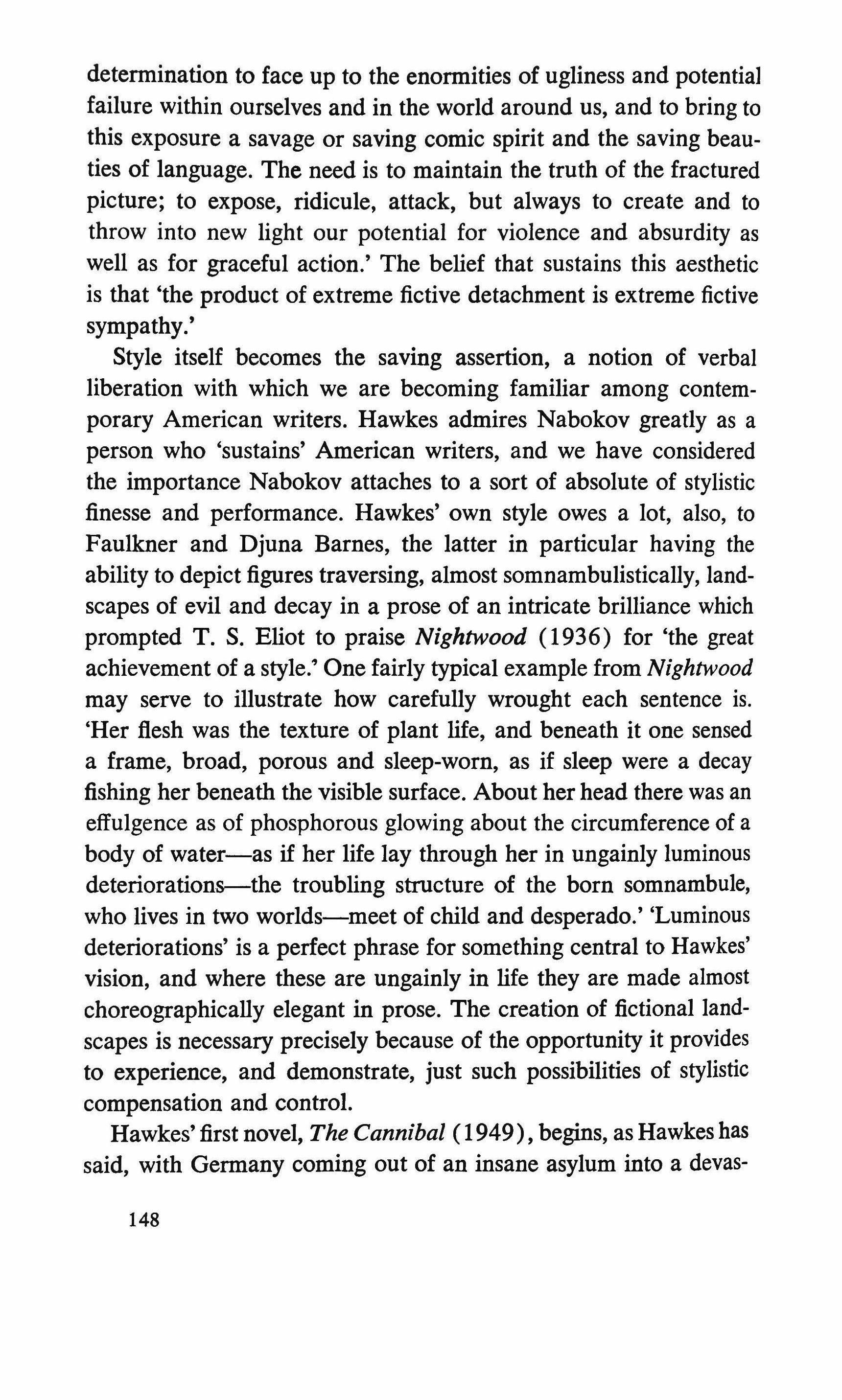
determination to face up to the enormities of ugliness and potentia] failure within ourselves and in the world around us, and to bring to this exposure a savage or saving comic spirit and the saving beauties of language. The need is to maintain the truth of the fractured picture; to expose, ridicule, attack, but always to create and to throw into new light our potential for violence and absurdity as well as for graceful action.' The belief that sustains this aesthetic is that 'the product of extreme fictive detachment is extreme fictive sympathy.'
Style itself becomes the saving assertion, a notion of verbal liberation with which we are becoming familiar among contemporary American writers. Hawkes admires Nabokov greatly as a person who 'sustains' American writers, and we have considered the importance Nabokov attaches to a sort of absolute of stylistic finesse and performance. Hawkes' own style owes a lot, also, to Faulkner and Djuna Barnes, the latter in particular having the ability to depict figures traversing, almost somnambulistically, landscapes of evil and decay in a prose of an intricate brilliance which prompted T. S. Eliot to praise Nightwood (1936) for 'the great achievement of a style.' One fairly typical example from Nightwood may serve to illustrate how carefully wrought each sentence is. 'Her flesh was the texture of plant life, and beneath it one sensed a frame, broad, porous and sleep-worn, as if sleep were a decay fishing her beneath the visible surface. About her head there was an effulgence as of phosphorous glowing about the circumference of a body of water-as if her life lay through her in ungainly luminous deteriorations-the troubling structure of the born somnambule, who lives in two worlds-meet of child and desperado.' 'Luminous deteriorations' is a perfect phrase for something central to Hawkes' vision, and where these are ungainly in life they are made almost choreographically elegant in prose. The creation of fictional landscapes is necessary precisely because of the opportunity it provides to experience, and demonstrate, just such possibilities of stylistic compensation and control.
Hawkes' first novel, The Cannibal (1949), begins, as Hawkes has said, with Germany coming out of an insane asylum into a devas-
148
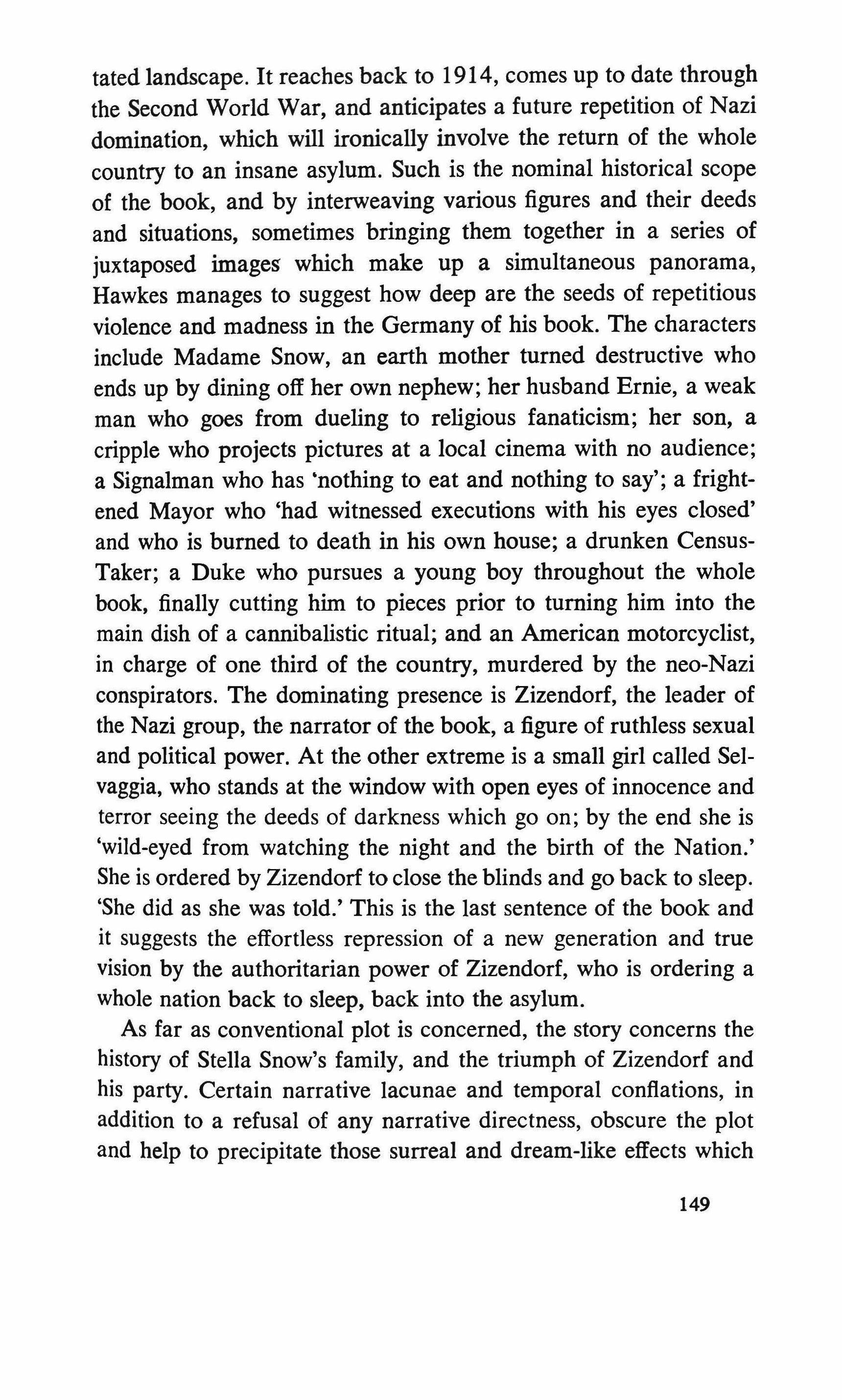
tated landscape. It reaches back to 1914, comes up to date through the Second World War, and anticipates a future repetition of Nazi domination, which will ironically involve the return of the whole country to an insane asylum. Such is the nominal historical scope of the book, and by interweaving various figures and their deeds and situations, sometimes bringing them together in a series of juxtaposed images which make up a simultaneous panorama, Hawkes manages to suggest how deep are the seeds of repetitious violence and madness in the Germany of his book. The characters include Madame Snow, an earth mother turned destructive who ends up by dining off her own nephew; her husband Ernie, a weak man who goes from dueling to religious fanaticism; her son, a cripple who projects pictures at a local cinema with no audience; a Signalman who has 'nothing to eat and nothing to say'; a frightened Mayor who 'had witnessed executions with his eyes closed' and who is burned to death in his own house; a drunken CensusTaker; a Duke who pursues a young boy throughout the whole book, finally cutting him to pieces prior to turning him into the main dish of a cannibalistic ritual; and an American motorcyclist, in charge of one third of the country, murdered by the neo-Nazi conspirators. The dominating presence is Zizendorf, the leader of the Nazi group, the narrator of the book, a figure of ruthless sexual and political power. At the other extreme is a small girl called Selvaggia, who stands at the window with open eyes of innocence and terror seeing the deeds of darkness which go on; by the end she is 'wild-eyed from watching the night and the birth of the Nation.' She is ordered by Zizendorf to close the blinds and go back to sleep. 'She did as she was told.' This is the last sentence of the book and it suggests the effortless repression of a new generation and true vision by the authoritarian power of Zizendorf, who is ordering a whole nation back to sleep, back into the asylum.
As far as conventional plot is concerned, the story concerns the history of Stella Snow's family, and the triumph of Zizendorf and his party. Certain narrative lacunae and temporal conflations, in addition to a refusal of any narrative directness, obscure the plot and help to precipitate those surreal and dream-like effects which
149
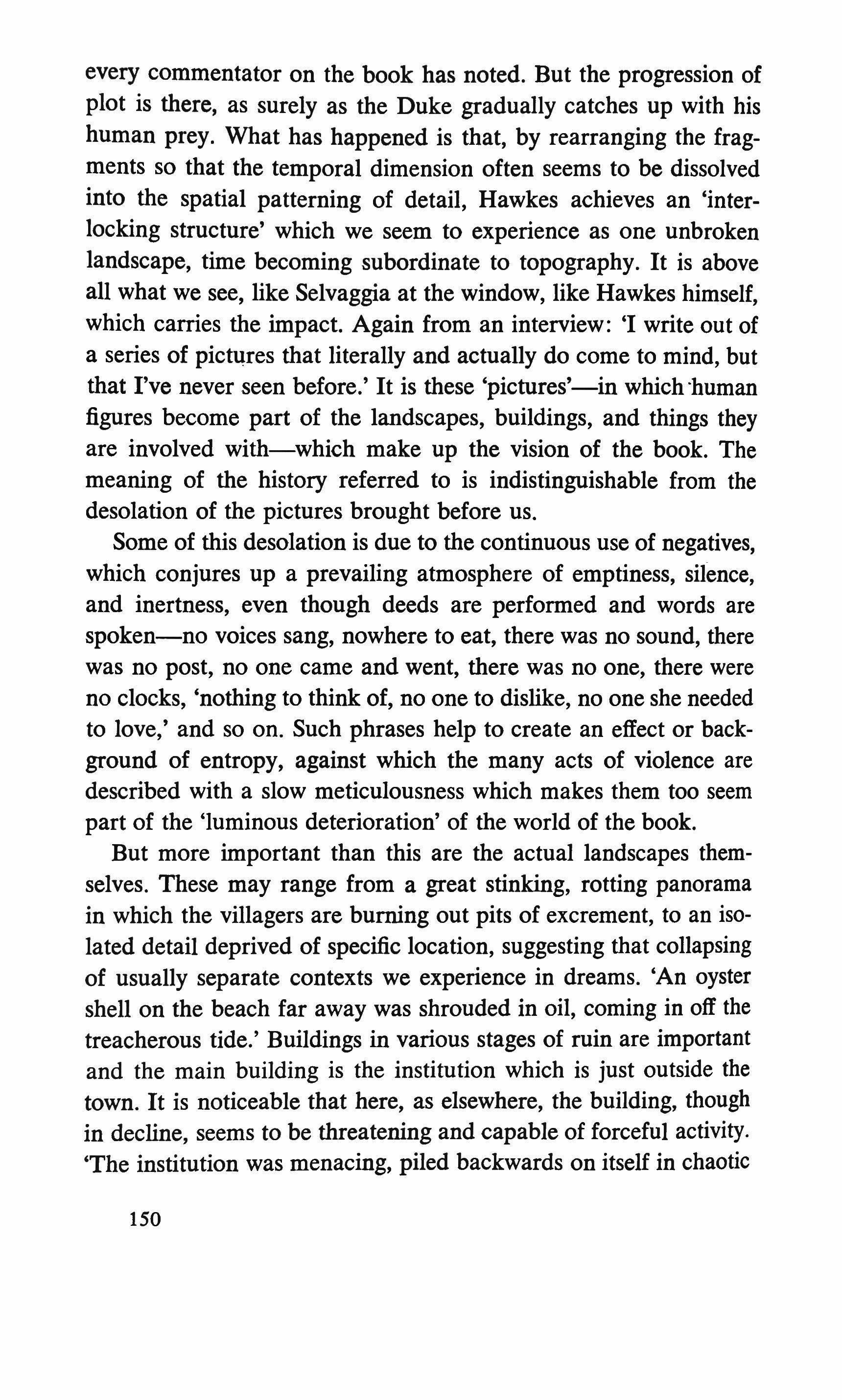
every commentator on the book has noted. But the progression of plot is there, as surely as the Duke gradually catches up with his human prey. What has happened is that, by rearranging the fragments so that the temporal dimension often seems to be dissolved into the spatial patterning of detail, Hawkes achieves an 'interlocking structure' which we seem to experience as one unbroken landscape, time becoming subordinate to topography. It is above all what we see, like Selvaggia at the window, like Hawkes himself, which carries the impact. Again from an interview: 'I write out of a series of pictures that literally and actually do come to mind, but that I've never seen before.' It is these 'pictures'-in which "human figures become part of the landscapes, buildings, and things they are involved with-which make up the vision of the book. The meaning of the history referred to is indistinguishable from the desolation of the pictures brought before us.
Some of this desolation is due to the continuous use of negatives, which conjures up a prevailing atmosphere of emptiness, silence, and inertness, even though deeds are performed and words are spoken-no voices sang, nowhere to eat, there was no sound, there was no post, no one came and went, there was no one, there were no clocks, 'nothing to think of, no one to dislike, no one she needed to love,' and so on. Such phrases help to create an effect or background of entropy, against which the many acts of violence are described with a slow meticulousness which makes them too seem part of the 'luminous deterioration' of the world of the book.
But more important than this are the actual landscapes themselves. These may range from a great stinking, rotting panorama in which the villagers are burning out pits of excrement, to an isolated detail deprived of specific location, suggesting that collapsing of usually separate contexts we experience in dreams. 'An oyster shell on the beach far away was shrouded in oil, coming in off the treacherous tide.' Buildings in various stages of ruin are important and the main building is the institution which is just outside the town. It is noticeable that here, as elsewhere, the building, though in decline, seems to be threatening and capable of forceful activity. 'The institution was menacing, piled backwards on itself in chaotic
150

slumber.' In the description of the University, the same words are used, thus suggesting some identity between the two only apparently different kinds of 'institution.' 'The University was menacing, piled backwards on itself in chaotic slumber It drew the city into its walls with a crushing will. .' Among other things, the book is about all kinds of incarceration. The figures wandering, or pursuing or fleeing, through this land of 'lost architecture,' are really prisoners, not only of this or that building, but of delusion, fear, brutality, their own and other people's obsessions and fantasies, so that there is little difference between inside and outside the institution. It is small wonder that they return to the asylum at the end, as obediently and docilely as a child sent back to sleep, for they are never free and have no understanding of freedom. They are permanent prisoners of the landscape of the book.
When Stella and Ernie are on their honeymoon up in the Alps, it is referred to as the upper world, while a friend who comes and tells them about the war is said to come from the lower world. We are then told that Ernie prays 'knowing nothing of the encircling world.' These varying phrases in close proximity suggest the greater power of the lower and the encircling worlds, for the upper world is the illusory refuge of religious fanaticism experienced as transcendence. In fact its purity is a deathly purity of ice, and it is there that Ernest succumbs to the sickness that takes him back down into the horrendous war scenes of the lower world, and to death. The encircling world may be made up of all those things which the environment presses forward: 'She walked amid heaps of soiled nightdresses, rows of enameled pots for the old man, the stale smell of bones and flies.' Thus Stella walks among the oppressive litter of her heritage, in the house where her father has died. Or the encircling world may be like the labyrinthine obstacles of the decaying theater which hinder the boy and enable the Duke to catch him. The ruined theater is in addition an apt place for the Duke to secure the human material to implement his vile fantasy, and having seen the conclusion of the chase the crippled projectionist returns to bed in a state of perverse sexual excitement. The total silence of the boy victim throughout suggests not only a child's
151

helplessness when engorged by an adult's obsession, but also the more general human subservience to the tightening grip of 'the encircling world.'
Hawkes' is indeed a death-haunted vision, with drowned corpses resurfacing, and ghosts regathering at the place of their demise like a thickening of fog, while the living commit their slow dismemberments, of chicken or child, or submit quietly to a horror which is everywhere. At the same time we should recall what Hawkes affirmed about the 'saving beauties of language,' the detachment with which it defines the landscape which defiles and imprisons everything except the words of the book. By making the neo-Nazi leader, Zizendorf, a first-person narrator, Hawkes has included what is effectively a black parody of himself as writer. Such is the state of the Germany of the book that language itself is in near total decline, while literature is impossible-a fact registered by the devastated newspaper office where Zizendorf sits. The American motorcyclist, who travels 'along hypothetical lines of communication with his sack filled with unintelligible military scrawls' and whose 'only communication was silence' to the Germans, is another example of the general dissolution of the customary means of communication and the loss of information. By the end Zizendorf is spreading what he thinks of as a new order, and to do this he has to create a new voice with print. 'I, the Leader, the compositor, put the characters, the words of the new voice, into the stick. I wrote my message as I went, putting the letters into place with tweezers, preparing my first message, creating on a stick the new word.' This new word is of course sheer propaganda and rhetoric, but Hawkes knows that it reflects on the ambiguities of his own position. For he too is imposing fictions on us, constructing his 'message' with a care for which the planning leader's delicate arrangement of his words with tweezers is a fair metaphor. Hawkes' purpose is of course different-he is trying to arrest horrors in print, while Zizendorf is trying to impose and increase them through print; but they are both experts with the dark yet entrancing word.
The way Hawkes places his words produces the effect of stillness.
152
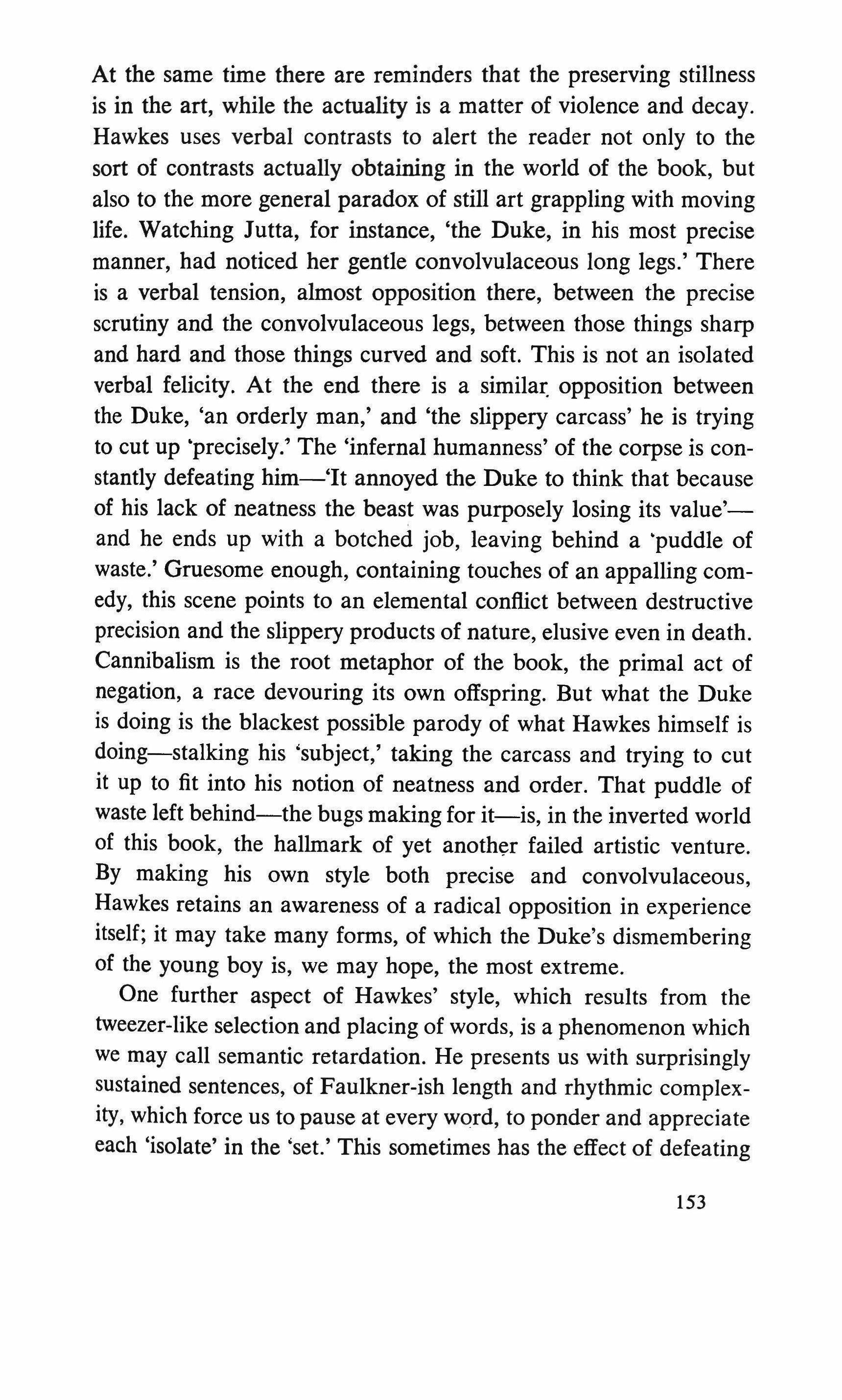
At the same time there are reminders that the preserving stillness is in the art, while the actuality is a matter of violence and decay. Hawkes uses verbal contrasts to alert the reader not only to the sort of contrasts actually obtaining in the world of the book, but also to the more general paradox of still art grappling with moving life. Watching Jutta, for instance, 'the Duke, in his most precise manner, had noticed her gentle convolvulaceous long legs.' There is a verbal tension, almost opposition there, between the precise scrutiny and the convolvulaceous legs, between those things sharp and hard and those things curved and soft. This is not an isolated verbal felicity. At the end there is a similar: opposition between the Duke, 'an orderly man,' and 'the slippery carcass' he is trying to cut up 'precisely.' The 'infernal humanness' of the corpse is constantly defeating him-'It annoyed the Duke to think that because of his lack of neatness the beast was purposely losing its value'and he ends up with a botched job, leaving behind a 'puddle of waste.' Gruesome enough, containing touches of an appalling comedy, this scene points to an elemental conflict between destructive precision and the slippery products of nature, elusive even in death. Cannibalism is the root metaphor of the book, the primal act of negation, a race devouring its own offspring. But what the Duke is doing is the blackest possible parody of what Hawkes himself is doing-stalking his 'subject,' taking the carcass and trying to cut it up to fit into his notion of neatness and order. That puddle of waste left behind-the bugs making for it-is, in the inverted world of this book, the hallmark of yet another failed artistic venture. By making his own style both precise and convolvulaceous, Hawkes retains an awareness of a radical opposition in experience itself; it may take many forms, of which the Duke's dismembering of the young boy is, we may hope, the most extreme. One further aspect of Hawkes' style, which results from the tweezer-like selection and placing of words, is a phenomenon which we may call semantic retardation. He presents us with surprisingly sustained sentences, of Faulkner-ish length and rhythmic complexity, which force us to pause at every word, to ponder and appreciate each 'isolate' in the 'set.' This sometimes has the effect of defeating
153

the usual semantic impact of a sentence: we do not register a unit of sense and information but find ourselves taking the slow impress of vivid fragments, unanticipated phrases, unusual configurations. It is in such ways that Hawkes maintains 'the truth of the fractured picture' and causes the whole book to hang in our minds like a pervading atmosphere, an unforgettable hallucination. The result is, undoubtedly, the 'advent of a certain reality,' if not exactly a historical reality, then unchallengeably a verbal reality of great power.
In The Beetle Leg (1951) Hawkes created a world of the American West in a series of ten highly visualized episodes concerning people who in one way or another are connected with the family of the man buried alive in the great dam which was erected some ten years before the novel opens. The relations between these people and the differing times of the chapters are not always clear, and the plot occasionally vanishes into the sand of the great silent desert which is the background of the novel. Since motives and intentions are not rendered, for Hawkes does not treat the psychological inwardness of his characters as something separable from the land they adhere to, the result once again is of not fullyexplained movements in a landscape which seems to dominate all those who act, or remain inactive, in it. The pathetic little human communities, clustered around the dam and the growing turbine tower, making almost invisible spots on the vast desert, seem oddly insubstantial and ephemeral-a mirage which will fade in a desolate land which will last.
Many of the figures like to gather in the jail, comparable to the institution in The Cannibal. The opposition between man-made structures and the level, leveling desert is kept to the fore throughout. On the one hand there is constant reference to all things connected with building, erecting, and mending, indeed all things necessary to surviving, in a frontier situation-tools, iron, drills, spikes, nails, buckets, ploughs, lattices, cooking utensils, wheels, knives, and equipment in general. Men shape the wood, apply the iron, shovel away the land, build the dam, erect the towers. However, against all this human endeavor and building, the land
154
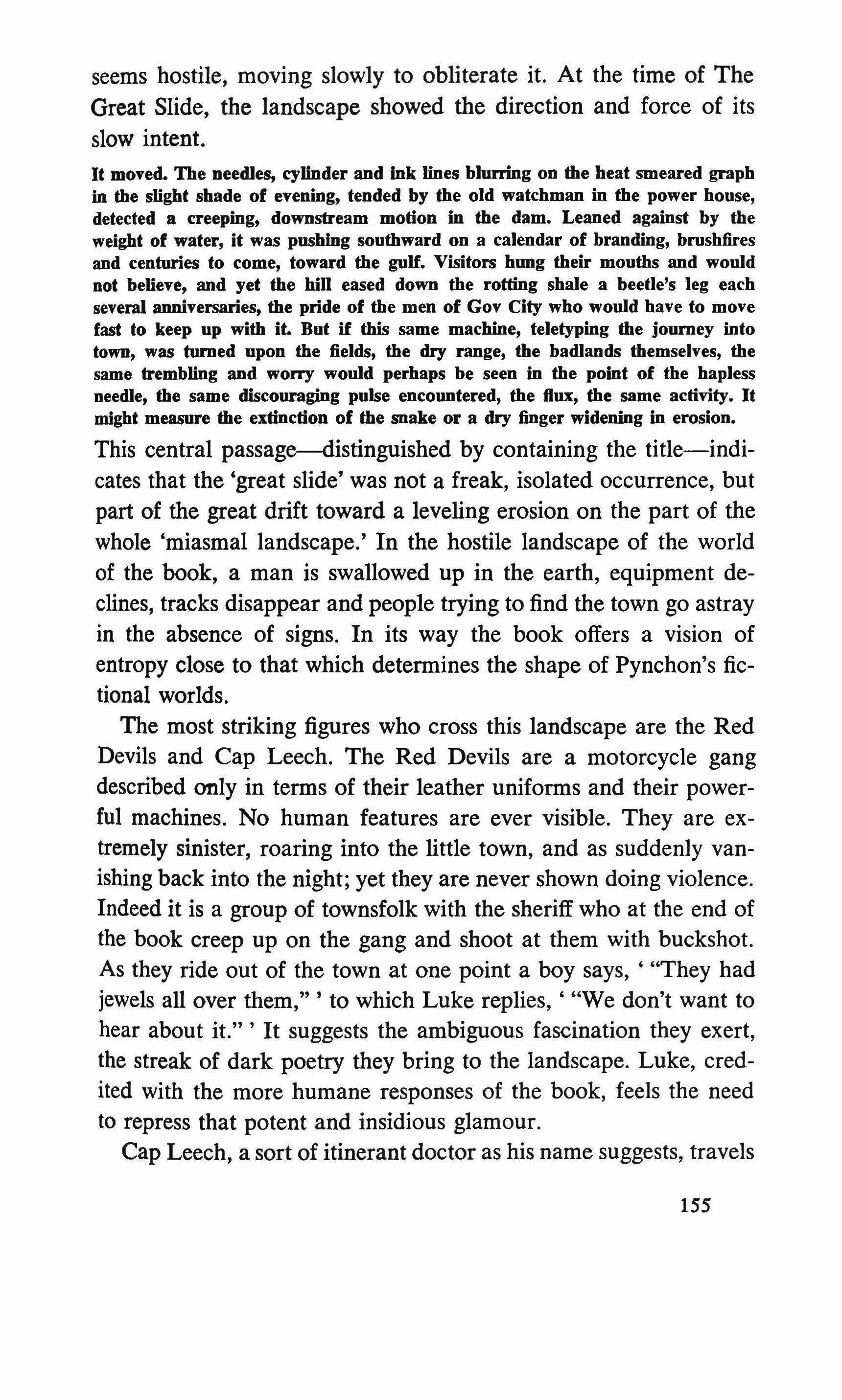
seems hostile, moving slowly to obliterate it. At the time of The Great Slide, the landscape showed the direction and force of its slow intent.
It moved. The needles, cylinder and ink lines blurring on the heat smeared graph in the slight shade of evening, tended by the old watchman in the power house, detected a creeping, downstream motion in the dam. Leaned against by the weight of water, it was pushing southward on a calendar of branding, brushfires and centuries to come, toward the guU. Visitors hung their mouths and would not believe, and yet the hill eased down the rotting shale a beetle's leg each several anniversaries, the pride of the men of Gov City who would have to move fast to keep up with it. But if this same machine, teletyping the journey into town, was turned upon the fields, the dry range, the badlands themselves, the same trembling and worry would perhaps be seen in the point of the hapless needle, the same discouraging pulse encountered, the Bux, the same activity. It might measure the extinction of the snake or a dry finger widening in erosion. This central passage-distinguished by containing the title-indicates that the 'great slide' was not a freak, isolated occurrence, but part of the great drift toward a leveling erosion on the part of the whole 'miasmal landscape.' In the hostile landscape of the world of the book, a man is swallowed up in the earth, equipment declines, tracks disappear and people trying to find the town go astray in the absence of signs. In its way the book offers a vision of entropy close to that which determines the shape of Pynchon's fictional worlds.
The most striking figures who cross this landscape are the Red Devils and Cap Leech. The Red Devils are a motorcycle gang described only in terms of their leather uniforms and their powerful machines. No human features are ever visible. They are extremely sinister, roaring into the little town, and as suddenly vanishing back into the night; yet they are never shown doing violence. Indeed it is a group of townsfolk with the sheriff who at the end of the book creep up on the gang and shoot at them with buckshot. As they ride out of the town at one point a boy says, "They had jewels all over them," to which Luke replies, "We don't want to hear about it." It suggests the ambiguous fascination they exert, the streak of dark poetry they bring to the landscape. Luke, credited with the more humane responses of the book, feels the need to repress that potent and insidious glamour.
Cap Leech, a sort of itinerant doctor as his name suggests, travels
155
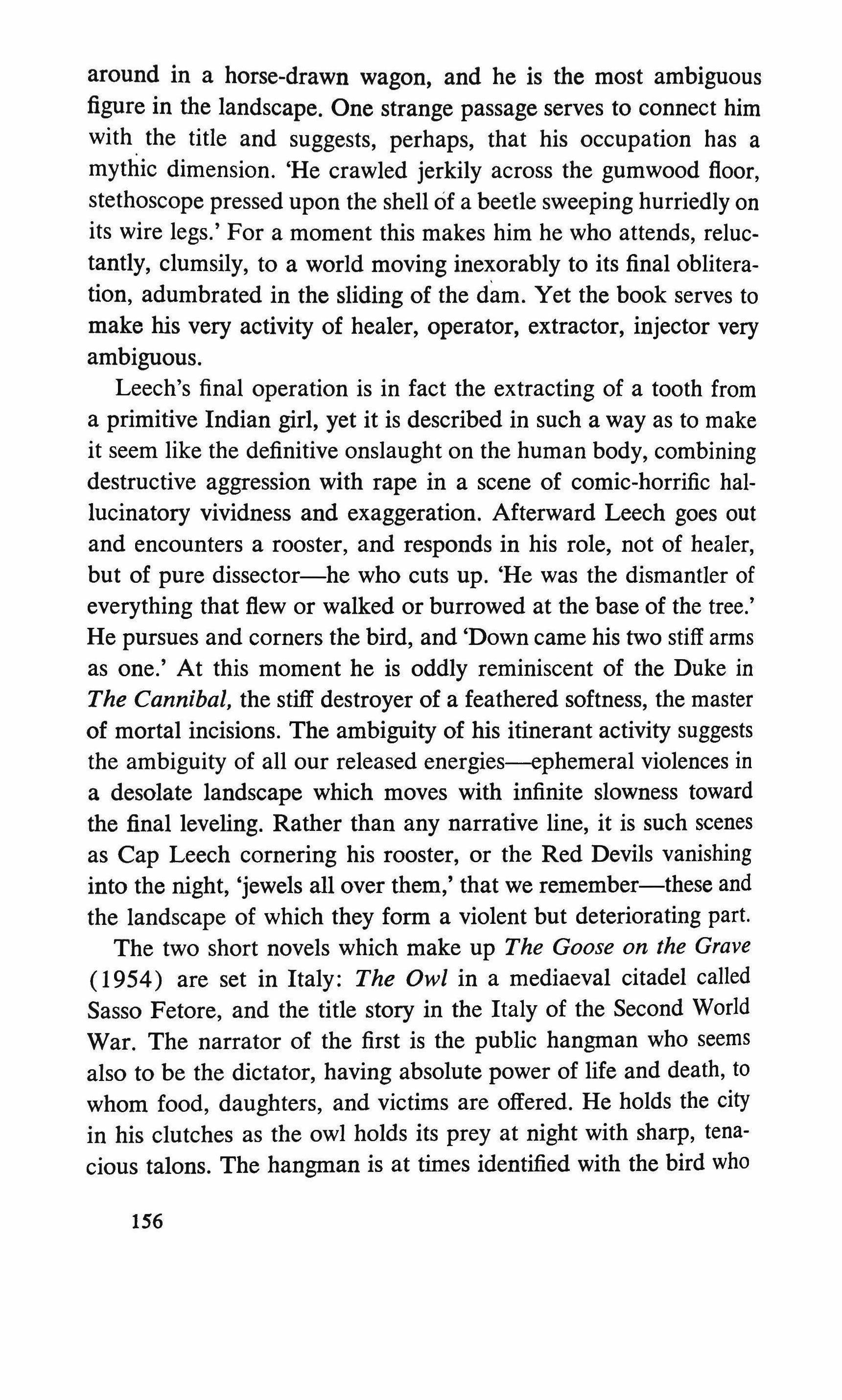
around in a horse-drawn wagon, and he is the most ambiguous figure in the landscape. One strange passage serves to connect him with. the title and suggests, perhaps, that his occupation has a mythic dimension. 'He crawled jerkily across the gumwood floor, stethoscope pressed upon the shell of a beetle sweeping hurriedly on its wire legs.' For a moment this makes him he who attends, reluctantly, clumsily, to a world moving inexorably to its final obliteration, adumbrated in the sliding of the dam. Yet the book serves to make his very activity of healer, operator, extractor, injector very ambiguous.
Leech's final operation is in fact the extracting of a tooth from a primitive Indian girl, yet it is described in such a way as to make it seem like the definitive onslaught on the human body, combining destructive aggression with rape in a scene of comic-horrific hallucinatory vividness and exaggeration. Afterward Leech goes out and encounters a rooster, and responds in his role, not of healer, but of pure dissector-he who cuts up. 'He was the dismantler of everything that flew or walked or burrowed at the base of the tree.' He pursues and corners the bird, and 'Down came his two stiff arms as one.' At this moment he is oddly reminiscent of the Duke in The Cannibal, the stiff destroyer of a feathered softness, the master of mortal incisions. The ambiguity of his itinerant activity suggests the ambiguity of all our released energies--ephemeral violences in a desolate landscape which moves with infinite slowness toward the final leveling. Rather than any narrative line, it is such scenes as Cap Leech cornering his rooster, or the Red Devils vanishing into the night, 'jewels allover them,' that we remember-these and the landscape of which they form a violent but deteriorating part.
The two short novels which make up The Goose on the Grave (1954) are set in Italy: The Owl in a mediaeval citadel called Sasso Fetore, and the title story in the Italy of the Second World War. The narrator of the first is the public hangman who seems also to be the dictator, having absolute power of life and death, to whom food, daughters, and victims are offered. He holds the city in his clutches as the owl holds its prey at night with sharp, tenacious talons. The hangman is at times identified with the bird who
156

is his emblem-II Gufo, The second story concerns the wanderings of a young Italian orphan, Adeppi, who gets involved with various adults, a soldier, an ageing homosexual, a fanatical priest, and in general a whole landscape of corruption, brutality, degradation and death. There are certain tenuous links between the two, topographical echoes of harsh life in rocky landscapes, and a pervasive feeling of brutal impositions and horribly perverted rituals and deeds in which the principles of life and death have become grotesquely confused. The title occurs in the second story, yet in the first story a troop of geese that parade all over the landscape are one night found slaughtered; and the owl who dominates Sasso Fetore still flies about in the night which has settled on 20th century Italy at war. Adapting his rhetoric to the different occasions, Hawkes offers us a mediaeval and a modern landscape which add up, not to a historical continuity, but to two sides of a single dream centering on human violence in a hostile terrain-sudden deaths in still squares. In the first story, the strange prerogatives of the white geese who are allowed to march in their own patterns across the territory belonging to the black owl do suggest the resistance of art to the 'rigid existence' of a society brutally adjusted to the symmetry of the gallows. In the second story Adeppi at one point serenades the wife of the blind man, standing on earth which smells of 'shallow graves.' When he starts, the whole family gathers to mock him. He runs away. 'Adeppi left the mandolin floating on a shallow pond, and when the sun touched the upended neck, the sight of it startled the waking ganders.' Bearing in mind that Hawkes prefaced his book with a quotation from Ezra Pound ('One must have resonance, resonance and sonority like a goose') this contiguity does reinforce the suggestion that the geese are somehow exemplars of all human instinct to make some sort of music even while standing on the earth which will very surely become our grave. t And
t In an essay written in 1962 on the possibilities open to modern experimental fiction, Hawkes quoted from Rex Warner's The Wild Goose Chase and applied the metaphor when he identified himself as speaking for 'those still seeking the high mysterious flights of the Wild Goose, or concerned with that place into which the creative arts have fled' (from The Massachusetts Review, reprinted in The American Novel Since World War II, edited by Marcus Klein: Fawcett Publications, 1969).
157

Hawkes' art strives to present us both with the music and the mortality-the goose on the grave.
It is noticeable that in his later work Hawkes has moved away from 'pure vision,' in which narrative tended to be dissolved in setting, toward novels which appear to have a more conventional narrative line. He himself has recognized this and sees one reason for the shift coming from 'an increasing need to parody the conventional novel.' The result is another example of that sort of ambiguous parody so common in American fiction today, in which a pattern is undermined or ridiculed, yet at the same time some sort of imaginative statement is made. On such occasions the writer both mocks his form and uses it. Hawkes' next novel, The Lime Twig (1961), includes an intention 'to parody the soporific plot of the thriller.' In the same interview, Hawkes goes on to describe his growing sense of 'the possibilities for disrupting conventional forms of fiction.' Forms of fiction may be said to reflect forms of feeling, the ways in which sympathies and responses are shaped and distributed, and Hawkes' desire to disrupt the more conventional novel forms is a consequence of his belief that the function of a true experimental writer is 'to test in the sharpest way possible the range of our human sympathies and constantly to destroy mere surface morality.'
The surface story in The Lime Twig involves a gambling syndicate's plot to run a great racehorse, disguised as an outsider, in a big race, for obvious financial reasons. A young innocent couple get involved and come, variously, to nasty ends. There are killings and beatings, thugs and prostitutes and policemen, a 'thrilling' climax on the day of the race and so on-all the paraphernalia of the genre. Given that this parodies the usual thriller (the innocent are mutilated; the thugs remain uncaught, etc.-the usual expectations and satisfactions of the genre are denied), we may ask what is the latent, and more serious, subject of the book? Once again we find ourselves concentrating on landscapes of ruin and desolation -London after the war, with all the squalor and misery and crumbling degradation which linger on in wastelands brought about by war. But the book is not simply another occasion for presenting
158

landscapes necessary for the projection of the dreams emanating from the unconscious; there is a more searching subject than that. The book is not only dream-like, as all its critics have noted; it is about dreaming. It is also about that very American subject, the death of innocence in a world of nightmare evil. But pure innocence succumbing to the machinations of pure evil is pure melodrama, as we all know. The distinction of Hawkes' book is to suggest that the evil is in part summoned up by the dreams of innocence, that it is permitted so many triumphs because there is so much in the unconscious (even of 'innocence') that is on its side. The horses that are really racing in this novel are the horses of unconscious desire.
Michael Banks, living in the cramped suburban dwelling described in the opening section, dreams of a horse: 'knowing that his own worst dream, and best, was of a horse which was itself the flesh of all violent dreams; knowing this dream, that the horse was in their sitting room knowing the horse on sight and listening while it raises one shadowed hoof on the end of a silver thread of foreleg and drives down the hoof to splinter in a single crash one plank of that empty Dreary Station floor.' The dream comes true when Michael helps Hencher and the gang to haul the disguised racehorse, Rock Castle, up from a boat onto the quayside. The horse itself is in the 'posture of rigorous sleep' as if made of marble. Lifted up by the crane 'it became the moonlit spectacle of some giant weather vane.' Then very slowly it raises one 'destructive hoof and now that the gesture has moved out of dream and into reality, it strikes terror into Michael. It is the rise and fall of those destructive hooves which, again in dream-like abstractedness, reduces Hencher to a pulp; and it is under them that Michael will finally cast himself in an equivocal gesture of victory and release. When Michael is waiting in the cargo shed for the horse to be hauled up, he feels the holes in the floorboards, and looks down at all the scum and greasy water underneath-'filth for a man to fall into.' Just so, he had dreamed of a horse powerful enough to smash the floor of his miserable home. But while dreams seem to aspire to high things-the horse in the air is like a weather vane-when
159

they are actualized they involve a fall into filth. Waiting for the horse to arrive, Michael feels he is in 'a time slipped off its cycle.' He has indeed moved into the time scheme of his dreams, and the novel is brilliantly 'architectured' to reveal his ambiguous progress. As the conventional narrative moves nearer the denouement at the race, Michael moves deeper into the world of his dreams, culminating in a night of unlimited sex, laid on by the gang for their own purposes but also representing the realization of all Michael's libidinous fantasies. Meanwhile Margaret is moving toward her death by beating-not unrelated, in its turn, to the masochistic fantasies she has; it is a basic condition of this dream world that it separates people, and Michael having caught one glimpse of Margaret over the heads of an impenetrable crowd, loses her forever. The theme of dreaming is prepared for in what seems like the meticulous and cold realism of the opening section, a monologue by Hencher all about the conditions in the rooms in lodging houses he has experienced and observed. He describes his years 'circling' around the aptly named Dreary Station, looking for a room, with all the attendant hungers and needs such roaming can develop. He often looks up at 'gilded cherubim big as horses that fly off the top of the Dreary Station itself.' From the start the cherubim are linked to the horse and offered as a suggestive reminder of those gilded dreams which rise above the suburban desolation and the tiny rooms.
But this is wartime that Hencher is recalling, and there are other things in the air; fires (one of which kills his mother) lighting up the night, and penetrating the dreams of all those living through them. And on one occasion, Hencher watches a lifeless airplane float quietly down to settle in the snow; then he climbs into the control cabin and, sitting next to the dead pilot, he acts out a private fantasy. What one retains from these linked references is a sense of dream flourishing privately in a landscape given over to death and destruction; and inevitably the dreams are influenced by their setting. 'I had my dreams,' says Hencher, and so too had Michael and Margaret Banks, the couple whom he tries to help because they took him in and gave him a room. Hencher says, 'The
160

cherubim are still my monument,' and he is the one who tries to bring 'the vague restless dreams' behind the Banks' faces into reality. Living in actual squalor they all look up at the cherubim to dream, and see night fires which scorch their memories and falling planes which crash in their minds. Inevitably the consummation of their dreams will involve violence, perhaps death. What else should the children of war dream about? Little Monica dreams her dolls are on fire.
The cherubim occupy an elevated position-the imagination tends to dream upward. But Michael's progress tends to be downward, to low and sometimes actually subterranean places: an underground lavatory where he is given orders.by three men holding bombs; some Dantesque steam baths which make a fair inferno, and where Michael watches a bloody murder. From the beginning of the enterprise Michael is constantly entering atmospheres of fog, shadow, mist, steam-suitable atmospheric media for the appearance of the strange metamorphosing figures of his dreams. At the party where his sexual fantasies are unbelievably catered to, the smoke is finally 'opaque as ice.' But at the end of the night he hears a shot and goes out to see that a child has been killed. He recognizes her, ambiguously, as a girl who 'had always been coming over a bridge for him' and we cannot know just what that figure of innocence might have meant. But now 'the mists were drifting off' and the murdered child is lying there, and it is suddenly clear what has really been happening in this night given over to the realization of dreams.
The fact that Michael is moving, to some extent, through the fog of his own dreams, leads us to see Larry and his gang in a rather different light, though the deeds of violence they do are cruel and evil enough. At the same time we may consider the role of the policemen in the book, who are curiously inept and impotent to say the least. Michael Banks overhears a part of one of Larry's conversations in which he is saying, "And I told the Inspector he was making a horrible botch of it. I said it would never do. Who's pulling the strings I told him and he got huffy, huffy, mind you You'd best not interfere, I said. There's power in this world you
161

never dreamed of, I told him." It suggests a world not run by policemen but by gangsters, and if one reads this as indicating the relative impotence of bungling rationality in competition with the sleek ruthlessness of libidinal energies, one is registering a part of the portent of the book. For Larry is the dark angel of our darkest dreams-the ones we don't admit as ours. He arranges the excesses of sex and violence which men's, and women's, minds secretly crave. He would be powerless without those dark dreams, to the hidden impulses of which he acts as Satanic servitor. When Michael watches Cowles murdered in the Steam Baths, he sees Larry just standing there 'as if he had nothing better to do than direct this stalking through a hundred and ten degrees and great dunes of steam.' The insight is precise. Larry directs all the stalking in the steam which makes up the world of the book. When he strips at the end of the all-night party, in the room where there are appropriate black-and-white paintings of horses on the walls, he stands out like a dark god, with that same 'brutal calm' that Euripides gave to his ruthless Dionysus in The Bacchae. He reigns supreme over the dark kingdom of our dreams, from which in turn he derives his power. The question arises, can man take issue with the potency of his own worst dreams? This is the point of the 'climax' of the book when Michael decides to spoil the gang's plan and runs onto the race course to throw himself in front of Rock Castle, thus preventing that horse from winning the race. It is an equivocal act because in one sense it is the final self-destructive abandoning of himself to the horse of his darkest dream; at the same time it is his victorious bid to break the dream, which at the same time renders Larry and his gang completely powerless and ruins all their plans. The actual race is called The Golden Bowl, and Hawkes stated in an interview he took the title from Henry James and meant to imply that Michael Banks manages to break the golden bowl of earthly pleasures. This obviously represents some kind of victory, and Hawkes went on to admit that the ending of the novel is conceivably redemptive. In addition Michael sees 'a dove bursting with air on a bough' as he runs to his death, thus perhaps alluding to another late James novel.
162

Such infiltrated references do not make a redemption, though in a novel which has as part of its intricate structure the notion of birds being trapped by limed twigs the sight of a bird breaking free is perhaps a vision which Michael earns by turning against those forces, inner and outer, which trap him. What is more memorable is the human effort to destroy a dream of evil partly of one's own making. Running out onto the track Michael seems to regain some of his innocence ('The child pounded on his heart') as he turns to encounter the 'approaching ball of dust.' The confrontation points to the nature of the victory he will achieve-'at one end the horses bunching in fateful heat and at the other end himself-small, yet beyond elimination, whose single presence purported a toppling of the day, a violation of that scene at Aldington, wreckage to horses and little crouching men.' For one moment of resolute undreaming consciousness, Michael becomes the director, the person in charge of events--even though he cannot prevent Margaret from being killed. He turns on the horses he helped to set running, and which by now have gathered a momentum which it is fatal to intercept. To wreck the race at this stage is, then, an act of heroism. It is followed by, is indeed inextricable from, the moment of death. In establishing the landscape of his dream England, Hawkes at one point describes a vast graveyard of ships, arrested in mud, secure from tides and storms-'All won, all lost, all over.' Banks now shares that condition. But he has broken out of the evil and destructive dreams engendered by the desolate world into which he was born. It is a fleeting victory over the compulsion of the encompassing landscape which Hawkes was to study further in his next book. The novel is terrifying, at least in its material; a terror related to Hawkes' knowledge, to quote Leslie Fiedler, 'that there can be no terror without the hope for love and love's defeat.' At the same time, in reading it one is not fully drawn into the terror, to be drowned in it. There is something keeping us away from the actual sensations going on and being felt in the material. What is interposed is the complicated and wrought fabric of his style-a highly foregrounded style. At one point Margaret notices 'a dead wasp suspended between the window's double sheets of glass'; at another, 163

Hencher recalls the spectacle of his mother eating, refracted through a glass of port, and stilled almost to a painting. Hawkes' style is just such a glass, sometimes a colored glass, which brings things into new highlighted vividness, throws us into startling intimacy with unexplained or ominous details, and which holds things in stillness and distances them as spectacle even when we most feel their hallucinatory presence. By often confronting us with powerful specificity devoid of explanatory context, Hawkes draws us into the bemusing landscapes and conditions of his work. At the same time, by provoking us to scrutinize the actual texture of the prose, looking for echoes, linked images, fragments of pattern, all those linguistic devices which enable him to erect a linguistic order quite in despite of the often appalling disorder of his subject, in this way Hawkes keeps us back from total absorption into the landscape.
There are various kinds of scrutiny in the book. A boy submits his miserable-looking dog to long loving inspections, finding pictures on its purple tongue and pearls between its claws. The police study the particulars of the given scene with cold detached eyes, looking for clues. There are all kinds of attention which can be paid to our environment-and to Hawkes' novel. Sin�e he shows the policemen setting off resolutely in the wrong direction, he would seem to imply that they are missing the real plot, being led astray by their narrowly empirical notation of the evidence. It would seem that the loving eye is more perceptive than the detecting eye, and Hawkes, I think, wants us to find the pictures and pearls in the unsavory material which he has found-and formed.
He has himself described how he worked his way toward the use of the first-person narrator 'by a series of semi-conscious impulses and sheer accidents.' The Cannibal was, apparently, written in the third person, but then Hawkes, by his own account, found himself identifying with the criminal leader of the hallucinated uprising, and so he went through the manuscript and changed the pronouns from third to first person. In this way the authorial consciousness was given definition 'in terms of humor and "black" intelligence.' Hawkes also states that he added the rather sadistic sheriff's first-person prologue to The Beetle Leg, and Hencher's
164

prologue to The Lime Twig, as afterthoughts. The Owl is narrated by the hangman himself. Sidney Slyter, the prurient and inquisitive columnist who reports on the racing scenes in The Lime Twig and whose speculations precede each chapter, is, in Hawkes' own words, 'one of the most degrading and perversely appealing figures in the novel' and Hawkes admitted that he intended him to be a parody of the novelist himself. If we take all these figures together, a varied group of narrators emerges. Zizendorf, the sheriff, and the owl in different ways control the communities around them: they can impose the patterns of their black intelligence. Hencher on the other hand is a victim and an aspirant toward love; he understands the plights and needs of all the dreamers in small rooms. He succumbs to Larry's dark ordering of things. Slyter is somewhere in between-the voyeur at the edge who turns events into the patterns of newspaper copy. Clearly Hawkes can, in this way, project his varying sense of the author's relationship with his material-now the aggressive dictator, now the prurient observer, now the rather helpless lover. But there is also a discernible development from the omnipotent narrator to the impotent narrator which is completed in his most recent novel, Second Skin, narrated by Skipper-a figure Hawkes has described as having 'his basis in Hencher.'
Second Skin (1964) not only draws together some of Hawkes' central preoccupations; it also represents an advance, with less of the stasis of landscape and more of the motion of narrative. The title points to the central concern of the novel-skin, the vulnerable surface of our 'schizophrenic flesh,' the clothes we cover it with, the points which penetrate it. The idea of a second skin can refer to all the clothes we don according to conventions; or it can suggest the recovery of our original nakedness, and thus innocence. It can imply the sloughing off of an old skin and the rebirth into a new one. This fits in, of course, with the desire to slip off old imposed identities which is so prevalent in contemporary American fiction.
The most searching book on the significance of clothes written in the nineteenth century is Carlyle's Sartor Resartus-the tailor
165
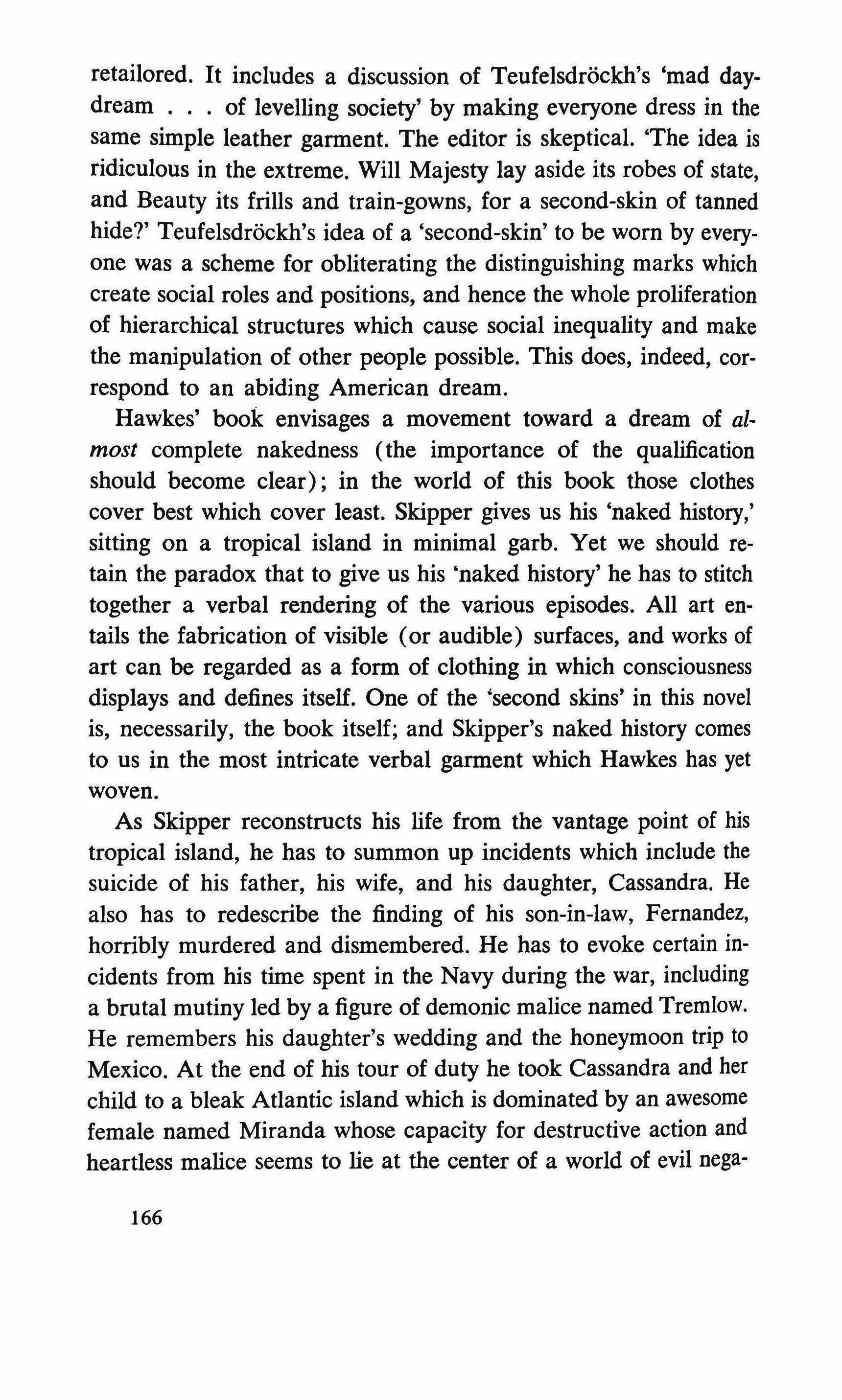
retailored. It includes a discussion of Teufelsdrockh's 'mad daydream of levelling society' by making everyone dress in the same simple leather garment. The editor is skeptical. 'The idea is ridiculous in the extreme. Will Majesty lay aside its robes of state, and Beauty its frills and train-gowns, for a second-skin of tanned hide?' Teufelsdrockh's idea of a 'second-skin' to be worn by everyone was a scheme for obliterating the distinguishing marks which create social roles and positions, and hence the whole proliferation of hierarchical structures which cause social inequality and make the manipulation of other people possible. This does, indeed, correspond to an abiding American dream.
Hawkes' book envisages a movement toward a dream of almost complete nakedness (the importance of the qualification should become clear); in the world of this book those clothes cover best which cover least. Skipper gives us his 'naked history,' sitting on a tropical island in minimal garb. Yet we should retain the paradox that to give us his "naked history' he has to stitch together a verbal rendering of the various episodes. All art entails the fabrication of visible (or audible) surfaces, and works of art can be regarded as a form of clothing in which consciousness displays and defines itself. One of the 'second skins' in this novel is, necessarily, the book itself; and Skipper's naked history comes to us in the most intricate verbal garment which Hawkes has yet woven.
As Skipper reconstructs his life from the vantage point of his tropical island, he has to summon up incidents which include the suicide of his father, his wife, and his daughter, Cassandra. He also has to redescribe the finding of his son-in-law, Fernandez, horribly murdered and dismembered. He has to evoke certain incidents from his time spent in the Navy during the war, including a brutal mutiny led by a figure of demonic malice named Tremlow. He remembers his daughter's wedding and the honeymoon trip to Mexico. At the end of his tour of duty he took Cassandra and her child to a bleak Atlantic island which is dominated by an awesome female named Miranda whose capacity for destructive action and heartless malice seems to lie at the center of a world of evil nega-
166
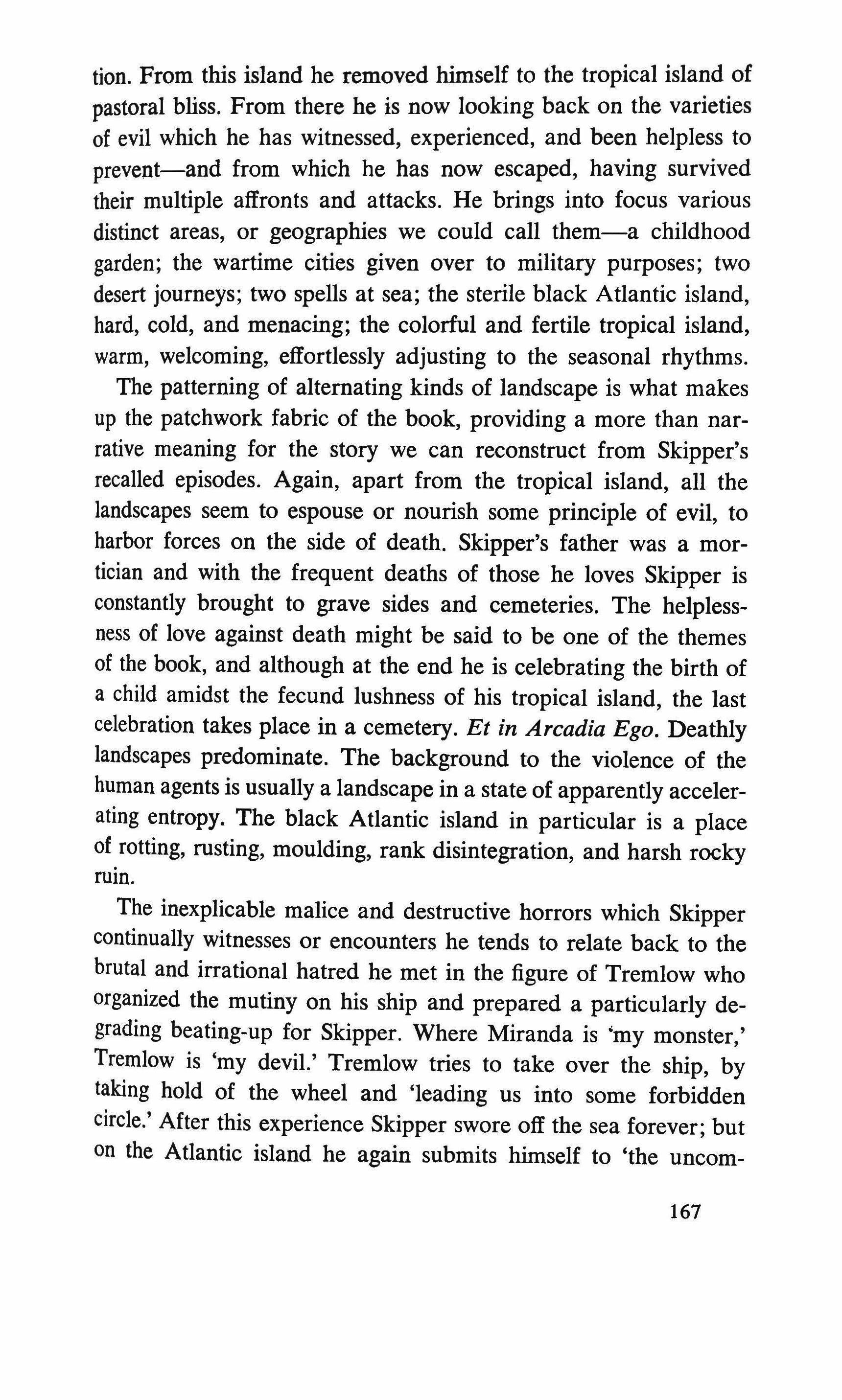
tion. From this island he removed himself to the tropical island of pastoral bliss. From there he is now looking back on the varieties of evil which he has witnessed, experienced, and been helpless to prevent-and from which he has now escaped, having survived their multiple affronts and attacks. He brings into focus various distinct areas, or geographies we could call them-a childhood garden; the wartime cities given over to military purposes; two desert journeys; two spells at sea; the sterile black Atlantic island, hard, cold, and menacing; the colorful and fertile tropical island, warm, welcoming, effortlessly adjusting to the seasonal rhythms.
The patterning of alternating kinds of landscape is what makes up the patchwork fabric of the book, providing a more than narrative meaning for the story we can reconstruct from Skipper's recalled episodes. Again, apart from the tropical island, all the landscapes seem to espouse or nourish some principle of evil, to harbor forces on the side of death. Skipper's father was a mortician and with the frequent deaths of those he loves Skipper is constantly brought to grave sides and cemeteries. The helplessness of love against death might be said to be one of the themes of the book, and although at the end he is celebrating the birth of a child amidst the fecund lushness of his tropical island, the last celebration takes place in a cemetery. Et in Arcadia Ego. Deathly landscapes predominate. The background to the violence of the human agents is usually a landscape in a state of apparently accelerating entropy. The black Atlantic island in particular is a place of rotting, rusting, moulding, rank disintegration, and harsh rocky ruin.
The inexplicable malice and destructive horrors which Skipper continually witnesses or encounters he tends to relate back to the brutal and irrational hatred he met in the figure of Tremlow who organized the mutiny on his ship and prepared a particularly degrading beating-up for Skipper. Where Miranda is 'my monster,' Tremlow is 'my devil.' Tremlow tries to take over the ship, by taking hold of the wheel and 'leading us into some forbidden circle.' After this experience Skipper swore off the sea forever; but on the Atlantic island he again submits himself to 'the uncom167

fortable drift of a destructive ocean' when he goes on the boat trip organized specifically to bring about the enforced seduction of Cassandra. Once again Skipper is beaten by the conspirators, and, as usual, he is entirely helpless to prevent the implementation of all their dark designs.
The destructive ocean, the arid desert, the alien and brutal cityscapes of Pacific wartime, the lifeless rock of the black island, overlooked by the blind stone lighthouse from which Cassandra throws herself onto the sharp black boulders of the shore-these form some of the landscapes traversed by Skipper before he arrives at his blue island of fertility and peace. What all these areas have in common is the presence in them (or on them) of sharp, hard things, sometimes natural, more often man-made, forming a continuum of stony and metallic objects, places and people, most of them with dangerous points and edges. Skipper, with his hypersensitive skin, suffers unusual cuts and woundings. He has trouble with all edged or pointed things, and hostility comes to him in a variety of metallic forms. He is constantly liable to abrasions and puncturings, as is brought out in one of the most vivid scenes in the book when he is tattooed at his daughter's request with her dead husband's name. We are made to feel 'every puncture of the needle-fast as the stinging of bees,' and this series of atrociously painful pin-pricks marching across his bare chest is a compressed analogue for what he seems to go through in the book. Despite the pain, he survives. 'Marked and naked as I was, I smiled. I managed to stand: This too summarizes what he sees as his essential effort in the whole book. At the end of the tattooing ordeal he refers to 'this green lizard that lay exposed and crawling on my chest' and this points forward to an incident on the blue island when an iguana settles on Kate's back and sticks its claws in. Kate is Skipper's pregnant native mistress and she has been lying at the edge of a swamp where she intends to have her baby; it is in this position that the great iguana ('twenty or thirty pounds of sprawling bright green putty') fastens onto her naked back. Skipper, despite the nauseous feeling of the reptilian skin on his own, tries to pull the iguana off; but the claws grip like steel. He has to be
168
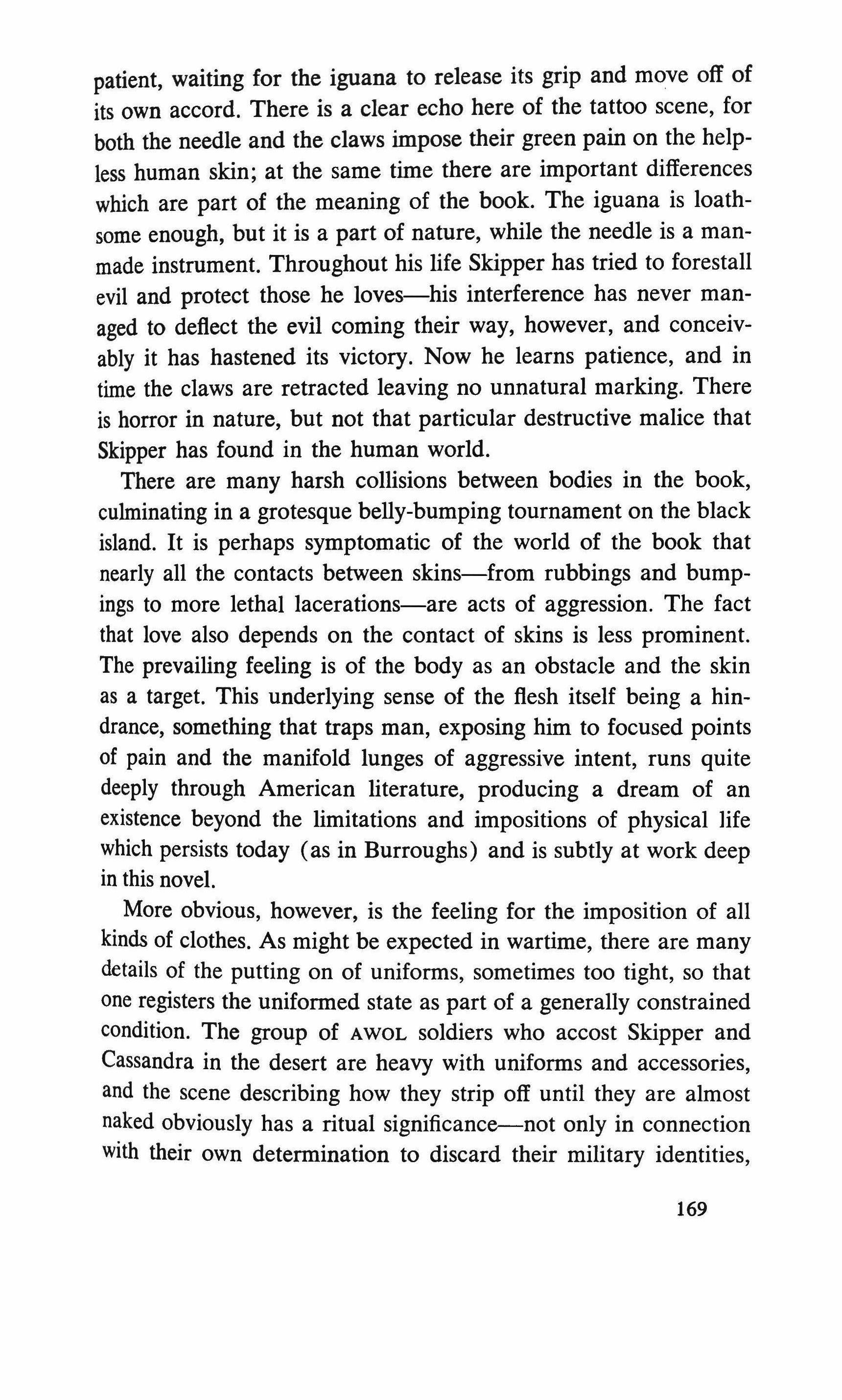
patient, waiting for the iguana to release its grip and move off of its own accord. There is a clear echo here of the tattoo scene, for both the needle and the claws impose their green pain on the helpless human skin; at the same time there are important differences which are part of the meaning of the book. The iguana is loathsome enough, but it is a part of nature, while the needle is a manmade instrument. Throughout his life Skipper has tried to forestall evil and protect those he loves-his interference has never managed to deflect the evil coming their way, however, and conceivably it has hastened its victory. Now he learns patience, and in time the claws are retracted leaving no unnatural marking. There is horror in nature, but not that particular destructive malice that Skipper has found in the human world.
There are many harsh collisions between bodies in the book, culminating in a grotesque belly-bumping tournament on the black island. It is perhaps symptomatic of the world of the book that nearly all the contacts between skins-from rubbings and bumpings to more lethal lacerations-are acts of aggression. The fact that love also depends on the contact of skins is less prominent. The prevailing feeling is of the body as an obstacle and the skin as a target. This underlying sense of the flesh itself being a hindrance, something that traps man, exposing him to focused points of pain and the manifold lunges of aggressive intent, runs quite deeply through American literature, producing a dream of an existence beyond the limitations and impositions of physical life which persists today (as in Burroughs) and is subtly at work deep in this novel.
More obvious, however, is the feeling for the imposition of all kinds of clothes. As might be expected in wartime, there are many details of the putting on of uniforms, sometimes too tight, so that one registers the uniformed state as part of a generally constrained condition. The group of AWOL soldiers who accost Skipper and Cassandra in the desert are heavy with uniforms and accessories, and the scene describing how they strip off until they are almost naked obviously has a ritual significance-not only in connection with their own determination to discard their military identities, 169
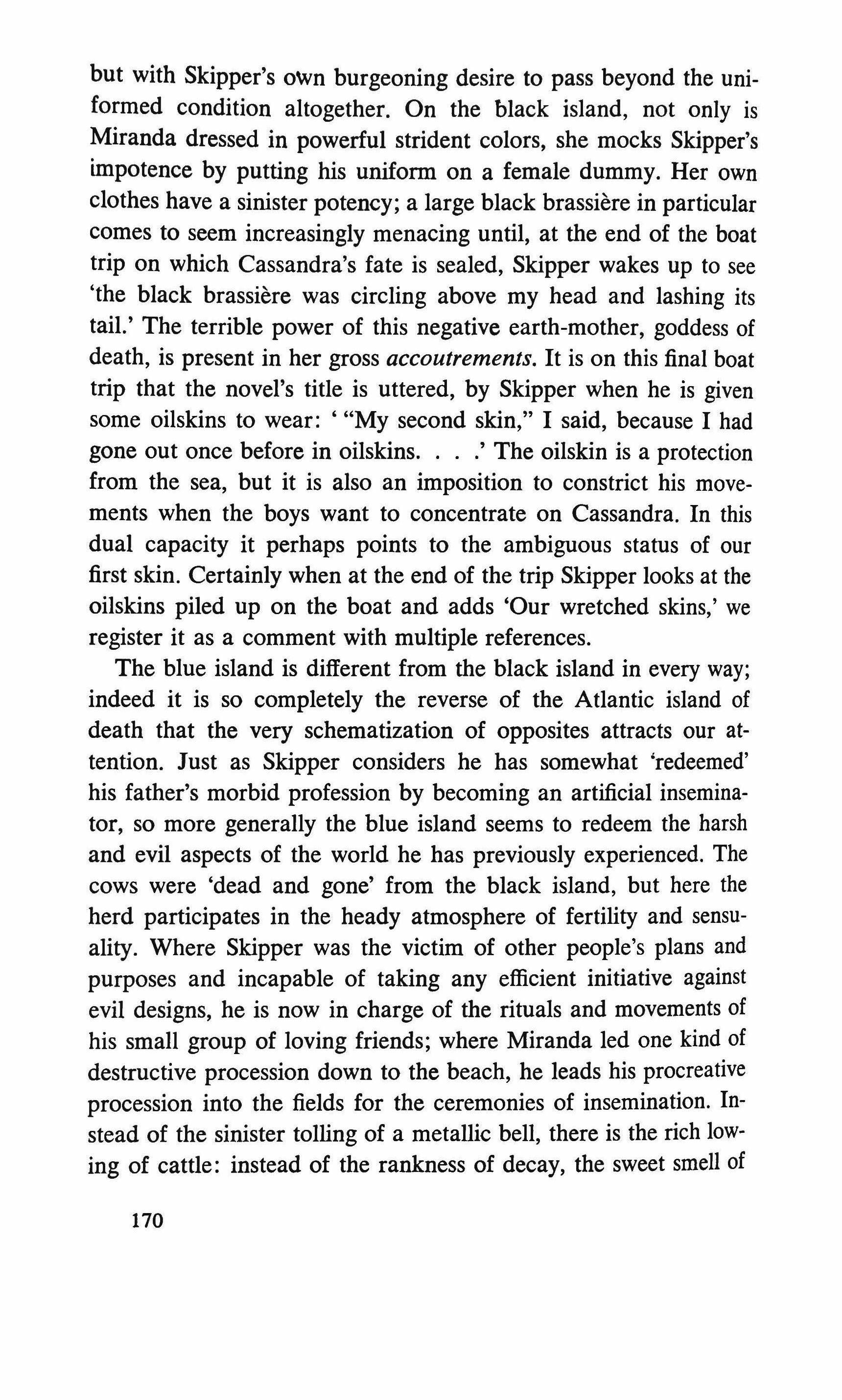
but with Skipper's own burgeoning desire to pass beyond the uniformed condition altogether. On the black island, not only is Miranda dressed in powerful strident colors, she mocks Skipper's impotence by putting his uniform on a female dummy. Her own clothes have a sinister potency; a large black brassiere in particular comes to seem increasingly menacing until, at the end of the boat trip on which Cassandra's fate is sealed, Skipper wakes up to see 'the black brassiere was circling above my head and lashing its tail.' The terrible power of this negative earth-mother, goddess of death, is present in her gross accoutrements. It is on this final boat trip that the novel's title is uttered, by Skipper when he is given some oilskins to wear: '''My second skin," I said, because I had gone out once before in oilskins. .' The oilskin is a protection from the sea, but it is also an imposition to constrict his movements when the boys want to concentrate on Cassandra. In this dual capacity it perhaps points to the ambiguous status of our first skin. Certainly when at the end of the trip Skipper looks at the oilskins piled up on the boat and adds 'Our wretched skins,' we register it as a comment with multiple references.
The blue island is different from the black island in every way; indeed it is so completely the reverse of the Atlantic island of death that the very schematization of opposites attracts our attention. Just as Skipper considers he has somewhat 'redeemed' his father's morbid profession by becoming an artificial inseminator, so more generally the blue island seems to redeem the harsh and evil aspects of the world he has previously experienced. The cows were 'dead and gone' from the black island, but here the herd participates in the heady atmosphere of fertility and sensuality. Where Skipper was the victim of other people's plans and purposes and incapable of taking any efficient initiative against evil designs, he is now in charge of the rituals and movements of his small group of loving friends; where Miranda led one kind of destructive procession down to the beach, he leads his procreative procession into the fields for the ceremonies of insemination. Instead of the sinister tolling of a metallic bell, there is the rich lowing of cattle: instead of the rankness of decay, the sweet smell of
170

wind-blown spices. In place of the harsh edges of metallic things and the repugnant stone of dead architecture, a voluptuous softness and the rhythmic ease of organic growth pervades the atmosphere: from malice to love; from the island of death to an island of life. If at first this looks like a proto-Gauguinesque escapism and wish-fulfillment and we think that the consolations of the blue island make up all too neatly for the atrocities and negations of the black one, we should also consider that this may have been part of Hawkes' intention. To explain what I mean I want first to point to a suggestive repetition of image.
When Skipper leaves the Navy after his tour of duty is completed he sets out on the cross-desert journey which will finally take him to both islands. We may consider that this journey is an attempt to get out of the world of war altogether, a search for a haven not unlike Yossarian's search for Sweden/Eden in Catch-22. The bus station from which he leaves is 'The terminal. Our point of departure.' This suggests the point where one world ends and another one begins. His journeying, I would suggest, is directed toward finding another kind of reality-away from the facts of war to a dream of peace, a very American quest. The different realities he passes through are subtly linked by the presence in each of a starfish shape or a star-shaped hole. In the order in which they appear, this is the pattern: On his first day on the Atlantic island Skipper thinks he sees a naked woman on the beach 'as white as a starfish and inert, naked, caught amongst the boulders.' This is a premonition of Cassandra's coming suicide. Then on his tropical island he mentions the 'star-shaped hole in the roof which he specifically declines to repair, preferring a roofless barn. We then discover that the ship on which Tremlow mutinied was the U.S.S. Starfish. At the peak of this brutality, Skipper falls down into a lifeboat, breaking through the canvas into the hands of a group of mutineers who start to beat him up. He looks up and sees 'a star-shaped hole in the tarpaulin overhead' and it is through that hole that he escapes, thanks to a rope lowered by a friend. One feels that the hole in the tarpaulin and the hole in the barn are somehow connected-perhaps marking the spot through which
171
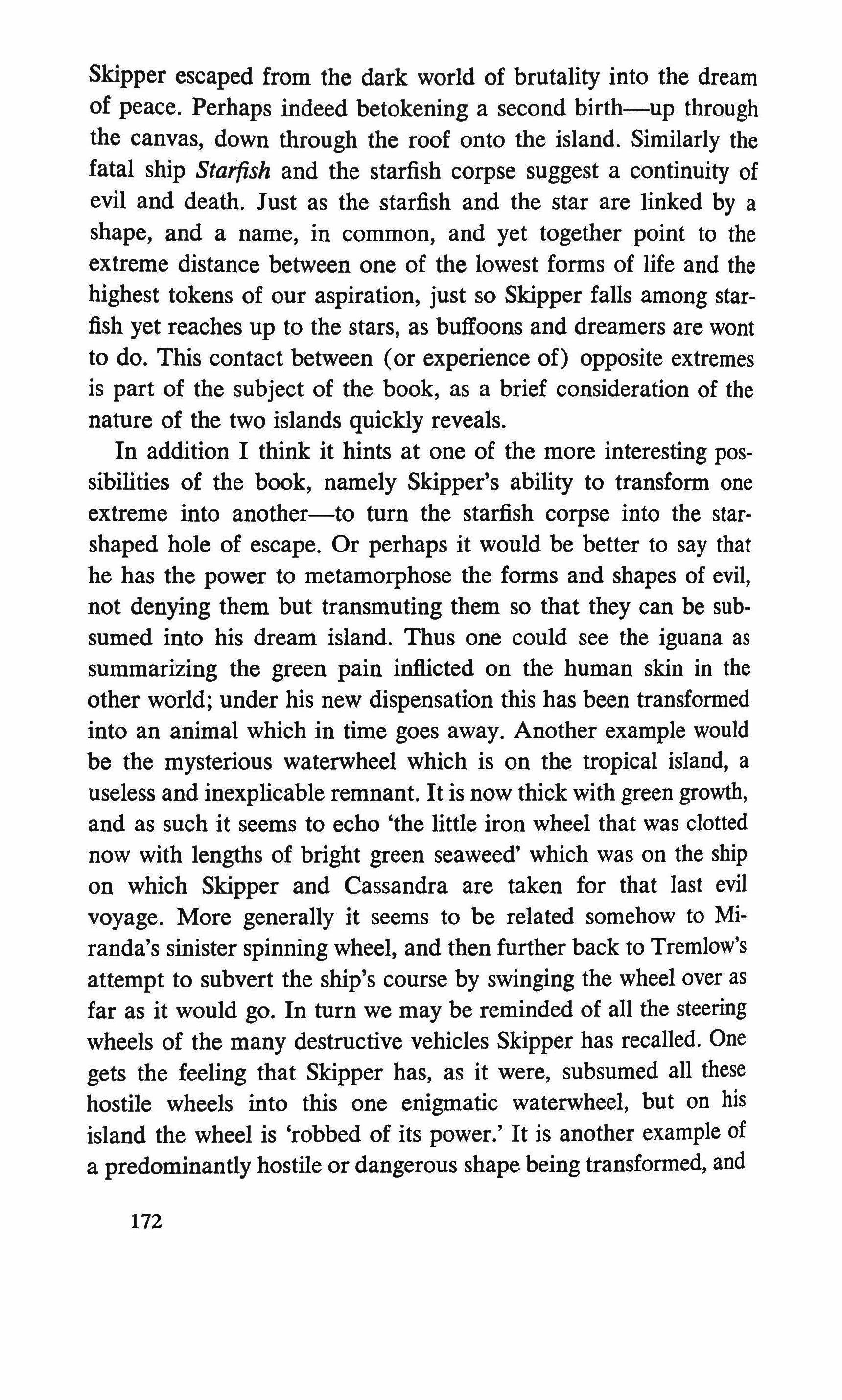
Skipper escaped from the dark world of brutality into the dream of peace. Perhaps indeed betokening a second birth-up through the canvas, down through the roof onto the island. Similarly the fatal ship Starfish and the starfish corpse suggest a continuity of evil and death. Just as the starfish and the star are linked by a shape, and a name, in common, and yet together point to the extreme distance between one of the lowest forms of life and the highest tokens of our aspiration, just so Skipper falls among starfish yet reaches up to the stars, as buffoons and dreamers are wont to do. This contact between (or experience of) opposite extremes is part of the subject of the book, as a brief consideration of the nature of the two islands quickly reveals.
In addition I think it hints at one of the more interesting possibilities of the book, namely Skipper's ability to transform one extreme into another-to turn the starfish corpse into the starshaped hole of escape. Or perhaps it would be better to say that he has the power to metamorphose the forms and shapes of evil, not denying them but transmuting them so that they can be subsumed into his dream island. Thus one could see the iguana as summarizing the green pain inflicted on the human skin in the other world; under his new dispensation this has been transformed into an animal which in time goes away. Another example would be the mysterious waterwheel which is on the tropical island, a useless and inexplicable remnant. It is now thick with green growth, and as such it seems to echo 'the little iron wheel that was clotted now with lengths of bright green seaweed' which was on the ship on which Skipper and Cassandra are taken for that last evil voyage. More generally it seems to be related somehow to Miranda's sinister spinning wheel, and then further back to Tremlow's attempt to subvert the ship's course by swinging the wheel over as far as it would go. In turn we may be reminded of all the steering wheels of the many destructive vehicles Skipper has recalled. One gets the feeling that Skipper has, as it were, subsumed all these hostile wheels into this one enigmatic waterwheel, but on his island the wheel is 'robbed of its power.' It is another example of a predominantly hostile or dangerous shape being transformed, and
172
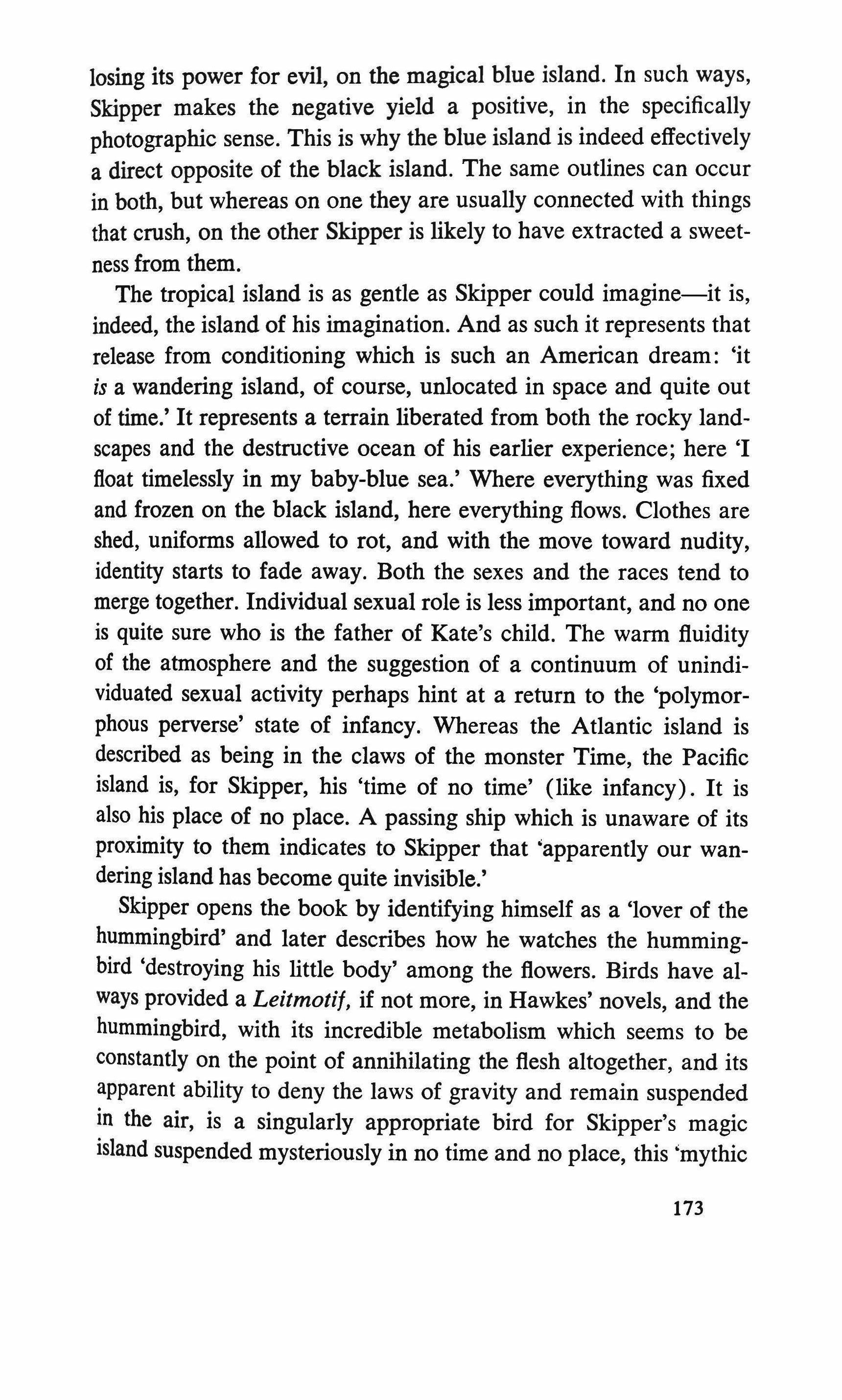
losing its power for evil, on the magical blue island. In such ways, Skipper makes the negative yield a positive, in the specifically photographic sense. This is why the blue island is indeed effectively a direct opposite of the black island. The same outlines can occur in both, but whereas on one they are usually connected with things that crush, on the other Skipper is likely to have extracted a sweetness from them.
The tropical island is as gentle as Skipper could imagine-it is, indeed, the island of his imagination. And as such it represents that release from conditioning which is such an American dream: 'it is a wandering island, of course, unlocated in space and quite out of time.' It represents a terrain liberated from both the rocky landscapes and the destructive ocean of his earlier experience; here 'I float timelessly in my baby-blue sea.' Where everything was fixed and frozen on the black island, here everything flows. Clothes are shed, uniforms allowed to rot, and with the move toward nudity, identity starts to fade away. Both the sexes and the races tend to merge together. Individual sexual role is less important, and no one is quite sure who is the father of Kate's child. The warm fluidity of the atmosphere and the suggestion of a continuum of unindividuated sexual activity perhaps hint at a return to the 'polymorphous perverse' state of infancy. Whereas the Atlantic island is described as being in the claws of the monster Time, the Pacific island is, for Skipper, his 'time of no time' (like infancy). It is also his place of no place. A passing ship which is unaware of its proximity to them indicates to Skipper that 'apparently our wandering island has become quite invisible.'
Skipper opens the book by identifying himself as a 'lover of the hummingbird' and later describes how he watches the hummingbird 'destroying his little body' among the flowers. Birds have always provided a Leitmotif, if not more, in Hawkes' novels, and the hummingbird, with its incredible metabolism which seems to be constantly on the point of annihilating the flesh altogether, and its apparent ability to deny the laws of gravity and remain suspended in the air, is a singularly appropriate bird for Skipper's magic island suspended mysteriously in no time and no place, this 'mythic
173

rock' in which he conducts his own slow pastorals and supervises peaceful idyls and gentle rituals of love. t This island is the ultimate refuge and triumph-the place where the imagination reigns supreme, free from the iron brutalities and impingements of the other world. It is not fixed but floating, not rigidly plotted on a map but wandering. It represents a mode of motion transformed into a location, and as such could be described as the sought-for, destination of many recent American heroes. In a profound sense it is an American dream.
At this point we should consider the narrator himself a little more closely. He is another American idealist, humiliated by the world to a comic degree. If we take him at his own valuation, he is a lover, a man of peace whose endless good intentions and protective attempts are as endlessly thwarted in a wicked world. He sees himself as a 'courageous victim' and while he never puts up much of a fight in his fleshly encounters with determined aggression, 'in the stuffed interior of my brain I was resisting,' as he says of the tattooing ordeal. Confronted with the mess made by Miranda when she empties all the baby bottles and cuts off the tops of the rubber nipples, he says 'I could make nothing of this sad vehement litter,' and the confession could be extended to his experience of all the landscapes of vehement litter that he passes through. The given world is nauseating to him. He has three bouts of vomiting when the foul nourishment-literal and perceptual-thrust upon him by these landscapes is no longer assimilable. On one occasion Skipper adds, 'Anyone who has gotten down on his knees to vomit has discovered, if only by accident, the position of prayer.' Thus his vomiting becomes a symbolic act of reverent repudiation. His helplessness is underlined by the number of people he claims to love who commit suicide or who are killed; yet he insists that his story is not one of 'helplessness' and 'collapse' but rather 'the chronicle of recovery, the history of courage.'
t The hummingbird, feeding delicately and deliberately on sweet rich things, offers a fair analog for the writer, who is determined to extract sweetness from his garden of experience. Emily Dickinson has two poems about the hummingbird -numbers 500 and 1463 in the Collected Poems-and conceivably Hawkes intends an oblique reference.
174
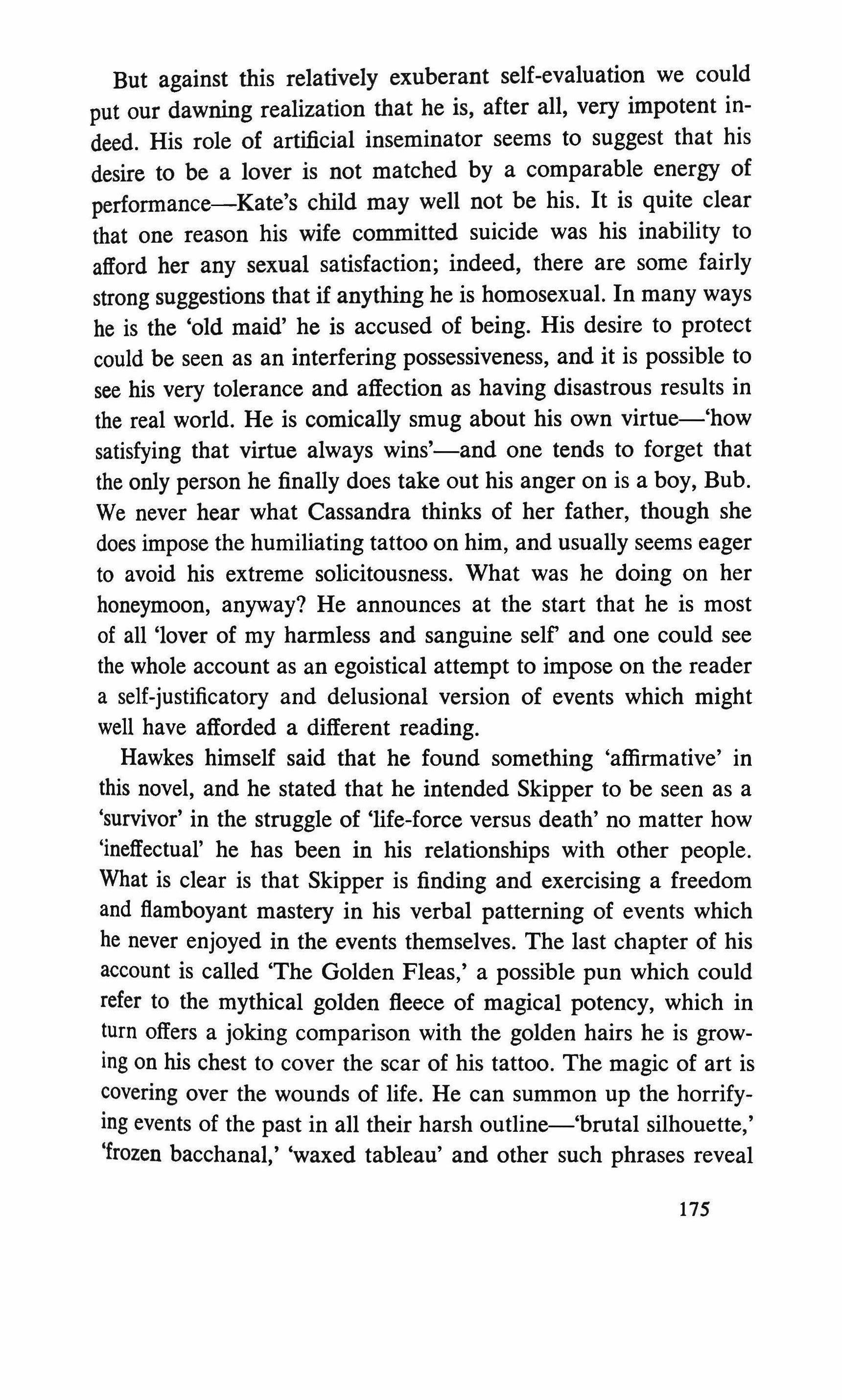
But against this relatively exuberant self-evaluation we could put our dawning realization that he is, after all, very impotent indeed. His role of artificial inseminator seems to suggest that his desire to be a lover is not matched by a comparable energy of performance-Kate's child may well not be his. It is quite clear that one reason his wife committed suicide was his inability to afford her any sexual satisfaction; indeed, there are some fairly strong suggestions that if anything he is homosexual. In many ways he is the 'old maid' he is accused of being. His desire to protect could be seen as an interfering possessiveness, and it is possible to see his very tolerance and affection as having disastrous results in the real world. He is comically smug about his own virtue-Chow satisfying that virtue always wins'-and one tends to forget that the only person he finally does take out his anger on is a boy, Bub. We never hear what Cassandra thinks of her father, though she does impose the humiliating tattoo on him, and usually seems eager to avoid his extreme solicitousness. What was he doing on her honeymoon, anyway? He announces at the start that he is most of all 'lover of my harmless and sanguine self and one could see the whole account as an egoistical attempt to impose on the reader a self-justificatory and delusional version of events which might well have afforded a different reading.
Hawkes himself said that he found something 'affirmative' in this novel, and he stated that he intended Skipper to be seen as a 'survivor' in the struggle of 'life-force versus death' no matter how 'ineffectual' he has been in his relationships with other people. What is clear is that Skipper is finding and exercising a freedom and flamboyant mastery in his verbal patterning of events which he never enjoyed in the events themselves. The last chapter of his account is called 'The Golden Fleas,' a possible pun which could refer to the mythical golden fleece of magical potency, which in turn offers a joking comparison with the golden hairs he is growing on his chest to cover the scar of his tattoo. The magic of art is covering over the wounds of life. He can summon up the horrifying events of the past in all their harsh outline-'brutal silhouette,' 'frozen bacchanal,' 'waxed tableau' and other such phrases reveal 175

how sharply the painful details are fixed in his mind. But they are now transmuted, in and by his art. He calls his history 'my evocation through a golden glass,' thus referring not only to his sunny island detachment but also the golden glass of his prose. He is now his own mythographer, and just as he has undisputed authority on the island, so he can do what he likes in his writing. He is transposing his life by describing it in his chosen way. Thus he is able to make whatever was negative in the past into something more healing and affirmative by submitting it to his own stylistic and rhetorical translations. People and places are often introduced preceded by the word 'my'; the reiterated possessive pronoun reminds us that he is now doing the arranging and the placing. This is very much his version.
It is part of this process that he should feel at liberty to avail himself of a whole range of mythological references, applying them as he pleases. He refers more than once to 'my kingdom' as he surveys the terrain he has traversed, and he seems to see himself both as Priam, the last king of Troy, and Prospero, ruler of Shakespeare's last magic island. If he is both Priam and Prospero, then of course he has two daughters-Cassandra and Miranda. The fact that in the book they have turned out so ironically different from their prototypes serves to indicate how free Skipper feels he can be in his mythologizing. More importantly, if they are both his daughters, then both islands are part of his kingdom. Both islands are fantasy islands, the Atlantic purgatory as well as the Pacific paradise, as Skipper himself comes to realize. His dreaming has two sides to it.
The overall implication of the book, then, is this: Skipper's experience as a child, and as a man in wartime America, was 'real,' not fabricated. This experience was then submitted to two dream versions, resulting in the two islands which define the antipodal extremes of Skipper's imaginative universe. The first is a paranoid and self-pitying projection of a world totally given over to the forces of negation and death. The second is a compensating and self-congratulatory version in which those forces are subsumed, rendered impotent, or transformed, and everything is in the sway
176
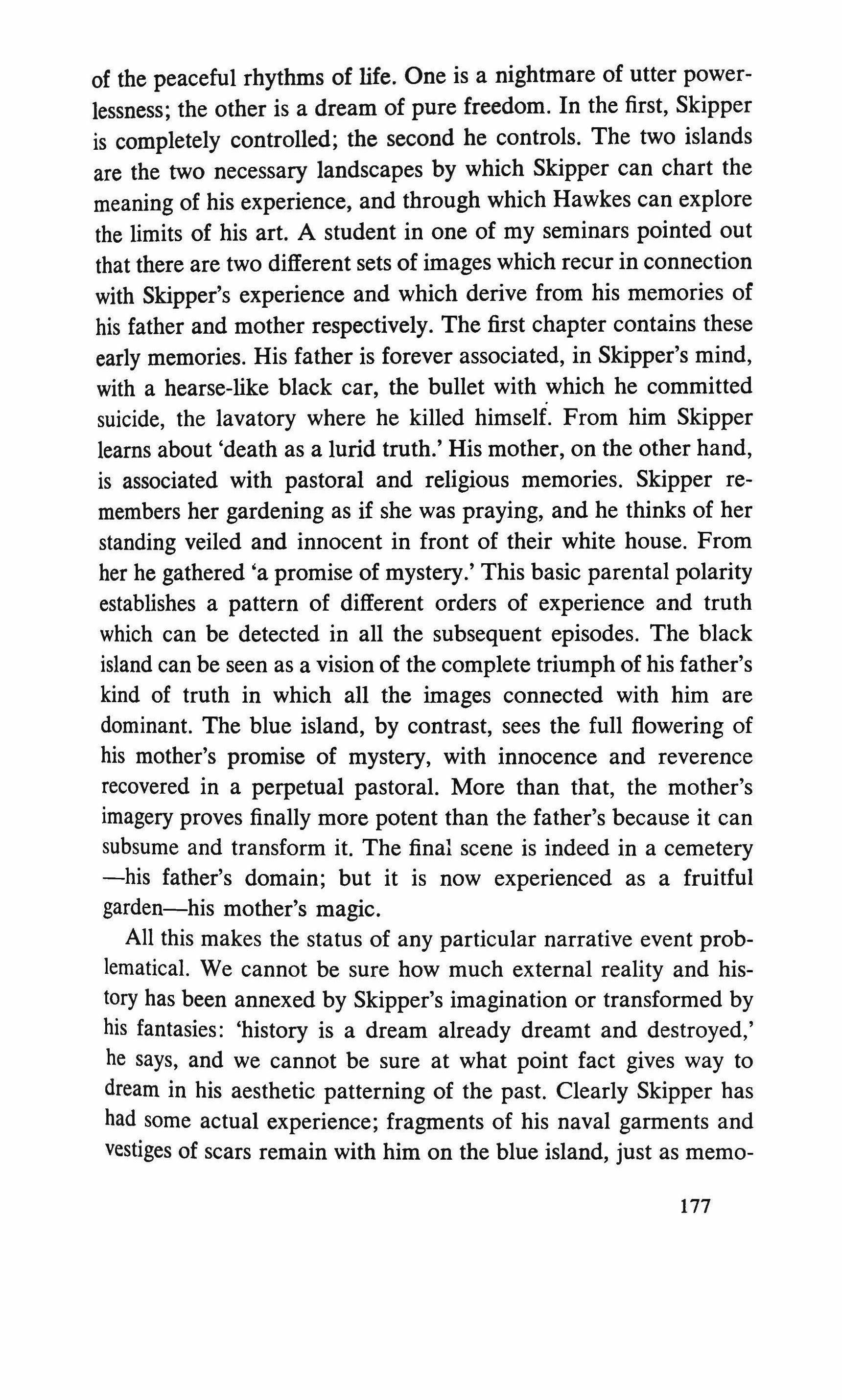
of the peaceful rhythms of life. One is a nightmare of utter powerlessness; the other is a dream of pure freedom. In the first, Skipper is completely controlled; the second he controls. The two islands are the two necessary landscapes by which Skipper can chart the meaning of his experience, and through which Hawkes can explore the limits of his art. A student in one of my seminars pointed out that there are two different sets of images which recur in connection with Skipper's experience and which derive from his memories of his father and mother respectively. The first chapter contains these early memories. His father is forever associated, in Skipper's mind, with a hearse-like black car, the bullet with which he committed suicide, the lavatory where he killed himself. From him Skipper learns about 'death as a lurid truth.' His mother, on the other hand, is associated with pastoral and religious memories. Skipper remembers her gardening as if she was praying, and he thinks of her standing veiled and innocent in front of their white house. From her he gathered 'a promise of mystery.' This basic parental polarity establishes a pattern of different orders of experience and truth which can be detected in all the subsequent episodes. The black island can be seen as a vision of the complete triumph of his father's kind of truth in which all the images connected with him are dominant. The blue island, by contrast, sees the full flowering of his mother's promise of mystery, with innocence and reverence recovered in a perpetual pastoral. More than that, the mother's imagery proves finally more potent than the father's because it can subsume and transform it. The final scene is indeed in a cemetery -his father's domain; but it is now experienced as a fruitful garden-his mother's magic.
All this makes the status of any particular narrative event problematical. We cannot be sure how much external reality and history has been annexed by Skipper's imagination or transformed by his fantasies: 'history is a dream already dreamt and destroyed,' he says, and we cannot be sure at what point fact gives way to dream in his aesthetic patterning of the past. Clearly Skipper has had some actual experience; fragments of his naval garments and vestiges of scars remain with him on the blue island, just as memo-
177
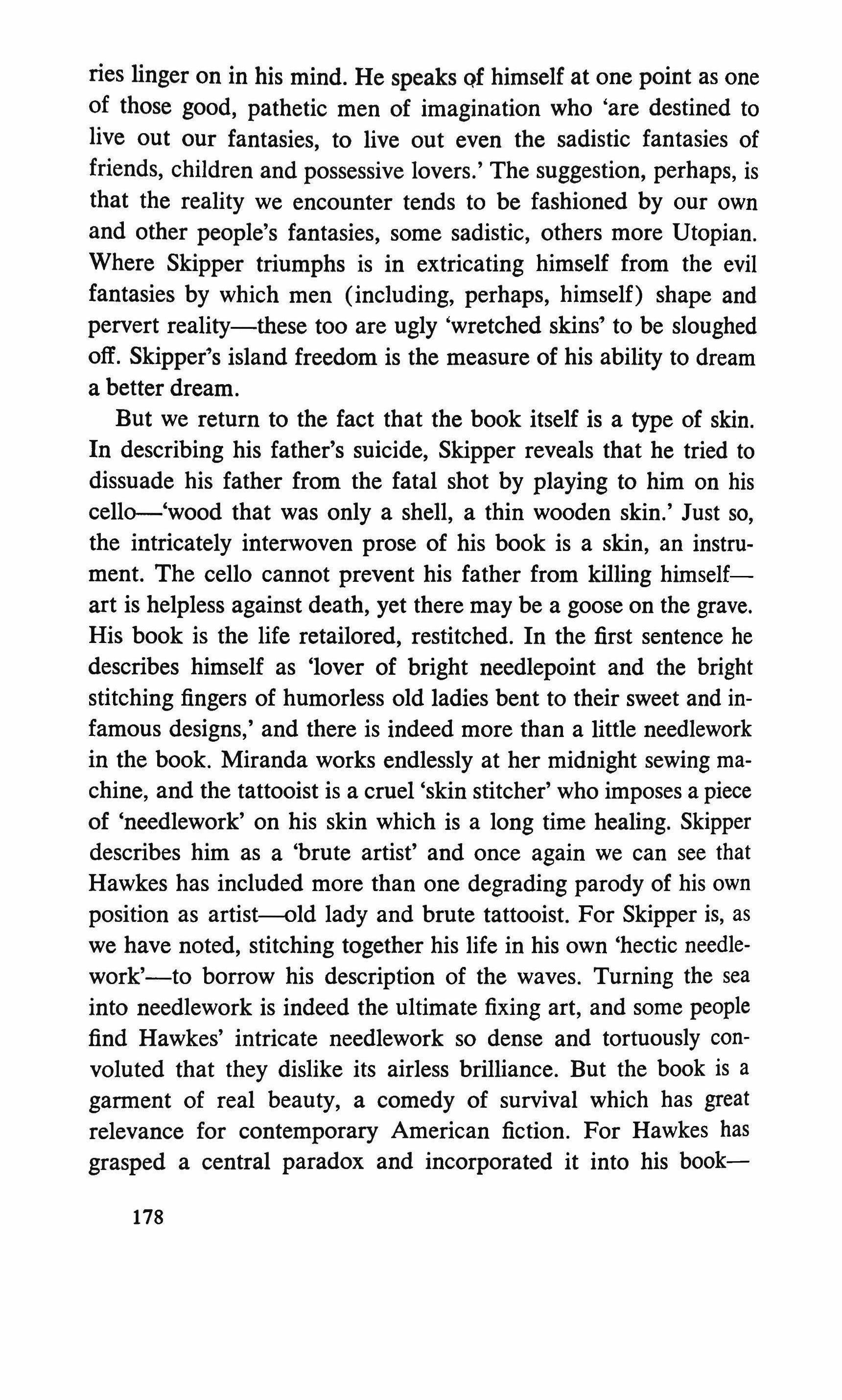
ries linger on in his mind. He speaks Qf himself at one point as one of those good, pathetic men of imagination who 'are destined to live out our fantasies, to live out even the sadistic fantasies of friends, children and possessive lovers.' The suggestion, perhaps, is that the reality we encounter tends to be fashioned by our own and other people's fantasies, some sadistic, others more Utopian. Where Skipper triumphs is in extricating himself from the evil fantasies by which men (including, perhaps, himself) shape and pervert reality-these too are ugly 'wretched skins' to be sloughed off. Skipper's island freedom is the measure of his ability to dream a better dream.
But we return to the fact that the book itself is a type of skin. In describing his father's suicide, Skipper reveals that he tried to dissuade his father from the fatal shot by playing to him on his cello-'wood that was only a shell, a thin wooden skin.' Just so, the intricately interwoven prose of his book is a skin, an instrument. The cello cannot prevent his father from killing himselfart is helpless against death, yet there may be a goose on the grave. His book is the life retailored, restitched. In the first sentence he describes himself as 'lover of bright needlepoint and the bright stitching fingers of humorless old ladies bent to their sweet and infamous designs,' and there is indeed more than a little needlework in the book. Miranda works endlessly at her midnight sewing machine, and the tattooist is a cruel 'skin stitcher' who imposes a piece of 'needlework' on his skin which is a long time healing. Skipper describes him as a 'brute artist' and once again we can see that Hawkes has included more than one degrading parody of his own position as artist--old lady and brute tattooist. For Skipper is, as we have noted, stitching together his life in his own 'hectic needlework'-to borrow his description of the waves. Turning the sea into needlework is indeed the ultimate fixing art, and some people find Hawkes' intricate needlework so dense and tortuously convoluted that they dislike its airless brilliance. But the book is a garment of real beauty, a comedy of survival which has great relevance for contemporary American fiction. For Hawkes has grasped a central paradox and incorporated it into his book178
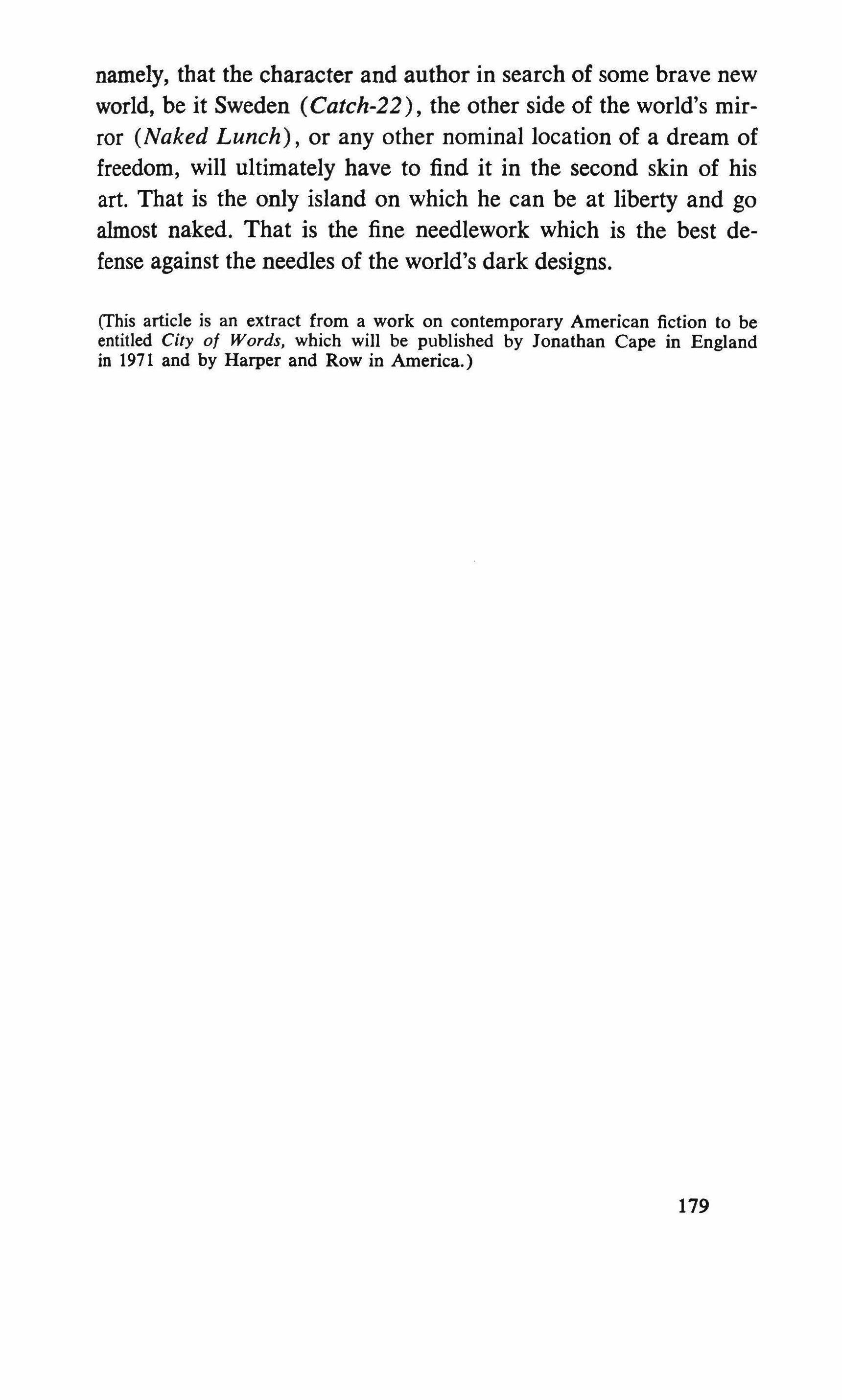
namely, that the character and author in search of some brave new world, be it Sweden (Catch-22), the other side of the world's mirror (Naked Lunch), or any other nominal location of a dream of freedom, will ultimately have to find it in the second skin of his art. That is the only island on which he can be at liberty and go almost naked. That is the fine needlework which is the best defense against the needles of the world's dark designs.
(This article is an extract from a work on contemporary American fiction to be entitled City of Words, which will be published by Jonathan Cape in England in 1971 and by Harper and Row in America.)
179
The virtues of superficiality MORSE PECKHAM
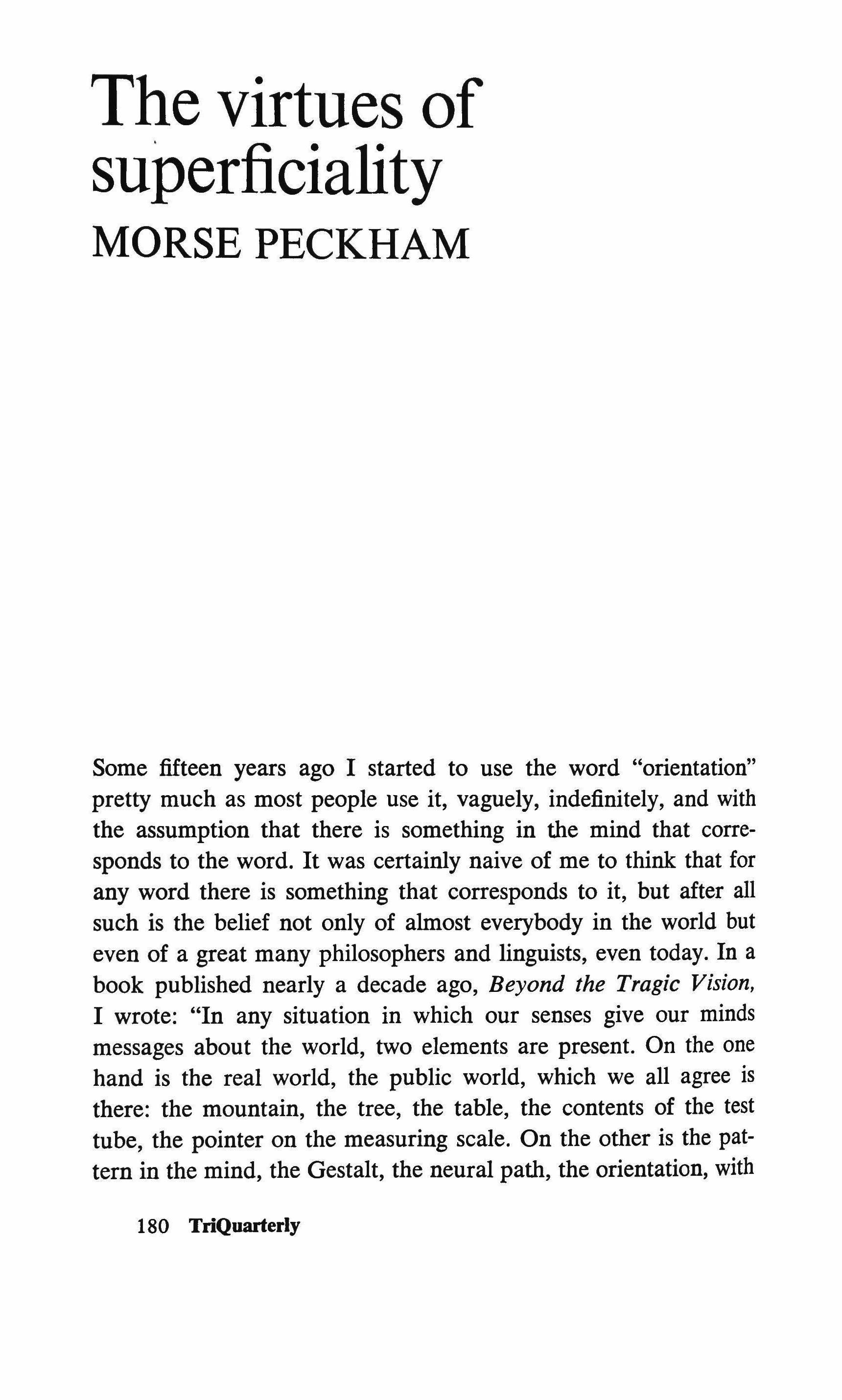
Some fifteen years ago I started to use the word "orientation" pretty much as most people use it, vaguely, indefinitely, and with the assumption that there is something in the mind that corresponds to the word. It was certainly naive of me to think that for any word there is something that corresponds to it, but after all such is the belief not only of almost everybody in the world but even of a great many philosophers and linguists, even today. In a book published nearly a decade ago, Beyond the Tragic Vision, I wrote: "In any situation in which our senses give our minds messages about the world, two elements are present. On the one hand is the real world, the public world, which we all agree is there: the mountain, the tree, the table, the contents of the test tube, the pointer on the measuring scale. On the other is the pattern in the mind, the Gestalt, the neural path, the orientation, with
180 TriQuarterly
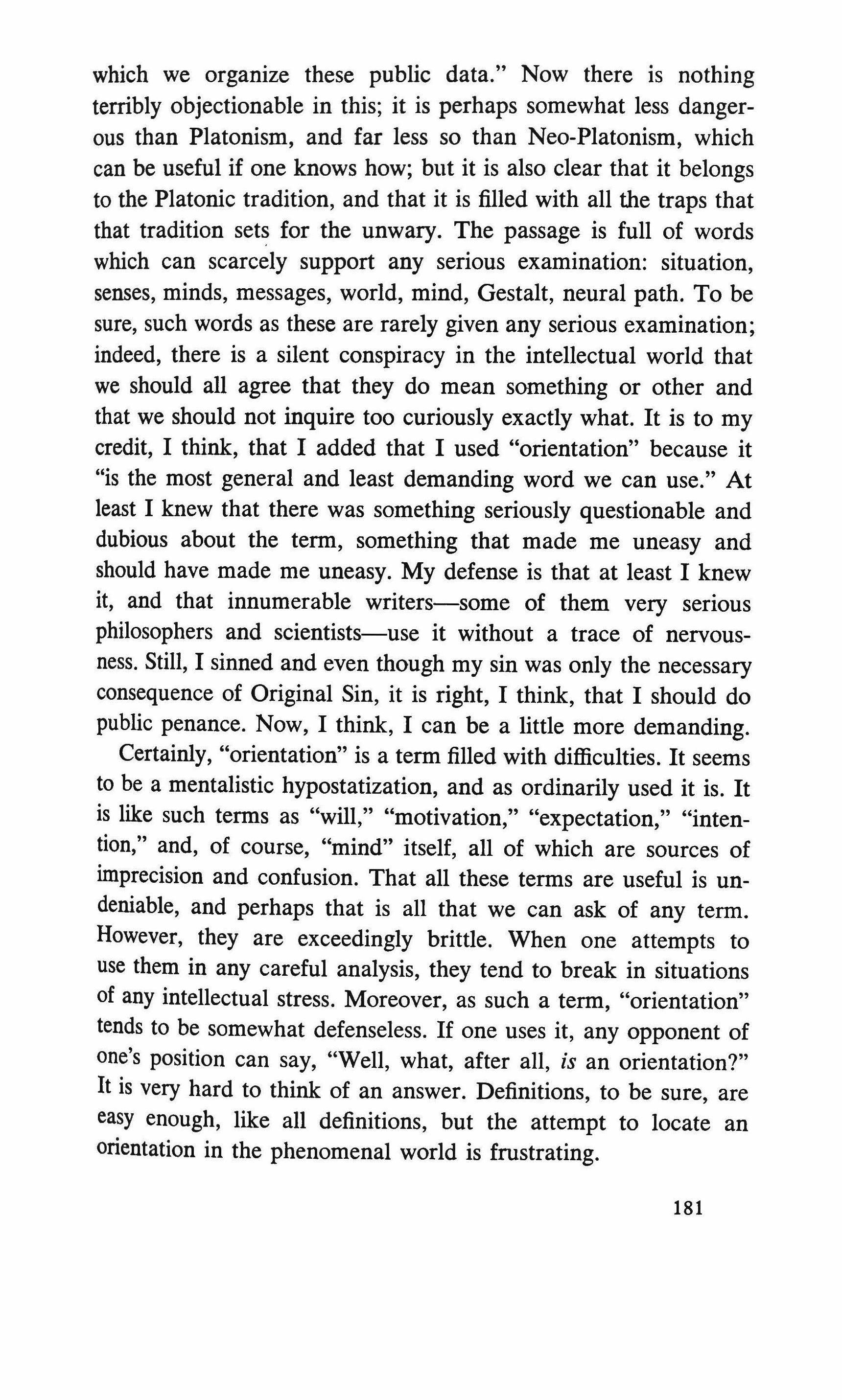
which we organize these public data." Now there is nothing terribly objectionable in this; it is perhaps somewhat less dangerous than Platonism, and far less so than Neo-Platonism, which can be useful if one knows how; but it is also clear that it belongs to the Platonic tradition, and that it is filled with all the traps that that tradition sets for the unwary. The passage is full of words which can scarcely support any serious examination: situation, senses, minds, messages, world, mind, Gestalt, neural path. To be sure, such words as these are rarely given any serious examination; indeed, there is a silent conspiracy in the intellectual world that we should all agree that they do mean something or other and that we should not inquire too curiously exactly what. It is to my credit, I think, that I added that I used "orientation" because it "is the most general and least demanding word we can use." At least I knew that there was something seriously questionable and dubious about the term, something that made me uneasy and should have made me uneasy. My defense is that at least I knew it, and that innumerable writers-some of them very serious philosophers and scientists-use it without a trace of nervousness. Still, I sinned and even though my sin was only the necessary consequence of Original Sin, it is right, I think, that I should do public penance. Now, I think, I can be a little more demanding. Certainly, "orientation" is a term filled with difficulties. It seems to be a mentalistic hypostatization, and as ordinarily used it is. It is like such terms as "will," "motivation," "expectation," "intention," and, of course, "mind" itself, all of which are sources of imprecision and confusion. That all these terms are useful is undeniable, and perhaps that is all that we can ask of any term. However, they are exceedingly brittle. When one attempts to use them in any careful analysis, they tend to break in situations of any intellectual stress. Moreover, as such a term, "orientation" tends to be somewhat defenseless. If one uses it, any opponent of one's position can say, "Well, what, after all, is an orientation?" It is very hard to think of an answer. Definitions, to be sure, are easy enough, like all definitions, but the attempt to locate an orientation in the phenomenal world is frustrating.
181
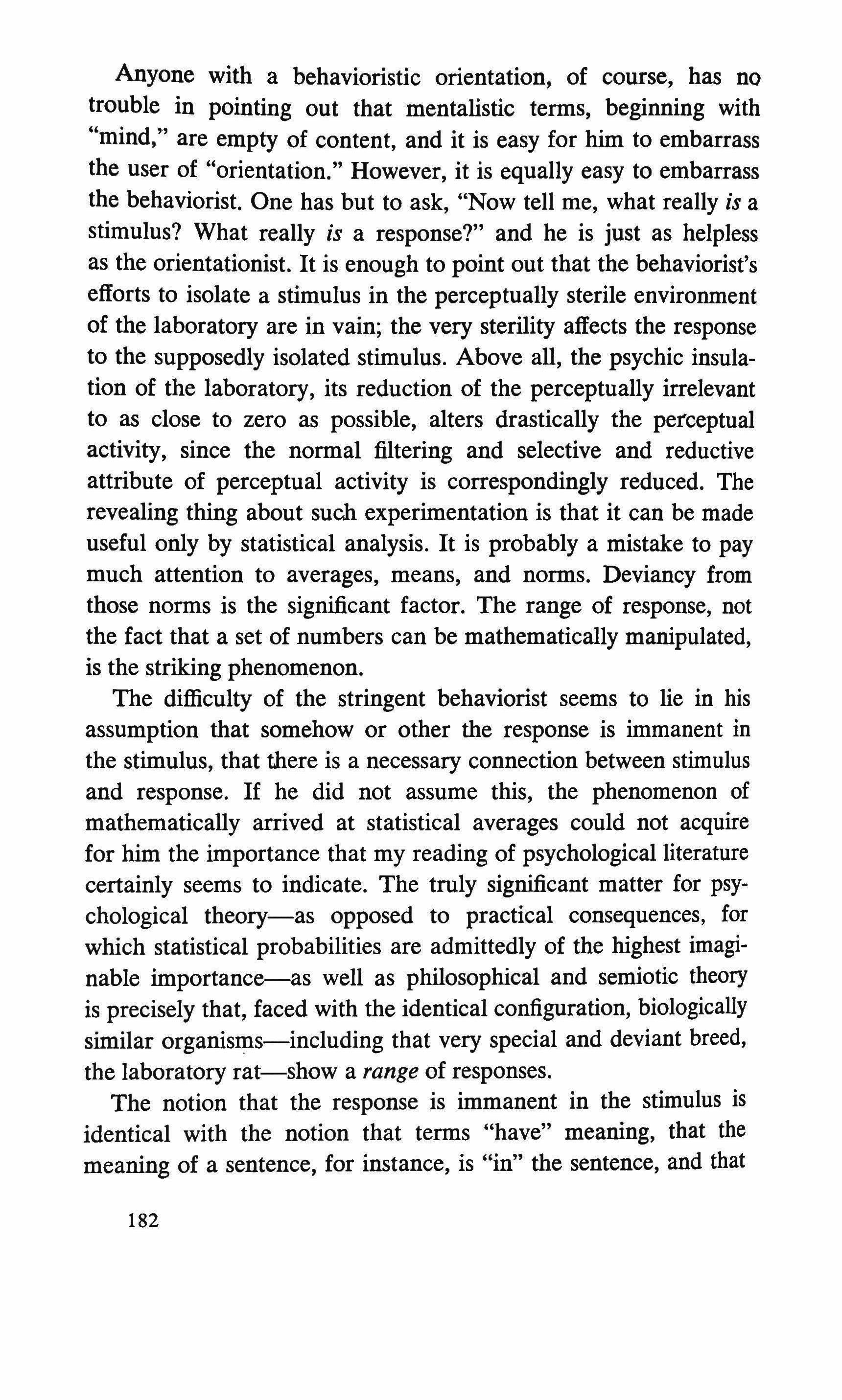
Anyone with a behavioristic orientation, of course, has no trouble in pointing out that mentalistic terms, beginning with "mind," are empty of content, and it is easy for him to embarrass the user of "orientation." However, it is equally easy to embarrass the behaviorist. One has but to ask, "Now tell me, what really is a stimulus? What really is a response?" and he is just as helpless as the orientationist. It is enough to point out that the behaviorist's efforts to isolate a stimulus in the perceptually sterile environment of the laboratory are in vain; the very sterility affects the response to the supposedly isolated stimulus. Above all, the psychic insulation of the laboratory, its reduction of the perceptually irrelevant to as close to zero as possible, alters drastically the perceptual activity, since the normal filtering and selective and reductive attribute of perceptual activity is correspondingly reduced. The revealing thing about such experimentation is that it can be made useful only by statistical analysis. It is probably a mistake to pay much attention to averages, means, and norms. Deviancy from those norms is the significant factor. The range of response, not the fact that a set of numbers can be mathematically manipulated, is the striking phenomenon.
The difficulty of the stringent behaviorist seems to lie in his assumption that somehow or other the response is immanent in the stimulus, that there is a necessary connection between stimulus and response. If he did not assume this, the phenomenon of mathematically arrived at statistical averages could not acquire for him the importance that my reading of psychological literature certainly seems to indicate. The truly significant matter for psychological theory-as opposed to practical consequences, for which statistical probabilities are admittedly of the highest imaginable importance-as well as philosophical and semiotic theory is precisely that, faced with the identical configuration, biologically similar organisms-including that very special and deviant breed, the laboratory rat-show a range of responses.
The notion that the response is immanent in the stimulus is identical with the notion that terms "have" meaning, that the meaning of a sentence, for instance, is "in" the sentence, and that
182

our job is to extract it "from" the sentence, in the notion that it is useful to ask, "What does the term really mean?" The fact of the matter is that it is not even useful to ask, "To what does the term refer?" Human beings, and apparently some animals, mean; it is they who refer, not terms, not sentences, not words, not signs of any kind. The behaviorist-for whom, indeed, I have for many reasons the profoundest respect, and in whose activities I take the greatest possible interest-is in the position of Hegel when he said that every proposition implies its negation. This seems like a very profound notion, and even those philosophers-almost all of them-who have repudiated Hegel and the Hegelian traditien still proceed in very much the same way. Aside from the fact that it is probably impossible for human beings to say anything profound, and that all we can hope to do is to utter the superficial with the utmost lucidity, all that Hegel is saying is that it is possible to say "yes" or "no" to any proposition; and his great insight into history amounts to the notion that as situations change some individuals find it irresistible to say "no" to propositions to which anything but "yes" had been unimaginable.
The notion that a stimulus dictates its response, and the notion that a term (or a sentence) dictates its interpretation are, then, identical. Whether he knows it or not, or likes it or not, the behaviorist is studying meaning behavior, and insofar as he thinks that the mean, or average, or any other statistically arrived at number is more important than the range of the meaning behaviors he has isolated, to that extent he accepts an immanent theory of meaning, and to that extent he operates on a magical theory of semiotic behavior. He is no better off than the sorceress who bestows an enemy's name on a wax image and then melts the wax image in the fire. If she lets the enemy know what she has done, of course, and if he shares her stimulus-response theory, the chances that her activity will produce the desired result, the death of her enemy, are statistically significant. Human beings are really very obliging and cooperative in such matters. But there is also, to be sure, the chance that the sorceress' enemy, no matter how well-informed about her activities, will not cooperate. Like 183
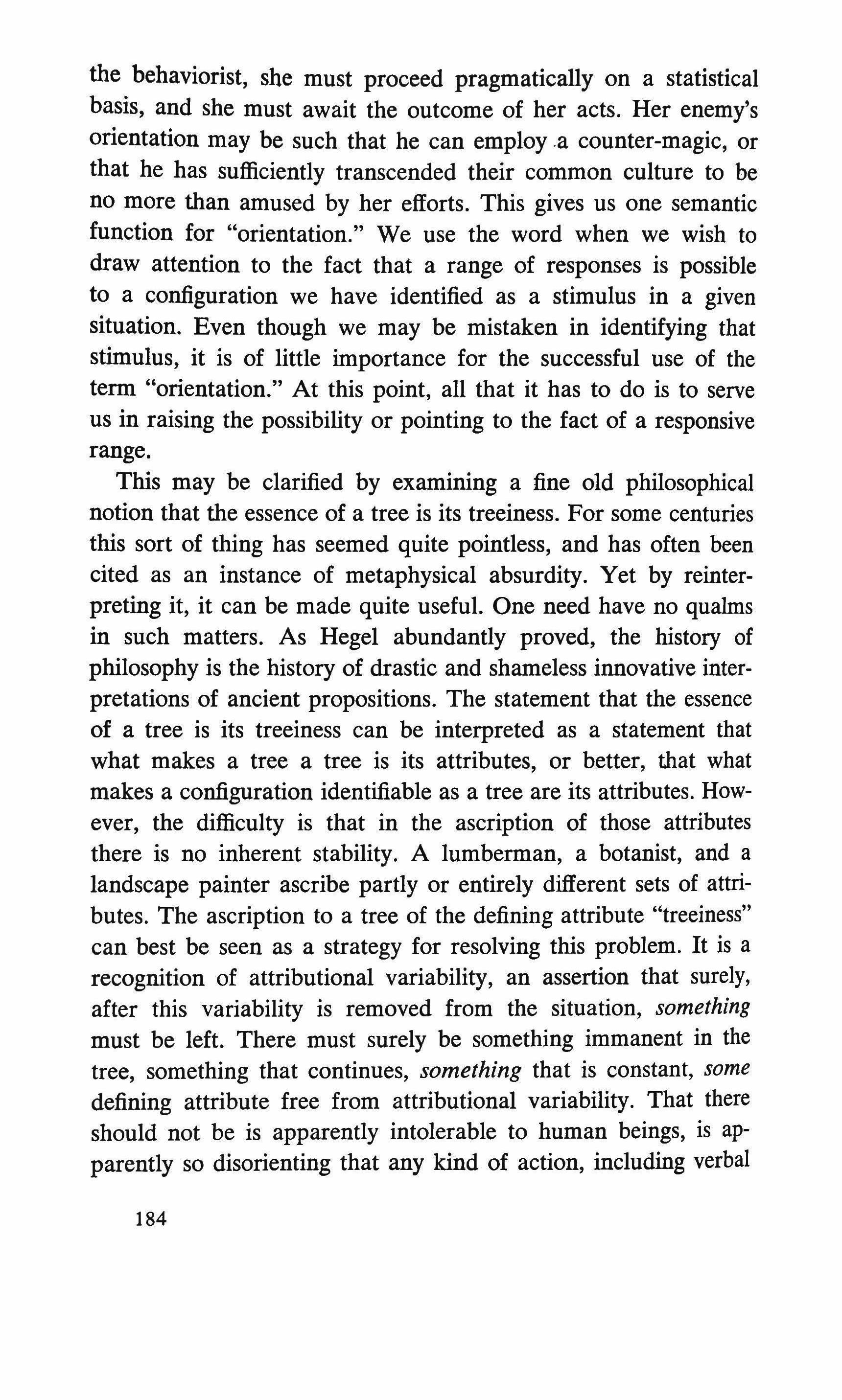
the behaviorist, she must proceed pragmatically on a statistical basis, and she must await the outcome of her acts. Her enemy's orientation may be such that he can employ .a counter-magic, or that he has sufficiently transcended their common culture to be no more than amused by her efforts. This gives us one semantic function for "orientation." We use the word when we wish to draw attention to the fact that a range of responses is possible to a configuration we have identified as a stimulus in a given situation. Even though we may be mistaken in identifying that stimulus, it is of little importance for the successful use of the term "orientation." At this point, all that it has to do is to serve us in raising the possibility or pointing to the fact of a responsive range.
This may be clarified by examining a fine old philosophical notion that the essence of a tree is its treeiness. For some centuries this sort of thing has seemed quite pointless, and has often been cited as an instance of metaphysical absurdity. Yet by reinterpreting it, it can be made quite useful. One need have no qualms in such matters. As Hegel abundantly proved, the history of philosophy is the history of drastic and shameless innovative interpretations of ancient propositions. The statement that the essence of a tree is its treeiness can be interpreted as a statement that what makes a tree a tree is its attributes, or better, that what makes a configuration identifiable as a tree are its attributes. However, the difficulty is that in the ascription of those attributes there is no inherent stability. A lumberman, a botanist, and a landscape painter ascribe partly or entirely different sets of attributes. The ascription to a tree of the defining attribute "treeiness" can best be seen as a strategy for resolving this problem. It is a recognition of attributional variability, an assertion that surely, after this variability is removed from the situation, something must be left. There must surely be something immanent in the tree, something that continues, something that is constant, some defining attribute free from attributional variability. That there should not be is apparently intolerable to human beings, is apparently so disorienting that any kind of action, including verbal
184
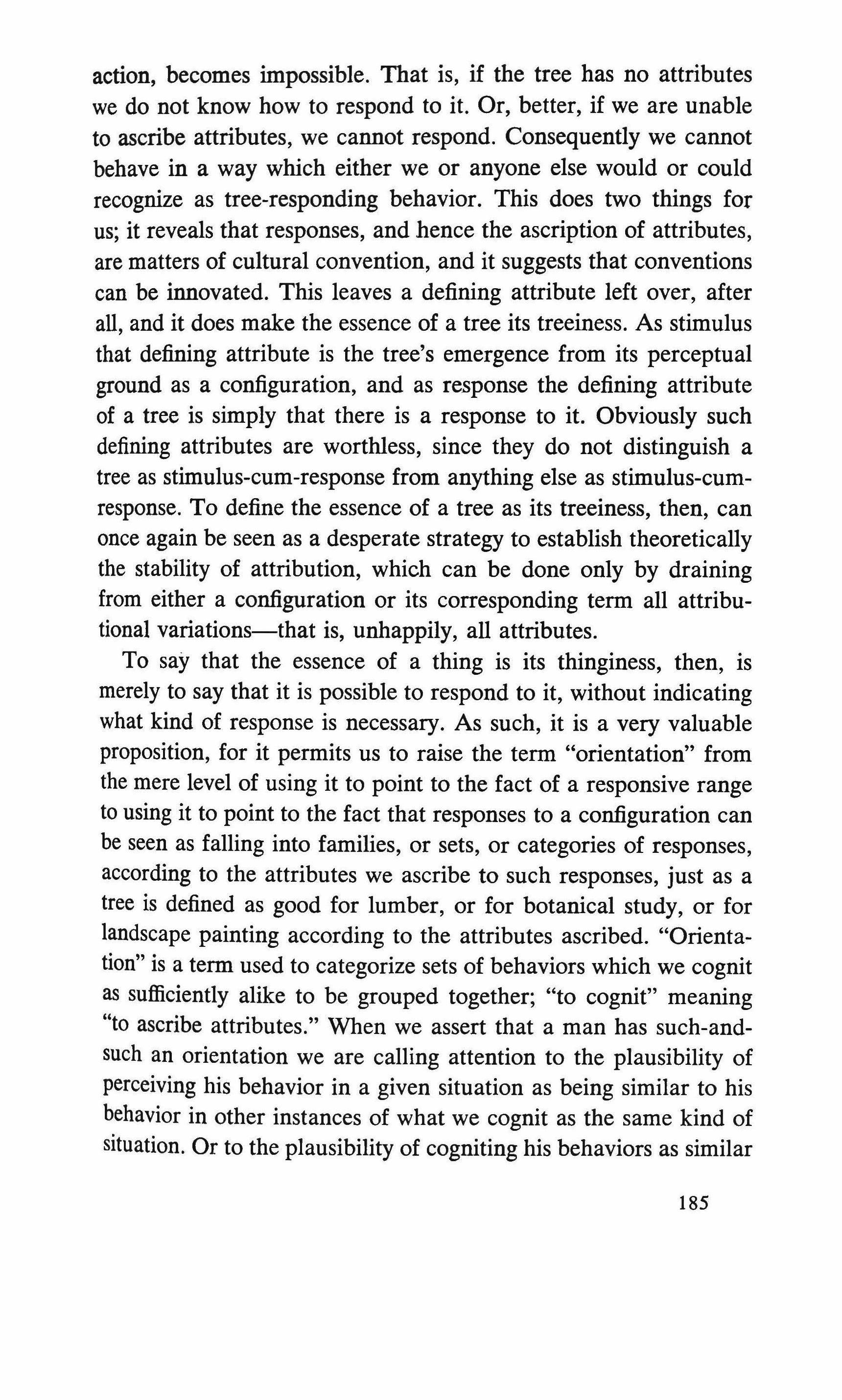
action, becomes impossible. That is, if the tree has no attributes we do not know how to respond to it. Or, better, if we are unable to ascribe attributes, we cannot respond. Consequently we cannot behave in a way which either we or anyone else would or could recognize as tree-responding behavior. This does two things for us; it reveals that responses, and hence the ascription of attributes, are matters of cultural convention, and it suggests that conventions can be innovated. This leaves a defining attribute left over, after all, and it does make the essence of a tree its treeiness. As stimulus that defining attribute is the tree's emergence from its perceptual ground as a configuration, and as response the defining attribute of a tree is simply that there is a response to it. Obviously such defining attributes are worthless, since they do not distinguish a tree as stimulus-cum-response from anything else as stimulus-cumresponse. To define the essence of a tree as its treeiness, then, can once again be seen as a desperate strategy to establish theoretically the stability of attribution, which can be done only by draining from either a configuration or its corresponding term all attributional variations-that is, unhappily, all attributes.
To say that the essence of a thing is its thinginess, then, is merely to say that it is possible to respond to it, without indicating what kind of response is necessary. As such, it is a very valuable proposition, for it permits us to raise the term "orientation" from the mere level of using it to point to the fact of a responsive range to using it to point to the fact that responses to a configuration can be seen as falling into families, or sets, or categories of responses, according to the attributes we ascribe to such responses, just as a tree is defined as good for lumber, or for botanical study, or for landscape painting according to the attributes ascribed. "Orientation" is a term used to categorize sets of behaviors which we cognit as sufficiently alike to be grouped together; "to cognit" meaning "to ascribe attributes." When we assert that a man has such-andsuch an orientation we are calling attention to the plausibility of perceiving his behavior in a given situation as being similar to his behavior in other instances of what we cognit as the same kind of situation. Or to the plausibility of cogniting his behaviors as similar
185
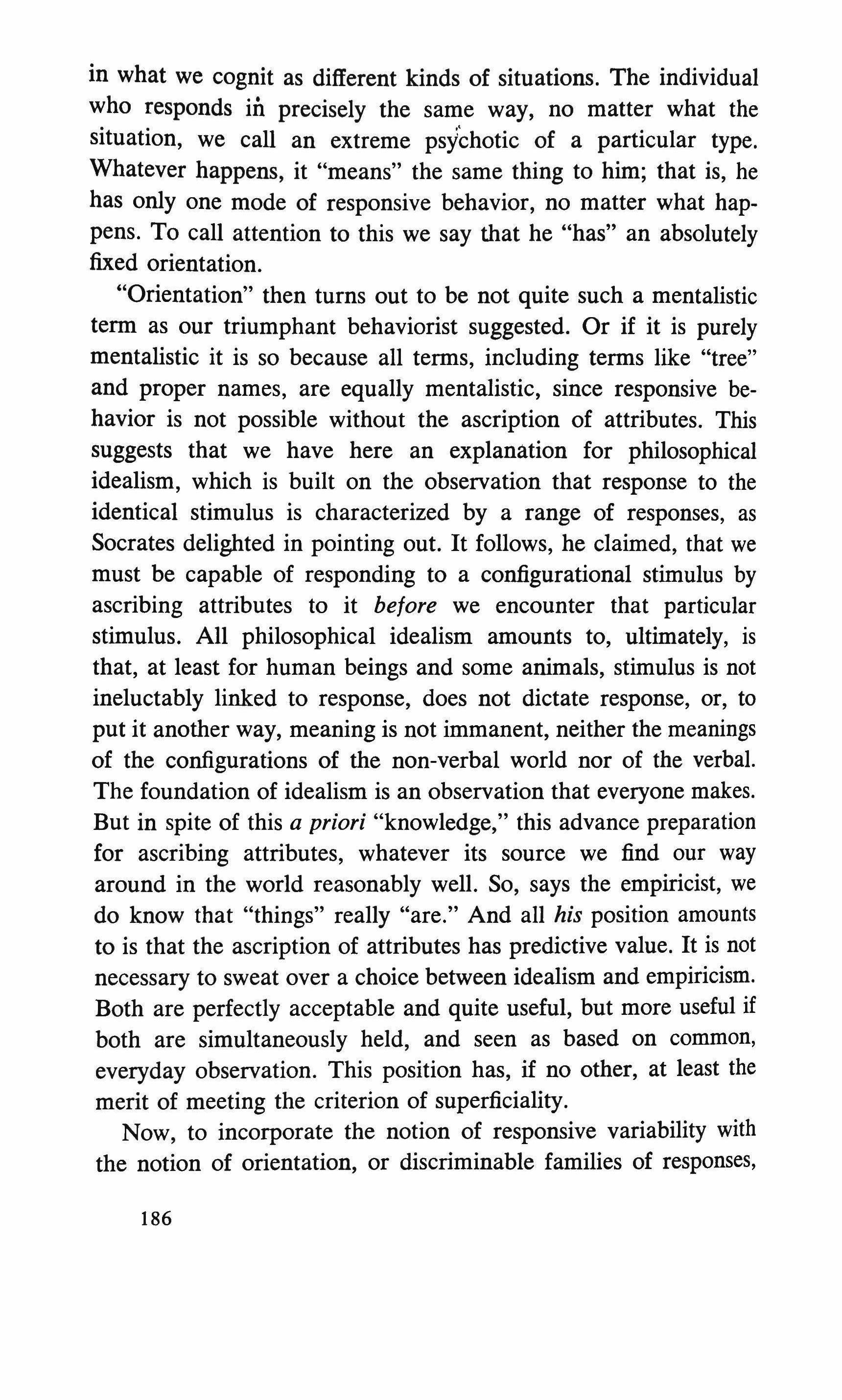
in what we cognit as different kinds of situations. The individual who responds in precisely the same way, no matter what the situation, we call an extreme psychotic of a particular type. Whatever happens, it "means" the same thing to him; that is, he has only one mode of responsive behavior, no matter what happens. To call attention to this we say that he "has" an absolutely fixed orientation.
"Orientation" then turns out to be not quite such a mentalistic term as our triumphant behaviorist suggested. Or if it is purely mentalistic it is so because all terms, including terms like "tree" and proper names, are equally mentalistic, since responsive behavior is not possible without the ascription of attributes. This suggests that we have here an explanation for philosophical idealism, which is built on the observation that response to the identical stimulus is characterized by a range of responses, as Socrates delighted in pointing out. It follows, he claimed, that we must be capable of responding to a configurational stimulus by ascribing attributes to it before we encounter that particular stimulus. All philosophical idealism amounts to, ultimately, is that, at least for human beings and some animals, stimulus is not ineluctably linked to response, does not dictate response, or, to put it another way, meaning is not immanent, neither the meanings of the configurations of the non-verbal world nor of the verbal. The foundation of idealism is an observation that everyone makes. But in spite of this a priori "knowledge," this advance preparation for ascribing attributes, whatever its source we find our way around in the world reasonably well. So, says the empiricist, we do know that "things" really "are." And all his position amounts to is that the ascription of attributes has predictive value. It is not necessary to sweat over a choice between idealism and empiricism. Both are perfectly acceptable and quite useful, but more useful if both are simultaneously held, and seen as based on common, everyday observation. This position has, if no other, at least the merit of meeting the criterion of superficiality.
Now, to incorporate the notion of responsive variability with the notion of orientation, or discriminable families of responses,
186
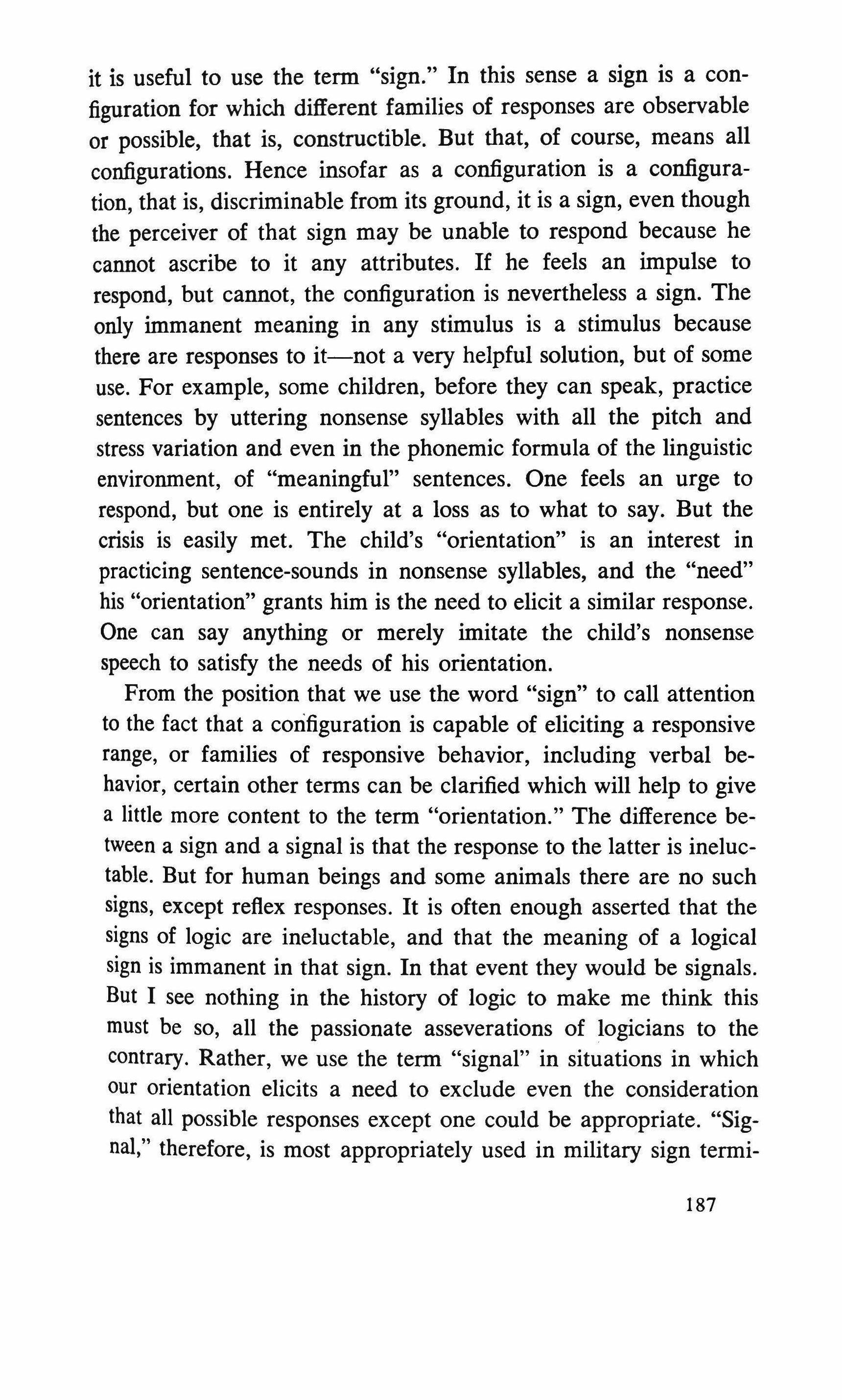
it is useful to use the term "sign." In this sense a sign is a configuration for which different families of responses are observable or possible, that is, constructible. But that, of course, means all configurations. Hence insofar as a configuration is a configuration, that is, discriminable from its ground, it is a sign, even though the perceiver of that sign may be unable to respond because he cannot ascribe to it any attributes. If he feels an impulse to respond, but cannot, the configuration is nevertheless a sign. The only immanent meaning in any stimulus is a stimulus because there are responses to it-not a very helpful solution, but of some use. For example, some children, before they can speak, practice sentences by uttering nonsense syllables with all the pitch and stress variation and even in the phonemic formula of the linguistic environment, of "meaningful" sentences. One feels an urge to respond, but one is entirely at a loss as to what to say. But the crisis is easily met. The child's "orientation" is an interest in practicing sentence-sounds in nonsense syllables, and the "need" his "orientation" grants him is the need to elicit a similar response. One can say anything or merely imitate the child's nonsense speech to satisfy the needs of his orientation. From the position that we use the word "sign" to call attention to the fact that a corifiguration is capable of eliciting a responsive range, or families of responsive behavior, including verbal behavior, certain other terms can be clarified which will help to give a little more content to the term "orientation." The difference between a sign and a signal is that the response to the latter is ineluctable. But for human beings and some animals there are no such signs, except reflex responses. It is often enough asserted that the signs of logic are ineluctable, and that the meaning of a logical sign is immanent in that sign. In that event they would be signals. But I see nothing in the history of logic to make me think this must be so, all the passionate asseverations of logicians to the contrary. Rather, we use the term "signal" in situations in which our orientation elicits a need to exclude even the consideration that all possible responses except one could be appropriate. "Signal," therefore, is most appropriately used in military sign termi-
187
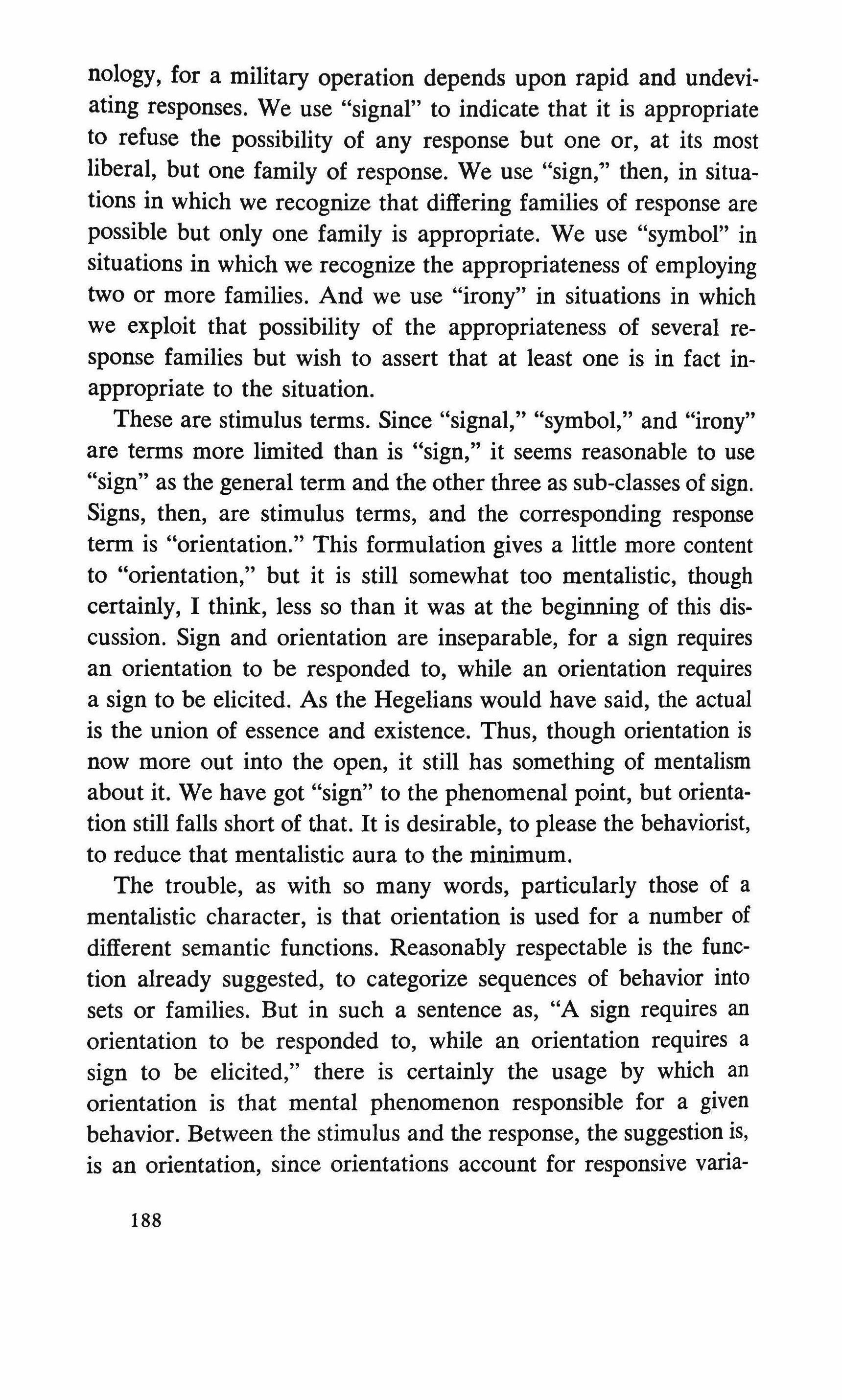
nology, for a military operation depends upon rapid and undeviating responses. We use "signal" to indicate that it is appropriate to refuse the possibility of any response but one or, at its most liberal, but one family of response. We use "sign," then, in situations in which we recognize that differing families of response are possible but only one family is appropriate. We use "symbol" in situations in which we recognize the appropriateness of employing two or more families. And we use "irony" in situations in which we exploit that possibility of the appropriateness of several response families but wish to assert that at least one is in fact inappropriate to the situation.
These are stimulus terms. Since "signal," "symbol," and "irony" are terms more limited than is "sign," it seems reasonable to use "sign" as the general term and the other three as sub-classes of sign. Signs, then, are stimulus terms, and the corresponding response term is "orientation." This formulation gives a little more content to "orientation," but it is still somewhat too mentalistic, though certainly, I think, less so than it was at the beginning of this discussion. Sign and orientation are inseparable, for a sign requires an orientation to be responded to, while an orientation requires a sign to be elicited. As the Hegelians would have said, the actual is the union of essence and existence. Thus, though orientation is now more out into the open, it still has something of mentalism about it. We have got "sign" to the phenomenal point, but orientation still falls short of that. It is desirable, to please the behaviorist, to reduce that mentalistic aura to the minimum.
The trouble, as with so many words, particularly those of a mentalistic character, is that orientation is used for a number of different semantic functions. Reasonably respectable is the function already suggested, to categorize sequences of behavior into sets or families. But in such a sentence as, "A sign requires an orientation to be responded to, while an orientation requires a sign to be elicited," there is certainly the usage by which an orientation is that mental phenomenon responsible for a given behavior. Between the stimulus and the response, the suggestion is, is an orientation, since orientations account for responsive varia-
188
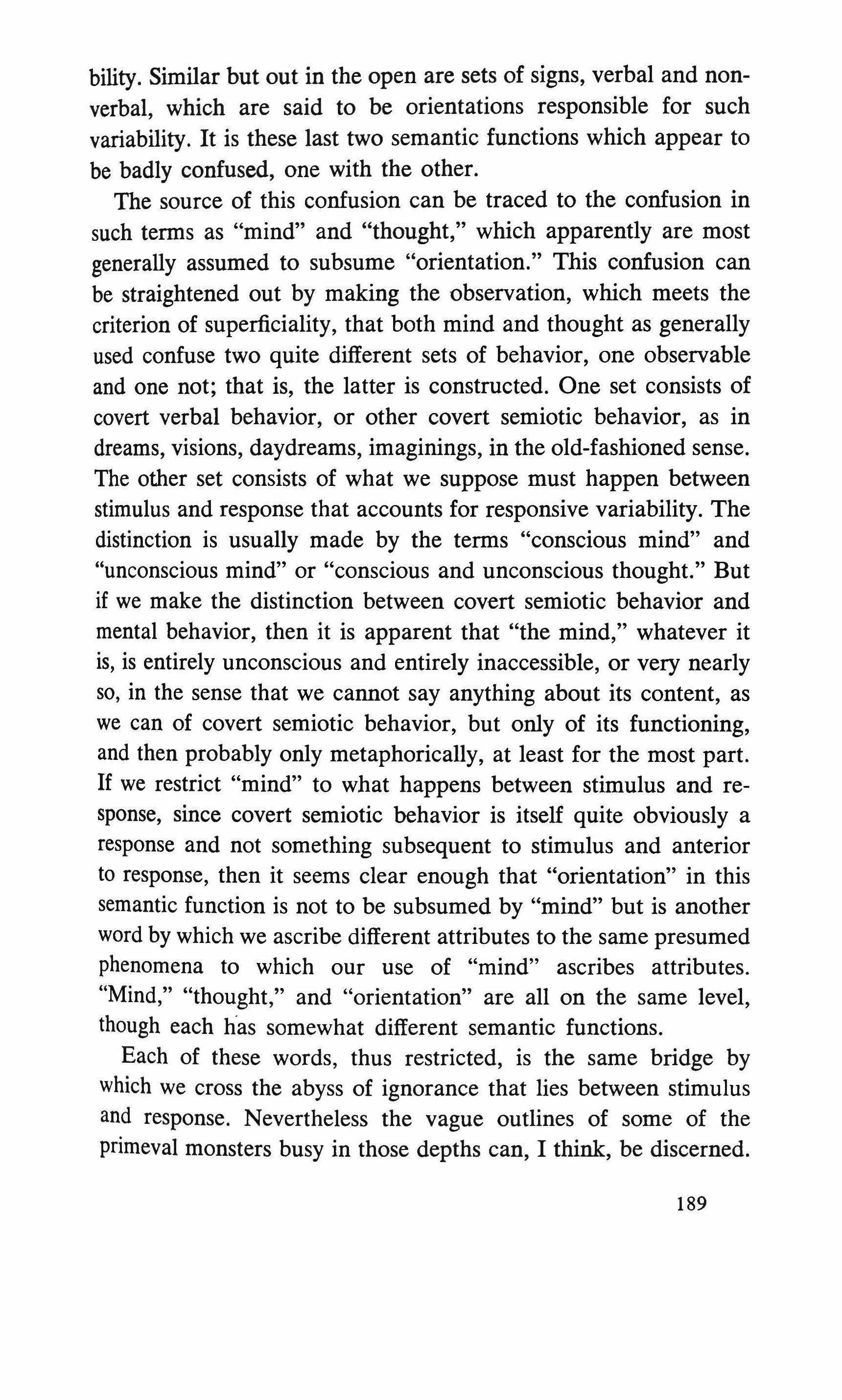
bility. Similar but out in the open are sets of signs, verbal and nonverbal, which are said to be orientations responsible for such variability. It is these last two semantic functions which appear to be badly confused, one with the other.
The source of this confusion can be traced to the confusion in such terms as "mind" and "thought," which apparently are most generally assumed to subsume "orientation." This confusion can be straightened out by making the observation, which meets the criterion of superficiality, that both mind and thought as generally used confuse two quite different sets of behavior, one observable and one not; that is, the latter is constructed. One set consists of covert verbal behavior, or other covert semiotic behavior, as in dreams, visions, daydreams, imaginings, in the old-fashioned sense. The other set consists of what we suppose must happen between stimulus and response that accounts for responsive variability. The distinction is usually made by the terms "conscious mind" and "unconscious mind" or "conscious and unconscious thought." But if we make the distinction between covert semiotic behavior and mental behavior, then it is apparent that "the mind," whatever it is, is entirely unconscious and entirely inaccessible, or very nearly so, in the sense that we cannot say anything about its content, as we can of covert semiotic behavior, but only of its functioning, and then probably only metaphorically, at least for the most part. If we restrict "mind" to what happens between stimulus and response, since covert semiotic behavior is itself quite obviously a response and not something subsequent to stimulus and anterior to response, then it seems clear enough that "orientation" in this semantic function is not to be subsumed by "mind" but is another word by which we ascribe different attributes to the same presumed phenomena to which our use of "mind" ascribes attributes. "Mind," "thought," and "orientation" are all on the same level, though each has somewhat different semantic functions. Each of these words, thus restricted, is the same bridge by which we cross the abyss of ignorance that lies between stimulus and response. Nevertheless the vague outlines of some of the primeval monsters busy in those depths can, I think, be discerned. 189

(Could they be called, by a wilder metaphor, instinctual computers?) For one thing, the way they busy themselves running the machinery of perception can be talked about a little, however crudely and superficially. Briefly, experimental psychology shows us that perception in establishing a configuration as a configuration selects, simplifies, reduces, and organizes. Cognition, made possible by perception, ascribes attributes to configurations, 'though this notion is dimmer than one would like. At any rate we know that we can alter behavior by ascribing different attributes to configurations and sets of configurations. This is done by controlling behavior through further sets of signs. We can, so to speak, introduce into an individual an a priori novel to 'him, and so alter his behavior. Like a stage manager, we can alter the scene by changing the lighting. Such manipulation is commonly called, and quite properly, I think, reorientation. Thus our mysterious primeval manipulators from within so arrange matters that the perceptual-cognitive process is categorial. Every sign is a sign of a category of configurations, not of an individual configuration. And that is why we can't say what an orientation, or a stimulus, or a response really is, or locate one in the phenomenal world. We can only locate members of a priori categories. Once again, the actual is the union of the essence and the existence. (It must not be forgotten that just as we can alter the behavior of others by ascribing different attributes to a category of configurations, so we can alter our own behavior by picking up perceptually attributes which the category, to speak mythically, had not led us to anticipate. But the process in both cases is identical.) Next, two configurations are cognited as either sharing or not sharing whatever attributes we are currently looking for, that is, interested in ascribing. The analogy between structured and cognited configurations is the only way, it would appear, that mental activity can proceed beyond perception and cognition. Finally, all it can do with that extension of its functions is to predict.
Scandalous, but happily superficial, as this position may be, it is all, I suspect, that at the moment can be said about mental activity in the sense of what happens between stimulus and response. Since it has been said in one way or another for some
190
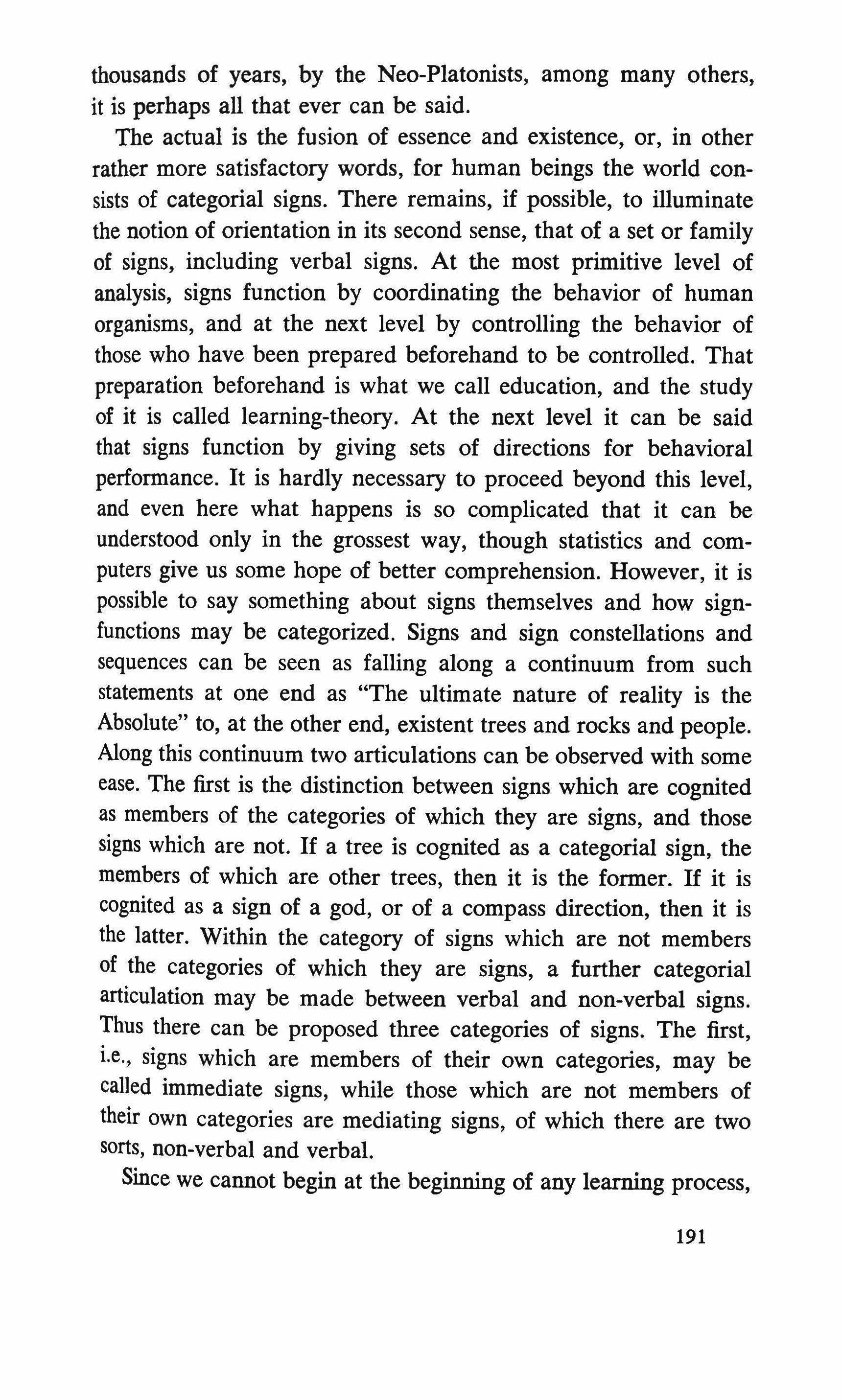
thousands of years, by the Neo-Platonists, among many others, it is perhaps all that ever can be said.
The actual is the fusion of essence and existence, or, in other rather more satisfactory words, for human beings the world consists of categorial signs. There remains, if possible, to illuminate the notion of orientation in its second sense, that of a set or family of signs, including verbal signs. At the most primitive level of analysis, signs function by coordinating the behavior of human organisms, and at the next level by controlling the behavior of those who have been prepared beforehand to be controlled. That preparation beforehand is what we call education, and the study of it is called learning-theory. At the next level it can be said that signs function by giving sets of directions for behavioral performance. It is hardly necessary to proceed beyond this level, and even here what happens is so complicated that it can be understood only in the grossest way, though statistics and computers give us some hope of better comprehension. However, it is possible to say something about signs themselves and how signfunctions may be categorized. Signs and sign constellations and sequences can be seen as falling along a continuum from such statements at one end as "The ultimate nature of reality is the Absolute" to, at the other end, existent trees and rocks and people. Along this continuum two articulations can be observed with some ease. The first is the distinction between signs which are cognited as members of the categories of which they are signs, and those signs which are not. If a tree is cognited as a categorial sign, the members of which are other trees, then it is the former. If it is cognited as a sign of a god, or of a compass direction, then it is the latter. Within the category of signs which are not members of the categories of which they are signs, a further categorial articulation may be made between verbal and non-verbal signs. Thus there can be proposed three categories of signs. The first, i.e., signs which are members of their own categories, may be called immediate signs, while those which are not members of their own categories are mediating signs, of which there are two sorts, non-verbal and verbal.
Since we cannot begin at the beginning of any learning process, 191

once we have passed the point in infantile development at which categorization (or cognition) begins, whatever that point may be, orientative behavior is best understood as re-orientative behavior. The study of orientation is necessarily the study of re-orientation. The historical continuum of orientative behavior, whether for an individual or for a culture, must always begin at a point on an historically constructed continuum. That is the problem Hegel was wrestling with, who may be called the first great student of verbal re-orientative behavior. I suspect that he has never been equaled and that in his work there is still much of great value which has never been used. Be that as it may, it is also reasonably evident that re-orientative behavior can take place along the ahistorically conceived continuum of sign-behavior at any point, from cognitions of the physical world to statements about the ultimate nature of reality, or even such entrancing statements as, "The nothing nothings the nothing," which can be made to yield fascinating propositions if treated with sufficiently drastic shamelessness. Such statements as those offered, or the statements of theoretical physics, can be rightly called explanatory statements. That is, only in verbal behavior, only in language, is it possible to generate explanations. The continuum of signs from the remotely mediating to the immediate manifests itself within the category of verbal mediating signs as a continuum from the explanatory to the exemplary, from explanation to exemplification. That is, verbal explanations do not explain the world; they only explain, by subsumption, exemplary sentences. Language cannot itself break out of the magic circle within which it functions, but it can prepare individuals beforehand for re-orientative behavior in response to mediating non-verbal signs and immediate signs. Thus language can be seen as having its sole function in human behavior as re-orientative activity. This can happen in myth, which is verbal behavior at the exemplary end of the continuum which functions as explanation without explanatory sentences. This is why the mythology of any culture is in a constant state of flux. And it is why metaphysics, or ultimate explanation, which is verbal re-orientative behavior at the explanatory end of the continuum, is likewise in a constant state of flux.
192

Mental re-orientation, as defined above, is the process, the means, the form, if you will, of re-orientative behavior, and signs are the consequence, the deposit, the content, perhaps, of such behavior. Metaphysical explanation is man's most powerful tool for stimulating the mental processing of signs, for preparing the organism beforehand, for implanting, to be old-fashioned, the novel a priori. Language does not constitute the world, nor describe it, nor predict it, nor does it have a direct instrumental relation to it. Rather it subjects man to a continuous, unremittant, re-orientative massage. It is what enables him to survive, for his orientative activity is always inadequate to the demands of the existent. The actual is only the union of essence and existence; when the figure emerges from the ground, then error and illusion begin. Man's most magnificent, and most amusing, adaptation to this ineluctable state of affairs is his development of the power to generate explanations. As Swinburne put it, "Silence is most noble till the end.'" And Wittgenstein agreed.
Thus I would propose giving "orientation" a little more content than it currently seems to have. But after all, it is only an explanation, and the best explanation in the world is still only an explanation. This one, I hope, has at least the virtue of superficiality.
193
Maxwell's demon, entropy, information: The crying oflot 49
ANNE MANGEL
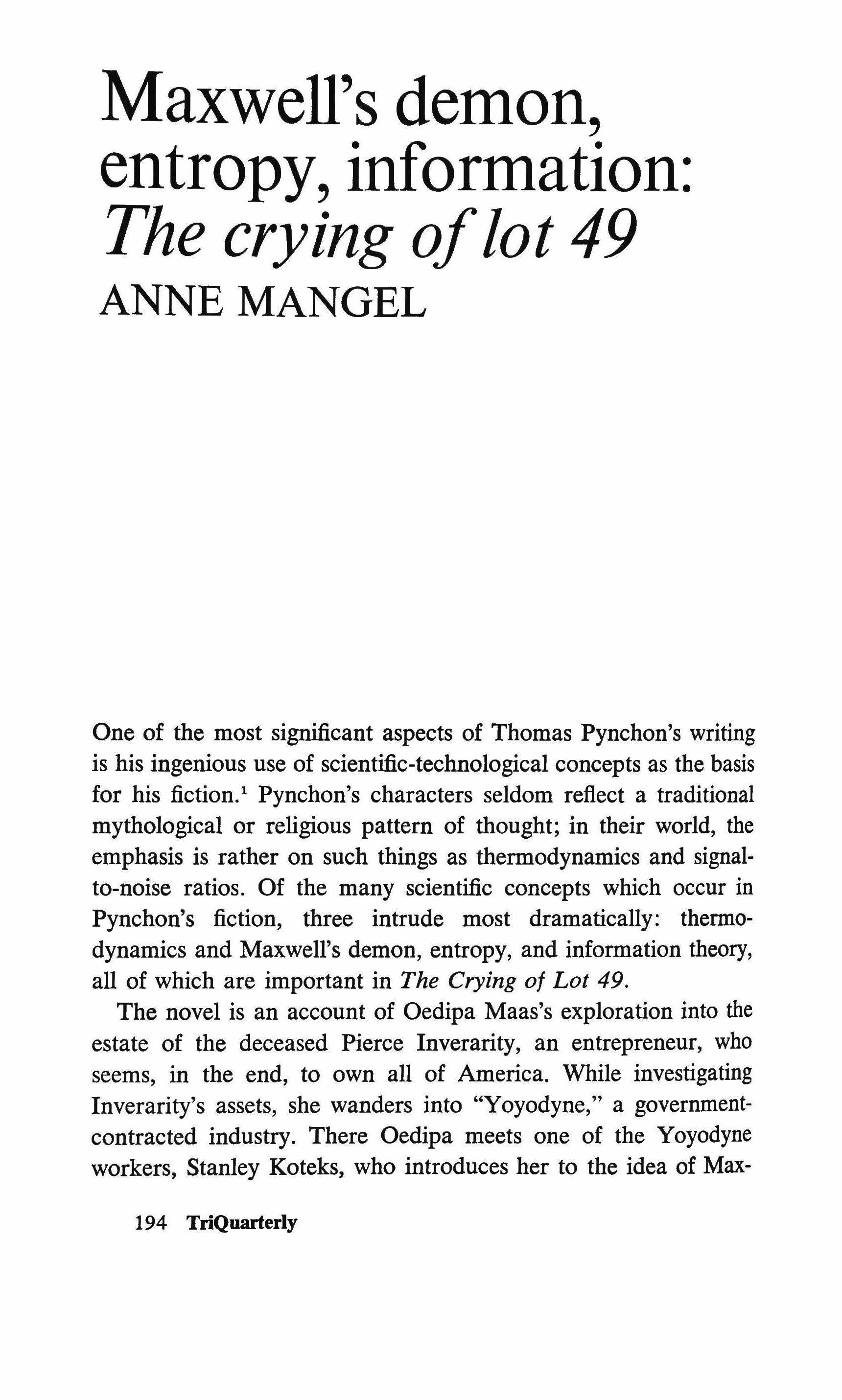
One of the most significant aspects of Thomas Pynchon's writing is his ingenious use of scientific-technological concepts as the basis for his fiction.' Pynchon's characters seldom reflect a traditional mythological or religious pattern of thought; in their world, the emphasis is rather on such things as thermodynamics and signalto-noise ratios. Of the many scientific concepts which occur in Pynchon's fiction, three intrude most dramatically: thermodynamics and Maxwell's demon, entropy, and information theory, all of which are important in The Crying of Lot 49.
The novel is an account of Oedipa Maas's exploration into the estate of the deceased Pierce Inverarity, an entrepreneur, who seems, in the end, to own all of America. While investigating Inverarity's assets, she wanders into "Yoyodyne," a governmentcontracted industry. There Oedipa meets one of the Yoyodyne workers, Stanley Koteks, who introduces her to the idea of Max-
194 TriQuarterly

well's Demon with a breezy but essentially correct explanation of the concept
James Clerk Maxwell, a 19th century physicist, introduced the Demon in 1871 in his book Theory of Heat. Pointing out that the second law of thermodynamics shows the impossibility of producing "any inequality of temperature or of pressure without the expenditure of work," Maxwell goes on:
Now let us suppose that such a vessel is divided into two portions, A and B, by a division in which there is a small hole, and that a being, who can see the individual molecules, opens and closes this hole, so as to allow only the swifter molecules to pass from A to B, and only the slower ones to pass from B to A. He will thus, without expenditure of work, raise the temperature of B and lower that of A, in contradiction to the second law of thermcdynamlcs,s
As the Demon sorts the molecules, he increases the order in the vessel, and decreases the entropy, or amount of disorder in the system (see diagram at top of next page).
195

Cop�'-rlgtit © 196fby Scientific American
Sorting demon operates by opening and closing a small hole in a division between two portions of a vessel full of air at a uniform temperature (top). The demon can see the individual molecules, which move at many different veloeities. By opening and closing the hole so as to allow only the swifter molecules to pass from A to B and only the slower ones to pass from B to A, the demon could, without expenditure of work, raise the temperature of B and lower that of A (bottom), in contradiction to the second law of thermodynamlcs,"
In The Crying of Lot 49, Pynchon uses Maxwell's notion of the Demon as a metaphor for Oedipa's experiences. The frequent allusions to Oedipa's sorting masses of information evoke the idea of Maxwell's sorting Demon. As the novel opens, Inverarity's estate
< • • / • v • \ \
• I :> �-"'-/ •• A \ / 1 196 B
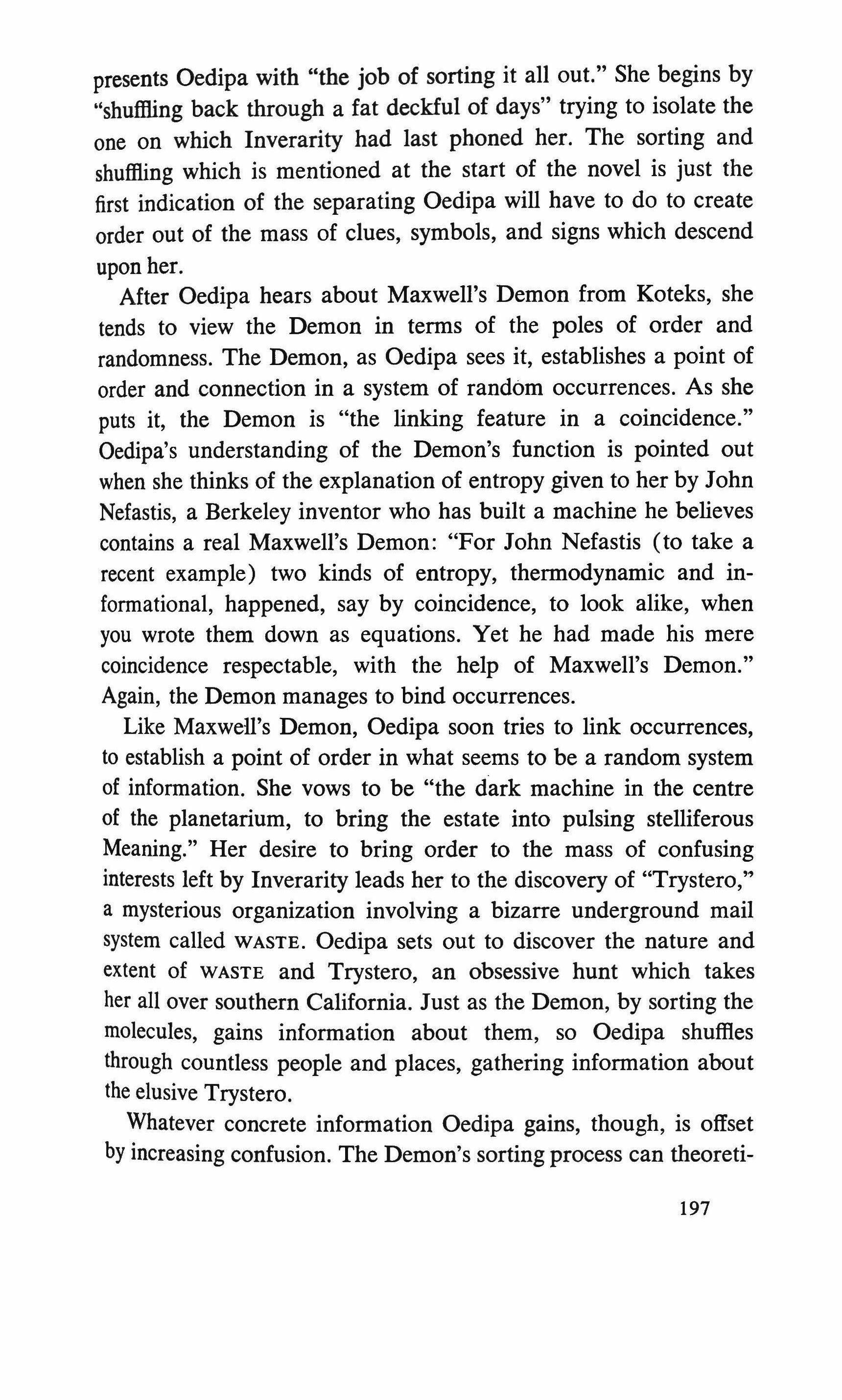
presents Oedipa with "the job of sorting it all out." She begins by "shufHing back through a fat deckful of days" trying to isolate the one on which Inverarity had last phoned her. The sorting and shufHing which is mentioned at the start of the novel is just the first indication of the separating Oedipa will have to do to create order out of the mass of clues, symbols, and signs which descend upon her.
After Oedipa hears about Maxwell's Demon from Koteks, she tends to view the Demon in terms of the poles of order and randomness. The Demon, as Oedipa sees it, establishes a point of order and connection in a system of random occurrences. As she puts it, the Demon is "the linking feature in a coincidence." Oedipa's understanding of the Demon's function is pointed out when she thinks of the explanation of entropy given to her by John Nefastis, a Berkeley inventor who has built a machine he believes contains a real Maxwell's Demon: "For John Nefastis (to take a recent example) two kinds of entropy, thermodynamic and informational, happened, say by coincidence, to look alike, when you wrote them down as equations. Yet he had made his mere coincidence respectable, with the help of Maxwell's Demon." Again, the Demon manages to bind occurrences.
Like Maxwell's Demon, Oedipa soon tries to link occurrences, to establish a point of order in what seems to be a random system of information. She vows to be "the dark machine in the centre of the planetarium, to bring the estate into pulsing stelliferous Meaning." Her desire to bring order to the mass of confusing interests left by Inverarity leads her to the discovery of "Trystero," a mysterious organization involving a bizarre underground mail system called WASTE. Oedipa sets out to discover the nature and extent of WASTE and Trystero, an obsessive hunt which takes her all over southern California. Just as the Demon, by sorting the molecules, gains information about them, so Oedipa shuffles through countless people and places, gathering information about the elusive Trystero.
Whatever concrete information Oedipa gains, though, is offset by increasing confusion. The Demon's sorting process can theoreti-
197
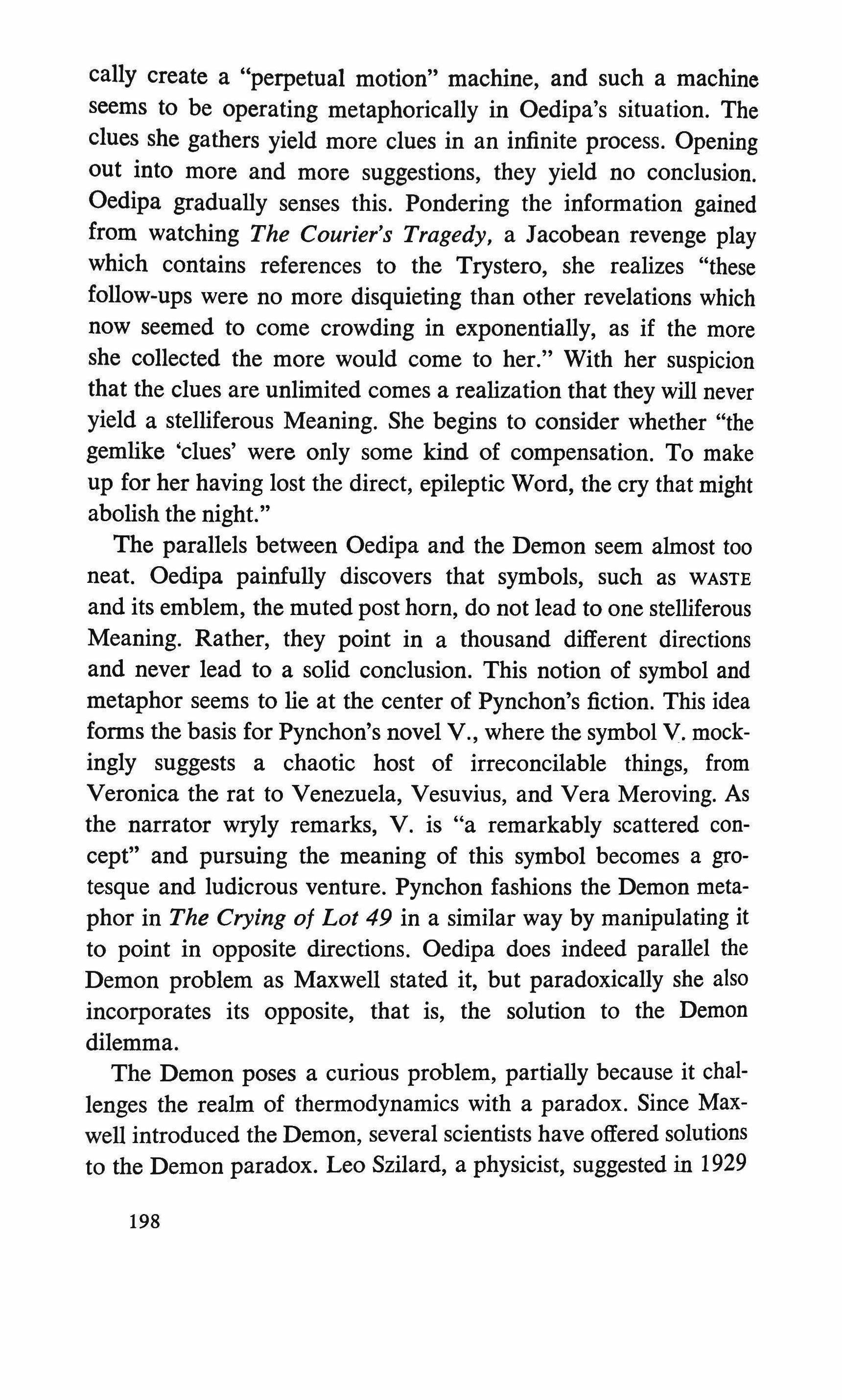
cally create a "perpetual motion" machine, and such a machine seems to be operating metaphorically in Oedipa's situation. The clues she gathers yield more clues in an infinite process. Opening out into more and more suggestions, they yield no conclusion. Oedipa gradually senses this. Pondering the information gained from watching The Courier's Tragedy, a Jacobean revenge play which contains references to the Trystero, she realizes "these follow-ups were no more disquieting than other revelations which now seemed to come crowding in exponentially, as if the more she collected the more would come to her." With her suspicion that the clues are unlimited comes a realization that they will never yield a stelliferous Meaning. She begins to consider whether "the gemlike 'clues' were only some kind of compensation. To make up for her having lost the direct, epileptic Word, the cry that might abolish the night."
The parallels between Oedipa and the Demon seem almost too neat. Oedipa painfully discovers that symbols, such as WASTE and its emblem, the muted post horn, do not lead to one stelliferous Meaning. Rather, they point in a thousand different directions and never lead to a solid conclusion. This notion of symbol and metaphor seems to lie at the center of Pynchon's fiction. This idea forms the basis for Pynchon's novel V., where the symbol V. mockingly suggests a chaotic host of irreconcilable things, from Veronica the rat to Venezuela, Vesuvius, and Vera Meroving. As the narrator wryly remarks, V. is "a remarkably scattered concept" and pursuing the meaning of this symbol becomes a grotesque and ludicrous venture. Pynchon fashions the Demon metaphor in The Crying of Lot 49 in a similar way by manipulating it to point in opposite directions. Oedipa does indeed parallel the Demon problem as Maxwell stated it, but paradoxically she also incorporates its opposite, that is, the solution to the Demon dilemma.
The Demon poses a curious problem, partially because it challenges the realm of thermodynamics with a paradox. Since Maxwell introduced the Demon, several scientists have offered solutions to the Demon paradox. Leo Szilard, a physicist, suggested in 1929
198
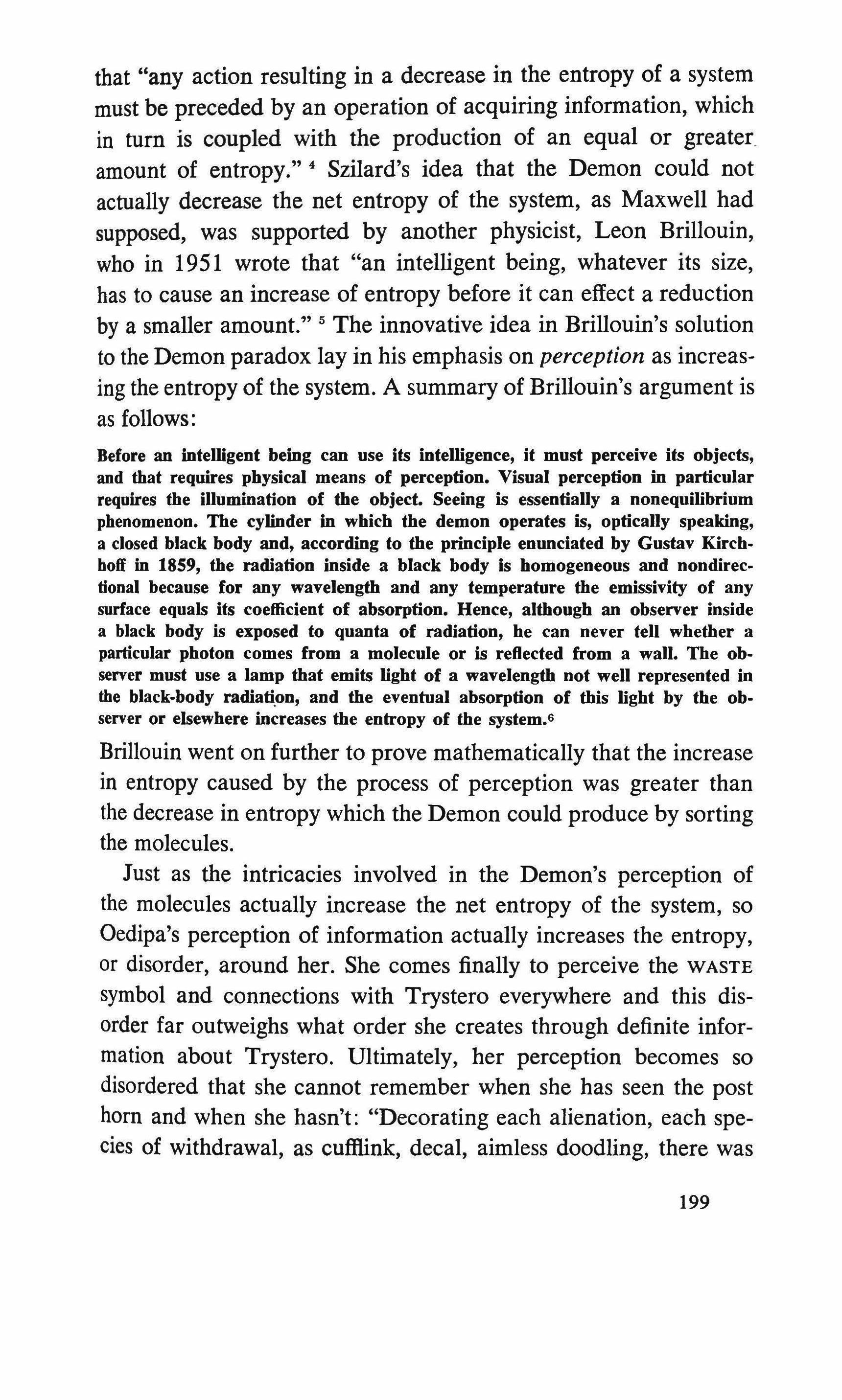
that "any action resulting in a decrease in the entropy of a system must be preceded by an operation of acquiring information, which in turn is coupled with the production of an equal or greater amount of entropy."
4 Szilard's idea that the Demon could not actually decrease the net entropy of the system, as Maxwell had supposed, was supported by another physicist, Leon Brillouin, who in 1951 wrote that "an intelligent being, whatever its size, has to cause an increase of entropy before it can effect a reduction by a smaller amount." 5 The innovative idea in Brillouin's solution to the Demon paradox lay in his emphasis on perception as increasing the entropy of the system. A summary of Brillouin's argument is as follows:
Before an intelligent being can use its intelligence, it must perceive its objects, and that requires physical means of perception. Visual perception in particular requires the illumination of the object. Seeing is essentially a nonequilibrium phenomenon. The cylinder in which the demon operates is, optically speaking, a closed black body and, according to the principle enunciated by Gustav Kirchhoff in 1859, the radiation inside a black body is homogeneous and nondirectional because for any wavelength and any temperature the emissivity of any surface equals its coefficient of absorption. Hence, although an observer inside a black body is exposed to quanta of radiation, he can never tell whether a particular photon comes from a molecule or is reflected from a wall. The observer must use a lamp that emits light of a wavelength not well represented in the black-body radiati,on, and the eventual absorption of this light by the observer or elsewhere increases the entropy of the system,s
Brillouin went on further to prove mathematically that the increase in entropy caused by the process of perception was greater than the decrease in entropy which the Demon could produce by sorting the molecules.
Just as the intricacies involved in the Demon's perception of the molecules actually increase the net entropy of the system, so Oedipa's perception of information actually increases the entropy, or disorder, around her. She comes finally to perceive the WASTE symbol and connections with Trystero everywhere and this disorder far outweighs what order she creates through definite information about Trystero. Ultimately, her perception becomes so disordered that she cannot remember when she has seen the post horn and when she hasn't: "Decorating each alienation, each species of withdrawal, as cufflink, decal, aimless doodling, there was
199
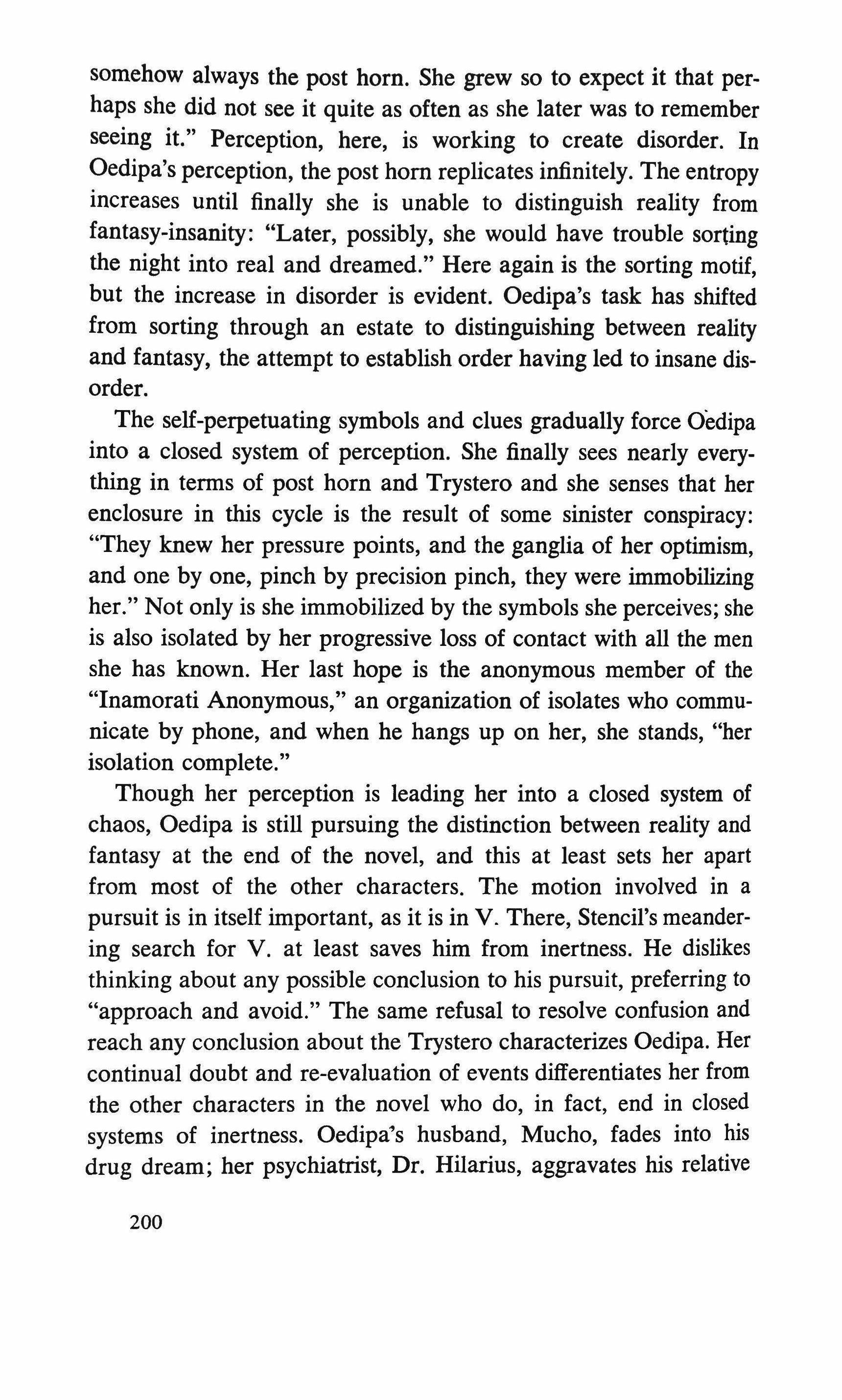
somehow always the post horn. She grew so to expect it that perhaps she did not see it quite as often as she later was to remember seeing it." Perception, here, is working to create disorder. In Oedipa's perception, the post horn replicates infinitely. The entropy increases until finally she is unable to distinguish reality from fantasy-insanity: "Later, possibly, she would have trouble sorting the night into real and dreamed." Here again is the sorting motif, but the increase in disorder is evident. Oedipa's task has shifted from sorting through an estate to distinguishing between reality and fantasy, the attempt to establish order having led to insane disorder.
The self-perpetuating symbols and clues gradually force Oedipa into a closed system of perception. She finally sees nearly everything in terms of post horn and Trystero and she senses that her enclosure in this cycle is the result of some sinister conspiracy: "They knew her pressure points, and the ganglia of her optimism, and one by one, pinch by precision pinch, they were immobilizing her." Not only is she immobilized by the symbols she perceives; she is also isolated by her progressive loss of contact with all the men she has known. Her last hope is the anonymous member of the "Inamorati Anonymous," an organization of isolates who communicate by phone, and when he hangs up on her, she stands, "her isolation complete."
Though her perception is leading her into a closed system of chaos, Oedipa is still pursuing the distinction between reality and fantasy at the end of the novel, and this at least sets her apart from most of the other characters. The motion involved in a pursuit is in itself important, as it is in V. There, Stencil's meandering search for V. at least saves him from inertness. He dislikes thinking about any possible conclusion to his pursuit, preferring to "approach and avoid." The same refusal to resolve confusion and reach any conclusion about the Trystero characterizes Oedipa. Her continual doubt and re-evaluation of events differentiates her from the other characters in the novel who do, in fact, end in closed systems of inertness. Oedipa's husband, Mucho, fades into his drug dream; her psychiatrist, Dr. Hilarius, aggravates his relative 200

paranoia into complete paranoia; Driblette, the director of The Courier's Tragedy, commits suicide; and the unnamed figure at The Greek Way bar cushions himself in the soothing "Inamorati Anonymous.
The separate closed systems which engulf the characters in the novel suggest a vision of society which is both isolated and headed for disorder and chaos. Pynchon is deliberately applying this scientific metaphor to conditions in society. The relationship is made explicit in Pynchon's short story Entropy. Callisto, the principal character in this tale, has become an isolated fanatic due to his drastic encounters with the scientific ideas of Gibbs and Boltzmann. Convinced that the universe may fall into heat-death at any moment, Callisto seals himself and his girlfriend, Aubade, into a room. They do not go out. In his hothouse retreat, Callisto obsessively checks the temperature and mercury throughout the day to reassure himself that the world has not yet collapsed into heatdeath. As Aubade takes notes, Callisto dictates the evolution of his eccentric beliefs. He explains how he found "in entropy or the measure of disorganization for a closed system an adequate metaphor to apply to certain phenomena in his own world." He goes on to clarify the metaphor:
He saw, for example, the younger generation responding to Madison Avenue with the same spleen his own had once reserved for WaD Street: and in American "consumerism" discovered a similar tendency from the least to the most probable, from differentiation to sameness, from ordered individuality to a kind of chaos. He found himself, in short, restating Gibbs' prediction in social terms, and envisioned a heat-death for his culture in which ideas, like heat-energy, would no longer be transferred, since each point in it would ultimately have the same quantity of energy; and intellectual motion would, accordingly, cease.
Entropy is set in Washington in the '50's and the metaphors in this description come from the '50's-Wall Street, Madison Avenue, consumerism. Consumerism is still at the heart of Inverarity's massive enterprises in The Crying of Lot 49, yet other systems of isolation have flourished in the '60's in political undergrounds and freaky California cults. Though the metaphors and closets of isolation have slightly shifted, the point remains the same. Society at the end of The Crying of Lot 49 is, like the world in Entropy, 201
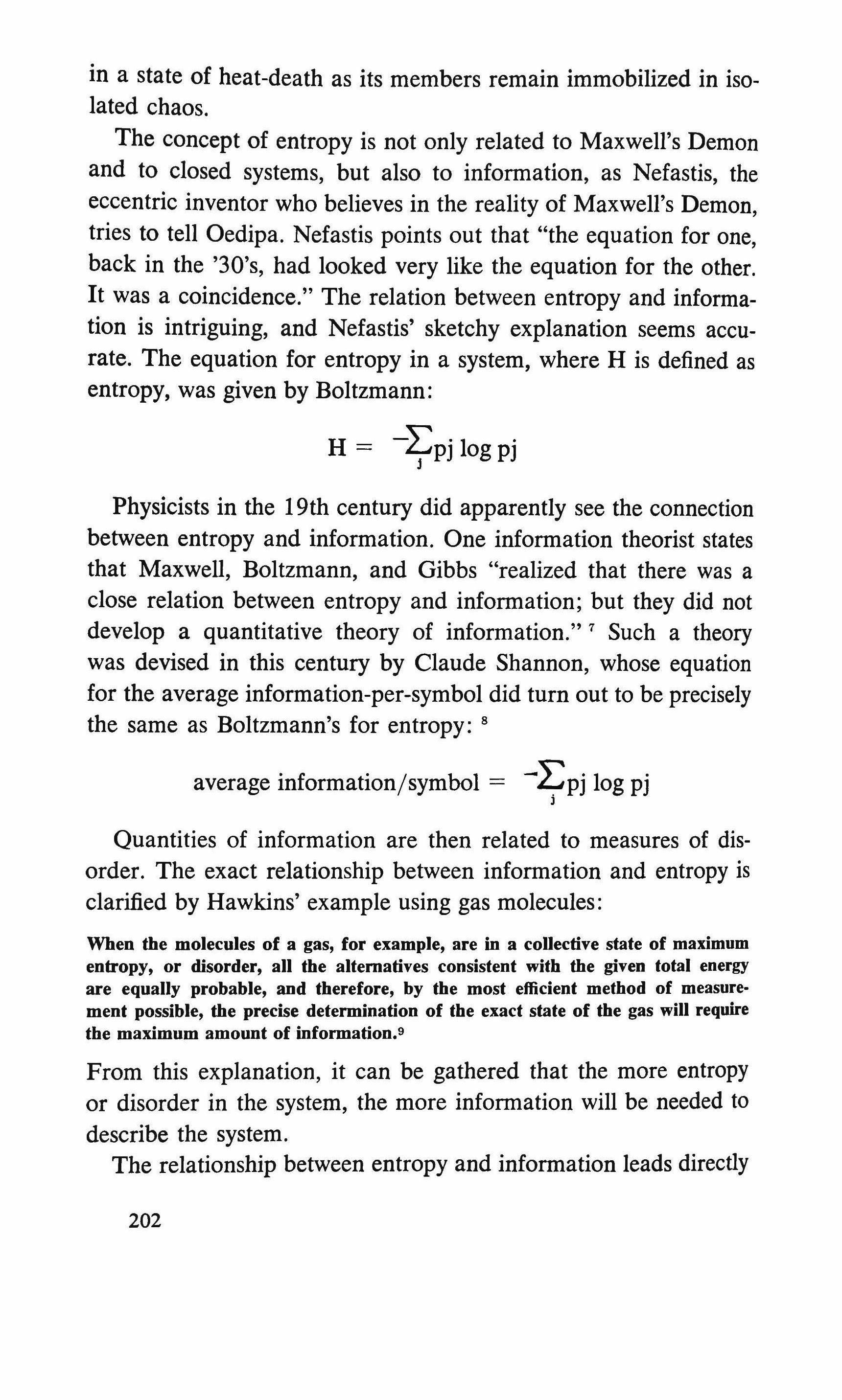
in a state of heat-death as its members remain immobilized in isolated chaos.
The concept of entropy is not only related to Maxwell's Demon and to closed systems, but also to information, as Nefastis, the eccentric inventor who believes in the reality of Maxwell's Demon, tries to tell Oedipa. Nefastis points out that "the equation for one, back in the '30's, had looked very like the equation for the other. It was a coincidence." The relation between entropy and information is intriguing, and Nefastis' sketchy explanation seems accurate. The equation for entropy in a system, where H is defined as entropy, was given by Boltzmann: H
-Lpj log pj j
Physicists in the 19th century did apparently see the connection between entropy and information. One information theorist states that Maxwell, Boltzmann, and Gibbs "realized that there was a close relation between entropy and information; but they did not develop a quantitative theory of information." 7 Such a theory was devised in this century by Claude Shannon, whose equation for the average information-per-symbol did turn out to be precisely the same as Boltzmann's for entropy: 8
average information/symbol -1;:pj log pj J
Quantities of information are then related to measures of disorder. The exact relationship between information and entropy is clarified by Hawkins' example using gas molecules:
When the molecules of a gas, for example, are in a collective state of maximum entropy, or disorder, all the alternatives consistent with the given total energy are equally probable, and therefore, by the most efficient method of measurement possible, the precise determination of the exact state of the gas will require the maximum amount of information.s
From this explanation, it can be gathered that the more entropy or disorder in the system, the more information will be needed to describe the system.
The relationship between entropy and information leads directly
202
into the complexities of information theory. Some of the concepts in information theory must be mentioned, since Pynchon uses these ideas both in The Crying 0/ Lot 49 and Entropy. Pynchon's treatment of information theory is at least partially satirical. His characters frequently take scientific concepts in an absurdly serious manner. Callisto's obsessive worrying about the possible heat-death of the universe is grotesque, and the characters living below Callisto's hothouse retreat aren't much better. In this downstairs apartment, Meatball Mulligan listens to his friend Saul morosely explain how his wife has deserted him after a fierce quarrel:
"What it was about," Saul said, ''was communication theory. Which of course makes it very hilarious."
"I don't know anything about communication theory."
"Neither does my wife. Come right down to it, who does? That's the joke."
The unthinking absorption of scientific ideas by these characters frequently lures them into ludicrous postures. Though Pynchon sees the humor in this and often handles his characters' involvement with science in a loosely satirical way, the ideas from science and information theory still form the basis both for his characters' predicaments and also for Pynchon's own style of writing.
One of the things information theory is concerned with is analyzing communication systems and the transmission of information. A communication system is pictured by Shannon as follows: 10
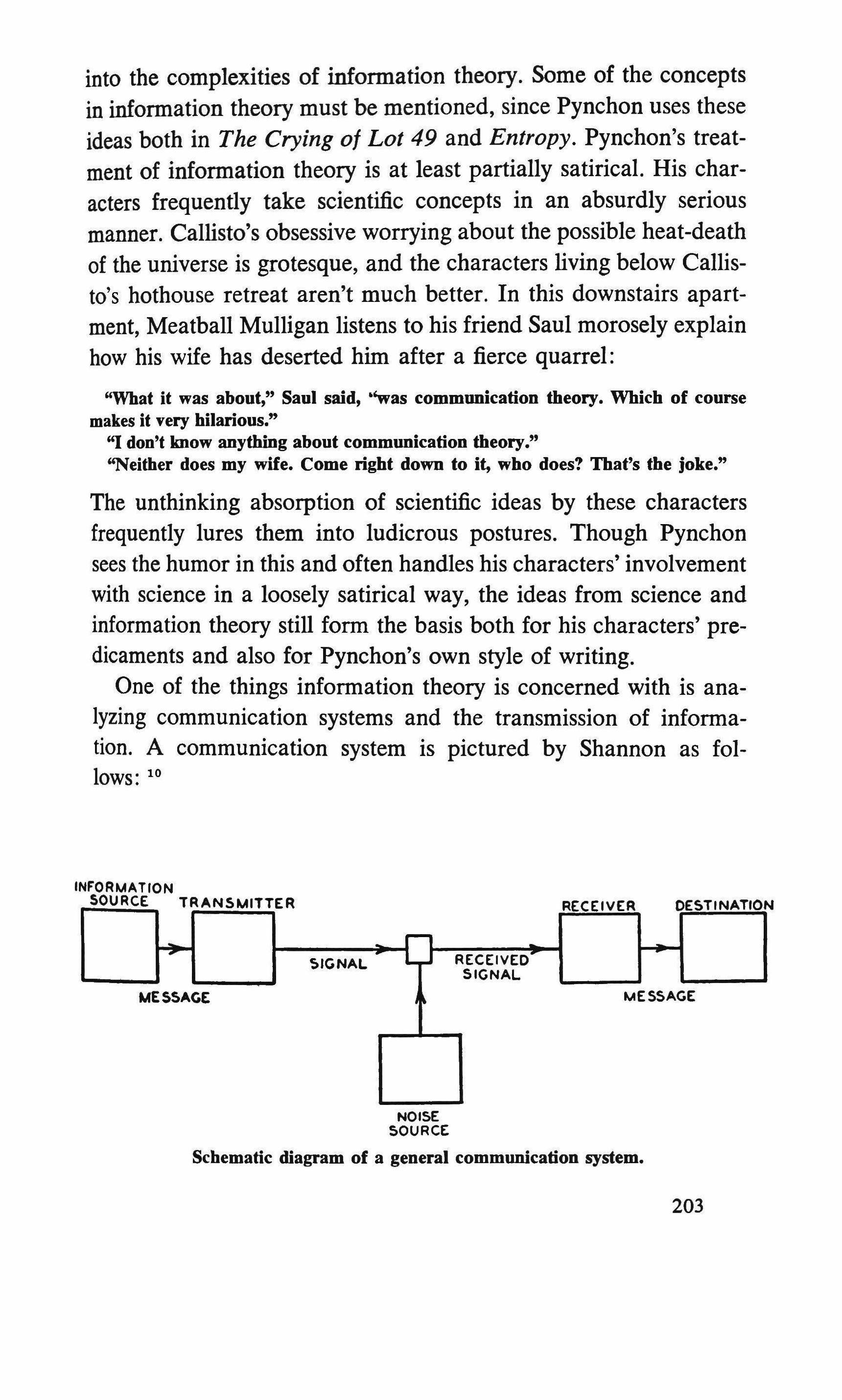
INFORUATION
SOURCE TRANSMITTER
RECEIVER
SIGNAL .J RECEIVEOSIGNALMESSAGE MESSAGE NOISE SOURCE
OESTINATION
203
Schematic diagram of a general communication system.

The interesting aspects of the system, at least in relation to Pynchon, are the notion of sending information through signals and codes, and also the idea of noise and distortion -, The intrusion of noise into the channel may alter the message so that the information which is received differs from the information which was sent originally. The notion of information being altered and lost in the process of transmission is found throughout The Crying of Lot 49. Messages are frequently distorted while being transferred, and Oedipa's disk jockey husband, Mucho, must take this into consideration in his broadcasts. After he has interviewed his wife, Oedipa, who is an eyewitness to Dr. Hilarius' burst of insanity at the Hilarius Psychiatric Clinic, he says, "Thank you, Mrs. Edna Mosh." To the bewildered Oedipa, he explains, "It'll come out the right way. I was allowing for the distortion on these rigs, and then when they put it on tape."
The distortion in meaning as language is transmitted from one source, or person, to another, centers in the novel around words in the Jacobean play Oedipa sees, The Courier's Tragedy. Two lines remain in her memory, because of their reference to the Trystero. Oedipa hears the lines as: "No hallowed skein of stars can ward, I trow, / Who's once been set his tryst with Trystero." She begins to pursue the lines with interest, intent on discovering their meaning. As she hunts through various editions of the play, all she finds are a series of transformations. The line "Who's once been set his tryst with Trystero" appears as "Who once has crossed the lusts of Angelo" in the 1687 Quarto edition of the play, and as "This tryst or odious awry, 0 Niccolo" in the 1670 Whitechapel version. Oedipa finds a further variant on the line when she passes through Golden Gate Park and spots a group of children playing jump-rope while they sing: "Tristoe, Tristoe, one, two, three." The line is repeatedly distorted through transmission until the information in the line is finally negated. Ultimately, the line seems fit only for the children's nonsense game. The distortion of information also occurs to "Thurn and Taxis" which Oedipa also hears in the Jacobean drama. Hoping to find in its meaning a conclusive lead to the meaning of Trystero, she pursues the phrase, only to 204
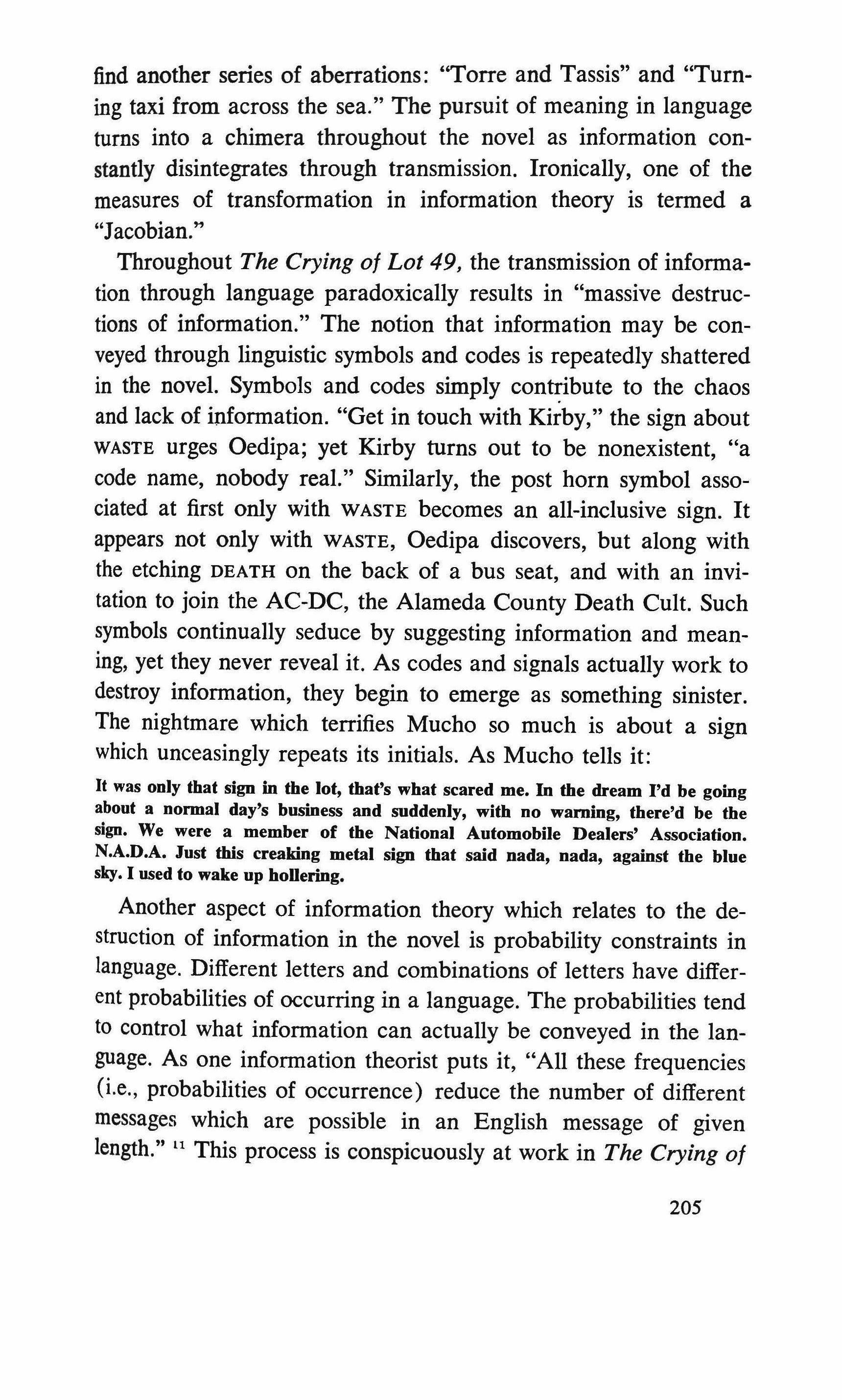
find another series of aberrations: ''Torre and Tassis" and "Turning taxi from across the sea." The pursuit of meaning in language turns into a chimera throughout the novel as information constantly disintegrates through transmission. Ironically, one of the measures of transformation in information theory is termed a "Jacobian.
Throughout The Crying of Lot 49, the transmission of information through language paradoxically results in "massive destructions of information." The notion that information may be conveyed through linguistic symbols and codes is repeatedly shattered in the novel. Symbols and codes simply contribute to the chaos and lack of information. "Get in touch with Kirby," the sign about WASTE urges Oedipa; yet Kirby turns out to be nonexistent, "a code name, nobody real." Similarly, the post horn symbol associated at first only with WASTE becomes an all-inclusive sign. It appears not only with WASTE, Oedipa discovers, but along with the etching DEATH on the back of a bus seat, and with an invitation to join the AC-DC, the Alameda County Death Cult. Such symbols continually seduce by suggesting information and meaning, yet they never reveal it. As codes and signals actually work to destroy information, they begin to emerge as something sinister. The nightmare which terrifies Mucho so much is about a sign which unceasingly repeats its initials. As Mucho tells it: It was only that sign in the lot, that's what scared me. In the dream I'd be going about a normal day's business and suddenly, with no warning, there'd be the sign. We were a member of the National Automobile Dealers' Association. N.A.D.A. Just this creaking metal sign that said nada, Dada, against the blue sky. I used to wake up hollering.
Another aspect of information theory which relates to the destruction of information in the novel is probability constraints in language. Different letters and combinations of letters have different probabilities of occurring in a language. The probabilities tend to control what information can actually be conveyed in the language. As one information theorist puts it, "All these frequencies (i.e., probabilities of occurrence) reduce the number of different messages which are possible in an English message of given length." II This process is conspicuously at work in The Crying of 205

Lot 49, as the probabilities of certain letters and words occurring begin to control the information which is being conveyed. Things tend to move toward a condition of the most probable, and as the novel progresses, almost everything is described in terms of certain symbols, like the post horn, the Trystero, and WASTE. We come back to Callisto's awareness in Entropy of a "tendency from the least to the most probable, from differentiation to sameness, from ordered individuality to a kind of chaos," only this time in the context of language. In this sense, the isolated systems which increasingly enclose people are reinforced by the nature of language which itself fails to differentiate and order.
Another area in information theory, related to probability constraints, focuses on redundancy in language. Shannon suggests that "the redundancy of ordinary English, not considering statistical structure over greater distances than about eight letters, is roughly 50%. This means that when we write English half of what we write is determined by the structure of the language and half is chosen freely." 12 Redundancy is used in a very closed, technical sense by Shannon, who defines it as "one minus the relative entropy." Pynchon, however, uses the idea in an extended fashion, adding to it imprecision and irrelevancy, as this passage from Entropy shows. Saul and Meatball again:
"Tell a girl: 'I love you.' No trouble with two-thirds of that, it's a closed circuit. Just you and she. But that nasty four-letter word in the middle, that's the one you have to look out for. Ambiguity. Redundance. Irrelevance, even. Leakage. All this is noise. Noise screws up your signal, makes for disorganization in the circuit."
Meatball shumed around. "Well, now, Saul," he muttered, ''you're sort of, I don't know, expecting a lot from people. I mean, you know. What it is is, most of the things we say, I guess, are mostly noise."
"Hal Half of what you just said, for example."
"Well, you do it too."
''I know." Saul smiled grimly. ''It's a bitch, ain't it."
Here, Pynchon is loosely adopting many of the ideas in information theory-noise, redundancy, disorganization, and entropy. Meatball's watery mutterings are a beautiful illustration of the redundancy and lack of information in language. The redundancy, irrelevancy, ambiguity, and sheer waste in-
206

volved in language glare from every page of The Crying of Lot 49. The one thing Pierce Inverarity transmits, besides his business assets, is an impression of waste in language. His last phone call to Oedipa presents her with "a voice beginning in heavy Slavic tones as second secretary at the Transylvanian Consulate, looking for an escaped bat; modulated to comic-Negro, then on into hostile Pachuco dialect, full of chingas and maricones; then a Gestapo officer asking her in shrieks did she have relatives in Germany and finally his Lamont Cranston voice." He then assaults Oedipa with the tale of an "old man in the fun house" who was killed by the same gun that killed Professor Quackenbush. "Or something," Oedipa thinks, as if she couldn't really remember the story Inverarity had told and that it didn't matter anyway. The same "or something" phrase characterizes Meatball's inane ramblings in Entropy. Virtually every idea he tries to transmit, he follows with "or something." "Miriam left you, or something, is all I heard," he says to Saul. The "or something" phrase insidiously negates the tenuous words which are spoken, as if the information is inaccurate or irrelevant. The notion of waste in language influences Pynchon's style of writing. In fact, he throws the idea in the reader's face through his elaborate stories with their irrelevant details. The circuitous tales in the novel might be taken as examples of waste and irrelevancy in language, but through them, Pynchon is able to incorporate into his own method and style the notions about language he is trying to convey.
The notions involved in Maxwell's Demon, entropy, and information theory reveal a great deal about what Pynchon is doing. By building his fiction on the concept of entropy, or disorder, and by flaunting the irrelevancy, redundancy, disorganization, and waste involved in language, Pynchon radically separates himself from earlier 20th century writers, like Yeats, Eliot, and Joyce. Thinking of literature in terms of order, rather than disorder, they saw art as perhaps the last way to impose order on a chaotic world. Yet the complex, symbolic structures they created to encircle chaotic experience often resulted in the kinds of static, closed systems Pynchon is so wary of. Pynchon's use of scientific concepts
207
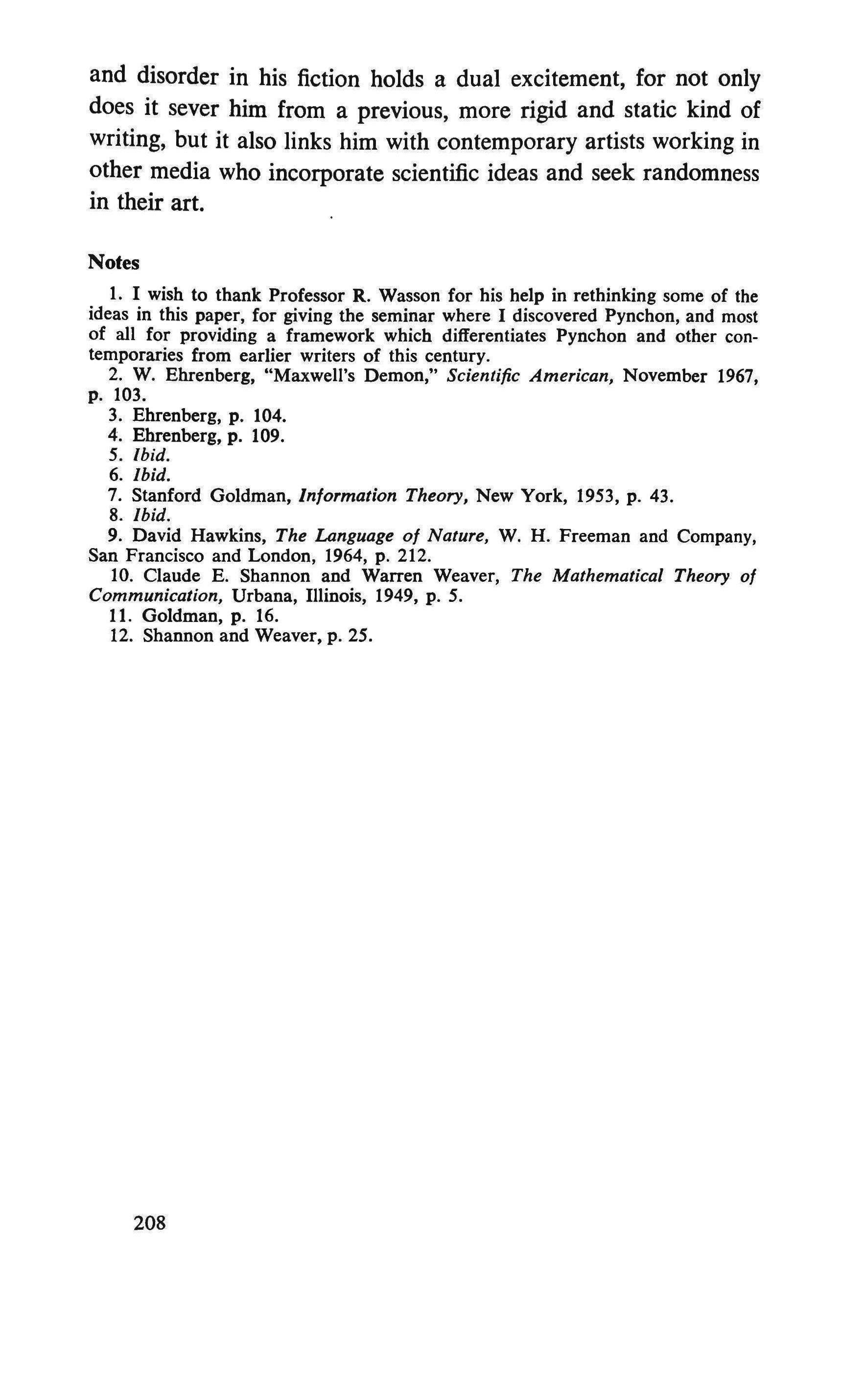
and disorder in his fiction holds a dual excitement, for not only does it sever him from a previous, more rigid and static kind of writing, but it also links him with contemporary artists working in other media who incorporate scientific ideas and seek randomness in their art.
Notes
1. I wish to thank Professor R. Wasson for his help in rethinking some of the ideas in this paper, for giving the seminar where I discovered Pynchon, and most of all for providing a framework which differentiates Pynchon and other contemporaries from earlier writers of this century.
2. W. Ehrenberg, "Maxwell's Demon," Scientific American, November 1967, p. 103.
3. Ehrenberg, p. 104.
4. Ehrenberg, p. 109.
5. Ibid.
6. Ibid.
7. Stanford Goldman, Information Theory, New York, 1953, p. 43.
8. Ibid.
9. David Hawkins, The Language of Nature, W. H. Freeman and Company, San Francisco and London, 1964, p. 212.
10. Claude E. Shannon and Warren Weaver, The Mathematical Theory of Communication, Urbana, Illinois, 1949, p. 5.
11. Goldman, p. 16.
12. Shannon and Weaver, p. 25.
208
Decomposition ofthe literary unit: notes on visually perceptible literature
FERDINAND KRIWET
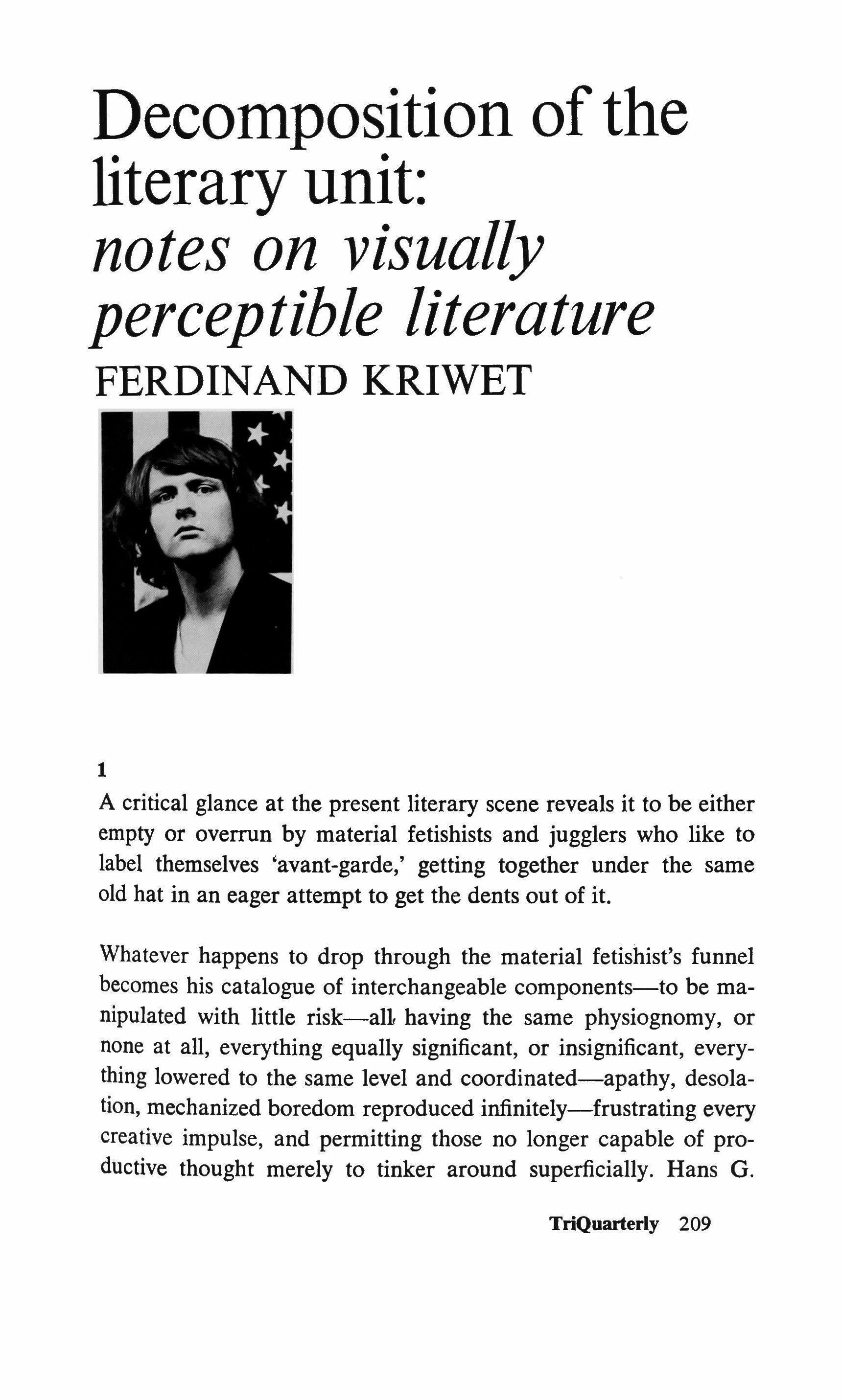
1
A critical glance at the present literary scene reveals it to be either empty or overrun by material fetishists and jugglers who like to label themselves 'avant-garde,' getting together under the same old hat in an eager attempt to get the dents out of it.
Whatever happens to drop through the material fetishist's funnel becomes his catalogue of interchangeable components-to be manipulated with little risk-alL having the same physiognomy, or none at all, everything equally significant, or insignificant, everything lowered to the same level and coordinated-apathy, desolation, mechanized boredom reproduced infinitely-frustrating every creative impulse, and permitting those no longer capable of productive thought merely to tinker around superficially. Hans G.
TriQuarterly 209

Helms describes the principal of mastery on which such material fanaticism is based: "Only by force is it possible to compel the incommensurate to behave itself. To apply force means to govern. Thus mastery marches into the very social realm which would presumably disband it."
2
A visually perceptible literature employs typography and surface in such a way as to make seeing and reading a single act, and consequently make the reader a participant in literature. Rather than being enslaved by the prescribed, hierarchical presentation of typographically specific script, the reader should be given textforms sufficiently 'open' to make the reader conscious of a new, undiminished and active freedom, allow him to move freely within and about the text, enter them where he wishes in order to reencounter in them an aspect of his own personality-not as the distorted transfer-picture which, for instance, the novel would like to hold up to him.
The temporal sequence of what has been read, the choice of what is to be read usually depend on the size of the letters. The biggest headline catches the eye first; the subtitle, appearing in slightly smaller type under the headline as a summary of the report in question, recreates highly redundant information; if this also seems promising, the reader will then go on to a concise report usually set in a type size only slightly larger than that of the full dispatch, but in bold face, either appearing under the width of the subtitle or, occupying the width of the column, introducing the "full report," to be read by those still interested and eager for details such as origin and mechanism, the price of the murder weapon, motive, social background of the CUlprit, his physical and mental condition during, before, and after the crime, quotations from the confession or denial, comments of the experts and relations on both sides, or those of the less directly involved parties, extracts from public opinion, legal problems, etc. 210

On the other hand, if a headline promises the reader something he already knows or in which he is not interested, he won't even notice it; after an assimilative scouring of the whole page at top speed for stimulatinginformation, his glance will immediately fasten on the most interesting headline. As John Cage says, "Have you ever noticed how you read a newspaper? Jumping around, leaving articles unread, or only partially read, turning here and there?" The intensity of reading then will depend strongly on the redundance of certain sections or passages of the text.
By redundance we mean simply that frictionless course of information immune to disturbance. The greater the redundance, the less intensity of reading will be required; thus redundance and intensity usually correspond proportionally to one another, so that we may say that when redundancy increases, the intensity of reading decreases; when redundancy decreases, intensity increases. The redundance of an optically perceptible text can be measured not only in degrees of clarity, visibility and readability, but also semantically.
3
Contemporary art, not only literature but also music, painting and theatre, is distinguished by the phenomenon of decomposition. In each case, the aesthetic challenge is to fix and convey within language something beyond language.
"Why is the public so impertinent to literature? Because it masters speech. People would proceed just as rashly against the other arts if they were a means of making oneself understoodto sing at one another, to get smeared with paint or throw plaster around. It is unfortunate that the art of words works in and from a material through which the rabble runs its fingers daily. Literature is therefore beyond help. The further it is removed from comprehensibility, the more importunately the public claims it as its own material." (Karl Kraus)
211
By the decomposition of the literary unit I mean the emancipation from literary parameters, from the individual constituents of language; volume, pitch, timbre, duration and also the size and thickness and disposition of type. The first decisive step in decomposition in order to compose new, more complex forms is to become aware of a literature that is to be read without its comprehension being diminished or altered by reproduction or perception. To put it briefly: Linguistic art is the art of language and not the art of living, or instructions for being in the world.

Hans G. Helms: aus Fa:m' Ahniesgwow (1960)
l 1 1". •• ,.,. ,"r. 18 U U CUI 1 11& •• a.-_.1a lIIIq 1 '" tr1.' rl.&.ll••dd-l' t1.1" 1 .I. t.,..laob. ,.'.JtU (J·iJ t lac t I ,) M: C&IIo &aA q. all ".1,J.. 100D-••• 1•• ..11 '/ fatua 'I ac lbea. uarr '1. "0_ aut"11t.. 411. R t.r.at.l.a Il&d eb h .1« .t.laJr.t - .at .ell ile t J.Jua S-,0,...,.1 c",. ,..,tll ad co••••• "11 1 1 91.U.'.· I.tlt '., .",,, t\ '.\1 'l..... ,.". a.1dd&AlllrOft1..-Mpt.1.roa k. '.il ,..IU&"
212
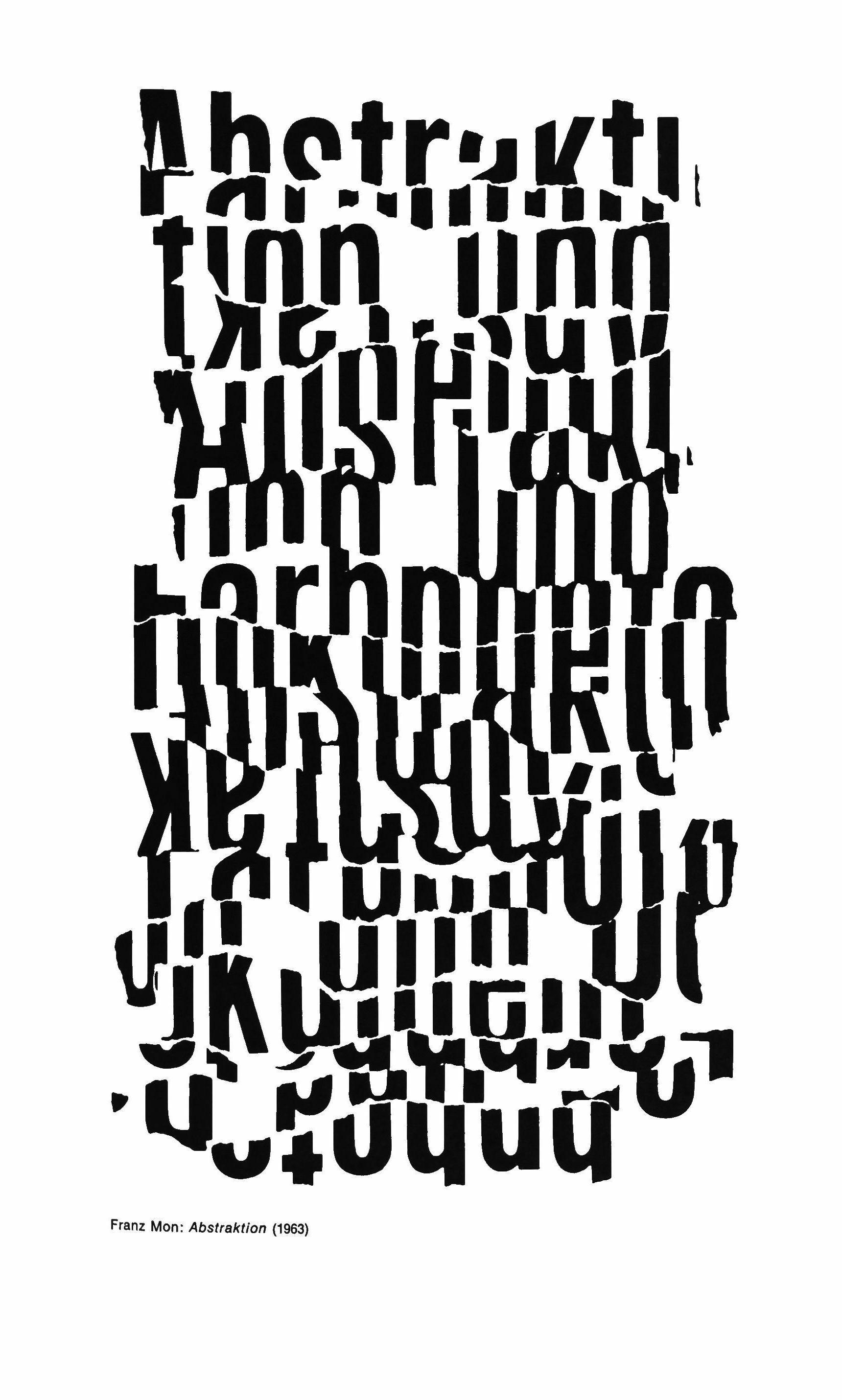 Franz Mon: Abstraktion (1963)
Franz Mon: Abstraktion (1963)
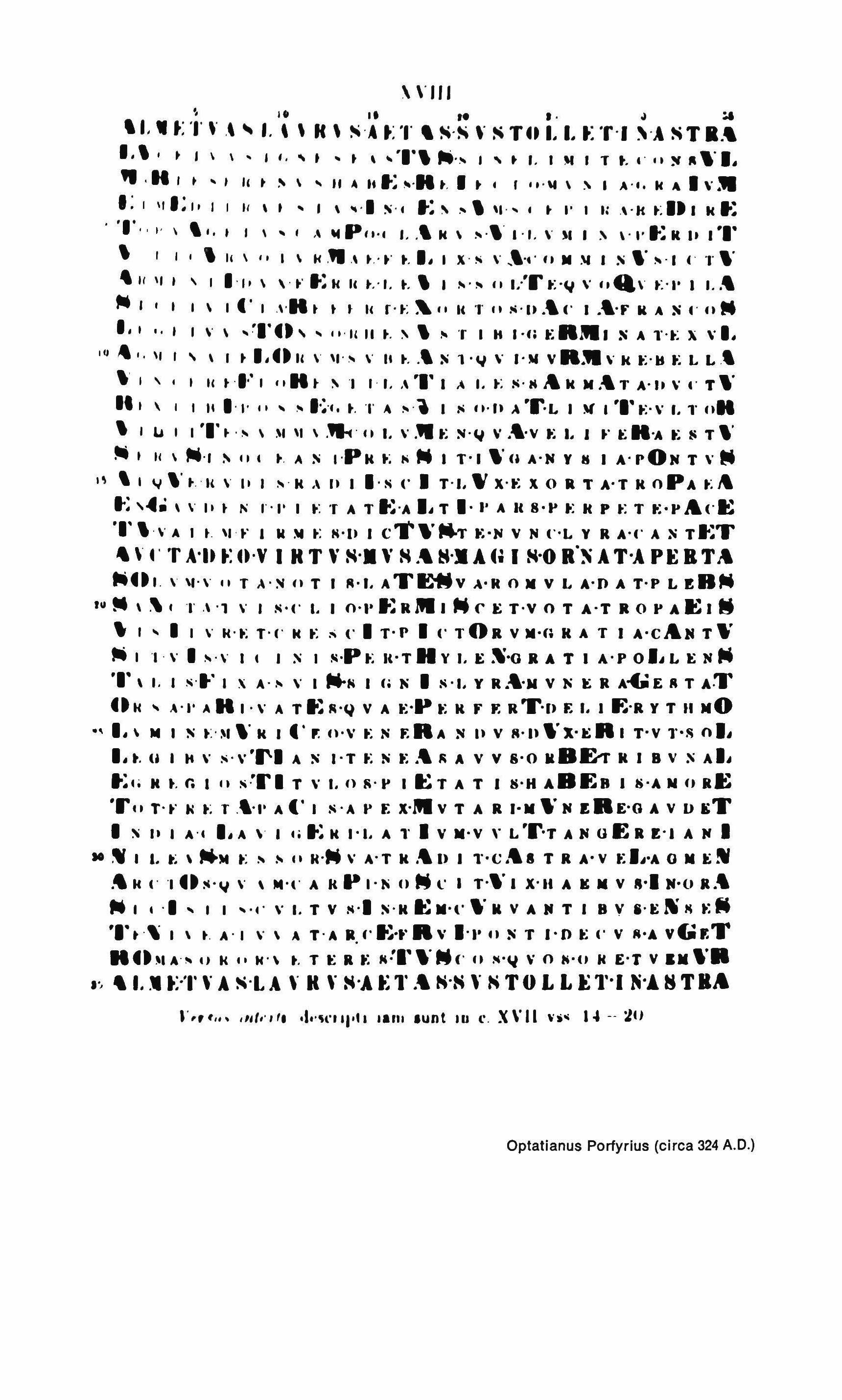
\\'111 J. .1 t. I. :.a "., t: T" , , I. , , H' S'_4 t: T 'S'S" S Tn 1.1. t: 'r', "A ST •.• I,' I 1 \ I , , 'I" lilt·,. I. ,. , T •• " '!I ,," I. " ,H, • I " • � \ " 4 II t; ,H., 1 •• ,,,,'' \ :10 , A'" Ie 4 I " ,. .: I 11';1., II 1 \ ,I s'. t: � ,., \1" 1'1 ,: .\'It t:I., let: ','"" \ , •. I I I .\ '4p"., I.,' Ie \ )0',' 1'1. v s I :10 \'I·t:" It 1'1' , I I I , " \ I \ II ,'II .\ .' t' t, I. I "... v _,," II � IS'· I C r ,. , II I" I I· I. \ , .• t: II " .,' I. t,' I ,.' I/F.:·.., v ". \.•:-,' I I..' ,.. 1 , I \ I C' I .\'H. , I " r't: �II "1''' S'".", I .'·r" 4 S c· 11M ',1 e I 1\' \ .�I'('" II'H" I, :10'" 'r I I'e; .:RJlI SAl',.: x ,'I. I Q " I. II I I t I, 0" \ \1',. v II t, S 1'.., I' Y Y R,. v I( .:- It .: L L , , I I , "t .•.• "H t \ I 11..\ 'I' I A I, t: S'li " I( , T ,,\"11 " I' T ,. "I , I I " 1'1' ,. I':'" t, T A ,.·1 I Ii fI'll A 'F'L I ". 1'1'.:-\' I. l' oH , I u , ,'1' t ,'" \ �I \I \ ,'I-c' fI I. \' .'11.: s'.., v .,.y t: I. 1 t· t: H'A t: " T ,. ,.., " \ .'1 \ ,,' I A S I 'P I( .: Ii NIT' I ,. U A' N Y II I A' rON T v I� "'1"1" \ II '''''1(.\ 1111,s ('1 T'I,," "'I': XO RTA'T kOPA .:� t: ,4. \ \ " t 1'\ "'1' I t: 'r A Tt:'A I.T 1·1' A K 8'" t: Ie PI': T .:· &('E 'I" v A I t \1 t' I II Y t: N·(I I C ... ,·...,. t:'N Y 1'1 ("L Y R A'" A S Tt:T " \ " T A'it t: o·y I H T ,. S·. V S.' M·. A I S'O R'� AT'''' P E B T" 1'0,
A'S 0
I
ATE-Mv
o.
L 04'1)
ERN n,.
(' .:
0
fit ,
kAT 1 A'C&N T" "', I v I ,\, I I I S I s·P.: 1('THy I.': �·O. A T I A'P OI�L E 1'1'" 'I'
,.', x A'" v I N 1(; N I S·I. YR."" V N': R A-fJiE" T AT (Ih A'" A H r -v A Tt:II'Q Y A t:·P.: k r F. NT'I) F. I, I F.·R Y TII O I. \ , S I:'�'" k I C' P: o-v I: 1'1 F.RA 1'1 " V 14'11 '·x·.:R I T'Y r-s ol� 1.1', II , v ,\"1'1 A S I·T.: 1'1 t:.' II A Y V S'O IlBE-r II I B v S AI� t:" II ., (; I " .'FI T v I. n 1\'" I ET AT 1 II'H ABF.B 1 ,.'A II RE 'F" T·.' Ie.: T .,." A(" S·A" F. X·Jlv TAR I'II\'N ERE'O A V IJ t;T I S A" 1,4 \ I ,;t:" 1'1. A 1'1 y II'Y" L'F'TAN UER E'I A N I !W, 1.1': ,. t: '" "II· v A'T 11,'1) 1 1'·(;.'1 T R A'Y t:I�'A 0 t;� .• II I' ., (')1'" v , "'C' A k P ,·Pi II 119 l' I T·"I X'II A K y 8·1 N'O R.' , ,I " ,' \' I. T V 11,1 s'IIEII'C"'1l VA T I B V 1l·t:�N t:N '1'.·, , \ t. A" \' \ A T' A R, f' t�·t· R \' 1'1' S T I' n t: c· V R'A vG r.T H('�, A'" II 11'\ I, T t: R t: 14:1',°119(' 11'1.1 v 0 !I'U II E'T V &11 "R ,', ,I. 1 .:-'1' " A S'L A " H " N'A .: l' ., NoS" S TO L L }; 1"1 N" H T 1'" '"'''''' .1.·\l'III'" 11111 aunt IU ". X \' II \'Ii. I" :lll
324 A,D,)
\ \t'\' T
T
R·I.
A'N
V
A T'P L
\ " T ,\ '1 v I S'C' I. I 0'1' t: R JlI
T'V
T A'T .0 .lEI
I I I v II'.: T'C' Ie .: S (,I T'P I (' TO. Y .·n
\ I. ,
Optatianus Porfyrius (circa
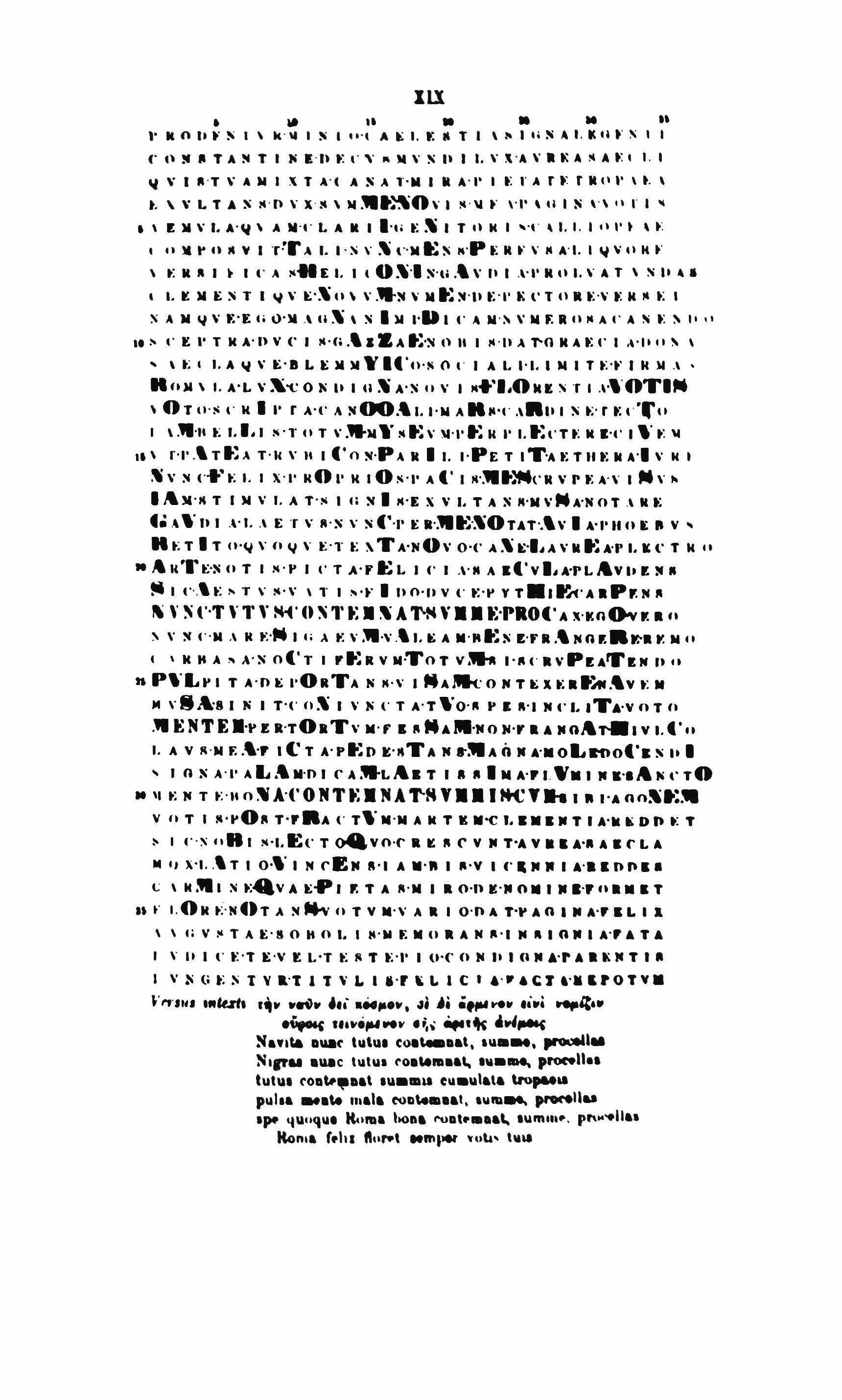
.:',.. I ,; A to: v _"'.' I. II> A It·" t: l\ E" a.'" 0 r. aK-II r. ,. ( \ II" '" ",,·s O('T I t:. V ,.·ToT
lU II • • " II 0 II t· � I \ k'" I � I A � I .: II T I \" I Ii � A I. It II t· S 1 1 (. Il !II II TAli T 1 " lE'" t: ,. v !II ,. SUI I. \. �'A v II t: A " A t:, l. 1 � 1 II'T ,. A ,. 1 'T A' CAS AT'" I II A' I' 1 t: r Art: r II Cl ,. \ t. t. \ \' L TAl' M'O v 1 M !II Wt�O\" ""\1 t· "1' , II 1 !'Ii ,.\ r 1 • \ 1:)1 ,. I. A'", A III'" L A II I I·,; t: � I T ,I II 1 'I. l. I "1' t ,t: """ II M " I "T�r A I. I ,)Ii v � PM t.:!'Ii M'P t: II .' \. A'I. I � '" II II t· '.:IIA It II'A "tI£I.IIO�'ls'u.'\·III."'·II.'I.\·AT \ SIIA' , I. II: M E)Ii T 1 '#" E'�II' \'.l'I" t::'II'11 t:'I' t: ('T II. t:-,· t: II II .; 1 SA" II v F.' E ,; 1,)')1 II � S I". I'" I I' A,.,). v ,. F. II II " A (. AS.: ). II II ",'II:I·TIIA·I'V('I II'(;.'&."t:·SI) 11 I "'U"'T-OIIAt:I'1 A'II"', \ t;, I.A � ,. E'II L E)I "."'1('0'" (\ ,. I A L 1'1.1" I T .:'.'111"'.\ HoJol' I. A'L ,.�"(; 0 II I II � ,,·S ",. I ".'1.01111:' r 1 .\·'·OTI,.. \ 0 Til'" II II' r ".(. A 1I0C».' I. I'" A Mil'" .\.U IS.;' r t: I'''" 1 \.·lIt;I.I.I"·TIIT\·.,.'·"t:\·' t:III·I.t:I·Tt:II&·(·I'·.:\I II' r·I·.'Tt:A T'" v II I ('(l S,PA. II. I,PE T IT'A t:T1 : II A·I v II I �,. S c·.·.; I. I X'I' 1101' II 101"1' A(' I pj·Wt:lMCII v rt:A'\' I""'" .-,,..,, T I,. v I." T'" I (; l'Il M'E x v I. TA!'Ii II·"'·"'A·"OT.\ lit: f•.' ,'., 1 ."1 \ E 'r A'S S ("1' E a·Wt:·�OTAT·.'" 1 A'I' llIl t: v H t: TIT II'", v 0 .., v E'l' t: X T A'" 0 0'(' '" � E·I. A ,. II t: A·r I. "C' Til" ""K'rt:')liOT 1
.\·IIAIl('vl.A·rL-'VIIElillI
F,I(' A II Pr." II " \. � r-r \. T \'1«' 0 �,. t: I � A ToM v •• t:·raO(· A lC'IW&U: II II s v
\ II
v:1I1! 1'11' a"PEATE" II" P,'L" I T A'O E l'OaTA N x-v I MA.· 0" T E u: atAc.'" t: It ,. "'1"'81 1 T'I'fI�1
('A.L-'JlT I 8 II III A',. I "III ".·.-'N,·TO • 'I .: M T .: O� A·(·ONTt:. NA T-H , •• 1�1'''' IIII'A (lO�t:. VII T 1 ,,·,,011 T· ...A T'·M· A II T It 1t"C I.KIIK"T I A'II � DO.: T I "'s"RI "·I.Ec·To4a,VO· RIi:II('YIIT'AvaIlA·8AK LA III', X·I 'T 10·"1 If rEM 8'1 A .'11 1 II'V 1(· 111 A·aaDoa. L \ 11.1 S .:4lVA E.p, r. T A II'" , a O'1l It'1I Olt 11I.·,.oa. a T It 1.011 .:-"OT A :'ll1iIh II TV It·,· A II I 0'0 A T'" A (I I II A'" a L a \ \ (; 10' l' T A t:'8 0 II (II. I II'" r. II II II A N A'I II '" n III A'r A T A I ,. It I " t:'T E'\' t: L'T .: II T .:'1' I (1'(' (I N 'I' (Ill A'" A. t: T I" v x (; .: !\ 1 Y a'T 1 T \. L I lI·r \; Lie' •. ". C J' ,.• a 0 T Y • ,.,""' ."Iuf. ,,, ri i ,. .Ii j•• .,.. i... ...6t •� "' ;,,; ""1}( .w,*, S l'- 11\111(' '''\11' (01'-1.'. 1"._. ,...,..al 'NI.,." lillie 1"luI rOI"'III"" ,ronU tulli' rOl"'••• ' .".alll ell."I.t. � ,,,I _I'" ",.1. NDt.aI.t. IIIID'" "...lIu .,. �1I qll' Ituill. ltOll. I'OIt•••• " ,um ". p" U•• Iton•• (.h, tI ,.., ,,'* ,,,�, ,
II'" II·TA·,t.:L I C'I
" I "'.' t: T v II' v \ T I .• I II (l'11 V I' .:." Y T.I
S ,
"NI'TA'T"O'A IE A'I ICC·I•• TA·VOTIl ,. ENTE E a'TOaT,' It·, IlI1 MAIII'MO )j" a A 1I0-'�. Y 1.('" I. A VII'" t: .,.,. It· T A' Pt:D t,;·"T AM " An" A'II oLlHlo('Jl l\ I' I I Ol\"'·I·A ' ·OI
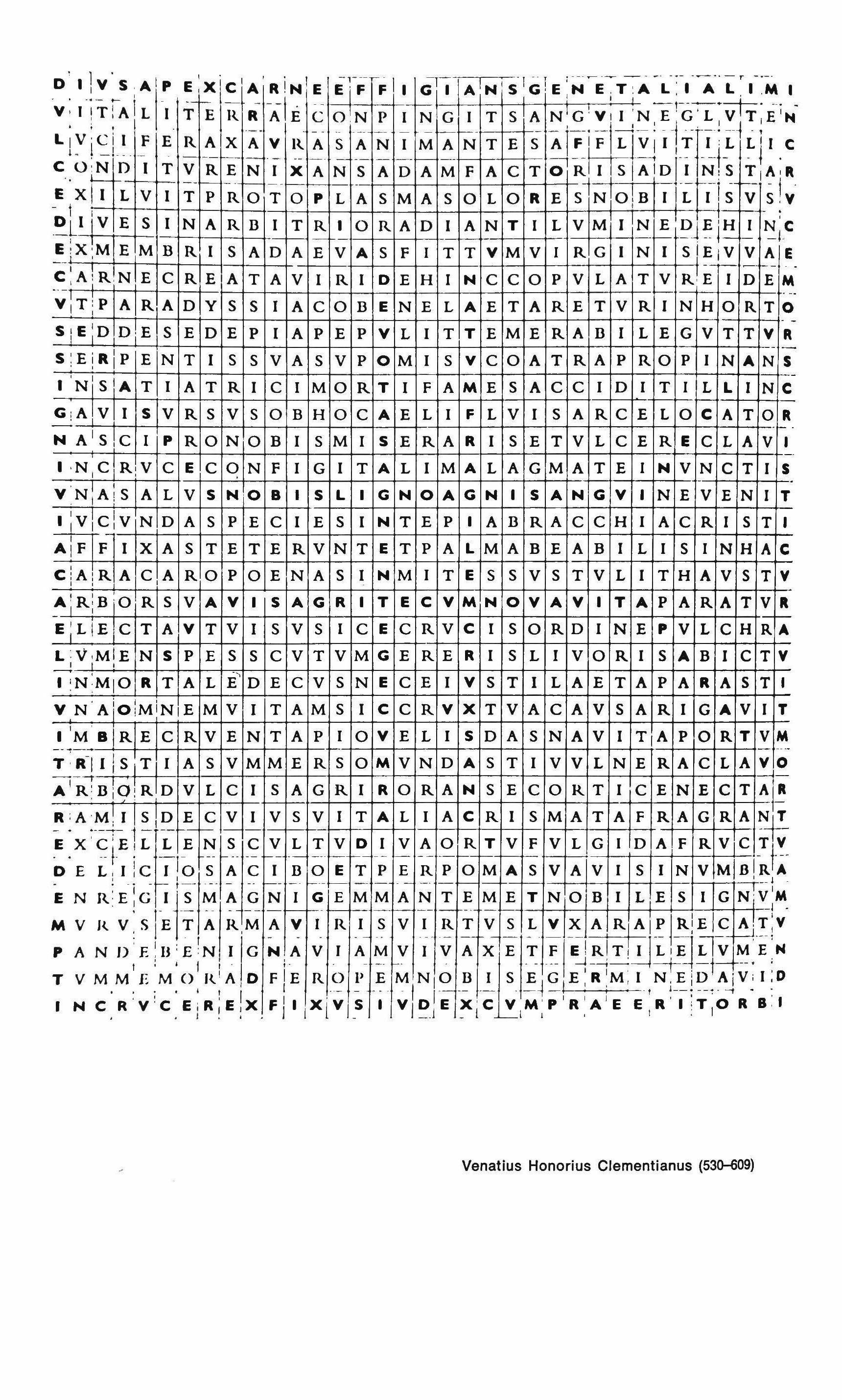
I o I,V 5 AIIP E:XiCIA'RiNiE ETI'--FII Gr.- AIN'SiG1E: �E�T�A-L·:-IA··Lrl-:M I V: 'jT!A1L I TE It �-.-AIE �Q1I'J! � I'J�� T S A �:_<?_:!:��!E!�'.����T;EiH Ll�i�j' � E R�":X_�� I�� �.� N �.�!'. NT E S Al!-iF1LJ�Jlj.!81-t-LJLl'.c C.o�_I) I T V_� _� � � �� N _s A DAM F ACT ()1 R I S I A Dj_� "'.1 �_..! I � R E xl r LVI T PRO TOP LAS MAS 0 LOR E SiN ol s IlL I Is V Sly - t I .-r--�V IV E SIN ARB I T �_I 0 R A D I ANT I L V M liN �1?J�j�--'- �;C E;X:M E M B R I SAD A EVA S FIT T V M VIR GIN I SIEIV VA E , C, A: R N E C REA T A VIR IDE H INC COP V L A T V R! E IDE M 'V:T!P A R AD Y S S I A COB ENE L A ETA RET V R I N H 0 R T 0 S:E:D DiE SED E P I APE P V LIT T EM ERA D I LEG V T T V RS;E!Rlp EN TIS S VAS V P OM I S V C 0 AT RAP R 0 PIN A N 5 I Ni S III. T I A T RIC I M 0 R T I F A M E SAC C I D I TIL LIN C G;A!V I 5 V R S V SOB HOC A ELI F LVI S ARC E L 0 CAT O_R NAIS,C I PRONOB I SMI SERAR I SETVLCERECLAVI I 'N,C R:V C E CON FIG I TAL I MAL A G MAT E I N V N C TIS V N:A! SAL V 5 NOB I 5 L I G NOli. G N I 5 A N G V I N EVE NIT I 'vlclv'N D ASP E C I E SIN T E P I A D R A C CHI A C R 1ST I ��IXASTETERVNTETPALMABEABILI SINHAC C:A!R A CAR 0 POE N A SIN MIT E S S V S T V LIT H A V STY ----_4_4_4_4�������������_4_4_4_4��������_+_+� �: R: B i 0 R S V A VIS A G R I T E C V M NOV A V I TAP A RAT V R E: L IE C T A V T VIS V SIC E C R V CIS 0 R DIN E P V L C H Rill. L:V"MIE N 5 PES S C V T V M G ERE R I S L I V 0 R I SA B I C T Y .---:N' M lOR TAL E' DEC V S N E C E I V S TIL A ETA PAR A S T I V N'AIOiM!NIE M V I TAM SIC C R V X TVA C A V S A RIG A V I T IMBRECRVENTAPI o VEL I 5 D A S N A VITIA P 0 R T V M T�Rll is I T I I A S V M MER S 0 M V N D A S T I V V L N ERA C L AVO Ali:Dro!R, D V L CIS A G R I R 0 RAN SEC 0 It TIC ENE C T �R � : A :�! I �!�>--.�.+�,� I V S V I TAL I A C R ISM A T A F RAG R A �t ;.�i;�1�j�I;"��;1'�iJ;i� � .�;��: : : � � � : � ; : �:I�;;-r E N R: E :GHi, S MI� G N I GEM MAN T E MET NOB I L E S I G NiV M M V R V: s rE T/' R,M _A �I.R� S v·tRf-i:_� � !- V � A, RI A I.� j_!_t! E I.£�:r:v' PAN D/;U;EIN,ljG N;A V r AM_V I V A X E .�.�IEJ�T!TI�J£l�f-�.E:N T V M.M, E MY, R: A ,0 F j E R '! �) E M N �.� �j; !=� G IE: R M, I t N ;_�i�!A�V: r : 0 INC. R V C E I R ; E !X. F j I I xiV1.5 I V I�) E �i ChiM: P R A 'E E I R I : T lOR B I Venatius Honorius Clementianus (530-609)
EVENTAIL DES SAVEURS
Anols singulicrs de brownings que! gout de viv re Ahl
lacs veufcolor Del e, ilI),
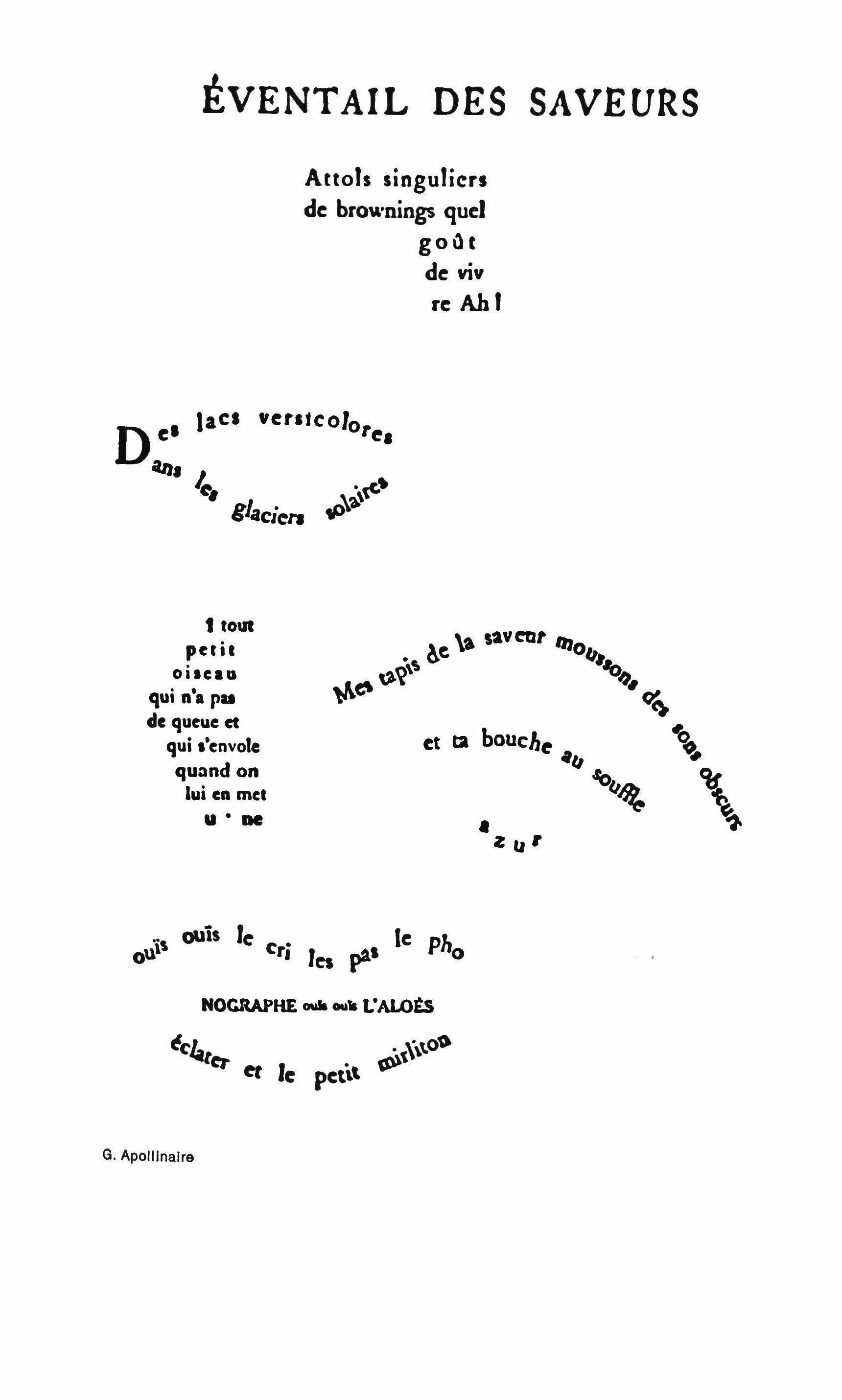
t tolft et 1:2 pet i I oi,ea qui n'a ru de queue d qui ,'envole qu:.nd on lui CD met
De
0
INII oull L·ALOD �C�er I cs».,X\\.Of) er e petl\
U'
ouis Ie. le h o�\ Cr. les pal p
NOCRAPHE
G. Apollinalre
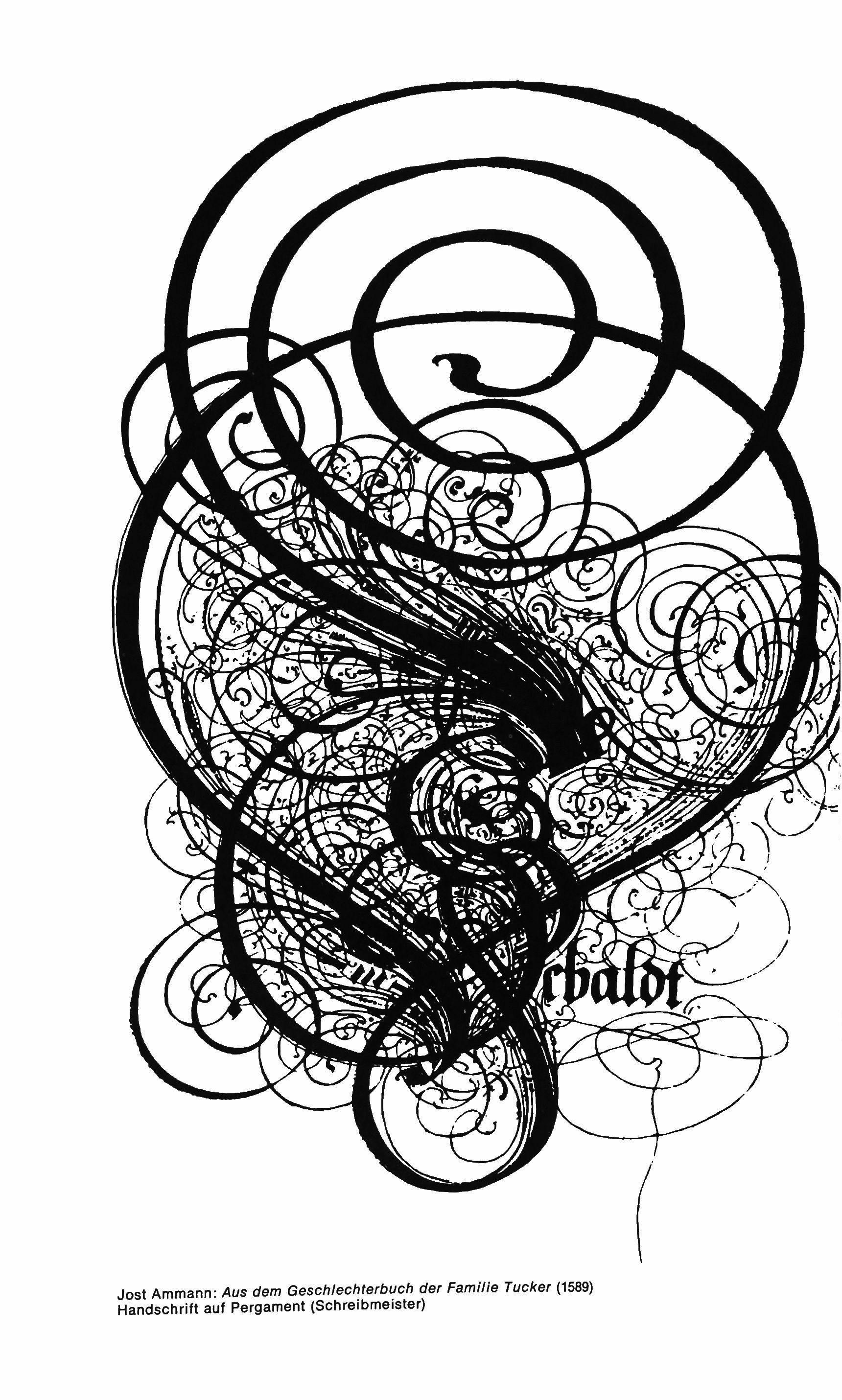
Jost Ammann: Aus dem Geschlechterbuch der Familie Tucker (1589)
Handschrift auf Pergament (Schreibmeister)

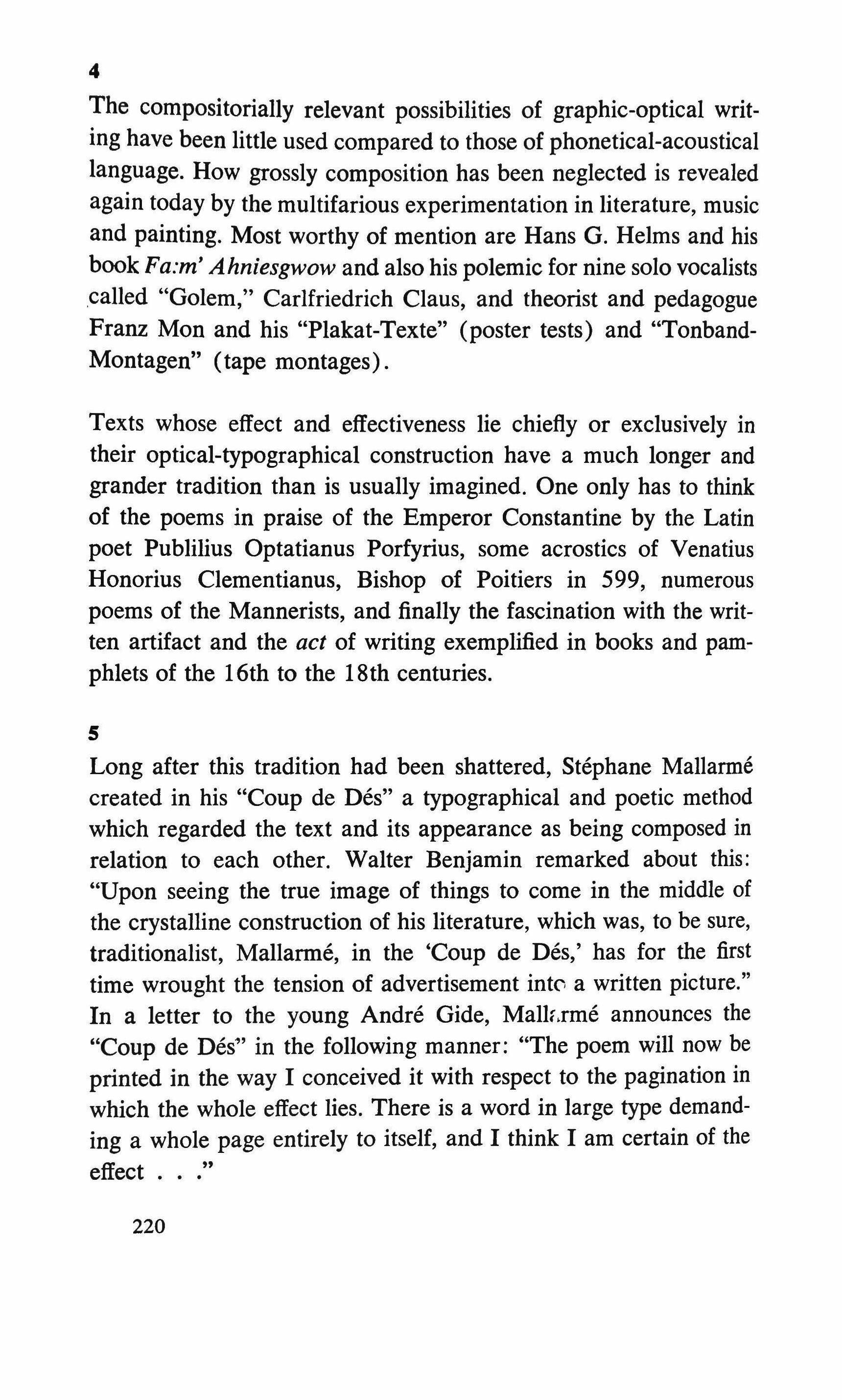
The compositorially relevant possibilities of graphic-optical writing have been little used compared to those of phonetical-acoustical language. How grossly composition has been neglected is revealed again today by the multifarious experimentation in literature, music and painting. Most worthy of mention are Hans G. Helms and his book Fa:m' Ahniesgwow and also his polemic for nine solo vocalists called "Golem," Carlfriedrich Claus, and theorist and pedagogue Franz Mon and his "Plakat-Texte" (poster tests) and "TonbandMontagen" (tape montages).
Texts whose effect and effectiveness lie chiefly or exclusively in their optical-typographical construction have a much longer and grander tradition than is usually imagined. One only has to think of the poems in praise of the Emperor Constantine by the Latin poet Publilius Optatianus Porfyrius, some acrostics of Venatius Honorius Clementianus, Bishop of Poitiers in 599, numerous poems of the Mannerists, and finally the fascination with the written artifact and the act of writing exemplified in books and pamphlets of the 16th to the 18th centuries.
5
Long after this tradition had been shattered, Stephane Mallarme created in his "Coup de Des" a typographical and poetic method which regarded the text and its appearance as being composed in relation to each other. Walter Benjamin remarked about this: "Upon seeing the true image of things to come in the middle of the crystalline construction of his literature, which was, to be sure, traditionalist, Mallarme, in the 'Coup de Des,' has for the first time wrought the tension of advertisement into a written picture." In a letter to the young Andre Gide, Mallr.rme announces the "Coup de Des" in the following manner: "The poem will now be printed in the way I conceived it with respect to the pagination in which the whole effect lies. There is a word in large type demanding a whole page entirely to itself, and I think I am certain of the effect ."
4
220
LENOMBRE
EXISTAT.IL ,""'llallIOGftMJaD
COMMEf'Ir:<;AT-IL ET CESSAT·IL -......_fI.Iot.dGo OJIP&ftI pu' Iqw pruNuan rtpMchoc 1It SE CHIFfRAT·IL too"'" de pout pno qu'_ ILLUMINAT·ll.
LEHASARD
e ,.,,_ ryI'-f- _"AI" IllUlm 1'011,.,11, - u-tJ ."#",11,, """,1'. _-'4 I Mil"JlII.,.-. Ii'''' ,. J. .hli iJnI/lf'I' JJJ�/rr
stephane Maliarme: Un Coup de Des Jamais N'abolira /e Hasard (1898)
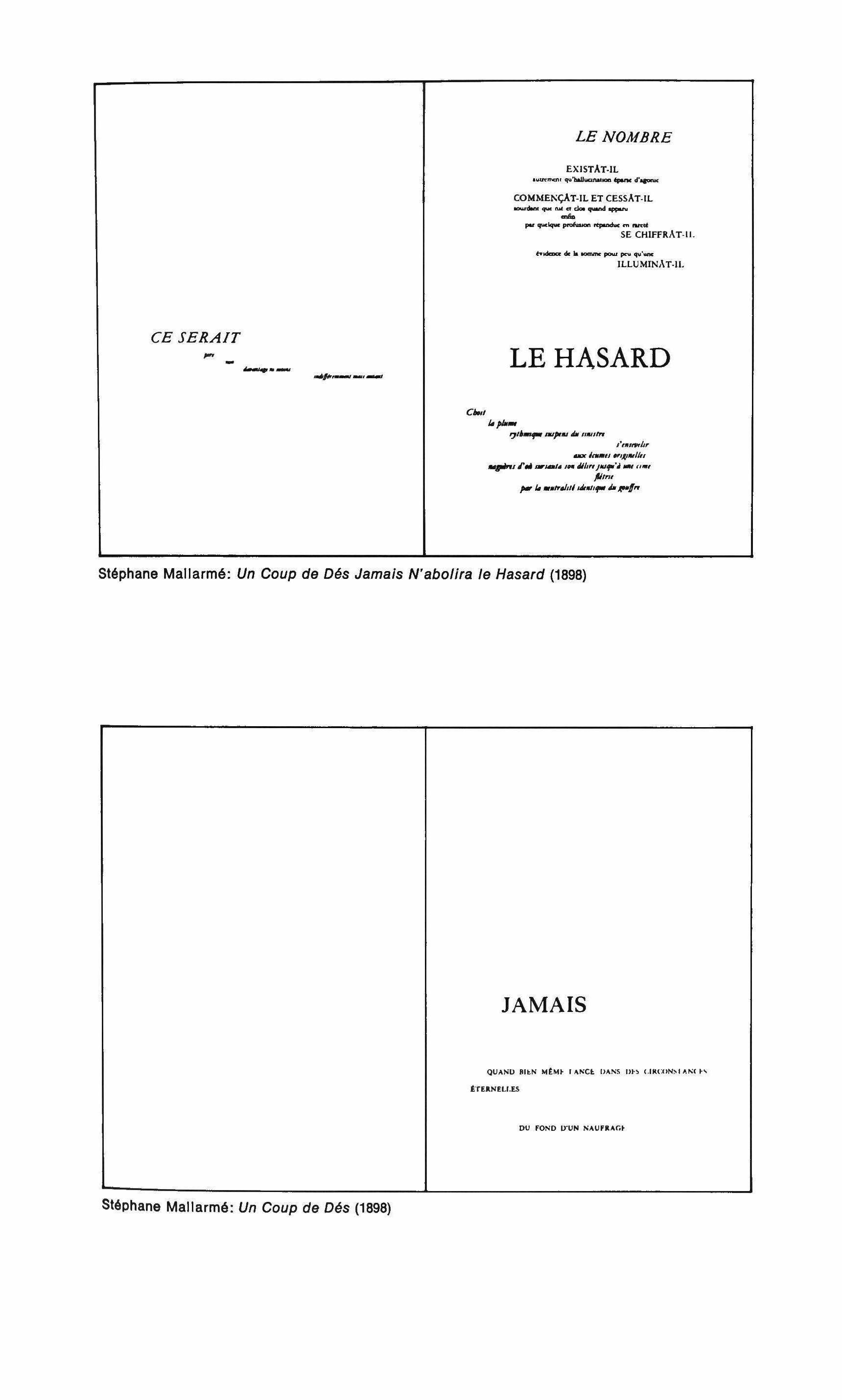
Sttlphane Mallarme: Un Coup de Des (1898)
JAMAIS
CE
_"'--'_
SERAIT
QUANU IIII:N Mbtt I "I'01CI: [)ASS m'� LlkCON�1 "'c� f:rU.NELI.E.S DU fOND arUN NAUfaAGt
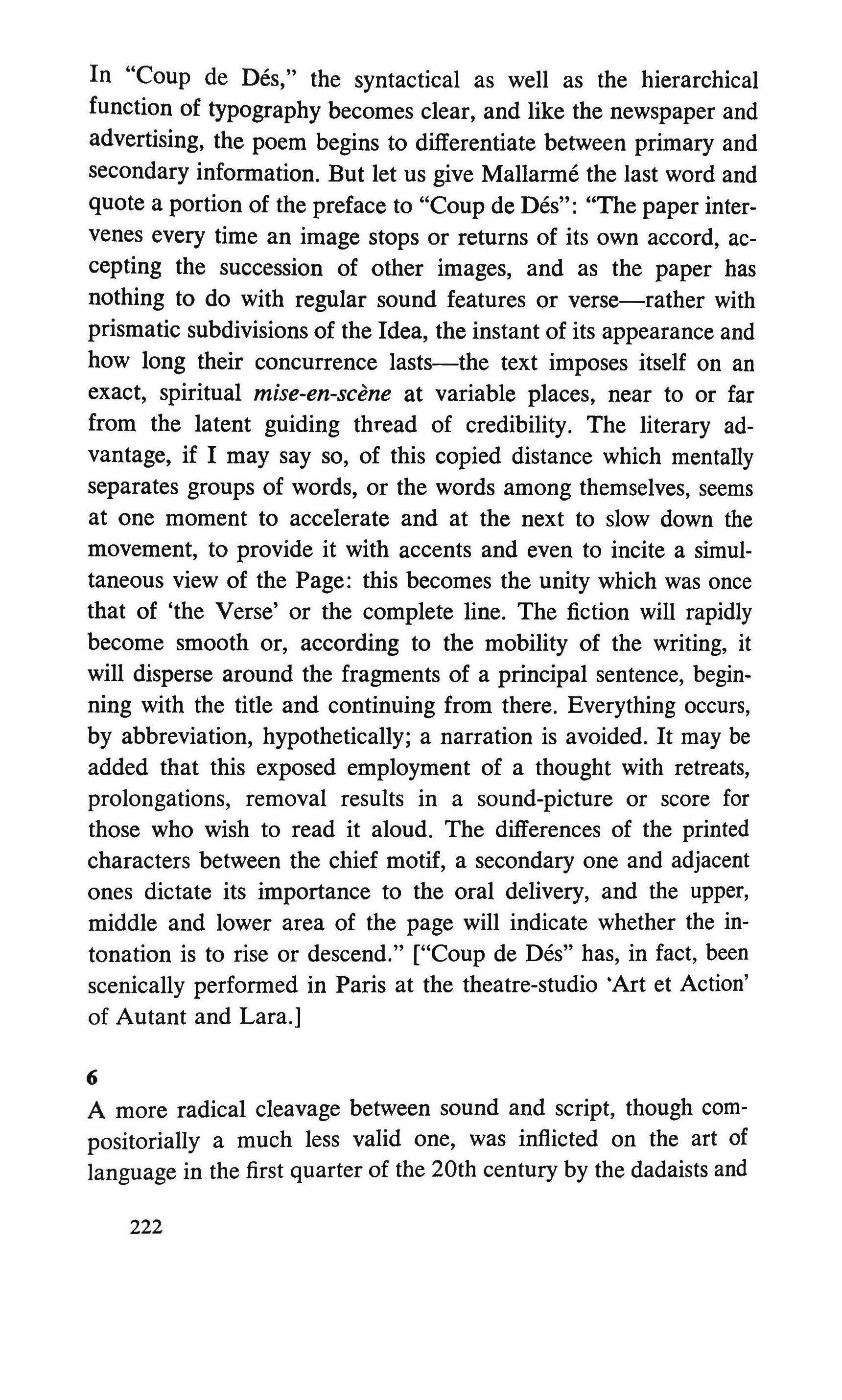
In "Coup de Des," the syntactical as well as the hierarchical function of typography becomes clear, and like the newspaper and advertising, the poem begins to differentiate between primary and secondary information. But let us give Mallarme the last word and quote a portion of the preface to "Coup de Des": "The paper intervenes every time an image stops or returns of its own accord, accepting the succession of other images, and as the paper has nothing to do with regular sound features or verse-rather with prismatic subdivisions of the Idea, the instant of its appearance and how long their concurrence lasts-the text imposes itself on an exact, spiritual mise-en-scene at variable places, near to or far from the latent guiding thread of credibility. The literary advantage, if I may say so, of this copied distance which mentally separates groups of words, or the words among themselves, seems at one moment to accelerate and at the next to slow down the movement, to provide it with accents and even to incite a simultaneous view of the Page: this becomes the unity which was once that of 'the Verse' or the complete line. The fiction will rapidly become smooth or, according to the mobility of the writing, it will disperse around the fragments of a principal sentence, beginning with the title and continuing from there. Everything occurs, by abbreviation, hypothetically; a narration is avoided. It may be added that this exposed employment of a thought with retreats, prolongations, removal results in a sound-picture or score for those who wish to read it aloud. The differences of the printed characters between the chief motif, a secondary one and adjacent ones dictate its importance to the oral delivery, and the upper, middle and lower area of the page will indicate whether the intonation is to rise or descend." ["Coup de Des" has, in fact, been scenically performed in Paris at the theatre-studio 'Art et Action' of Autant and Lara.]
6
A more radical cleavage between sound and script, though compositorially a much less valid one, was inflicted on the art of language in the first quarter of the 20th century by the dadaists and
222
futurists. Not only did they decompose the unity of written and spoken language, but also the individual materials, sounds and letters themselves. Today the sound-poems of Morgenstern, Scheerbarth, Raoul Hausmann, Hugo Ball, Richard Hulsenbeck and later Kurt Schwitters are generally well known. Much less well known is the typo-poetry of the futurists, Filippo Tommaso Marinetti, Carlo Carra, Armando Mazza and Fortunato Depero, commissioned by an Italian industrial company to build an architectonic typo-sculpture--a sort of trademark tower composed of the letters of the name of the firm. Yet while most of these works remain more or less direct demonstrations of the graphical and phonetic possibilities of all liberated and independent materials, they were not yet seen as an independent branch of literature.
KflRflWflNE
jolifanto barnbla 6 falli barnbla grassiga m'pfa hab/a harem 611g. gorami. higo bloiko russula huju hollaka hollala anlogo bung blago bung blago bung b0590 fataka I Iii iI schampa wulla Wussa 61obo hej tatta gorem eschige zunbede molubu ssubUdu nlum ssnbndn tumba ba- umf kusagauma ba - urnf

223
Hugo Ball: 1st Sound Poem (1917)
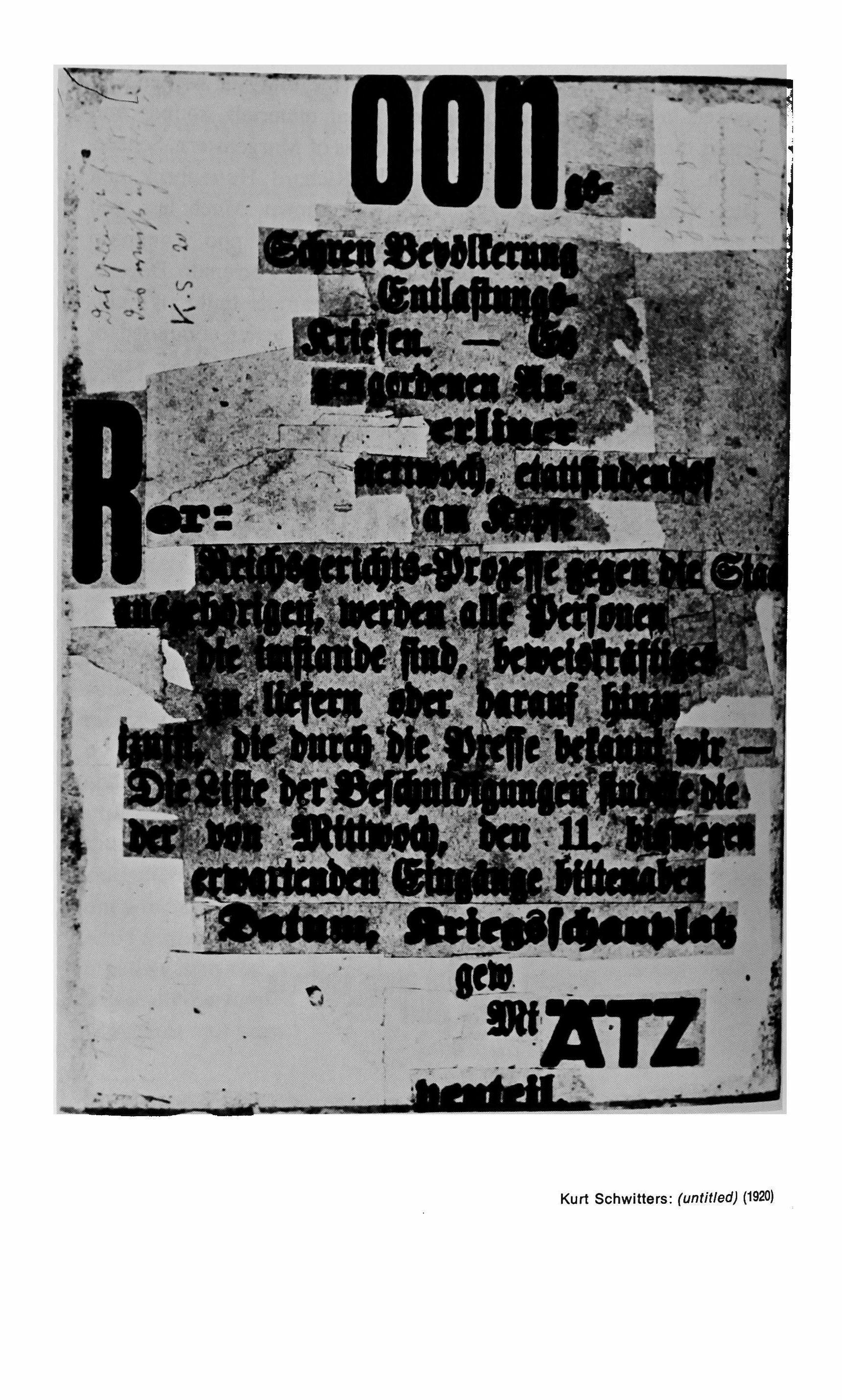
• I � ..:: c '::- t "';' """ � lI' � �� � 0":
Kurt Schwitters: (untitled) (1920)
Lanke err gil
pepepepepe
Ooka oob oob oob
Lanke trr gil
Pii pii pii pii pii
Ziiiika ziiiika ziiub ziiiika
Lanke trr gil
Rrmmp
Rrnnf
Lanke rrr gil
preItO \ (tin flint, Ttil ist slreng taklmapig, aMP'" tim in tI" tllI,cblWb,itllng ,ing,scbobtntn rezilaliontn)
H.
Grimm glimm gnimm bimbimm
Grimm glimm. gnimm bimbimm
Grimm glimm. gnimm bimbimm
Grimm glimm gnimm bimbimm
Grimm glimm gnimm bimbimm
Grimm glimm gnimm bimbimm
Grimm glirn!n gnimm bimbimm
Grimm glimm gnimm bimbimm
Bumm bimbimm bamm bimbimm
Bumm bimbimm bamm bimbimm
Bumm bimbimm bamm bimbimm
Bumm bimbimm bamm bimbimm
Grimm glimm gnimm bimbimm
Grimm glimm gnimrn bimbimm
Grimm glimm gnimm bimbimm
Grimm glirnrn gnimm bimbimm
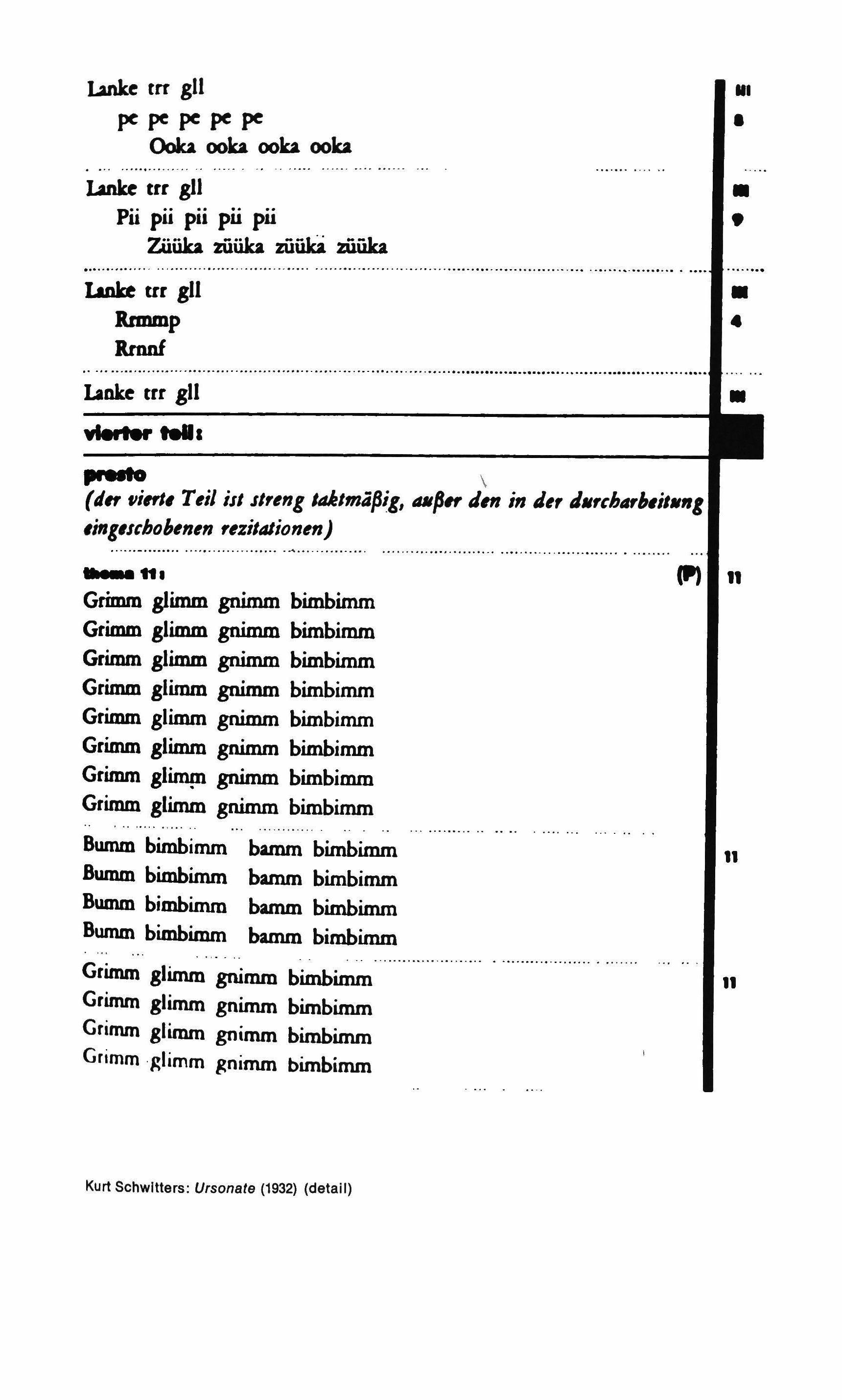
Kurt Schwltters: Ursonate (1932) (detail)
0 0 0
(It) " III a • • • 4 • 11 11
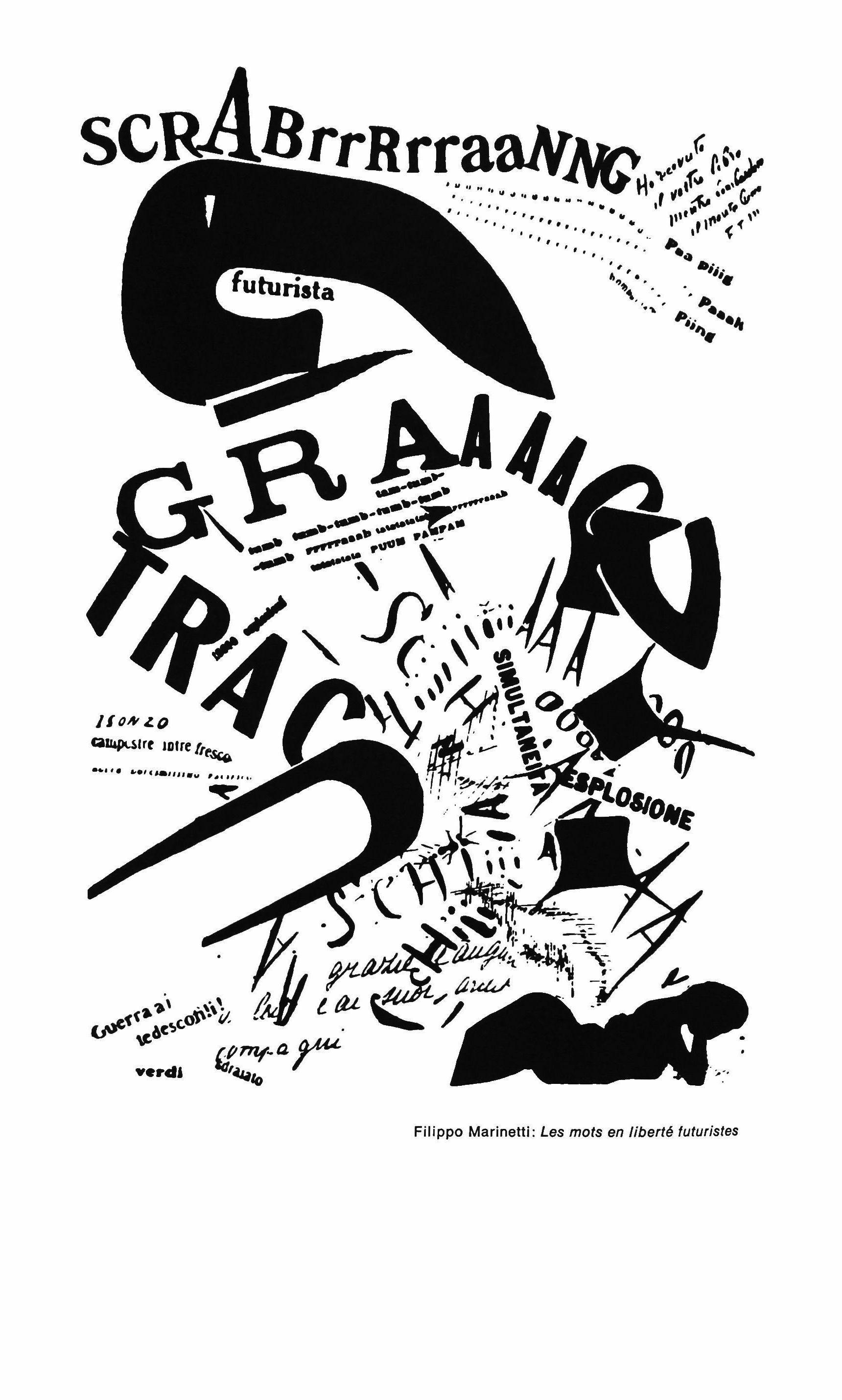
Jlo��O GlIipulrt IDlre !/� _,f. ".'C""".u '''''''''''
"ereil
Filippo Marinetti: Les mots en liberte futuristes
dirigibiIe + cielo

BIOCCOLI Ol NUBI CORTINE DI CRISTALLO OFfRIRE VER01NITA
DIRIGIBlt�
SCAVARsr TUNNEL FlUIDD MEL CIElO
ICOPPIETTII MiCellaE MlTIIE· IITIAGLIATRICE
METROPOLI
.:
.:. 1*OMHOLO
'l'HAPANO
HI MEHLETTI
SIRINGA HI PRAYAZ SfLUl{O
/1({h f�\.� "-llO B \}) URA'l'rO Dt�\� RUM 0 R E affievolirsi affievollrsi aHlevolilliirsl
Armando Mazza: "Firmamento" (Milan, 1920)

7
Today, if we wish to realize the compositional Utopia latent in this tradition and seriously disregard all material fetishist games, the individual linguistic constituents of language and writing must trade in the tradition of these literary conceptions. On the other hand, we must attempt to compose reading processes and progressions which were unknown to the literature of the past. To put a fine point on it, reading itself must be recomposed; perception itself consequently autonomized and reoriented.
Visually perceptible literature must not dissolve into lettergraphics or remain shiny letter-painting on the way to itself. It is not a potpourri of typographical methods which exist for their own sake. It is not merely a tolerable literature, en passant. Its
�: '.'
Fortunato Depero: "Padigliane de/libra" in the "III Mostro Internazionale delle Arti Decorative" (Manza, 1927)
228

boundaries often overlap those of painting and the graphic arts; but wherever writing appears both in a "literary" context, it also appears outside as pure graphics, and the more graphically autonomous it becomes, the more 'illegible' it becomes; i.e. the less it "means" something on the background of the respective readers' subjective experiences with writing, language and literature. "Meaning means association," writes William Grey Walter. "There are no physiological limits to the strength of association." "Blind spots" in a text or on the surface of a text can themselves have a lectically regulative effect; they can slow down the process of reading, accelerate it, cause it to falter, fray, fork or even break off entirely.
8
(The term SEHTEXT comprehends the problem of visually perceptible literature as the tension between the physical act of seeing and the intellectual one of reading.) When we see the overall form of the Sehtext, the typographical distribution of groups of text on square, round or polygonal - surfaces, we read the text both assimilatively and apperceptively. It is difficult to say exactly when we are still seeing and already reading. By "reading" we mean an act of deciphering and translating, according to customary rules, familiar written symbols into compatible ideas. When we '''decipher,'' we simply mean that we identify, recognize and translate at a tremendous speed. When we read, we are dealing with symbols and not icons. Seeing is a process of perception; reading is the reaction to it. Whether entire word-patterns are simultaneously comprehensible or whether the individual components of the words are combined in succession, and eventually understood as the whole word depends only on one's reading skill. Comprehension also depends on the semantic, syntactic, graphic and optical consistency of the reading matter; it depends on the type of reader (Otto Mesmer divides readers into two groups: the subjective, or assimilative, and the objective, or apperceptive), and also on the circumstances under which the reader happens to be working, his mood.
229

The problems of the Sehtext, however, are not limited to the two extremes, that of experiencing or perceiving and that of comprehending; but rather operate much more intensively than conventional literature between these two extremes. (Sehtexts are the result of the manifold and ambiguous mediations of the processes of seeing and reading.)
A first glance at any page reminds us of something which has once been read and which may bear a resemblance to what we are now reading; for this reason we have certain expectations about what we are going to read, just as when reading we always see, at the same time and indirectly, the surrounding words. Only individual syllables or letters are really seen-from one movement of the eye to the next-as being objectively and clearly fixed. "Only a tiny spot of about one-third of a millimeter in the center of the retina has a grain fine enough to receive and transmit an image in all details to the brain. This spot contains special cells sensitive to light with special nerve-fibres leading separately to the brain The part of the field of vision receiving an exact image is about the hundredth part of the whole. The angle containing this tiny spot is two degrees from one hundred and eighty degrees, because the field of vision is more than a semicircle. I therefore need to look to and fro a few hundred times in order to see the landscape I believe myself to be capable of seeing at one single glance; thousands of coordinated eye-movements are necessary to verify the scene."
(William Grey Walter) The number of these points of fixation and consequently the speed of reading depend on the reader's familiarity with the text. Indirect seeing while reading is important because it determines the following fixation point, for this is "the result of a prediction based on the preceding perception of events."
It is annoying to assume that what has been perceived-that is, the verbal text-is less "significant" in every sense of the word than the process of perceiving literature, which is itself a literary event. This is true for both visually and acoustically perceptible literature
230

and emphasizes nothing more than the new role which compositorial consciousness has in the processes of perception. For the relationship between the text and its delivery vehicle decisively accentuates its meaning; the text is not effective in all its semantic aspects until it is presented in a specified manner, and these latent possibilities can only be communicated graphically.
9
Tensions between seeing and reading result from different reading processes, not only psychological descriptions which manufacture 'tensions' in traditional literature. One extreme is the roving eye, not attracted by any particular object, alightingconscio�sly on nothing; the other is the lateral-tracking effect of apperceptive deciphering. Between these two extremes we find assimilative reading, the most frequent form of reading, to which the newspaper is attuned. Assimilative reading, as the term suggests, completes from stored information what it objectively did not comprehend at all, because it already knows what is coming owing to familiarity with the stimulus. In contrast, Friedrich Kainz defines apperceptive reading as follows: "Apperceptive reading is thus named because the attention is directed to the exact comprehension of the graphic material; only a small piece of text is seen; the attention is concentrated on this, neither the attention nor the glance wanders beyond this fixed point in the text. The reproductive elements are conceded only their indispensable minimum, assimilative processes are repressed and prevented from being completely developed." (Obviously, apperceptive reading seldom occurs without being accompanied to some degree by the assimilative process.)
Assimilative reading demands a strongly redundant text and strongly redundant word-material, for I can complete nothing that I do not already know, and the better I know it the more redundant it is. If, however, something new crops up, I cannot perceive it assimilatively because I am seeing or reading it for the first time and consequently have no opportunity of reproducing it. I can, then, only apperceive it, detail for detail, until I can understand
231

the sum of these details.' As language is phenomenologically no novelty for me, I shall always amalgamate my memetic resources with the text in front of me whether I want to or not. The text itself will determine the degree of this compulsory amalgamation. Only someone like a typecutter or a -caster will consciouslyperceive a single letter as an autonomous form; those not interested in the letter's construction will associate it with some sort of abbreviation or linguistic experience. Of course, apperceptive reading, which could also be defined as extremely subtle structural reading, can only be accomplished if the text demands it unconditionally, because most people do not like to make things more difficult for themselves than necessary, and one would hardly feel the need to examine a readable, easily understandable, continuous and uninterrupted text for the form-characteristics of its individual letters, or to count the frequency with which the vowels recur and find out their relationship to each other.
10
Let me add a short general typology, neither detailed nor specific, of visually perceptible literature.
We must primarily differentiate between the Sehtexts with their surface character, consisting of a large or small sheet of paper or a circular piece of paper, and literature in the form of a number of pages or sheets. The main difference is that the entire arrangement of Sehtexts, which consist of only one sheet or plate, is immediately surveyed, whereas pages literally unfold in succession like a Leporello. The tensions of reading of and seeing of the surface-charactered Sehtext are based on the distance between the person who sees the overall form of the text and the one who reads its microform.
A typology of the Sehtext can be made according to two criteria: its technical production, and its dimensions, its format. According to the special technique of their production, the following classifications analogous to the stages of the development of 232
printing and writing may be helpful: "Schreib-Bilder," "ScbriftBilder," "Schreib-Texte" and "Schrift-Texte." t
The first two forms approach pure painting as in Japanese calligraphy. We should, however, avoid regarding all gesticulatory painting as being written, as has frequently occurred recently. "Schreib-Bilder" are pictorial texts which owe their existence to taking pleasure in writing, scribbling, daubing, but mainly to the impetus of writing itself. Painting and literature cross here partially, and although painting always enjoys precedence, the painters are not literary dilettantes, which happens often enough. Some other composers of such pictures are the Italian Gastone Novellie, the American Cy Twombly, the French poet Henri Michaux, the Frenchman Georges Noel, the Germans Gerhard Hoehme and Winfred Gaul.
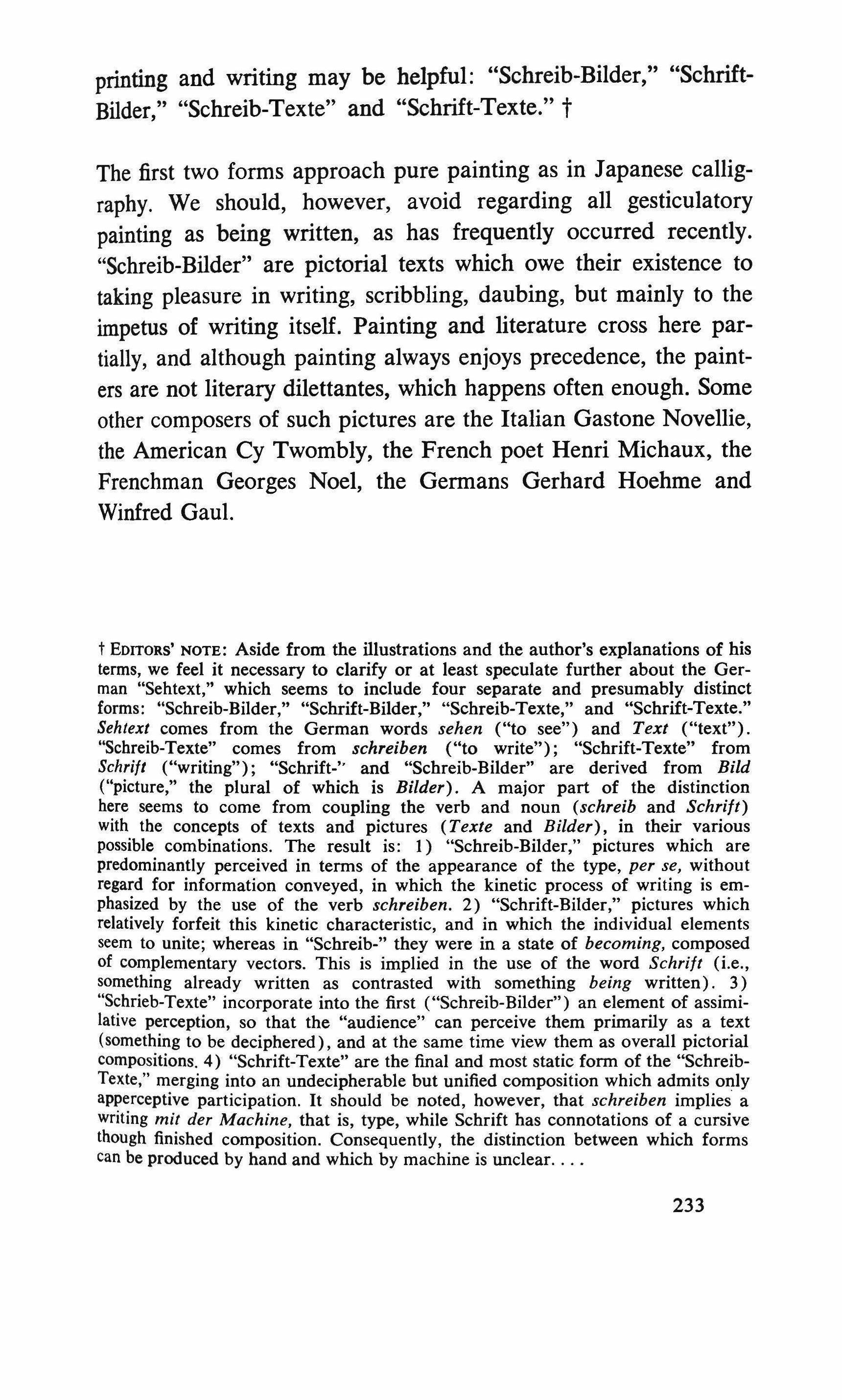
t EDITORS' NOTE: Aside from the illustrations and the author's explanations of his terms, we feel it necessary to clarify or at least speculate further about the German "Sehtext," which seems to include four separate and presumably distinct forms: "Schreib-Bilder," "Schrift- Bilder," "Schreib-Texte," and "Schrift- Texte." Sehtext comes from the German words sehen ("to see") and Text ("text"). "Schreib-Texte" comes from schreiben ("to write"); "Schrift-Texte" from Schriit ("writing"); "Schrift-" and "Schreib-Bilder" are derived from Bild ("picture," the plural of which is Bilder). A major part of the distinction here seems to come from coupling the verb and noun (schreib and Schrift) with the concepts of texts and pictures (Texte and Bilder), in their various possible combinations. The result is: I} "Schreib-Bilder," pictures which are predominantly perceived in terms of the appearance of the type, per se, without regard for information conveyed, in which the kinetic process of writing is emphasized by the use of the verb schreiben. 2} "Schrift-Bilder," pictures which relatively forfeit this kinetic characteristic, and in which the individual elements seem to unite; whereas in "Schreib-" they were in a state of becoming, composed of complementary vectors. This is implied in the use of the word Schrift (i.e., something already written as contrasted with something being written). 3} "Schrieb-Texte" incorporate into the first ("Schreib-Bilder") an element of assimilative perception, so that the "audience" can perceive them primarily as a text (something to be deciphered), and at the same time view them as overall pictorial compositions. 4} "Schrift-Texte" are the final and most static form of the "SchreibTexte," merging into an undecipherable but unified composition which admits only apperceptive participation. It should be noted, however, that schreiben implies' a writing mit der Machine, that is, type, while Schrift has connotations of a cursive though finished composition. Consequently, the distinction between which forms can be produced by hand and which by machine is unclear
233
,
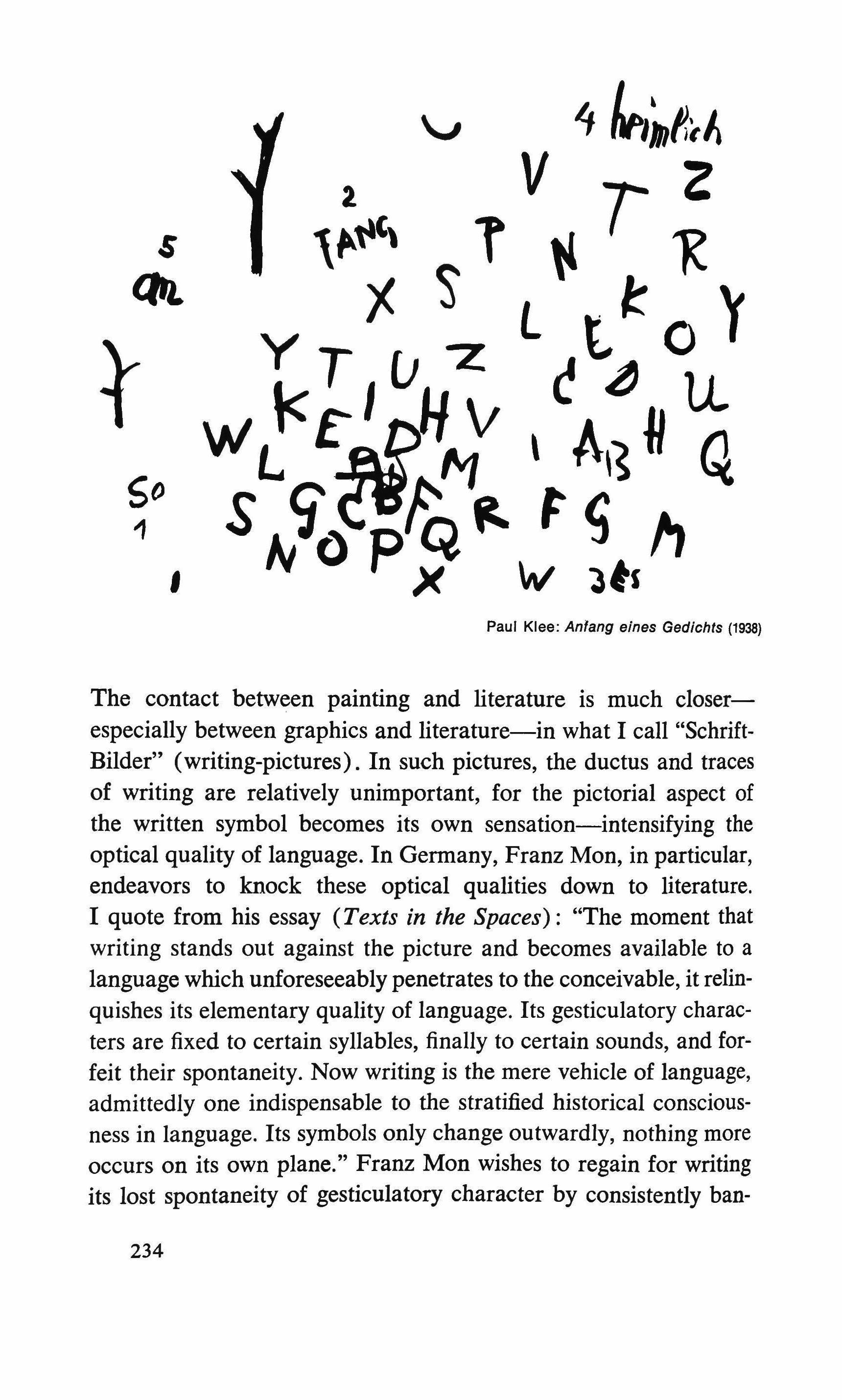
The contact between painting and literature is much closerespecially between graphics and literature-in what I call "SchriftBilder" (writing-pictures). In such pictures, the ductus and traces of writing are relatively unimportant, for the pictorial aspect of the written symbol becomes its own sensation-intensifying the optical quality of language. In Germany, Franz Mon, in particular, endeavors to knock these optical qualities down to literature. I quote from his essay (Texts in the Spaces): "The moment that writing stands out against the picture and becomes available to a language which unforeseeably penetrates to the conceivable, it relinquishes its elementary quality of language. Its gesticulatory characters are fixed to certain syllables, finally to certain sounds, and forfeit their spontaneity. Now writing is the mere vehicle of language, admittedly one indispensable to the stratified historical consciousness in language. Its symbols only change outwardly, nothing more occurs on its own plane." Franz Mon wishes to regain for writing its lost spontaneity of gesticulatory character by consistently ban-
Paul Klee: Anfang eines Gedichts (1938)
234
 Hains and Bryen: Hep(Jrile ectet» (1956)
Franz Mon: Textbild (1961)
Hains and Bryen: Hep(Jrile ectet» (1956)
Franz Mon: Textbild (1961)
ishing the conceivable from the text. Mon cuts, tears, collages, decollages, crushes words so that the writing becomes a picture, always remaining, however, language against the background of all the reader's experience with written language. "Schrift-Bilder" are not autonomous pictures or even illustrations. They are not picture-writing but exact impressions of the artistic latency of writing, and such works exist primarily to sharpen our consciousness. Other examples are a collaboration of the Frenchmen, Hains and Bryen, and a page from a book by Zdanevith Ilia, named lliazd, born in Russia in 1894 and now living in Paris.
If the term "Schrift-Bild" indicates that it belongs in the field of painting and graphics, the term "Schreib-Texte" brings itself back out of this sphere, although painting and graphics still participate to a great extent. "Schreib-Texte" are written texts, the product of a tension between optical and intellectual reading, between the following of mere written traces and the reading or deciphering of semantic sequences of text. Here, graphics and handwriting can enter into their closest relationship. Print is banished from "Schreib-Texte." Consequently, "Schreib-Texte" are closely related to "Schreib-Bilder," which are not so much pictures as conceivable text. For the production of "Schreib-Texte," it is of course ideal if the author is both poet and painter to an equal extent.
� POtn NE METTRA PAS D'OBjETS DANS SON PODtE PUIS
QUE TOUT DISPARAIT QUANO PARAIT LE TRIANOLE NOI.
L! TRlANOLE LYRIQUE LE TRIANOLE CENTRAL CHA tin EPERDUMENT LA PRFSSa OU MALE ET LE T IIANOLE NOI. AVEUOLE LE DESIR QUI L! It!
OARDE LE DtSIR CENTRInTE AUX MAINS
SOUPLES MAJS Lf. TRiANOLE NOIR !ST U N o£siR SANS MAIN ET LE MALE AS SERVIT CE DIEU FRISt ET LE T
RIANOLE NOIR EST DANS
LA MAIN DE L'HOMME ET C'EST A CHAQU
E INSTANT LA f IN 0' UN MONO!
EXPLOSANT DANS LES ESPAC!S

Pierre Albert-Biro!: Extrait de Poemes a /a chair"
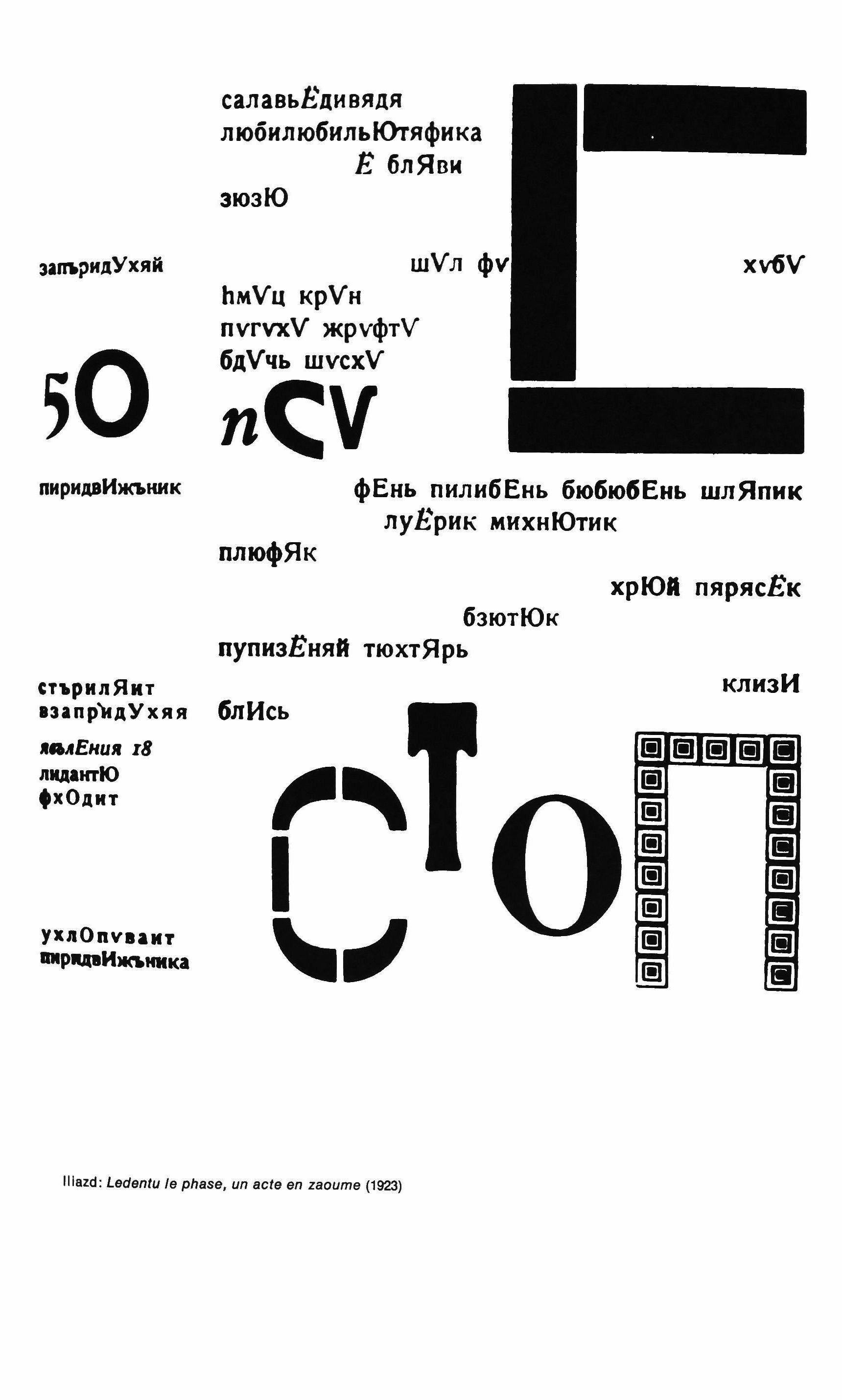
TIOXTSlpb
callaBbEllH B�Jl� nI06HllI06HnblOr�'HKa E 6ll�nl4 310310 WV11 50 hMVU KpVH nvrvxV >KPV'TV 6AVlIb wvcxV nCV xvtiV cl»EHb nH11H6EHb 610610tiEHb wnSlnHK nyEpHK MHxHIOTHK xplOA n�pHcEK 631OTIOK nynH3EH�A
pHnHHT 83anpHAYxAA tinHcb
18
txOAHT yxnOnvaaHT IhIpwnMlI<'I.KHKa Illazd: Leaentu Ie phase, un acle en zaoume (1923) KnH3H
CT
IlAAEHUII
JlIIJlIHTIO
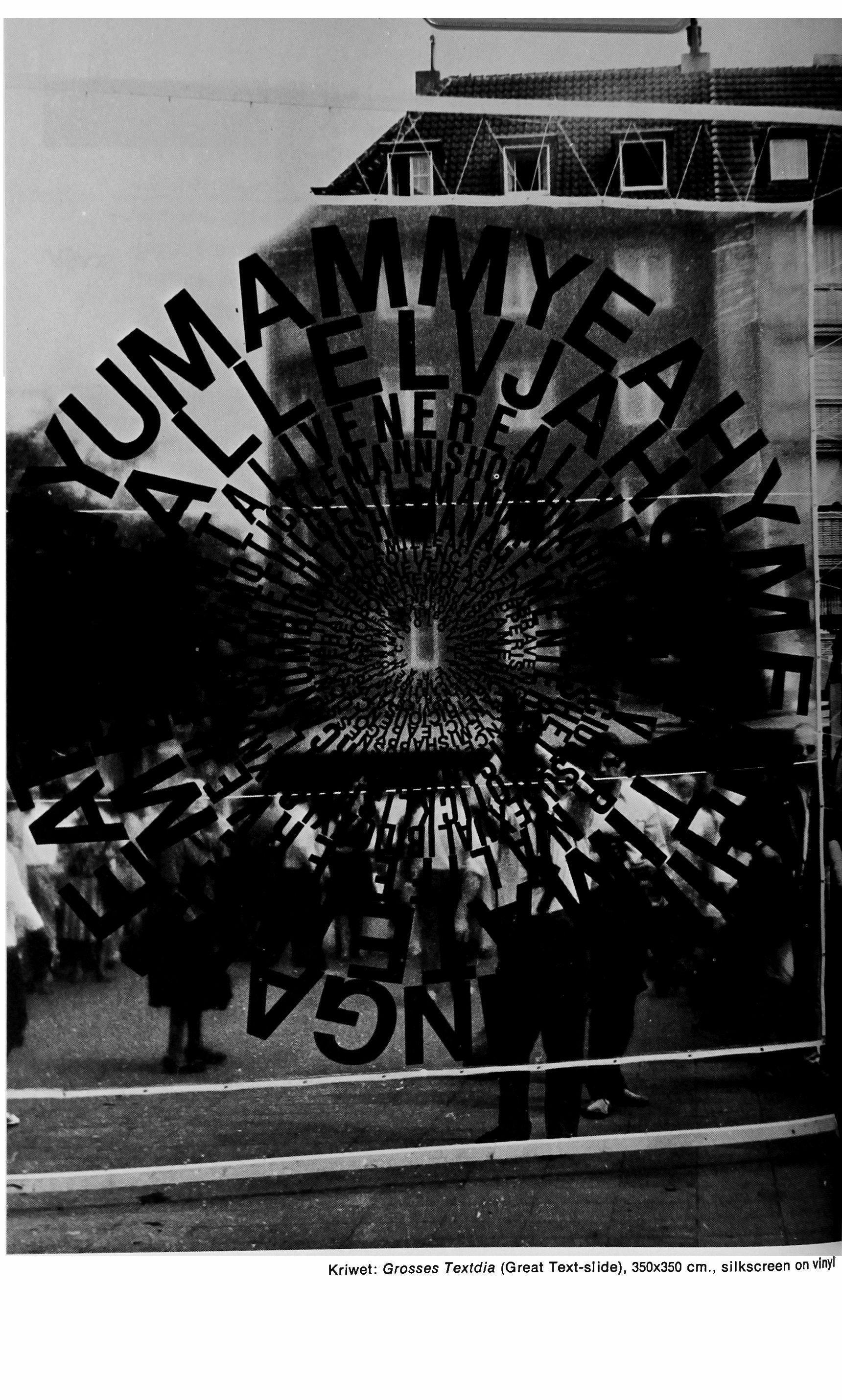 Kriwet: Grosses Textdia (Great Text-slide), 350x350 em., silksereen on vinyl
Kriwet: Grosses Textdia (Great Text-slide), 350x350 em., silksereen on vinyl
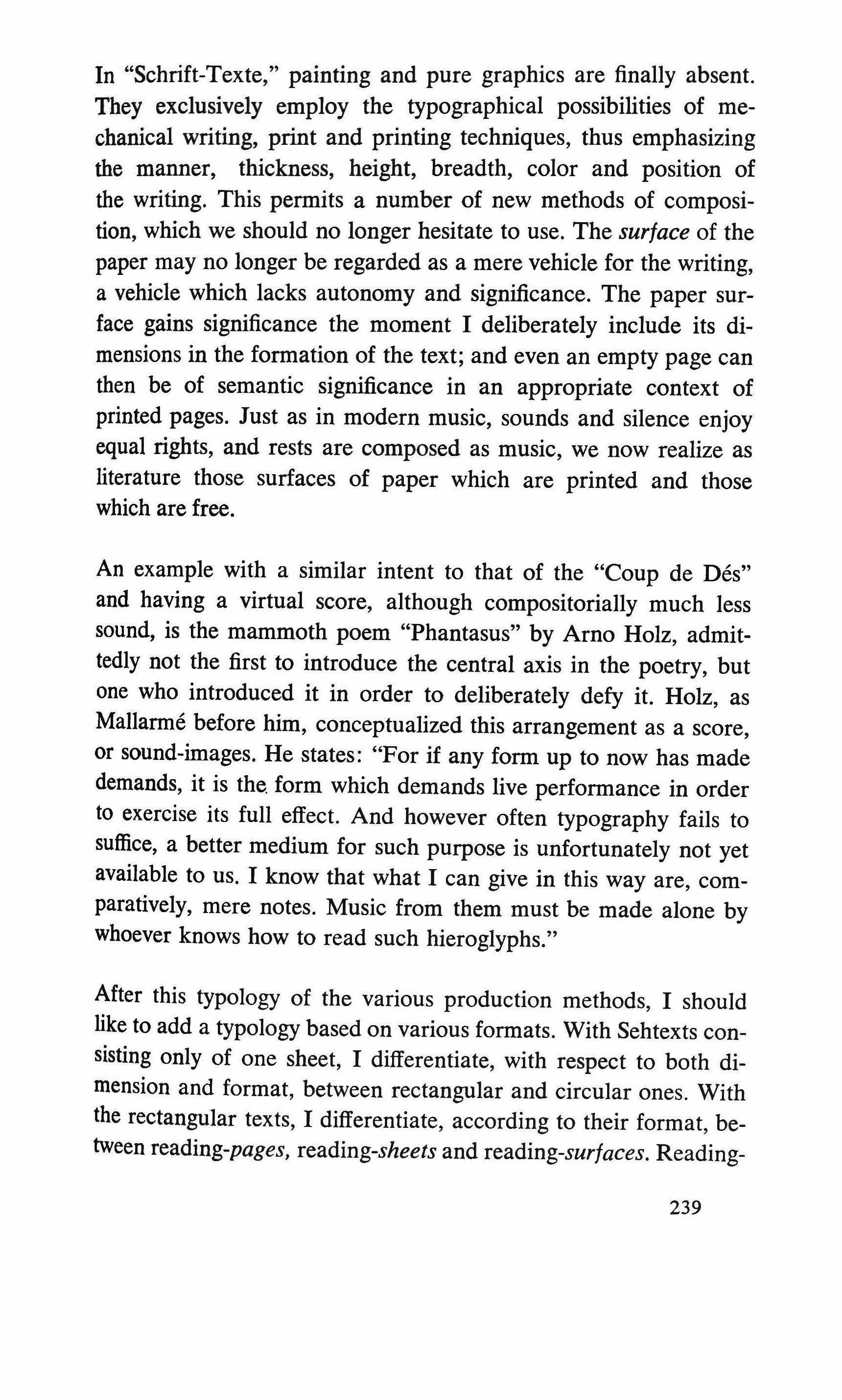
In "Schrift-Texte," painting and pure graphics are finally absent. They exclusively employ the typographical possibilities of mechanical writing, print and printing techniques, thus emphasizing the manner, thickness, height, breadth, color and position of the writing. This permits a number of new methods of composition, which we should no longer hesitate to use. The surface of the paper may no longer be regarded as a mere vehicle for the writing, a vehicle which lacks autonomy and significance. The paper surface gains significance the moment I deliberately include its dimensions in the formation of the text; and even an empty page can then be of semantic significance in an appropriate context of printed pages. Just as in modern music, sounds and silence enjoy equal rights, and rests are composed as music, we now realize as literature those surfaces of paper which are printed and those which are free.
An example with a similar intent to that of the "Coup de Des" and having a virtual score, although compositorially much less sound, is the mammoth poem "Phantasus" by Arno Holz, admittedly not the first to introduce the central axis in the poetry, but one who introduced it in order to deliberately defy it. Holz, as Mallarme before him, conceptualized this arrangement as a score, or sound-images. He states: "For if any form up to now has made demands, it is the. form which demands live performance in order to exercise its full effect. And however often typography fails to suffice, a better medium for such purpose is unfortunately not yet available to us. I know that what I can give in this way are, comparatively, mere notes. Music from them must be made alone by whoever knows how to read such hieroglyphs."
After this typology of the various production methods, I should like to add a typology based on various formats. With Sehtexts consisting only of one sheet, I differentiate, with respect to both dimension and format, between rectangular and circular ones. With the rectangular texts, I differentiate, according to their format, between reading-pages, reading-sheets and reading-surfaces. Reading239
lhre herrliehe, strahlende. ihre blcndendc, prahleudc, ihre pompende, prangende, lcuchtcndc, prachtcnde. gottliche Nacktheit in die Sonne!
Unter ihr, schwaddelnd, unter ihr, paddelnd, unter ihr, triefend, die glaUen die steilen, die buntschillerigen, buntblinkerigen, buntflinkerigen Perlmutterrundwiinde immer wieder von neuem hinan, dick, dreist, verliebt, feist, schwammig, klumpliisterig, quammig, wie
Kroten: sieben aIte, sieben glamserige, sieben seehundsglotziiugige, seebiirenschnurrborstige, seeelefantenriisselniisige, seelowenstrubbelklatschmiihnige, wa1.ro8wulstplumptonnenhalsige Meertaperl
Die GesichterII
Das Gestohn]! Das Geklohnl!
Das Gehuste!! Das Gepruste!!
Da, plotzlich.
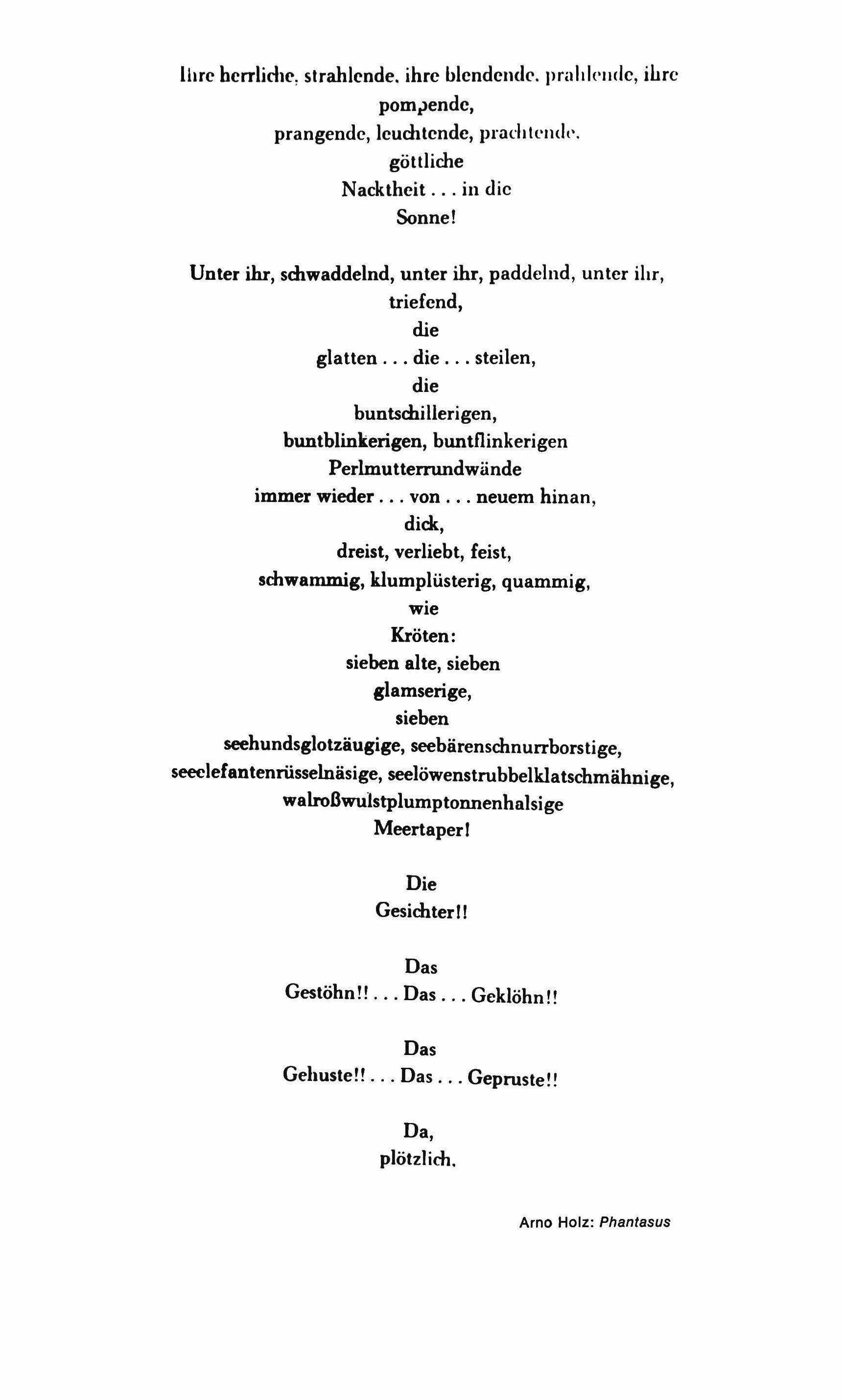
Arno Holz: Phantasus
PPEGORHRASS
eringint ( 0-
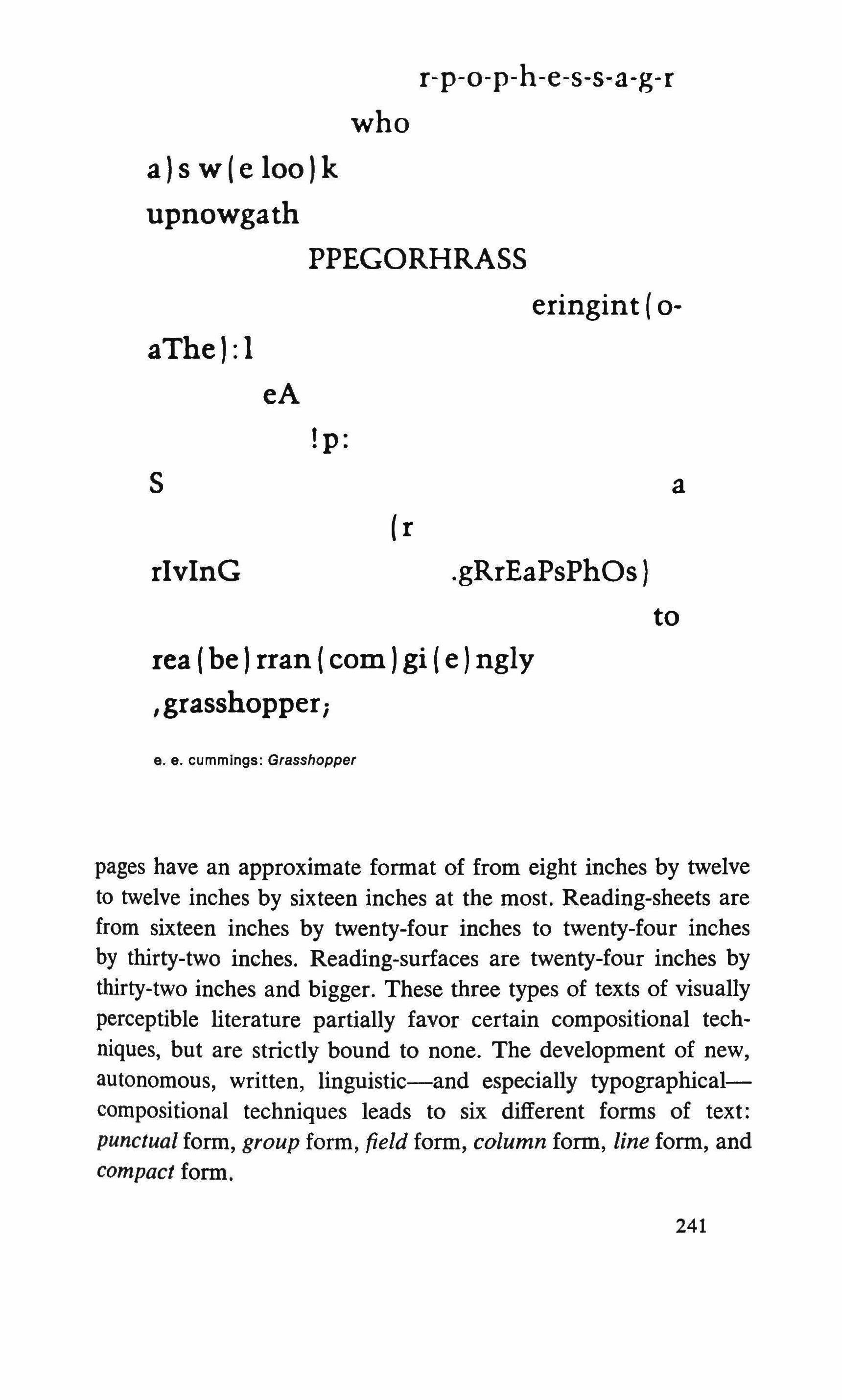
rea ( be ) rran ( com) gi ( e ) ngly .grasshopper,
EI. 8. cummings: Grasshopper
pages have an approximate format of from eight inches by twelve to twelve inches by sixteen inches at the most. Reading-sheets are from sixteen inches by twenty-four inches to twenty-four inches by thirty-two inches. Reading-surfaces are twenty-four inches by thirty-two inches and bigger. These three types of texts of visually perceptible literature partially favor certain compositional techniques, but are strictly bound to none. The development of new, autonomous, written, linguistic-and especially typographicalcompositional techniques leads to six different forms of text: punctual form, group form, field form, column form, line form, and compact form.
r-p-o-p-h-e-s-s-a-g-r who
a ) s w ( e 100 ) k upnowgath
aThe):
eA
p: S a (r rIvInG .gRrEaPsPhOs) to
1
!
241
lhre herrliche, strahlende, ihrc blendcndc. prahlcndc, ihrc pompende, prangende, leuchtendc, prachlentil'. gottliche Nacktheit in die Sonne!
Unter ihr, schwaddelnd, unter ihr, paddclnd, untcr ihr, triefcnd, die glatten die steilen, die buntschillerigen, buntblinkerigen, buntflinkerigen Perlmutterrundwande immer wieder von neuem hinan, dick, dreist, verliebt, feist, schwammig, klumpltisterig, quammig, wie
Kroten: sieben alte, sieben glamserige, sieben seehundsglotzaugige, seebarensehnurrborstige, seeelefantenriisselnasige, seelowenstrubbelklatschmiihnige, walro8wulstplumptonnenhalsige Meertaperl
Die Gesichterll
Das Gestohnl! Das Geklohn l!
Das Gehuste!! Das Gepruste!!
Da, plotzlich.
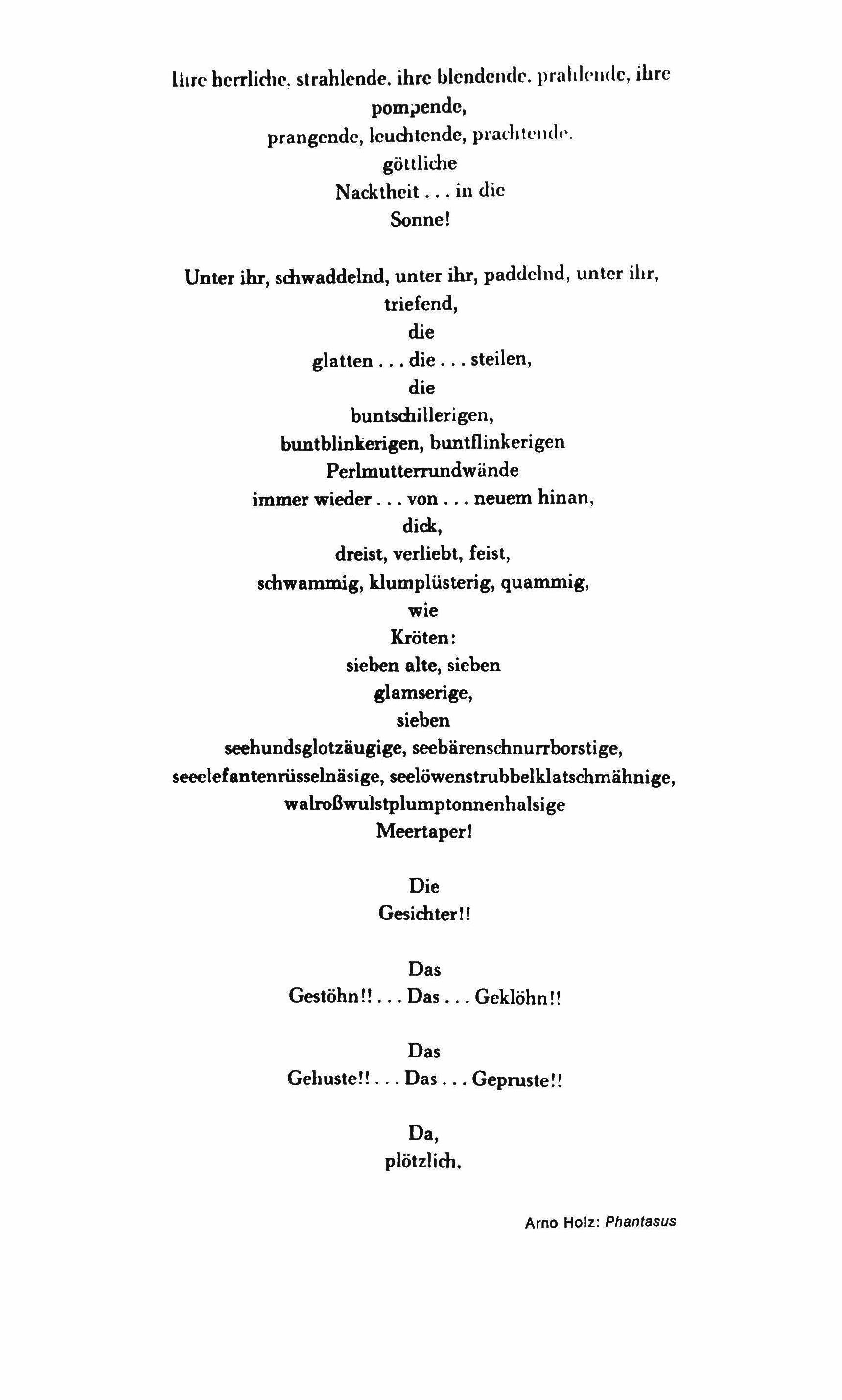
Arno Holz: Phantasus
a ) s w ( e 100 ) k
upnowgath
PPEGORHRASS
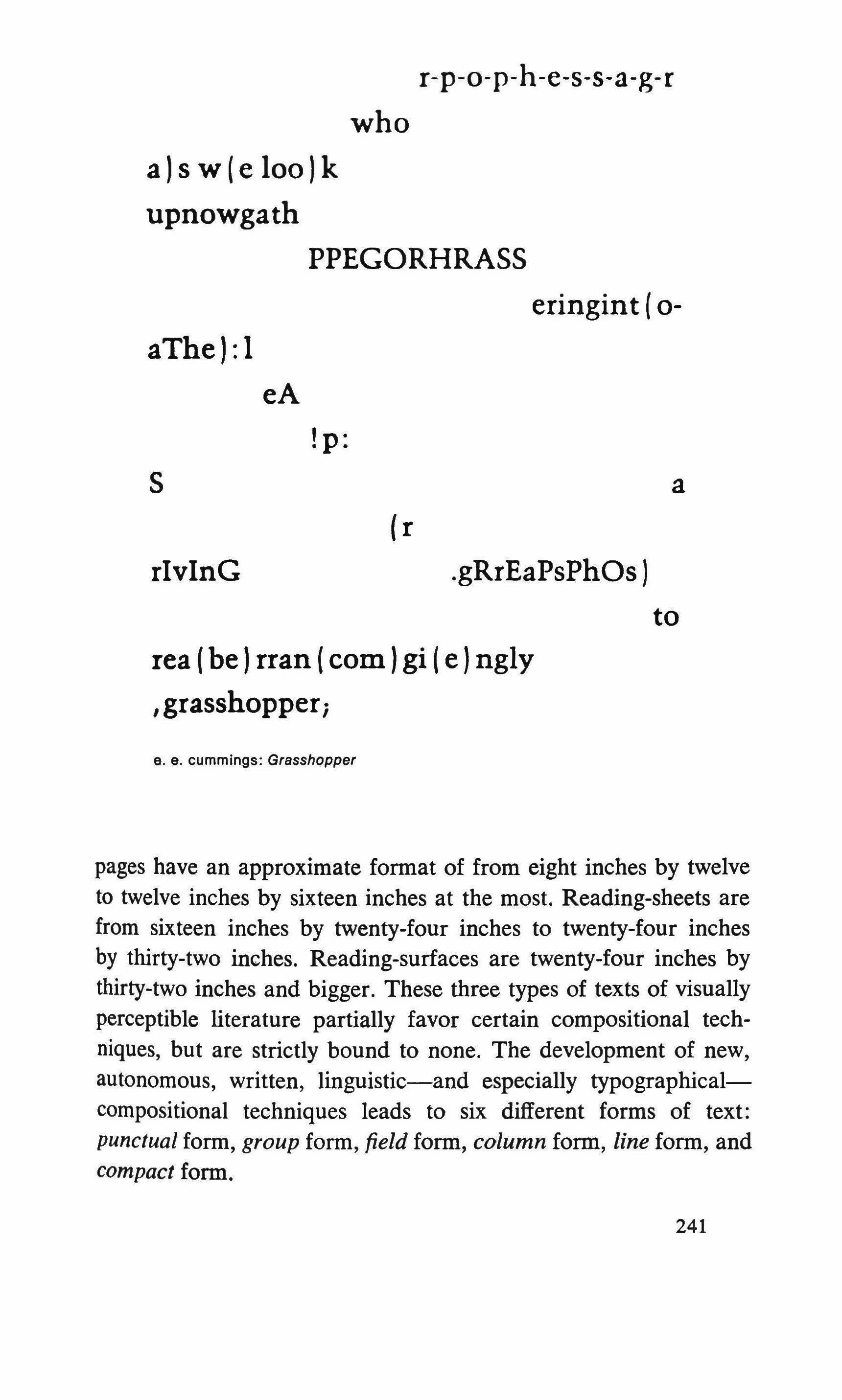
(
rea ( be ) rran ( com) gi ( e) ngly
I grasshopperi
e. e. cummings: Grasshopper
pages have an approximate format of from eight inches by twelve to twelve inches by sixteen inches at the most. Reading-sheets are from sixteen inches by twenty-four inches to twenty-four inches by thirty-two inches. Reading-surfaces are twenty-four inches by thirty-two inches and bigger. These three types of texts of visually perceptible literature partially favor certain compositional techniques, but are strictly bound to none. The development of new, autonomous, written, linguistic-and especially typographicalcompositional techniques leads to six different forms of text: punctual form, group form, field form, column form, line form, and compact form.
r-p-o-p-h-e-s-s-a-g-r who
(r rIvInG .gRrEaPsPhOs) to
eringint
0aThe): 1 eA ! p: s a
241

Punctual form employs the smallest literary unit-the lettersand arranges them into a constellation; it only has sense, however, when it is readable, that is, when a certain binding exists between the individual points-the individual letters-so that the reader really partakes of a constellation by reason of his own lectic activity. Here binding means nothing more than that certain components in a composition have a visible or audible tendency toward a neighboring component; they connect themselves with one another, which certainly does not imply that this connection is meant to be eternal.
The group form can be regarded as an extension of the punctual form. It works with small groups of letters, groups of syllables and also groups of words. By a group we understand not only a smaller accumulation of elements, but a grouping of particular characteristically and systematically normed elements, just as letters, for example, are the smallest elements of written language. Communication theory has familiarized us with group networks as idealized presentations of social situations, which consist of the nodes-people-and the communication channels-the connections between these people as nodes. This shows that the group form has a higher degree of binding of the individual groups, and also a higher degree of binding of the elements within the group, than the punctual form; at least the binding of the individual groups is more direct and unambiguous, because the group-elements are more complex than letters and therefore can less easily be significantly connected with any other element. Their heightened complexity makes the connection of the groups less ambiguous. The groups of visually perceptible literature are not graphically fixed and can be just as well symmetrical as asymmetrical; nor are they bound to any geometrical forms.
The field form, on the other hand, is optically less free because it is a form with boundaries. By fields we understand "fenced-in areas, bounded spaces." Fields, then, are separated from each other by means of boundaries and are therefore of necessity differ-
242

Kriwet: Collage (1969)
ent from each other. Contrasts in optical consistency of the individual fields can be brought about by their differing sizes and by the thickness, height and selection of type. Further contrasts arise by means of optical degree of density, the highest of which would culminate in a text-field of boldly printed type characters which are closely joined together, or which even overlap. The most porous of these optical degrees of density would consist of a text-field, which would only sparsely be occupied by thin, delicate letters or syllables, separated by pauses, or would be completely empty and thus be a pause.
We must also, at this point, define and classify quantity and density. I differentiate between optical, lexical, semantic and syntactic quantities and densities.
243

Optical quantities are materials with no basis of comparison. Materials with one or more bases of comparison have accordingly an optical density. Letters, words and sentences can be equal to each other in height, thickness and form of the type, which does not mean that they agree in all three points, or semantically.
Semantic quantities are syllables or words without a basis of comparison, thus words having nothing to do with each other and having no equal meanings or meanings which can be made to adjust to one another.
Semantic density, on the other hand, is the highest complexity of meaning-but not of sense; though a word has meaning, sense exists only because of the syntactic connection of words.
A syntactic quantity is the accumulation of syntactic formations, sentences, without semantical basis of comparison, thus without a superimposed meaning.
Syntactic density is the congruence of highly complex syntactic and semantic constructions.
Fields can be advantageously realized by means of columns and blocks in which the field form is inherent even if it is the simple rectangle. Fields can also have polygonal forms; their boundaries do not have to be straight, but can be wavy or otherwise curved.
The column form consists of vertical text columns, familiar to us in the newspapers. Columns of various length and breadth. Isolated and adjacent columns; sometimes within a continuum, disturbing it, sometimes forming a continuum. A column of at least six lines in length should be at least three letters wide; and one of thirty lines should not be more than twenty words wide. A highly differentiated degree of contact can prevail between the individual columns; either they have no connection whatsoever and are entirely independent, or they reflect each other, complete each other, continue or prepare each other.
244
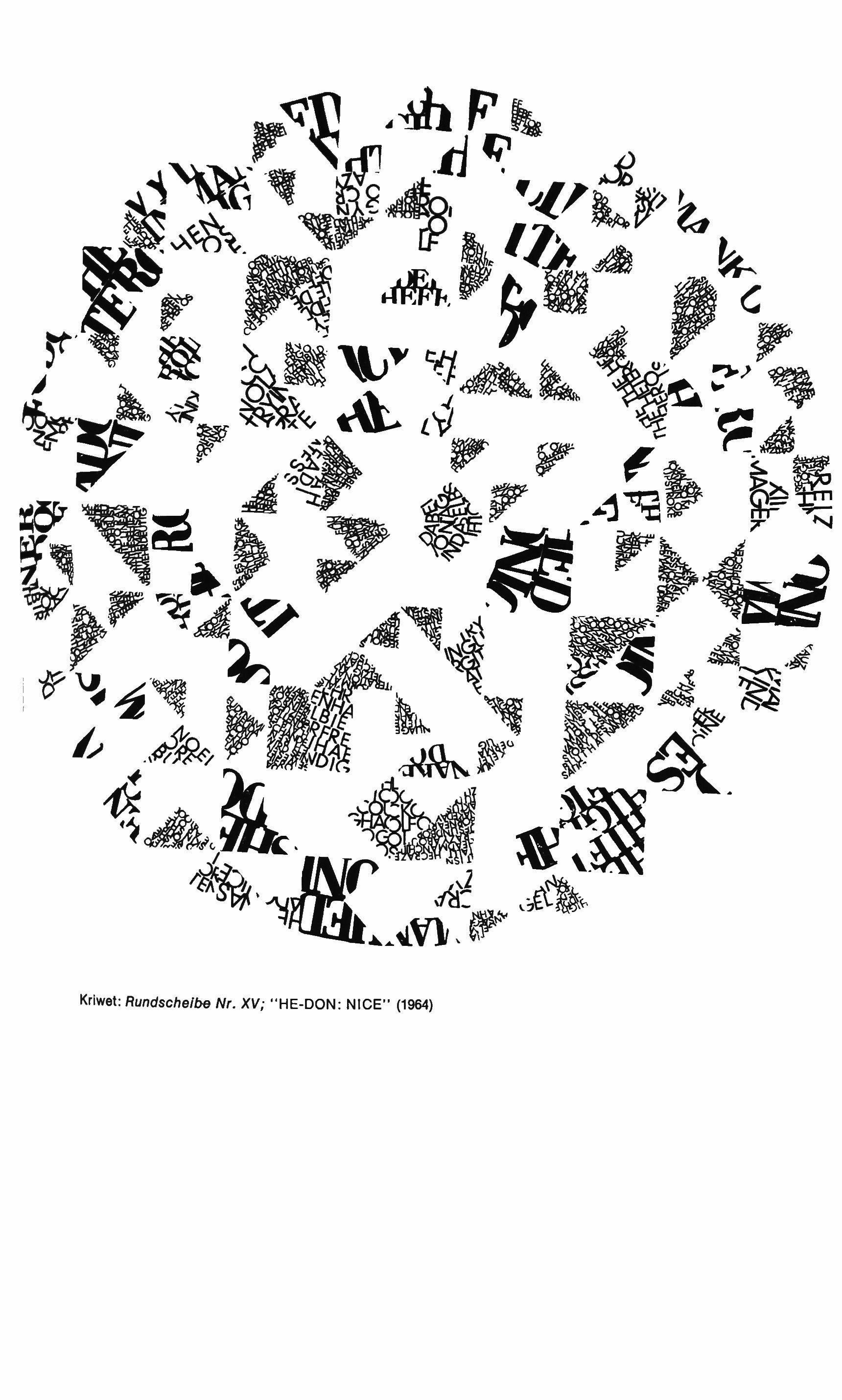 Kriwet: Rundschelbe Nr. XV; ··HE-DON: NICE" (1964)
Kriwet: Rundschelbe Nr. XV; ··HE-DON: NICE" (1964)
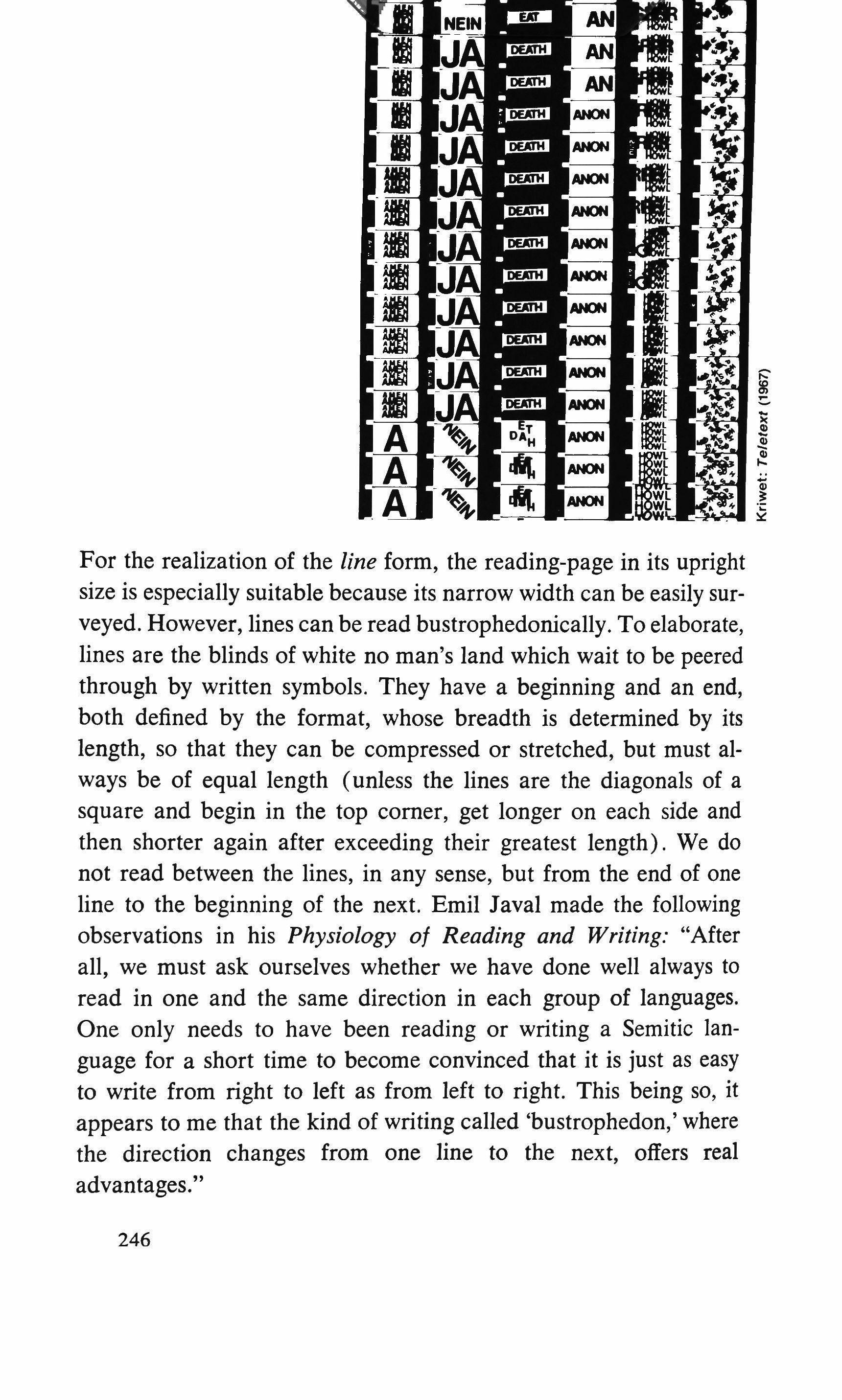
For the realization of the line form, the reading-page in its upright size is especially suitable because its narrow width can be easily surveyed. However, lines can be read bustrophedonically. To elaborate, lines are the blinds of white no man's land which wait to be peered through by written symbols. They have a beginning and an end, both defined by the format, whose breadth is determined by its length, so that they can be compressed or stretched, but must always be of equal length (unless the lines are the diagonals of a square and begin in the top comer, get longer on each side and then shorter again after exceeding their greatest length). We do not read between the lines, in any sense, but from the end of one line to the beginning of the next. Emil Javal made the following observations in his Physiology of Reading and Writing: "After all, we must ask ourselves whether we have done well always to read in one and the same direction in each group of languages. One only needs to have been reading or writing a Semitic language for a short time to become convinced that it is just as easy to write from right to left as from left to right. This being so, it appears to me that the kind of writing called 'bustrophedon,' where the direction changes from one line to the next, offers real advantages."
---IF- � � � .�==-- � � :�...,... �
246

I use the term compact form for reading-sheets which are almost completely and regularly covered with writing. For the composition of these reading-sheets, no points, groups, fields, columns or lines are used, although when covering the sheet with writing, I employ the longest possible lines with the smallest distance between them.
A justifiable objection is that a stubbornly mechanical classification of the previously mentioned forms, at least of the first five forms, is compositorially banal. I should like to make it clear that my descriptions are consciously didactic, suitable for lectures, seminars, literary reviews, et cetera, introducing those interested in the development of literature to the problems and techniques of these forms. Naturally, it is by no means certain that a purely punctual or group form, etc., cannot be a valid composition-the same goes for a composition using several techniques; in the end only the quality is important. I make this objection in order to close those drawers which so quickly open in order to enclose independent thinking even before it has been accomplished. With my typological models and considerations, I by no meanswish to establish dogmas on visually perceptible literature, but rather to stimulate other authors and clarify myself.
After the typology of possibilities of visually perceptible literature of rectangular shape, I should like to speak a little about the circular forms, with which I have been much occupied recently. I call them "Rundscheiben." These Rundscheiben are also read in a different manner: the text sort of coils itself up, or uncoils, according to whether it is to be read from the outside toward the center or vice versa. The activity of the reader of these texts is also expressed by the manual action which makes it possible for the text to be read, i.e. by turning mobile discs. With respect to the development of the text and the reading tendency, which are especially important for these texts, five basic types can be distinguished. The first two developments are both global, in one case from the center to the periphery, and in the other from the 247

periphery to the center. The optical density around the center is identical with semantic density of the text; from the center the text becomes frayed, semantically and visually, with a centrifugal movement; at the periphery there remain only the rudiments of its former complexity. The direction of reading the text is from the inside left to the outside right; therefore, the perception of these Rundscheiben by the active reader will in the beginning be apperceptive and attentive (deciphering); as the reader progresses outwardly, the perception will become assimilative and continuous and finally punctual.
A third development of the text is the one-line development; the individual rings of the Rundscheibe are independent; they are to be read either from left to right or from right to left, but having no prescribed direction for the entire text. Both directions can be combined, too, in one text, so that, for instance, one direction represents the main motif, whereas the motif running in the other direction is its commentary.
The fourth type of text, which could be described as being "in contrary motion," endeavors to combine both directions of the text in a ring or in a circular line. It should combine, in one and the same ring, two or more motifs in contrary motion so that it would have to be read once from left to right and once from right to left. Or the line dividing a ring in the middle is the upper limit of a new motif in contrary motion. Example: a Rundscheibe with a diameter of 60 centimetres consists of fifty-six rings, each 5 millimetres wide (the diameter, then, or the vacant center is 4 centimetres). If a text-motif runs from left to right between the first and third rings, the second motif can run right to left between the second and fourth rings.
The last form is a directionless one, neither beginning on the periphery and working toward the middle nor the other way round; it is read according to the typographically emphasized motifs. An example of this is my first Rundscheibe.
248
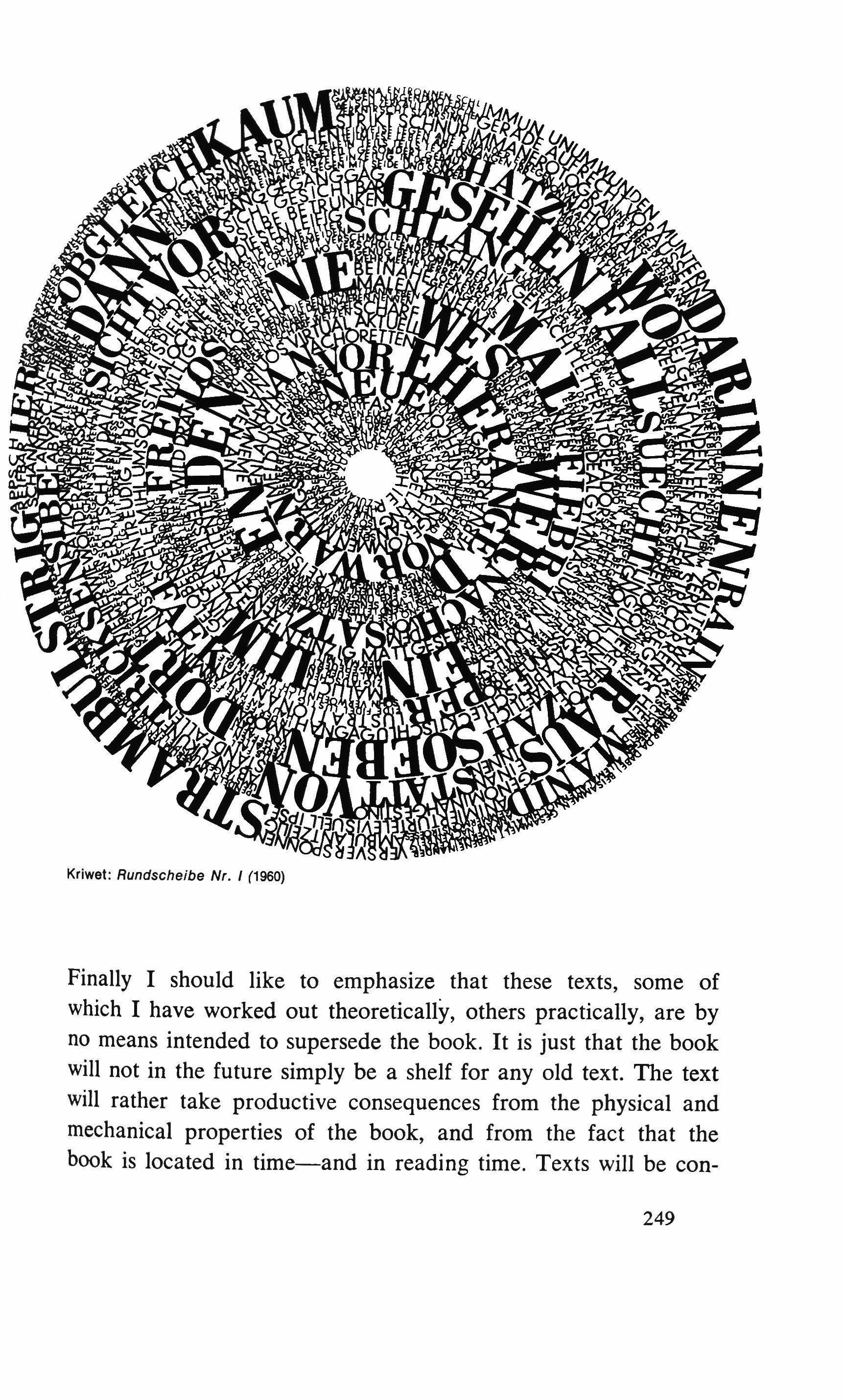
Finally I should like to emphasize that these texts, some of which I have worked out theoretically, others practically, are by no means intended to supersede the book. It is just that the book will not in the future simply be a shelf for any old text. The text will rather take productive consequences from the physical and mechanical properties of the book, and from the fact that the book is located in time-and in reading time. Texts will be con-
Kriwet: Rundscheibe Nr. I (1960)
249
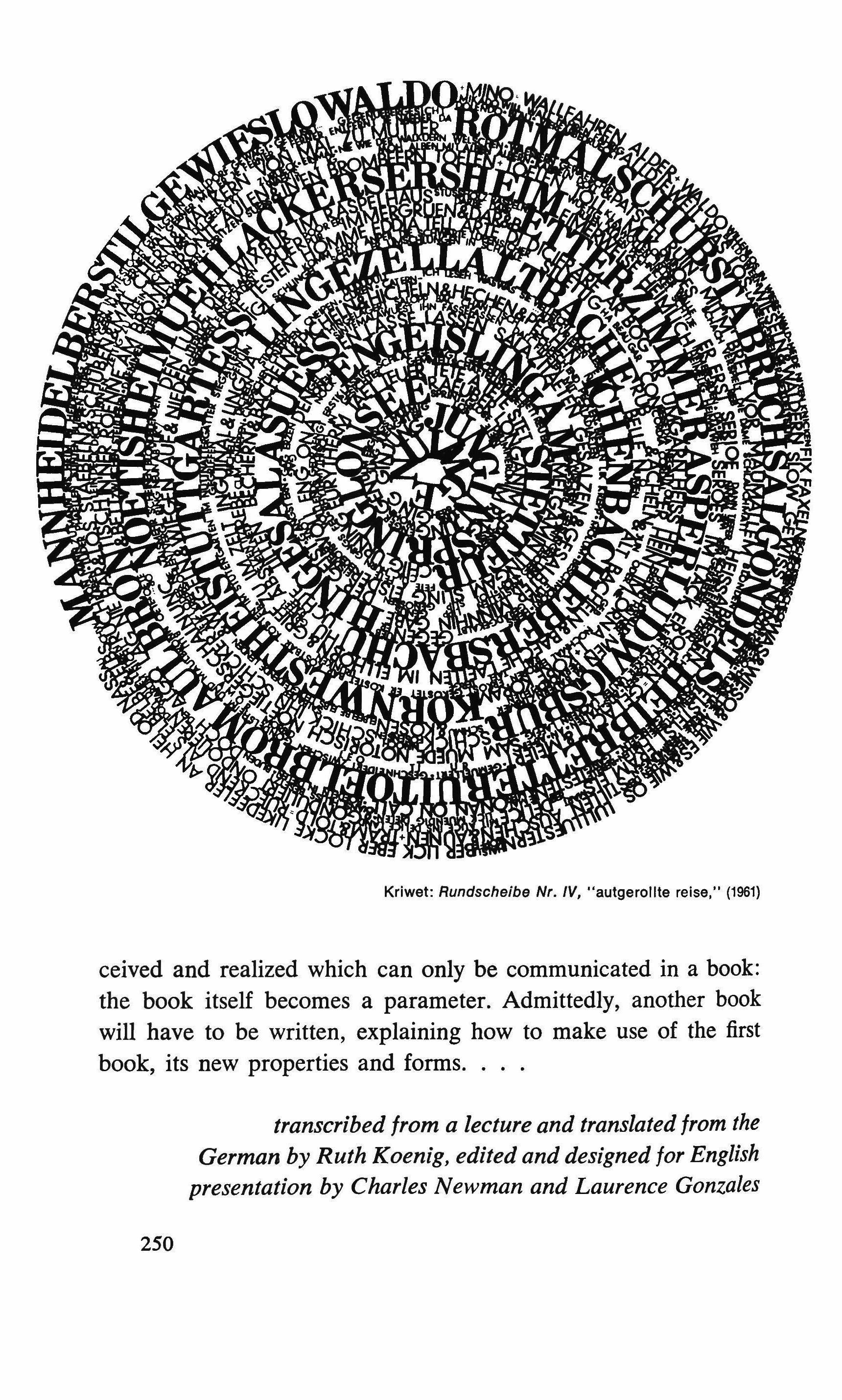
ceived and realized which can only be communicated in a book: the book itself becomes a parameter. Admittedly, another book will have to be written, explaining how to make use of the first book, its new properties and forms.
transcribed from a lecture and translated from the German by Ruth Koenig, edited and designed for English presentation by Charles Newman and Laurence Gonzales
Kriwet: Rundscheibe Nr. IV, "autgerollte reise," (1961)
250
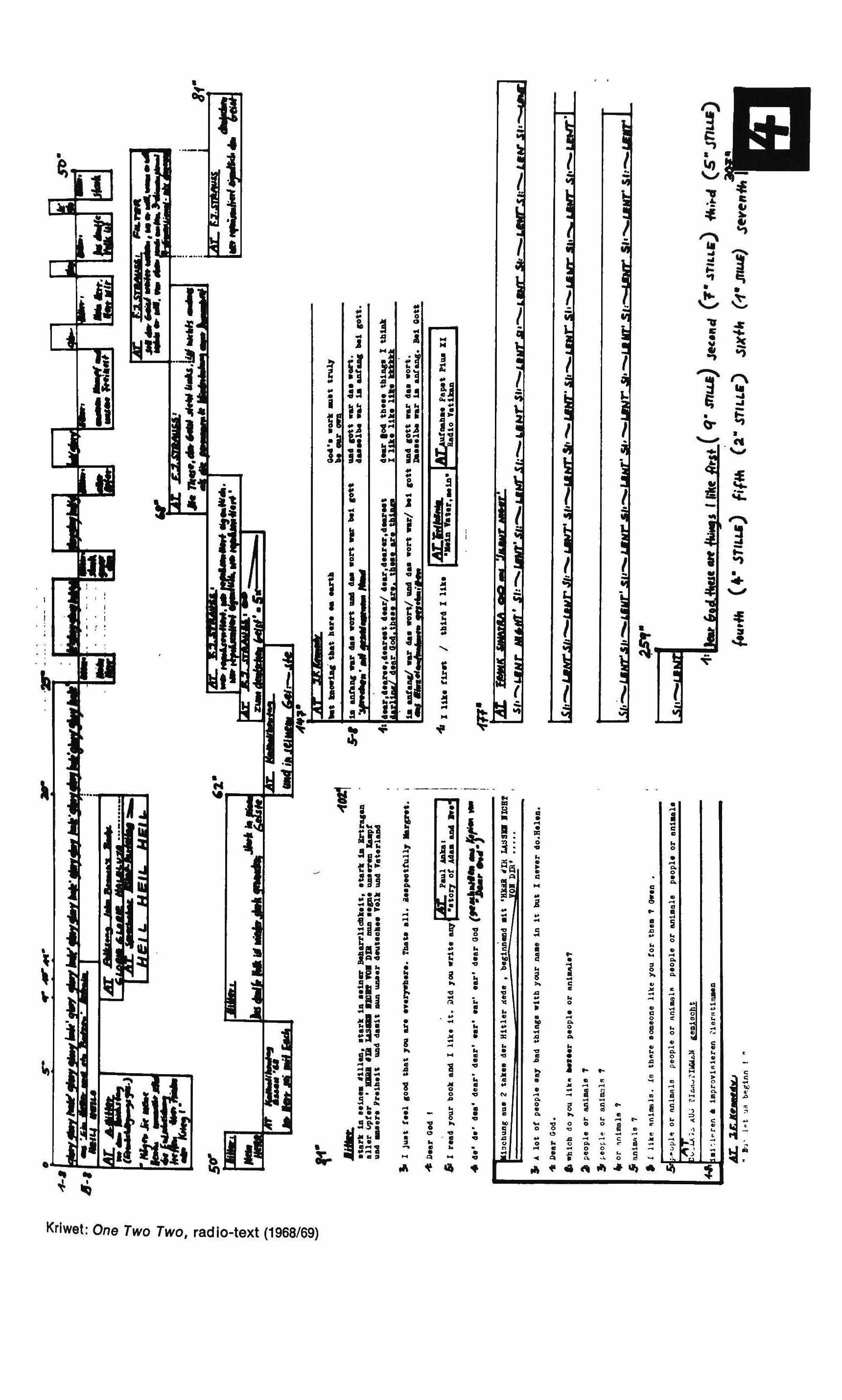
"*...,.Wr) 'P-"� � t,�� r-I--, -1-1tt':::en":'"..,h;r ·-., � ..r-;:u; '1· ri'auo:��_------------------------"ii iD i'111_ 'arll: 1A talD' hbarrl1at1l1:d'C••'Carll: ta D-1raa:_ Upt... uaa 1m � tu ltD l!IUI p. IIIIIpt _.1'. 'read" 1IoIld"--U JIIIA l&QIIar UC "a111 QD4 .,.d.rlaDII l .ood ,bat lIN a l'J'I'bua. fM,t. .II p th117 r t. I � ._1_, � 10\U' book 1 Uka it. i)ld IOU .rU. 1UQ':;2 ot Mall II dear' 4 1" "I" "I" aU" 0. 1' aod ("�-'::.f"'" lUI. 2 tak dar HlUer 4ad. I baglnn.."d ait 'UU .iIH wsa lICK! �t people ear bad thilll' .Uh lwr naa. in it but I neT'l' do,Bd'D. G04. you Uk 1' peopla or RJllu.hf or anl 1e T or anl111.:!11! la 'In1_le. La ttl"r. Ia..one Uke YOIl tor ttlea t a.,a or MllU'lla people ilnlaal" people Ml.e.lI!I people or ant l. AU" i'I"" n.IGUJI &.!!!!£h! ren. iJlprQ.l111eran i'lBrRtllU18D ag".,. '-I� b'!gtnn � -fa'l �' orII: _.t trvlr" ptt war wor1 1Ni wa.r 18 ut _I ptt 1.4t.IIa!!ia------riT ,. Pi U I 1 Ilk. Urn / tbir4 1 llk. .JId.a Yahr._1D. �lO '.tUaa. ..",. l!:::r-:':..:I!;:;.:::..rS'.-- Hr,l"--L.ur,g'--LlIlCa I S; L«NC.sh�".,r .ltt-- UIIT .s"-""YNT"" &IHT' ,$',-....a. r SII-:""'YMr I SII�LlHT'$" "__LIH�'-��� Wlr .II. -...-..�:�, "'-lAIr .sr1 U-:-$I:� � =. ;. bfLfls9c - �J • like firs. ( q. -ffIU..I) ltg.1It ( •• Jr,u..) fifllt (a" JT'LL�) Jec.ft" (., .sTILL�) « ,su(flt
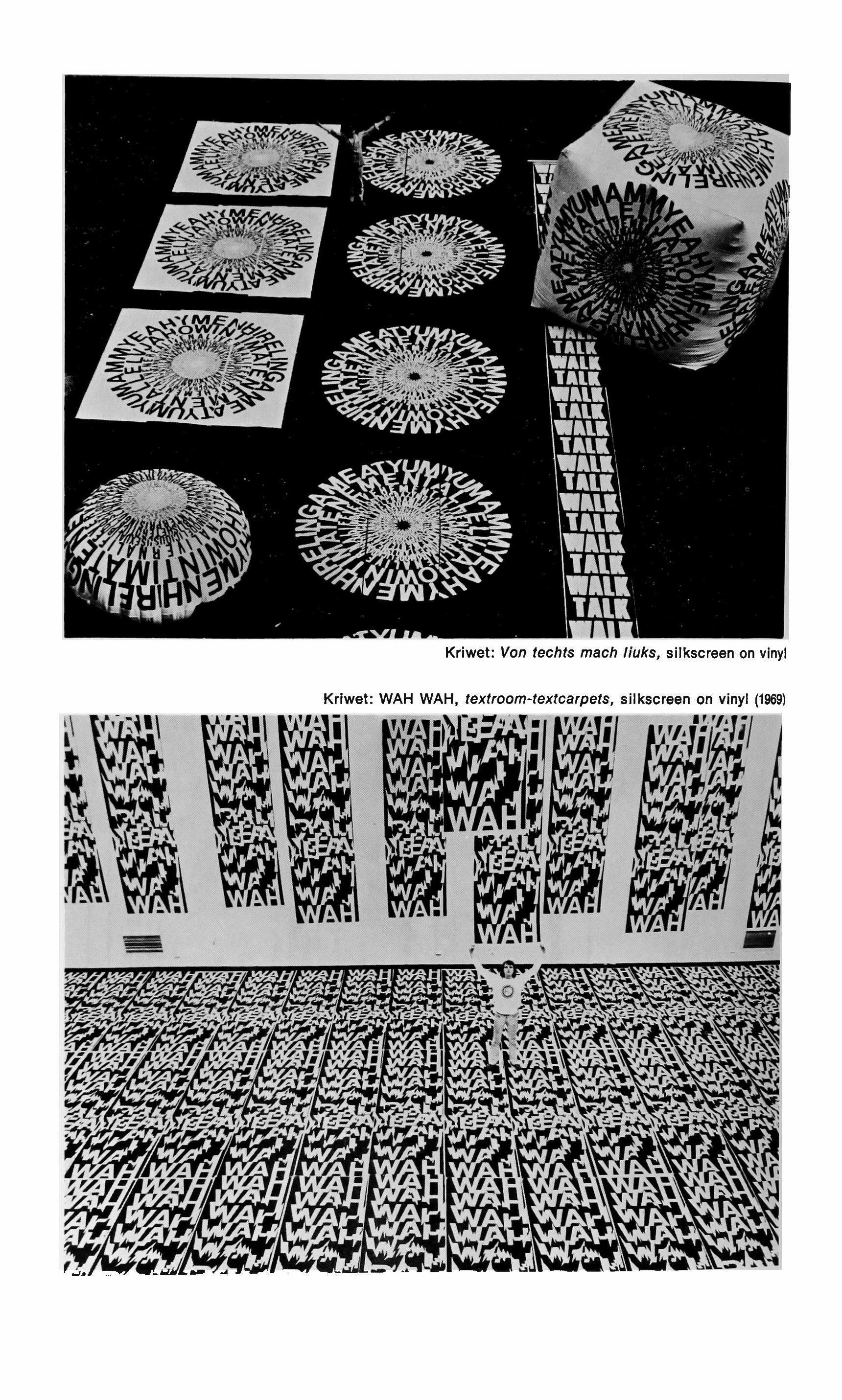 Kriwet: Von teehts mach liuks, silkscreen on vinyl
Kriwet: Von teehts mach liuks, silkscreen on vinyl
Information
This sentence contains no information whatsoever. This sentence contains more information than the preceding sentence.
Because this sentence says, "This sentence contains less information than the preceding sentence," it contains more information than the preceding sentence. This sentence contains the same information as the preceding sentence.
This sentence contains no more information than the following sentence.
This sentence contains no less information than the preceding sentence.
JACK ANDERSON
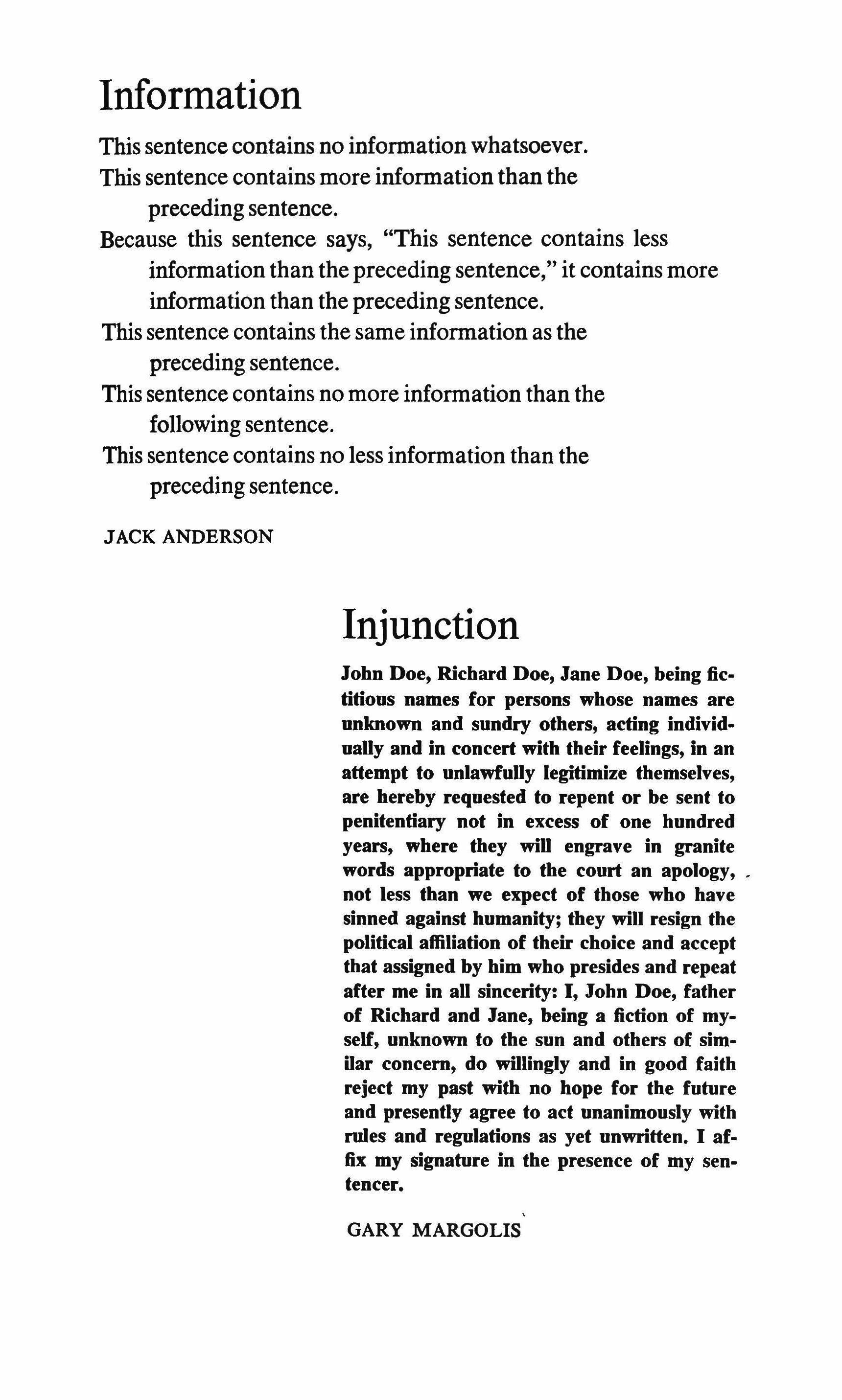
Injunction
John Doe, Richard Doe, Jane Doe, being fictitious names for persons whose names are unknown and sundry others, acting individually and in concert with their feelings, in an attempt to unlawfully legitimize themselves, are hereby requested to repent or be sent to penitentiary not in excess of one hundred years, where they will engrave in granite words appropriate to the court an apology, not less than we expect of those who have sinned against humanity; they will resign the political affiliation of their choice and accept that assigned by him who presides and repeat after me in all sincerity: I, John Doe, father of Richard and Jane, being a fiction of myself, unknown to the sun and others of similar concern, do willingly and in good faith reject my past with no hope for the future and presently agree to act unanimously with rules and regulations as yet unwritten. I affix my signature in the presence of my sentencer.
GARY MARGOLIS
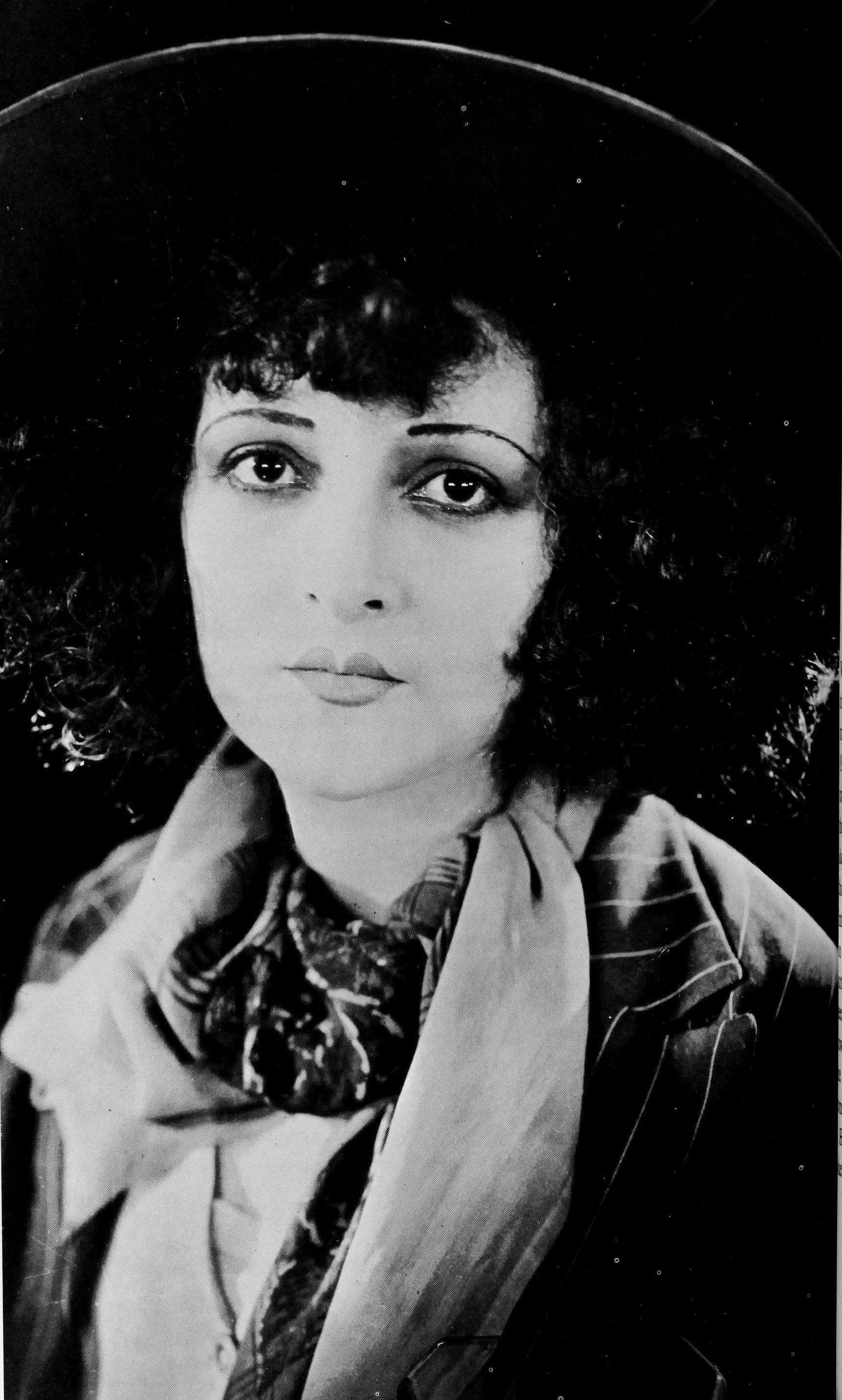
Was Lia de Putti dead
at 22? ALBERT J. GUERARD

Writers lie, though not always deliberately; the best writers "distort." For many years it has been a bone of family contention as to whether I did, when we called on William Faulkner in June of 1946, see a cow in his front yard. My wife claims I transposed the cow from pasture to front yard because my French readers (I was then doing a monthly chronique for something called the Magasin du Spectacle) would be pleased to have one there. But what of those other French readers told by Faulkner himself, in a Paris interview, that he had inherited this "plantation" from his father: an utter fabrication, since the house was in fact purchased by him not so many years before? I have always maintained that I had seen, could still see that cow in the front yard, a black and white cow. But certainly it is true that more than once my wife has told me a story at breakfast, only to have it returned to her at supper, considerably embellished, as something I had heard "at work." How then do we know anything? How do we know whether Rousseau really exhibited himself before the girls at the
TriQuarterly 255
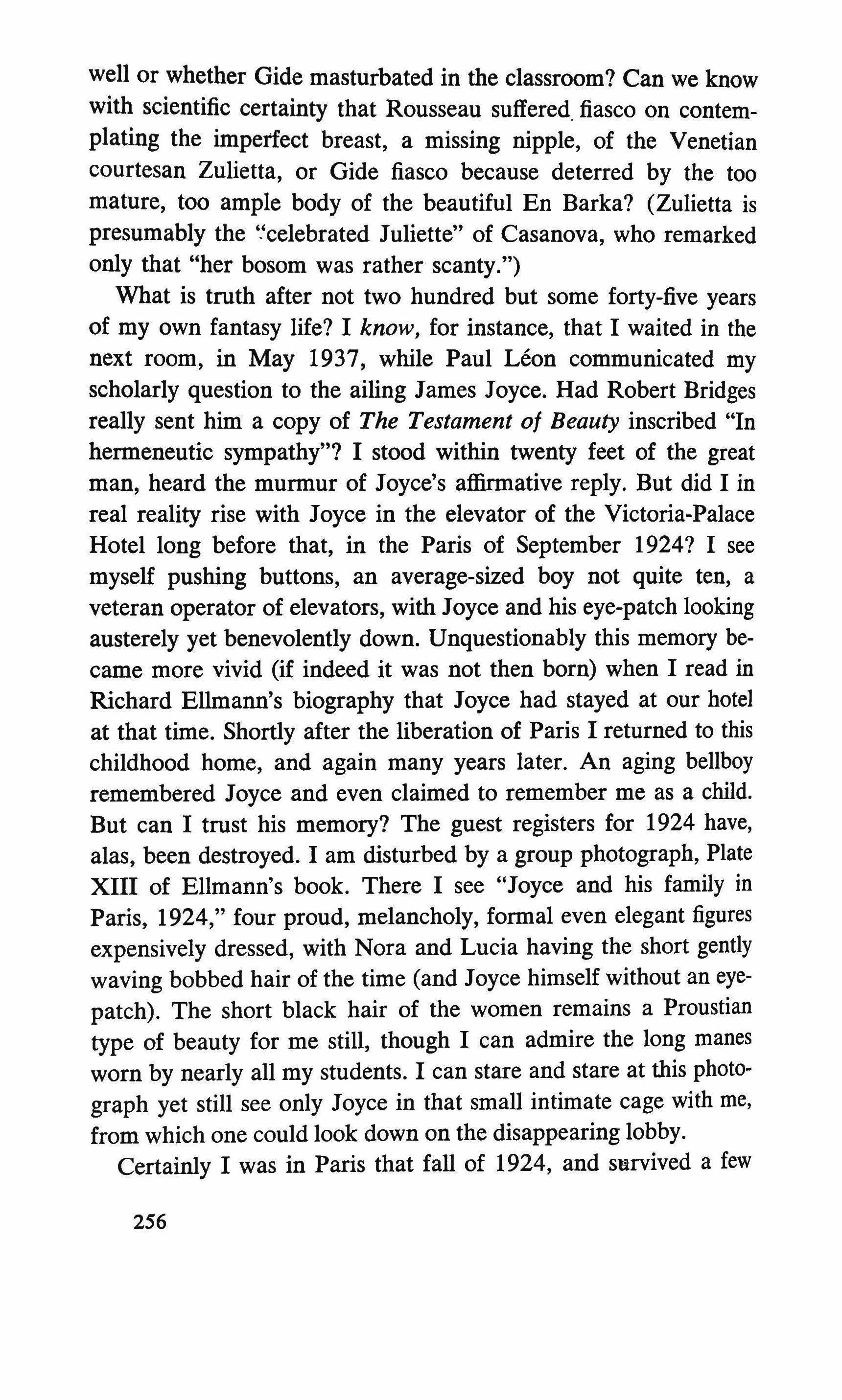
well or whether Gide masturbated in the classroom? Can we know with scientific certainty that Rousseau suffered. fiasco on contemplating the imperfect breast, a missing nipple, of the Venetian courtesan Zulietta, or Gide fiasco because deterred by the too mature, too ample body of the beautiful En Barka? (Zulietta is presumably the '.'celebrated Juliette" of Casanova, who remarked only that "her bosom was rather scanty.")
What is truth after not two hundred but some forty-five years of my own fantasy life? I know, for instance, that I waited in the next room, in May 1937, while Paul Leon communicated my scholarly question to the ailing James Joyce. Had Robert Bridges really sent him a copy of The Testament of Beauty inscribed "In hermeneutic sympathy"? I stood within twenty feet of the great man, heard the murmur of Joyce's affirmative reply. But did I in real reality rise with Joyce in the elevator of the Victoria-Palace Hotel long before that, in the Paris of September 1924? I see myself pushing buttons, an average-sized boy not quite ten, a veteran operator of elevators, with Joyce and his eye-patch looking austerely yet benevolently down. Unquestionably this memory became more vivid (if indeed it was not then born) when I read in Richard Ellmann's biography that Joyce had stayed at our hotel at that time. Shortly after the liberation of Paris I returned to this childhood home, and again many years later. An aging bellboy remembered Joyce and even claimed to remember me as a child. But can I trust his memory? The guest registers for 1924 have, alas, been destroyed. I am disturbed by a group photograph, Plate XIII of Ellmann's book. There I see "Joyce and his family in Paris, 1924," four proud, melancholy, formal even elegant figures expensively dressed, with Nora and Lucia having the short gently waving bobbed hair of the time (and Joyce himself without an eyepatch). The short black hair of the women remains a Proustian type of beauty for me still, though I can admire the long manes worn by nearly all my students. I can stare and stare at this photograph yet still see only Joyce in that small intimate cage with me, from which one could look down on the disappearing lobby.
Certainly I was in Paris that fall of 1924, and survived a few 256
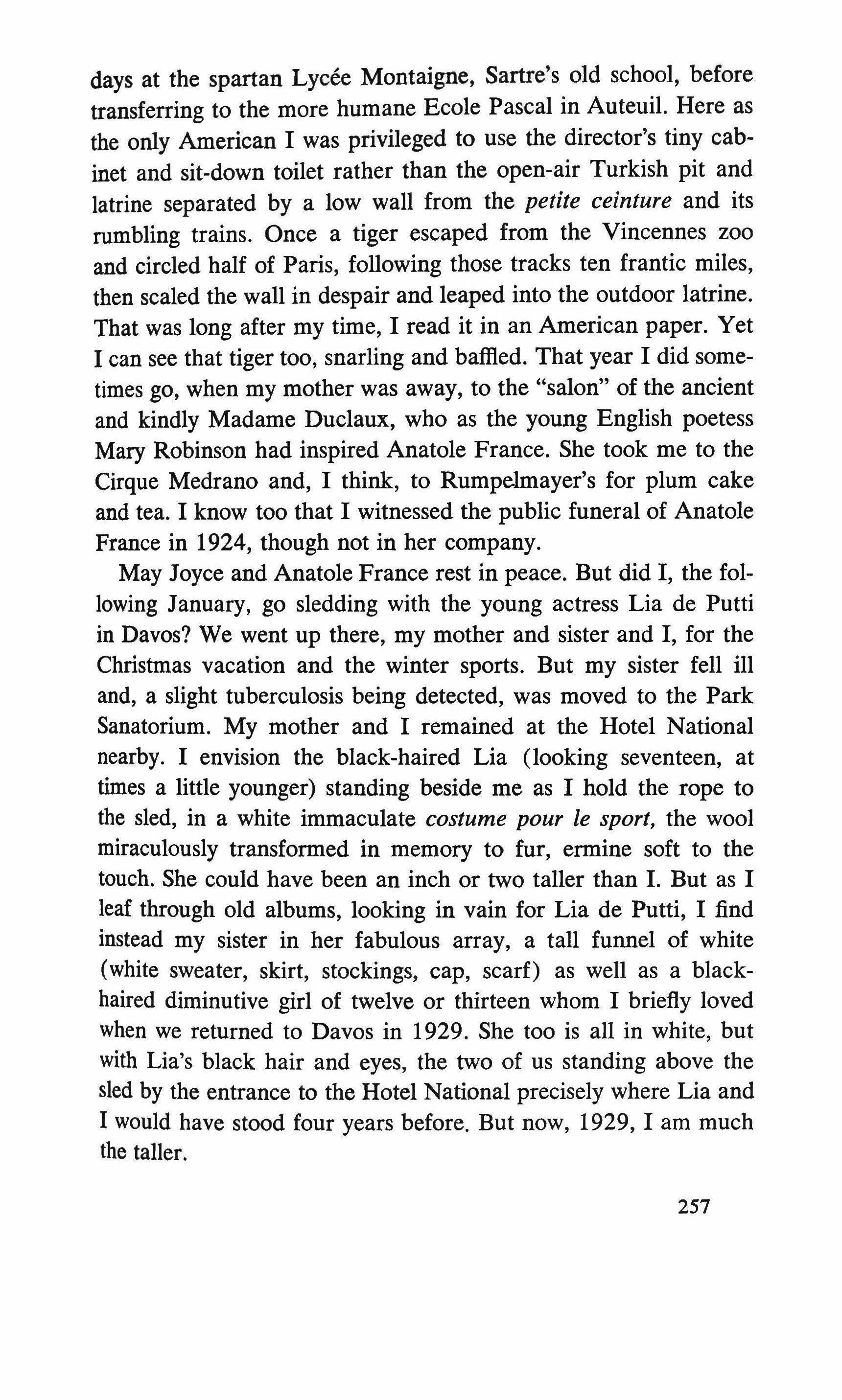
days at the spartan Lycee Montaigne, Sartre's old school, before transferring to the more humane Ecole Pascal in Auteuil. Here as the only American I was privileged to use the director's tiny cabinet and sit-down toilet rather than the open-air Turkish pit and latrine separated by a low wall from the petite ceinture and its rumbling trains. Once a tiger escaped from the Vincennes zoo and circled half of Paris, following those tracks ten frantic miles, then scaled the wall in despair and leaped into the outdoor latrine. That was long after my time, I read it in an American paper. Yet I can see that tiger too, snarling and baffled. That year I did sometimes go, when my mother was away, to the "salon" of the ancient and kindly Madame Duclaux, who as the young English poetess Mary Robinson had inspired Anatole France. She took me to the Cirque Medrano and, I think, to Rumpelmayer's for plum cake and tea. I know too that I witnessed the public funeral of Anatole France in 1924, though not in her company.
May Joyce and Anatole France rest in peace. But did I, the following January, go sledding with the young actress Lia de Putti in Davos? We went up there, my mother and sister and I, for the Christmas vacation and the winter sports. But my sister fell ill and, a slight tuberculosis being detected, was moved to the Park Sanatorium. My mother and I remained at the Hotel National nearby. I envision the black-haired Lia (looking seventeen, at times a little younger) standing beside me as I hold the rope to the sled, in a white immaculate costume pour le sport, the wool miraculously transformed in memory to fur, ermine soft to the touch. She could have been an inch or two taller than I. But as I leaf through old albums, looking in vain for Lia de Putti, I find instead my sister in her fabulous array, a tall funnel of white (white sweater, skirt, stockings, cap, scarf) as well as a blackhaired diminutive girl of twelve or thirteen whom I briefly loved when we returned to Davos in 1929. She too is all in white, but with Lia's black hair and eyes, the two of us standing above the sled by the entrance to the Hotel National precisely where Lia and I would have stood four years before. But now, 1929, I am much the taller. 257
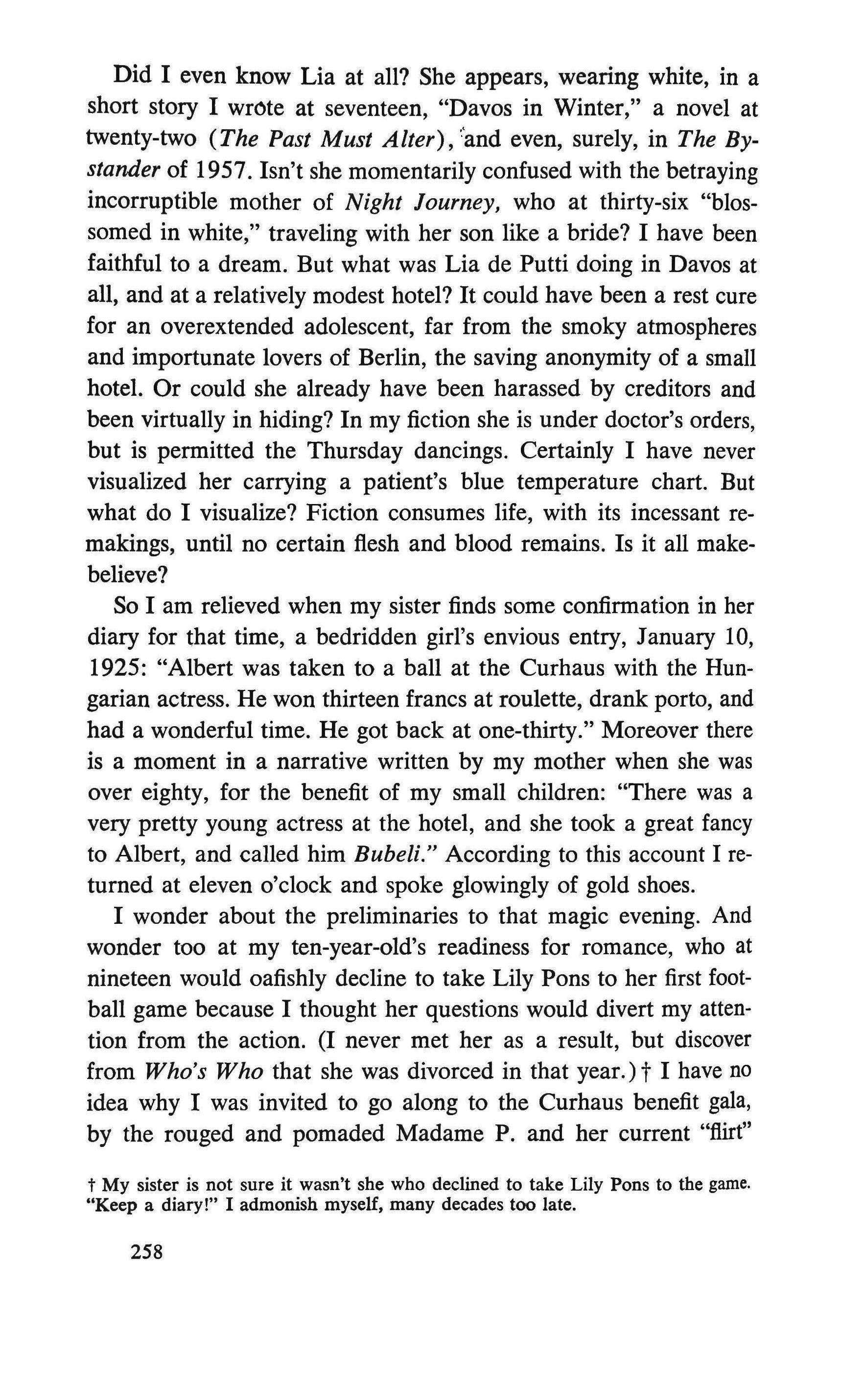
Did I even know Lia at all? She appears, wearing white, in a short story I wrote at seventeen, "Davos in Winter," a novel at twenty-two (The Past Must Alter), 'and even, surely, in The Bystander of 1957. Isn't she momentarily confused with the betraying incorruptible mother of Night Journey, who at thirty-six "blossomed in white," traveling with her son like a bride? I have been faithful to a dream. But what was Lia de Putti doing in Davos at all, and at a relatively modest hotel? It could have been a rest cure for an overextended adolescent, far from the smoky atmospheres and importunate lovers of Berlin, the saving anonymity of a small hotel. Or could she already have been harassed by creditors and been virtually in hiding? In my fiction she is under doctor's orders, but is permitted the Thursday dancings. Certainly I have never visualized her carrying a patient's blue temperature chart. But what do I visualize? Fiction consumes life, with its incessant remakings, until no certain flesh and blood remains. Is it all makebelieve?
So I am relieved when my sister finds some confirmation in her diary for that time, a bedridden girl's envious entry, January 10, 1925: "Albert was taken to a ball at the Curhaus with the Hungarian actress. He won thirteen francs at roulette, drank porto, and had a wonderful time. He got back at one-thirty." Moreover there is a moment in a narrative written by my mother when she was over eighty, for the benefit of my small children: "There was a very pretty young actress at the hotel, and she took a great fancy to Albert, and called him Bubeli." According to this account I returned at eleven o'clock and spoke glowingly of gold shoes. I wonder about the preliminaries to that magic evening. And wonder too at my ten-year-old's readiness for romance, who at nineteen would oafishly decline to take Lily Pons to her first football game because I thought her questions would divert my attention from the action. (I never met her as a result, but discover from Who's Who that she was divorced in that year.) t I have no idea why I was invited to go along to the Curhaus benefit gala, by the rouged and pomaded Madame P. and her current "flirt"
t My sister is not sure it wasn't she who declined to take Lily Pons to the game. "Keep a diary!" I admonish myself, many decades too late.
258
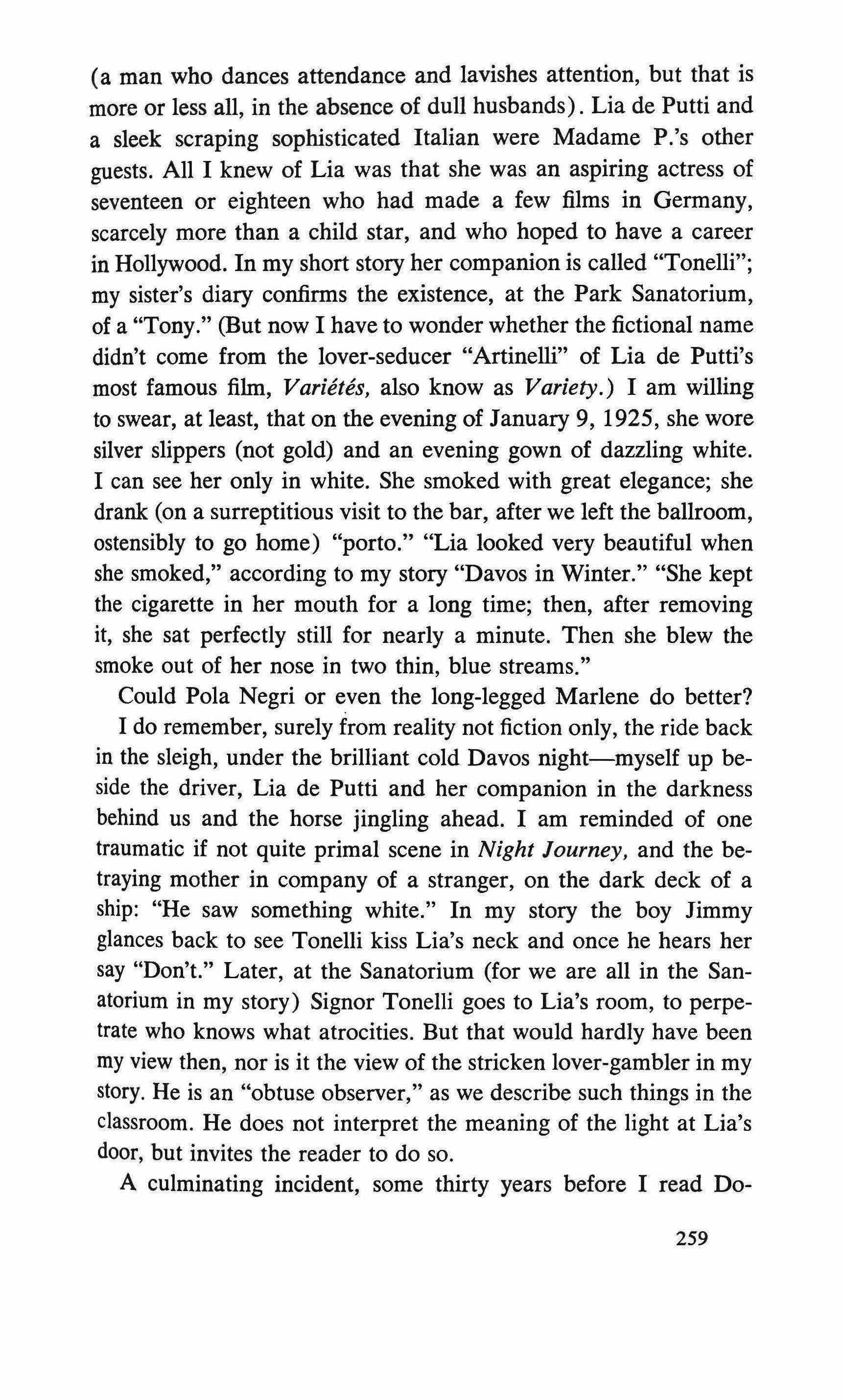
(a man who dances attendance and lavishes attention, but that is more or less all, in the absence of dull husbands). Lia de Putti and a sleek scraping sophisticated Italian were Madame P.'s other guests. All I knew of Lia was that she was an aspiring actress of seventeen or eighteen who had made a few films in Germany, scarcely more than a child star, and who hoped to have a career in Hollywood. In my short story her companion is called "Tonelli"; my sister's diary confirms the existence, at the Park Sanatorium, of a "Tony." (But now I have to wonder whether the fictional name didn't come from the lover-seducer "Artinelli" of Lia de Putti's most famous film, Varietes, also know as Variety.) I am willing to swear, at least, that on the evening of January 9, 1925, she wore silver slippers (not gold) and an evening gown of dazzling white. I can see her only in white. She smoked with great elegance; she drank (on a surreptitious visit to the bar, after we left the ballroom, ostensibly to go home) "porto." "Lia looked very beautiful when she smoked," according to my story "Davos in Winter." "She kept the cigarette in her mouth for a long time; then, after removing it, she sat perfectly still for nearly a minute. Then she blew the smoke out of her nose in two thin, blue streams."
Could Pola Negri or even the long-legged Marlene do better?
I do remember, surely from reality not fiction only, the ride back in the sleigh, under the brilliant cold Davos night-myself up beside the driver, Lia de Putti and her companion in the darkness behind us and the horse jingling ahead. I am reminded of one traumatic if not quite primal scene in Night Journey, and the betraying mother in company of a stranger, on the dark deck of a ship: "He saw something white." In my story the boy Jimmy glances back to see Tonelli kiss Lia's neck and once he hears her say "Don't." Later, at the Sanatorium (for we are all in the Sanatorium in my story) Signor Tonelli goes to Lia's room, to perpetrate who knows what atrocities. But that would hardly have been my view then, nor is it the view of the stricken lover-gambler in my story. He is an "obtuse observer," as we describe such things in the classroom. He does not interpret the meaning of the light at Lia's door, but invites the reader to do so.
A culminating incident, some thirty years before I read Do-
259
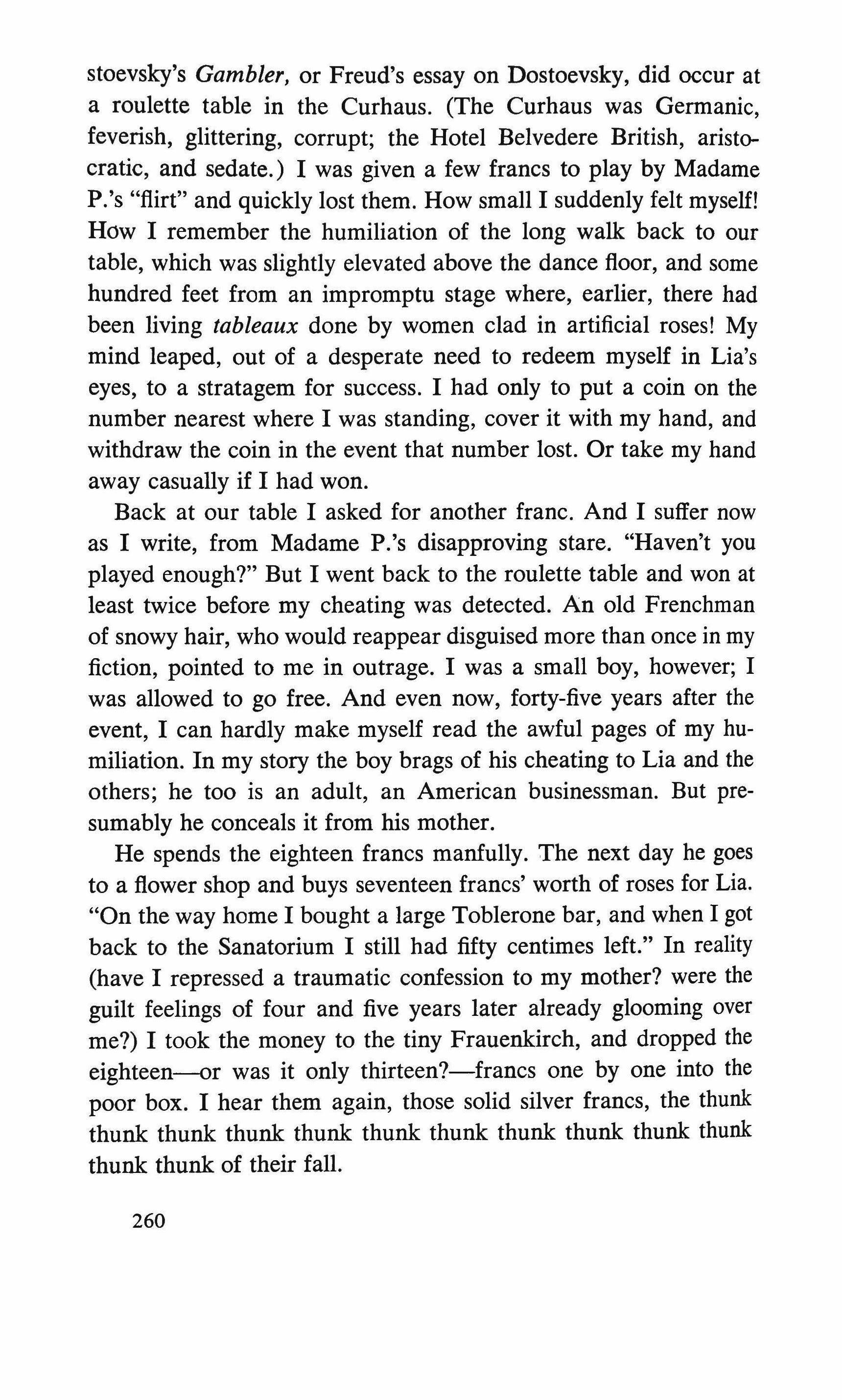
stoevsky's Gambler, or Freud's essay on Dostoevsky, did occur at a roulette table in the Curhaus. (The Curhaus was Germanic, feverish, glittering, corrupt; the Hotel Belvedere British, aristocratic, and sedate.) I was given a few francs to play by Madame P.'s "flirt" and quickly lost them. How small I suddenly felt myself! How I remember the humiliation of the long walk back to our table, which was slightly elevated above the dance floor, and some hundred feet from an impromptu stage where, earlier, there had been living tableaux done by women clad in artificial roses! My mind leaped, out of a desperate need to redeem myself in Lia's eyes, to a stratagem for success. I had only to put a coin on the number nearest where I was standing, cover it with my hand, and withdraw the coin in the event that number lost. Or take my hand away casually if I had won.
Back at our table I asked for another franc. And I suffer now as I write, from Madame P.'s disapproving stare. "Haven't you played enough?" But I went back to the roulette table and won at least twice before my cheating was detected. An old Frenchman of snowy hair, who would reappear disguised more than once in my fiction, pointed to me in outrage. I was a small boy, however; I was allowed to go free. And even now, forty-five years after the event, I can hardly make myself read the awful pages of my humiliation. In my story the boy brags of his cheating to Lia and the others; he too is an adult, an American businessman. But presumably he conceals it from his mother.
He spends the eighteen francs manfully. The next day he goes to a flower shop and buys seventeen francs' worth of roses for Lia. "On the way home I bought a large Toblerone bar, and when I got back to the Sanatorium I still had fifty centimes left." In reality (have I repressed a traumatic confession to my mother? were the guilt feelings of four and five years later already glooming over me?) I took the money to the tiny Frauenkirch, and dropped the eighteen-or was it only thirteen?-francs one by one into the poor box. I hear them again, those solid silver francs, the thunk thunk thunk thunk thunk thunk thunk thunk thunk thunk thunk thunk thunk of their fall.
260
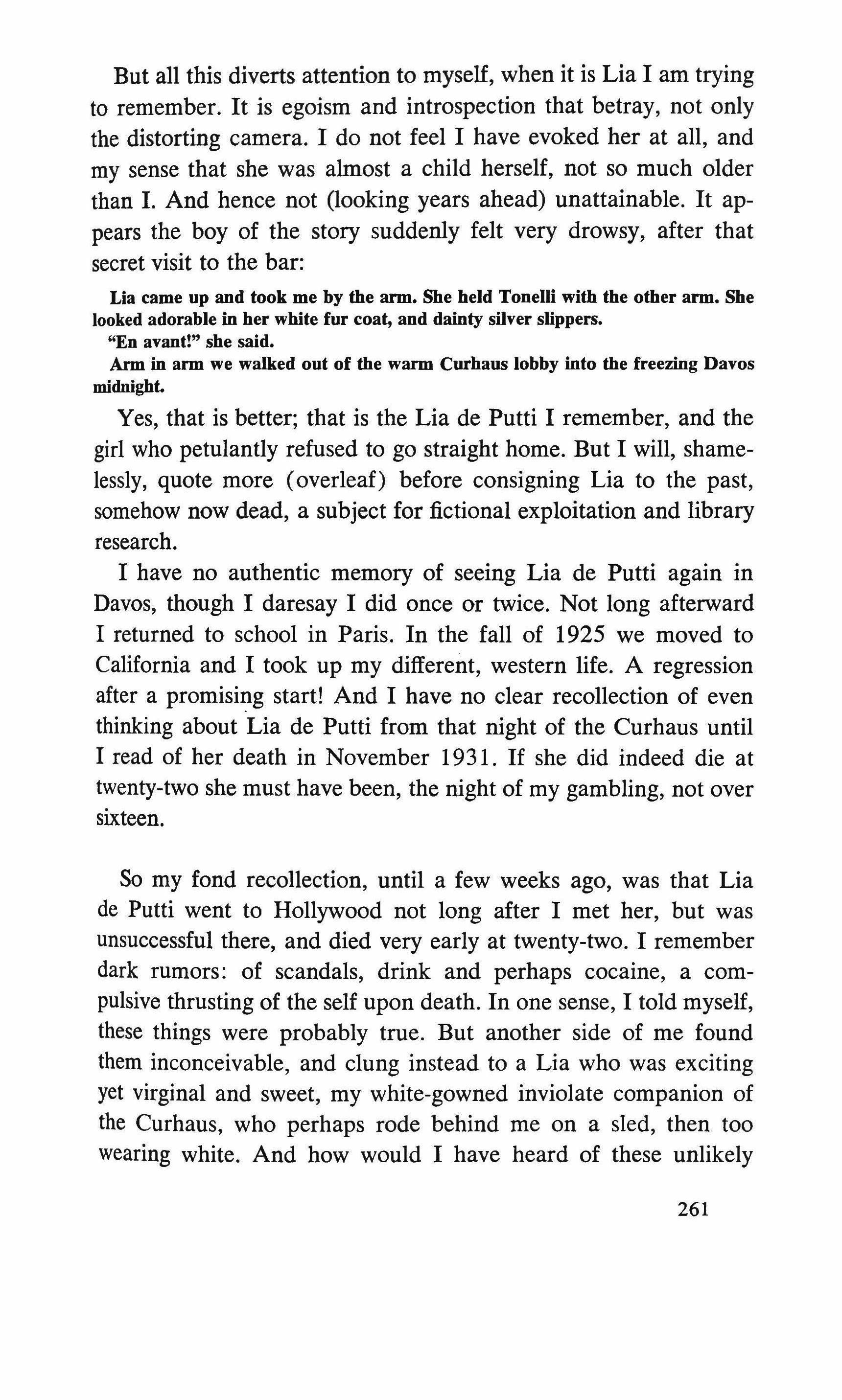
But all this diverts attention to myself, when it is Lia I am trying to remember. It is egoism and introspection that betray, not only the distorting camera. I do not feel I have evoked her at all, and my sense that she was almost a child herself, not so much older than I. And hence not (looking years ahead) unattainable. It appears the boy of the story suddenly felt very drowsy, after that secret visit to the bar:
Lia came up and took me by the arm. She held Tonelli with the other arm. She looked adorable in her white fur coat, and dainty silver slippers.
"En avant!" she said.
Ann in arm we walked out of the warm Curhaus lobby into the freezing Davos midnight.
Yes, that is better; that is the Lia de Putti I remember, and the girl who petulantly refused to go straight home. But I will, shamelessly, quote more (overleaf) before consigning Lia to the past, somehow now dead, a subject for fictional exploitation and library research.
I have no authentic memory of seeing Lia de Putti again in Davos, though I daresay I did once or twice. Not long afterward I returned to school in Paris. In the fall of 1925 we moved to California and I took up my different, western life. A regression after a promisiJ?g start! And I have no clear recollection of even thinking about Lia de Putti from that night of the Curhaus until I read of her death in November 1931. If she did indeed die at twenty-two she must have been, the night of my gambling, not over sixteen.
So my fond recollection, until a few weeks ago, was that Lia de Putti went to Hollywood not long after I met her, but was unsuccessful there, and died very early at twenty-two. I remember dark rumors: of scandals, drink and perhaps cocaine, a compulsive thrusting of the self upon death. In one sense, I told myself, these things were probably true. But another side of me found them inconceivable, and clung instead to a Lia who was exciting yet virginal and sweet, my white-gowned inviolate companion of the Curhaus, who perhaps rode behind me on a sled, then too wearing white. And how would I have heard of these unlikely
261

Mother would be worried. She would wonder if the sleigh had been upset in a ditch. Yes, it was time to go.
"Maybe we should go," I said. Lia Daranyi looked annoyed. "But I can go home alone," I added. "There's no need for anyone else to go."
"Your nurse will tell the doctor, Lia," Madame Lowen said. "He might not let you go to the dancings Thursday."
"W d " L' id "I' hild e on t want to go now, ia sal. m not a c 1
Anyway, the doctor can't tell me when to come or go; I'll go to the dancings if I want." She picked up her glass and held it' against her lower lip. Ii was carefully painted. I wanted to touch her lip. It looked stiff and angry.
"We might as well go," Tonelli said. "There is no dancing tonight. And the Tableaux are :finished."
Neatly austere, very straight, Mr. Howard stood up.
"I hope we see you again soon," he said. Signor Tonelli also stood up. It was over now. We would have to go.
"I am treated like a child," Lia Daranyi said.
"You are a child," Tonelli said. "A,very beautiful, spoiled child." ,-
Lia didn't answer him. She stood up.
"Mr. Howard wants to get rid of us. We'll have to go." Lia smiled at Madame Lowen. Mr. Howard bent over Lia's hand and kissed it. Then we were going.
I walked over beside Madame Lowen. I shook hands with her. "I've had a wonderful time. The Tableaux were :fine."
"I knew you'd enjoy the Tableaux," Madame Lowen said. "I hope you'll always be lucky at roulette, too!" She put her arm around me. "I hope your mother won't be angry. I wouldn't tell her about how you won the eighteen francs."
I smiled at her.
"Maybe I'd better not." I went over and shook hands with Mr. Howard. I liked him very much. I was glad that Madame Lowen had stopped teasing him. I wondered if he liked Madame Lowen.
Davos in Winter 57
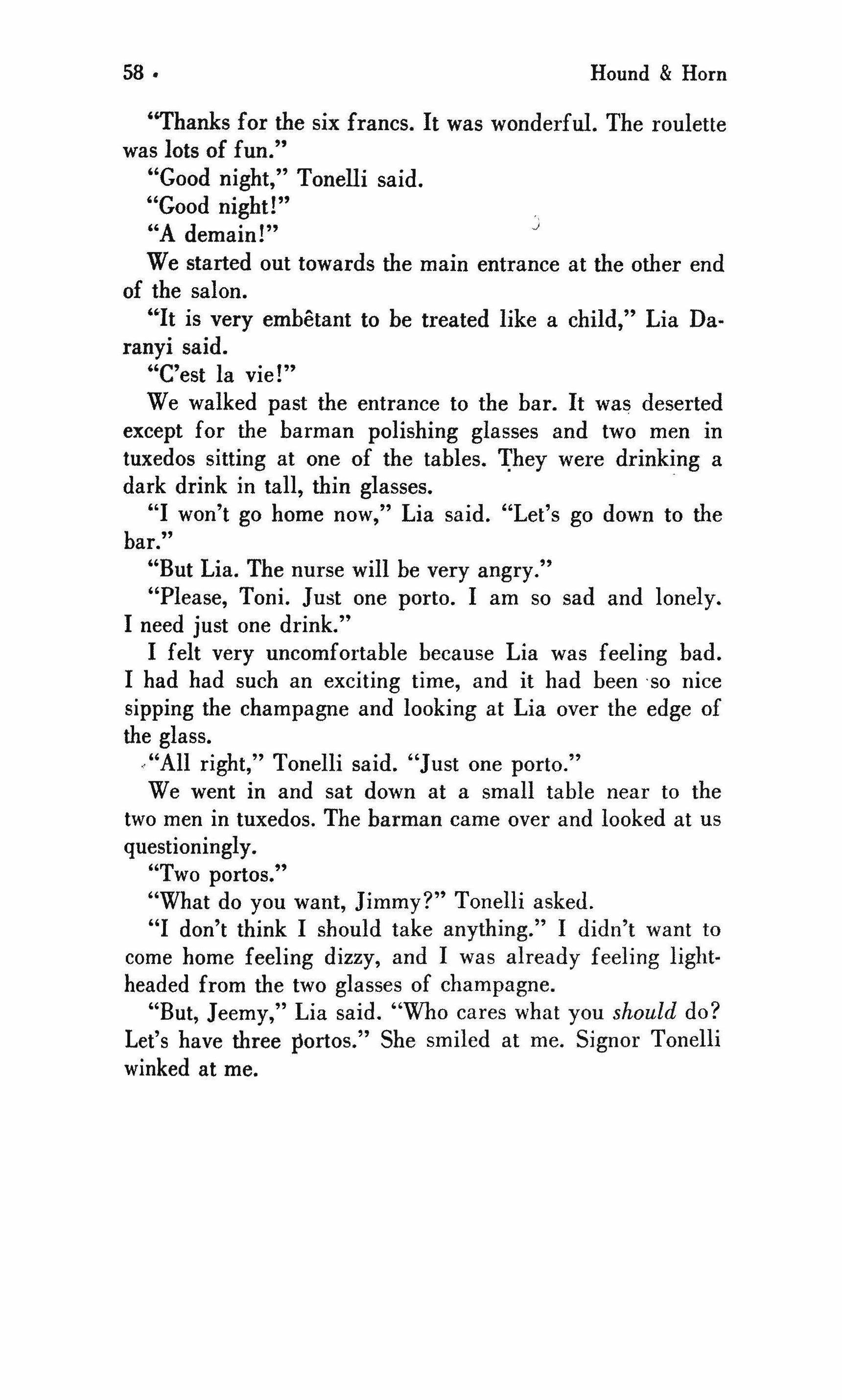
58. Hound & Horn
''Thanks for the six francs. It was wonderful. The roulette was lots of fun."
"Good night," Tonelli said.
"Good night!"
"A demain!" .)
We started out towards the main entrance at the other end of the salon.
"It is very embetant to be treated like a child," Lia Daranyi said.
"C'est la vie!"
We walked past the entrance to the bar. It was deserted except for the barman polishing glasses and two men in tuxedos sitting at one of the tables. They were drinking a dark drink in tall, thin glasses.
"I won't go home now," Lia said. "Let's go down to the bar."
"But Lia. The nurse will be very angry."
"Please, Toni. Just one porto. I am so sad and lonely. I need just one drink."
I felt very uncomfortable because Lia was feeling bad. I had had such an exciting time, and it had been 'so nice sipping the champagne and looking at Lia over the edge of the glass.
,"All right," Tonelli said. "Just one porto."
We went in and sat down at a small table near to the two men in tuxedos. The barman came over and looked at us questioningly.
"Two portos."
"What do you want, Jimmy?" Tonelli asked.
"I don't think I should take anything." I didn't want to come home feeling dizzy, and I was already feeling lightheaded from the two glasses of champagne.
"But, Jeemy," Lia said. "Who cares what you should do? Let's have three portos." She smiled at me. Signor Tonelli winked at me.
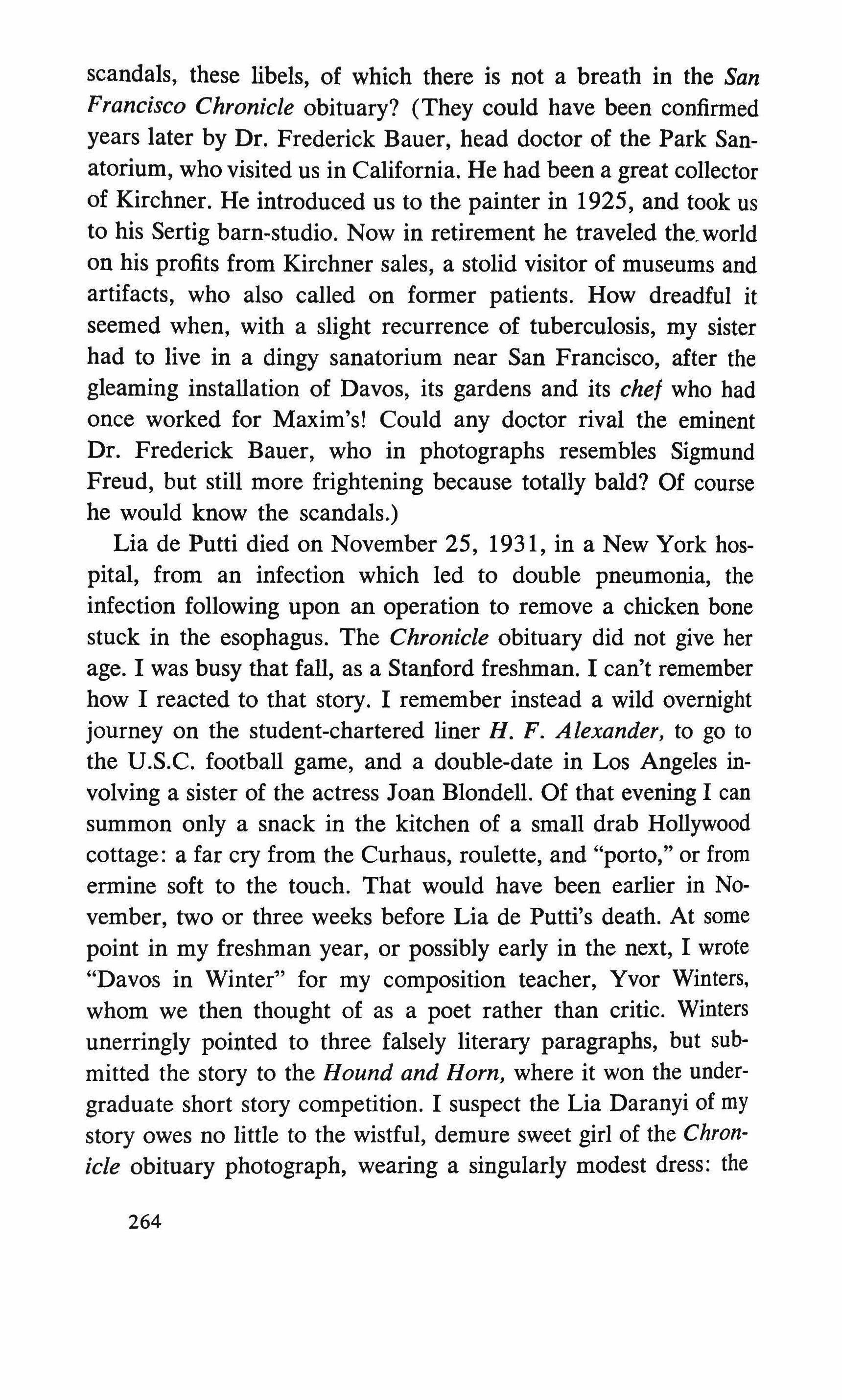
scandals, these libels, of which there is not a breath in the San Francisco Chronicle obituary? (They could have been confirmed years later by Dr. Frederick Bauer, head doctor of the Park Sanatorium, who visited us in California. He had been a great collector of Kirchner. He introduced us to the painter in 1925, and took us to his Sertig barn-studio. Now in retirement he traveled the.world on his profits from Kirchner sales, a stolid visitor of museums and artifacts, who also called on former patients. How dreadful it seemed when, with a slight recurrence of tuberculosis, my sister had to live in a dingy sanatorium near San Francisco, after the gleaming installation of Davos, its gardens and its chef who had once worked for Maxim's! Could any doctor rival the eminent Dr. Frederick Bauer, who in photographs resembles Sigmund Freud, but still more frightening because totally bald? Of course he would know the scandals.)
Lia de Putti died on November 25, 1931, in a New York hospital, from an infection which led to double pneumonia, the infection following upon an operation to remove a chicken bone stuck in the esophagus. The Chronicle obituary did not give her age. I was busy that fall, as a Stanford freshman. I can't remember how I reacted to that story. I remember instead a wild overnight journey on the student-chartered liner H. F. Alexander, to go to the U.S.C. football game, and a double-date in Los Angeles involving a sister of the actress Joan Blondell. Of that evening I can summon only a snack in the kitchen of a small drab Hollywood cottage: a far cry from the Curhaus, roulette, and "porto," or from ermine soft to the touch. That would have been earlier in November, two or three weeks before Lia de Putti's death. At some point in my freshman year, or possibly early in the next, I wrote "Davos in Winter" for my composition teacher, Yvor Winters, whom we then thought of as a poet rather than critic. Winters unerringly pointed to three falsely literary paragraphs, but submitted the story to the Hound and Horn, where it won the undergraduate short story competition. I suspect the Lia Daranyi of my story owes no little to the wistful, demure sweet girl of the Chronicle obituary photograph, wearing a singularly modest dress: the
264

face a little fatter than I would have expected, the black hair in neat bangs-a very different persona from the sultry vampish puissant Female who appears in other photographs, in various histories of film.
Several years later, during a stint of teaching at Amherst, I returned briefly to Lia and the Curhaus incident for a few pages of my first novel, The Past Must Alter. Lia's lips are now "thin and very fine"; once she reaches across the table. "Her skin was very soft, and her long fingers were cold and exciting laced between his own." She might have been eighteen or nineteen; the boy is now thirteen, an important change of age. (Yet what a retarded thirteen, as I think of Van Veen's rich erotic adolescence!) Lia, embarrassed by the boy's cold stare, remarks that his eyes are strange and cruel, and that he seems old for his age. The gambling scene is more sexual than before, though unconsciously so of course. The issue of whether to play or not is moral (the boy's gambler father would not have cheated) but also compulsive. "His legs had begun to shake violently, and his hands were sweating where they leaned heavily on the table and the silver coin. The wheel stopped, and number seventeen had won. He drew his right hand back casually, until the coin was about six inches outside the number seven square." Significantly the boy's mother opportunely appears in the Curhaus, before his cheating is detected, to rescue him from gambling, moral ruin, sexuality-a terrible confusion, as I reread things now.
Many years later, in The Bystander, I wrote one more climactic gambling scene. But by 1957 I had both Freud and Dostoevsky behind me, and was conscious of what I was doing. Incapable of a mature sexual relationship with the long-loved, long-idealized Christiane Mondor, Antony must destroy his chance to be with her. The movement of the gambler's hands, the stain on the table, the compulsion to expend and lose, the arc described by the flung chips (and even the watching toadish surrogate father)-the masturbatory imagery doubtless reflects my reading of Freud's essay, not only my understanding of Antony. But how far one has already come from my initial devotion! 265
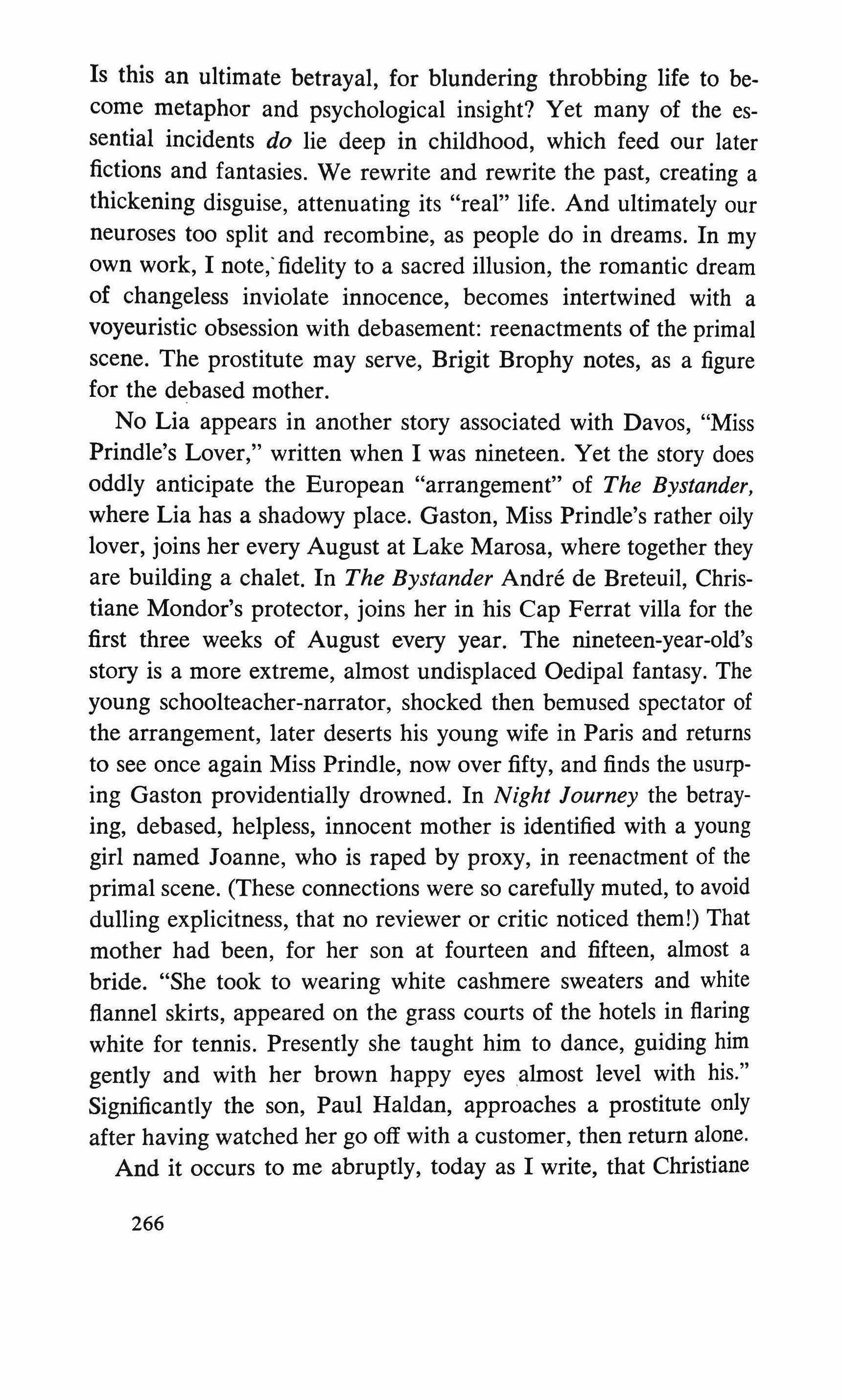
Is this an ultimate betrayal, for blundering throbbing life to become metaphor and psychological insight? Yet many of the essential incidents do lie deep in childhood, which feed our later fictions and fantasies. We rewrite and rewrite the past, creating a thickening disguise, attenuating its "real" life. And ultimately our neuroses too split and recombine, as people do in dreams. In my own work, I note,'fidelity to a sacred illusion, the romantic dream of changeless inviolate innocence, becomes intertwined with a voyeuristic obsession with debasement: reenactments of the primal scene. The prostitute may serve, Brigit Brophy notes, as a figure for the debased mother.
No Lia appears in another story associated with Davos, "Miss Prindle's Lover," written when I was nineteen. Yet the story does oddly anticipate the European "arrangement" of The Bystander, where Lia has a shadowy place. Gaston, Miss Prindle's rather oily lover, joins her every August at Lake Marosa, where together they are building a chalet. In The Bystander Andre de Breteuil, Christiane Mondor's protector, joins her in his Cap Ferrat villa for the first three weeks of August every year. The nineteen-year-old's story is a more extreme, almost undisplaced Oedipal fantasy. The young schoolteacher-narrator, shocked then bemused spectator of the arrangement, later deserts his young wife in Paris and returns to see once again Miss Prindle, now over fifty, and finds the usurping Gaston providentially drowned. In Night Journey the betraying, debased, helpless, innocent mother is identified with a young girl named Joanne, who is raped by proxy, in reenactment of the primal scene. (These connections were so carefully muted, to avoid dulling explicitness, that no reviewer or critic noticed them!) That mother had been, for her son at fourteen and fifteen, almost a bride. "She took to wearing white cashmere sweaters and white flannel skirts, appeared on the grass courts of the hotels in flaring white for tennis. Presently she taught him to dance, guiding him gently and with her brown happy eyes almost level with his."
Significantly the son, Paul Haldan, approaches a prostitute only after having watched her go off with a customer, then return alone. And it occurs to me abruptly, today as I write, that Christiane
266
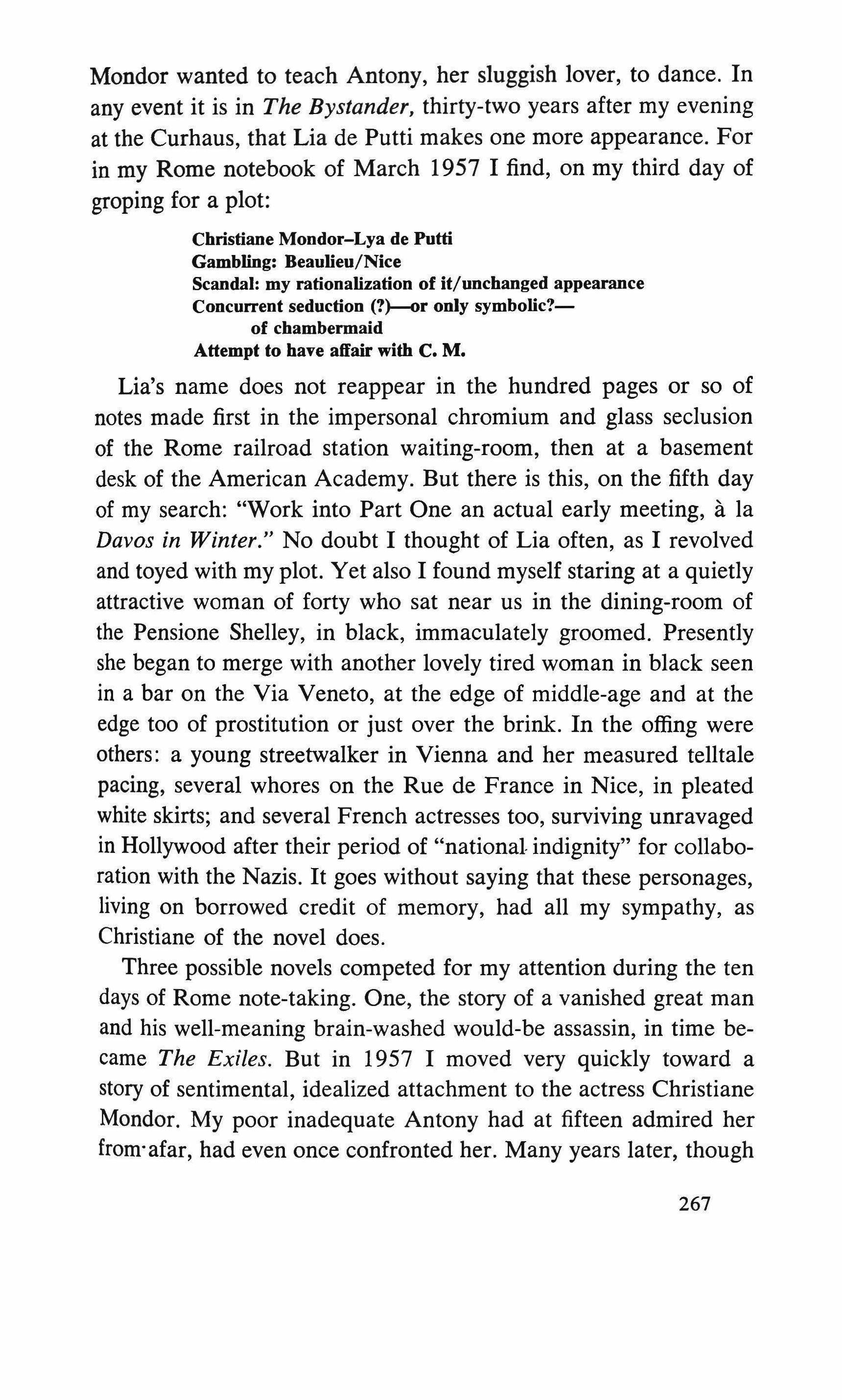
Mondor wanted to teach Antony, her sluggish lover, to dance. In any event it is in The Bystander, thirty-two years after my evening at the Curhaus, that Lia de Putti makes one more appearance. For in my Rome notebook of March 1957 I find, on my third day of groping for a plot:
Christiane Mondor-Lya de Putti
Gambling: Beaulieu/Nice
Scandal: my rationalization of it/unchanged appearance
Concurrent seduction (?)--or only symbolic?of chambermaid
Attempt to have affair with C. M.
Lia's name does not reappear in the hundred pages or so of notes made first in the impersonal chromium and glass seclusion of the Rome railroad station waiting-room, then at a basement desk of the American Academy. But there is this, on the fifth day of my search: "Work into Part One an actual early meeting, a la Davos in Winter." No doubt I thought of Lia often, as I revolved and toyed with my plot. Yet also I found myself staring at a quietly attractive woman of forty who sat near us in the dining-room of the Pensione Shelley, in black, immaculately groomed. Presently she began to merge with another lovely tired woman in black seen in a bar on the Via Veneto, at the edge of middle-age and at the edge too of prostitution or just over the brink. In the offing were others: a young streetwalker in Vienna and her measured telltale pacing, several whores on the Rue de France in Nice, in pleated white skirts; and several French actresses too, surviving unravaged in Hollywood after their period of "national indignity" for collaboration with the Nazis. It goes without saying that these personages, living on borrowed credit of memory, had all my sympathy, as Christiane of the novel does.
Three possible novels competed for my attention during the ten days of Rome note-taking. One, the story of a vanished great man and his well-meaning brain-washed would-be assassin, in time became The Exiles. But in 1957 I moved very quickly toward a story of sentimental, idealized attachment to the actress Christiane Mondor. My poor inadequate Antony had at fifteen admired her from'afar, had even once confronted her. Many years later, though 267

embroiled with a sluttish chambermaid, he has a second chance with Christiane. My Rome notes discovered quickly the essential irony: what Antony thinks is his best side (his absurd fidelity to romantic illusion) is but the obverse of his worst. "His idealism is a form of voyeurism," my notes succinctly remark. His sacred and profane loves are, in one respect, the same. It is Antony's psychic destiny to stand outside the locked door or watch the shuttered window behind which adult love and mature sexuality take place. Why, in my earliest notes, a German not French actress? In part it was because I had seized upon a story told me by Benno Frank, fellow sergeant in the army and later director of theaters in Cleveland and Atlanta. As a young prodigy in the Hamburg State Theater, Benno had produced, among other things, The Taming of the Shrew on roller skates. Presently, as a Jew, he emigrated to America. Some fifteen years later he returned to Germany and was put in charge of denazification of the theater. One day a "young woman" came to his office for help: a star from the Hamburg days who had survived, seemingly unaged and untouched, the most appalling, most degrading experiences. She told him the following: Her husband had been taken prisoner on the Russian front. Every night she listened to Russian propaganda beamed to Germany, since at intervals the announcer would read off the names of surviving prisoners. Thus she, innocent unpolitical actress (like Christiane), came to know the material and moral advantages of a communist regime. In due time her husband, crippled from the waist down, was repatriated; they moved into the cellar of their Berlin home, to escape American bombs. With the liberation of Berlin three Russians immediately appeared at the door, an officer and two enlisted men, bent on pillage and rape. The actress, communicating only with her skilled hands, struck a bargain: she would become the officer's mistress and would manage the ground floor household, in exchange for protection for herself, her husband, and their cellar apartment. Much of this, to be sure, without the immobilized husband's knowledge. Her pretext, when she mounted the stairs every afternoon, was that she was giving the officer a lesson in German, though in fact their entire
268

relationship was wordless. The crippled husband wanted to know what the Russian officer talked about. She replied that he talked about Russia, its material and moral advantages. She would repeat almost verbatim those propaganda broadcasts. The final turn of the screw was that the husband, listening intently, became a convert to communism.
The story t attracted me, and still does; perhaps a Nabokov could write it. But I found myself unable to imagine Benno Frank's German adolescence and so substituted my own: especially certain hours of sexual turmoil in Paris, in my thirteenth and fourteenth years, my dark prowling of back streets off the Boule Miche and in the vicinity of the Place Clichy and Pigalle. We were fascinated, my schoolmates and I, by those painted creatures and their whispered transactions. One watched horrified from a distance of fifty yards, and saw too older whores in the cafes, stupefied, staring ahead as for Toulouse-Lautrec. There was the mysterious area of the Marais, a medieval warren of vice, apocalyptic corruption in streets that never saw the sun-where even in 1969 one short street of whores remained, middle-aged and very fat, motherly sadists perhaps. And there long existed in my dreams a labyrinth extending from the Place Clichy to St. Lazare, superimposed upon the real geography: invented streets and forbidden places so vivid that I have once or twice expected to find them in reality.
All that, which has little place in the text of The Bystander, was essential to its dreaming.
I had in mind, moreover, a vivid scene, that first intense visualized dramatic moment indispensable to the plotting of a fiction. It had been partly supplied me by John Clive, now Professor of History at Harvard. As a child in Berlin he had come face to face with the actress Lilian Harvey (she of the long long legs) in a coffee house in Berlin. Or was it a fruit shop? I must check with Professor Clive. Something in his expression caught Lilian Harvey's eye; she kissed him on the forehead. But Rumpelmayer's tearoom in Paris, not a coffee house in Berlin, was the rose and silken place I knew; and it is there Christiane Mondor impulsively offers my narrator t Already, no doubt, a considerable distortion of the story Benno Frank told me. 269
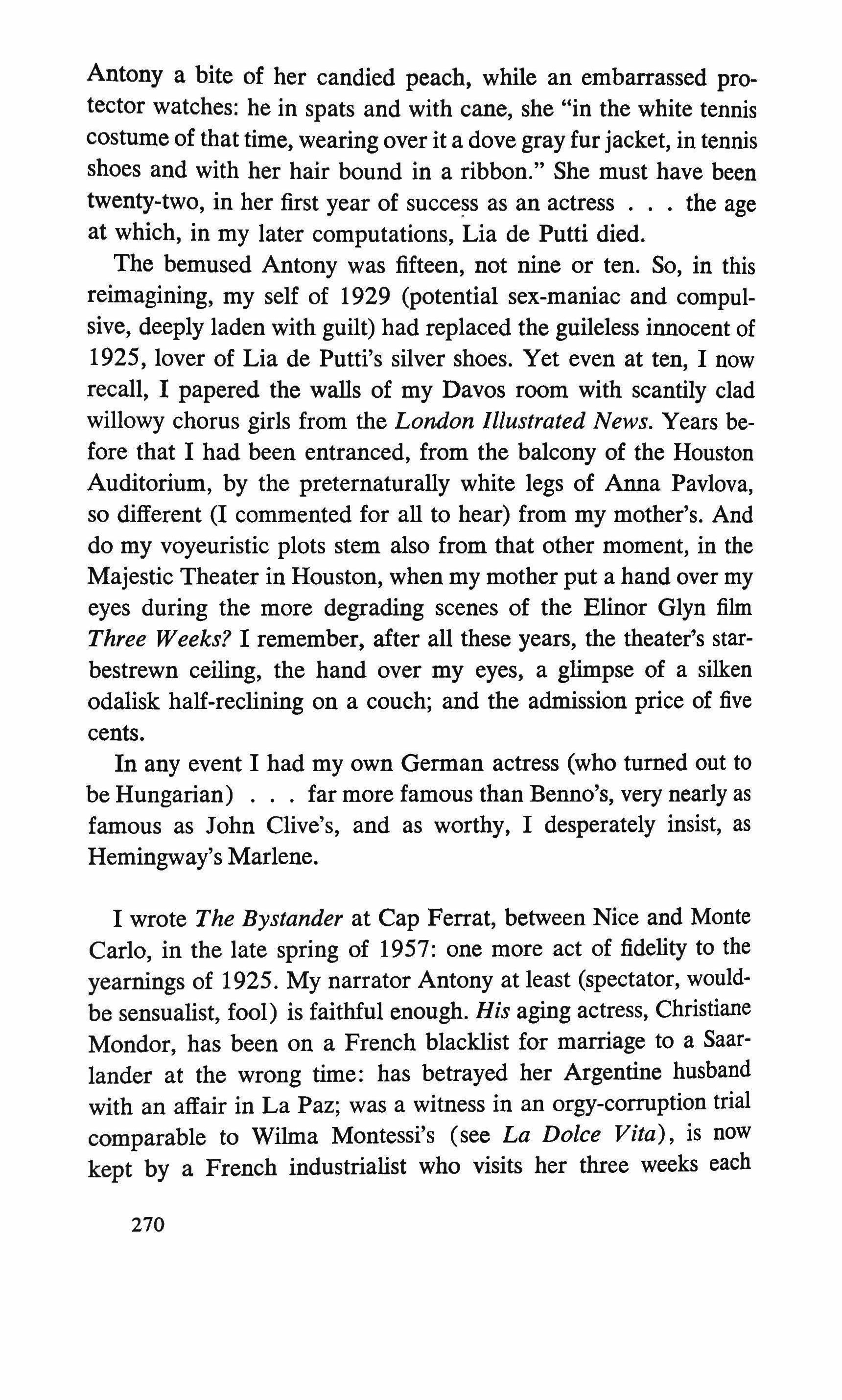
Antony a bite of her candied peach, while an embarrassed protector watches: he in spats and with cane, she "in the white tennis costume of that time, wearing over it a dove gray fur jacket, in tennis shoes and with her hair bound in a ribbon." She must have been twenty-two, in her first year of succe�s as an actress the age at which, in my later computations, Lia de Putti died.
The bemused Antony was fifteen, not nine or ten. So, in this reimagining, my self of 1929 (potential sex-maniac and compulsive, deeply laden with guilt) had replaced the guileless innocent of 1925, lover of Lia de Putti's silver shoes. Yet even at ten, 1 now recall, I papered the walls of my Davos room with scantily clad willowy chorus girls from the London Illustrated News. Years before that 1 had been entranced, from the balcony of the Houston Auditorium, by the preternaturally white legs of Anna Pavlova, so different (I commented for all to hear) from my mother's. And do my voyeuristic plots stem also from that other moment, in the Majestic Theater in Houston, when my mother put a hand over my eyes during the more degrading scenes of the Elinor Glyn film Three Weeks? 1 remember, after all these years, the theater's starbestrewn ceiling, the hand over my eyes, a glimpse of a silken odalisk half-reclining on a couch; and the admission price of five cents.
In any event 1 had my own German actress (who turned out to be Hungarian) far more famous than Benno's, very nearly as famous as John Clive's, and as worthy, 1 desperately insist, as Hemingway's Marlene.
1 wrote The Bystander at Cap Ferrat, between Nice and Monte Carlo, in the late spring of 1957: one more act of fidelity to the yearnings of 1925. My narrator Antony at least (spectator, wouldbe sensualist, fool) is faithful enough. His aging actress, Christiane Mondor, has been on a French blacklist for marriage to a Saarlander at the wrong time: has betrayed her Argentine husband with an affair in La Paz; was a witness in an orgy-corruption trial comparable to Wilma Montessi's (see La Dolce Vita), is now kept by a French industrialist who visits her three weeks each
270
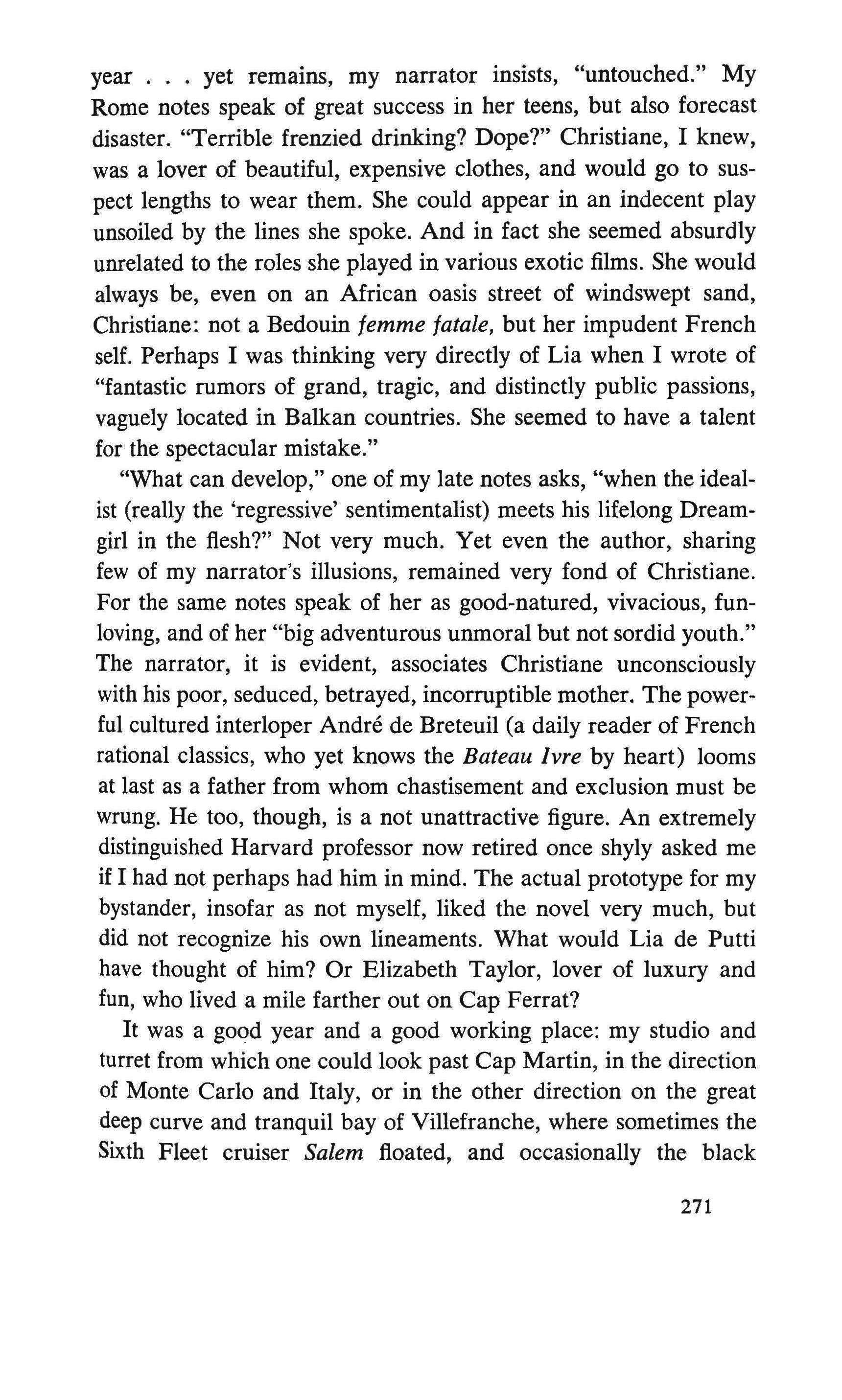
year yet remains, my narrator insists, "untouched." My Rome notes speak of great success in her teens, but also forecast disaster. "Terrible frenzied drinking? Dope?" Christiane, I knew, was a lover of beautiful, expensive clothes, and would go to suspect lengths to wear them. She could appear in an indecent play unsoiled by the lines she spoke. And in fact she seemed absurdly unrelated to the roles she played in various exotic films. She would always be, even on an African oasis street of windswept sand, Christiane: not a Bedouin femme fatale, but her impudent French self. Perhaps I was thinking very directly of Lia when I wrote of "fantastic rumors of grand, tragic, and distinctly public passions, vaguely located in Balkan countries. She seemed to have a talent for the spectacular mistake."
"What can develop," one of my late notes asks, "when the idealist (really the 'regressive' sentimentalist) meets his lifelong Dreamgirl in the flesh?" Not very much. Yet even the author, sharing few of my narrator's illusions, remained very fond of Christiane. For the same notes speak of her as good-natured, vivacious, funloving, and of her "big adventurous unmoral but not sordid youth." The narrator, it is evident, associates Christiane unconsciously with his poor, seduced, betrayed, incorruptible mother. The powerful cultured interloper Andre de Breteuil (a daily reader of French rational classics, who yet knows the Bateau Ivre by heart) looms at last as a father from whom chastisement and exclusion must be wrung. He too, though, is a not unattractive figure. An extremely distinguished Harvard professor now retired once shyly asked me if I had not perhaps had him in mind. The actual prototype for my bystander, insofar as not myself, liked the novel very much, but did not recognize his own lineaments. What would Lia de Putti have thought of him? Or Elizabeth Taylor, lover of luxury and fun, who lived a mile farther out on Cap Ferrat?
It was a good year and a good working place: my studio and turret from which one could look past Cap Martin, in the direction of Monte Carlo and Italy, or in the other direction on the great deep curve and tranquil bay of Villefranche, where sometimes the Sixth Fleet cruiser Salem floated, and occasionally the black
271

Onassis yacht. Each morning I tried to be at work in time for the punctual appearance, at 9: 10, of the Train Bleu emerging from its tunnel, a relic of ancien regime luxuries, gold lettering on its blue sleeping cars. We swam off rocks next the Charlie Chaplin villa; came upon a rubbish heap of the Elizabeth Taylor establishment, including letters addressed to her, one of which I shamelessly read, my privilege as a novelist. Or drove past the Somerset Maugham villa and its swarm of gardeners: the rewards of "real" writing success. In the fall and winter I had written Conrad the Novelist with relative ease (the winter of the Hungarian revolution and Suez, with the Salem suddenly disappearing in "defense of democracy"). In the spring, after a long vacation that took us from Vienna to Sicily and back through the ten days of novel-plotting in Rome, we returned to Cap Ferrat, where I wrote The Bystander still more easily. The first draft took less than a month, the revision still less; the story must have been long in my heart. Between drafts, out of a dim need to alienate myself briefly from such calm and security, or a need to escape the physical scene of my book, I went to Algiers for a few days, where there was sporadic shooting in the streets. A lone airport controller lay dead in his tower, his throat cut, as our plane from Marseilles landed.
And I think Lia de Putti, had she survived, might well have found her way to our green cape and some such villa as Miramar: still beautiful at fifty, like Christiane a lover of excursions to Nice, yet serenely settled in her quiet life who now, in 1970, would walk upright in bright sunshine with beautiful silver hair, like Conrad's Antonia Avellanos. I cannot imagine an older Lia in Beverly Hills or Malibu. She would have looked out, as Christiane did, and as we, from a "large, airy, turn-of-the-century place at the thin neck of the cape, set high above its formal terrace and garden and its own wild hillside."
In The Bystander I was, for once, "using" the place where I actually was. Christiane's anxious preparations for the annual arrival of Andre de Breteuil were suggested by those of the gardener, apprehensive months in advance about the owner who would come in July. Ultimately I told this gardener my plot. "But
272
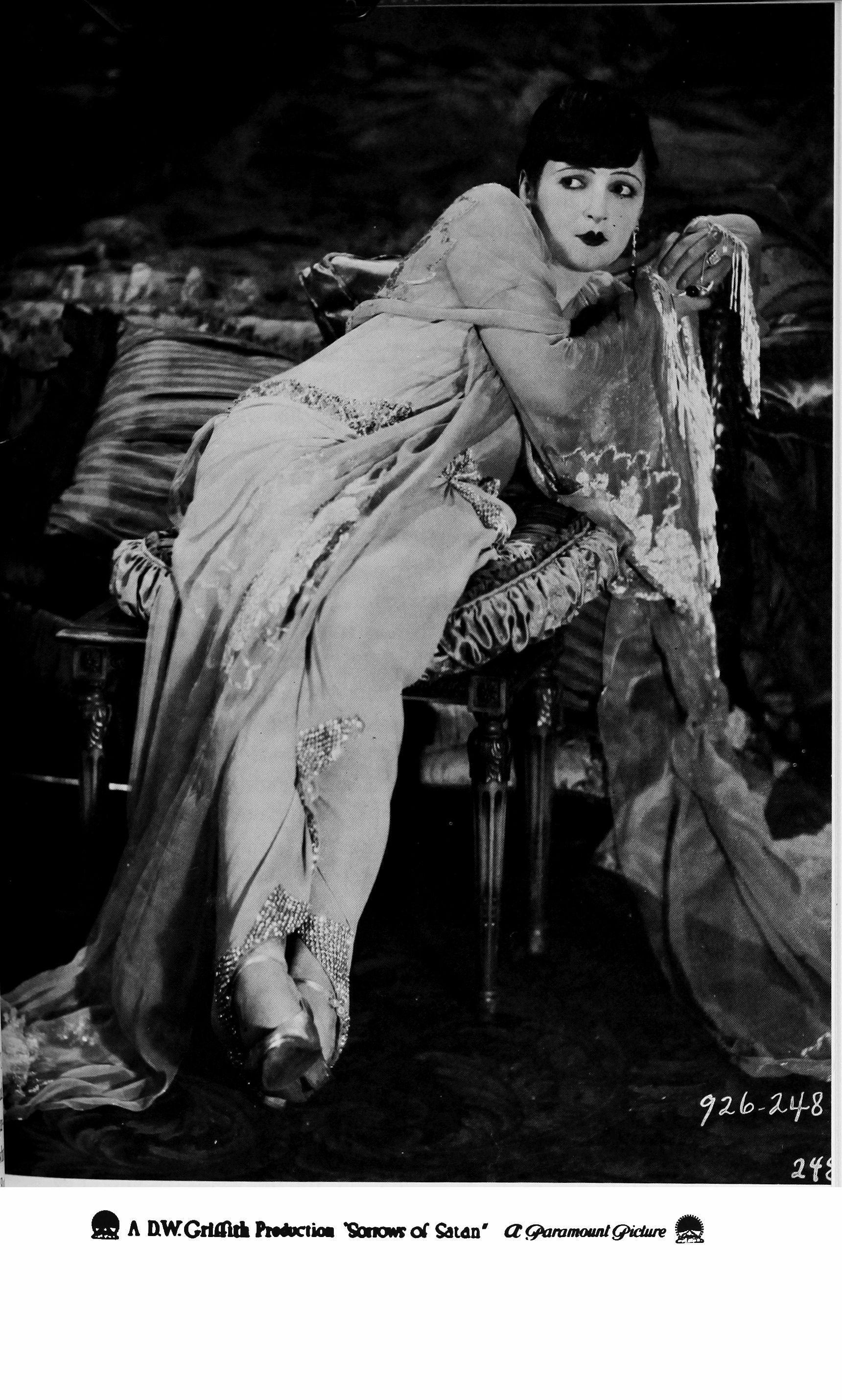
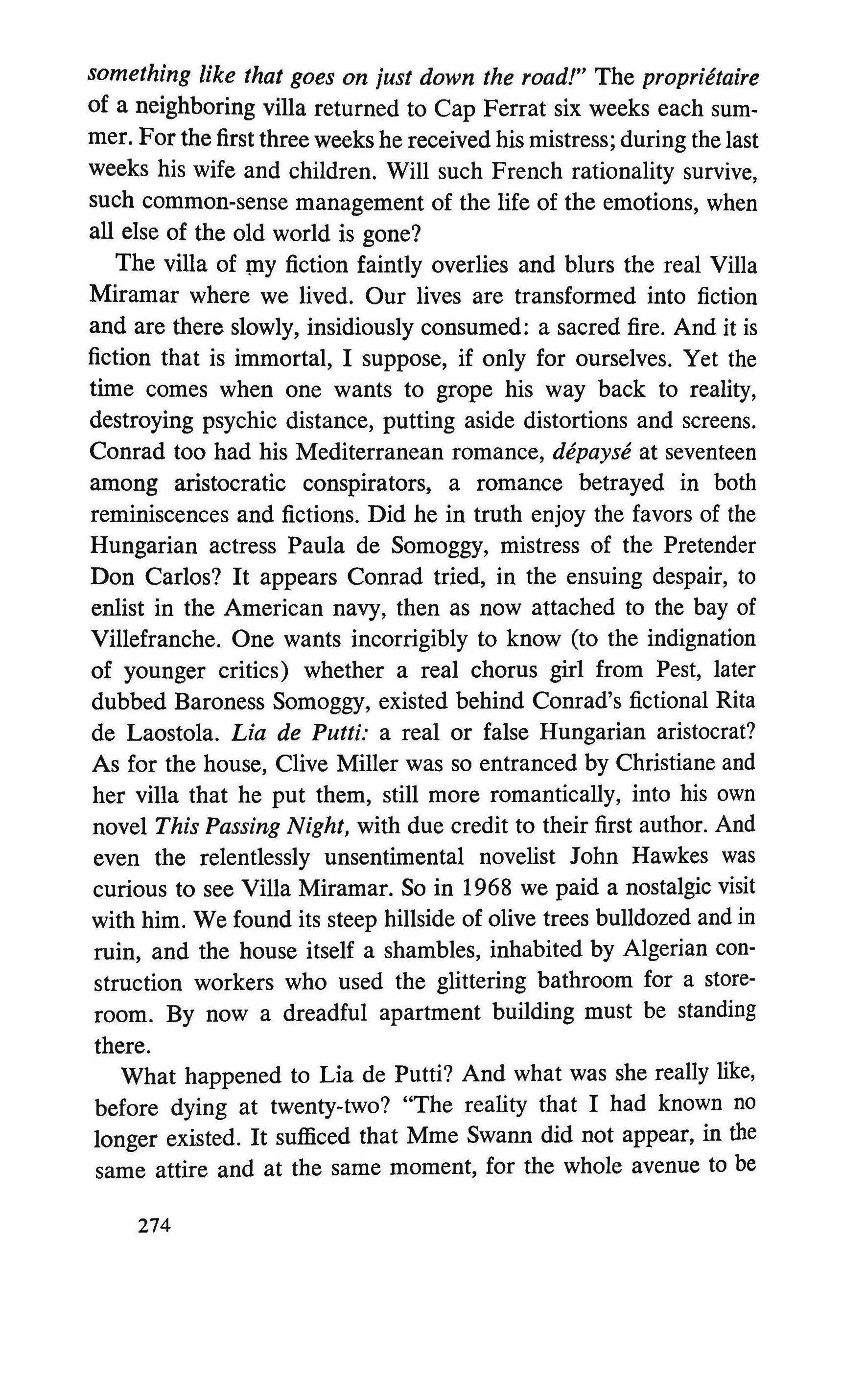
something like that goes on just down the road!" The proprietaire of a neighboring villa returned to Cap Ferrat six weeks each summer. For the first three weeks he received his mistress; during the last weeks his wife and children. Will such French rationality survive, such common-sense management of the life of the emotions, when all else of the old world is gone?
The villa of Ply fiction faintly overlies and blurs the real Villa Miramar where we lived. Our lives are transformed into fiction and are there slowly, insidiously consumed: a sacred fire. And it is fiction that is immortal, I suppose, if only for ourselves. Yet the time comes when one wants to grope his way back to reality, destroying psychic distance, putting aside distortions and screens. Conrad too had his Mediterranean romance, depayse at seventeen among aristocratic conspirators, a romance betrayed in both reminiscences and fictions. Did he in truth enjoy the favors of the Hungarian actress Paula de Somoggy, mistress of the Pretender Don Carlos? It appears Conrad tried, in the ensuing despair, to enlist in the American navy, then as now attached to the bay of Villefranche. One wants incorrigibly to know (to the indignation of younger critics) whether a real chorus girl from Pest, later dubbed Baroness Somoggy, existed behind Conrad's fictional Rita de Laostola. Lia de Putti: a real or false Hungarian aristocrat? As for the house, Clive Miller was so entranced by Christiane and her villa that he put them, still more romantically, into his own novel This Passing Night, with due credit to their first author. And even the relentlessly unsentimental novelist John Hawkes was curious to see Villa Miramar. So in 1968 we paid a nostalgic visit with him. We found its steep hillside of olive trees bulldozed and in ruin, and the house itself a shambles, inhabited by Algerian construction workers who used the glittering bathroom for a storeroom. By now a dreadful apartment building must be standing there.
What happened to Lia de Putti? And what was she really like, before dying at twenty-two? "The reality that I had known no longer existed. It sufficed that Mme Swann did not appear, in the same attire and at the same moment, for the whole avenue to be
274

altered. The places that we have known belong now only to the little world of space on which we map them for our own convenience. None of them was ever more than a thin slice, held between the contiguous impressions that composed our life at that time; remembrance of a particular form is but regret for a particular moment; and houses, roads, avenues are as fugitive, alas, as the years."
One scrap of writing remains from my omnipotence fantasies of 1925: exhumed this week from my mother's attic box of memorabilia not far from that other box containing a cigar that, in 1919, at a ceremonial banquet in Houston where he was introduced by my father, Marshal Foch failed to smoke. It appears I hoped, even expected to invent a locomotive that would dispense with coal and that, moreover, thanks to cogwheels, would be free from the danger of sliding back on steep hills. What child of today will hear the wild exasperated lash and grind of locomotive wheels slipping on a grade? With the proceeds of this invention I intended to found a railroad empire that would cover all the continents; I WOUld, also, "conquer the unconquerable Mt. Everest" before dying "content," with a quarter of my fortune gone to charity. What erotic or ideal reveries competed with that American dream? Surely I must have dreamed of rescuing Lia de Putti from leering Italian scoundrels or evil Hollywood moguls smoking vicious cigars, and from hotel fires, avalanches, sinking ships. In daydreams I must, yes, have saved her from the designs of evil men. I could not, like my fifteen-year-old Antony, watch the lighted windows of a "real life" apartment on the Avenue du Bois. I could, though, like him, dream of dinners in fine restaurants and "fast automobile rides through a forest." But I did not see Lia again, after Davos, and there were other girls in white to be rescued and loved. "In the turbulence of those months, then those years, Christiane Mondor was no more than a faint thread connecting me with a vanished self and dead past. It would appear at all only if caught by chance in a certain quality of sunlight, or at a certain angle of memory."
275

The faint thread? The real Lia de Putti? I would not have had a chance to see all of her films, as Antony saw Christiane's. In 1925 even Charlie Chaplin was forbidden to children when we paused in Munich in our travels. Only Fritz Lang's heroic tumultuous Death of Siegfried was permitted, with its great dragon streaming blood. I do remember (but from when? when?) a bad print of the Emil Jannings Othello, with Lia as the innocent scared wife of lago. But did I see the famous Dupont Variety in which the henpecked Jannings undresses Lia, a trapeze artist, after her act, and even gives her a rubdown? There is a scene, a favorite of film histories, in which Lia, seated on a disheveled lower bunk, points a silken leg (but with a hole at the toe) at Jannings. There is a startling expanse of thigh; her unsmiling face combines sexual challenge and unmoral scorn-in all a scene so shocking that, for American audiences, she had to be translated from Jannings' mistress to his wife. And now, leafing through Curt Moreck's Sittengeschichte des Kinos of 1926 (which contains no less than four full-page Lia de Puttis), I am struck again by the German obsession with silken thighs and by a national genius for juxtaposing wide-eyed female innocence and costumes, atmospheres of corruption. They are surrounded, these girls, by over-aged amateurs of female beauty, as a rule fully clothed. The long legs of Professor Clive's Lilian Harvey are there, and those of Fern Andra, Camilla von Hollay, Ossi Oswalda, Edy Darclea, Carmelita Geraghty, Lily Damita, Arlette Marechal, Doris Kenyon, Marie West, Mary Kid, and (but fully clothed) Norma Shearer with a black cat painted on her back. And the incredibly beautiful Lil Dagover. OU sont les jambes d'antan? Lia appears in her circus acrobat's costume from Variety, with a black skull imprinted on a white shirt, between the breasts; her hands are on her hips. The expression, thanks to the long nose and oddly shaped upper lip, is one of cynical even soulless weariness. Elsewhere we see her looking up in terror at Warwick Ward, who holds her wrist with his left hand and locks the door with his right. In Eijersucht she sits straight up in a royal courtesan's bed, quietly facing an outraged Werner Krauss. And there is of course the Jannings scene of the uplifted
276

leg and protruding bare toe. I would have put her, in all these scenes, in her early thirties how vastly changed, with her large arms and powerful almost masculine face and bold stare, from the diminutive adolescent of the Davos Curhaus, daring to smoke a cigarette or consume an illicit porto.
I am not sure, in fact, that I ever saw Varietes in Europe or Variety in Palo Alto. Years later, I know, the film eluded me. I thought of Lia again because a cinema society in Lisbon, where we were staying in 1968, announced a showing. We arrived before anyone else, though at the scheduled time, and were told by a concierge to return in an hour. Ultimately a dozen devotees, serious young men all, critics and graduate students and such, assembled in a cavernous baroque ballroom; there was an antiquated projector, a small screen was put up. To see the film we were required to join the club, pay modest initiation and membership fees, and fill out questionnaires on our lives and achievements. (One of these, I tried to explain in a lingua franca of FrenchGerman-Spanish-even Portuguese, was that I had briefly known and loved the star a full year before the film was made. This gave me a certain awed prestige, shared in some measure by my wife, the only woman in the audience. The always incredible Americans!) But we saw, alas, only the flickering scarred title and the magic names: Emil Jannings und Lya de Putti. For at that point the projector (or at least a bulb) expired. We waited an hour or so while, for my sake only, the club officers in vain scoured Lisbon for a replacement.t
The real Lia de Putti? From time to time, over the years, I have looked casually at the film histories. But I always repressed an impulse to do an hour's real research, and so discover whether she was indeed dead at twenty-two. But on April 15 of this year, after attending an outdoor "be-in" and rock concert protesting the Vietnam war, with a side glance at Chicano aspirations, I did at last go to the sources that would certainly inform me: the New
t I saw Variety at last, in May 1970, shortly after writing these lines. A superb film, even in the bowdlerized American version, and a stunning performance by Lia de Putti.
277
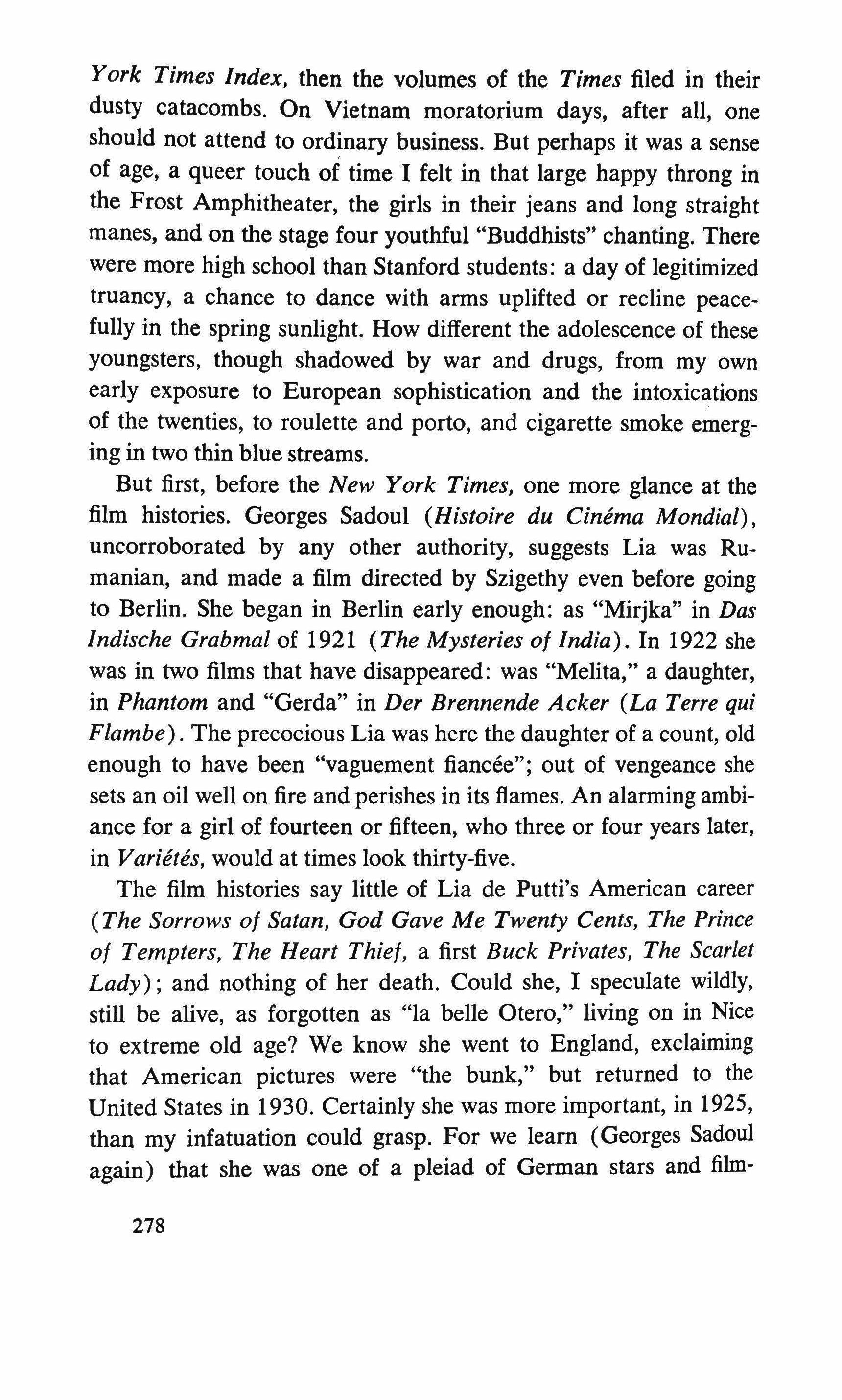
York Times Index, then the volumes of the Times filed in their dusty catacombs. On Vietnam moratorium days, after all, one should not attend to ordinary business. But perhaps it was a sense of age, a queer touch of time I felt in that large happy throng in the Frost Amphitheater, the girls in their jeans and long straight manes, and on the stage four youthful "Buddhists" chanting. There were more high school than Stanford students: a day of legitimized truancy, a chance to dance with arms uplifted or recline peacefully in the spring sunlight. How different the adolescence of these youngsters, though shadowed by war and drugs, from my own early exposure to European sophistication and the intoxications of the twenties, to roulette and porto, and cigarette smoke emerging in two thin blue streams.
But first, before the New York Times, one more glance at the film histories. Georges Sadoul (Histoire du Cinema Mondial), uncorroborated by any other authority, suggests Lia was Rumanian, and made a film directed by Szigethy even before going to Berlin. She began in Berlin early enough: as "Mirjka" in Das lndische Grabmalof 1921 (The Mysteries of India). In 1922 she was in two films that have disappeared: was "Melita," a daughter, in Phantom and "Gerda" in Der Brennende Acker (La Terre qui Flambe). The precocious Lia was here the daughter of a count, old enough to have been "vaguement fiancee"; out of vengeance she sets an oil well on fire and perishes in its flames. An alarming ambiance for a girl of fourteen or fifteen, who three or four years later, in Varietes, would at times look thirty-five.
The film histories say little of Lia de Putti's American career (The Sorrows of Satan, God Gave Me Twenty Cents, The Prince of Tempters, The Heart Thief, a first Buck Privates, The Scarlet Lady); and nothing of her death. Could she, I speculate wildly, still be alive, as forgotten as "la belle Otero," living on in Nice to extreme old age? We know she went to England, exclaiming that American pictures were "the bunk," but returned to the United States in 1930. Certainly she was more important, in 1925, than my infatuation could grasp. For we learn (Georges Sadoul again) that she was one of a pleiad of German stars and film-
278
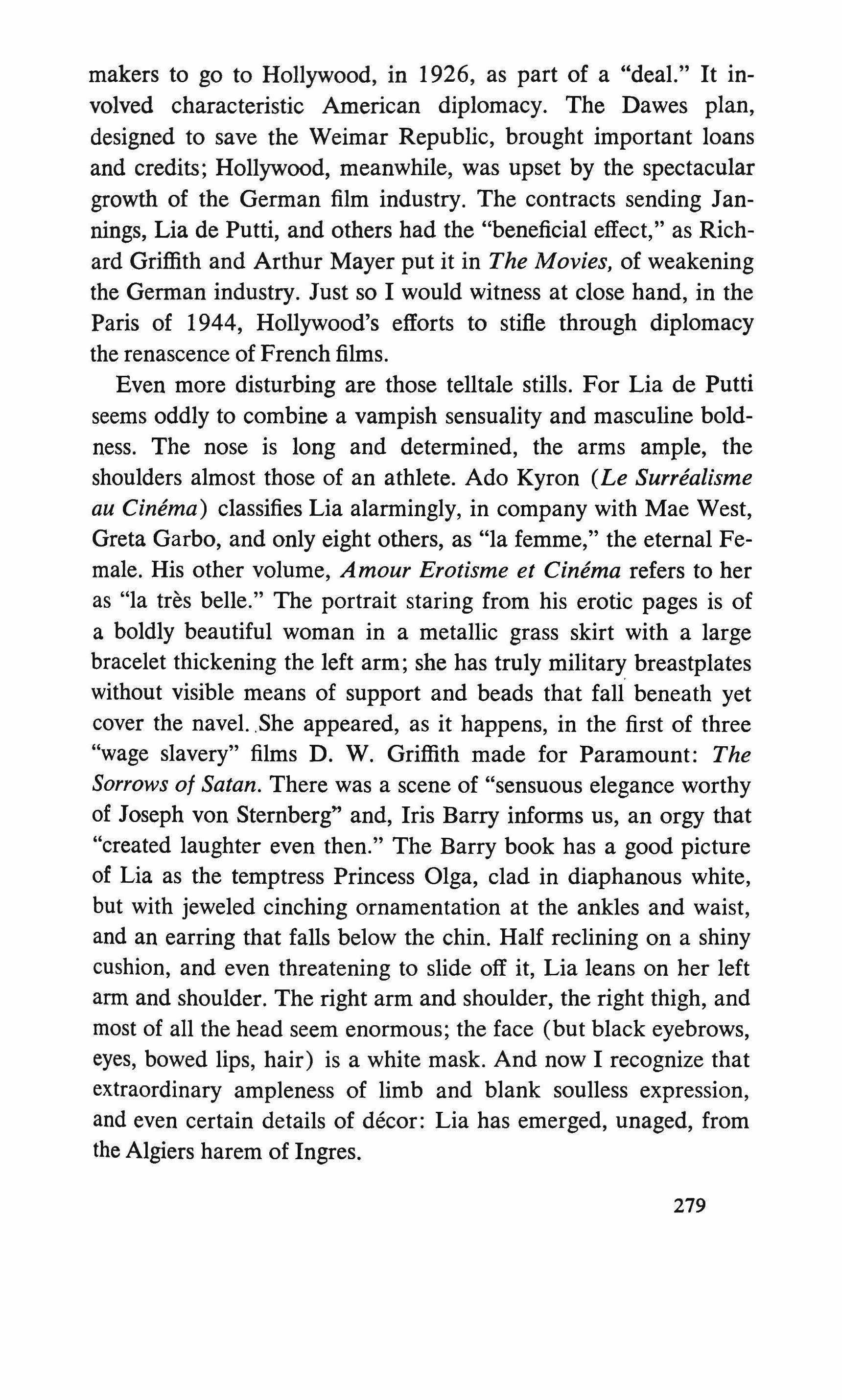
makers to go to Hollywood, in 1926, as part of a "deal." It involved characteristic American diplomacy. The Dawes plan, designed to save the Weimar Republic, brought important loans and credits; Hollywood, meanwhile, was upset by the spectacular growth of the German film industry. The contracts sending Jannings, Lia de Putti, and others had the "beneficial effect," as Richard Griffith and Arthur Mayer put it in The Movies, of weakening the German industry. Just so I would witness at close hand, in the Paris of 1944, Hollywood's efforts to stifle through diplomacy the renascence of French films.
Even more disturbing are those telltale stills. For Lia de Putti seems oddly to combine a vampish sensuality and masculine boldness. The nose is long and determined, the arms ample, the shoulders almost those of an athlete. Ado Kyron (Le Surrealisme au Cinema) classifies Lia alarmingly, in company with Mae West, Greta Garbo, and only eight others, as "la femme," the eternal Female. His other volume, Amour Erotisme et Cinema refers to her as "la tres belle." The portrait staring from his erotic pages is of a boldly beautiful woman in a metallic grass skirt with a large bracelet thickening the left arm; she has truly milita� breastplates without visible means of support and beads that fall beneath yet cover the navel. .She appeared, as it happens, in the first of three "wage slavery" films D. W. Griffith made for Paramount: The Sorrows of Satan. There was a scene of "sensuous elegance worthy of Joseph von Sternberg'" and, Iris Barry informs us, an orgy that "created laughter even then." The Barry book has a good picture of Lia as the temptress Princess Olga, clad in diaphanous white, but with jeweled cinching ornamentation at the ankles and waist, and an earring that falls below the chin. Half reclining on a shiny cushion, and even threatening to slide off it, Lia leans on her left arm and shoulder. The right arm and shoulder, the right thigh, and most of all the head seem enormous; the face (but black eyebrows, eyes, bowed lips, hair) is a white mask. And now I recognize that extraordinary ampleness of limb and blank soulless expression, and even certain details of decor: Lia has emerged, unaged, from the Algiers harem of Ingres. 279

It is time at last to face reality, and 1926: to follow Lia's progress through the New York Times Index, then the dusty volumes themselves. Outside the library are the cries of desultory rioters. In the depths of the stacks I am quite alone.
She was to come (Berlin dateline, Feb. 3) as a first step in a cooperative exchange of American and German screen talent: "a sensational success despite her youth." But she would come (we learn a week later) under a cloud. Berlin dressmakers, allegedly egged on by rival German motion picture interests, would try to prevent her sailing on the Olympic from Cherbourg. Her debt to them was rumored to be as high as $25,000. Lia de Putti denied these charges. Questioned concerning reports she would marry Count Ludwig Salm if he obtained a divorce from the former Millicent Rogers, Miss de Putti smilingly observed, "That's all over."
She duly arrived in New York on February 26, 1926 (on a sister ship of the Titanic), traveling on a Norwegian passport because she was the widow of one Ludwig Christiansen who had died three years before. So she had been a widow and of two years standing when she faced me in the Curhaus sipping porto and blowing thin streams of smoke! A widow at fifteen? The reporters meeting the ship were charmed: "an attractive brunette," the New York Times reports, five feet, two inches tall. She wore a black traveling coat, a black velvet dress, a silk scarf in yellow and green, and Russian boots of white kid trimmed with ermine. "She talked in German yesterday and said she hoped to learn English quickly in America, to which the reporters replied, 'Ja wohl.'" Nothing masculine there!
But the Times Index, compendium of all aspiration and anguish, forewarns of disaster. The occasional entries are sparse and discouraging: an operation for appendicitis, two weeks after her arrival, injury from a fall in November 1927, an auction of German belongings in February 1928. She would settle, she said, in Hollywood. What quarrels and disillusionments led to the flight to England are unknown to me, or what led to the precipitate return. Her one New York stage appearance, in a vulgar comedy
280

called Made in France, in November 1930, was a catastrophe of a kind, the run ending after ten days when Lia fell ill. Brooks Atkinson, implacable young critic, remarked that Lia de Putti's "papier-mache coquetries" had no relation "either to acting or to personal charm." Lia (accusing three different American youths of fathering her child) "resolved the improvident ardor of French womanhood into a succession of squeals, arch grimaces and toy gestures."
An unworthy vehicle, like more than one play of Christiane. But now it seems to me a betrayal to quote such unjust words, or to examine the career more closely. I rush ahead to the final entries.
Lia de Putti died on November 25, 1931, in a New York hospital, at the age of thirty-two. On the Tuesday before her death she got out of bed and left her room, eluding nurses, and was found roaming the corridor; she was unconscious for two days before she died. She had lived in the Hotel Buckingham with her secretary and intimate friend Madame Romolo Nigiski. What was the Buckingham's standing in 1931? t The Reverend Joseph Marczinko of St. Stephen's Parish, Passaic, "an old friend who had once been her tutor in Hungary," would officiate at the funeral.
So she was not seventeen in 1925 in Davos, but rather twentysix: a maturer rider of sleds, who hid her advancing years. Moreover she was not a nobody. She was the daughter of Count and Countess de Putti (her father was a relative of Bismarck!) and, prior to the Norwegian merchant, had been married "to a district governor of Hungary." Still earlier, it was said, "she narrowly escaped execution as a spy in Rumania during the World War, and was eventually allowed to return to Berlin through the intervention of friends." Her parents (and possibly the Rev. Marczinko her tutor?) were opposed to her ambitions as a dancer. But it was as a danseuse at the Winter Garden in Berlin (the very heart of lavish corruption, and scene of the great trapeze artistry in Variety)
t A Jamesian pilgrimage to the Buckingham, after writing these lines. Elizabeth Hughes, a telephone operator who went to work there in 1930, remembered Lia de Putti well as a friendly, likable, and "very active" person.
281
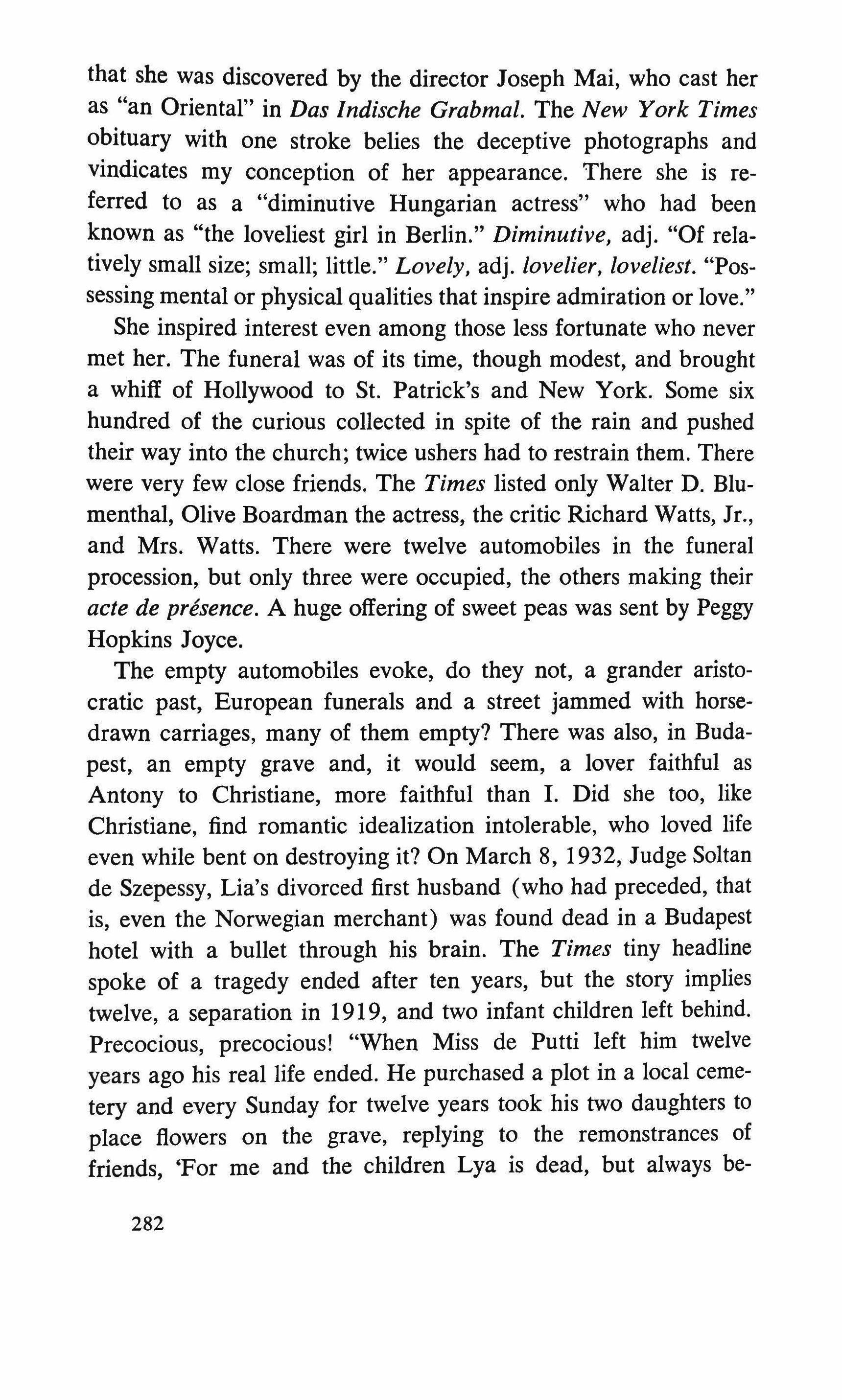
that she was discovered by the director Joseph Mai, who cast her as "an Oriental" in Das Indische Grabmal. The New York Times obituary with one stroke belies the deceptive photographs and vindicates my conception of her appearance. There she is referred to as a "diminutive Hungarian actress" who had been known as "the loveliest girl in Berlin." Diminutive, adj. "Of relatively small size; small; little." Lovely, adj. lovelier, loveliest. "Possessing mental or physical qualities that inspire admiration or love."
She inspired interest even among those less fortunate who never met her. The funeral was of its time, though modest, and brought a whiff of Hollywood to St. Patrick's and New York. Some six hundred of the curious collected in spite of the rain and pushed their way into the church; twice ushers had to restrain them. There were very few close friends. The Times listed only Walter D. Blumenthal, Olive Boardman the actress, the critic Richard Watts, Jr., and Mrs. Watts. There were twelve automobiles in the funeral procession, but only three were occupied, the others making their acte de presence. A huge offering of sweet peas was sent by Peggy Hopkins Joyce.
The empty automobiles evoke, do they not, a grander aristocratic past, European funerals and a street jammed with horsedrawn carriages, many of them empty? There was also, in Budapest, an empty grave and, it would seem, a lover faithful as Antony to Christiane, more faithful than I. Did she too, like Christiane, find romantic idealization intolerable, who loved life even while bent on destroying it? On March 8, 1932, Judge Soltan de Szepessy, Lia's divorced first husband (who had preceded, that is, even the Norwegian merchant) was found dead in a Budapest hotel with a bullet through his brain. The Times tiny headline spoke of a tragedy ended after ten years, but the story implies twelve, a separation in 1919, and two infant children left behind. Precocious, precocious! "When Miss de Putti left him twelve years ago his real life ended. He purchased a plot in a local cemetery and every Sunday for twelve years took his two daughters to place flowers on the grave, replying to the remonstrances of friends, 'For me and the children Lya is dead, but always be-
282
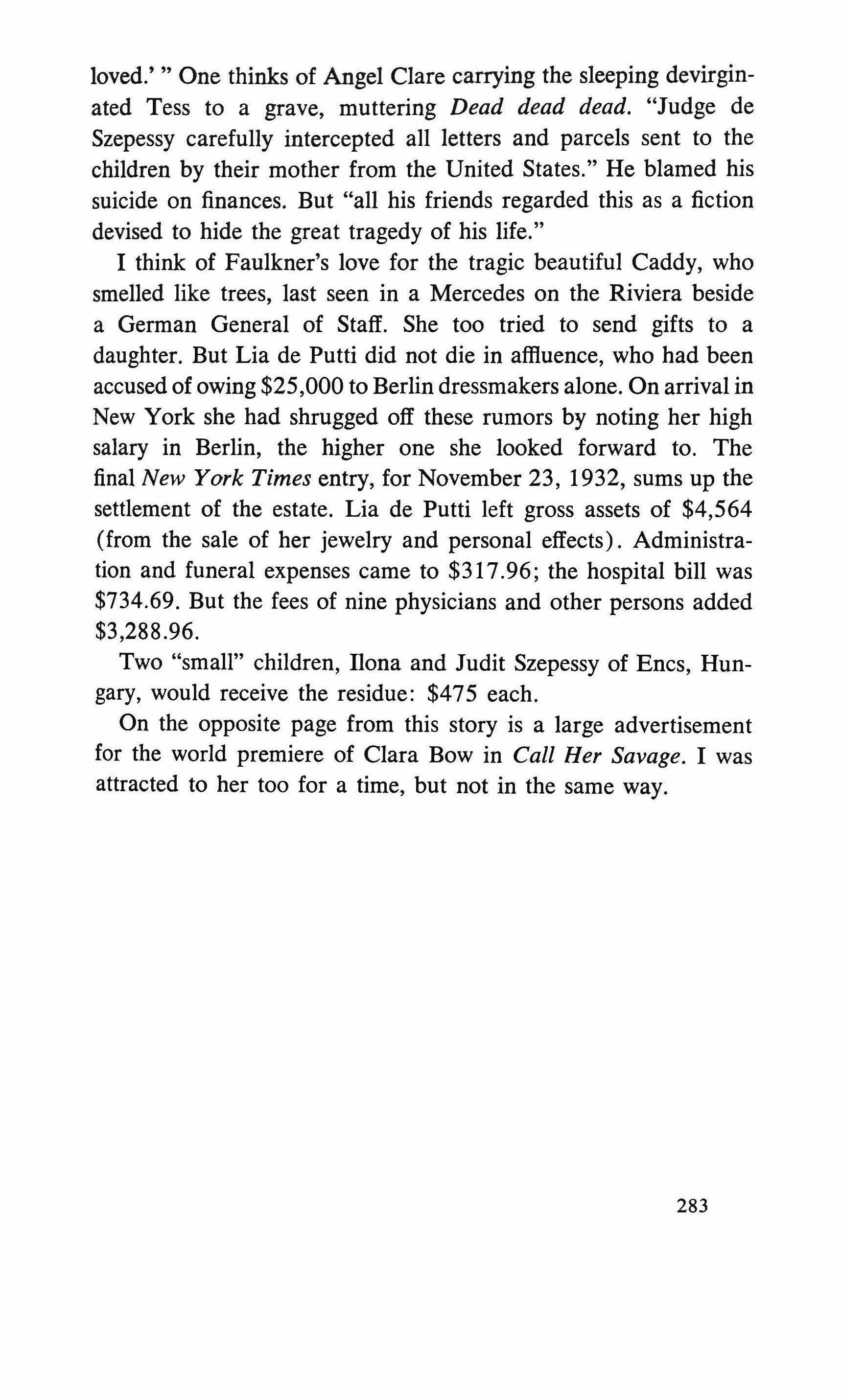
loved.' " One thinks of Angel Clare carrying the sleeping devirginated Tess to a grave, muttering Dead dead dead. "Judge de Szepessy carefully intercepted all letters and parcels sent to the children by their mother from the United States." He blamed his suicide on finances. But "all his friends regarded this as a fiction devised to hide the great tragedy of his life."
I think of Faulkner's love for the tragic beautiful Caddy, who smelled like trees, last seen in a Mercedes on the Riviera beside a German General of Staff. She too tried to send gifts to a daughter. But Lia de Putti did not die in affluence, who had been accused of owing $25,000 to Berlin dressmakers alone. On arrival in New York she had shrugged off these rumors by noting her high salary in Berlin, the higher one she looked forward to. The final New York Times entry, for November 23, 1932, sums up the settlement of the estate. Lia de Putti left gross assets of $4,564 (from the sale of her jewelry and personal effects). Administration and funeral expenses came to $317.96; the hospital bill was $734.69. But the fees of nine physicians and other persons added $3,288.96.
Two "small" children, TIona and Judit Szepessy of Encs, Hungary, would receive the residue: $475 each.
On the opposite page from this story is a large advertisement for the world premiere of Clara Bow in Call Her Savage. I was attracted to her too for a time, but not in the same way.
283

Letter to Jean-Paul Baudot, at Christmas
Friend, on this sunny day, snow sparkling Everywhere, I think of you once more, How many years ago, a child Resistance
Fighter trapped by Nazis in a cave With fifteen others, left to die, you became A cannibal. Saved by Americans,
The taste of a dead comrade's flesh foul In your mouth, you fell onto the snow Of the Haute Savoie and gorged to purge yourself,
Somehow to start again. Each winter since You were reminded, vomiting for days. Each winter since you told me at the Mabillon,
I see you on the first snow of the year Spreadeagled, face buried in that stench. I write once more, Jean-Paul, though you don't
Answer, because I must: today men do far worse. Yours in hope of peace, for all of us, Before the coming of another snow.
LUCIEN STRYK
284
from "The tunnel":
Why windows are important to me
WILLIAM H. GASS
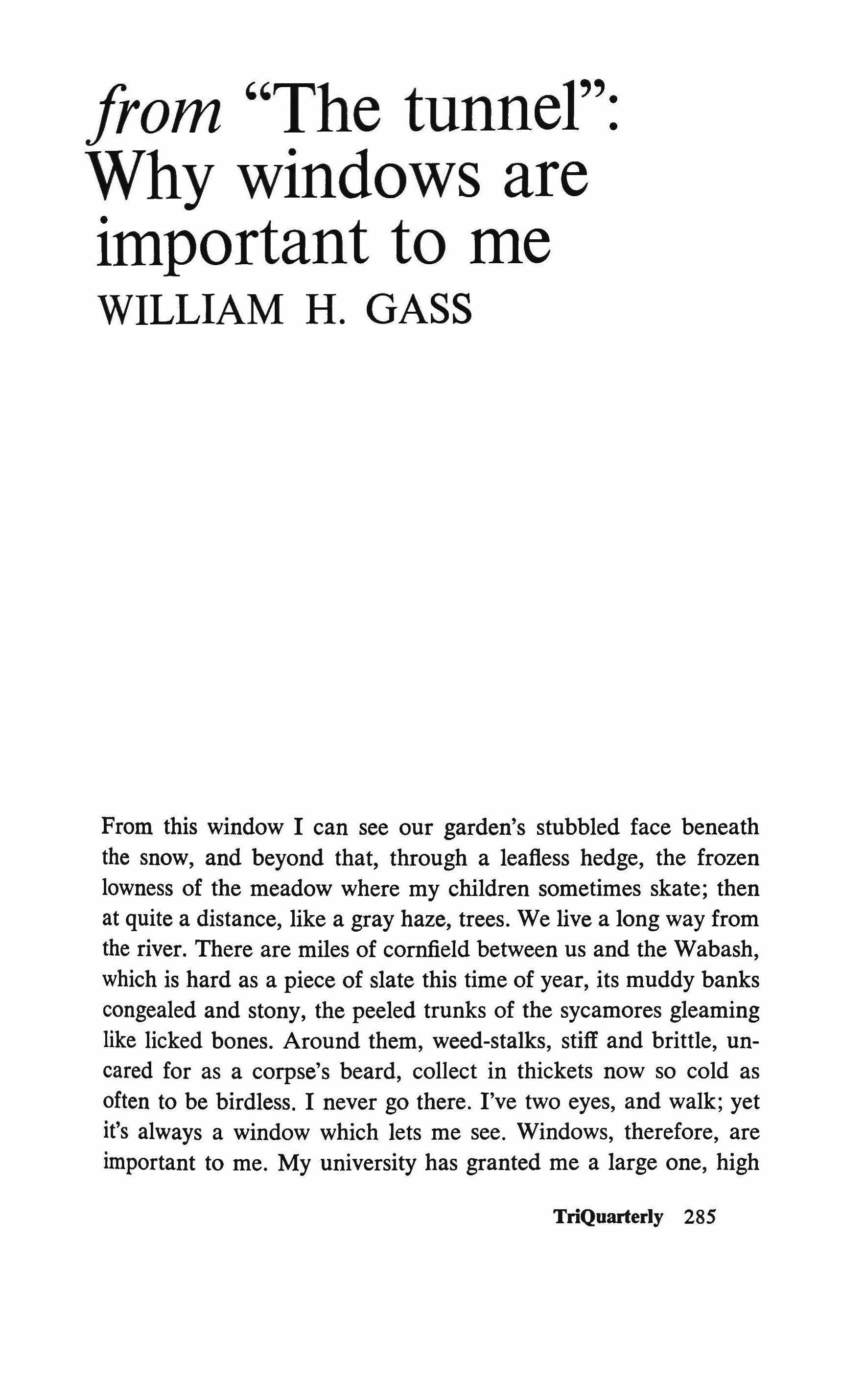
From this window I can see our garden's stubbled face beneath the snow, and beyond that, through a leafless hedge, the frozen lowness of the meadow where my children sometimes skate; then at quite a distance, like a gray haze, trees. We live a long way from the river. There are miles of cornfield between us and the Wabash, which is hard as a piece of slate this time of year, its muddy banks congealed and stony, the peeled trunks of the sycamores gleaming like licked bones. Around them, weed-stalks, stiff and brittle, uncared for as a corpse's beard, collect in thickets now so cold as often to be birdless. I never go there. I've two eyes, and walk; yet it's always a window which lets me see. Windows, therefore, are important to me. My university has granted me a large one, high
TriQuarterJy 285

up and at the corner of the campus where winter's stilled the swings in the public park and the grass in summertime is sandy. These are the porches of appearance. Through them move the only uncoded messages which I receive. We've no sinking land to raise up mountains here, no silhouettes of giant hills. The horizon's clear except for that occasional gray frieze, and soon a crowd of starlings will waddle over the crusted snow after last year's seeds. A bookish man, I make a count of bodies. Symbols lie in state around me, or they wait a wedding, christening, Second Coming-I don't know. I wish I had a vase for flowers, or on the sill outside a temperature gauge. The pond smokes sometimes in the morning. Perhaps the roses will freeze. Where I am there's Goethe, Dante, wisdom in brutality, blood in the peaceful page.
How many books are worth a window? This half-closed eye I have here, or my wide one at the office, they let in whatever chooses them, and not at any shout of mine will they behave. Their scenes move on as surely as the thread-line of my watch. For picture after picture they provide the frame, proscenium to stage, and everything is altered in them into art or into history which seems, in circumstances of my kind, the same.
zQue bicisteis vosotros gidistas, intelectualistas, rilkistas ?
So I'm here, am I? That's what she thinks: that I am here, washing my hands in this light, preparing for bed but not for her, because, as I've said, she's too fat and I love another. Nothing in this little room is mine-this study where I lead my life, in Mad Meg's chair, which I had shipped from Germany. He nearly died in it, my teacher, teaching still. Covered, they carried him off on a tray to the hospital like those sterile instruments whose appetite is operation. He grew even thinner there, even paler; shook so much they took his teeth. My son, he said, my son but I was no one's son; spores in the air begot me; I was cultured in this country-a common, inexplicable disease. Instead of Mad Meg now I've Herschel, Culp, and Planmantee for colleagues. Herschel is a sad man, tired; he has a tired gray moustache; he slumps in his suit, its shoulders powdered with gray ash from his barely burning
286

head. The folds of his face droop, his smile is tentative and thin; he apologizes for his every thought: I'm sorry, he begins. Pardon me, he says. Excuse I could lay my head on Herschel. Sleep. Ohio sleeps on the Ohio. Sleep the sleep light sleeps within a window. Herschel. Humble man and comfort pillow, Whose heels hurt Herschel as they tread him down, so full of feathers, fickle as a sneezing nose? He'll smooth one dent to take another, receive each head that's lowered onto him as graciously as whores at spreadleg swallow any vintage and never, unkindly, send back the bad bottle. I hide in Herschel as he hides in me. Cocked, I look through Herschel where his hairs cross. Pow!
When I woke, my face in the keys again, a wheelchair padded with red plastic sat in front of the building, its chrome intensely flashing as a ship might, signaling at sea. There were dents in my lip and cheeks, and crease sleep made across my forehead, but below me I could see a lemon yellow sweater trimmed in green, gray hair like a cloth cap, and a coarse gray lap robe at whose knotty bottom edge two scraps of green slack showed, while storenew yellow canvas shoes dangled from each trouser-end. From my perspective they seemed spilled: hair, robe, sweater, canvas shoes, as though discarded by a rider who had taken up his legs, perhaps, and walked, his hands remaining 'on the robe like mislaid gloves. I didn't remember them. Or the glint of glasses. It's a woman. Her hair coasts slowly crabwise and a pale hand flutters up to rest the head. Earlier on this same cool sunny Sunday afternoon two girls in frosted hair like hers had wandered by the building, impishly waving when I looked down, both with light cosmetic faces, both wearing large soft buttocks in their trousers-the best thing about them-from which their straight and skinny trunks pushed up like impoverished trees, as if, despite anatomy, they were victims of overcrowding. The minutes pass, both hers and mine. She is so patient. 0 my mute invalid and chastened body lady
C'est avec nous que tout vivra
And now her hands will rise to ennecklace her neck, though her gaze is still spilling from her face to fill her lap. I play my typewriter for her. Out the open window I send her her description. Is 287

there any singing in her as I finger the keys which dented me, or does she only hear the groaning of her body? I play a romantic ballad:
This is my love, a cripple abandoned; roll her beside me on big wheels of chrome.
Fishing for souls, you can see what I've landed: 2 boots and a tire, 3 jews still on fire, my cock in the crack of this crone.
Here come children. We are surrounded.
Lou's love-nest for that other summer had a single second-story window. We could see the middle trunk and branches of the spruces close at hand, together like a clump of temples, a whole band of them, far away from Indiana across the ocean maybe I imagine-in Japan. The light passing through became magical. Though first a pale green which frequent rains had, where it entered, leached to yellow, it deepened in a net of twigs and secondary branches, growing heavier until it seemed to sink like sap along the gray and furrowed trunks, leaving lines like tidal water lipped around the dry old scars of the spruce, dark as arm-holes, wounds from many amputated sleeves. Now and then, still affixed or borne up by the living, a dead bough bloomed defiantly, its needles the color of thick rust; and through the interstices of all these-needles, twigs, and limbs-a pale blue sky would lie in burning patches like a distant lake-peaceful and lovely beyond endurance-while chickadees rode the gentle fanning branches with all the calm and arrogance of gulls.
Look there, Herschel how she is so patient. The sun is harmless, falling softly everywhere, though in the distance clouds are coming on like floes. Her head is up, unsteady on its stem, perhaps to watch the children running. Minutes pass, and there she sits, as I sit, in this cool day, among this beauty, rubber-wheeled as I am castered, listening possibly to my machine as it performs a piece of her life, and also, of course, a piece of mine. We'd make fine mates-a perfect pair. The muscles in my back are tight from tension, the tension of long sitting and hard work, of life in a swivel. What was she doing beneath my window in her red-armed
288
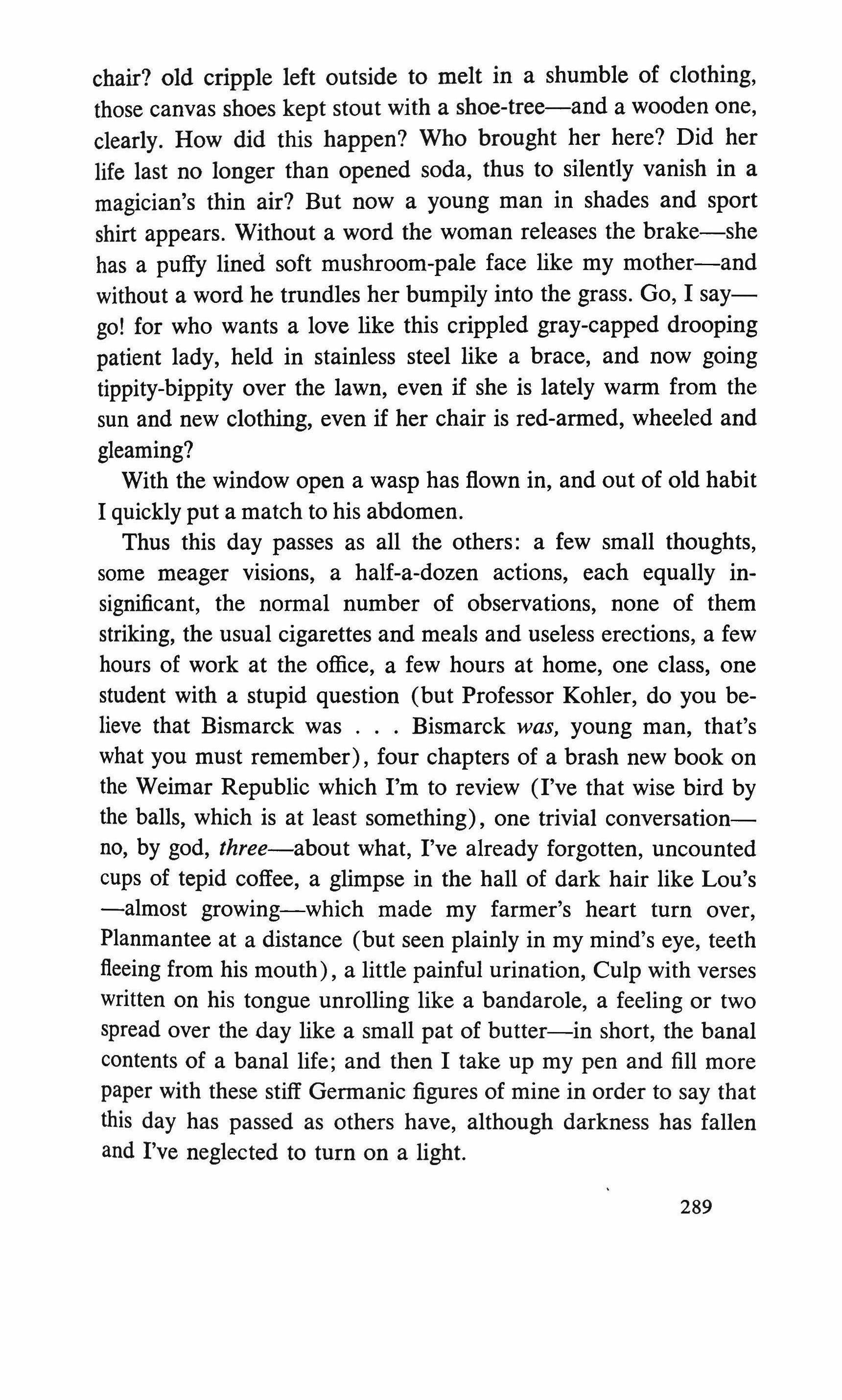
chair? old cripple left outside to melt in a shumble of clothing, those canvas shoes kept stout with a shoe-tree-and a wooden one, clearly. How did this happen? Who brought her here? Did her life last no longer than opened soda, thus to silently vanish in a magician's thin air? But now a young man in shades and sport shirt appears. Without a word the woman releases the brake-she has a puffy lined soft mushroom-pale face like my mother-and without a word he trundles her bumpily into the grass. Go, I saygo! for who wants a love like this crippled gray-capped drooping patient lady, held in stainless steel like a brace, and now going tippity-bippity over the lawn, even if she is lately warm from the sun and new clothing, even if her chair is red-armed, wheeled and gleaming?
With the window open a wasp has flown in, and out of old habit I quickly put a match to his abdomen.
Thus this day passes as all the others: a few small thoughts, some meager visions, a half-a-dozen actions, each equally insignificant, the normal number of observations, none of them striking, the usual cigarettes and meals and useless erections, a few hours of work at the office, a few hours at home, one class, one student with a stupid question (but Professor Kohler, do you believe that Bismarck was Bismarck was, young man, that's what you must remember), four chapters of a brash new book on the Weimar Republic which I'm to review (I've that wise bird by the balls, which is at least something), one trivial conversationno, by god, three-about what, I've already forgotten, uncounted cups of tepid coffee, a glimpse in the hall of dark hair like Lou's -almost growing-which made my farmer's heart turn over, Planmantee at a distance (but seen plainly in my mind's eye, teeth fleeing from his mouth), a little painful urination, Culp with verses written on his tongue unrolling like a bandarole, a feeling or two spread over the day like a small pat of butter-in short, the banal contents of a banal life; and then I take up my pen and fill more paper with these stiff Germanic figures of mine in order to say that this day has passed as others have, although darkness has fallen and I've neglected to turn on a light.
289

Maybe Perhaps Just possibly Herschel: you're my muse. And here is Culp, the motor man, who's always zizzing. Maybe Herschel sends his claims of ignorance ahead, a scouting party; he's ready in an instant to withdraw. I'm not up on this, he says. I sometimes think Have a heart, Herschel, and tow away your rhyming friend. But he begins: I sometimes think How he dares to think at all I've never understood; still Herschel has a deferential charm, and when excited he will pinch his neck, as if to slow himself down-from what high speed I've yet to calculate. Nevertheless he's definite about one thing: the meek will never inherit the earth. He repeats this often, often out of any context which would lend it sense, and never in any which would remove it from cliche; he states it quietly, but with a conviction unusual for him, as if it were the single shamanism in his life he's learned-his lonely truth-and I can believe it-for he is one of them, the meek, and he'll inherit nothing. He lives his gray life out of common view, uncared for, quite alone. He is a nebbish-Herschel: one one kicks.
On tiptoe, Culp, his arms outspread, jubilantly comes to a decision:
H I could choose another life, I'd be a dog or American wife
Where is my disintegrator ray, my camps, my ovens? Black doubts seize Culp suddenly:
or maybe in that other dawn, I'd rather be a suburb lawn. It's hard to say which would be better: manicured girl, or grass, or setter.
THERE ONCE WAS THERE ONCE WAS THERE ONCE WAS THERE ONCE WAS THERE ONCE WAS THE A YOUNG MAN FROM NILES, A YOUNG MAN FROM ERIE, A YOUNG MAN FROM CANTON, A YOUNG Culp, head bowed, hands humbly clasped, confesses with noticeable contrition:
I once went to bed with a nUD who didn't know how it was done. She thought that my handle was an offering candle, and lit me before I could run.
290
It's a noyade I've planned for you, Culp, as in the Reign of Terror.
I once went to bed with a nUD who put her hair up in a bUD; not on her head-oo-she shaved that aU off so dee dum dee dee dum dee dee dum.
A five dollar bill for any last line that beats mine, Culp crows.
AN FROM AKRON A YOUNG MAN FROM YOUNGSTOWN A YOUNG MAN FROM WARREN A YOUNG MAN WHO'LL BE THE JUDGE? I, SAID THE
I worked through sunset into silence. Chapter on ideology, Funny cartoons from Der Stiirmer. Fascinating remarks by Mr. Rosenberg. Free silver. The spread of the pox. Shirer's curious reading of Mein Kampf. Racism as a Hebrew notion. Political motives of the Emancipation Proclamation. Fascinating remarks by Mr. Rosenberg. Chamberlin, Nordau, and Gobineau. The Red revolt in the armies. Hitler's philosophical genius. Mutterrecht. Cezanne's little sensation. Fascinating remarks by Mr. Rosenberg. The birch in English education. Lou Andreas Salome's not sleeping with Andreas. The a trois trip to Russia. Fascinating remarks by Mr. Rosenberg, Lenin at Yasnaya Polyana where Rilke meets Tolstoy and Prussian militarism is overstated. Fascinating remarks by Mr. Rosenberg. Fantasia of the Unconscious. Wilson's women. Degas and Celine. Spengler as a secret optimist. Hesse again anticipates the Fuhrer. Fascinating remarks by Mr. Rosenberg. Hygiene. The shock of circumcision. Rosa's monument. Harding's weakness. The Dawes Plan. lung's defection. Fascinating remarks by Mr. Rosenberg. Fichte, Schelling, and Heidegger. Kristallnacht. Lou Salome's not sleeping with Nietzsche. Not sleeping with Freud either. Fascinating remarks by Mr. Rosenberg. Chesterton's degeneracy. Schopenhauer on silence. Riots at the first performance oi The Wasteland. Wozzeck. Fascinating account by Mr. Rosenberg. The Chevalier Raoul. Rousseau. Several shades of shirt. Kant's clock. The covert fascism of the Webbs. Irish marching songs. Giovanni Gentile and Social Credit. Cunnilingus. The Vienna Circle. Fagin. Fascinating remarks by Mr. Rosenberg. Roosevelt not the God oj the Jews as sometimes alleged. Fellatio. Hugo's huge ego. Archbishop Laud. The Wreck of the Deutschland. Patriotism of De Sade. Last chance to unify Europe lost. Lincoln as leader. Zola's murder. The French overrun Paris. Culp the metermaid. Herschel as history. Fascinating remarks by Mr. Rosenberg.
291
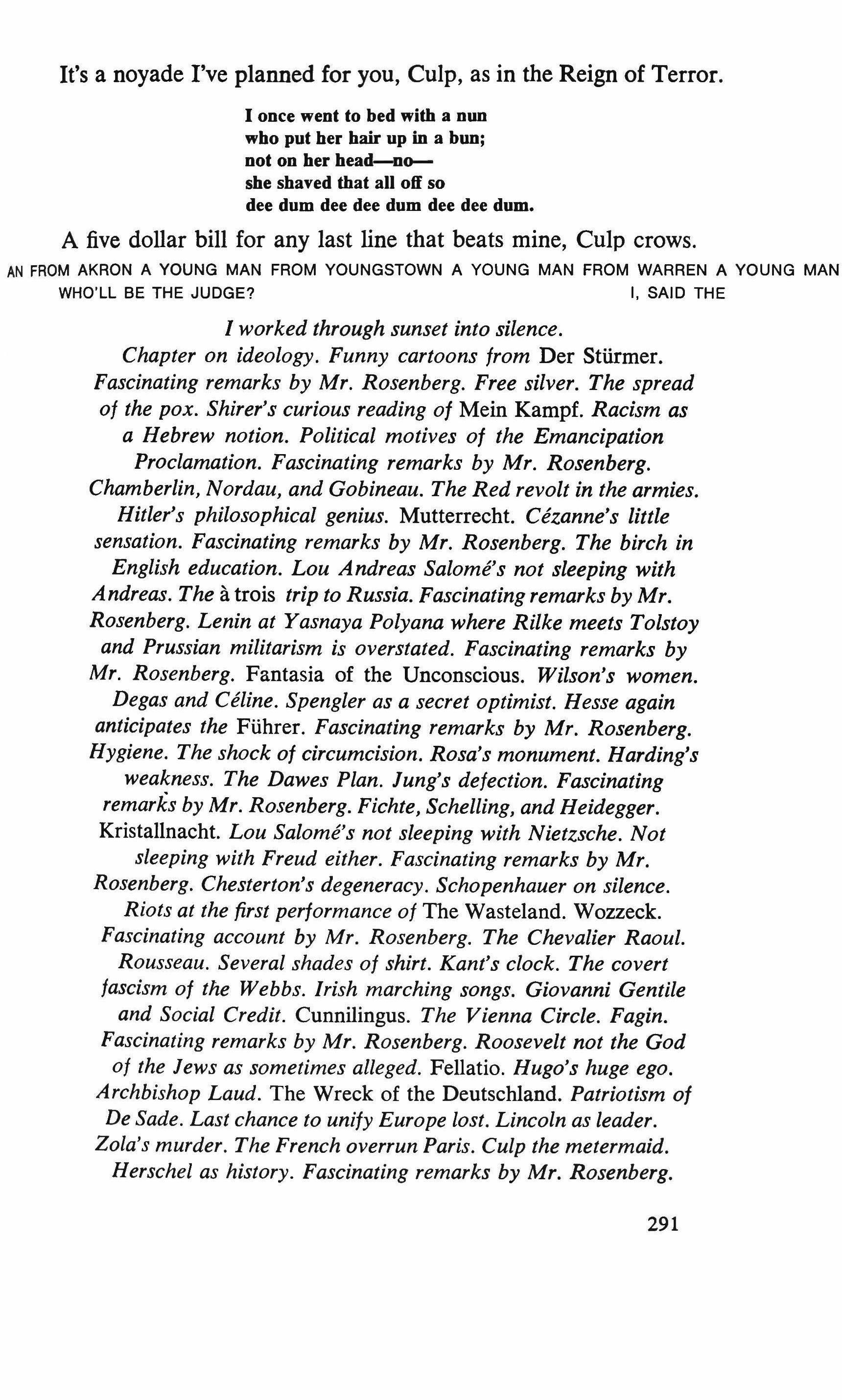
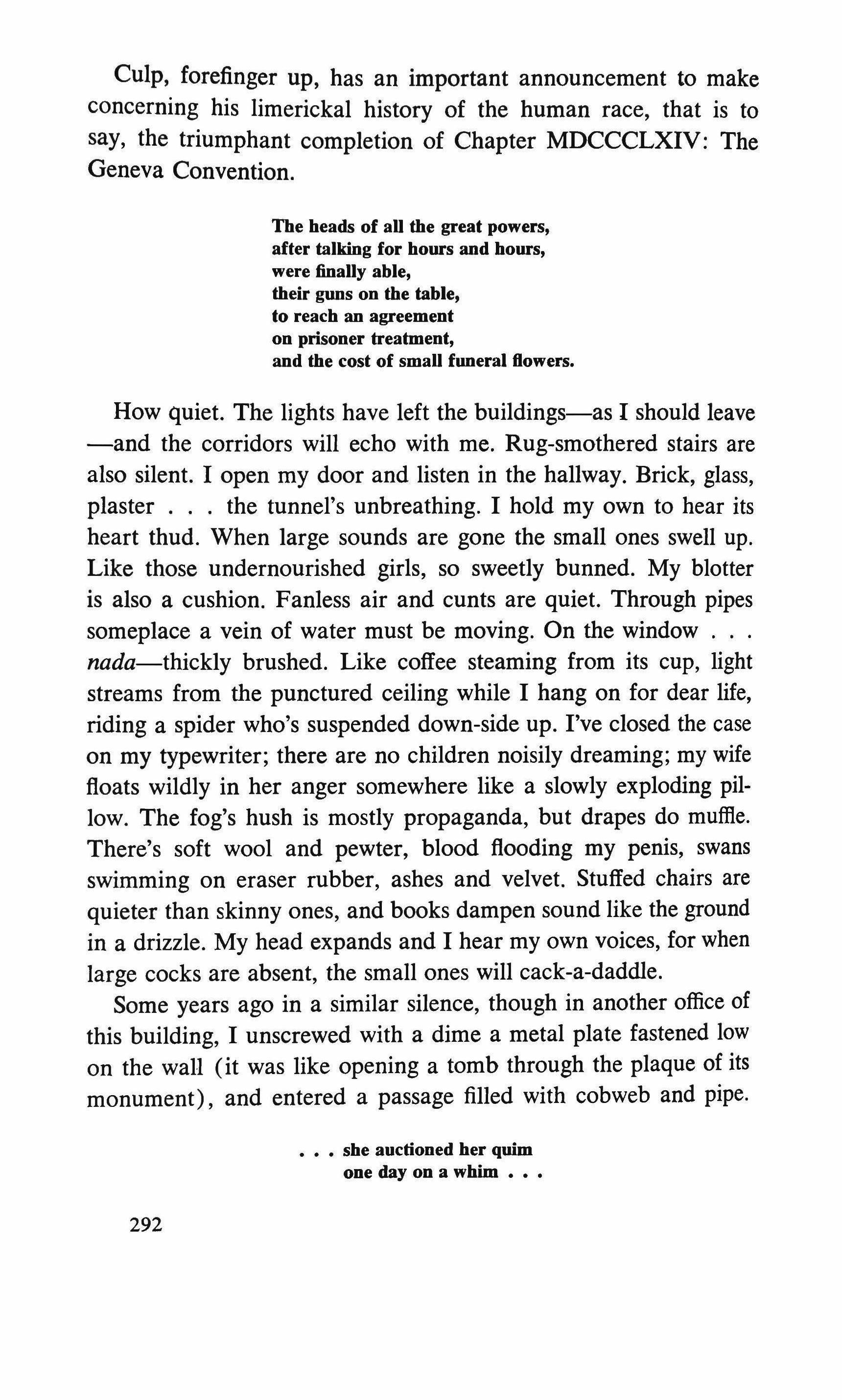
Culp, forefinger up, has an important announcement to make concerning his limerickal history of the human race, that is to say, the triumphant completion of Chapter MDCCCLXIV: The Geneva Convention.
The heads of all the great powers, after talking for hours and hours, were finally able, their guns on the table, to reach an agreement on prisoner treatment, and the cost of small funeral flowers.
How quiet. The lights have left the buildings-as I should leave -and the corridors will echo with me. Rug-smothered stairs are also silent. I open my door and listen in the hallway. Brick, glass, plaster the tunnel's unbreathing. I hold my own to hear its heart thud. When large sounds are gone the small ones swell up. Like those undernourished girls, so sweetly bunned. My blotter is also a cushion. Fanless air and cunts are quiet. Through pipes someplace a vein of water must be moving. On the window nada-thickly brushed. Like coffee steaming from its cup, light streams from the punctured ceiling while I hang on for dear life, riding a spider who's suspended down-side up. I've closed the case on my typewriter; there are no children noisily dreaming; my wife floats wildly in her anger somewhere like a slowly exploding pillow. The fog's hush is mostly propaganda, but drapes do muffle. There's soft wool and pewter, blood flooding my penis, swans swimming on eraser rubber, ashes and velvet. Stuffed chairs are quieter than skinny ones, and books dampen sound like the ground in a drizzle. My head expands and I hear my own voices, for when large cocks are absent, the small ones will cack-a-daddle.
Some years ago in a similar silence, though in another office of this building, I unscrewed with a dime a metal plate fastened low on the wall (it was like opening a tomb through the plaque of its monument), and entered a passage filled with cobweb and pipe.
she auctioned her quim one day on a whim
292
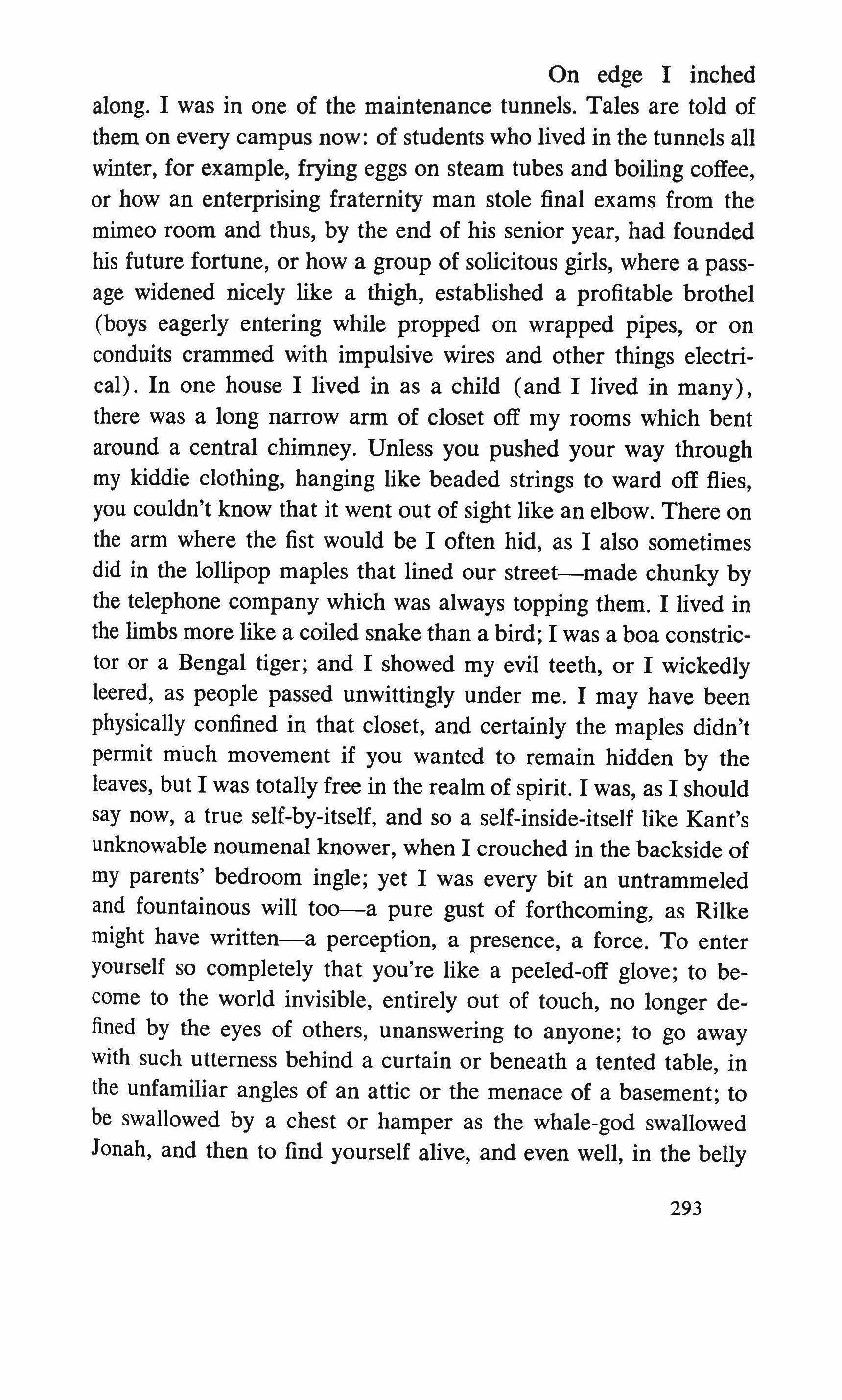
On edge I inched along. I was in one of the maintenance tunnels. Tales are told of them on every campus now: of students who lived in the tunnels all winter, for example, frying eggs on steam tubes and boiling coffee, or how an enterprising fraternity man stole final exams from the mimeo room and thus, by the end of his senior year, had founded his future fortune, or how a group of solicitous girls, where a passage widened nicely like a thigh, established a profitable brothel (boys eagerly entering while propped on wrapped pipes, or on conduits crammed with impulsive wires and other things electrical). In one house I lived in as a child (and I lived in many), there was a long narrow arm of closet off my rooms which bent around a central chimney. Unless you pushed your way through my kiddie clothing, hanging like beaded strings to ward off flies, you couldn't know that it went out of sight like an elbow. There on the arm where the fist would be I often hid, as I also sometimes did in the lollipop maples that lined our street-made chunky by the telephone company which was always topping them. I lived in the limbs more like a coiled snake than a bird; I was a boa constrictor or a Bengal tiger; and I showed my evil teeth, or I wickedly leered, as people passed unwittingly under me. I may have been physically confined in that closet, and certainly the maples didn't permit much movement if you wanted to remain hidden by the leaves, but I was totally free in the realm of spirit. I was, as I should say now, a true self-by-itself, and so a self-inside-itself like Kant's unknowable noumenal knower, when I crouched in the backside of my parents' bedroom ingle; yet I was every bit an untrammeled and fountainous will too-a pure gust of forthcoming, as Rilke might have written-a perception, a presence, a force. To enter yourself so completely that you're like a peeled-off glove; to become to the world invisible, entirely out of touch, no longer defined by the eyes of others, unanswering to anyone; to go away with such utterness behind a curtain or beneath a tented table, in the unfamiliar angles of an attic or the menace of a basement; to be swallowed by a chest or hamper as the whale-god swallowed Jonah, and then to find yourself alive, and even well, in the belly
293

of your own being-in a barn loft, under a porch, anywhere out of the mob's middle distance like a Stuart Little, a Tom Thumb, or a Tinker Bell-unnoticed and therefore all the more noticing beneath the thick hooping skirts of a bush or the beard of a fir tree; to go so supremely away like this was to re-enter through another atmosphere, and to experience, perhaps for the first time, a wholly unpressured seeing; it was bliss; and I remember the killdeer running across a wet meadow, his own strident cries of joy and exultation taking him aloft as easily as the wind lifts the seeds of the maples, though even more wildly, so steep are the slopes of his rising; and if this is what the Marquis had in mind when he spent himself; if he thought this the god in his overworked phallus, he was on the right track though he took the wrong train, for he did want his partners to sink into the sleep of objects, their cries of pain and pleasure to take place, like bullets kissing in their ricochets (any agitation of things: the hum of wires, or the whine of machinery), as if neither the prick nor the aim of its pricking were in any human presence. For me it was not quite the same. When I played Satan in the tree, or rode the New York subway later, I was not an animal in anybody's little cage of vision, but they were surely caught in mine. Your mother, the doctor wondered, does she tend to play the passive role in your parents' marriage? Ah, ja yes und never nein Is she the rolled and folded, strangled, beaten dough? No no Yes. No. Oh how often could I have killed him for it! I'd have gladly put on a Jugend shirt and shorts in order to denounce him. Yet Dante could not have punished him with better justice than he has been. Calcified. Any roofed-over hole could give the same confort, and my friends and I dug some, covering them with cardboard, and once we buried a refrigerator box, cleverly placing its entrance in a thicket. How stupid adults were, we thought; they'd never guess that if we wished and if they continued to hound us, we could go to ground like the fox, hide out in a moment. I made elaborate bed tents too, stretching blankets from the headboard which I pressed against the wall to hold them. Under that canopy I would lie hidden for
294

hours, my penis like a baby chick I tenderly warmed with my hand. The love I lavished on myself then, later only Lou received, or ever gave the nubbled wool, the eventually exasperated nerves the sky-blue blanket like a sky-blue sky the wholly imaginary breeze unwetting rain. Such shelters from the world really widen the vision: how much we took in, yet how far we also went with our inventions. St. Anthony saw monsters, shapely women, too. It was in one of those early hideaways (they were trenches, castles, dugouts, outposts, graves) that I accomplished my second seduction. My first was a cousin, tall as a column, whom I ravished from a distance. She loved to finger the lobes of my ears while my swollen eyes entered her. The second was a neighbor, round as a hug. Both grew up and haired themselves over, I imagine, but then it was only their twots which were naked, smiles without lips like the Mona Lisa's; yet bringing that girl underground as I did, and stretching her out for explorationo my newfound mistress, neighbor, Culp and Herschel, my vast middle of the West!-was a violation of that sacred space, and earned the vengeful anger of its gods. The reality of dreams was what you were intended to perceive there, not the dreamy unreality of underclothes, or between pale skinny thighs that little pouty container. And the silly thing kept saying: why do you do that? why do you want to touch me there? Well, why do I want to wade in mountain water? rub my penis on the cartilage of Lou's ear? Desire is epidemic, though we are given shots when young to ward it off, and at a later age wear charms like chips of holy bones around our necks against it. So your father was the active partner then? What, you ass, that pusillanimous bastard, that bantam rooster and twice-a-life, cripple in his wheel-side highchair? yes, he was active, ran the dash, and thrashed his legs the whole length of the long jump, except that he landed in pain, not in sand or sawdust, moistened clay, or the soft marsh of my mother, and his bones blew up. When my unsmiling mother-my sweet mummum -then young and heart-faced in a way I never knew her-hauled me like a wagon from my schooling and sat me in a corner of the 295
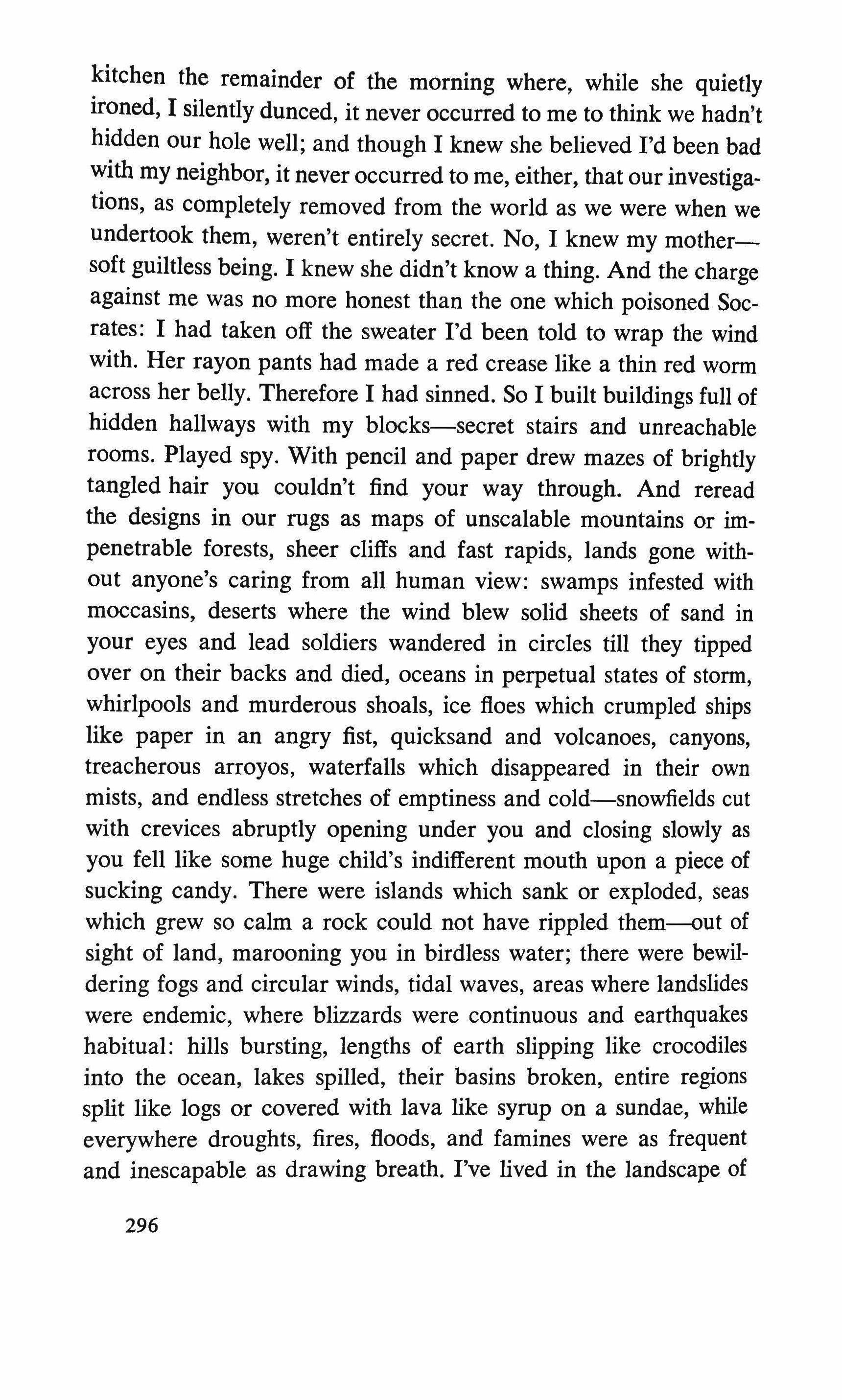
kitchen the remainder of the morning where, while she quietly ironed, I silently dunced, it never occurred to me to think we hadn't hidden our hole well; and though I knew she believed I'd been bad with my neighbor, it never occurred to me, either, that our investigations, as completely removed from the world as we were when we undertook them, weren't entirely secret. No, I knew my mothersoft guiltless being. I knew she didn't know a thing. And the charge against me was no more honest than the one which poisoned Socrates: I had taken off the sweater I'd been told to wrap the wind with. Her rayon pants had made a red crease like a thin red worm across her belly. Therefore I had sinned. So I built buildings full of hidden hallways with my blocks-secret stairs and unreachable rooms. Played spy. With pencil and paper drew mazes of brightly tangled hair you couldn't find your way through. And reread the designs in our rugs as maps of unscalable mountains or impenetrable forests, sheer cliffs and fast rapids, lands gone without anyone's caring from all human view: swamps infested with moccasins, deserts where the wind blew solid sheets of sand in your eyes and lead soldiers wandered in circles till they tipped over on their backs and died, oceans in perpetual states of storm, whirlpools and murderous shoals, ice floes which crumpled ships like paper in an angry fist, quicksand and volcanoes, canyons, treacherous arroyos, waterfalls which disappeared in their own mists, and endless stretches of emptiness and cold-snowfields cut with crevices abruptly opening under you and closing slowly as you fell like some huge child's indifferent mouth upon a piece of sucking candy. There were islands which sank or exploded, seas which grew so calm a rock could not have rippled them---out of sight of land, marooning you in birdless water; there were bewildering fogs and circular winds, tidal waves, areas where landslides were endemic, where blizzards were continuous and earthquakes habitual: hills bursting, lengths of earth slipping like crocodiles into the ocean, lakes spilled, their basins broken, entire regions split like logs or covered with lava like syrup on a sundae, while everywhere droughts, fires, floods, and famines were as frequent and inescapable as drawing breath. I've lived in the landscape of
296

that carpet ever since, beset but protected, swept by silent gales and mute contractions, guided by designs which others see as merely decorative and meaningless. I also hid things under stones, behind pipes and baseboards, in rafters, lofts, on cornices, in jars and jugs, beneath bark, in every cranny I could find-so often and so well that like a squirrel I sometimes lost them-pennies, matches, candy, gum, documents in codes I had constructed or messages in milk or lemon juice and later semen (the chief ingredient in a formula I never found effective), and then eventually two blurry photographs which showed a pair of hairless nude Chinese, in postures both unnecessary and impossible, engaged in acts for which I had no name. I also carefully nested boxes (never quite so well as my aunt would learn to), told an endless string of inconsequentiallies, and publicly maintained a whole set of beliefs I privately put no stock in, among them: Santa Claus and Shirley Temple, the fun of birthday parties, scouting, ferris wheels, and baseball, the uncertainty of future happiness, all honesty, the therapy of work, what a pleasure it was to give or how nice it would be to have a sister, the peacefulness of Sundays, roller skating, the perils of chewing gum, the prize in Cracker Jack, anything at all three miles from me, each of those rules my father described as summing up. common sense or Herbert Hoover, and every one of the so-called laws of God, Man, Nature, and the State. The older I got the oftener I disappeared down trapdoors which looked deceptively like squares of sidewalk or seemed to be post boxes or had the modest, servile air of back steps-never through anything so obvious as a manhole-and once I'd gone "in," I might travel to a cupboard in a blink, appear behind a sofa or a chair, a closet or a locker, from whence, with mousy caution, I'd emerge to live a little where the clock ticks; to dwell "out there," as I contemptuously referred to it, and condescend to be in common view and touch again, the world's awareness eroding me like rain; but as an ordinary mortal, with a merely mortal presence, mortal powers, not a soul suspected I was dangerous, so it was one more sort of smooth disguise. Then in another house (for we moved, and moved, and moved), I was able to drop from my bedroom win-
297
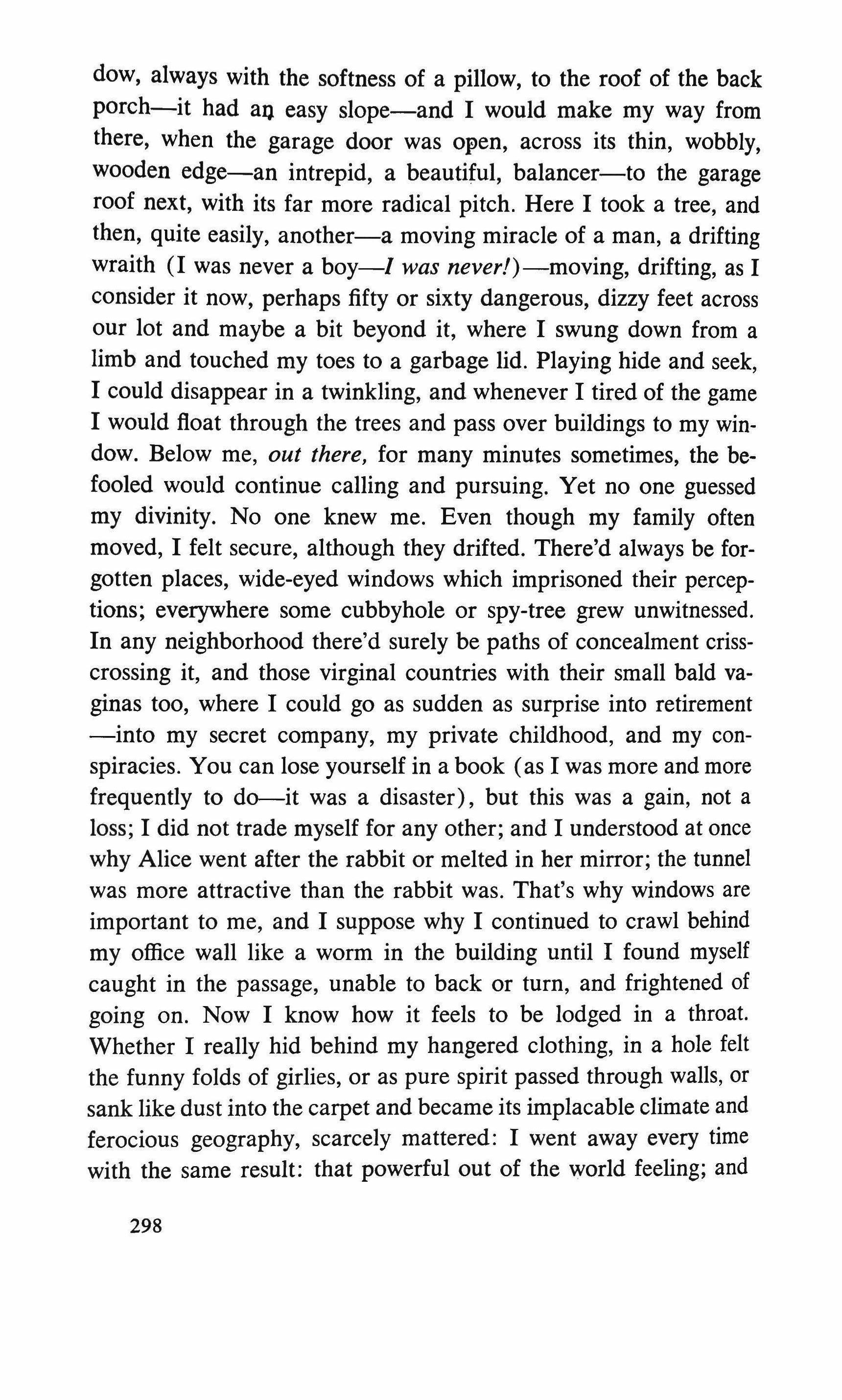
dow, always with the softness of a pillow, to the roof of the back porch-it had at) easy slope-and I would make my way from there, when the garage door was open, across its thin, wobbly, wooden edge-an intrepid, a beautiful, balancer-to the garage roof next, with its far more radical pitch. Here I took a tree, and then, quite easily, another-a moving miracle of a man, a drifting wraith (I was never a boy-l was never!)-moving, drifting, as I consider it now, perhaps fifty or sixty dangerous, dizzy feet across our lot and maybe a bit beyond it, where I swung down from a limb and touched my toes to a garbage lid. Playing hide and seek, I could disappear in a twinkling, and whenever I tired of the game I would float through the trees and pass over buildings to my window. Below me, out there, for many minutes sometimes, the befooled would continue calling and pursuing. Yet no one guessed my divinity. No one knew me. Even though my family often moved, I felt secure, although they drifted. There'd always be forgotten places, wide-eyed windows which imprisoned their perceptions; everywhere some cubbyhole or spy-tree grew unwitnessed. In any neighborhood there'd surely be paths of concealment crisscrossing it, and those virginal countries with their small bald vaginas too, where I could go as sudden as surprise into retirement -into my secret company, my private childhood, and my conspiracies. You can lose yourself in a book (as I was more and more frequently to do-it was a disaster), but this was a gain, not a loss; I did not trade myself for any other; and I understood at once why Alice went after the rabbit or melted in her mirror; the tunnel was more attractive than the rabbit was. That's why windows are important to me, and I suppose why I continued to crawl behind my office wall like a worm in the building until I found myself caught in the passage, unable to back or turn, and frightened of going on. Now I know how it feels to be lodged in a throat. Whether I really hid behind my hangered clothing, in a hole felt the funny folds of girlies, or as pure spirit passed through walls, or sank like dust into the carpet and became its implacable climate and ferocious geography, scarcely mattered: I went away every time with the same result: that powerful out of the world feeling; and
298

like the killdeer, less than weightless, propelled by outcry, by the sheer force of my freedom, would see my soul expelled from its body, and with a following sigh, my pistoned penis spit its seed. Beneath me, in the sullen darkness, rows of wheelchairs like parked cars attend this show of silence. The maimed march in robust lines through the stadium, handfuls of gravel strike the drums; the mad, the sane, the sober and the drunk, cry out. Flags snap and flutter in the general shout as the yellow polished brasses bellow. My study smokes. My office door is shut. Rockets for the Fourth fly up. Perhaps the frost will draw roses. It is warm in the tunnel, and not as dusty as you might think, remote as an intestine in its fatty coat, safe from the haze of human shuffle. My father was the active partner-yes my mother melting jello, pudding pulp. He ended up in chains, his royalty around his wrists and ankles, while she, long past Ophelia's pearly beauty, drowned herself in drink was twenty years in dying, the life-span of the poplar. Look at the precision of the rows, the helmets growing like a formal garden. o the multitudes were massed, flagged, and belted bands brought from every corner of the Reich, each throat a trumpet. What a sight! And their yells sailed up with a dry whistle and then blew to starry pieces all July, all August, all repose. Look! Look at the precision of the rows! My life as turbulent as grocery string, I wrap these bundles. A sleeve had caught me, and a button. I tore both crawling out. I could not hold the dime still when I screwed the entrance back, and the plate kept slipping out of alinement. How quiet. How soundlessly the light beats on my books. See how it leaps from metal to metal like a percussionist. My father grew his bones together. They swelled like tubers at the joints. My mother merely wept and shook crossing Canada one day when we'd run out of liquor. Hard are the hardships of the traveler in a foreign country. Down on you, you merely giggled, then asked me coldly how you tasted. Why should another's body be so beautiful its absence is as painful as the presence of your own? I bit my thumb enough it bled. You taste like the Third Reich, I said, bloodsalt on my lips, and you were offended. You were offended, yet I would never love my wife again. A cunt that's so indifferent to the 299
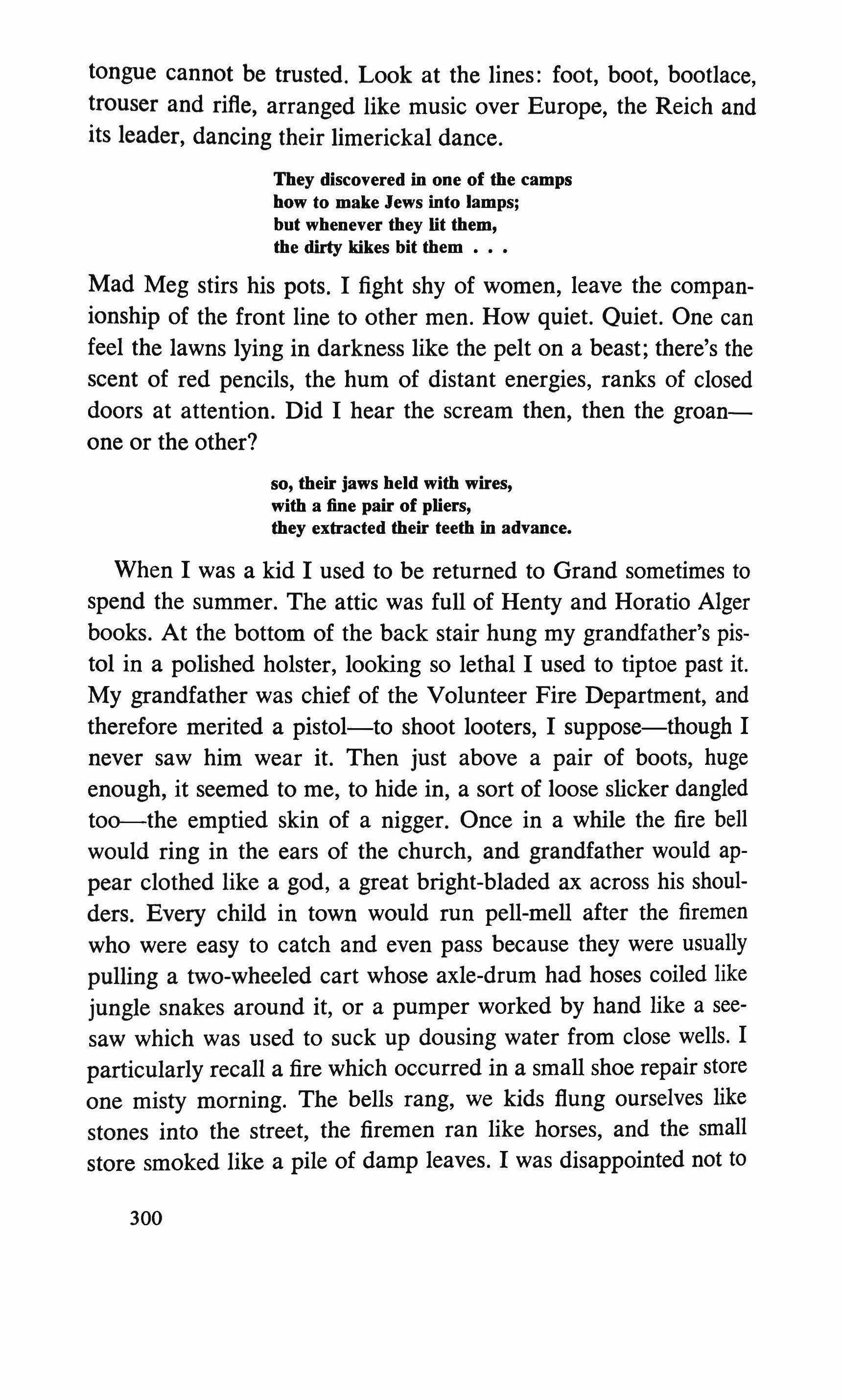
tongue cannot be trusted. Look at the lines: foot, boot, bootlace, trouser and rifle, arranged like music over Europe, the Reich and its leader, dancing their limerickal dance.
They discovered in one of the camps how to make Jews into lamps; but whenever they lit them, the dirty kikes bit them
Mad Meg stirs his pots. I fight shy of women, leave the companionship of the front line to other men. How quiet. Quiet. One can feel the lawns lying in darkness like the pelt on a beast; there's the scent of red pencils, the hum of distant energies, ranks of closed doors at attention. Did I hear the scream then, then the groanone or the other?
so, their jaws held with wires, with a fine pair of pliers, they extracted their teeth in advance.
When I was a kid I used to be returned to Grand sometimes to spend the summer. The attic was full of Henty and Horatio Alger books. At the bottom of the back stair hung my grandfather's pistol in a polished holster, looking so lethal I used to tiptoe past it. My grandfather was chief of the Volunteer Fire Department, and therefore merited a pistol-to shoot looters, I suppose-though I never saw him wear it. Then just above a pair of boots, huge enough, it seemed to me, to hide in, a sort of loose slicker dangled too--the emptied skin of a nigger. Once in a while the fire bell would ring in the ears of the church, and grandfather would appear clothed like a god, a great bright-bladed ax across his shoulders. Every child in town would run pell-mell after the firemen who were easy to catch and even pass because they were usually pulling a two-wheeled cart whose axle-drum had hoses coiled like jungle snakes around it, or a pumper worked by hand like a seesaw which was used to suck up dousing water from close wells. I particularly recall a fire which occurred in a small shoe repair store one misty morning. The bells rang, we kids flung ourselves like stones into the street, the firemen ran like horses, and the small store smoked like a pile of damp leaves. I was disappointed not to
300
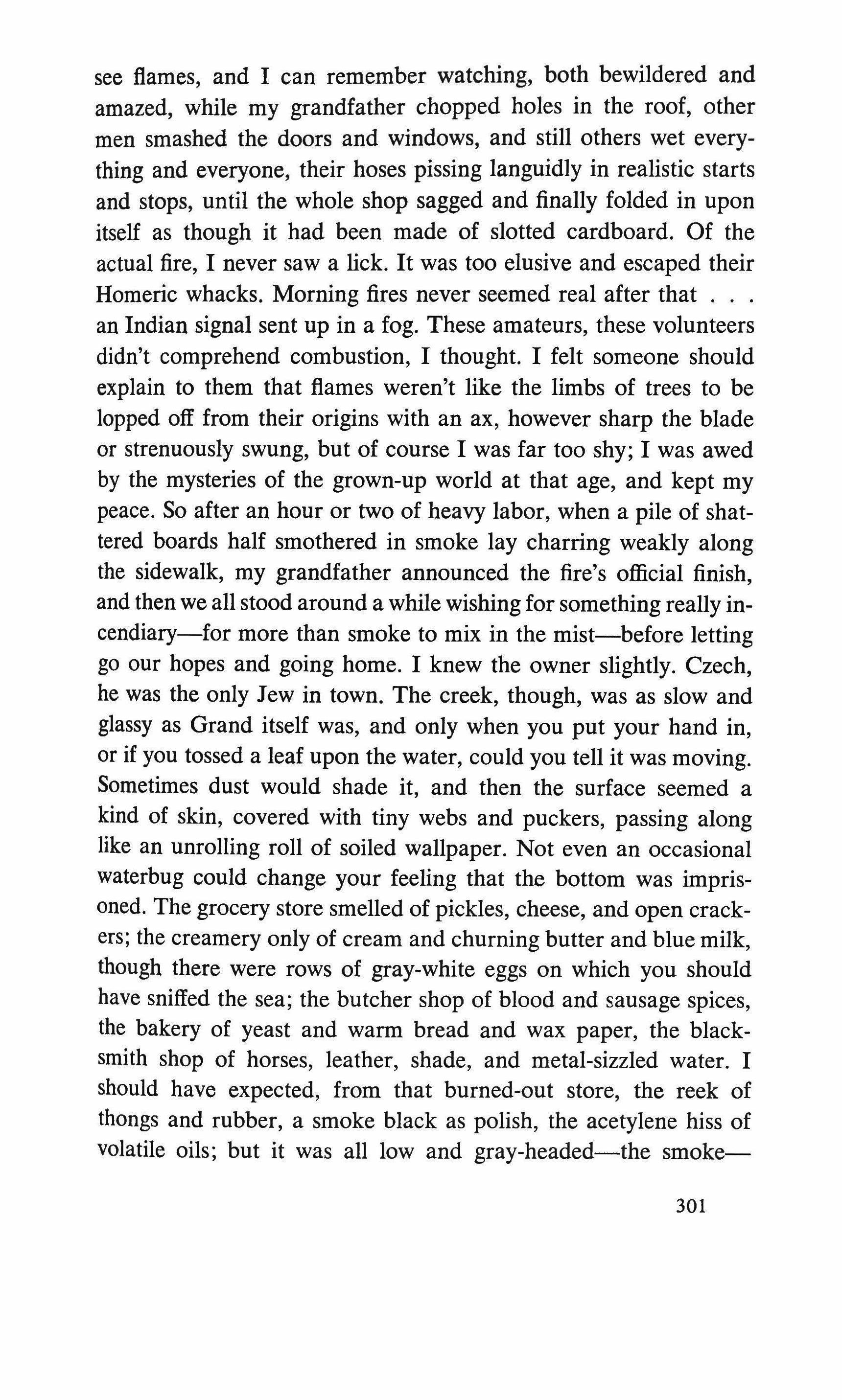
see flames, and I can remember watching, both bewildered and amazed, while my grandfather chopped holes in the roof, other men smashed the doors and windows, and still others wet everything and everyone, their hoses pissing languidly in realistic starts and stops, until the whole shop sagged and finally folded in upon itself as though it had been made of slotted cardboard. Of the actual fire, I never saw a lick. It was too elusive and escaped their Homeric whacks. Morning fires never seemed real after that an Indian signal sent up in a fog. These amateurs, these volunteers didn't comprehend combustion, I thought. I felt someone should explain to them that flames weren't like the limbs of trees to be lopped off from their origins with an ax, however sharp the blade or strenuously swung, but of course I was far too shy; I was awed by the mysteries of the grown-up world at that age, and kept my peace. So after an hour or two of heavy labor, when a pile of shattered boards half smothered in smoke lay charring weakly along the sidewalk, my grandfather announced the fire's official finish, and then we all stood around a while wishing for something really incendiary-for more than smoke to mix in the mist-before letting go our hopes and going home. I knew the owner slightly. Czech, he was the only Jew in town. The creek, though, was as slow and glassy as Grand itself was, and only when you put your hand in, or if you tossed a leaf upon the water, could you tell it was moving. Sometimes dust would shade it, and then the surface seemed a kind of skin, covered with tiny webs and puckers, passing along like an unrolling roll of soiled wallpaper. Not even an occasional waterbug could change your feeling that the bottom was imprisoned. The grocery store smelled of pickles, cheese, and open crackers; the creamery only of cream and churning butter and blue milk, though there were rows of gray-white eggs on which you should have sniffed the sea; the butcher shop of blood and sausage spices, the bakery of yeast and warm bread and wax paper, the blacksmith shop of horses, leather, shade, and metal-sizzled water. I should have expected, from that burned-out store, the reek of thongs and rubber, a smoke black as polish, the acetylene hiss of volatile oils; but it was all low and gray-headed-the smoke-
301

carrying, as far as I could tell, only the odor of pissed-on paper. Later I rescued a thin-headed hammer with blackened handle from the ruins, and I used it the remainder of that summer to set off giant caps, aiming blows which left red paper sticking to the sidewalk as though each bang had bled.
Bill, he begins. (What a Billywilliam I've become to Herschel; what a fall from William Frederick Kohler, Herr Professor, Man of Note.) I hope you will, he says, in that big new book of yours Herschel smiles like a thirty-watt bulb; he has no book, not even a little one; he has a wee MA from a weer school; the pity of others has tenured him, and he holds on by relaxing every grip, assistant professor forever, teaching courses of the lowest number, shallow surveys of Western Civ-history as photo'd from the moon. The world is full of Herschels: little sparsehaired gray-eyed men who never make the news, even as a molecule in a mob. They pass through history like water through a comb. Literally, nothing is known of them. Bill, he begins. In your long one, Bill, I hope you will consider giving How right he is, from Mad Meg's point of view, for it is the historian who giveswho takes and gives-while history itself just suffers and receives. As all my memories. Bill, he begins. Bill, I'm sure it'll be-ahgreat as it is large (yes, he's smiling shyly, holding me by my name, as Tabor did, lest I get away). Could you consider giving giving the big men more weight-I mean more attention, you know-than you did in your first. I felt (Herschel feels! It's indecent-undressing in my presence.) I felt you were a trifle inclined then, though I may be wrong-yes, I probably am-but didn't you stress the common man a bit more than perhaps he His voice goes out like a blown match. Poor Herschel-pauvre, povero, pobre Even in my books he hopes he and his friends will remain unremarked and unremembered, that no one will recognize or record them, and it brings him to the fearful edge of criticism. He's a can of Dr. Scholl's dieser armer Mann. I shall sprinkle him out. Little? small? common?-like Culp, the zizzler? So he ends. Piff-poof. Herschel ends, ends Herschel.
302
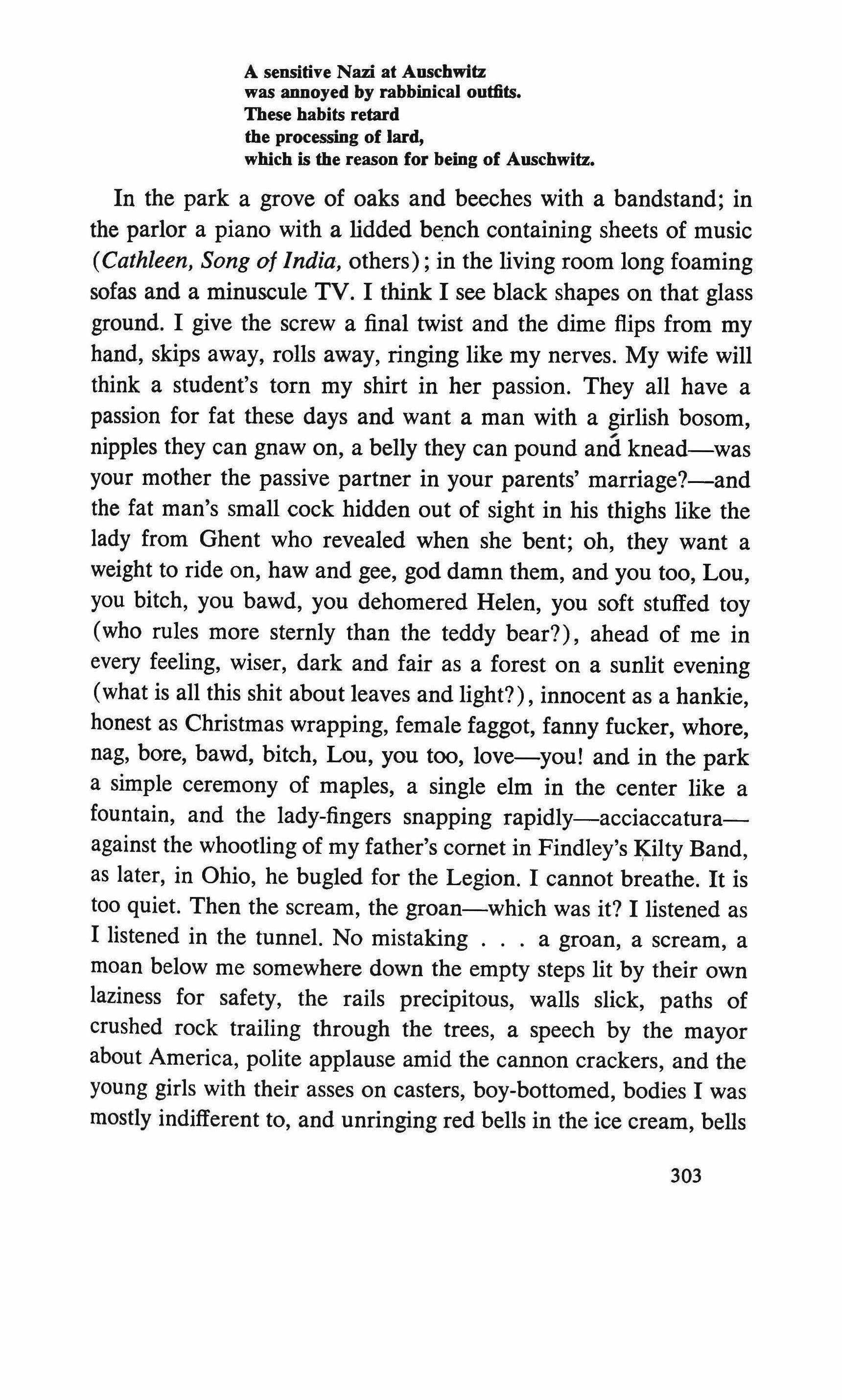
A sensitive Nazi at Anschwitz was annoyed by rabbinical outfits. These habits retard the processing of lard, which is the reason for being of Auschwitz.
In the park a grove of oaks and beeches with a bandstand; in the parlor a piano with a lidded bench containing sheets of music (Cathleen, Song of India, others) ; in the living room long foaming sofas and a minuscule TV. I think I see black shapes on that glass ground. I give the screw a final twist and the dime flips from my hand, skips away, rolls away, ringing like my nerves. My wife will think a student's torn my shirt in her passion. They all have a passion for fat these days and want a man with a girlish bosom, nipples they can gnaw on, a belly they can pound and knead-was your mother the passive partner in your parents' marriage?-and the fat man's small cock hidden out of sight in his thighs like the lady from Ghent who revealed when she bent; oh, they want a weight to ride on, haw and gee, god damn them, and you too, Lou, you bitch, you bawd, you dehomered Helen, you soft stuffed toy (who rules more sternly than the teddy bear?), ahead of me in every feeling, wiser, dark and fair as a forest on a sunlit evening (what is all this shit about leaves and light?), innocent as a hankie, honest as Christmas wrapping, female faggot, fanny fucker, whore, nag, bore, bawd, bitch, Lou, you too, love-you! and in the park a simple ceremony of maples, a single elm in the center like a fountain, and the lady-fingers snapping rapidly-acciaccaturaagainst the whootling of my father's cornet in Findley's Kilty Band, as later, in Ohio, he bugled for the Legion. I cannot breathe. It is too quiet. Then the scream, the groan-which was it? I listened as I listened in the tunnel. No mistaking a groan, a scream, a moan below me somewhere down the empty steps lit by their own laziness for safety, the rails precipitous, walls slick, paths of crushed rock trailing through the trees, a speech by the mayor about America, polite applause amid the cannon crackers, and the young girls with their asses on casters, boy-bottomed, bodies I was mostly indifferent to, and unringing red bells in the ice cream, bells 303
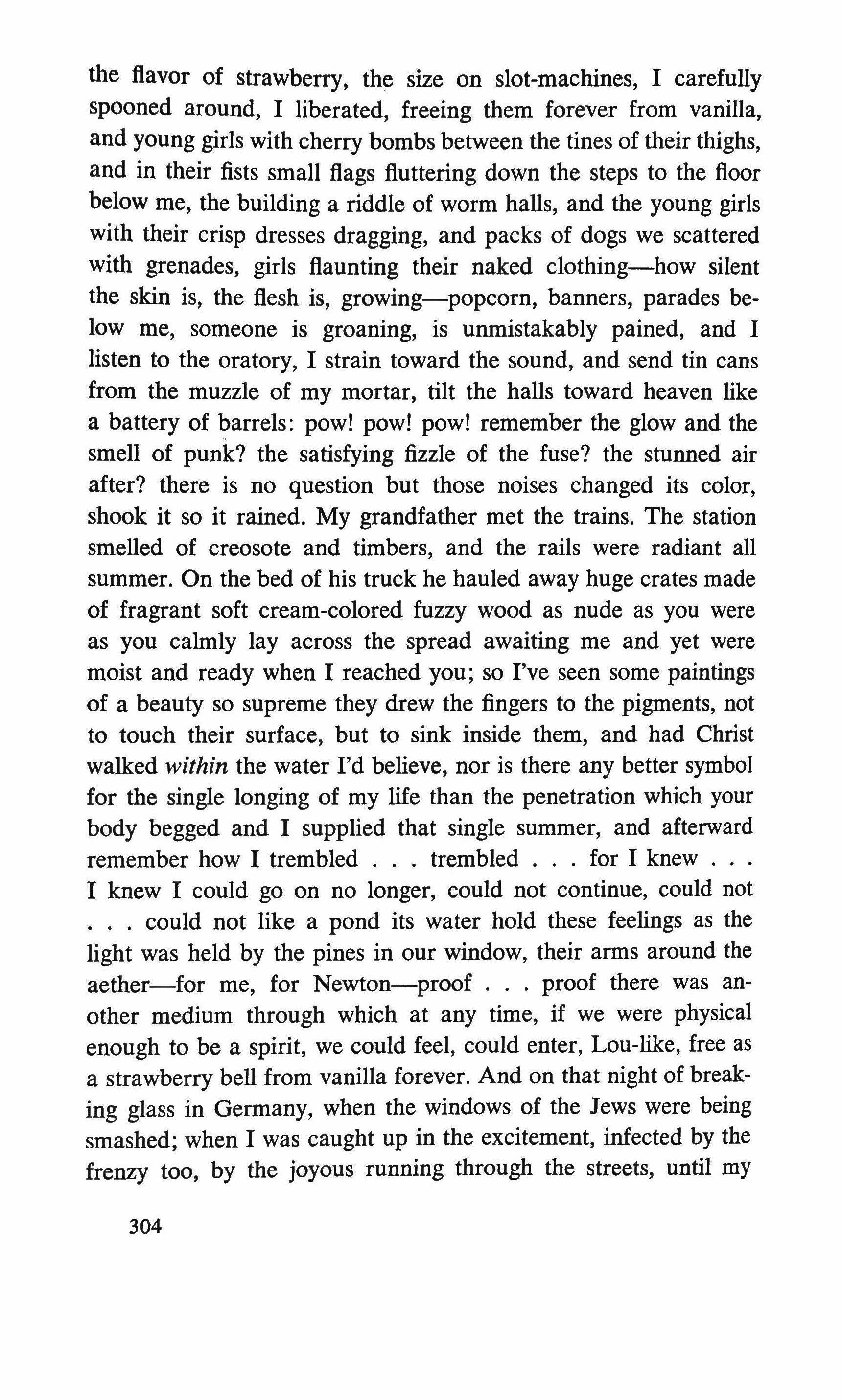
the flavor of strawberry, the size on slot-machines, I carefully spooned around, I liberated, freeing them forever from vanilla, and young girls with cherry bombs between the tines of their thighs, and in their fists small flags fluttering down the steps to the floor below me, the building a riddle of worm halls, and the young girls with their crisp dresses dragging, and packs of dogs we scattered with grenades, girls flaunting their naked clothing-how silent the skin is, the flesh is, growing-popcorn, banners, parades below me, someone is groaning, is unmistakably pained, and I listen to the oratory, I strain toward the sound, and send tin cans from the muzzle of my mortar, tilt the halls toward heaven like a battery of �arrels: pow! pow! pow! remember the glow and the smell of punk? the satisfying fizzle of the fuse? the stunned air after? there is no question but those noises changed its color, shook it so it rained. My grandfather met the trains. The station smelled of creosote and timbers, and the rails were radiant all summer. On the bed of his truck he hauled away huge crates made of fragrant soft cream-colored fuzzy wood as nude as you were as you calmly lay across the spread awaiting me and yet were moist and ready when I reached you; so I've seen some paintings of a beauty so supreme they drew the fingers to the pigments, not to touch their surface, but to sink inside them, and had Christ walked within the water I'd believe, nor is there any better symbol for the single longing of my life than the penetration which your body begged and I supplied that single summer, and afterward remember how I trembled trembled for I knew I knew I could go on no longer, could not continue, could not could not like a pond its water hold these feelings as the light was held by the pines in our window, their arms around the aether-for me, for Newton-proof proof there was another medium through which at any time, if we were physical enough to be a spirit, we could feel, could enter, Lou-like, free as a strawberry bell from vanilla forever. And on that night of breaking glass in Germany, when the windows of the Jews were being smashed; when I was caught up in the excitement, infected by the frenzy too, by the joyous running through the streets, until my
304
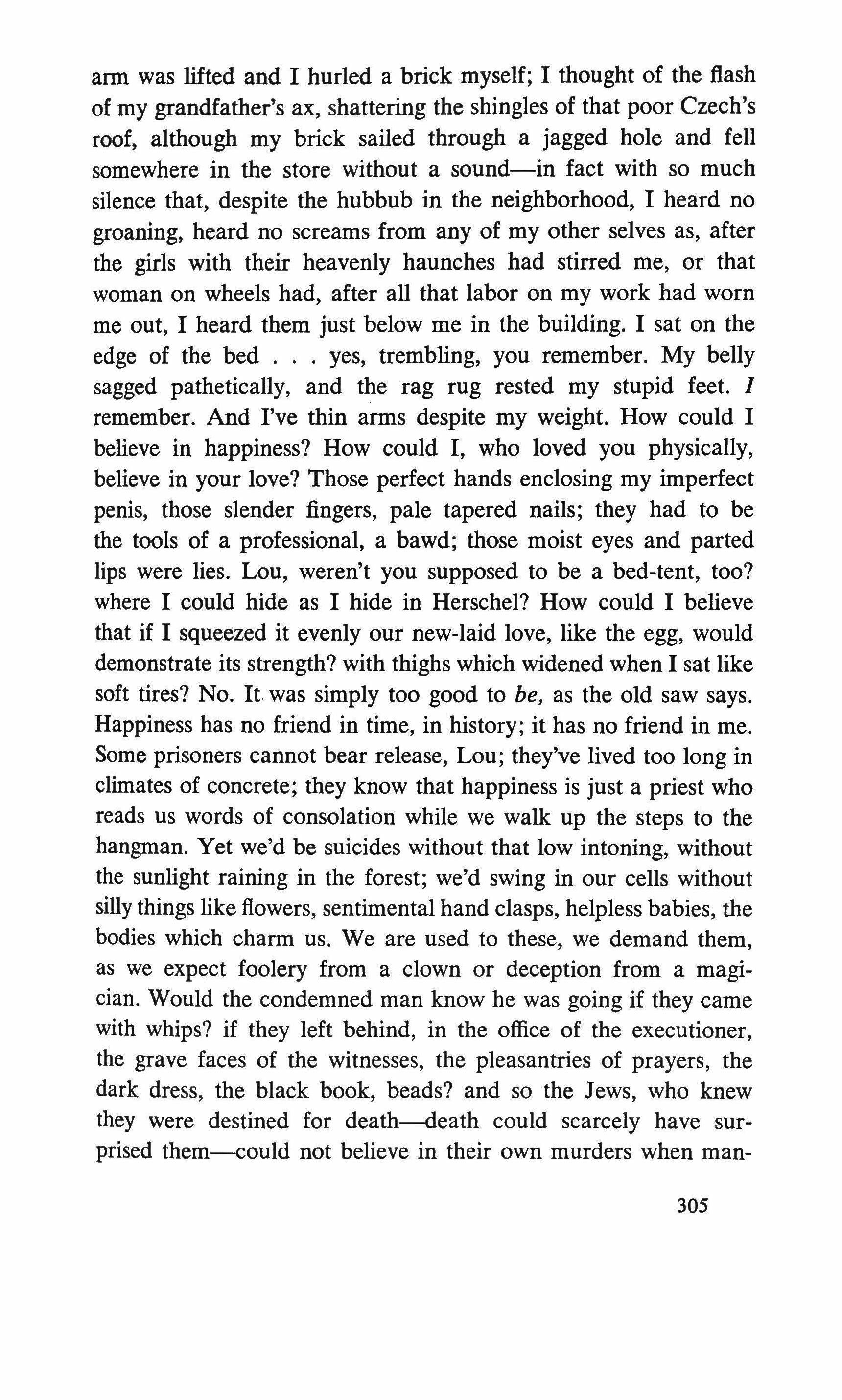
arm was lifted and I hurled a brick myself; I thought of the flash of my grandfather's ax, shattering the shingles of that poor Czech's roof, although my brick sailed through a jagged hole and fell somewhere in the store without a sound-in fact with so much silence that, despite the hubbub in the neighborhood, I heard no groaning, heard no screams from any of my other selves as, after the girls with their heavenly haunches had stirred me, or that woman on wheels had, after all that labor on my work had worn me out, I heard them just below me in the building. I sat on the edge of the bed yes, trembling, you remember. My belly sagged pathetically, and the rag rug rested my stupid feet. I remember. And I've thin arms despite my weight. How could I believe in happiness? How could I, who loved you physically, believe in your love? Those perfect hands enclosing my imperfect penis, those slender fingers, pale tapered nails; they had to be the tools of a professional, a bawd; those moist eyes and parted lips were lies. Lou, weren't you supposed to be a bed-tent, too? where I could hide as I hide in Herschel? How could I believe that if I squeezed it evenly our new-laid love, like the egg, would demonstrate its strength? with thighs which widened when I sat like soft tires? No. It. was simply too good to be, as the old saw says. Happiness has no friend in time, in history; it has no friend in me. Some prisoners cannot bear release, Lou; they've lived too long in climates of concrete; they know that happiness is just a priest who reads us words of consolation while we walk up the steps to the hangman. Yet we'd be suicides without that low intoning, without the sunlight raining in the forest; we'd swing in our cells without silly things like flowers, sentimental hand clasps, helpless babies, the bodies which charm us. We are used to these, we demand them, as we expect foolery from a clown or deception from a magician. Would the condemned man know he was going if they came with whips? if they left behind, in the office of the executioner, the grave faces of the witnesses, the pleasantries of prayers, the dark dress, the black book, beads? and so the Jews, who knew they were destined for death--death could scarcely have surprised them--could not believe in their own murders when man-
305

aged in this manner, for such ceremony as they had come to count on was removed; it was so open, more matter-of-fact than even brutal, so fearless, honest, unemotional-so sincere-like spraying for mosquitoes; it so clearly transcended all excuse, it did away with reasons. On that splendid disdain for subterfuge, they flew-the Nazis; (0 hear me, Herschel!) they rose as gods from the graves of their middle-class lives; anointed, they left their little businesses behind, the normal world with all its petty laws, for sainthood. These laws, these rules, these lies which lips at least for centuries had served-they did not need them; they were so self-contained, so internally secure, they were above even the ancient hypocrisies of heaven; and they lived in the realm of the spirit, of der Heilige Geist, as they'd been taught by their religions and philosophies; what were bodies? meat and bones to be disposed of: new grinders and new ovens, new gases and mass graves (as large as lakes, as long as rivers), a raw material calling for a new technology, new plants and processes, a fresh imagination, fresh inventions; what were bodies compared to principles, and what were principles compared to destiny, the Reich's will, and history's aim? More theoretical, therefore, than most men, they did not dream, they saw, foresaw; they left the dreaming to the Jews, who did-they dreamed-like drummers marching at a cannon. The one-thousand-year Reich was a State to be constructed, just like happiness, out of time, like the millennium of the Marxist. No angels from on high or demons from below with fiery swords or flaming forks came to balk them. Nature punishes gluttony, not avarice or hate. To Nature it's most important that you get a good night's sleep. No. Only further murders-theirsprevented them from murdering further, as we flew bombers to Japan and powdered them to peace god willing. I am sloppy, pudgy, like someone who has stuffed himself with sweets-a child, preserved in ice, the years blue-streaked and gleaming coldly. Thus when I heard the groans below me (screams, groans, which?), I quickly left my office and the building, fluttered like a moth down the stairwell, so slippery with light, and drove out of their hearing in my Chevvy.
306

THERE ONCE WAS THERE ONCE WAS THERE ONCE WAS THERE ONCE WAS THERE ONCE WAS A YOUNG MAN FROM CRESTLINE A YOUNG MAN FROM CLEVELAND A YOUNG MAN FROM BRYAN
When I hear the bursting of the rockets, my hearing makes no noise; when I see the sky, my seeing's silent; consciousness, just like the dead, is also quiet. So quiet. Am I any less indifferent and a coward if the voice I failed-the moan I ran from-was a phantom was my own? My brick passed through that window like a ghost. I never heard it land. I was simply never fated to break glass. That's why, Lou, I couldn't continue us. And that's why windows are important to me.
307
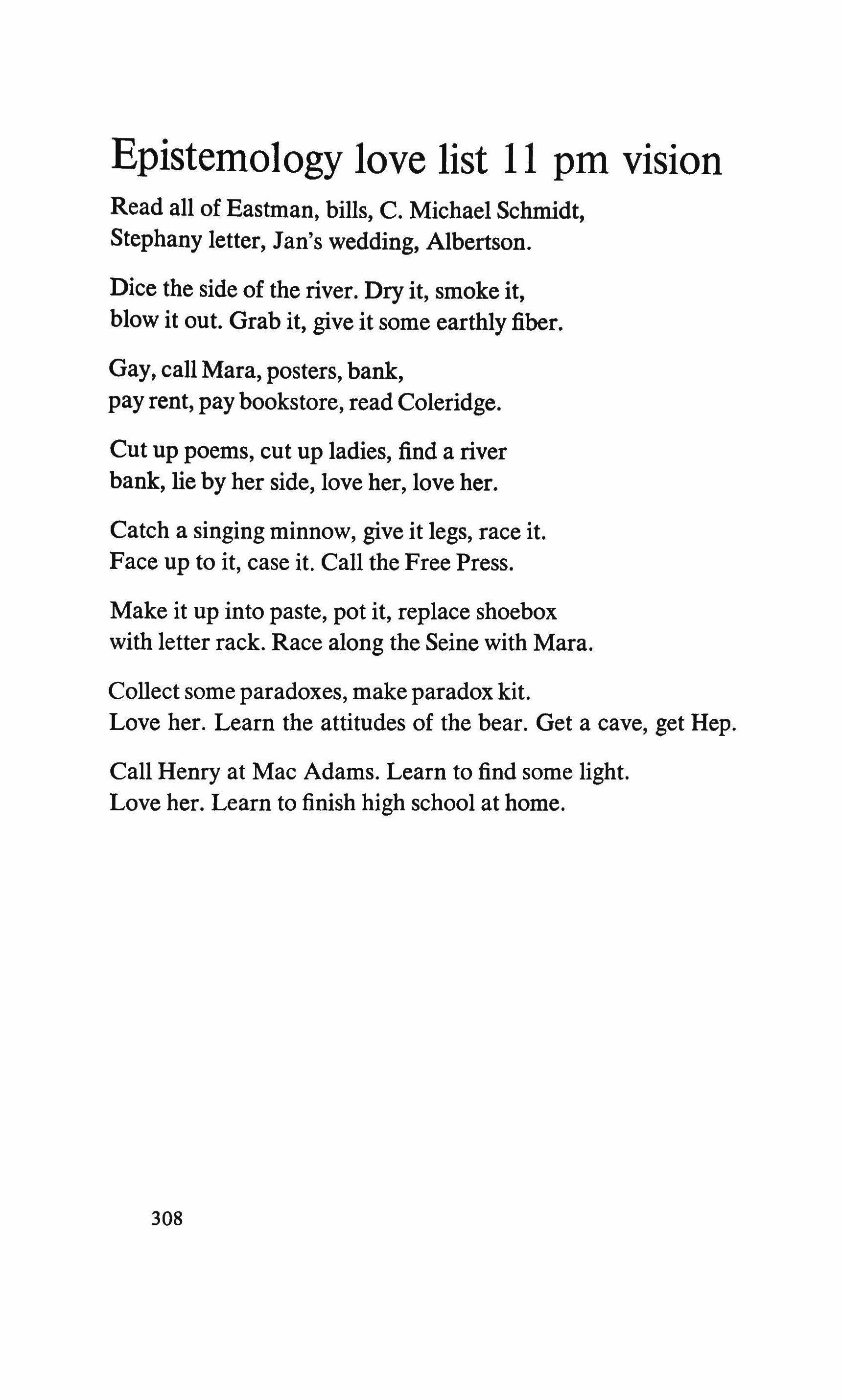
Epistemology love list 11 pm vision
Read all of Eastman, bills, C. Michael Schmidt, Stephany letter, Jan's wedding, Albertson.
Dice the side of the river. Dry it, smoke it, blow it out. Grab it, give it some earthly fiber.
Gay, call Mara, posters, bank, pay rent, pay bookstore, read Coleridge.
Cut up poems, cut up ladies, find a river bank, lie by her side, love her, love her.
Catch a singing minnow, give it legs, race it. Face up to it, case it. Call the Free Press.
Make it up into paste, pot it, replace shoebox with letter rack. Race along the Seine with Mara.
Collect some paradoxes, make paradox kit. Love her. Learn the attitudes of the bear. Get a cave, get Hep.
Call Henry at Mac Adams. Learn to find some light. Love her. Learn to finish high school at home.
308
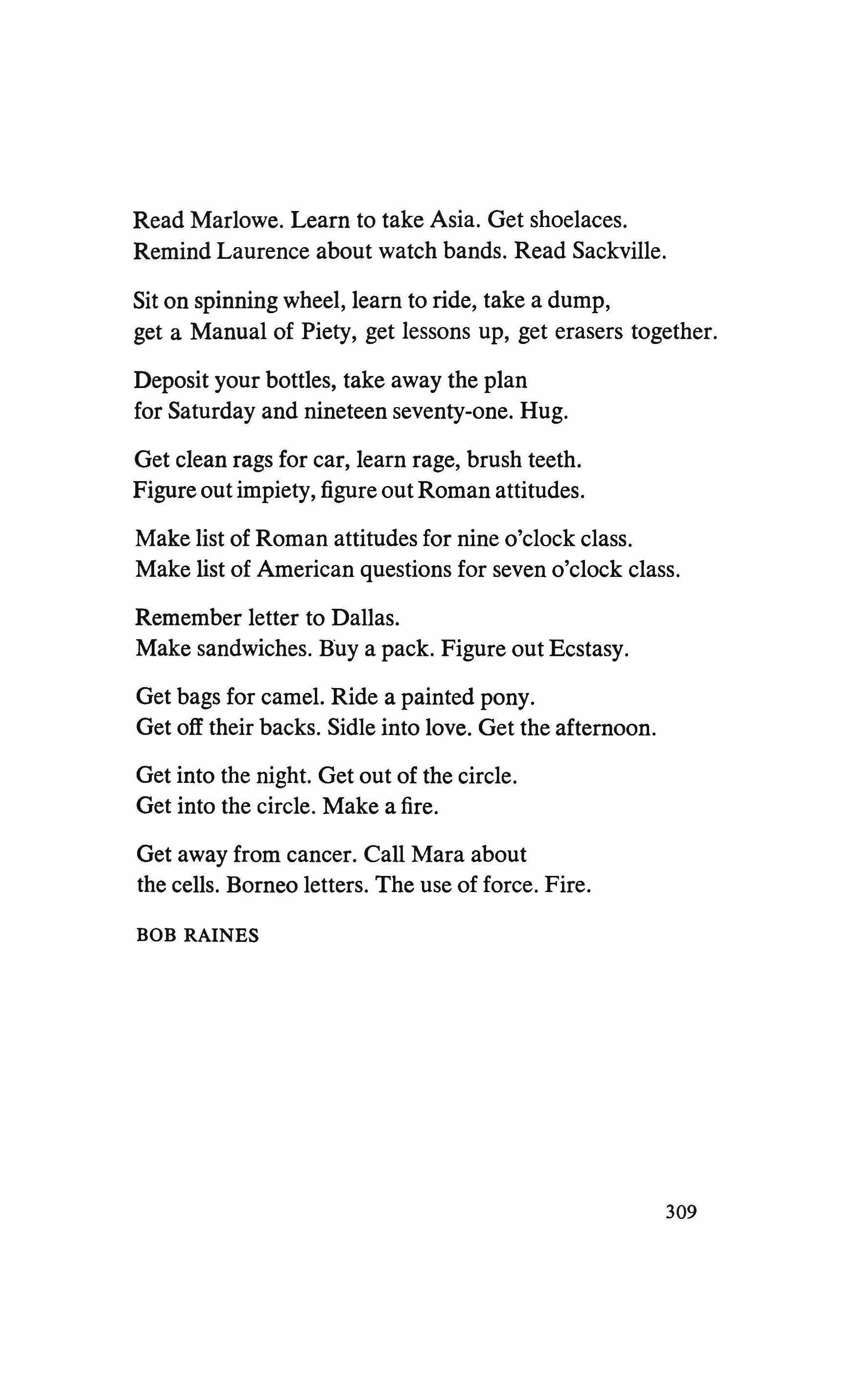
Read Marlowe. Learn to take Asia. Get shoelaces. Remind Laurence about watch bands. Read Sackville.
Sit on spinning wheel, learn to ride, take a dump, get a Manual of Piety, get lessons up, get erasers together.
Deposit your bottles, take away the plan for Saturday and nineteen seventy-one. Hug.
Get clean rags for car, learn rage, brush teeth. Figure out impiety, figure out Roman attitudes.
Make list of Roman attitudes for nine o'clock class. Make list of American questions for seven o'clock class.
Remember letter to Dallas. Make sandwiches. Buy a pack. Figure out Ecstasy.
Get bags for camel. Ride a painted pony. Get off their backs. Sidle into love. Get the afternoon.
Get into the night. Get out of the circle. Get into the circle. Make a fire.
Get away from cancer. Call Mara about the cells. Borneo letters. The use of force. Fire.
BOB RAINES
309
An American adventure
JOYCE CAROL OATES

Waking, I am overcome with a sense of dread. My wife is sleeping beside me but her face will not stay permanent-it dissolves back into its elements, into dots. I look away from her; I am not equal to this marriage. I am not equal to the person I am supposed to be. Once upon a time I was more name than face. Someone said my name: I answered at once. Now the face has blotted out the name, my name turned out to be only accidental, only a sound: and the face something I can rely upon-in any mirror I see the same face, the same face, and it never dissolves into dots. It is permanent. It is a narrow, kindly, suspicious face, the hairline beginning to recede (though I am only twenty-seven years old), the teeth still excellent.
My face.
My name: when someone says my name now I answer reluctantly, to be polite. It is like waking up in the morning, hearing my name called. I am filled with dread at the sound of it because it is a lie; not exactly a lie, but not the truth. It is not really me and has nothing to do with me, that sound.
My wife says my name now. She whispers it, moving toward me. I embrace her out of politeness, out of the habit of another man-
312 TriQuarterJy

the man who married her, the man I sometimes recall. She is not quite awake and has no idea who is embracing her. She whispers my name; but it is no absolute claim upon me. She falls asleep again, dreaming.
My head aches. I need to jump out of bed. The room is too hot, too stuffy. I need to get out of this room and walk outside, fast. We have lived in this apartment for too long. Our landlady's beige print wallpaper, our landlady's soiled white curtains-at night I can hear our landlady's furniture sneering at us, soft hissing laughs. Since my operation I don't sleep well. My face has grown narrower. But I am a young man, still, statistically, and in two years I'll be done with graduate school and well into my "career," which is waitingpatiently for me.
When did I first meet my wife? Did I ever meet her for the first time? Three years now we've lived together in this apartment, slept together, sat with our elbows on the rickety kitchen table, and she can fall back into her primal elements as easily as the toast used to jump up out of the toaster, before rust or crumbs slowed it down; with skin and tissue and bone broken down into their elements, she would be indistinguishable from any other woman.
I imagine things broken down into their elements, everything except my own face, which is cursed with immortality. But everything else can be broken down: stuck into a test tube and tested.
Since my operation-
While I was in the hospital-
I begin many sentences that way, too many. Even letters home: While I was in the hospital I had time to catch up on my reading. I read the book you sent and enjoyed it. My "reading" is something I should always "catch up on"; it is like my career, awaiting me mysteriously, perhaps at an intersection of this city. I write letters like this to my mother, who sends me books about the American past, particularly about Abraham Lincoln. She admires Lincoln very much and perhaps in her mind I am confused with him. She owns a very expensive antique highboy, a piece of furniture worth thousands of dollars, that is perhaps also confused in her mind with Lincoln or perhaps it is only in my mind that it is confused with Lincoln.
313
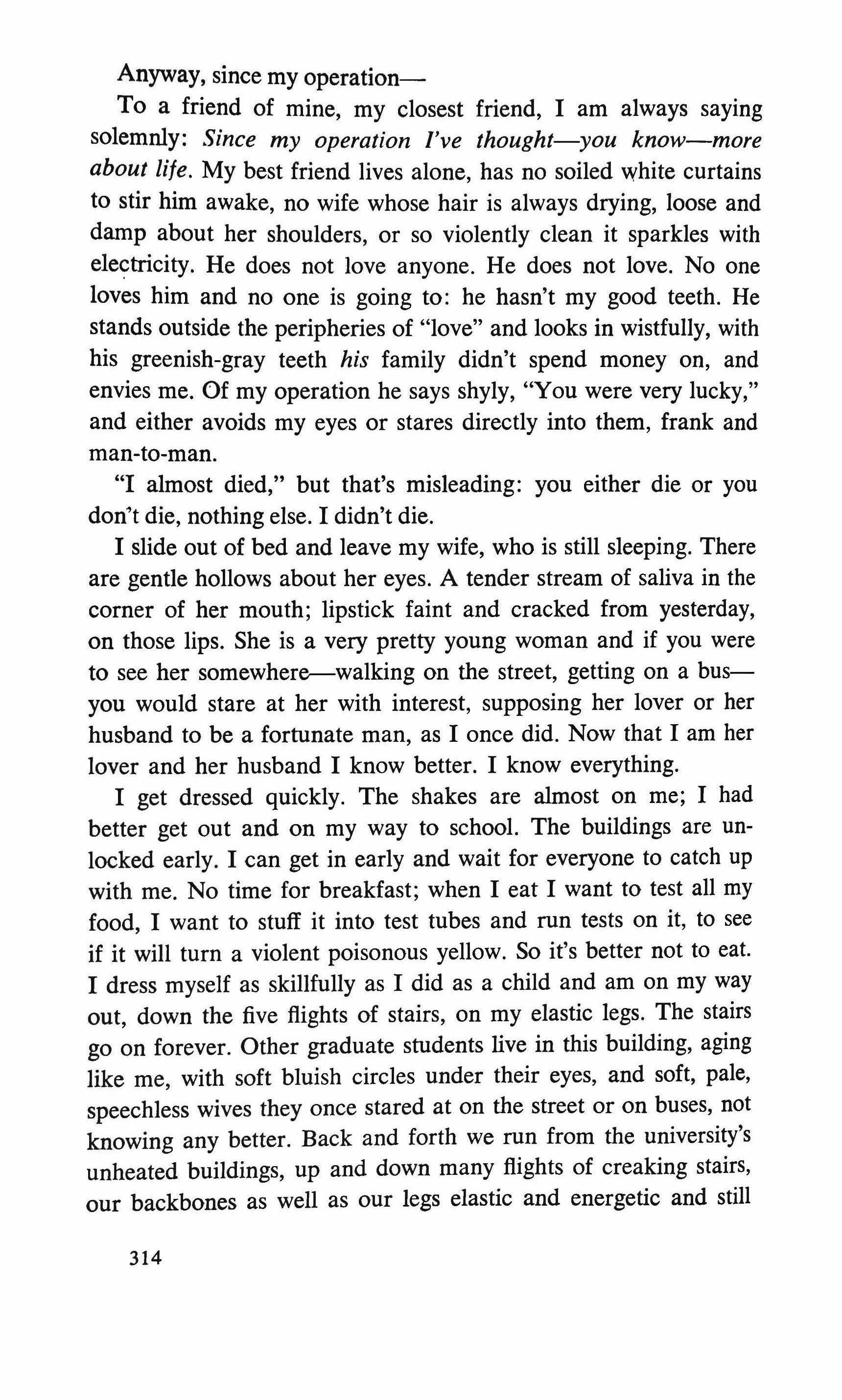
Anyway, since my operation-
To a friend of mine, my closest friend, I am always saying solemnly: Since my operation I've thought-you know-more about life. My best friend lives alone, has no soiled white curtains to stir him awake, no wife whose hair is always drying, loose and damp about her shoulders, or so violently clean it sparkles with electricity. He does not love anyone. He does not love. No one loves him and no one is going to: he hasn't my good teeth. He stands outside the peripheries of "love" and looks in wistfully, with his greenish-gray teeth his family didn't spend money on, and envies me. Of my operation he says shyly, "You were very lucky," and either avoids my eyes or stares directly into them, frank and man-to-man.
"I almost died," but that's misleading: you either die or you don't die, nothing else. I didn't die.
I slide out of bed and leave my wife, who is still sleeping. There are gentle hollows about her eyes. A tender stream of saliva in the corner of her mouth; lipstick faint and cracked from yesterday, on those lips. She is a very pretty young woman and if you were to see her somewhere-walking on the street, getting on a busyou would stare at her with interest, supposing her lover or her husband to be a fortunate man, as I once did. Now that I am her lover and her husband I know better. I know everything.
I get dressed quickly. The shakes are almost on me; I had better get out and on my way to school. The buildings are unlocked early. I can get in early and wait for everyone to catch up with me. No time for breakfast; when I eat I want to test all my food, I want to stuff it into test tubes and run tests on it, to see if it will turn a violent poisonous yellow. So it's better not to eat. I dress myself as skillfully as I did as a child and am on my way out, down the five flights of stairs, on my elastic legs. The stairs go on forever. Other graduate students live in this building, aging like me, with soft bluish circles under their eyes, and soft, pale, speechless wives they once stared at on the street or on buses, not knowing any better. Back and forth we run from the university's unheated buildings, up and down many flights of creaking stairs, our backbones as well as our legs elastic and energetic and still
314

youthful, though we are all breaking down. We carry armloads of books and notebooks with our names inked in them, in case they should get lost. Some of us even carry small metal boxes with fiveby-eight cards in them, inked in with bibliographical items and abbreviations and information in code, our names inked carefully on grimy adhesive tape stuck to the outside of the boxes, in case they should get lost. My name is
A name can get lost. A face can never get lost. Even without mirrors you still have a face, but the name can get mislaid and that's that. What was named in me died in City Hospital and what lived on has no name, isn't married or filed anywhere, hasn't yet settled into the bottom of its test tube.
Outside. April? Yes, it looks like April once again. The air swerves from warm to cold here; we are near a lake. A few weeks ago it was unmistakably winter and I was safe in the hospital, dying, looking out at a patch of sky that never changed much. It was an eternal patch of sky. When my wife came to visit me everything broke up into chattering fragments; my best friend made too many nervous jokes, his breath was stale and unused; my mother and aunt took American Airlines all the way out here to seize my hands and stare at me. How did it happen? How? There is poison seeping around in my bloodstream yet; they couldn't have drained it all out. An infection. Something went wrong, very suddenly. "They"-I mean my ordinary little doctor, a Korean-couldn't explain everything, couldn't explain life. Try telling that to my mother. My mother's high-toned skin glowed with indignation and her eyes jumped around to find an object: who was to blame?
Across the street, in front of the drugstore, some hoodlums are standing around. Every day. Even this early. They are Negro boys, young and loud and careless with their stares; they make shrieking jokes in what seems to be another language. They stand around the comer as if on duty, waiting for something to happen. Or perhaps they are waiting for a bus. I remember each one of them-each familiar face, each familiar jacket with its unzipped zipper- When I returned from dying they did not seem to remember me, and yet I remember them.
I remember everything about this neighborhood, fondly. And 315

with dread. The hoodlums-the mothers and the babies-the boarded-up stores. We've lived in this neighborhood for three years but that's not it-I walk this way five mornings a week but that's not it either. My heart pounds faster, my fingers begin to worry the edge of my notebook. What worries me is that there is a world beyond the world I see that is simultaneous with it. Yes. I am crossing the wide, dirty, wintry street, not as fast as I did before my operation but fast enough, youthfully enough, and I have the feeling that there is another world simultaneous with this one-its dimensions precisely matched with ours, its outlines absorbed in ours.
Why not?
The only difference is that there, in that world, nothing is human. There are no rules or laws or chemical "truths." In the hospital I had plenty of time to think and I did not think of my young wife or of love, neither of which I now believe in, nor of my important career "waiting" somewhere for me, nor did I think of my best friend and his loneliness or of Abraham Lincoln and his problems, and not even of my father, who as a matter of fact died in a hospital some eight, nine years ago, a much better hospital than the one I was in, of a malady considered less fatal than the one I had. No. In my bed I thought of this neighborhood, as if it were the entire world. I thought of this ugly neighborhood. My fate. My mind swam through the dense winter air, recreating the steps I took five days a week: trying to remember what the world looked like, lingering on signs, store fronts, windows, stretches of sidewalk. A stretch of fence fluttering with old posters.
RINGLING BROTHERS CIRCUS JULY 10, 11, 12.
And that boarded-up Esso station across the street: sometimes I could visualize it sharply, sometimes only hazily. A few Negro children are playing there this morning. In my dreams there were no people, only things. That world might have been bombed clean of people, aired out with one of those extravagant nuclear devices that destroy only flesh and leave objects sanitary and ready for acquisition. It was a hard, vivid world. This ordinary world is flimsy because people are always cluttering it up, hurrying from
316
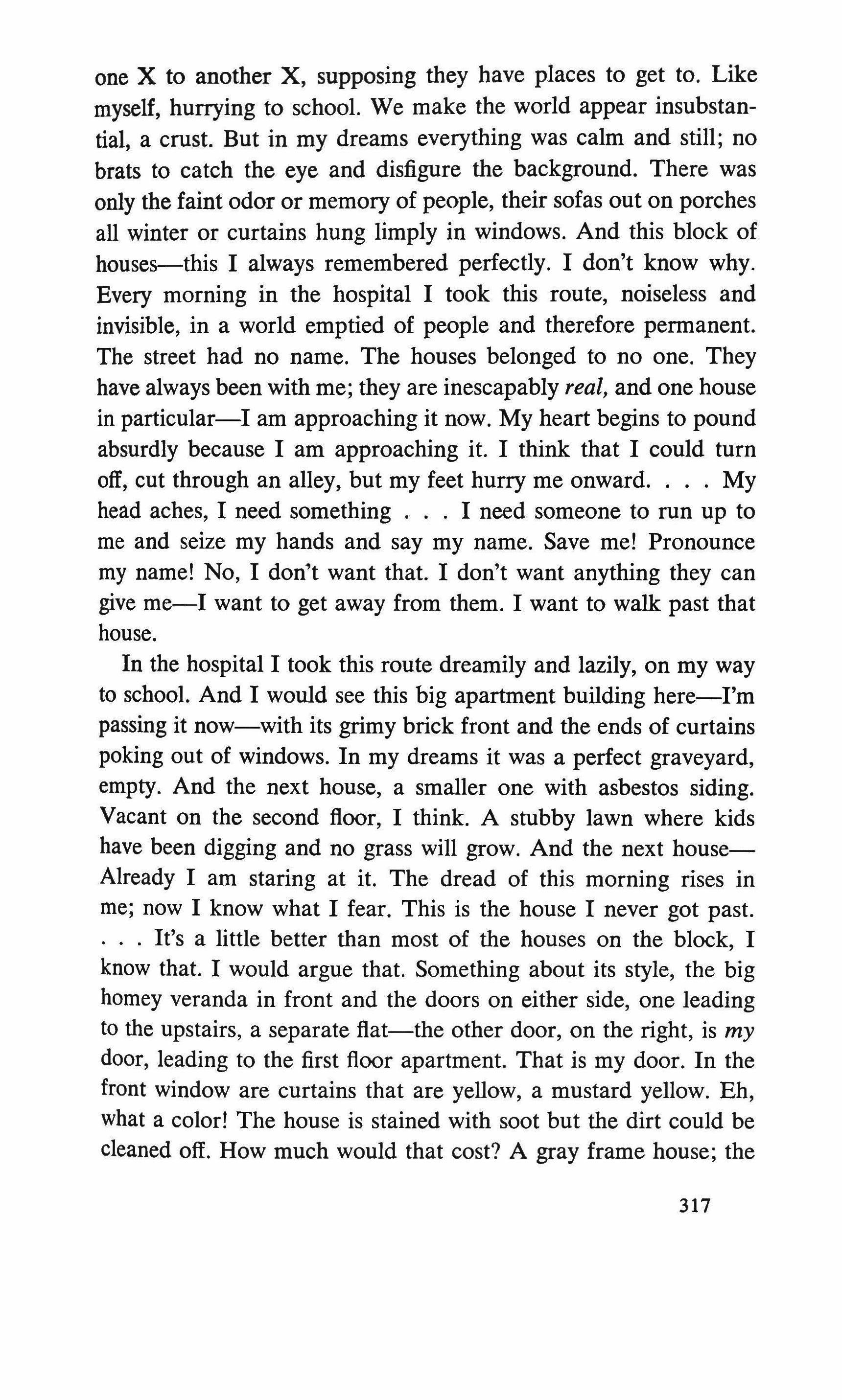
one X to another X, supposing they have places to get to. Like myself, hurrying to school. We make the world appear insubstantial, a crust. But in my dreams everything was calm and still; no brats to catch the eye and disfigure the background. There was only the faint odor or memory of people, their sofas out on porches all winter or curtains hung limply in windows. And this block of houses-this I always remembered perfectly. I don't know why. Every morning in the hospital I took this route, noiseless and invisible, in a world emptied of people and therefore permanent. The street had no name. The houses belonged to no one. They have always been with me; they are inescapably real, and one house in particular-I am approaching it now. My heart begins to pound absurdly because I am approaching it. I think that I could turn off, cut through an alley, but my feet hurry me onward. My head aches, I need something I need someone to run up to me and seize my hands and say my name. Save me! Pronounce my name! No, I don't want that. I don't want anything they can give me-I want to get away from them. I want to walk past that house.
In the hospital I took this route dreamily and lazily, on my way to school. And I would see this big apartment building here-I'm passing it now-with its grimy brick front and the ends of curtains poking out of windows. In my dreams it was a perfect graveyard, empty. And the next house, a smaller one with asbestos siding. Vacant on the second floor, I think. A stubby lawn where kids have been digging and no grass will grow. And the next houseAlready I am staring at it. The dread of this morning rises in me; now I know what I fear. This is the house I never got past. It's a little better than most of the houses on the block, I know that. I would argue that. Something about its style, the big homey veranda in front and the doors on either side, one leading to the upstairs, a separate flat-the other door, on the right, is my door, leading to the first floor apartment. That is my door. In the front window are curtains that are yellow, a mustard yellow. Eh, what a color! The house is stained with soot but the dirt could be cleaned off. How much would that cost? A gray frame house; the 317
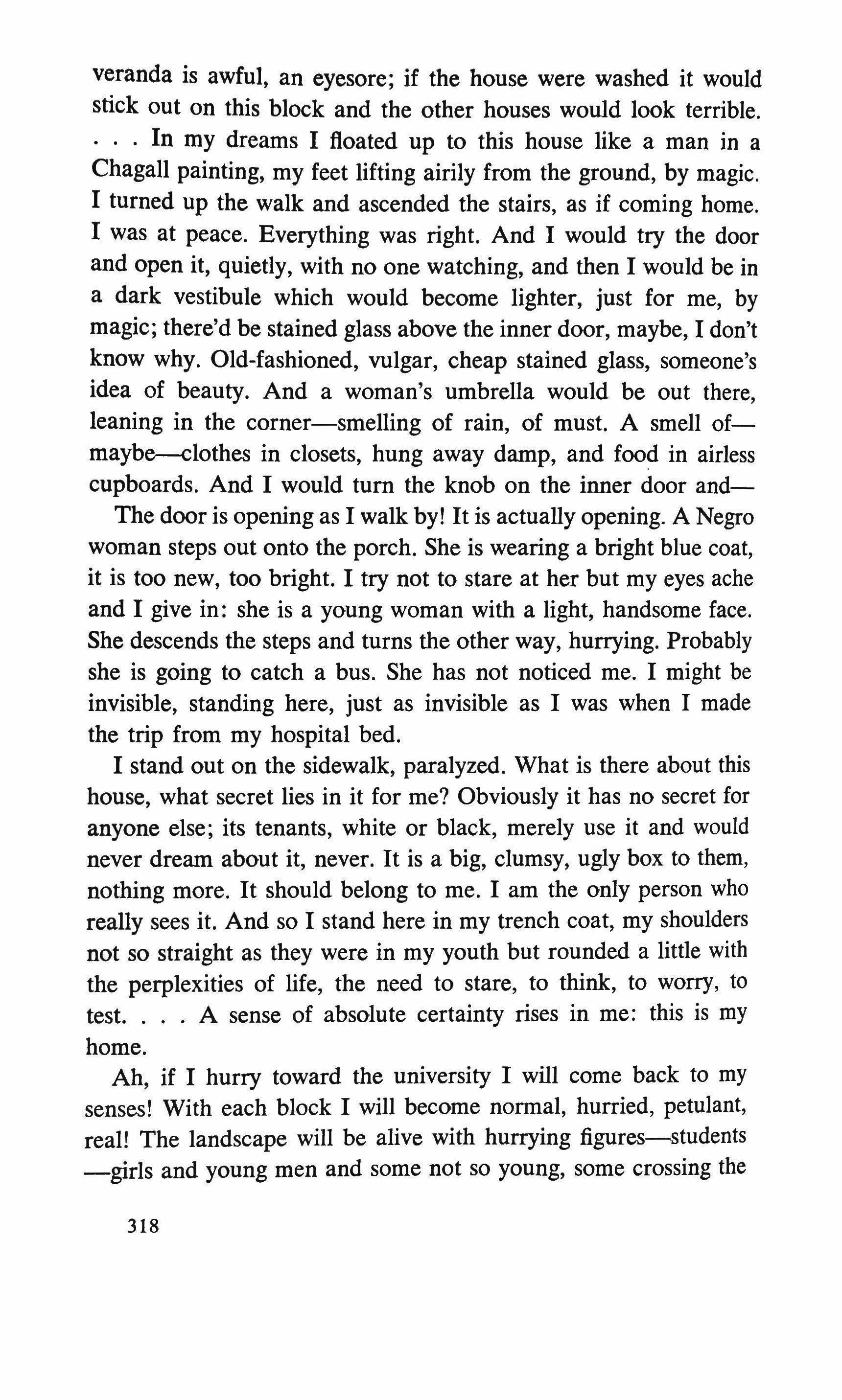
veranda is awful, an eyesore; if the house were washed it would stick out on this block and the other houses would look terrible. In my dreams I floated up to this house like a man in a Chagall painting, my feet lifting airily from the ground, by magic. I turned up the walk and ascended the stairs, as if coming home. I was at peace. Everything was right. And I would try the door and open it, quietly, with no one watching, and then I would be in a dark vestibule which would become lighter, just for me, by magic; there'd be stained glass above the inner door, maybe, I don't know why. Old-fashioned, vulgar, cheap stained glass, someone's idea of beauty. And a woman's umbrella would be out there, leaning in the corner-smelling of rain, of must. A smell ofmaybe--clothes in closets, hung away damp, and food in airless cupboards. And I would turn the knob on the inner door and-
The door is opening as I walk by! It is actually opening. A Negro woman steps out onto the porch. She is wearing a bright blue coat, it is too new, too bright. I try not to stare at her but my eyes ache and I give in: she is a young woman with a light, handsome face. She descends the steps and turns the other way, hurrying. Probably she is going to catch a bus. She has not noticed me. I might be invisible, standing here, just as invisible as I was when I made the trip from my hospital bed.
I stand out on the sidewalk, paralyzed. What is there about this house, what secret lies in it for me? Obviously it has no secret for anyone else; its tenants, white or black, merely use it and would never dream about it, never. It is a big, clumsy, ugly box to them, nothing more. It should belong to me. I am the only person who really sees it. And so I stand here in my trench coat, my shoulders not so straight as they were in my youth but rounded a little with the perplexities of life, the need to stare, to think, to worry, to test A sense of absolute certainty rises in me: this is my home.
Ah, if I hurry toward the university I will come back to my senses! With each block I will become normal, hurried, petulant, real! The landscape will be alive with hurrying figures-students -girls and young men and some not so young, some crossing the 318

street, some walking in clumps, some alone, some on bicycles dodging traffic. No one will recognize me, but still I will come back to my senses, to my real self; and if it happens that someone recognizes me, I will smile and return his greeting. I make a conscious effort to smile. "We spent all that money straightening your teeth and now you don't smile," my mother used to complain when I still lived at home, a teenager trapped at home. I learned that if I smiled at the right moment I would have friends, even girls; this worked. It was an effort for me to select the right moment, to unspring my smile just at the right moment, but I learned. And so I made friends, won girls, even won a wife. Now I smile but not always at the right moment a little ahead of time, occasionally a little too late. My problem is that I am always distracted from what is humanly crucial by this other misty, unhuman world, which peeks out from behind the solid world and makes its demands upon me: this is your true home, it insists. It is as cunning and irresistible as the young girls, the sophomores in my laboratory sections who dimple and falter in their wooing of me, trying to get passing grades. Sometimes I think of what a relief it would be to give in to them, to give them anything they want, to X them out as human beings and forget them! What relief to give in to the promises of that other world, which is as impersonal and silent and precise as the chemical formulas that have made up my life for so long-
I am still standing here, on the sidewalk. The Negro woman is gone; she won't be back. I am alone. Already I can smell the vestibule and feel that inner doorknob-s-cold and a little damp, with a metallic odor-and once inside the house I would be in a kind of living room or parlor, with a worn, shabby rug, the furniture is cheap-bright blue sofa, maybe-and farther back there is the kitchen with the linoleum worn out in front of the sink and the stove. This is all clear. Then off to the side there is a bedroom -a bedspread with a flower print, maybe. Something chintzy and bright. A clock ticking somewhere. It is quiet, peaceful. I lie on the bed and I am home.
It is raining. When did it start raining? I am damp any-
319
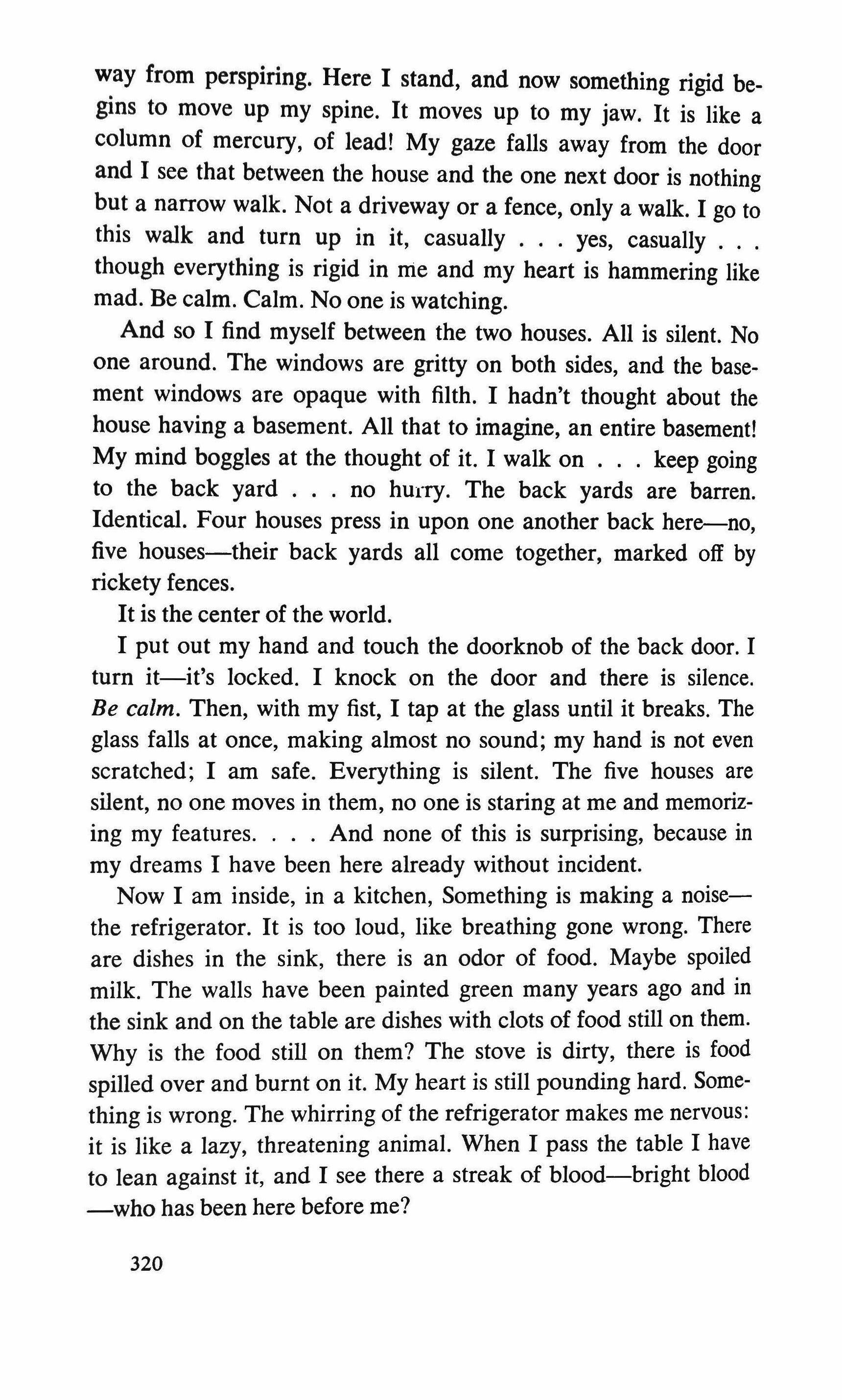
way from perspiring. Here I stand, and now something rigid begins to move up my spine. It moves up to my jaw. It is like a column of mercury, of lead! My gaze falls away from the door and I see that between the house and the one next door is nothing but a narrow walk. Not a driveway or a fence, only a walk. I go to this walk and turn up in it, casually yes, casually though everything is rigid in me and my heart is hammering like mad. Be calm. Calm. No one is watching.
And so I find myself between the two houses. All is silent. No one around. The windows are gritty on both sides, and the basement windows are opaque with filth. I hadn't thought about the house having a basement. All that to imagine, an entire basement! My mind boggles at the thought of it. I walk on keep going to the back yard no hurry. The back yards are barren. Identical. Four houses press in upon one another back here--no, five houses-their back yards all come together, marked off by rickety fences.
It is the center of the world.
I put out my hand and touch the doorknob of the back door. I turn it-it's locked. I knock on the door and there is silence. Be calm. Then, with my fist, I tap at the glass until it breaks. The glass falls at once, making almost no sound; my hand is not even scratched; I am safe. Everything is silent. The five houses are silent, no one moves in them, no one is staring at me and memorizing my features. And none of this is surprising, because in my dreams I have been here already without incident.
Now I am inside, in a kitchen, Something is making a noisethe refrigerator. It is too loud, like breathing gone wrong. There are dishes in the sink, there is an odor of food. Maybe spoiled milk. The walls have been painted green many years ago and in the sink and on the table are dishes with clots of food still on them.
Why is the food still on them? The stove is dirty, there is food spilled over and burnt on it. My heart is still pounding hard. Something is wrong. The whirring of the refrigerator makes me nervous: it is like a lazy, threatening animal. When I pass the table I have to lean against it, and I see there a streak of blood-bright blood -who has been here before me?
320

Off from the kitchen is a closet without a door; junk piled high in it. Then a living room. Something is wrong the living room does not look familiar. There is a bed in it, a sofa bed. I would never have imagined that. Sheets and blankets lie on the floor. An ashtray of black plastic with cigarette butts in it, some of them spilled over onto the floor Beer cans Coke bottles
A television set with a Coke bottle on it. On the wall, a mirror with an ornate gilt frame, a five-and-ten store mirror, in which I can almost see myself. Better stand back out of sight. My head reels. Am I in the wrong house after all? This house does not have the right smell. Something is wrong. My hand stings and I notice that it is bleeding, after all, from a long scratch across the knuckles.
A small bathroom-more of that green paint. It's like a green sky, pressing in. The bathroom is very dirty. Hairs in the sink, scum, rings of dirt; better not look any further. Then the bedroom and more green walls, an odor that is musty and green and unaired. There is the odor of food in here too. The shades are drawn crookedly, this cramped little room is sinister and secretive. What has happened in this room? Have the people who live here changed this room? There are clothes scattered on the floor, hung over the back of a chair-a woman's white slip, a woman's yellow sweater. A closet without a door: inside a jumble of clothes. A man's shirt and a pair of dark green trousers are hanging in there. A shiny pink robe lies across the bed, on top of the jumble of sheets and the twisted blanket. The evidence of life is everywhere but it is diminished and sordid, as if all these items were the relics of dead people, tracks they've left behind on their way to die. And there is that strange musty odor too, which was the odor of the hospital I was in and the odor of my body, though it was washed often.
On a cheap dresser there are bottles of cosmetics and perfume. I pick up one of the bottles-"Moonlight"-and unscrew the cap. A bright, shrill smell. It reminds me of no women I have known. The top of the dresser is dirty, flecked with powder. And hairsdark, curly, kinky hairs. Of course. Hairs everywhere. My heart is pounding helplessly. I open the drawers-more clothes, under-
321

clothes. Men's socks. I pull them out and let them fall to the floor.
Something is rising in me, my heart seems to be rising, trying to force its way up into my throat. I am bitter with disappointment. What is this place, what has happened here? Is this house no special house after all? Have I broken into the wrong house? I throw things-on the floor without bothering to look at them. One of the drawers falls out onto my foot.
My face is burning. Heavily, I sit on the edge of the bed. What to do? What has happened to me? I lie back onto the pillow, adjusting it beneath my head. I lie there, motionless. There is nothing. Everything is silent. And now it occurs to me that I have at last entered the other world: I have passed over into that secret world. And what is it, really? I am in it, lying on a bed in it, and yet I don't know what it is. This house is my entrance into that other world, which has been hidden for so long behind all familiar odors and shapes-and in this world nothing is familiar, nothing is safe. I think to myself: Now your world is vast, your horizons are flattened out forever. There are no horizons. You can never leave this world because there are no horizons, no boundaries, no end to it.
I lie there quietly, at peace.
Something wakes me-I am lying on my back, the bedclothes beneath me, my head still carefully on the pillow. A room with green walls! I know at once where I am. And then I hear a sound again: a door closing. My heart continues to beat as it must have while I slept, slow and ponderous, cunning. The outer door is closed now and someone is at the second door, putting a key in the lock. I can imagine the woman in the blue coat. I can imagine her seeing me, her eyes leaping over here to me. She will take off her coat, staring at me, and there will be something beautiful about her strong hands and fingers.
The door is opening to the living room. I sit up. The woman is coming-she walks heavily. She must be walking on her heels, tired or angry. I go to the closet and stand inside, hunched over, in the dark from here I can see into the kitchen but there is nothing there then a shadowy image of the woman moves against my eye. Should I call out to her, should I announce my-
322
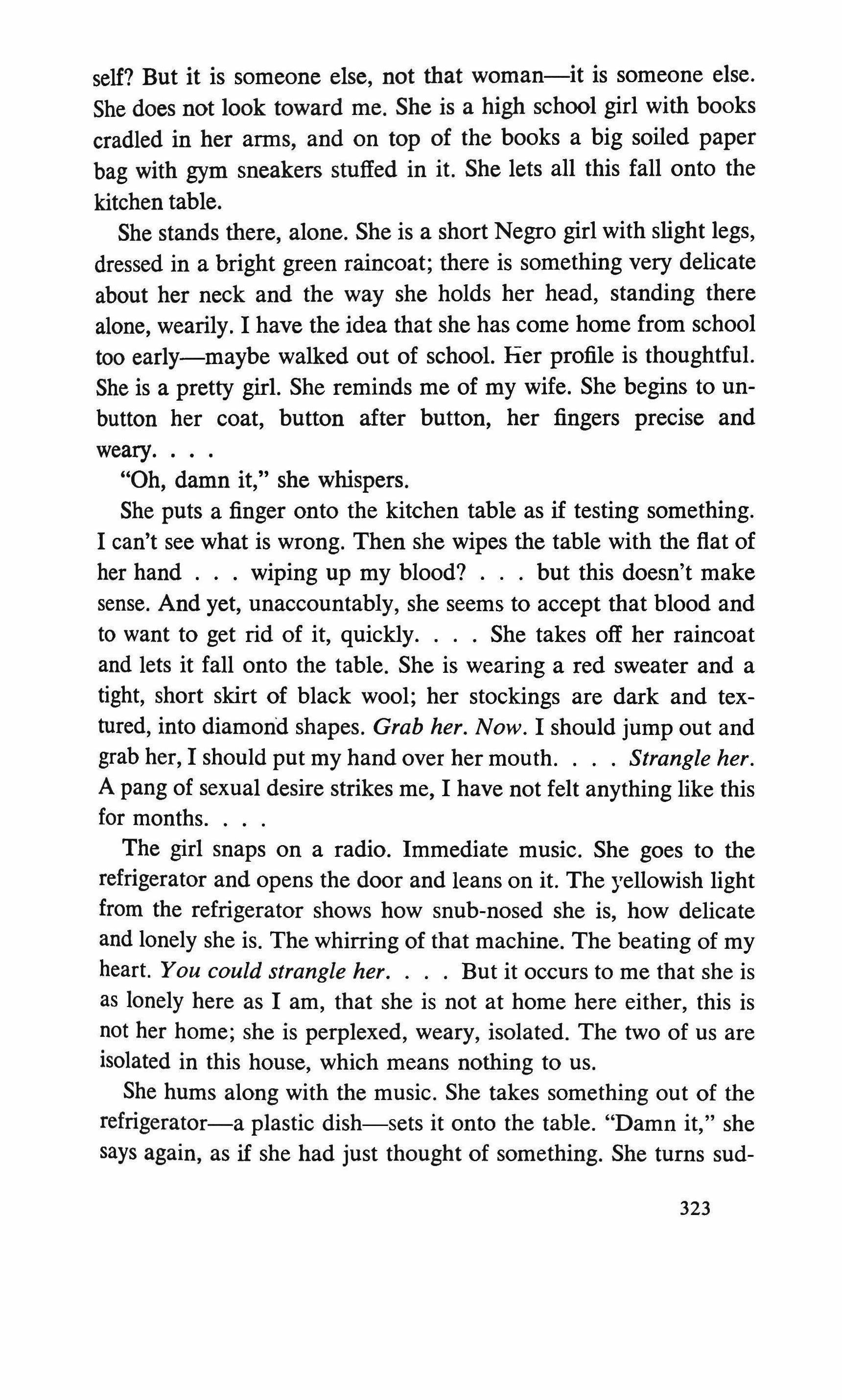
self? But it is someone else, not that woman-it is someone else. She does not look toward me. She is a high school girl with books cradled in her arms, and on top of the books a big soiled paper bag with gym sneakers stuffed in it. She lets all this fall onto the kitchen table.
She stands there, alone. She is a short Negro girl with slight legs, dressed in a bright green raincoat; there is something very delicate about her neck and the way she holds her head, standing there alone, wearily. I have the idea that she has come home from school too early-maybe walked out of school. Her profile is thoughtful. She is a pretty girl. She reminds me of my wife. She begins to unbutton her coat, button after button, her fingers precise and weary
"Oh, damn it," she whispers.
She puts a finger onto the kitchen table as if testing something. I can't see what is wrong. Then she wipes the table with the flat of her hand wiping up my blood? but this doesn't make sense. And yet, unaccountably, she seems to accept that blood and to want to get rid of it, quickly. She takes off her raincoat and lets it fall onto the table. She is wearing a red sweater and a tight, short skirt of black wool; her stockings are dark and textured, into diamond shapes. Grab her. Now. I should jump out and grab her, I should put my hand over her mouth Strangle her. A pang of sexual desire strikes me, I have not felt anything like this for months
The girl snaps on a radio. Immediate music. She goes to the refrigerator and opens the door and leans on it. The yellowish light from the refrigerator shows how snub-nosed she is, how delicate and lonely she is. The whirring of that machine. The beating of my heart. You could strangle her. But it occurs to me that she is as lonely here as I am, that she is not at home here either, this is not her home; she is perplexed, weary, isolated. The two of us are isolated in this house, which means nothing to us.
She hums along with the music. She takes something out of the refrigerator-a plastic dish-sets it onto the table. "Damn it," she says again, as if she had just thought of something. She turns sud323
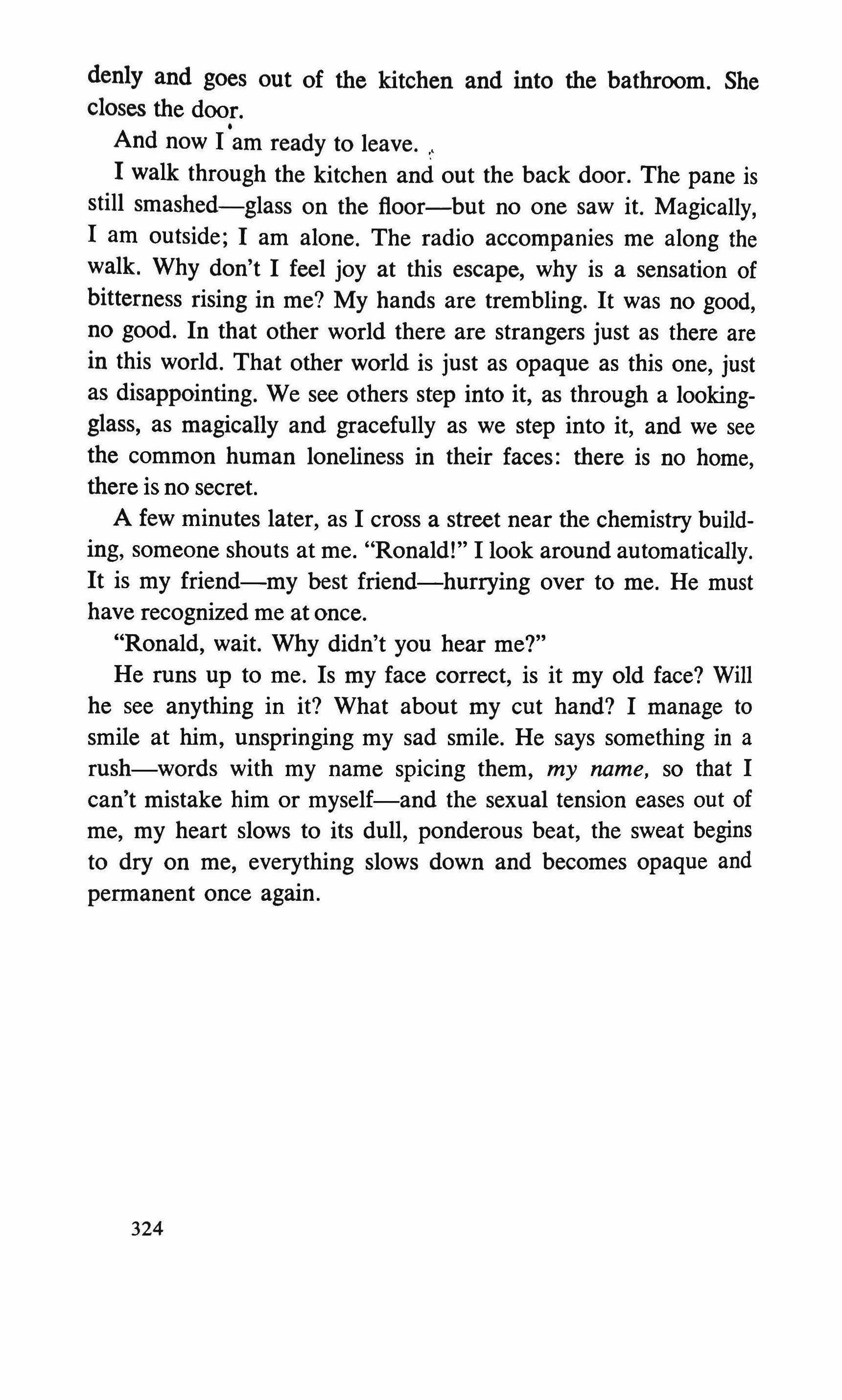
denly and goes out of the kitchen and into the bathroom. She closes the door
And now I am ready to leave. :'
I walk through the kitchen and out the back door. The pane is still smashed-glass on the floor-but no one saw it. Magically, I am outside; I am alone. The radio accompanies me along the walk. Why don't I feel joy at this escape, why is a sensation of bitterness rising in me? My hands are trembling. It was no good, no good. In that other world there are strangers just as there are in this world. That other world is just as opaque as this one, just as disappointing. We see others step into it, as through a lookingglass, as magically and gracefully as we step into it, and we see the common human loneliness in their faces: there is no home, there is no secret.
A few minutes later, as I cross a street near the chemistry building, someone shouts at me. "Ronald!" I look around automatically. It is my friend-my best friend-hurrying over to me. He must have recognized me at once.
"Ronald, wait. Why didn't you hear me?"
He runs up to me. Is my face correct, is it myoId face? Will he see anything in it? What about my cut hand? I manage to smile at him, unspringing my sad smile. He says something in a rush-words with my name spicing them, my name, so that I can't mistake him or myself-and the sexual tension eases out of me, my heart slows to its dull, ponderous beat, the sweat begins to dry on me, everything slows down and becomes opaque and permanent once again.
324
Three love songs for U.P.I.
found poem with grafts
1
The army told congressmen yesterday
The army told congressmen yesterday it has enough of a single nerve gas in its chemical biological warfare arsenal to kill the world's population many times over.
But Russia, one lawmaker reported, may harbor an even more lethal capability in this little discussed and highly secret field.
The substance is labeled by the army "G.B." and the world's population is estimated at around 3.4 billion.
Rep. Robert L. F. Sikes, D-Fla., said he thinks the U.S. is not doing enough in the field. Sikes said it is estimated the Russians have "seven to eight times" the capability of the United States.
The U.S. has enough "G.B." to kill the world's estimated population about 30 times. Russia, on the other hand, has enough to kill the world's estimated population, say, 160 to 190 times.
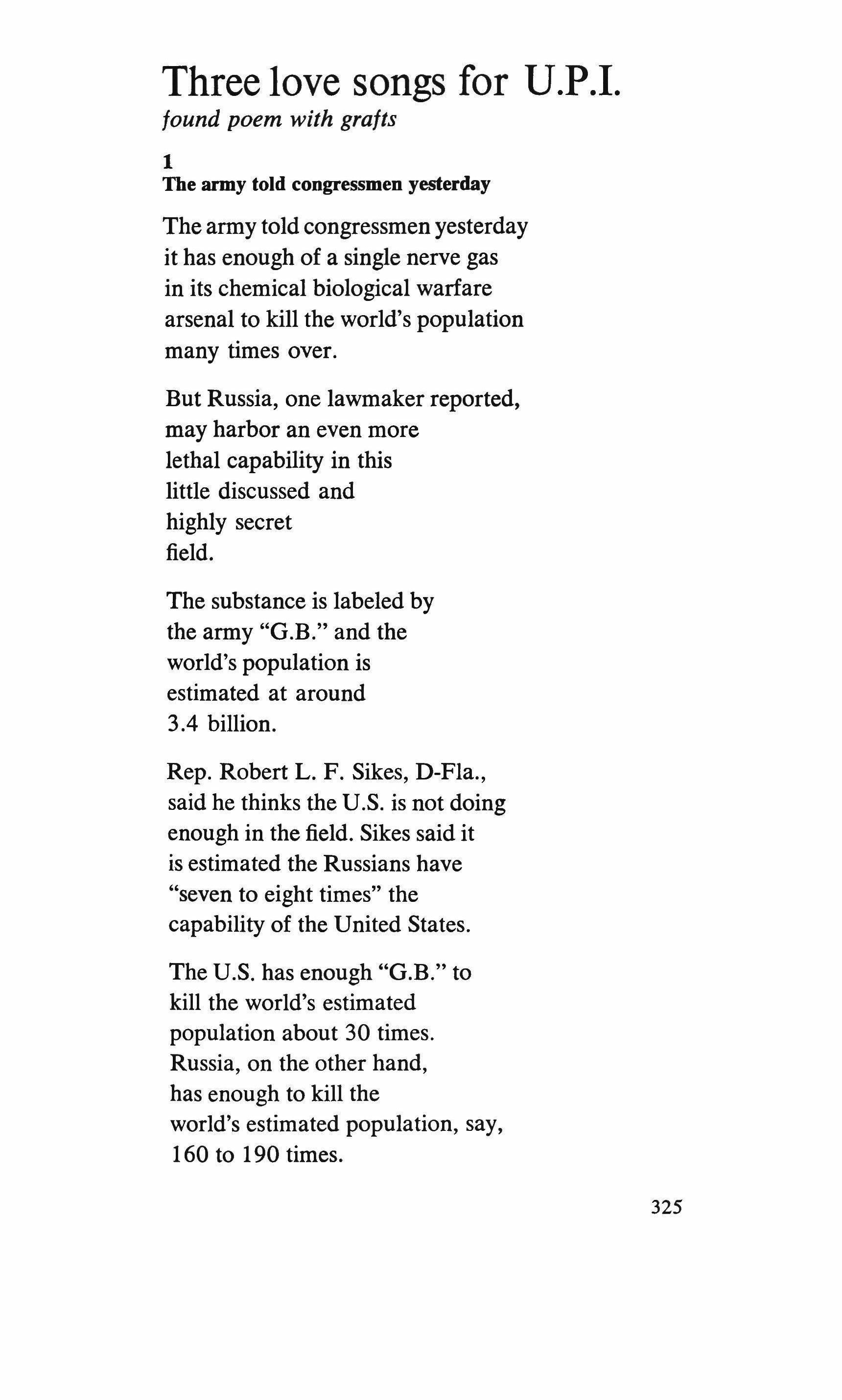
325

A hippie type amateur taxidermist was ordered held without bail on murder charges yesterday in the mutilation deaths of two of four women whose bodies were found in shallow graves in this Cape Cod community. The hearts were missing from the dismembered bodies.
Even as police searched the scrub pine studded sandy wasteland for any more bodies, Antone Costa, 24, a currently unemployed sometimes carpenter with a literary fondness for existentialist authors, was arraigned in nearby Provincetown, a summer artists' mecca and hippie hangout.
After his court appearance which attracted an overflow crowd including a number of hippies, Costa was committed to Bridgewater State Hospital for 35 days of observation. A plea of innocent to two murder counts was entered on his behalf.
Costa, short and slight, with mustache, sideburns and semi-mod hair style, wearing "granny" glasses, was taken to the courthouse after Dist. Atty. Edmund S. Dinis disclosed grisly details in the case.
About the hearts we'll say: I ate them for my dinner.
%
A hippie type amateur
326
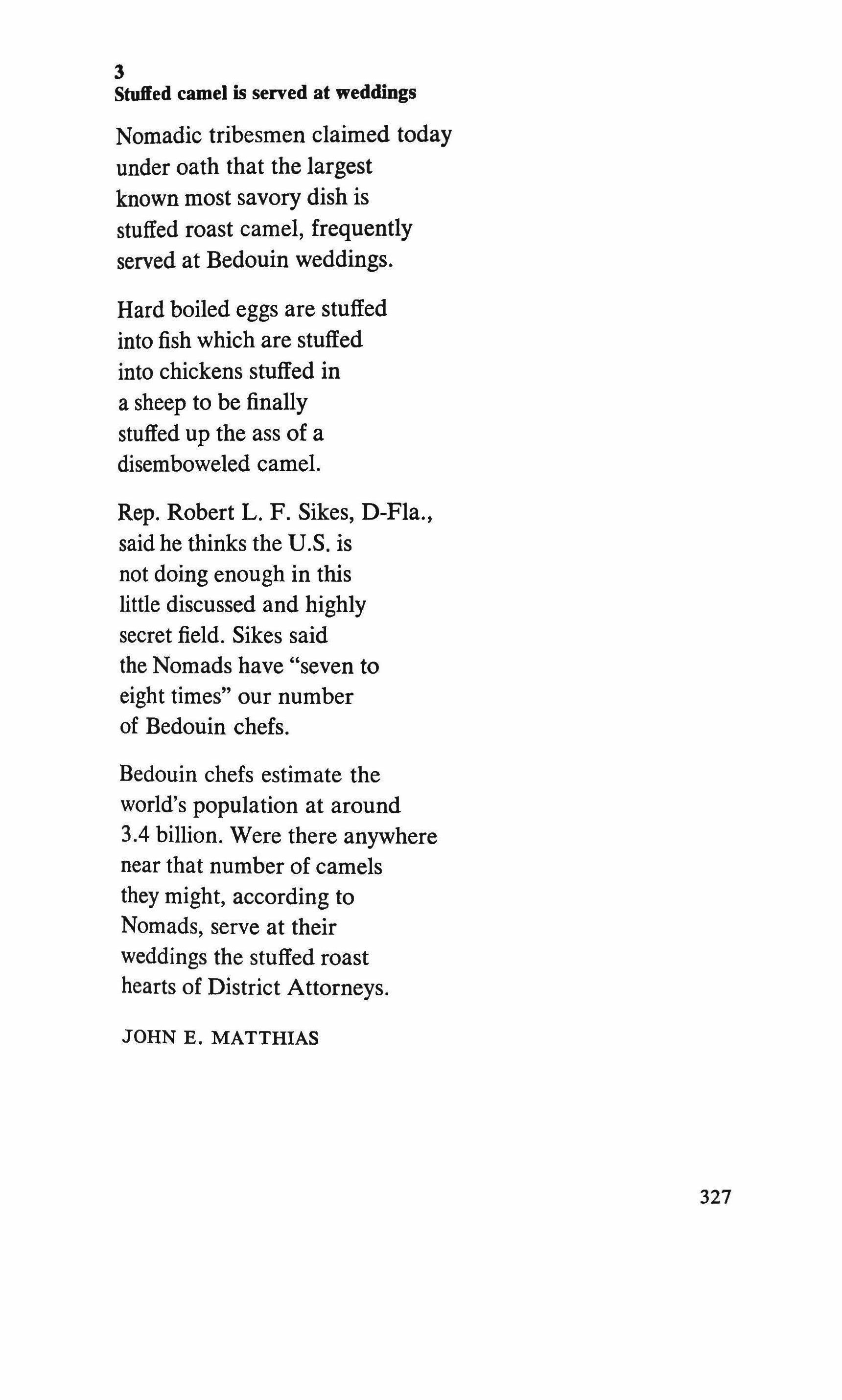
Stuffed camel is served at weddings
Nomadic tribesmen claimed today under oath that the largest known most savory dish is stuffed roast camel, frequently served at Bedouin weddings.
Hard boiled eggs are stuffed into fish which are stuffed into chickens stuffed in a sheep to be finally stuffed up the ass of a disemboweled camel.
Rep. Robert L. F. Sikes, D-Fla., said he thinks the U.S. is not doing enough in this little discussed and highly secret field. Sikes said the Nomads have "seven to eight times" our number of Bedouin chefs.
Bedouin chefs estimate the world's population at around 3.4 billion. Were there anywhere near that number of camels they might, according to Nomads, serve at their weddings the stuffed roast hearts of District Attorneys.
JOHN E. MATTHIAS
3
327
Je YVES VELAN
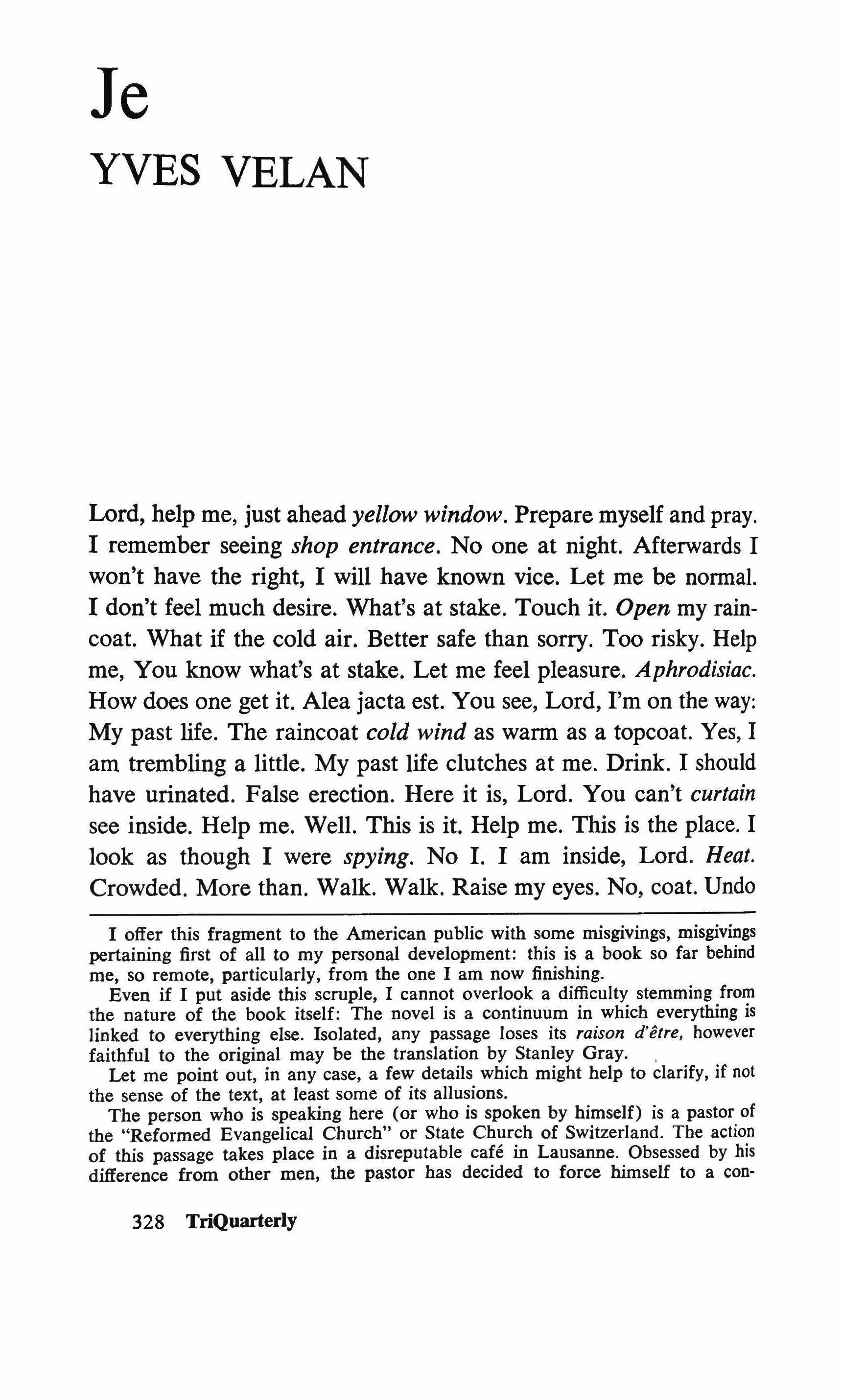
Lord, help me, just ahead yellow window. Prepare myself and pray. I remember seeing shop entrance. No one at night. Afterwards I won't have the right, I will have known vice. Let me be normal. I don't feel much desire. What's at stake. Touch it. Open my raincoat. What if the cold air. Better safe than sorry. Too risky. Help me, You know what's at stake. Let me feel pleasure. Aphrodisiac. How does one get it. Alea jacta est. You see, Lord, I'm on the way: My past life. The raincoat cold wind as warm as a topcoat. Yes, I am trembling a little. My past life clutches at me. Drink. I should have urinated. False erection. Here it is, Lord. You can't curtain see inside. Help me. Well. This is it. Help me. This is the place. I look as though I were spying. No I. I am inside, Lord. Heat. Crowded. More than. Walk. Walk. Raise my eyes. No, coat. Undo
I offer this fragment to the American public with some misgivings, misgivings pertaining first of all to my personal development: this is a book so far behind me, so remote, particularly, from the one I am now finishing.
Even if I put aside this scruple, I cannot overlook a difficulty stemming from the nature of the book itself: The novel is a continuum in which everything is linked to everything else. Isolated, any passage loses its raison d'etre, however faithful to the original may be the translation by Stanley Gray.
Let me point out, in any case, a few details which might help to clarify, if not the sense of the text, at least some of its allusions.
The person who is speaking here (or who is spoken by himself) is a pastor of the "Reformed Evangelical Church" or State Church of Switzerland. The action of this passage takes place in a disreputable cafe in Lausanne. Obsessed by his difference from other men, the pastor has decided to force himself to a con-
328 TriQuarterly
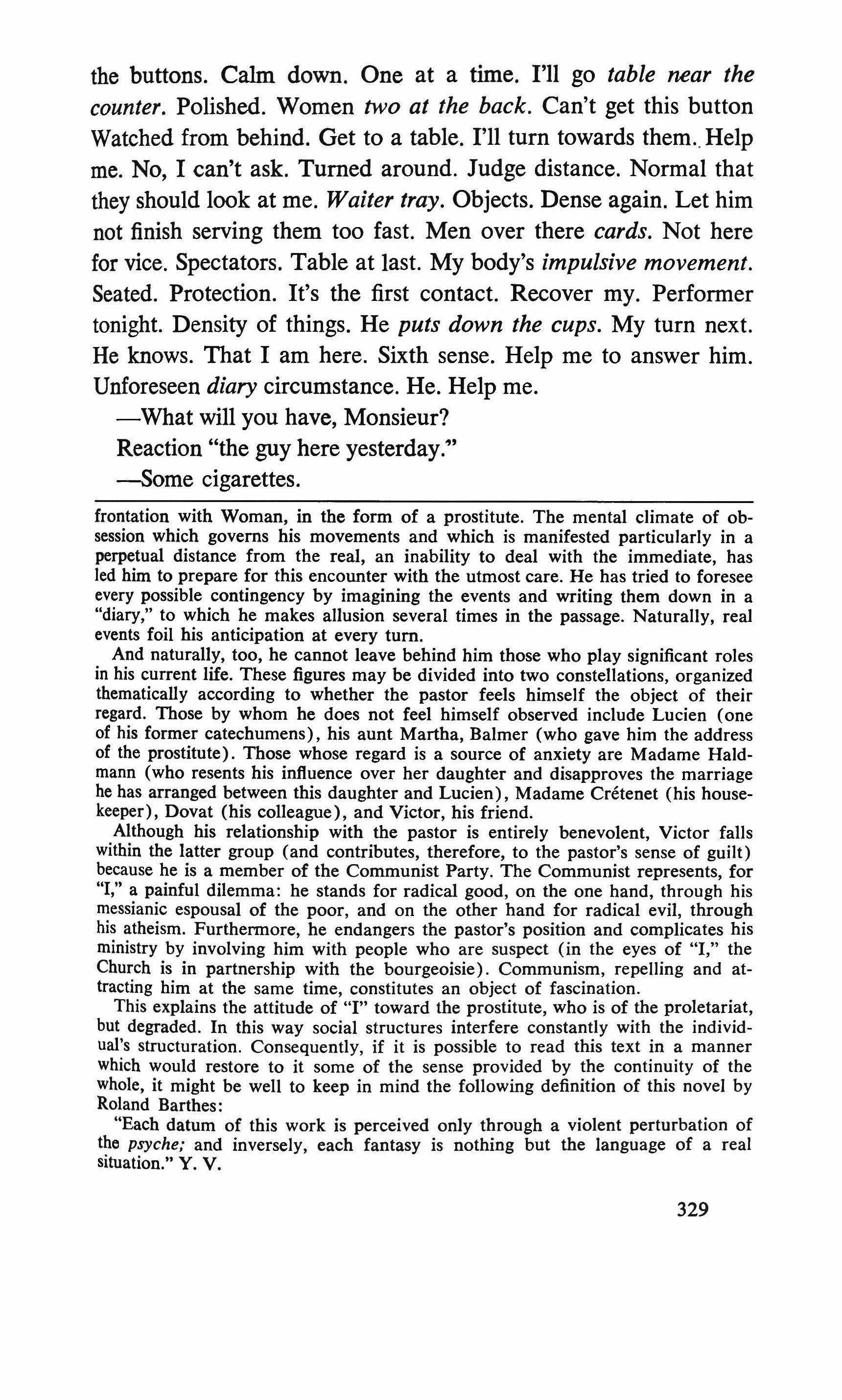
the buttons. Calm. down. One at a time. I'll go table near the counter. Polished. Women two at the back. Can't get this button Watched from behind. Get to a table. I'll turn towards them Help me. No, I can't ask. Turned around. Judge distance. Normal that they should look at me. Waiter tray. Objects. Dense again. Let him not finish serving them too fast. Men over there cards. Not here for vice. Spectators. Table at last. My body's impulsive movement. Seated. Protection. It's the first contact. Recover my. Performer tonight. Density of things. He puts down the cups. My turn next. He knows. That I am here. Sixth sense. Help me to answer him. Unforeseen diary circumstance. He. Help me.
-What will you have, Monsieur?
Reaction "the guy here yesterday."
-Some cigarettes.
frontation with Woman, in the form of a prostitute. The mental climate of obsession which governs his movements and which is manifested particularly in a perpetual distance from the real, an inability to deal with the immediate, has led him to prepare for this encounter with the utmost care. He has tried to foresee every possible contingency by imagining the events and writing them down in a "diary," to which he makes allusion several times in the passage. Naturally, real events foil his anticipation at every turn.
And naturally, too, he cannot leave behind him those who play significant roles in his current life. These figures may be divided into two constellations, organized thematically according to whether the pastor feels himself the object of their regard. Those by whom he does not feel himself observed include Lucien (one of his former catechumens), his aunt Martha, Balmer (who gave him the address of the prostitute). Those whose regard is a source of anxiety are Madame Haldmann (who resents his influence over her daughter and disapproves the marriage he has arranged between this daughter and Lucien), Madame Cretenet (his housekeeper), Dovat (his colleague), and Victor, his friend.
Although his relationship with the pastor is entirely benevolent, Victor falls within the latter group (and contributes, therefore, to the pastor's sense of guilt) because he is a member of the Communist Party. The Communist represents, for "I," a painful dilemma: he stands for radical good, on the one hand, through his messianic espousal of the poor, and on the other hand for radical evil, through his atheism. Furthermore, he endangers the pastor's position and complicates his ministry by involving him with people who are suspect (in the eyes of "1," the Church is in partnership with the bourgeoisie). Communism, repelling and attracting him at the same time, constitutes an object of fascination.
This explains the attitude of "I" toward the prostitute, who is of the proletariat, but degraded. In this way social structures interfere constantly with the individual's structuration, Consequently, if it is possible to read this text in a manner which would restore to it some of the sense provided by the continuity of the whole, it might be well to keep in mind the following definition of this novel by Roland Barthes:
"Each datum of this work is perceived only through a violent perturbation of the psyche; and inversely, each fantasy is nothing but the language of a real situation." Y. V.
329

"Disguised.
-All right, but
-A double marc and some cigarettes.
-What brand? Turkish. "Bourgeois."
-Gauloises.
Bourgeois. Victor. "Bleues.
Recognized. "Disguised." Tartuffe. Stretch out my legs. On stage. No hiding place. Everyone on show.-One pack of Gauloises, one double marc. My order. "To get up his nerve." And I'm going to have to. Help me to question him, without You 1 will never have the nerve. If one of those two. Neither pretty nor ugly. "I don't care much for his looks." I've got to. Things going too diary quickly.
-Here you are.
-Thank you, I'll settle right now. "To be ready."
-For the double marc, one franc sixty, ninety-five for the cigarettes, two fifty-five.
-Here you are. No, keep the change. Too little 45 centimes for me to ask him. The whole I franc 45 remaining. Precisely. 1 was letting him know. No fakery. Look like the "lecherous bourgeois, scared, big spender, scouting around for." Call him back. Help me. Matches. Bothered for nothing. Drink at one gulp. Give me the nerve to question him. Not so many looking. They're going back to. Saw my signal. Help me. Plunge ahead. Matches.
-I'm out of matches. And another double, please.
Five centimes for the matches, plus one sixty. Prepare two 2 franc sums. Proof that "he didn't have the nerve the first time." Blond. Balmer. But tough. Archangel.-One double marc, two matchbooks. My order. "He's going to get loaded." Contempt. Tough. The proletariat like that. Judged. It's for the good that I. Worthy of you. He can contribute to vice. The proletariat always pure. Protected by contempt. To be normal. To rise out of the (lower) depths. He's back. 330
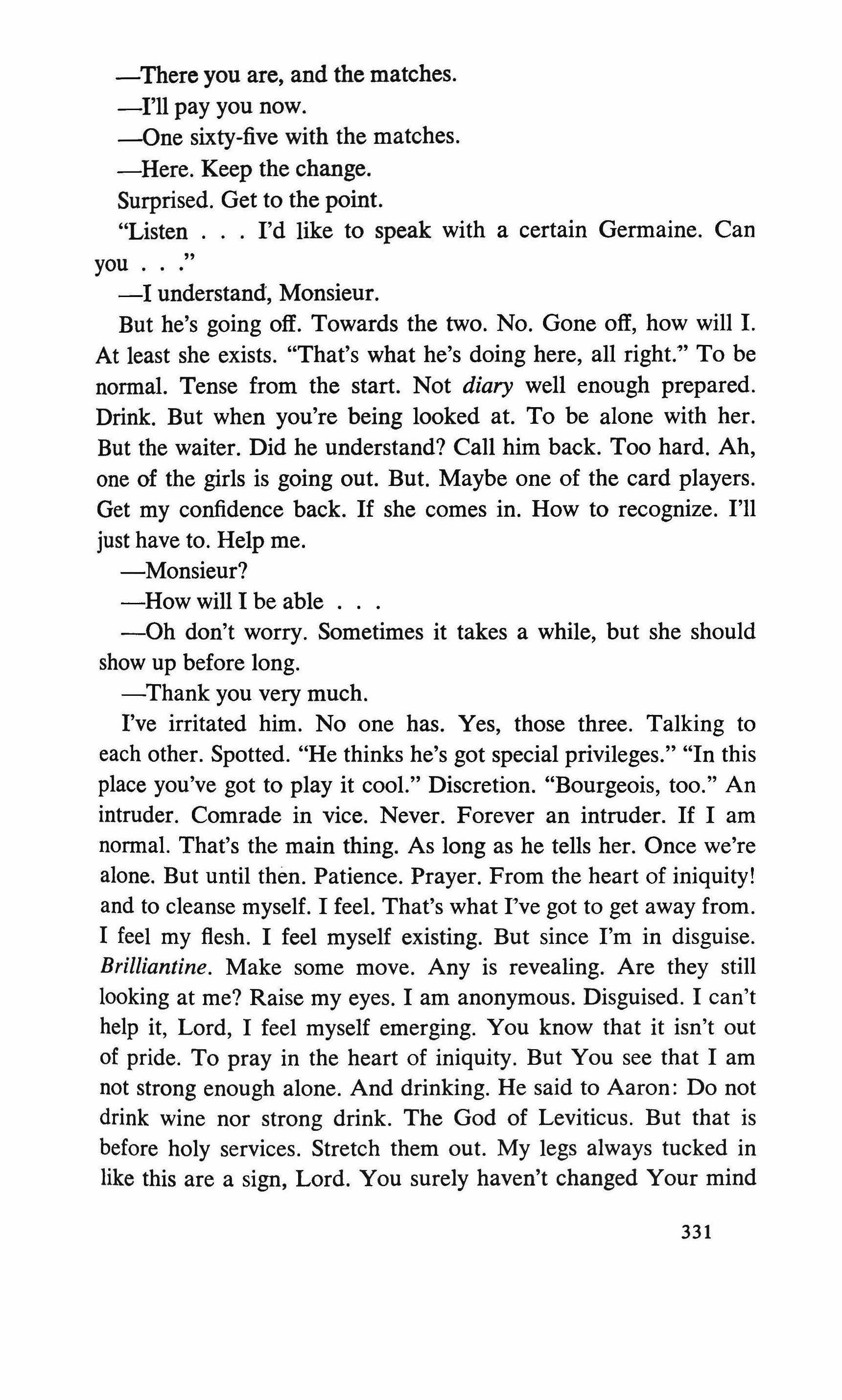
-There you are, and the matches.
-I'll pay you now.
-One sixty-five with the matches.
-Here. Keep the change.
Surprised. Get to the point.
"Listen I'd like to speak with a certain Germaine. Can you
-I understand, Monsieur.
But he's going off. Towards the two. No. Gone off, how will 1. At least she exists. "That's what he's doing here, all right." To be normal. Tense from the start. Not diary well enough prepared. Drink. But when you're being looked at. To be alone with her. But the waiter. Did he understand? Call him back. Too hard. Ah, one of the girls is going out. But. Maybe one of the card players. Get my confidence back. If she comes in. How to recognize. I'll just have to. Help me.
-Monsieur?
-How will I be able
-Oh don't worry. Sometimes it takes a while, but she should show up before long.
-Thank you very much.
I've irritated him. No one has. Yes, those three. Talking to each other. Spotted. "He thinks he's got special privileges." "In this place you've got to play it cool." Discretion. "Bourgeois, too." An intruder. Comrade in vice. Never. Forever an intruder. If I am normal. That's the main thing. As long as he tells her. Once we're alone. But until then. Patience. Prayer. From the heart of iniquity! and to cleanse myself. I feel. That's what I've got to get away from. I feel my flesh. I feel myself existing. But since I'm in disguise. Brilliantine. Make some move. Any is revealing. Are they still looking at me? Raise my eyes. I am anonymous. Disguised. I can't help it, Lord, I feel myself emerging. You know that it isn't out of pride. To pray in the heart of iniquity. But You see that I am not strong enough alone. And drinking. He said to Aaron: Do not drink wine nor strong drink. The God of Leviticus. But that is before holy services. Stretch them out. My legs always tucked in like this are a sign, Lord. You surely haven't changed Your mind
331
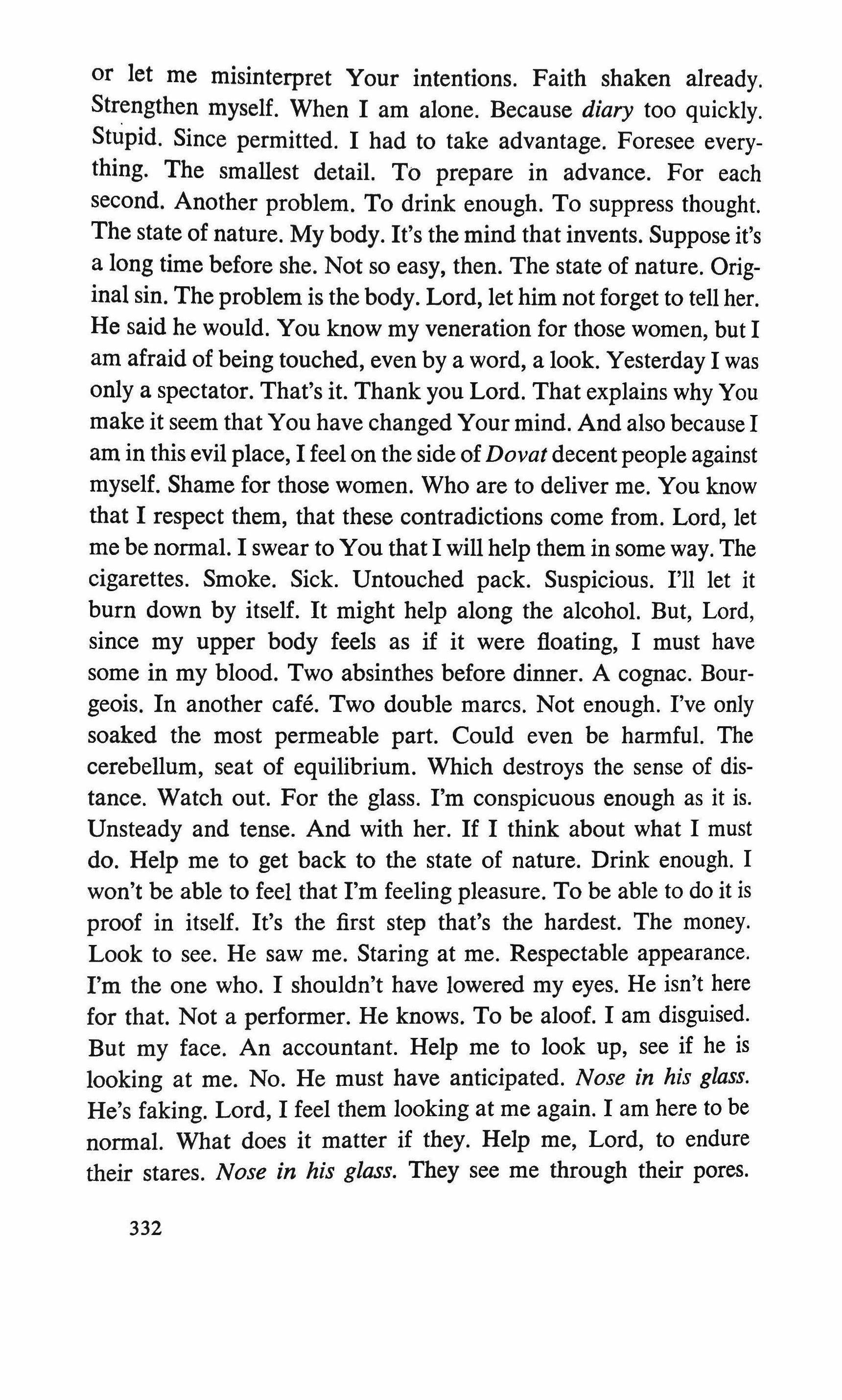
or let me misinterpret Your intentions. Faith shaken already. Strengthen myself. When I am alone. Because diary too quickly. Stupid. Since permitted. I had to take advantage. Foresee everything. The smallest detail. To prepare in advance. For each second. Another problem. To drink enough. To suppress thought. The state of nature. My body. It's the mind that invents. Suppose it's a long time before she. Not so easy, then. The state of nature. Original sin. The problem is the body. Lord, let him not forget to tell her. He said he would. You know my veneration for those women, but I am afraid of being touched, even by a word, a look. Yesterday I was only a spectator. That's it. Thank you Lord. That explains why You make it seem that You have changed Your mind. And also because I am in this evil place, I feel on the side of Dovat decentpeople against myself. Shame for those women. Who are to deliver me. You know that I respect them, that these contradictions come from. Lord, let me be normal. I swear to You that I will help them in some way. The cigarettes. Smoke. Sick. Untouched pack. Suspicious. I'll let it burn down by itself. It might help along the alcohol. But, Lord, since my upper body feels as if it were floating, I must have some in my blood. Two absinthes before dinner. A cognac. Bourgeois. In another cafe. Two double mares. Not enough. I've only soaked the most permeable part. Could even be harmful. The cerebellum, seat of equilibrium. Which destroys the sense of distance. Watch out. For the glass. I'm conspicuous enough as it is. Unsteady and tense. And with her. If I think about what I must do. Help me to get back to the state of nature. Drink enough. I won't be able to feel that I'm feeling pleasure. To be able to do it is proof in itself. It's the first step that's the hardest. The money. Look to see. He saw me. Staring at me. Respectable appearance. I'm the one who. I shouldn't have lowered my eyes. He isn't here for that. Not a performer. He knows. To be aloof. I am disguised. But my face. An accountant. Help me to look up, see if he is looking at me. No. He must have anticipated. Nose in his glass. He's faking. Lord, I feel them looking at me again. I am here to be normal. What does it matter if they. Help me, Lord, to endure their stares. Nose in his glass. They see me through their pores.
332
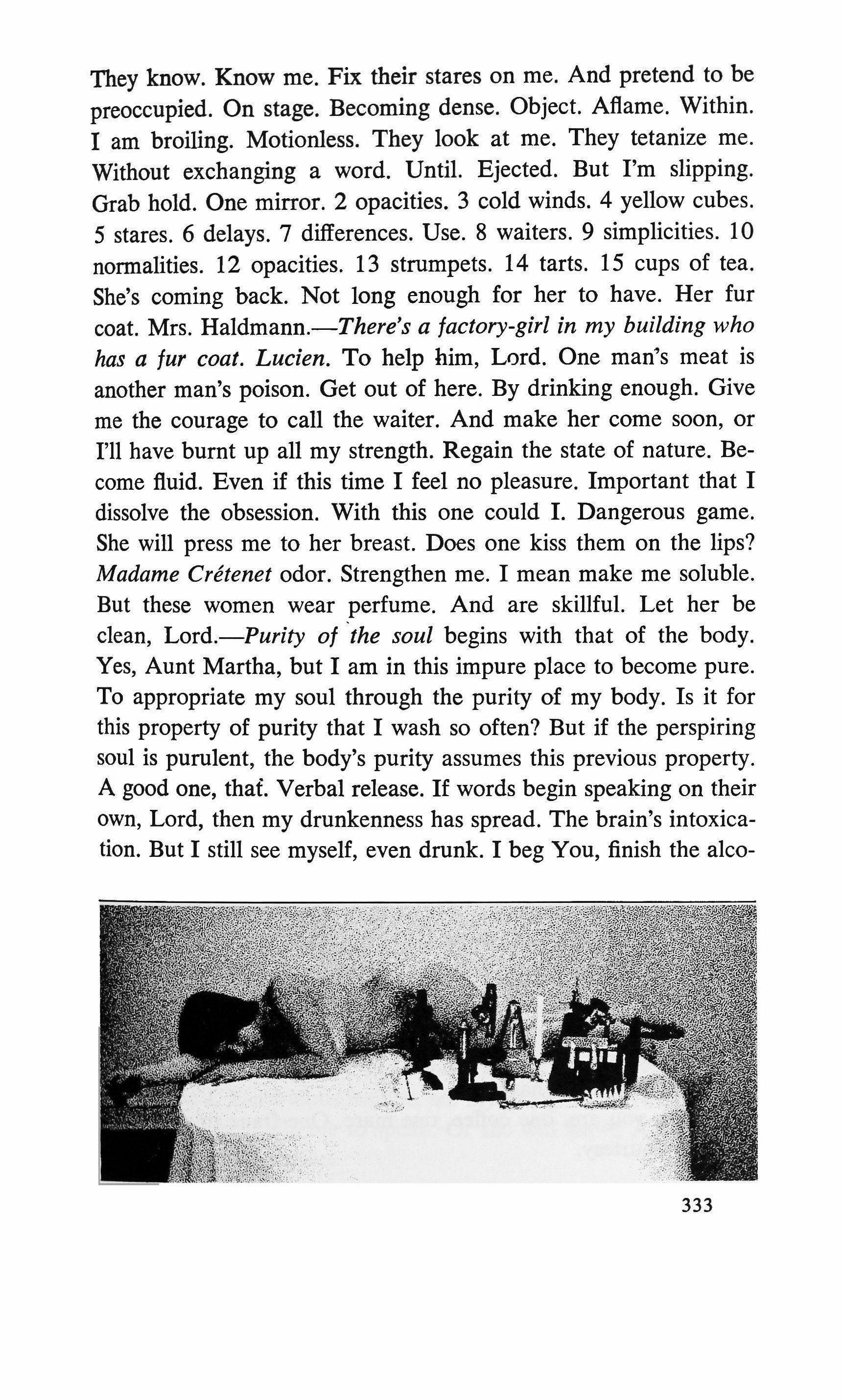
They know. Know me. Fix their stares on me. And pretend to be preoccupied. On stage. Becoming dense. Object. Aflame. Within. I am broiling. Motionless. They look at me. They tetanize me. Without exchanging a word. Until. Ejected. But I'm slipping. Grab hold. One mirror. 2 opacities. 3 cold winds. 4 yellow cubes. 5 stares. 6 delays. 7 differences. Use. 8 waiters. 9 simplicities. 10 normalities. 12 opacities. 13 strumpets. 14 tarts. 15 cups of tea. She's coming back. Not long enough for her to have. Her fur coat. Mrs. Haldmann.-There's a factory-girl in my building who has a fur coat. Lucien. To help him, Lord. One man's meat is another man's poison. Get out of here. By drinking enough. Give me the courage to call the waiter. And make her come soon, or I'll have burnt up all my strength. Regain the state of nature. Become fluid. Even if this time I feel no pleasure. Important that I dissolve the obsession. With this one could I. Dangerous game. She will press me to her breast. Does one kiss them on the lips? Madame Cretenet odor. Strengthen me. I mean make me soluble. But these women wear perfume. And are skillful. Let her be clean, Lord.-Purity of 'the soul begins with that of the body. Yes, Aunt Martha, but I am in this impure place to become pure. To appropriate my soul through the purity of my body. Is it for this property of purity that I wash so often? But if the perspiring soul is purulent, the body's purity assumes this previous property. A good one, thai. Verbal release. If words begin speaking on their own, Lord, then my drunkenness has spread. The brain's intoxication. But I still see myself, even drunk. I beg You, finish the alco-
333

hol's work that 1 play act without thinking. Already the transparent glass which attracts their stares is beginning to freeze over. While my own coagulation is going to cease. Jean-Luc, will you be able to endure her embrace? Let's not play with' fire. Not until the alcohol so pure because it burns has consumed your auto-perception. But do 1 mean that perception which functions by itself, or my own perception.
-Germaine, there's somebody here for you.
Petrified.
-Where is he?
Everybody.
-Here, right here.
Shouting out.
-Bonjour Mademoiselle.
-Bonjour M'sieur.
To everybody.
-Please sit down.
God, lower her voice.
"I wasn't expecting you to come in from
-Oh, there's another door, if you know the place. Vice. Shouldn't have stood up. Gave myself away. Accountant.
-I'm a friend of Balmer's, Gigi Balmer.
-Gigi? What's he up to? Where did you see him?
-On army duty.
Not so loud, please Lord.
"How about something to drink?"
-If you want. Raymond a coffee. Doesn't drink.
-And a marc for me, please.
For my heart. Beating like mad. Drunkenness receded.
"He's the one that gave me your name. You know him well?"
-Who? Oh, Gigi. Yes, he hung around for a while.
Vice. Let me. Thank you, she's quit shouting. Watched. To get out of here. But 1 have to
-Here you are, one coffee, one marc. One franc thirty. wait. Courtesy. 334

-Keep the change, please.
-Thanks.
And pull myself together. Not so ugly. Be nice to her.
-Wouldn't you have something else?
-The coffee's good enough. Besides, if I started in drinking, I could get myself into trouble.
Confiding. Let her be understanding with me. Even pretty, maybe. If she were really ugly it would have registered. Lord, help me speak to the waiter. And to be agreeable, for I've had so much to drink. It's for the good; afterwards I promise a long penance. My heart is still beating too fast.
-Yes?
-A double kirsch. For a change.
-Right.
What contempt. Thank you for that. And for my getting up the nerve.
-You're really soaking it up.
-It's my day off. I'm an accountant.
-Oh. I was just going to ask.
I lie. Lord, if she finds out, Balmer. But I'm normal. And with this one. That's just it. Now is the time. Help me. I couldn't do it by hinting. I would never know for sure whether she had understood. Say it. This is the moment. The hardest. Afterwards. Open my mouth. Help me. To burn my bridges. Is she really one? Can't be sure.
-One double kirsch. One ninety.
More expensive than the marc. Or else he raised the price. Contempt. Got to drink it down in one gulp.
No way to be sure that she's one. Would You give me the strength to start all over with another? Speak. Spark of ignition to make contact. Then the rest will follow naturally. Let me find the words. "What if we went to a larger?" "How about a little walk?" Cold wind. It's good and warm here. The I that can solidify is the false I. I, nebulous residue, see my thoughts melt before they become sound. Help me to speak. Or she will leave. A stimulant, I should have taken one.
335
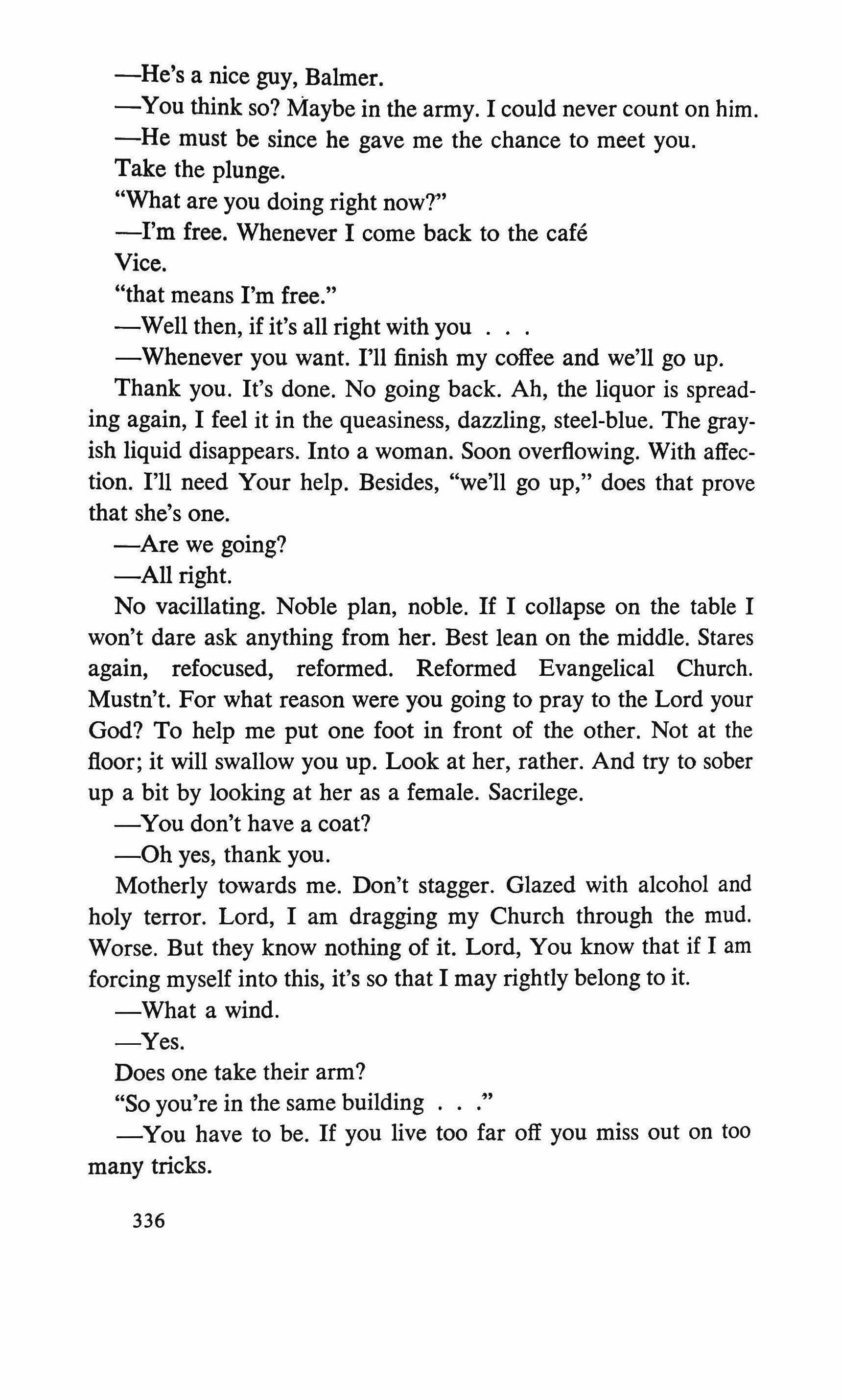
-He's a nice guy, Balmer.
-You think so? Maybe in the army. I could never count on him.
-He must be since he gave me the chance to meet you.
Take the plunge.
"What are you doing right now?"
-I'm free. Whenever I come back to the cafe Vice.
"that means I'm free."
-Well then, if it's all right with you
-Whenever you want. I'll finish my coffee and we'll go up.
Thank you. It's done. No going back. Ah, the liquor is spreading again, I feel it in the queasiness, dazzling, steel-blue. The grayish liquid disappears. Into a woman. Soon overflowing. With affection. I'll need Your help. Besides, "we'll go up," does that prove that she's one.
-Are we going?
-All right.
No vacillating. Noble plan, noble. If I collapse on the table I won't dare ask anything from her. Best lean on the middle. Stares again, refocused, reformed. Reformed Evangelical Church. Mustn't. For what reason were you going to pray to the Lord your God? To help me put one foot in front of the other. Not at the floor; it will swallow you up. Look at her, rather. And try to sober up a bit by looking at her as a female. Sacrilege.
-You don't have a coat?
-Oh yes, thank you.
Motherly towards me. Don't stagger. Glazed with alcohol and holy terror. Lord, I am dragging my Church through the mud. Worse. But they know nothing of it. Lord, You know that if I am forcing myself into this, it's so that I may rightly belong to it.
-What a wind.
-Yes.
Does one take their arm?
"So you're in the same building "
-You have to be. If you live too far off you miss out on too many tricks.
336
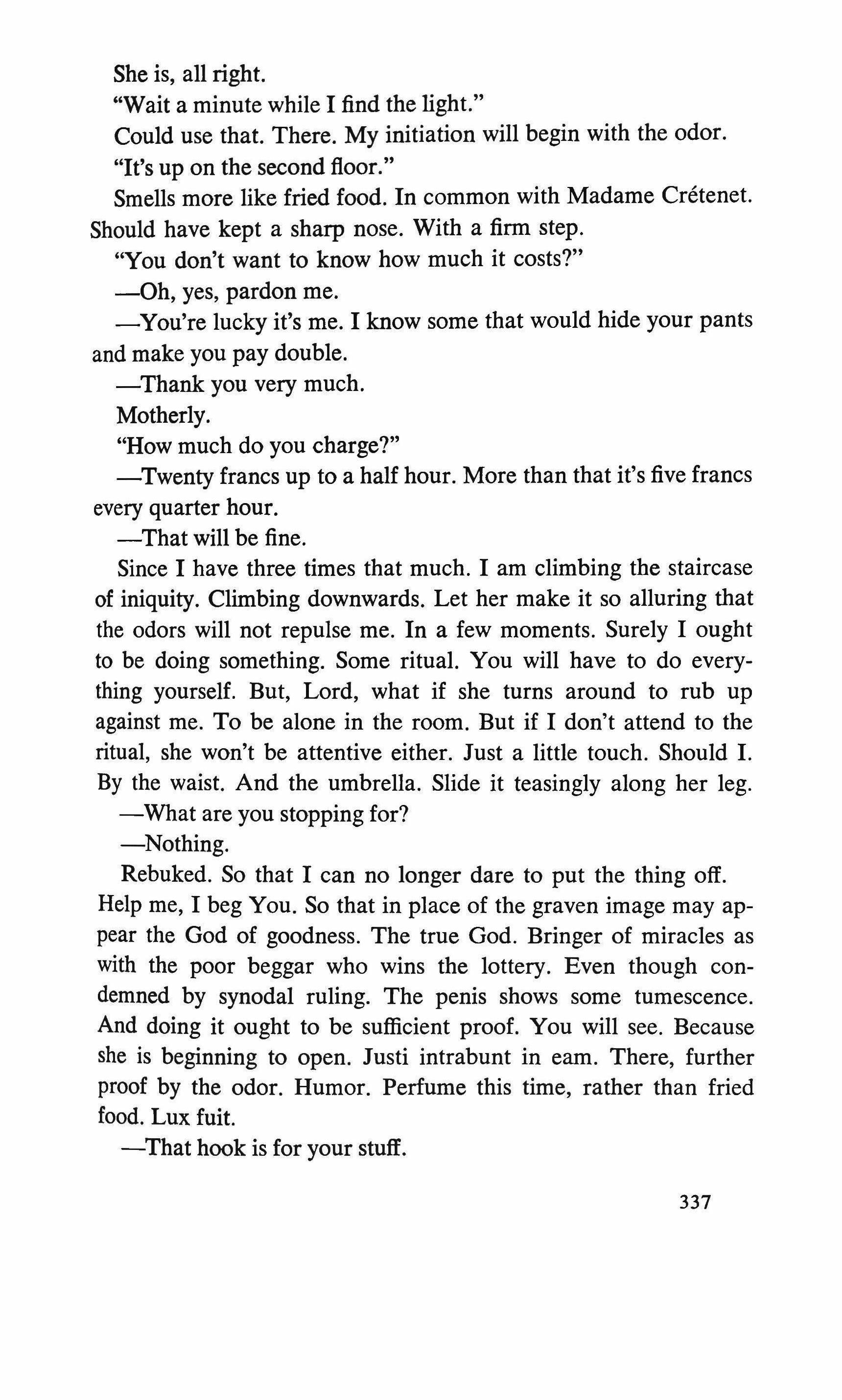
She is, all right.
"Wait a minute while I find the light."
Could use that. There. My initiation will begin with the odor.
"It's up on the second floor."
Smells more like fried food. In common with Madame Cretenet. Should have kept a sharp nose. With a firm step.
"You don't want to know how much it costs?"
-Dh, yes, pardon me.
-You're lucky it's me. I know some that would hide your pants and make you pay double.
-Thank you very much.
Motherly.
"How much do you charge?"
-Twenty francs up to a half hour. More than that it's five francs every quarter hour.
-That will be fine.
Since I have three times that much. I arn climbing the staircase of iniquity. Climbing downwards. Let her make it so alluring that the odors will not repulse me. In a few moments. Surely I ought to be doing something. Some ritual. You will have to do everything yourself. But, Lord, what if she turns around to rub up against me. To be alone in the room. But if I don't attend to the ritual, she won't be attentive either. Just a little touch. Should I. By the waist. And the umbrella. Slide it teasingly along her leg.
-What are you stopping for?
-Nothing.
Rebuked. So that I can no longer dare to put the thing off. Help me, I beg You. So that in place of the graven image may appear the God of goodness. The true God. Bringer of miracles as with the poor beggar who wins the lottery. Even though condemned by synodal ruling. The penis shows some tumescence. And doing it ought to be sufficient proof. You will see. Because she is beginning to open. Justi intrabunt in earn. There, further proof by the odor. Humor. Perfume this time, rather than fried food. Lux fuit.
-That hook is for your stuff. 337
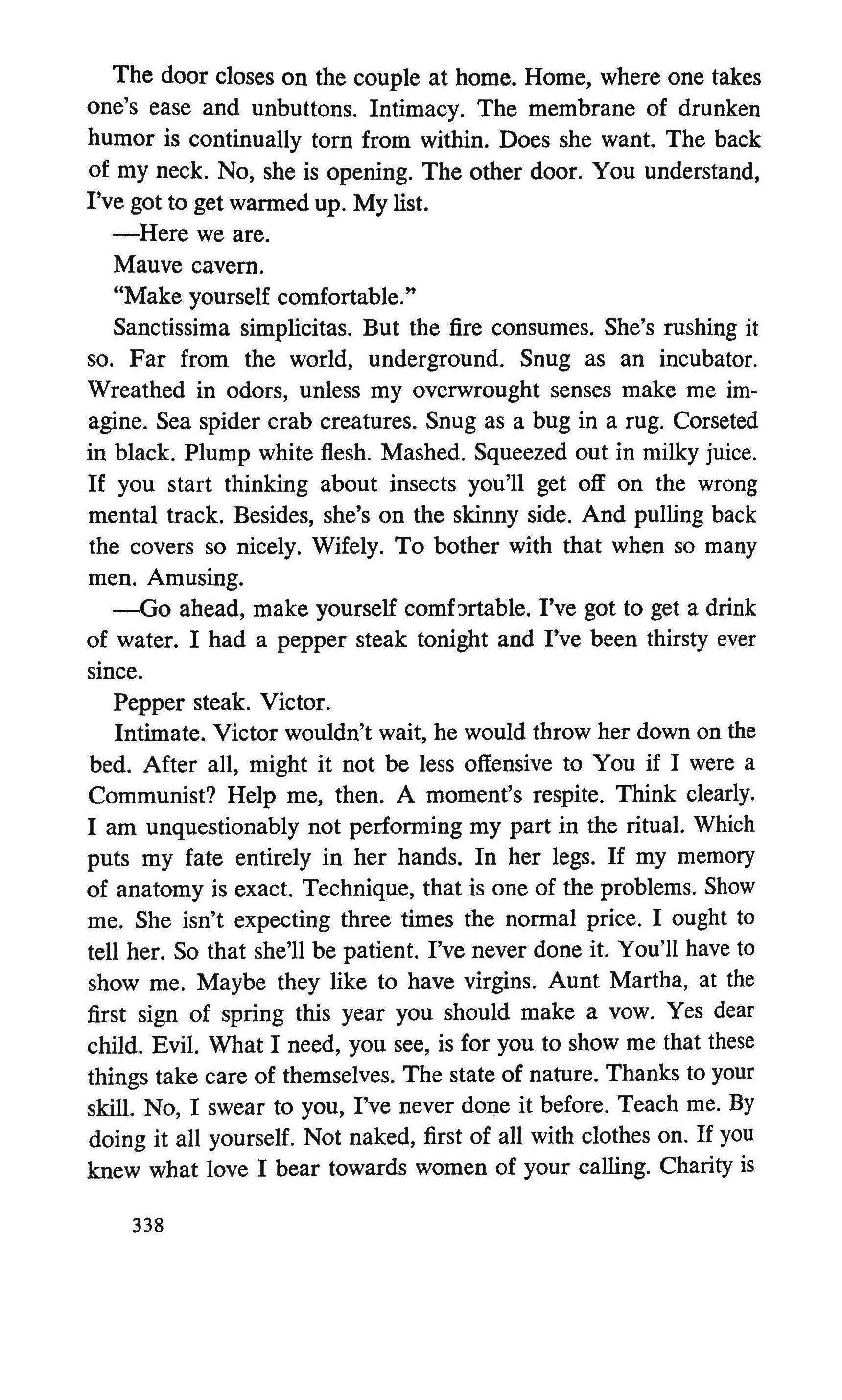
The door closes on the couple at home. Home, where one takes one's ease and unbuttons. Intimacy. The membrane of drunken humor is continually tom from within. Does she want. The back of my neck. No, she is opening. The other door. You understand, I've got to get warmed up. My list.
-Here we are.
Mauve cavern.
"Make yourself comfortable."
Sanctissima simplicitas. But the fire consumes. She's rushing it so. Far from the world, underground. Snug as an incubator. Wreathed in odors, unless my overwrought senses make me imagine. Sea spider crab creatures. Snug as a bug in a rug. Corseted in black. Plump white flesh. Mashed. Squeezed out in milky juice. If you start thinking about insects you'll get off on the wrong mental track. Besides, she's on the skinny side. And pulling back the covers so nicely. Wifely. To bother with that when so many men. Amusing.
-Go ahead, make yourself comfortable. I've got to get a drink of water. I had a pepper steak tonight and I've been thirsty ever since.
Pepper steak. Victor.
Intimate. Victor wouldn't wait, he would throw her down on the bed. After all, might it not be less offensive to You if I were a Communist? Help me, then. A moment's respite. Think clearly. I am unquestionably not performing my part in the ritual. Which puts my fate entirely in her hands. In her legs. If my memory of anatomy is exact. Technique, that is one of the problems. Show me. She isn't expecting three times the normal price. I ought to tell her. So that she'll be patient. I've never done it. You'll have to show me. Maybe they like to have virgins. Aunt Martha, at the first sign of spring this year you should make avow Yes dear child. Evil. What I need, you see, is for you to show me that these things take care of themselves. The state of nature. Thanks to your skill. No, I swear to you, I've never done it before. Teach me. By doing it all yourself. Not naked, first of all with clothes on. If you knew what love I bear towards women of your calling. Charity is
338

in you. Yes, I deserve your contempt. But teach me well. Afterwards I will be normal. I will have the courage to proclaim the love which you deserve. I'll send you money every month. I've got enough. I can spend an extra quarter hour. To get used to it. She smells. Of cologne and seafood. Et odor unguentorum tuorum super omnia aromata, my betrothed, and the odor of your vestments sicut odor thuris. Hortus conclusus soror mea sponsa. Joke. Be decent, Jean-Luc.
-Haven't you started yet?
Surprised. Her looking at me. Solidified. And by myself in the mirror. Lord, she is going to undress. I knew she would have that kind of dress. Strengthen me. With humor. That's just it, the liquor has frozen me. It's me.
-You in good shape?
-Dh yes, yes.
-I've had some with their hands in your pants before you even get inside. I knew it, I knew that "If you let them have their way" I wasn't holding up my end of the ritual "you'd be doing it right up against the door" It's for my benefit, after all "the moment you got in" that she's working right now. "Like dogs." Zippers may be faster than buttons, but you've got to get hold of them first. Which a gallant husband would help her with. With the sacrilege. I'm going to behold the nudity of the opposite sex. Opulent flesh. And was transformed into a pillar of salt. But then she's rather skinny. Woman is always flabby. And odorous. Odors liberated from the caress of forms. But maybe like the door which opens onto a wall. That reflection on the skirt. All that glitters is not gross. Nakedness. Not frilly enough, that brassiere. Georges. Germaine. From which they will spring out with their pink nipples. No, she's leaving the brassiere to the end. "And when you think, it's the most practical thing to wear, because you've got pants and garter belt all in one. The biggest nuisance is the stockings, but the dumber the johns, the more they seem to like them. Otherwise I wouldn't need any to go from here to the cafe. I ruin almost a pair a day." Take off, put back on. At twenty francs, the pay isn't bad. From one zipper to the next. She's unwrapping herself. Ex-
339
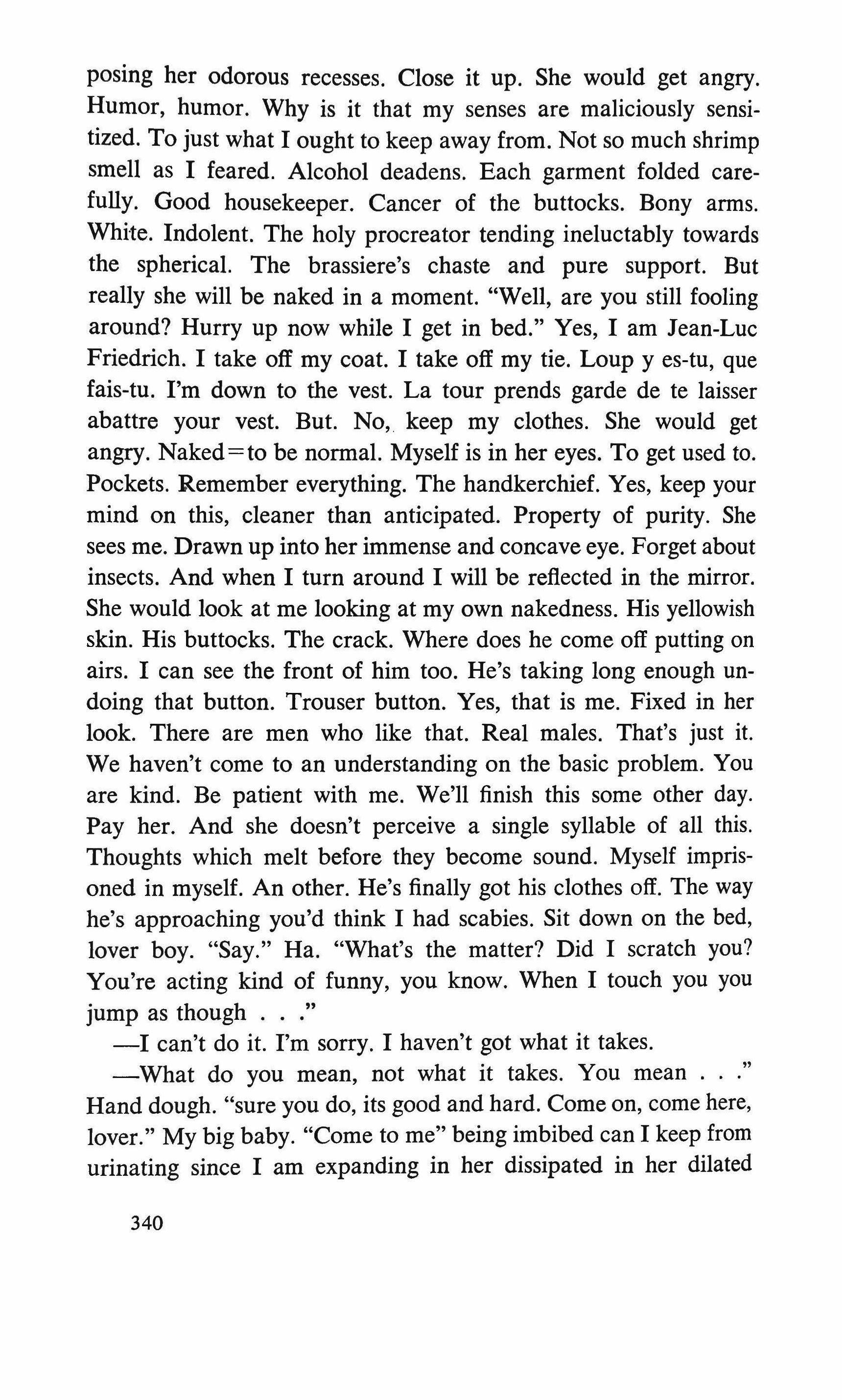
posing her odorous recesses. Close it up. She would get angry. Humor, humor. Why is it that my senses are maliciously sensitized. To just what I ought to keep away from. Not so much shrimp smell as I feared. Alcohol deadens. Each garment folded carefully. Good housekeeper. Cancer of the buttocks. Bony arms. White. Indolent. The holy procreator tending ineluctably towards the spherical. The brassiere's chaste and pure support. But really she will be naked in a moment. "Well, are you still fooling around? Hurry up now while I get in bed." Yes, I am Jean-Luc Friedrich. I take off my coat. I take off my tie. Loup y es-tu, que fais-tu. I'm down to the vest. La tour prends garde de te laisser abattre your vest. But. No, keep my clothes. She would get angry. Naked to be normal. Myself is in her eyes. To get used to. Pockets. Remember everything. The handkerchief. Yes, keep your mind on this, cleaner than anticipated. Property of purity. She sees me. Drawn up into her immense and concave eye. Forget about insects. And when I turn around I will be reflected in the mirror. She would look at me looking at my own nakedness. His yellowish skin. His buttocks. The crack. Where does he come off putting on airs. I can see the front of him too. He's taking long enough undoing that button. Trouser button. Yes, that is me. Fixed in her look. There are men who like that. Real males. That's just it. We haven't come to an understanding on the basic problem. You are kind. Be patient with me. We'll finish this some other day. Pay her. And she doesn't perceive a single syllable of all this. Thoughts which melt before they become sound. Myself imprisoned in myself. An other. He's finally got his clothes off. The way he's approaching you'd think I had scabies. Sit down on the bed, lover boy. "Say." Ha. "What's the matter? Did I scratch you? You're acting kind of funny, you know. When I touch you you jump as though ."
-I can't do it. I'm sorry. I haven't got what it takes.
-What do you mean, not what it takes. You mean Hand dough. "sure you do, its good and hard. Come on, come here, lover." My big baby. "Come to me" being imbibed can I keep from urinating since I am expanding in her dissipated in her dilated
340

pores my dear child I am stoned enough to that's just it not to vomit I keep my self control humor but detachment prevents pleasure what a joke I remain myself in the rocking of the bed oh mustn't confuse her good will and the need to vomit not knowing how I should go about it I am not a gentleman when maybe I've had the luck to get a skillful squeezes me with all her strength to respond does one caress them where to put my arms even here I'm afraid to leave undone those things we ought to have done to do those things we ought not do to respond to all this wasted technique she works hard this bitter pill in my throat that makes me gag what is my body doing then right now she is rubbing hard thinking that I'm losing interest and I will have pleasure without feeling pleasure just what I was afraid of unable to control her head nestled in my shoulder which will settle over me because of all this willing effort and forces me to respond to be left in peace hold on to think by thinking you won't vomit for example what time is it for I mustn't miss the train she is squeezing it I knew it she is drawing me into her "you want me don't you lover" it's someone else referring to the fact that it's hard humus I am in it in that cavernous and rotting organ not forget to put back everything I took from my pockets the procreative slime of original pollution she is moaning professionally conscientious skilled artisan its over so quickly that little spasm at least when I do it myself the pleasure isn't fake why keep on squirming the evil is consummated anyway I didn't vomit.
Flaccid. Finished. Pull away. Her annoyance. Never again. Beyond my strength. I have sinned. So be it. Post coitum animal despondency. Dixit serpens ad woman: in the day ye eat thereof, then your eyes shall be opened, and ye shall be as gods, knowing good and evil. Sweat beginning to make me itch. Original pollution. The biblical phrase: to know a woman.
-So, was it all right?
-Yes, fine.
-You sure aren't much for talking. I've had some that called me by their girl's name.
Now what does one do. Emptied out. Literally and figuratively.
341
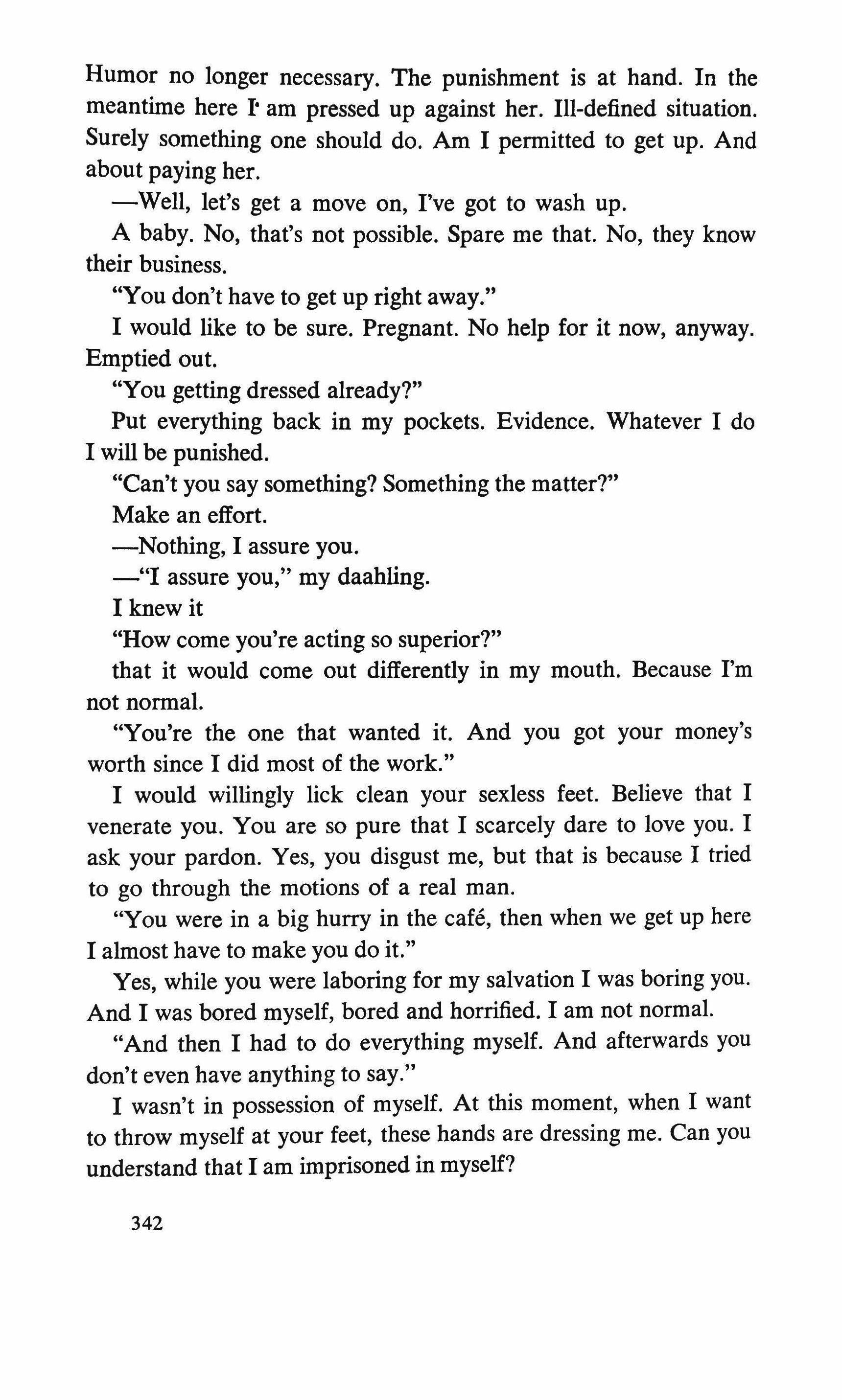
Humor no longer necessary. The punishment is at hand. In the meantime here I' am pressed up against her. Ill-defined situation. Surely something one should do. Am I permitted to get up. And about paying her.
-Well, let's get a move on, I've got to wash up. A baby. No, that's not possible. Spare me that. No, they know their business.
"You don't have to get up right away."
I would like to be sure. Pregnant. No help for it now, anyway. Emptied out.
"You getting dressed already?"
Put everything back in my pockets. Evidence. Whatever I do I will be punished.
"Can't you say something? Something the matter?" Make an effort.
-Nothing, I assure you.
-"I assure you," my daahling.
I knew it
"How come you're acting so superior?" that it would come out differently in my mouth. Because I'm not normal.
"You're the one that wanted it. And you got your money's worth since I did most of the work."
I would willingly lick clean your sexless feet. Believe that I venerate you. You are so pure that I scarcely dare to love you. I ask your pardon. Yes, you disgust me, but that is because I tried to go through the motions of a real man.
"You were in a big hurry in the cafe, then when we get up here I almost have to make you do it."
Yes, while you were laboring for my salvation I was boring you. And I was bored myself, bored and horrified. I am not normal.
"And then I had to do everything myself. And afterwards you don't even have anything to say."
I wasn't in possession of myself. At this moment, when I want to throw myself at your feet, these hands are dressing me. Can you understand that I am imprisoned in myself? 342

"So I start to go wash up and you jump out of bed as if you'd picked up the syph."
That punishment would be one only in appearance. Disagreeable, of course. 1 am already polluted. Suppose that that mirror were false, as subtly as that which it continues to reflect. Speechlessly. Ha ha. Obviously I'm still drunk.
"And you get dressed looking disgusted."
I venerate you. But 1 am impervious. It's not right. Force myself. 1 have no contempt for you. Tell her. 1 assure you.
-I assure you that 1 have no contempt for you.
-Oh, well now, isn't that
-You see, you see, my words betrayed in my mouth. Not
"I'm sorry, 1 assure you that 1 am sorry." Stupefied. Nude model, posed.
-Okay, okay, skip it.
"Go ahead and finish dressing. It won't take me long."
Get out. Wait for the sound of water. Of sin. Suppose she makes a fuss. Well paid. Three times the amount. What if she doesn't find the money. Put it in an obvious place. Water. Careful, 1 am still drunk. Enough time. Take my suitcase along, No, nothing forgotten, everything back in my pockets.
translated by Stanley E. Gray
343
Lib CAROL EMSHWILLER
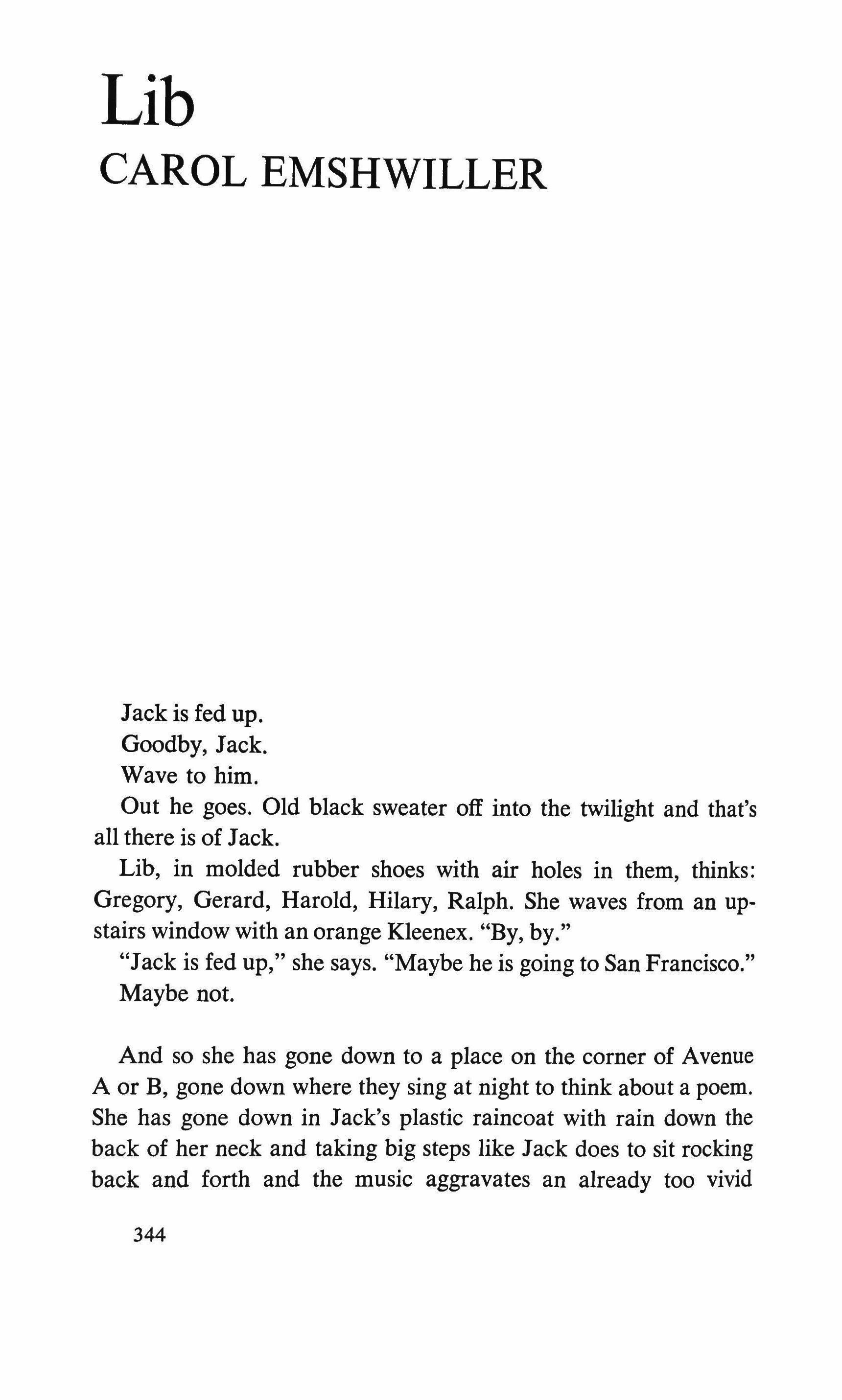
Jack is fed up.
Goodby, Jack. Wave to him.
Out he goes. Old black sweater off into the twilight and that's all there is of Jack.
Lib, in molded rubber shoes with air holes in them, thinks: Gregory, Gerard, Harold, Hilary, Ralph. She waves from an upstairs window with an orange Kleenex. "By, by."
"Jack is fed up," she says. "Maybe he is going to San Francisco." Maybe not.
And so she has gone down to a place on the corner of Avenue
A or B, gone down where they sing at night to think about a poem. She has gone down in Jack's plastic raincoat with rain down the back of her neck and taking big steps like Jack does to sit rocking back and forth and the music aggravates an already too vivid
344
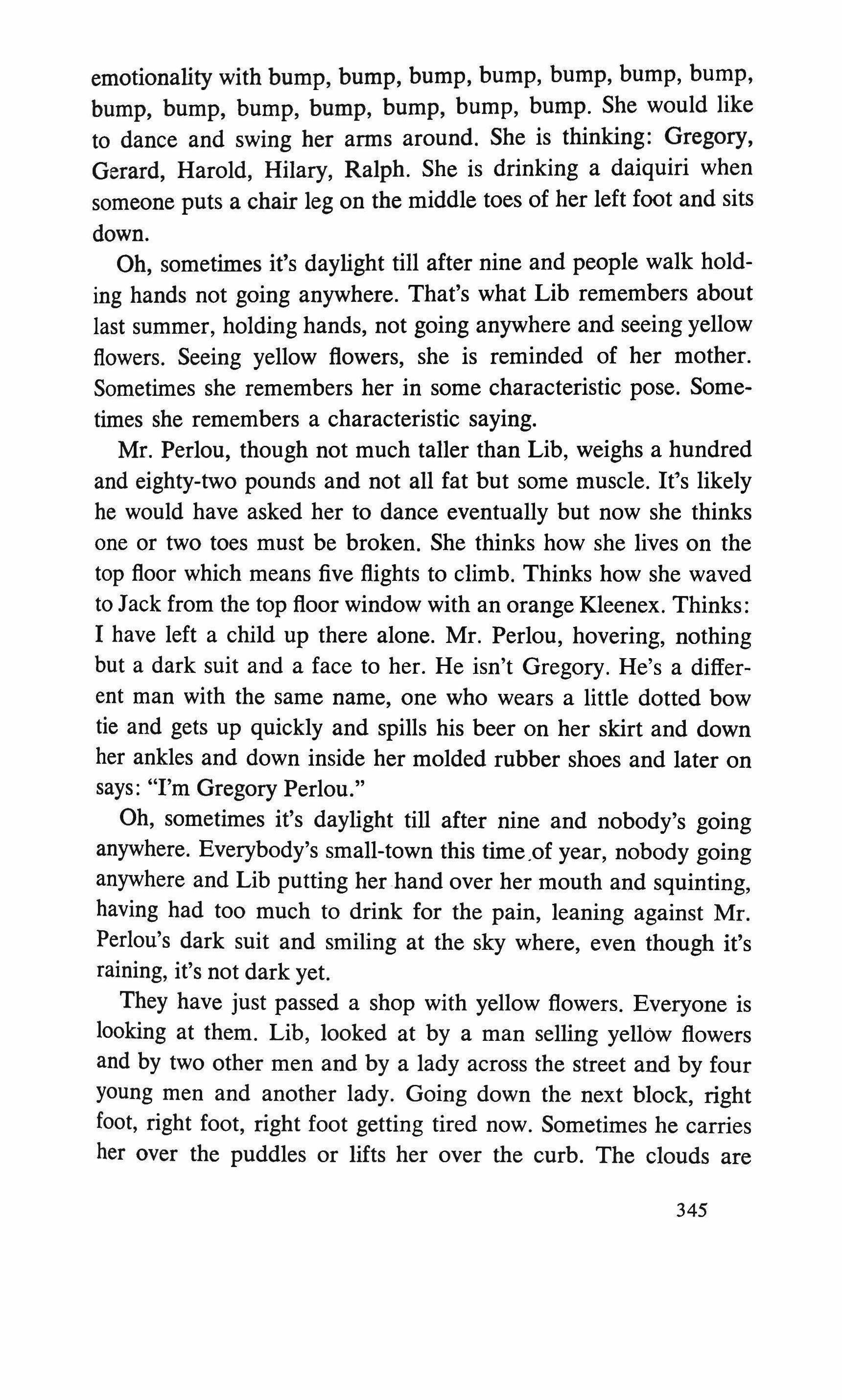
emotionality with bump, bump, bump, bump, bump, bump, bump, bump, bump, bump, bump, bump, bump, bump. She would like to dance and swing her arms around. She is thinking: Gregory, Gerard, Harold, Hilary, Ralph. She is drinking a daiquiri when someone puts a chair leg on the middle toes of her left foot and sits down.
Oh, sometimes it's daylight till after nine and people walk holding hands not going anywhere. That's what Lib remembers about last summer, holding hands, not going anywhere and seeing yellow flowers. Seeing yellow flowers, she is reminded of her mother. Sometimes she remembers her in some characteristic pose. Sometimes she remembers a characteristic saying.
Mr. Perlou, though not much taller than Lib, weighs a hundred and eighty-two pounds and not all fat but some muscle. It's likely he would have asked her to dance eventually but now she thinks one or two toes must be broken. She thinks how she lives on the top floor which means five flights to climb. Thinks how she waved to Jack from the top floor window with an orange Kleenex. Thinks: I have left a child up there alone. Mr. Perlou, hovering, nothing but a dark suit and a face to her. He isn't Gregory. He's a different man with the same name, one who wears a little dotted bow tie and gets up quickly and spills his beer on her skirt and down her ankles and down inside her molded rubber shoes and later on says: "I'm Gregory Perlou."
Oh, sometimes it's daylight till after nine and nobody's going anywhere. Everybody's small-town this timeof year, nobody going anywhere and Lib putting her hand over her mouth and squinting, having had too much to drink for the pain, leaning against Mr. Perlou's dark suit and smiling at the sky where, even though it's raining, it's not dark yet.
They have just passed a shop with yellow flowers. Everyone is looking at them. Lib, looked at by a man selling yellow flowers and by two other men and by a lady across the street and by four young men and another lady. Going down the next block, right foot, right foot, right foot getting tired now. Sometimes he carries her over the puddles or lifts her over the curb. The clouds are 345
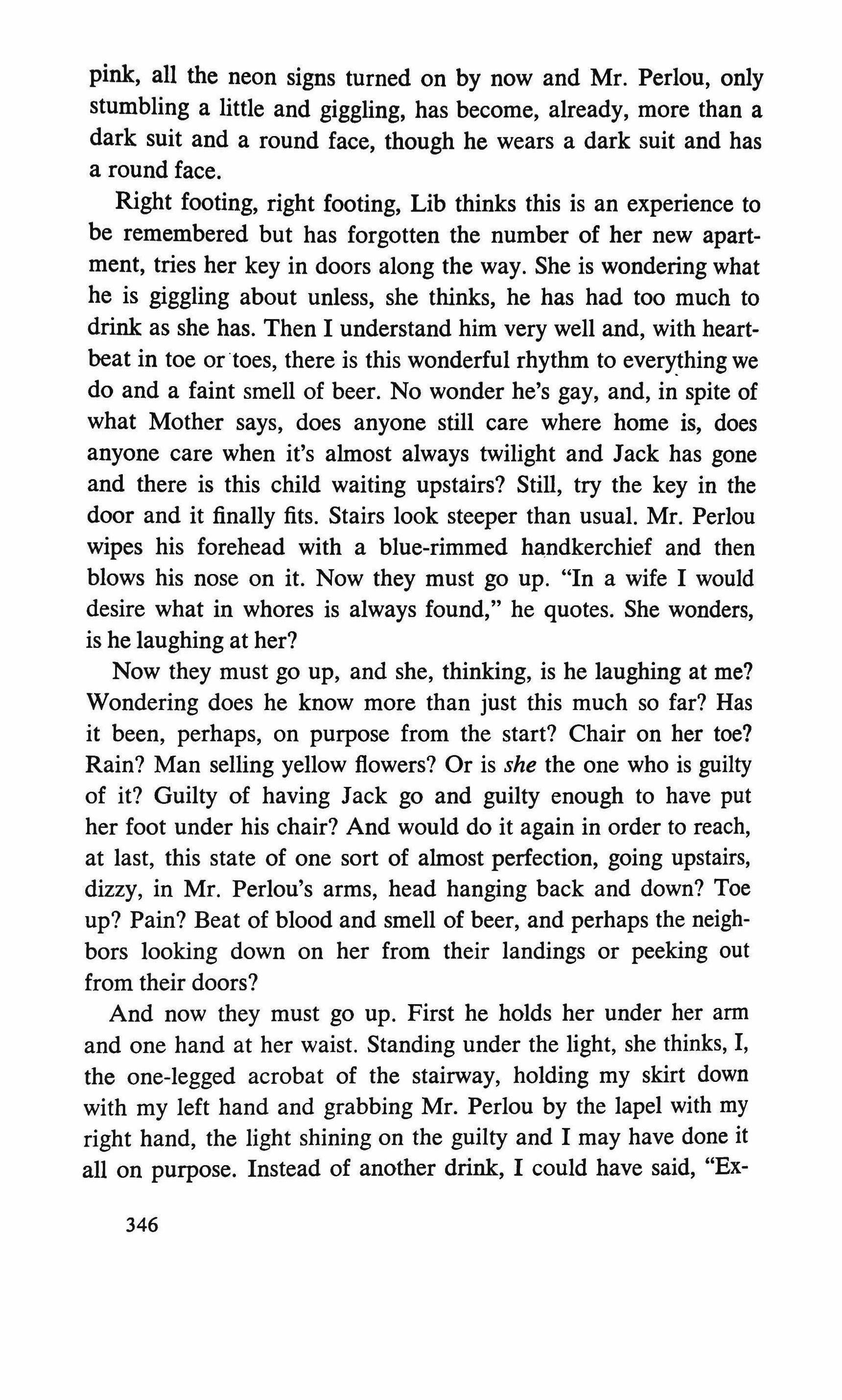
pink, all the neon signs turned on by now and Mr. Perlou, only stumbling a little and giggling, has become, already, more than a dark suit and a round face, though he wears a dark suit and has a round face.
Right footing, right footing, Lib thinks this is an experience to be remembered but has forgotten the number of her new apartment, tries her key in doors along the way. She is wondering what he is giggling about unless, she thinks, he has had too much to drink as she has. Then I understand him very well and, with heartbeat in toe or "toes, there is this wonderful rhythm to everything we do and a faint smell of beer. No wonder he's gay, and, in spite of what Mother says, does anyone still care where home is, does anyone care when it's almost always twilight and Jack has gone and there is this child waiting upstairs? Still, try the key in the door and it finally fits. Stairs look steeper than usual. Mr. Perlou wipes his forehead with a blue-rimmed handkerchief and then blows his nose on it. Now they must go up. "In a wife I would desire what in whores is always found," he quotes. She wonders, is he laughing at her?
Now they must go up, and she, thinking, is he laughing at me? Wondering does he know more than just this much so far? Has it been, perhaps, on purpose from the start? Chair on her toe?
Rain? Man selling yellow flowers? Or is she the one who is guilty of it? Guilty of having Jack go and guilty enough to have put her foot under his chair? And would do it again in order to reach, at last, this state of one sort of almost perfection, going upstairs, dizzy, in Mr. Perlou's arms, head hanging back and down? Toe up? Pain? Beat of blood and smell of beer, and perhaps the neighbors looking down on her from their landings or peeking out from their doors?
And now they must go up. First he holds her under her arm and one hand at her waist. Standing under the light, she thinks, J, the one-legged acrobat of the stairway, holding my skirt down with my left hand and grabbing Mr. Perlou by the lapel with my right hand, the light shining on the guilty and J may have done it all on purpose. Instead of another drink, I could have said, "Ex-
346
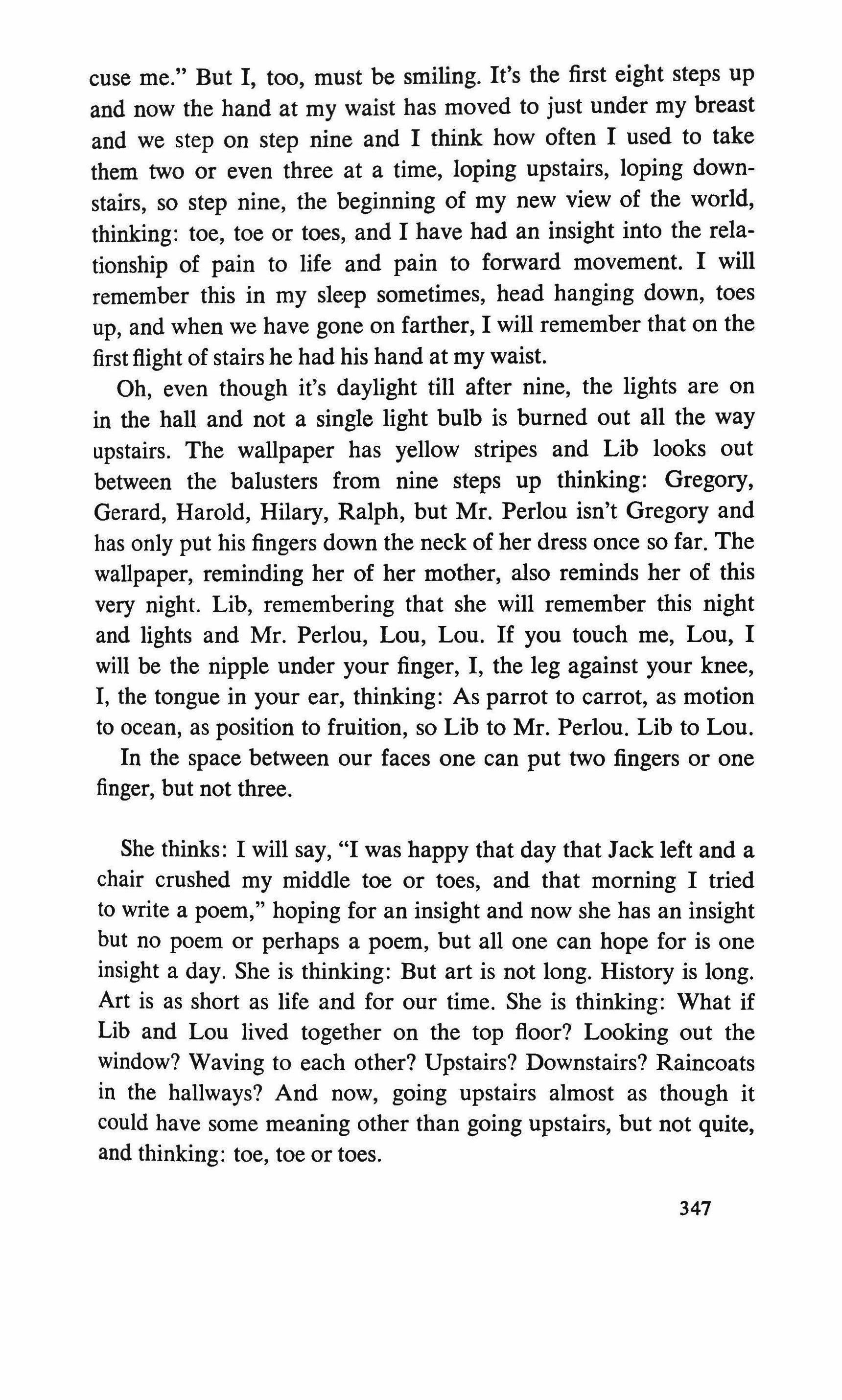
cuse me." But I, too, must be smiling. It's the first eight steps up and now the hand at my waist has moved to just under my breast and we step on step nine and I think how often I used to take them two or even three at a time, loping upstairs, loping downstairs, so step nine, the beginning of my new view of the world, thinking: toe, toe or toes, and I have had an insight into the relationship of pain to life and pain to forward movement. I will remember this in my sleep sometimes, head hanging down, toes up, and when we have gone on farther, I will remember that on the first flight of stairs he had his hand at my waist.
Oh, even though it's daylight till after nine, the lights are on in the hall and not a single light bulb is burned out all the way upstairs. The wallpaper has yellow stripes and Lib looks out between the balusters from nine steps up thinking: Gregory, Gerard, Harold, Hilary, Ralph, but Mr. Perlou isn't Gregory and has only put his fingers down the neck of her dress once so far. The wallpaper, reminding her of her mother, also reminds her of this very night. Lib, remembering that she will remember this night and lights and Mr. Perlou, Lou, Lou. If you touch me, Lou, I will be the nipple under your finger, I, the leg against your knee, I, the tongue in your ear, thinking: As parrot to carrot, as motion to ocean, as position to fruition, so Lib to Mr. Perlou. Lib to Lou. In the space between our faces one can put two fingers or one finger, but not three.
She thinks: I will say, "I was happy that day that Jack left and a chair crushed my middle toe or toes, and that morning I tried to write a poem," hoping for an insight and now she has an insight but no poem or perhaps a poem, but all one can hope for is one insight a day. She is thinking: But art is not long. History is long. Art is as short as life and for our time. She is thinking: What if Lib and Lou lived together on the top floor? Looking out the window? Waving to each other? Upstairs? Downstairs? Raincoats in the hallways? And now, going upstairs almost as though it could have some meaning other than going upstairs, but not quite, and thinking: toe, toe or toes.
347
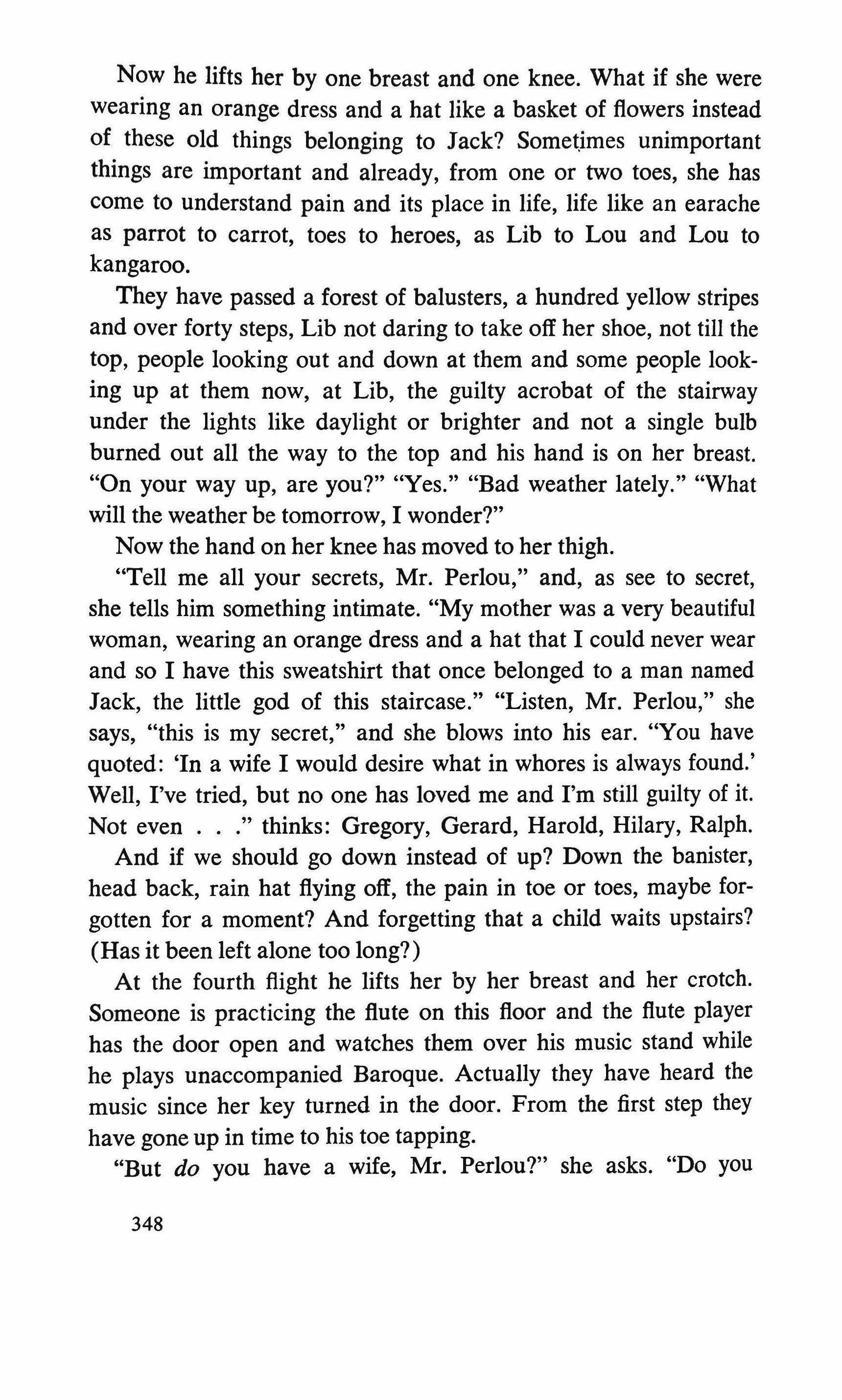
Now he lifts her by one breast and one knee. What if she were wearing an orange dress and a hat like a basket of flowers instead of these old things belonging to Jack? Sometimes unimportant things are important and already, from one or two toes, she has come to understand pain and its place in life, life like an earache as parrot to carrot, toes to heroes, as Lib to Lou and Lou to kangaroo.
They have passed a forest of balusters, a hundred yellow stripes and over forty steps, Lib not daring to take off her shoe, not till the top, people looking out and down at them and some people looking up at them now, at Lib, the guilty acrobat of the stairway under the lights like daylight or brighter and not a single bulb burned out all the way to the top and his hand is on her breast. "On your way up, are you?" "Yes." "Bad weather lately." "What will the weather be tomorrow, I wonder?"
Now the hand on her knee has moved to her thigh.
"Tell me all your secrets, Mr. Perlou," and, as see to secret, she tells him something intimate. "My mother was a very beautiful woman, wearing an orange dress and a hat that I could never wear and so I have this sweatshirt that once belonged to a man named Jack, the little god of this staircase." "Listen, Mr. Perlou," she says, "this is my secret," and she blows into his ear. "You have quoted: 'In a wife I would desire what in whores is always found.' Well, I've tried, but no one has loved me and I'm still guilty of it. Not even ." thinks: Gregory, Gerard, Harold, Hilary, Ralph. And if we should go down instead of up? Down the banister, head back, rain hat flying off, the pain in toe or toes, maybe forgotten for a moment? And forgetting that a child waits upstairs? (Has it been left alone too long?)
At the fourth flight he lifts her by her breast and her crotch. Someone is practicing the flute on this floor and the flute player has the door open and watches them over his music stand while he plays unaccompanied Baroque. Actually they have heard the music since her key turned in the door. From the first step they have gone up in time to his toe tapping.
"But do you have a wife, Mr. Perlou?' she asks. "Do you
348

already have a wife? One that fits your requirements as you have quoted from William Blake who also wrote about the little lamb?"
The flute player watches with disapproving eyes over his music stand as Mr. Perlou doesn't answer her question. He looks as though he doesn't believe her neck should be under Mr. Perlou's chin, nor her skirt up around her waist. She is wondering if everyone watching feels the same way.
What if they should go down? (But they continue to go up.) Everyone still out watching them under those lights as they go down (but they still go up). "Ah, going down now, we see." "Yes, going down for a change." "We see that even going down is difficult when someone has done something to their foot, though we don't know what it is. Unless, Mr. Perlou, you should put her on the banister." But still he could keep his grip on her breast and she, her shoulder under his chin. They could go down the banister like that together, with her head hanging back and his other hand still at her crotch, sailing down, coasting down, gathering speed and swinging their legs out at the corners, having time to giggle again and then, for a moment at least, she would forget the pain, thinking: Gregory, Gerard, Harold, Hilary, Ralph, the beat of blood, the smell of beer, and perhaps the flute player would play faster and some. of the light bulbs might be burned out by then, and what would there be to be guilty of, going down like big bugs making love as they fly and singing: "Oh, sometimes it's daylight till nine or later."
"Goodby everybody." Waving to them. Nothing but faces on the way down. Blurring out. "Goodby." Get out the orange Kleenex. Wave. "0, we are fed up, too." "By by. By by."
But still they go up.
And the child is waiting, listening to them come.
349
translated by Michael Benedikt
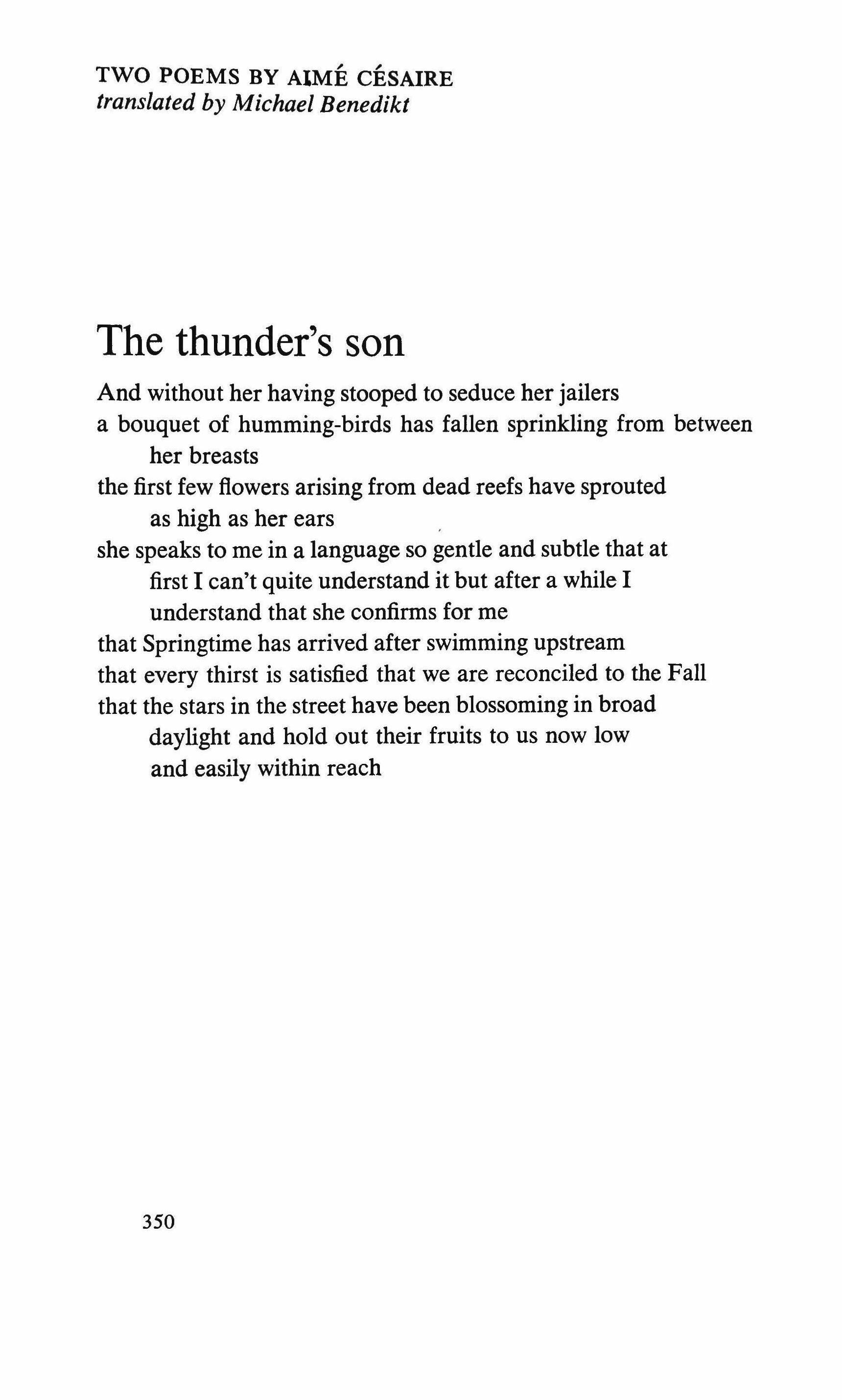
The thunder's son
And without her having stooped to seduce her jailers a bouquet of humming-birds has fallen sprinkling from between her breasts the first few flowers arising from dead reefs have sprouted as high as her ears she speaks to me in a language so gentle and subtle that at first I can't quite understand it but after a while I understand that she confirms for me that Springtime has arrived after swimming upstream that every thirst is satisfied that we are reconciled to the Fall that the stars in the street have been blossoming in broad daylight and hold out their fruits to us now low and easily within reach
BY AIME CESAIRE
TWO POEMS
350
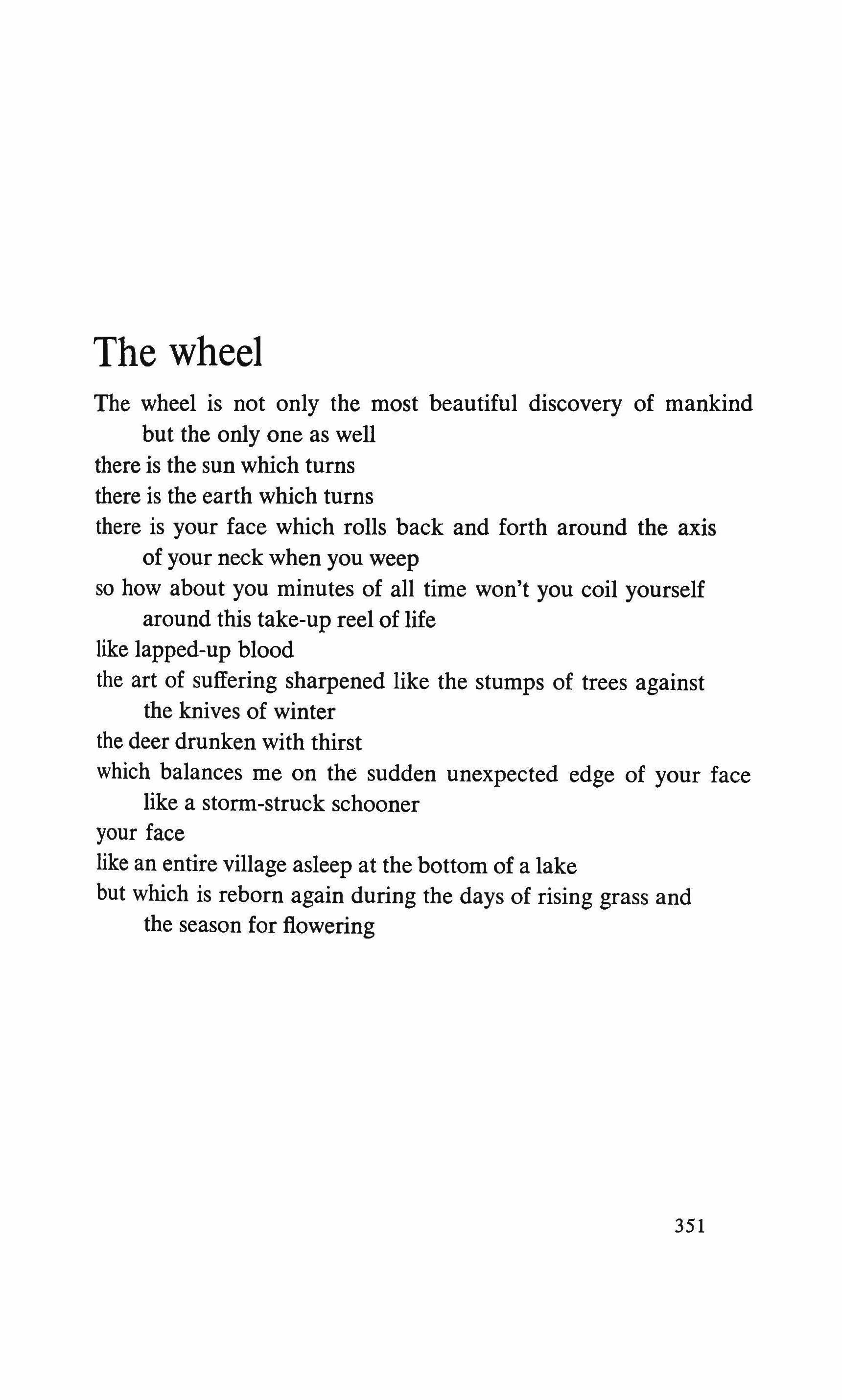
The wheel
The wheel is not only the most beautiful discovery of mankind but the only one as well there is the sun which turns there is the earth which turns there is your face which rolls back and forth around the axis of your neck when you weep so how about you minutes of all time won't you coil yourself around this take-up reel of life like lapped-up blood the art of suffering sharpened like the stumps of trees against the knives of winter the deer drunken with thirst which balances me on the sudden unexpected edge of your face like a storm-struck schooner your face
like an entire village asleep at the bottom of a lake but which is reborn again during the days of rising grass and the season for flowering
351
Song of the first and last Beatnik
HERBERT
GOLD
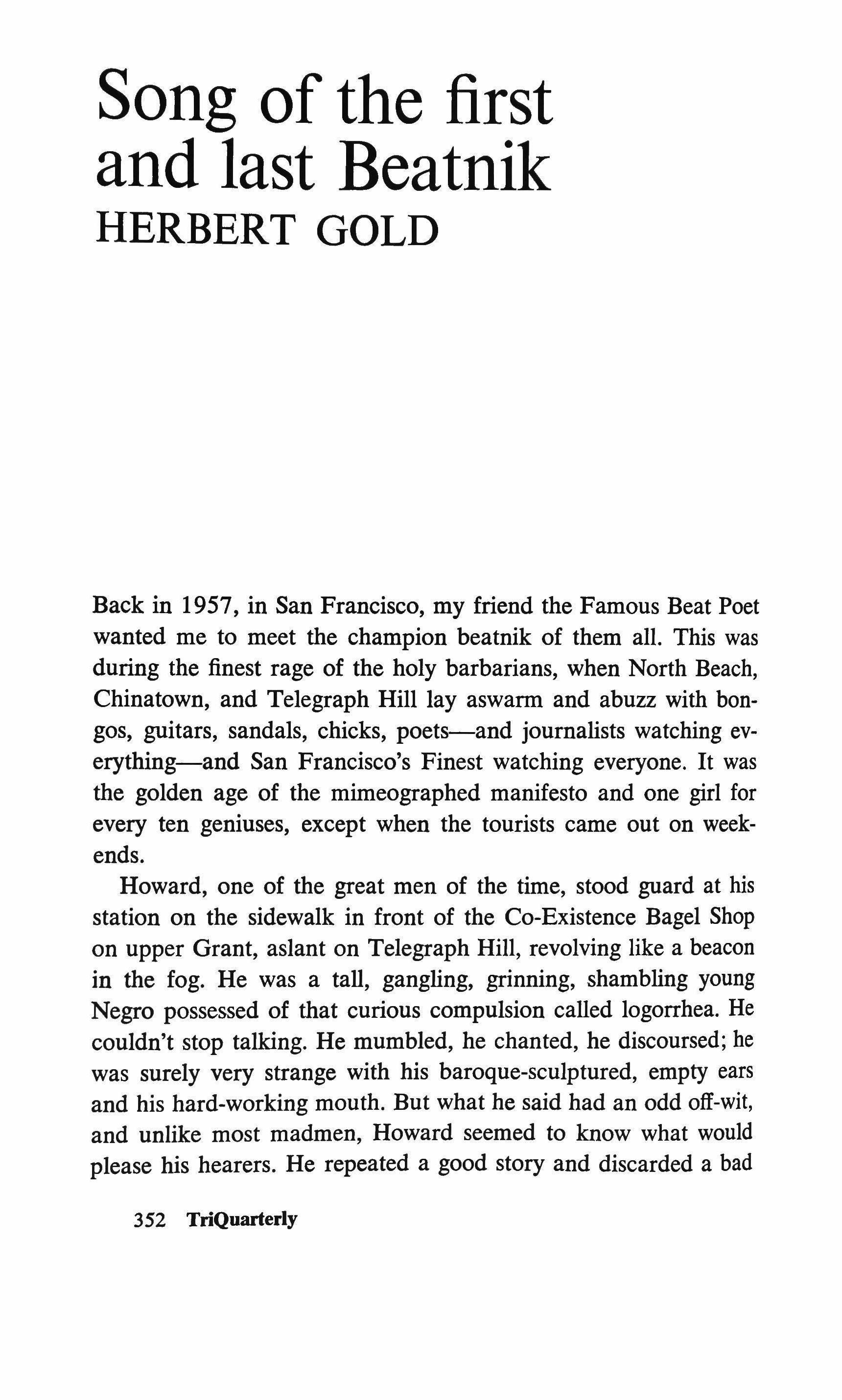
Back in 1957, in San Francisco, my friend the Famous Beat Poet wanted me to meet the champion beatnik of them all. This was during the finest rage of the holy barbarians, when North Beach, Chinatown, and Telegraph Hill lay aswarm and abuzz with bongos, guitars, sandals, chicks, poets-and journalists watching everything-and San Francisco's Finest watching everyone. It was the golden age of the mimeographed manifesto and one girl for every ten geniuses, except when the tourists came out on weekends.
Howard, one of the great men of the time, stood guard at his station on the sidewalk in front of the Co-Existence Bagel Shop on upper Grant, aslant on Telegraph Hill, revolving like a beacon in the fog. He was a tall, gangling, grinning, shambling young Negro possessed of that curious compulsion called logorrhea. He couldn't stop talking. He mumbled, he chanted, he discoursed; he was surely very strange with his baroque-sculptured, empty ears and his hard-working mouth. But what he said had an odd off-wit, and unlike most madmen, Howard seemed to know what would please his hearers. He repeated a good story and discarded a bad
352 TriQuartedy
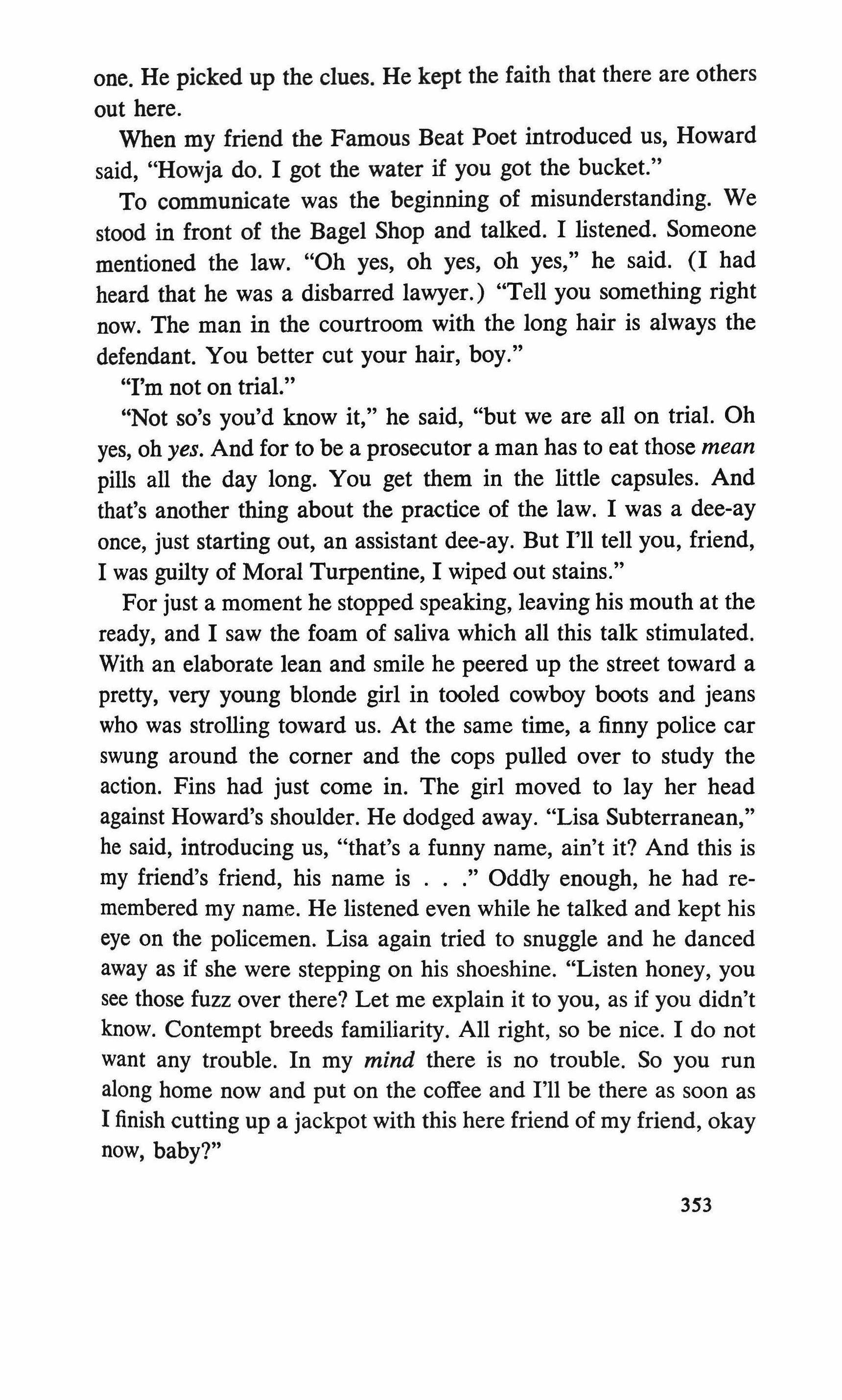
one. He picked up the clues. He kept the faith that there are others out here.
When my friend the Famous Beat Poet introduced us, Howard said, "Howja do. I got the water if you got the bucket."
To communicate was the beginning of misunderstanding. We stood in front of the Bagel Shop and talked. I listened. Someone mentioned the law. "Oh yes, oh yes, oh yes," he said. (I had heard that he was a disbarred lawyer.) "Tell you something right now. The man in the courtroom with the long hair is always the defendant. You better cut your hair, boy."
"I'm not on trial."
"Not so's you'd know it," he said, "but we are all on trial. Oh yes, oh yes. And for to be a prosecutor a man has to eat those mean pills all the day long. You get them in the little capsules. And that's another thing about the practice of the law. I was a dee-ay once, just starting out, an assistant dee-ay. But I'll tell you, friend, I was guilty of Moral Turpentine, I wiped out stains."
For just a moment he stopped speaking, leaving his mouth at the ready, and I saw the foam of saliva which all this talk stimulated. With an elaborate lean and smile he peered up the street toward a pretty, very young blonde girl in tooled cowboy boots and jeans who was strolling toward us. At the same time, a finny police car swung around the corner and the cops pulled over to study the action. Fins had just come in. The girl moved to lay her head against Howard's shoulder. He dodged away. "Lisa Subterranean," he said, introducing us, "that's a funny name, ain't it? And this is my friend's friend, his name is Oddly enough, he had remembered my name. He listened even while he talked and kept his eye on the policemen. Lisa again tried to snuggle and he danced away as if she were stepping on his shoeshine. "Listen honey, you see those fuzz over there? Let me explain it to you, as if you didn't know. Contempt breeds familiarity. All right, so be nice. I do not want any trouble. In my mind there is no trouble. So you run along home now and put on the coffee and I'll be there as soon as I finish cutting up a jackpot with this here friend of my friend, okay now, baby?"
353

The girl ambled off. The cops looked sad. One blew his nose noisily, wadded up the Kleenex, and dropped it in our direction. The other one took his clipboard down and sat writing nothing. Howard smiled at me and said, "Sometimes I think I got the bucket and the water, but the most of the time, I just got the water and it run through my hands."
Howard had several wives and many children; he had many girlfriends; he was chosen more than he chose. He was a renowned expert. Self-selected disciples fell by the Bagel Shop and chose him to eat with them; he ate. Girls came by and chose him to befriend them; he gave them a meaning in life and a revenge against parents. He was a maestro without a baton, a guru before krispie gurus came in packages from India. But what he really liked was to converse, just the simple flow, as birds sang in those distant mornings before DDT. It was his art form-like sneezing for a frustrated cop. Later there were those who claimed that Lenny Bruce was a better talker than Howard, but in 1957 Howard took the singles championship at monologue, standing and indoor, strolling and outdoor. He also carried sugar cubes in his pocket, stolen from the terrace of Enrico's Coffee House, to feed to beatnik, Italian, and Chinese kids on the street. And it was said that he had written a children's book, "The Cultivated Young Person's Garden of Hemp," but this was probably an example of the heavy exaggeration of the Grant Avenue scene in those days. "On the Road" had replaced Senator McCarthy as a source of awe.
In 1960 the Bagel Shop was closed down (hassles, energy loss); the fickle beatniks were exchanging their guitars and bongos for washer-driers; an interval of complaint was passing, and the period of protest, peace march, Peace Corps, and civil rights was on its way. The few beatniks still shambling in the streets were morose, lonely, and astigmatic; they did not see that they were the sediment left by history. The San Francisco police, the end of the Eisenhower epoch, and the dynamics of their style had done in the holy barbarians. But there remained, of course, the nuts, the nostalgiaridden, the rear-guard tourists, and the traditional bohemians who assimilated some of the beat ways. So there was a certain con-
354
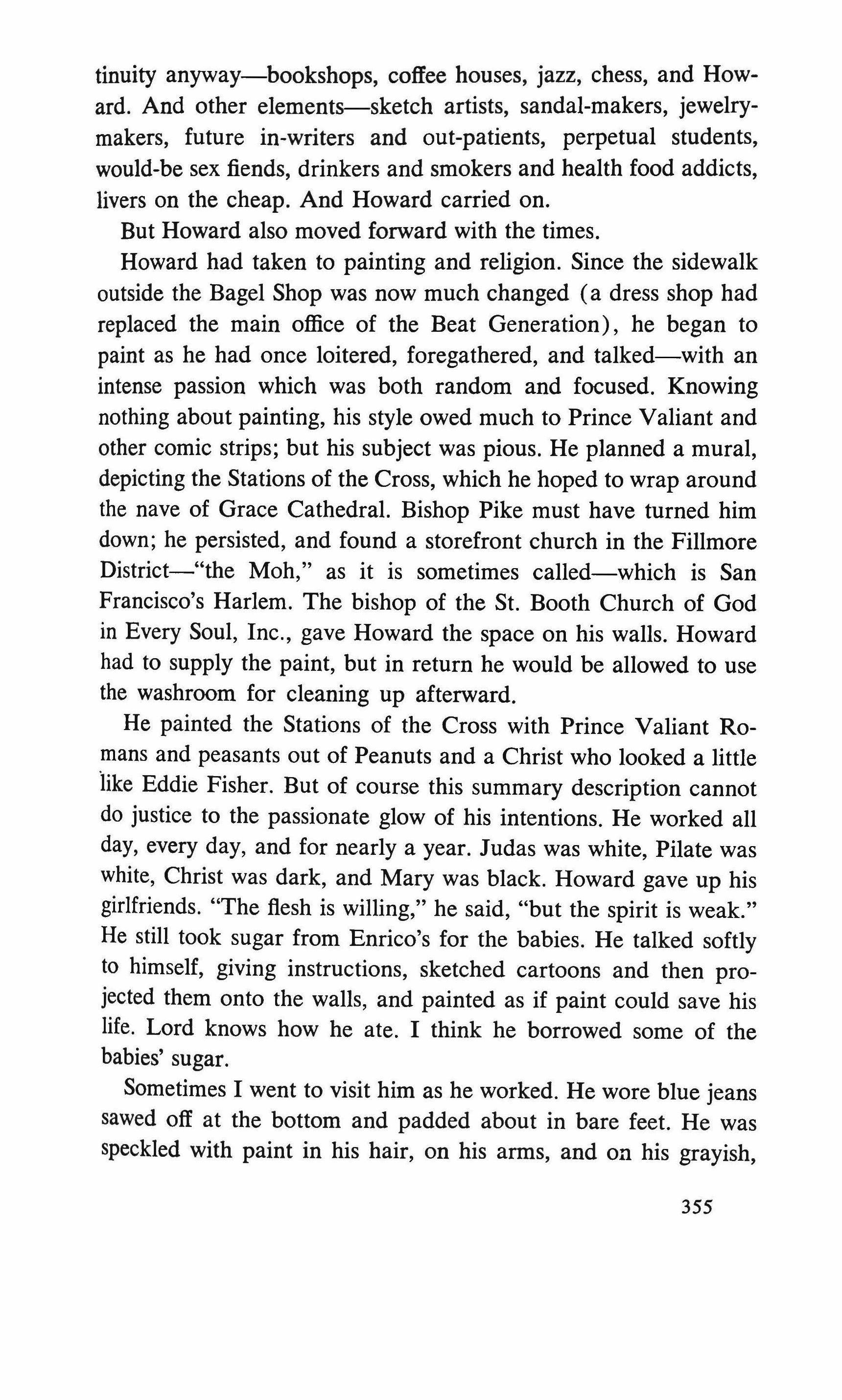
tinuity anyway-bookshops, coffee houses, jazz, chess, and Howard. And other elements-sketch artists, sandal-makers, jewelrymakers, future in-writers and out-patients, perpetual students, would-be sex fiends, drinkers and smokers and health food addicts, livers on the cheap. And Howard carried on.
But Howard also moved forward with the times.
Howard had taken to painting and religion. Since the sidewalk outside the Bagel Shop was now much changed (a dress shop had replaced the main office of the Beat Generation), he began to paint as he had once loitered, foregathered, and talked-with an intense passion which was both random and focused. Knowing nothing about painting, his style owed much to Prince Valiant and other comic strips; but his subject was pious. He planned a mural, depicting the Stations of the Cross, which he hoped to wrap around the nave of Grace Cathedral. Bishop Pike must have turned him down; he persisted, and found a storefront church in the Fillmore District-"the Moh," as it is sometimes called-which is San Francisco's Harlem. The bishop of the S1. Booth Church of God in Every Soul, Inc., gave Howard the space on his walls. Howard had to supply the paint, but in return he would be allowed to use the washroom for cleaning up afterward.
He painted the Stations of the Cross with Prince Valiant Romans and peasants out of Peanuts and a Christ who looked a little like Eddie Fisher. But of course this summary description cannot do justice to the passionate glow of his intentions. He worked all day, every day, and for nearly a year. Judas was white, Pilate was white, Christ was dark, and Mary was black. Howard gave up his girlfriends. "The flesh is willing," he said, "but the spirit is weak." He still took sugar from Enrico's for the babies. He talked softly to himself, giving instructions, sketched cartoons and then projected them onto the walls, and painted as if paint could save his life. Lord knows how he ate. I think he borrowed some of the babies' sugar.
Sometimes I went to visit him as he worked. He wore blue jeans sawed off at the bottom and padded about in bare feet. He was speckled with paint in his hair, on his arms, and on his grayish, 355

horny toes. "Don't you get tired, standing up and reaching at the wall all day?" I asked him.
"It's easier'n sitting down if you have hemorrhoids or piles, and I have hemorrhoids and piles," he said. "I wish you wouldn't bother me with jivey questions like this was a courtroom. You see that Judas?"
"Yes."
"Negative. You don't see that Judas."
But I did. Judas was white. "What about that Judas?" I asked.
"You don't see him because I have trouble getting the expression. I ain't very good on the expressions. They come out stiff and cold. I ain't got the water."
He may not have had the water, but he almost finished the mural. Somehow, in the story of the Cross, he included lilacs, ailanthus trees, dusty roads, breezes blowing, the country of the South. There were meadows and distant hills. You could almost hear music-harmonicas, guitars. In the foreground was enacted the tragic tale, overwhelming the dreamy past in his soul with a set of fierce panels which covered three walls of the church. Within the intense circuit of his painting, Holy Rollers rolled and barkers barked and a falsetto bass-baritone bishop shrieked curses and warnings at his parishioners, promising doom three times a week, once each on Saturday and Sunday evenings, with a matinee Sunday afternoons. Soon the minister, Bishop Willy Bedford, brought darkness into Howard's life, and rage, and misery, and a trouble without end.
Someone told Bishop Willy that Howard was a lawyer and a mess-up, some kind of beatnik legal nut, and that he would surely demand payment for his year's work on the Stations of the Cross. Bishop Willy roared with indignation. An artist? For God? Money? "Mammon, oh Mammon!" he howled. He howled this word so often that the Deacon answered to the name and began sweeping, but this time Bishop Willy's decision against sin had immediate practical consequences. By executive order Howard was barred from the St. Booth Church of God in Every Soul, Inc. Howard came to work next morning to find the door locked and
356

three strong men waiting. They explained. He asked to use the telephone to call Bishop Willy. They explained again, and added that he could not use the pay telephone in the lobby. Mammon, the Deacon, stood there with his broom to give the devil a jab if necessary.
Howard went to the record shop two doors down and called Bishop Willy. The bishop screamed "Mammon!" at him. Howard, worried about the last problems of his mural, went home to brood. There were two important issues in his mind at this moment. He wanted to finish the Stations. And he began to fear that the bishop would have the mural painted out-ruining his life's labor, the vision and hope which had finally brought him regular hours and a sense of meaning. Even his speech had slowed down in recent months. He knew he was growing well, less sick; he was a mere sinner; the bishop had no right to deny God's will, working through him to create a masterpiece of art and a control on the flow of words. He could smell green and dusty roads when he painted; he was finding his way to putting human expression on the faces of Jews, Romans, Pharisees, women, judges. Bishop Willy had no such right.
He returned to the church the next morning, having spent a sleepless night conversing with himself, and again demanded admittance. "No," said the guards. Their arms in short-sleeved shirts were folded over their chests. No unnecessary violence was their collective plan. "Go way, man," said Mammon, choosing up sides with himself on the broom. Right hand won.
Howard heard noises within. Was some non-union painter smearing pink wall paint over his Saviour? He thought he could hear dropc1oths being dragged. He thought he heard laughter. Howard flung himself upon the guards and without much trouble -his strength was as the strength of ten-broke through the line of mercenaries and past the Deacon's broom. Inside, he bolted the door while they consulted without on the sidewalk. There was no one in the church. He had imagined the sounds of destruction and profanation. So much the better. He ran cold water on his bruised hands, stirred up the thickened
357
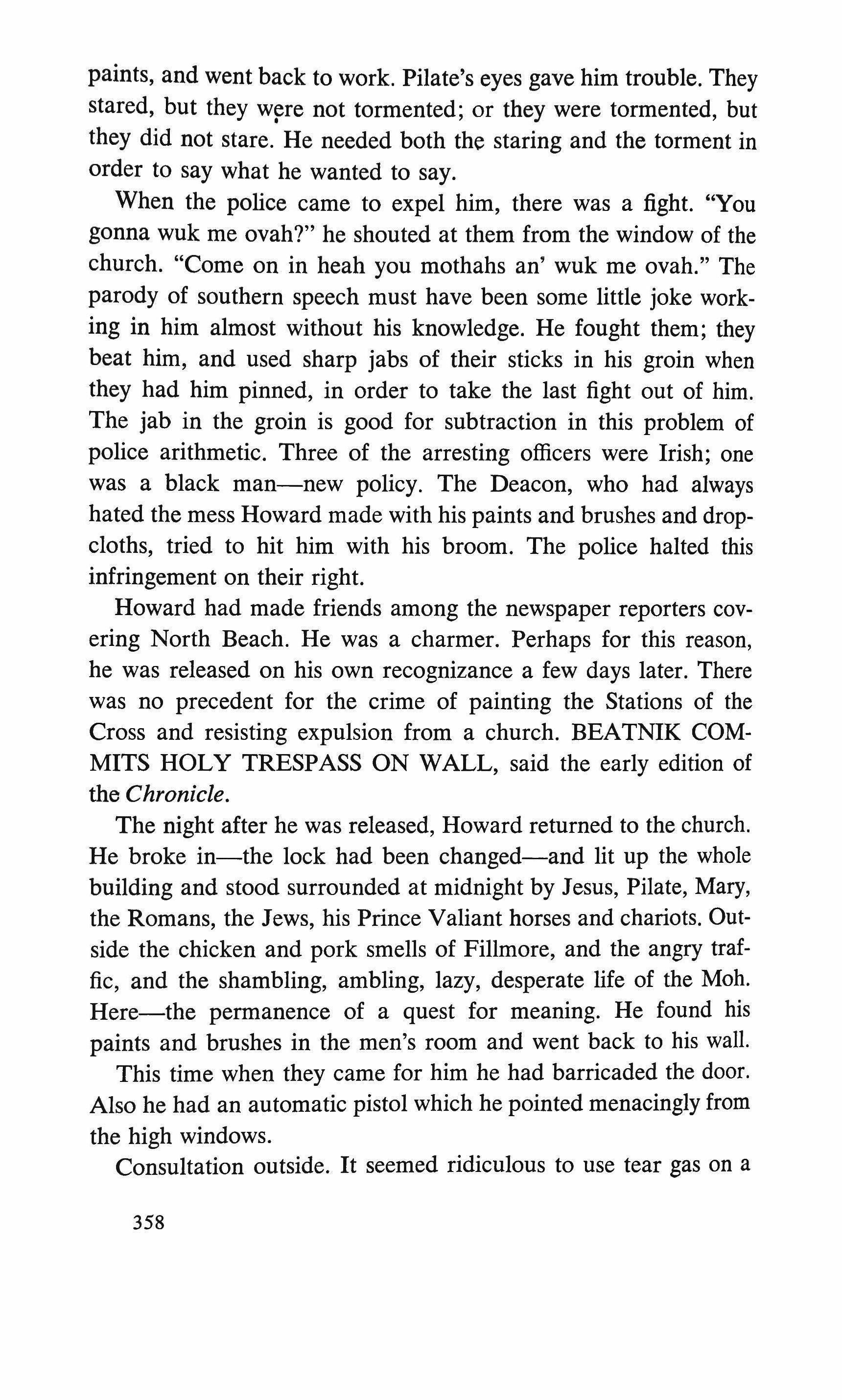
paints, and went back to work. Pilate's eyes gave him trouble. They stared, but they were not tormented; or they were tormented, but they did not stare. He needed both the staring and the torment in order to say what he wanted to say.
When the police came to expel him, there was a fight. "You gonna wuk me ovah?" he shouted at them from the window of the church. "Come on in heah you mothahs an' wuk me ovah." The parody of southern speech must have been some little joke working in him almost without his knowledge. He fought them; they beat him, and used sharp jabs of their sticks in his groin when they had him pinned, in order to take the last fight out of him. The jab in the groin is good for subtraction in this problem of police arithmetic. Three of the arresting officers were Irish; one was a black man-new policy. The Deacon, who had always hated the mess Howard made with his paints and brushes and dropcloths, tried to hit him with his broom. The police halted this infringement on their right.
Howard had made friends among the newspaper reporters covering North Beach. He was a charmer. Perhaps for this reason, he was released on his own recognizance a few days later. There was no precedent for the crime of painting the Stations of the Cross and resisting expulsion from a church. BEATNIK COMMITS HOLY TRESPASS ON WALL, said the early edition of the Chronicle.
The night after he was released, Howard returned to the church. He broke in-the lock had been changed-and lit up the whole building and stood surrounded at midnight by Jesus, Pilate, Mary, the Romans, the Jews, his Prince Valiant horses and chariots. Outside the chicken and pork smells of Fillmore, and the angry traffic, and the shambling, ambling, lazy, desperate life of the Moh. Here-the permanence of a quest for meaning. He found his paints and brushes in the men's room and went back to his wall. This time when they came for him he had barricaded the door. Also he had an automatic pistol which he pointed menacingly from the high windows.
Consultation outside. It seemed ridiculous to use tear gas on a
358
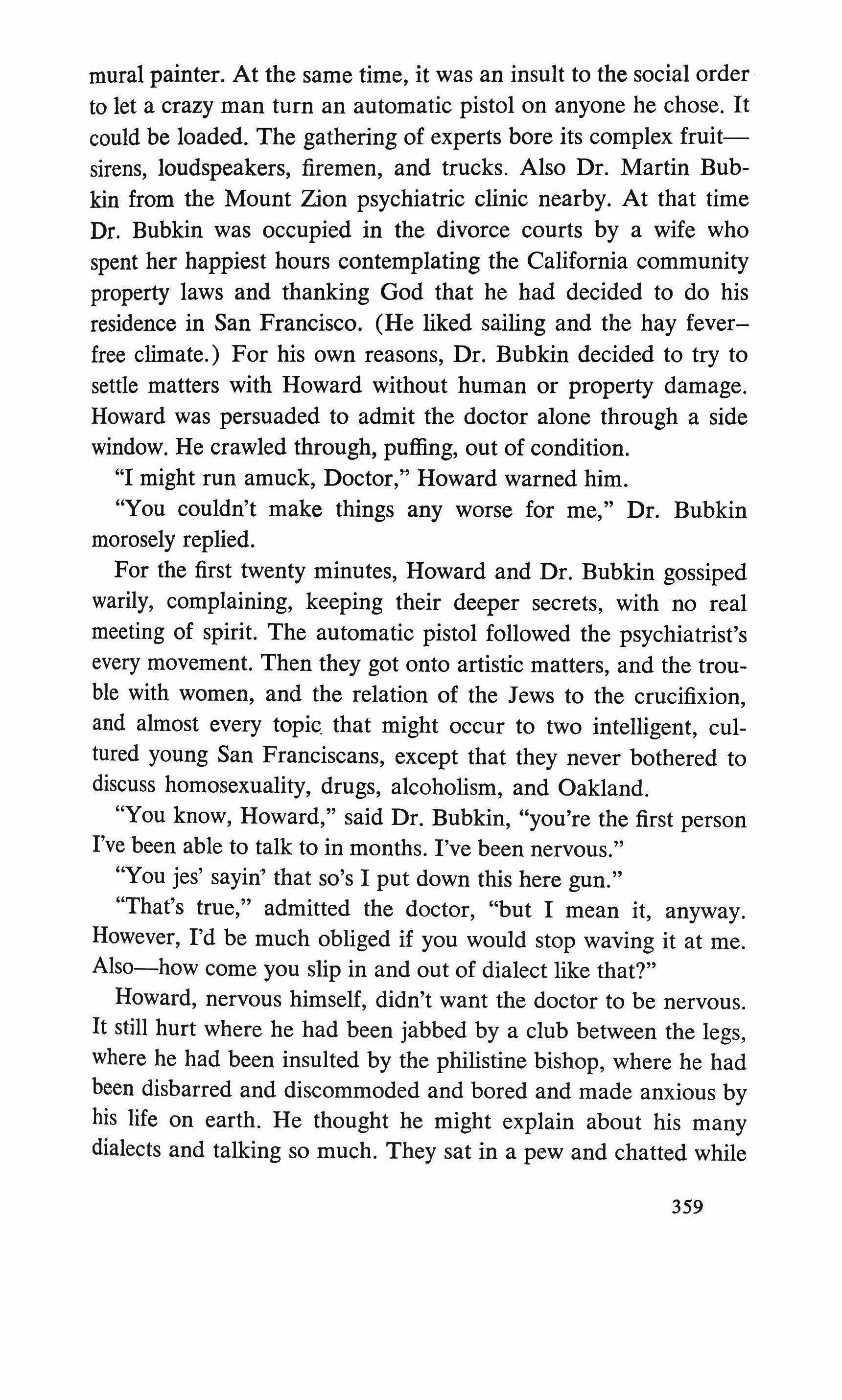
mural painter. At the same time, it was an insult to the social order to let a crazy man turn an automatic pistol on anyone he chose. It could be loaded. The gathering of experts bore its complex fruitsirens, loudspeakers, firemen, and trucks. Also Dr. Martin Bubkin from the Mount Zion psychiatric clinic nearby. At that time Dr. Bubkin was occupied in the divorce courts by a wife who spent her happiest hours contemplating the California community property laws and thanking God that he had decided to do his residence in San Francisco. (He liked sailing and the hay feverfree climate.) For his own reasons, Dr. Bubkin decided to try to settle matters with Howard without human or property damage. Howard was persuaded to admit the doctor alone through a side window. He crawled through, puffing, out of condition.
"I might run amuck, Doctor," Howard warned him.
"You couldn't make things any worse for me," Dr. Bubkin morosely replied.
For the first twenty minutes, Howard and Dr. Bubkin gossiped warily, complaining, keeping their deeper secrets, with no real meeting of spirit. The automatic pistol followed the psychiatrist's every movement. Then they got onto artistic matters, and the trouble with women, and the relation of the Jews to the crucifixion, and almost every topic, that might occur to two intelligent, cultured young San Franciscans, except that they never bothered to discuss homosexuality, drugs, alcoholism, and Oakland.
"You know, Howard," said Dr. Bubkin, "you're the first person I've been able to talk to in months. I've been nervous."
"You jes' sayin' that so's I put down this here gun."
"That's true," admitted the doctor, "but I mean it, anyway. However, I'd be much obliged if you would stop waving it at me. Also-how come you slip in and out of dialect like that?"
Howard, nervous himself, didn't want the doctor to be nervous. It still hurt where he had been jabbed by a club between the legs, where he had been insulted by the philistine bishop, where he had been disbarred and discommoded and bored and made anxious by his life on earth. He thought he might explain about his many dialects and talking so much. They sat in a pew and chatted while 359
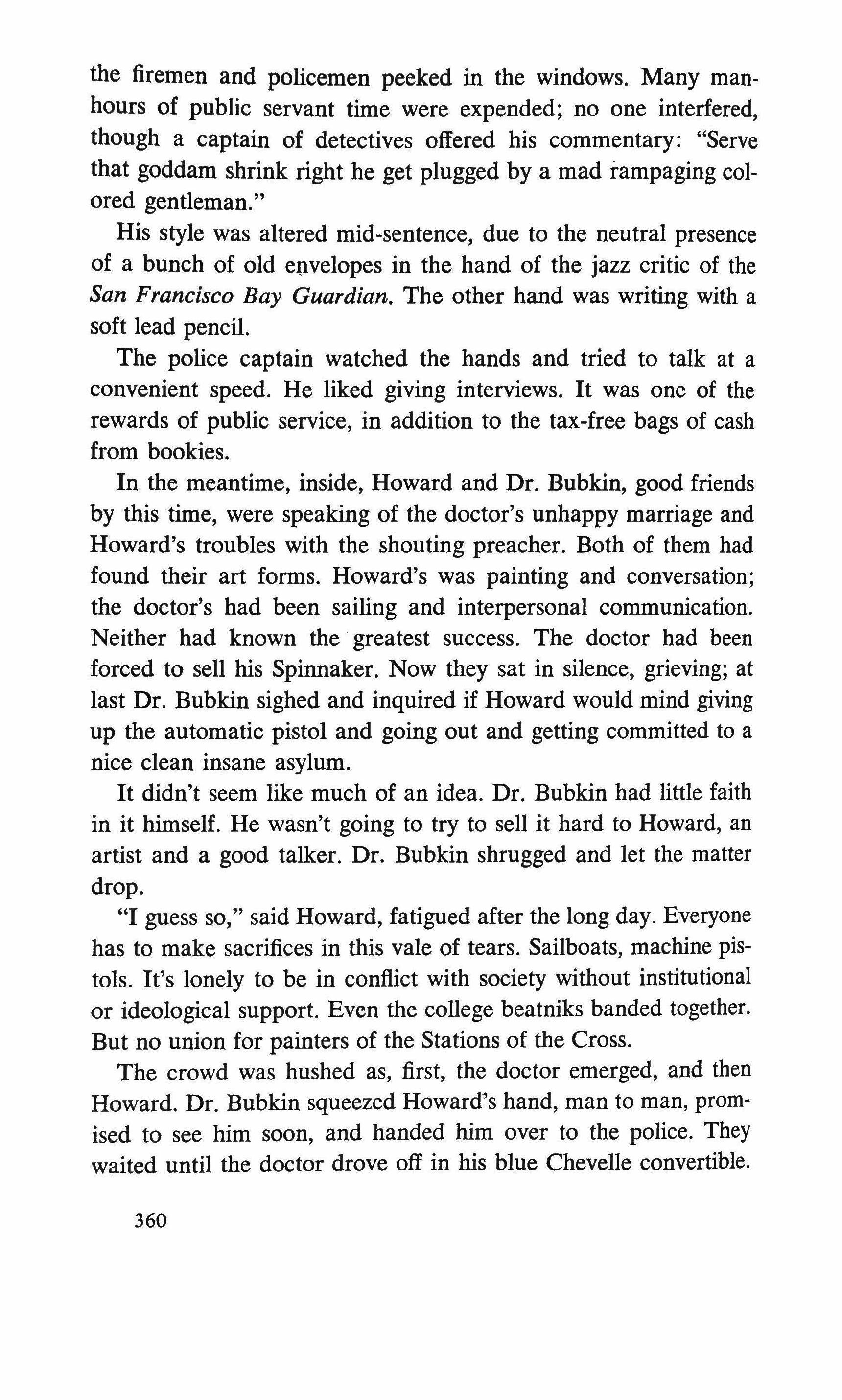
the firemen and policemen peeked in the windows. Many manhours of public servant time were expended; no one interfered, though a captain of detectives offered his commentary: "Serve that goddam shrink right he get plugged by a mad rampaging colored gentleman."
His style was altered mid-sentence, due to the neutral presence of a bunch of old envelopes in the hand of the jazz critic of the San Francisco Bay Guardian. The other hand was writing with a soft lead pencil.
The police captain watched the hands and tried to talk at a convenient speed. He liked giving interviews. It was one of the rewards of public service, in addition to the tax-free bags of cash from bookies.
In the meantime, inside, Howard and Dr. Bubkin, good friends by this time, were speaking of the doctor's unhappy marriage and Howard's troubles with the shouting preacher. Both of them had found their art forms. Howard's was painting and conversation; the doctor's had been sailing and interpersonal communication. Neither had known the greatest success. The doctor had been forced to sell his Spinnaker. Now they sat in silence, grieving; at last Dr. Bubkin sighed and inquired if Howard would mind giving up the automatic pistol and going out and getting committed to a nice clean insane asylum.
It didn't seem like much of an idea. Dr. Bubkin had little faith in it himself. He wasn't going to try to sell it hard to Howard, an artist and a good talker. Dr. Bubkin shrugged and let the matter drop.
"I guess so," said Howard, fatigued after the long day. Everyone has to make sacrifices in this vale of tears. Sailboats, machine pistols. It's lonely to be in conflict with society without institutional or ideological support. Even the college beatniks banded together. But no union for painters of the Stations of the Cross.
The crowd was hushed as, first, the doctor emerged, and then Howard. Dr. Bubkin squeezed Howard's hand, man to man, promised to see him soon, and handed him over to the police. They waited until the doctor drove off in his blue Chevelle convertible.
360
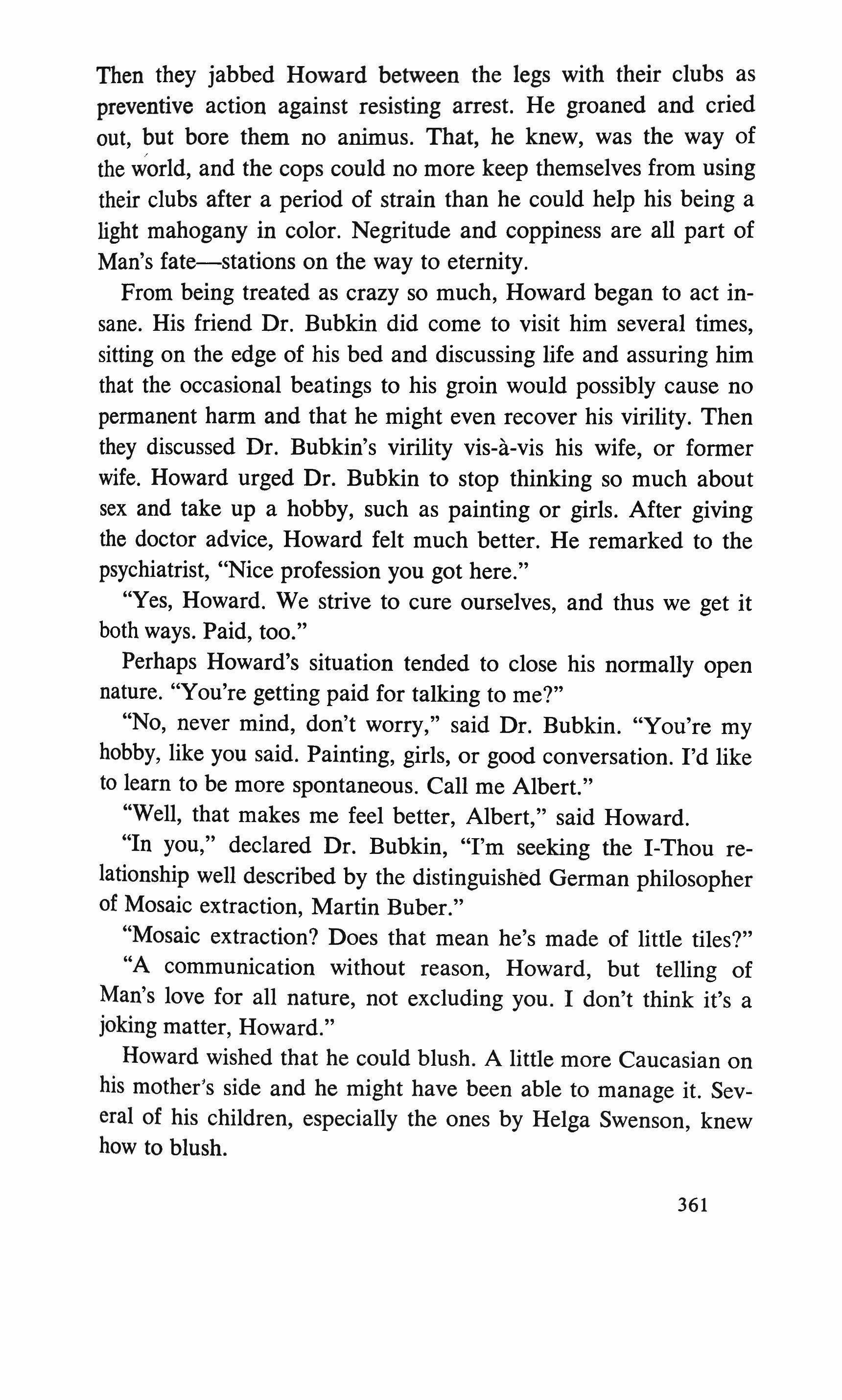
Then they jabbed Howard between the legs with their clubs as preventive action against resisting arrest. He groaned and cried out, but bore them no animus. That, he knew, was the way of the world, and the cops could no more keep themselves from using their clubs after a period of strain than he could help his being a light mahogany in color. Negritude and coppiness are all part of Man's fate-stations on the way to eternity.
From being treated as crazy so much, Howard began to act insane. His friend Dr. Bubkin did come to visit him several times, sitting on the edge of his bed and discussing life and assuring him that the occasional beatings to his groin would possibly cause no permanent harm and that he might even recover his virility. Then they discussed Dr. Bubkin's virility vis-a-vis his wife, or former wife. Howard urged Dr. Bubkin to stop thinking so much about sex and take up a hobby, such as painting or girls. After giving the doctor advice, Howard felt much better. He remarked to the psychiatrist, "Nice profession you got here."
"Yes, Howard. We strive to cure ourselves, and thus we get it both ways. Paid, too."
Perhaps Howard's situation tended to close his normally open nature. "You're getting paid for talking to me?"
"No, never mind, don't worry," said Dr. Bubkin. "You're my hobby, like you said. Painting, girls, or good conversation. I'd like to learn to be more spontaneous. Call me Albert."
"Well, that makes me feel better, Albert," said Howard.
"In you," declared Dr. Bubkin, "I'm seeking the I-Thou relationship well described by the distinguished German philosopher of Mosaic extraction, Martin Buber."
"Mosaic extraction? Does that mean he's made of little tiles?"
"A communication without reason, Howard, but telling of Man's love for all nature, not excluding you. I don't think it's a joking matter, Howard."
Howard wished that he could blush. A little more Caucasian on his mother's side and he might have been able to manage it. Several of his children, especially the ones by Helga Swenson, knew how to blush.
361
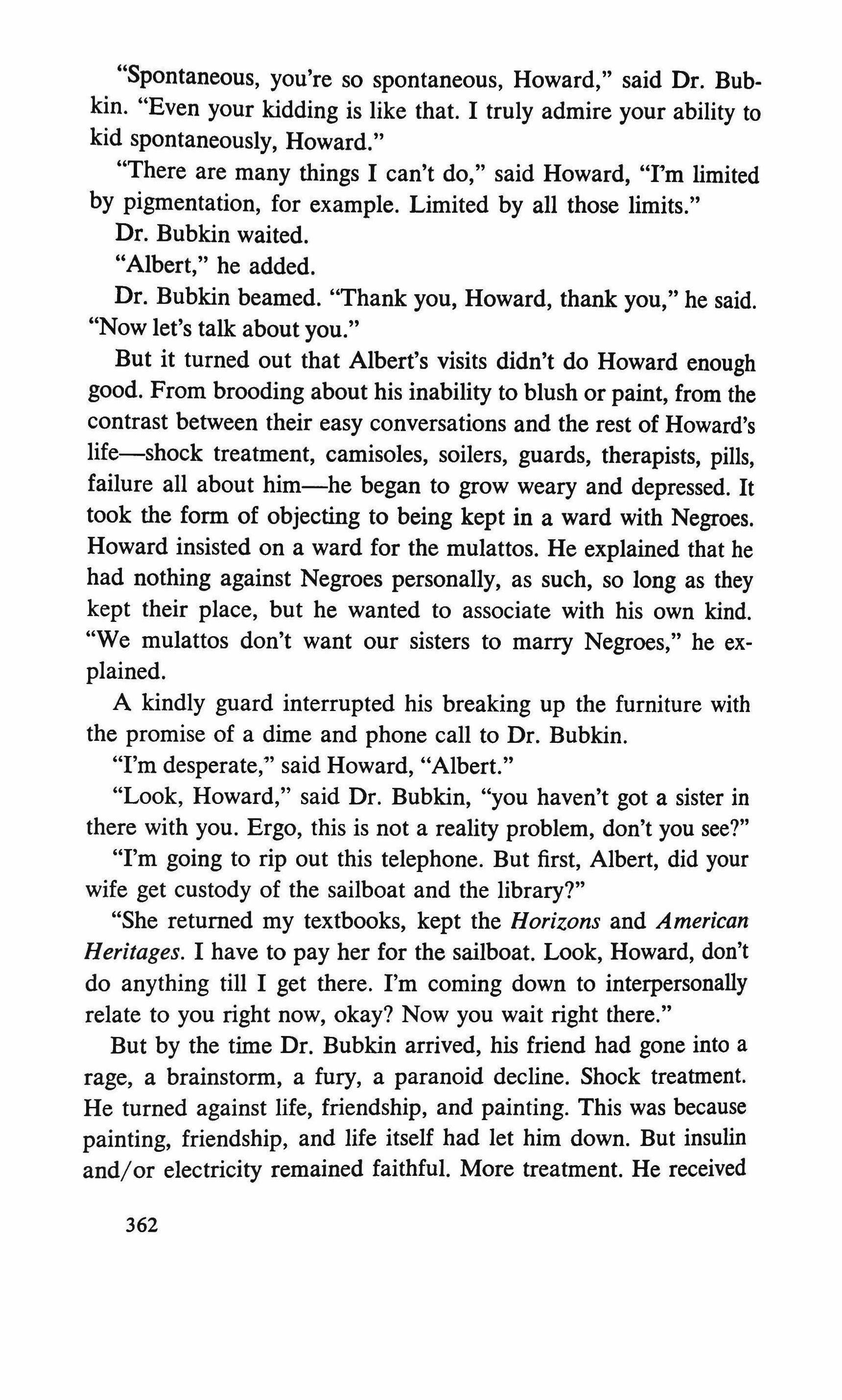
"Spontaneous, you're so spontaneous, Howard," said Dr. Bubkin. "Even your kidding is like that. I truly admire your ability to kid spontaneously, Howard."
"There are many things I can't do," said Howard, "I'm limited by pigmentation, for example. Limited by all those limits."
Dr. Bubkin waited.
"Albert," he added.
Dr. Bubkin beamed. "Thank you, Howard, thank you," he said. "Now let's talk about you."
But it turned out that Albert's visits didn't do Howard enough good. From brooding about his inability to blush or paint, from the contrast between their easy conversations and the rest of Howard's life-shock treatment, camisoles, soilers, guards, therapists, pills, failure all about him-he began to grow weary and depressed. It took the form of objecting to being kept in a ward with Negroes. Howard insisted on a ward for the mulattos. He explained that he had nothing against Negroes personally, as such, so long as they kept their place, but he wanted to associate with his own kind. "We mulattos don't want our sisters to marry Negroes," he explained.
A kindly guard interrupted his breaking up the furniture with the promise of a dime and phone call to Dr. Bubkin.
"I'm desperate," said Howard, "Albert."
"Look, Howard," said Dr. Bubkin, "you haven't got a sister in there with you. Ergo, this is not a reality problem, don't you see?"
"I'm going to rip out this telephone. But first, Albert, did your wife get custody of the sailboat and the library?"
"She returned my textbooks, kept the Horizons and American Heritages. I have to pay her for the sailboat. Look, Howard, don't do anything till I get there. I'm coming down to interpersonally relate to you right now, okay? Now you wait right there."
But by the time Dr. Bubkin arrived, his friend had gone into a rage, a brainstorm, a fury, a paranoid decline. Shock treatment. He turned against life, friendship, and painting. This was because painting, friendship, and life itself had let him down. But insulin and/or electricity remained faithful. More treatment. He received
362
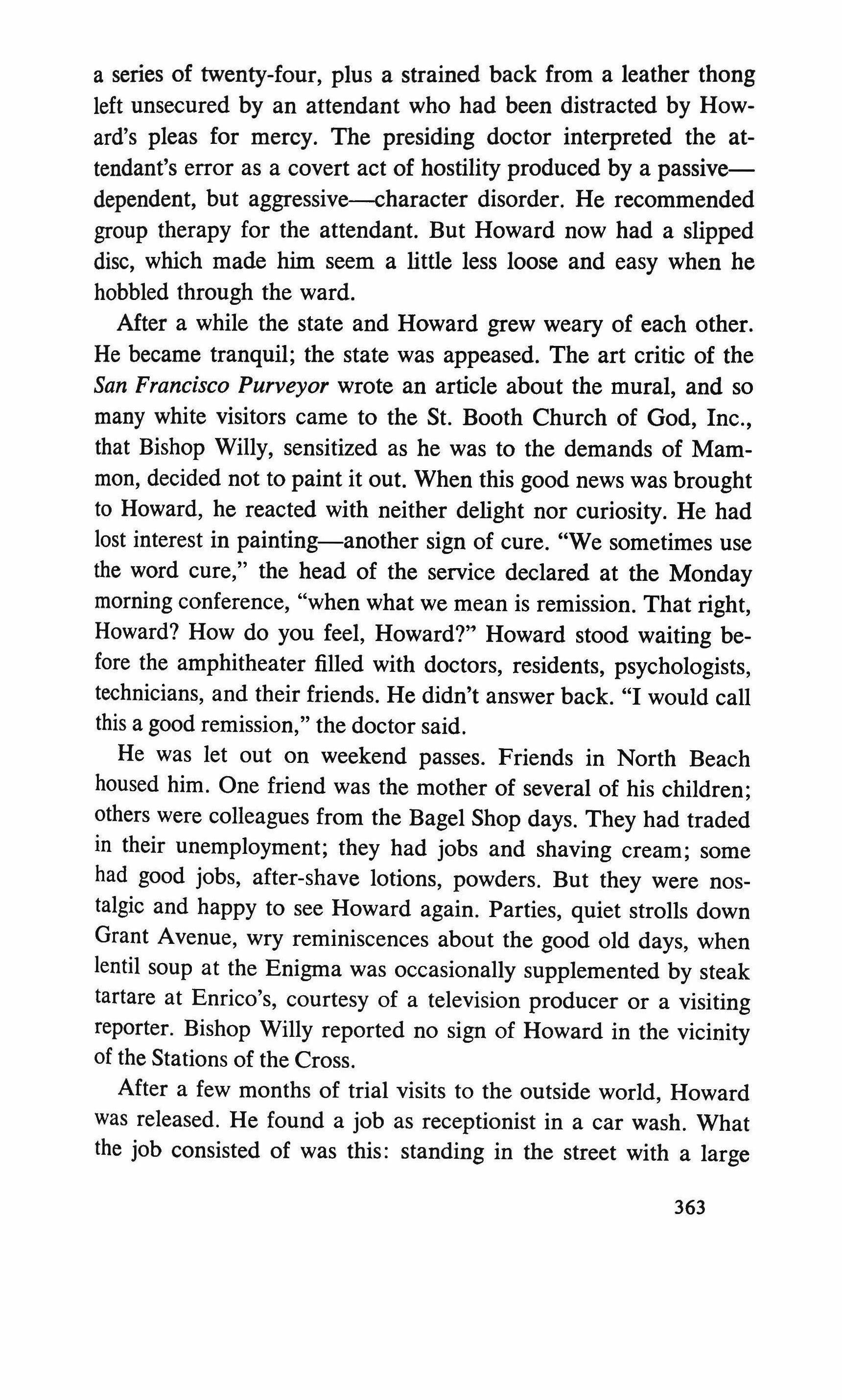
a series of twenty-four, plus a strained back from a leather thong left unsecured by an attendant who had been distracted by Howard's pleas for mercy. The presiding doctor interpreted the attendant's error as a covert act of hostility produced by a passivedependent, but aggressive-character disorder. He recommended group therapy for the attendant. But Howard now had a slipped disc, which made him seem a little less loose and easy when he hobbled through the ward.
After a while the state and Howard grew weary of each other. He became tranquil; the state was appeased. The art critic of the San Francisco Purveyor wrote an article about the mural, and so many white visitors came to the St. Booth Church of God, Inc., that Bishop Willy, sensitized as he was to the demands of Mammon, decided not to paint it out. When this good news was brought to Howard, he reacted with neither delight nor curiosity. He had lost interest in painting-another sign of cure. "We sometimes use the word cure," the head of the service declared at the Monday morning conference, "when what we mean is remission. That right, Howard? How do you feel, Howard?" Howard stood waiting before the amphitheater filled with doctors, residents, psychologists, technicians, and their friends. He didn't answer back. "I would call this a good remission," the doctor said.
He was let out on weekend passes. Friends in North Beach housed him. One friend was the mother of several of his children; others were colleagues from the Bagel Shop days. They had traded in their unemployment; they had jobs and shaving cream; some had good jobs, after-shave lotions, powders. But they were nostalgic and happy to see Howard again. Parties, quiet strolls down Grant Avenue, wry reminiscences about the good old days, when lentil soup at the Enigma was occasionally supplemented by steak tartare at Enrico's, courtesy of a television producer or a visiting reporter. Bishop Willy reported no sign of Howard in the vicinity of the Stations of the Cross.
After a few months of trial visits to the outside world, Howard was released. He found a job as receptionist in a car wash. What the job consisted of was this: standing in the street with a large 363
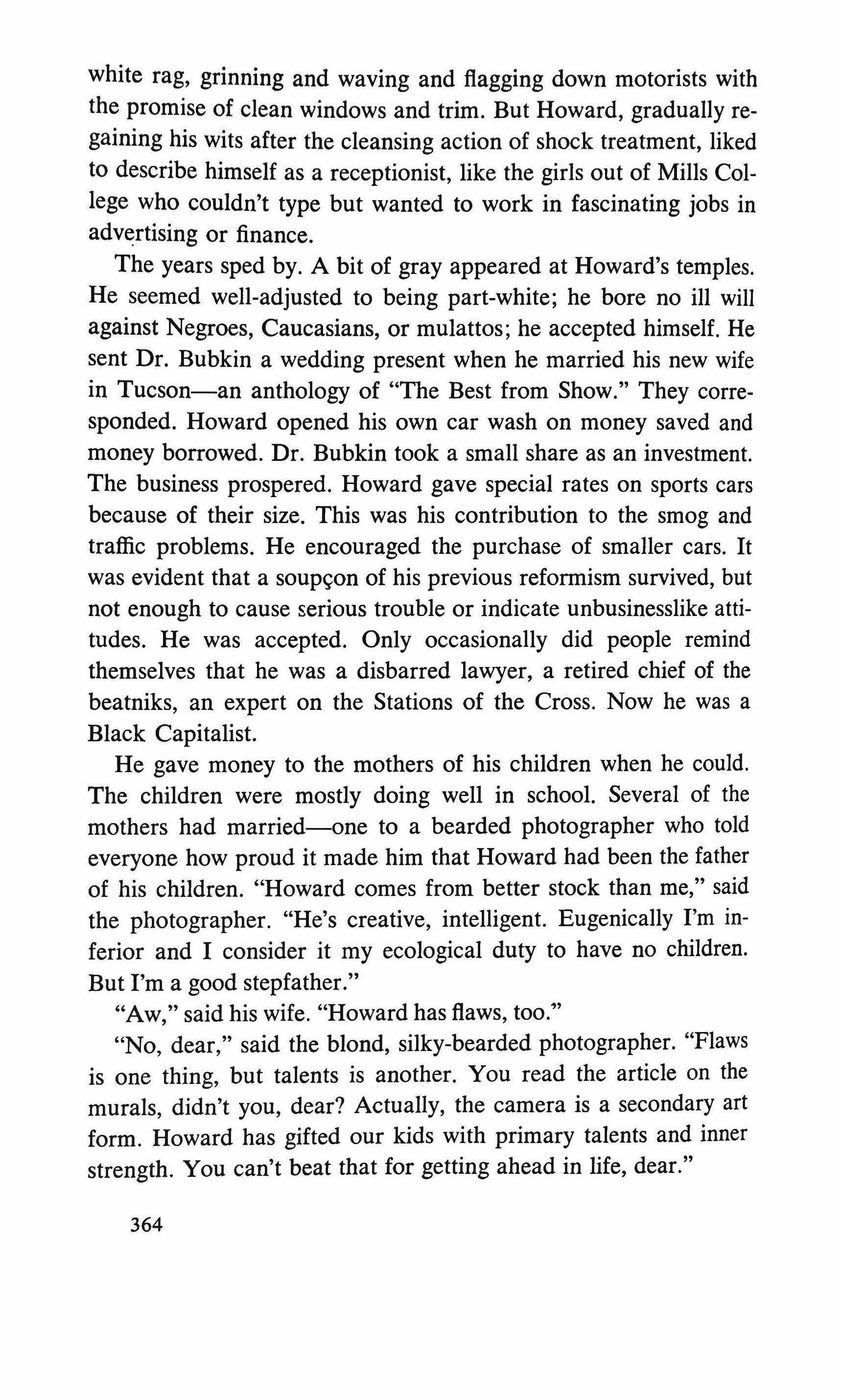
white rag, grinning and waving and flagging down motorists with the promise of clean windows and trim. But Howard, gradually regaining his wits after the cleansing action of shock treatment, liked to describe himself as a receptionist, like the girls out of Mills College who couldn't type but wanted to work in fascinating jobs in advertising or finance.
The years sped by. A bit of gray appeared at Howard's temples. He seemed well-adjusted to being part-white; he bore no ill will against Negroes, Caucasians, or mulattos; he accepted himself. He sent Dr. Bubkin a wedding present when he married his new wife in Tucson-an anthology of "The Best from Show." They corresponded. Howard opened his own car wash on money saved and money borrowed. Dr. Bubkin took a small share as an investment. The business prospered. Howard gave special rates on sports cars because of their size. This was his contribution to the smog and traffic problems. He encouraged the purchase of smaller cars. It was evident that a soupcon of his previous reformism survived, but not enough to cause serious trouble or indicate unbusinesslike attitudes. He was accepted. Only occasionally did people remind themselves that he was a disbarred lawyer, a retired chief of the beatniks, an expert on the Stations of the Cross. Now he was a Black Capitalist.
He gave money to the mothers of his children when he could. The children were mostly doing well in school. Several of the mothers had married-one to a bearded photographer who told everyone how proud it made him that Howard had been the father of his children. "Howard comes from better stock than me," said the photographer. "He's creative, intelligent. Eugenically I'm inferior and I consider it my ecological duty to have no children. But I'm a good stepfather."
"Aw," said his wife. "Howard has flaws, too."
"No, dear," said the blond, silky-bearded photographer. "Flaws is one thing, but talents is another. You read the article on the murals, didn't you, dear? Actually, the camera is a secondary art form. Howard has gifted our kids with primary talents and inner strength. You can't beat that for getting ahead in life, dear."
364

Howard, who occasionally took tea with this happy couple, listened to the discussion with embarrassment. Since he couldn't blush, he took the children out for ice cream cones. He brought back a quart of lemon ice from the Safeway to cool off the parents. Then he continued on his route up Telegraph Hill to Union, where he had a child by a young lady formerly active in SNNC, now getting involved in Women's Lib. She usually wanted to talk to him about the Problem; she wondered if passive resistance is more truly vital than rock-throwing; he sighed and put up with it for the sake of the child. It was his youngest, a boy aged four, and the apple of his eye. He held the boy on his knees and told him stories. He liked to baby-sit while the mother went out passive resisting. Lately she went out Gestetnering-a revolutionary duplicating process.
These strolls among his old friends in North Beach turned out to make more trouble. Perhaps life itself, plus the risks of .having a personality and a soul, were the undoing of Howard. After the end of the beat movement, the new San Francisco bohemia and the old bohemia and the debris of the beatniks conspired to keep North Beach green. Hip was beginning to happen. Two bookstores, the Discovery and City Lights, still operated on Columbus Avenue near Broadway, separated by the Vesuvio Bar, which advertised its slogan, "We Are Itching to Get Away from Portland, Oregon," and kept booths for psychiatrists who wanted to study the clientele. The drug of choice became methedrine sulphate, a stimulant which constricts the blood vessels, causing rich fantasies and impotence, a confusing congeries of sensation. The methedrine addicts would steal books from the Discovery, sell them at City Lights for a few cents; then the owners of City Lights would return the books, or vice versa. This was a service the rival bookstores provided for each other. Otherwise they competed ferociously.
Howard, who had a keen eye for illegality, asked the owner of the Discovery: "Why don't you turn in those speedfreaks?"
"Well, you know "
He watched a thief at City Lights and inquired of Kellogg Kim, the bearded Korean poet and critic who guarded the cash register, 365
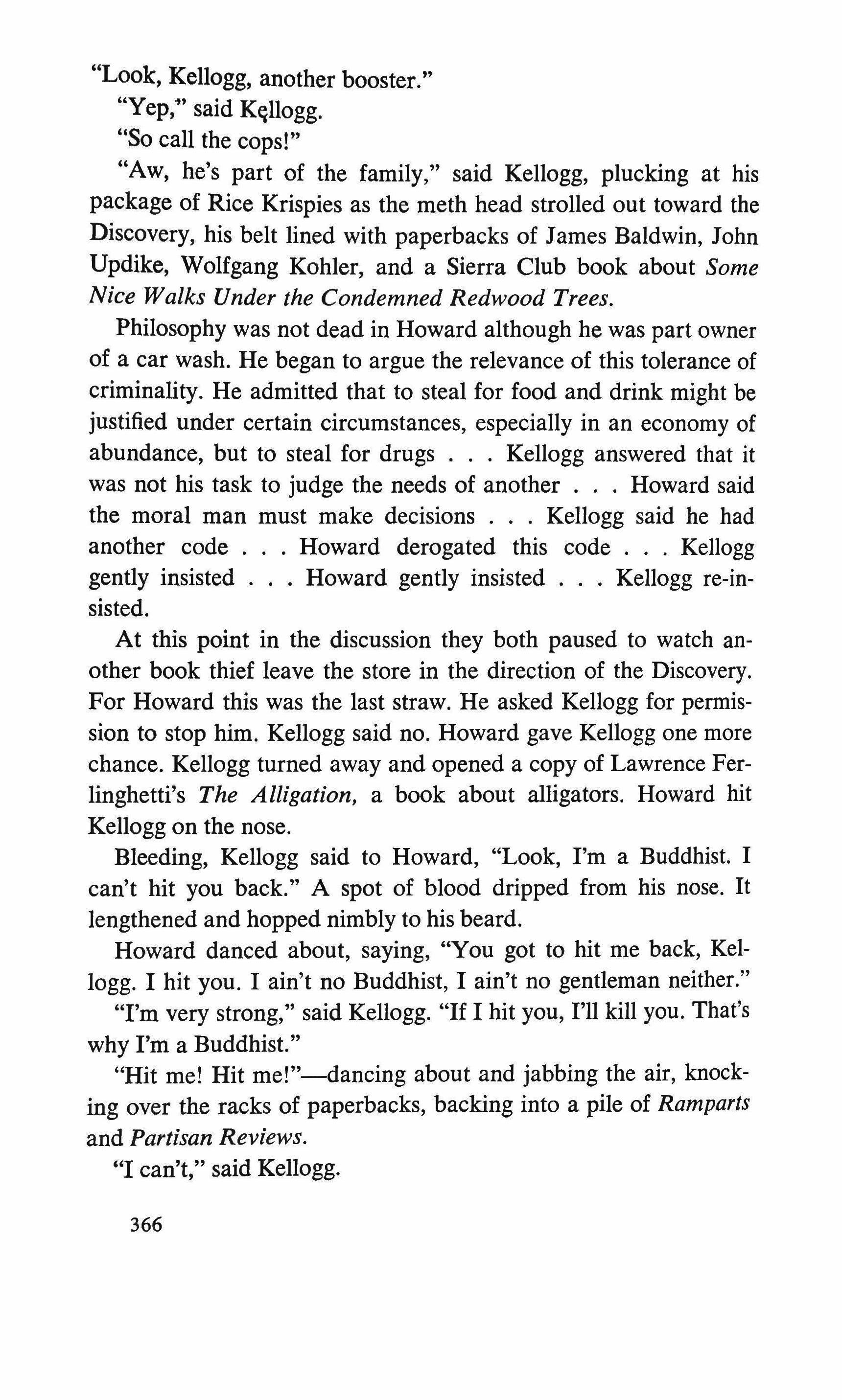
"Look, Kellogg, another booster."
"Yep," said K((llogg.
"So call the cops!"
"Aw, he's part of the family," said Kellogg, plucking at his package of Rice Krispies as the meth head strolled out toward the Discovery, his belt lined with paperbacks of James Baldwin, John Updike, Wolfgang Kohler, and a Sierra Club book about Some Nice Walks Under the Condemned Redwood Trees.
Philosophy was not dead in Howard although he was part owner of a car wash. He began to argue the relevance of this tolerance of criminality. He admitted that to steal for food and drink might be justified under certain circumstances, especially in an economy of abundance, but to steal for drugs Kellogg answered that it was not his task to judge the needs of another Howard said the moral man must make decisions Kellogg said he had another code Howard derogated this code Kellogg gently insisted Howard gently insisted Kellogg re-insisted.
At this point in the discussion they both paused to watch another book thief leave the store in the direction of the Discovery. For Howard this was the last straw. He asked Kellogg for permission to stop him. Kellogg said no. Howard gave Kellogg one more chance. Kellogg turned away and opened a copy of Lawrence Ferlinghetti's The Alligation, a book about alligators. Howard hit Kellogg on the nose.
Bleeding, Kellogg said to Howard, "Look, I'm a Buddhist. I can't hit you back." A spot of blood dripped from his nose. It lengthened and hopped nimbly to his beard.
Howard danced about, saying, "You got to hit me back, Kellogg. I hit you. I ain't no Buddhist, I ain't no gentleman neither."
"I'm very strong," said Kellogg. "If I hit you, I'll kill you. That's why I'm a Buddhist."
"Hit me! Hit me!"-dancing about and jabbing the air, knocking over the racks of paperbacks, backing into a pile of Ramparts and Partisan Reviews.
"I can't," said Kellogg.
366

"Hit me, you yellow-skinned Jap!"
"I'm a Korean. Call me a gook. I'm a Buddhist." Somehow the discussants had been showered with Kellogg's Rice Krispies. They crunched underfoot; they were stuck in the Korean's beard. It looked like a Zen wedding in Battle Creek.
"You mutherfur!" screamed Howard.
Kellogg wiped some of the blood from his nose and beard. He looked at the blood on his shirt. "This stuff stains," he said softly. "But you're a part of the family."
Howard began to cry. He was not touched; he was frustrated. The long period of abstinence from sex, violence, drink, painting, and garrulity had left him fatigued in his soul. If only Kellogg and he could have enjoyed a good old family quarrel, exchanging a few family blows, Howard might have been spared another painful encounter with the police. If non-violence doesn't work, give a man some violence. When Kellogg refused to strike back, Howard went out and stood on the corner of Columbus and Broadway to weep. He attracted a crowd tired of watching the topless dancers at the Condor. Look, black tears, black man weeps! was the general view of matters. He sobbed, he mewled, he showed all the signs of despair. When the police tried to lead him away-the crowd was blocking traffic-he refused to go. They shoved and pushed; he resisted. He held on to the door of the chili-teria.
Oh-oh, there it goes again, a small voice within warned him. Voice unheeded.
He refused to enter the paddy wagon. Voices unheeded.
More sticks to the groin.
A few days in jail, and then removal to Napa for therapy. Friends operated the car wash, but it went to pieces fast. Plumbing and finances all came apart. Howard's charm had kept people churning through for clean cars. The car wash passed into other hands. Howard seemed to be a permanent resident of Napa. Nevertheless, he has attained a certain status as a patient. He enjoys weekend privileges. The last time I saw Howard, he was limping along Broadway with his friend Dr. Bubkin, who visits him whenever he can get to San Francisco. Howard is now a tall, gaunt,
367

gray-haired man who looks like a mild bourgeois with his briefcase, his meticulous but shabby clothes, his tranquil smile and nod -rational. He doesn't have the rheumatiz, but he has a slipped disc. He talks a great deal again; it sounds as if he is doing it on purpose.
"I'd like you to meet my friend Dr. Bubkin," he said, introducmg me.
"We know each other, Howard."
"I forgot. It's not fair."
"Anybody can forget things, Howard."
"I forget too much."
"Well, it'll happen that way, Howard."
He paused and looked toward the fog-shrouded Broadway tunnel. "I had girls, children, business. I had a painting-no, it was murals I did. I had lots of things. I used to be a lawyer. It's not fair."
"Well, what can you do?"
"I used to have the water, all I needed was the bucket. Now-"
The crowd near The Committee swept about us, students, tourists, lovers, hippie strollers filled with the joy of evening. A lovely blonde dropout, maybe sixteen years old, was selling The Barb. There was the smell of wood smoke and the sound of an amplified guitar. The Peppermint Tree invited dancers; the Balkan restaurant offered shishkabob and baklava, dripping with honeyed chopped nuts. Howard wore a tuft of cotton in each ear. He was protecting himself against the ocean damp.
"Now," said Howard, "I'm a mentally disturbed senior citizen. I'm a socially-deprived. I ain't got the water."
368
from The fall into time
E. M. CIORAN

The tree of life
It is not good for man to keep reminding himself that he is man. To brood over oneself is bad enough; to brood over the species, with all the zeal of a fanatic, is worse still-it affords an objective basis, a philosophical alibi for the arbitrary woes of introspection. As long as we masticate our own ego, we have the excuse of indulging a whim; when all egos become the center of an endless rumination, we merely generalize the disadvantages of our own condition, transform our accident into a norm, a universal case. We perceive first the anomaly of sheer existence, and only afterward that of our specific situation: the surprise of being precedes the surprise of being human. Yet the strange character of our state should constitute the primordial datum of our perplexities: it is less natural to be man than, simply, to be. We feel this instinctively; it is the source of our delight each time we manage to sidestep ourselves and participate in the blissful sleep of objects. We are truly ourselves only when we coincide with nothing, not even
TriQuarterly 369

with our own singularity. The curse upon us already tormented our first ancestor, long before he turned to the Tree of Knowledge. Dissatisfied as he may have been with himself, he was even more so with God, Whom he envied without realizing it; the realization came thanks to the good offices of the Tempter, auxiliary rather than author of the Fall. Hitherto Adam had lived in the presentiment of knowledge, a knowledge unconscious of itself, a false innocence ministering to jealousy, that vice generated by trafficking with those more fortunate than ourselves; and Adam trafficked with God, spying on and spied on by Him. Nothing good could come of that.
Of every tree of the garden thou mayest freely eat: but of the tree of the knowledge of good and evil thou shalt not eat: for in the day that thou eatest thereof thou shalt surely die. The warning from on high turned out to be less effective than the whispers from below: a better psychologist, the Serpent carried the day. Man, moreover, had nothing against dying; determined to equal his Creator by knowledge, not by immortality, he showed no desire to approach the Tree of Life, took no interest in it; as Yahweh seemed to realize, since he did not even forbid access to it-why fear the immortality of an ignorant man? But once the ignorant man turned to both trees, once he entered into possession of eter-. nity and knowledge, everything changed. No sooner had Adam tasted the forbidden fruit than God, understanding at last whom He was dealing with, lost His head. By putting the Tree of Knowledge in the middle of the Garden, by boasting of its merits and especially of its dangers, He had committed a grave imprudence, had anticipated His creature's innermost desire. To forbid Adam the other tree would have been better policy. If He did not, it was doubtless because He knew that man, secretly aspiring to the dignity of a monster, would not be seduced by the prospect of immortality as such-too accessible, too banal: was it not the law, the statute of the place? Much more picturesque, death, endued with all the glamor of novelty, was more likely to intrigue an adventurer ready to risk peace and security in its behalf. Peace and security being relative terms, of course, for the story of the Fall
370

hints that even in Eden our first father must have felt a certain malaise-how else explain the facility with which he yielded to temptation. Yielded? Insisted! Already Adam showed signs of that inaptitude for happiness, that incapacity to endure it which we have all inherited. Happiness was within his grasp, he could have appropriated it forever, and he cast it from him. Ever since, we have pursued it in vain; yet suppose our pursuit was not vain-we should accommodate ourselves to success no better. What else is to be expected of a career that began by an infringement of wisdom, by an infidelity to the gift of ignorance our Creator had bestowed upon us? Cast by knowledge into time, we were thereby endowed with a destiny. For destiny exists only outside Paradise. Had we fallen from a total, a true innocence, nothing could withstand the vehemence of our desire to regain it; but the poison was in us already, right from the start, vague at first, increasingly distinct until it left its mark upon us, individualizing us forever. Those moments when an essential negativity presides over our acts and our thoughts, when the future has expired before it is born, when a devastated blood inflicts upon us the certitude of a sagging, anemic universe, and when everything is dissolved into a spectral sigh answering to millennia of futile ordeals-such moments are the extension, the aggravation of that initial malaise without which history would not have been possible or even conceivable, since Gust like history) it consists of an aversion to any form of stationary beatitude. That aversion, that horror of happiness, by keeping us from finding in ourselves our reason to exist, forces us outside our identity, in a sense outside our nature. Sundered from ourselves, it remained to be sundered from God: such an ambition, conceived already in our old "innocence," was irresistible once we had no further obligations to Him. Indeed all our efforts and all our attainments tend to diminish Him, to jeopardize Him, to encroach upon His integrity. The more we yield to the desire to know, stamped as it is with perversity and corruption, the more incapable we become of remaining inside some reality, any reality. Possessed by that desire, we become profaners, traitors, agents of dissolution; always external or marginal
371
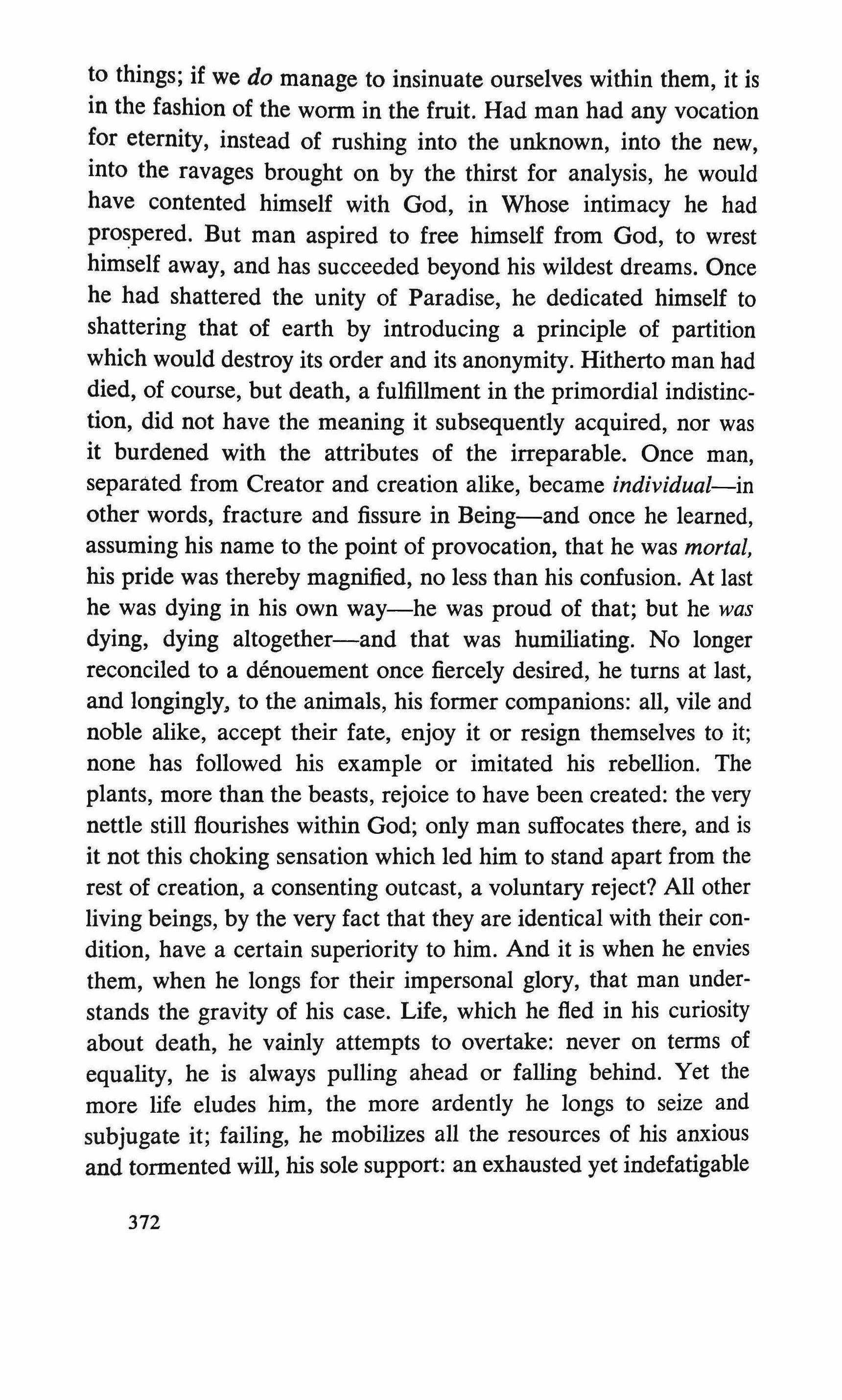
to things; if we do manage to insinuate ourselves within them, it is in the fashion of the worm in the fruit. Had man had any vocation for eternity, instead of rushing into the unknown, into the new, into the ravages brought on by the thirst for analysis, he would have contented himself with God, in Whose intimacy he had prospered. But man aspired to free himself from God, to wrest himself away, and has succeeded beyond his wildest dreams. Once he had shattered the unity of Paradise, he dedicated himself to shattering that of earth by introducing a principle of partition which would destroy its order and its anonymity. Hitherto man had died, of course, but death, a fulfillment in the primordial indistinction, did not have the meaning it subsequently acquired, nor was it burdened with the attributes of the irreparable. Once man, separated from Creator and creation alike, became individual-in other words, fracture and fissure in Being-and once he learned, assuming his name to the point of provocation, that he was mortal, his pride was thereby magnified, no less than his confusion. At last he was dying in his own way-he was proud of that; but he was dying, dying altogether-and that was humiliating. No longer reconciled to a denouement once fiercely desired, he turns at last, and longingly, to the animals, his former companions: all, vile and noble alike, accept their fate, enjoy it or resign themselves to it; none has followed his example or imitated his rebellion. The plants, more than the beasts, rejoice to have been created: the very nettle still flourishes within God; only man suffocates there, and is it not this choking sensation which led him to stand apart from the rest of creation, a consenting outcast, a voluntary reject? All other living beings, by the very fact that they are identical with their condition, have a certain superiority to him. And it is when he envies them, when he longs for their impersonal glory, that man understands the gravity of his case. Life, which he fled in his curiosity about death, he vainly attempts to overtake: never on terms of equality, he is always pulling ahead or falling behind. Yet the more life eludes him, the more ardently he longs to seize and subjugate it; failing, he mobilizes all the resources of his anxious and tormented will, his sole support: an exhausted yet indefatigable
372

misfit, rootless, victorious precisely because he is deracine, a nomad both crushed and unconquered, eager to make good his inadequacies and, in the face of failure, doing violence to all that is around him, a devastator piling misdeed upon misdeed in his rage at seeing the worm obtain without effort what he, after such struggles, cannot acquire. Having lost the secret of life, having made too wide a detour to rediscover and relearn it, man draws a little farther, every day, from his old innocence, ceaselessly declines from eternity. Perhaps he might still be saved if he deigned to compete with God only in subtlety, in nuance, in discernment; but no, he aspires to the same degree of power. So much pride could be produced only in the mind of a degenerate armed with a limited charge of existence, constrained by reason of his deficiencies to augment his means of action artificially and to replace his compromised instincts by instruments capable of making him terrible. And if man has indeed become terrible, it is because his capacity to degenerate is limitless. Whereas he should have confined himself to the flint and, by way of technical refinements, the wheelbarrow, he has invented and wields with demonic dexterity tools which proclaim the strange supremacy of a defective, a biologically declasse specimen no one could have guessed would achieve so ingenious a malignity. The lion or the tiger, not man, should have the place he occupies in the scale of creatures. But it is never the strong, it is the weak who crave and who gain power, by the combined effect of cunning and madness. Because the beast feels no need to increase its strength, which is genuine, it does not lower itself to tools. But because man was in all things an abnormal animal, ill endowed to subsist and to assert himself, violent by debility and not by vigor, intractable from a position of weakness, aggressive on account of his very inadaptability, it became his role to seek out the means of a success he could not have achieved or even imagined if his constitution had corresponded to the imperatives of the struggle for existence. If he exaggerates everything, if hyperbole is his vital necessity, it is because, unbalanced and unbridled from the first, he cannot fasten upon what is, cannot acknowledge or accede to reality without trying to
373
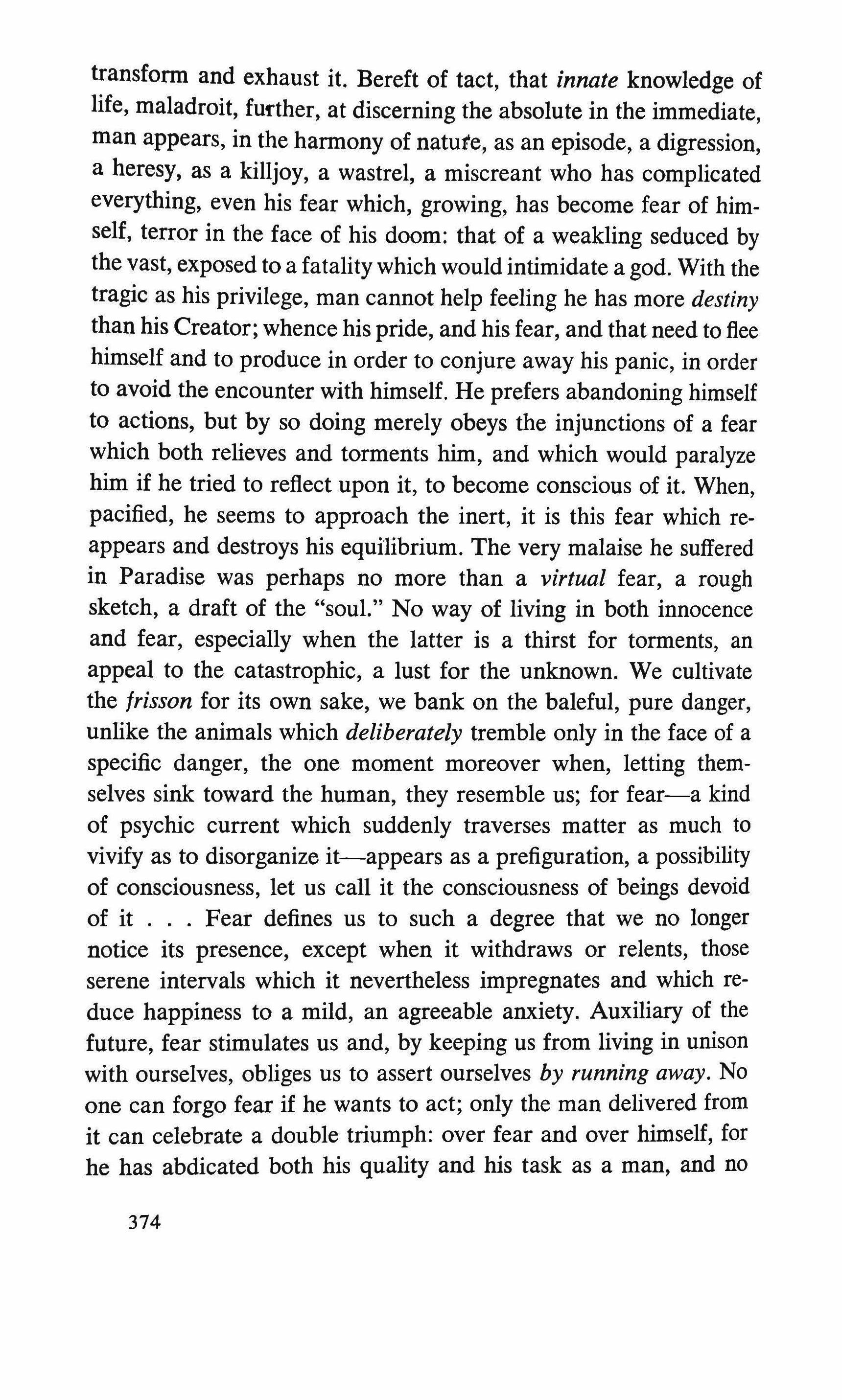
transform and exhaust it. Bereft of tact, that innate knowledge of life, maladroit, further, at discerning the absolute in the immediate, man appears, in the harmony of nature, as an episode, a digression, a heresy, as a killjoy, a wastrel, a miscreant who has complicated everything, even his fear which, growing, has become fear of himself, terror in the face of his doom: that of a weakling seduced by the vast, exposed to a fatality which would intimidate a god. With the tragic as his privilege, man cannot help feeling he has more destiny than his Creator; whence his pride, and his fear, and that need to flee himself and to produce in order to conjure away his panic, in order to avoid the encounter with himself. He prefers abandoning himself to actions, but by so doing merely obeys the injunctions of a fear which both relieves and torments him, and which would paralyze him if he tried to reflect upon it, to become conscious of it. When, pacified, he seems to approach the inert, it is this fear which reappears and destroys his equilibrium. The very malaise he suffered in Paradise was perhaps no more than a virtual fear, a rough sketch, a draft of the "soul." No way of living in both innocence and fear, especially when the latter is a thirst for torments, an appeal to the catastrophic, a lust for the unknown. We cultivate the frisson for its own sake, we bank on the baleful, pure danger, unlike the animals which deliberately tremble only in the face of a specific danger, the one moment moreover when, letting themselves sink toward the human, they resemble us; for fear-a kind of psychic current which suddenly traverses matter as much to vivify as to disorganize it-appears as a prefiguration, a possibility of consciousness, let us call it the consciousness of beings devoid of it Fear defines us to such a degree that we no longer notice its presence, except when it withdraws or relents, those serene intervals which it nevertheless impregnates and which reduce happiness to a mild, an agreeable anxiety. Auxiliary of the future, fear stimulates us and, by keeping us from living in unison with ourselves, obliges us to assert ourselves by running away. No one can forgo fear if he wants to act; only the man delivered from it can celebrate a double triumph: over fear and over himself, for he has abdicated both his quality and his task as a man, and no
374
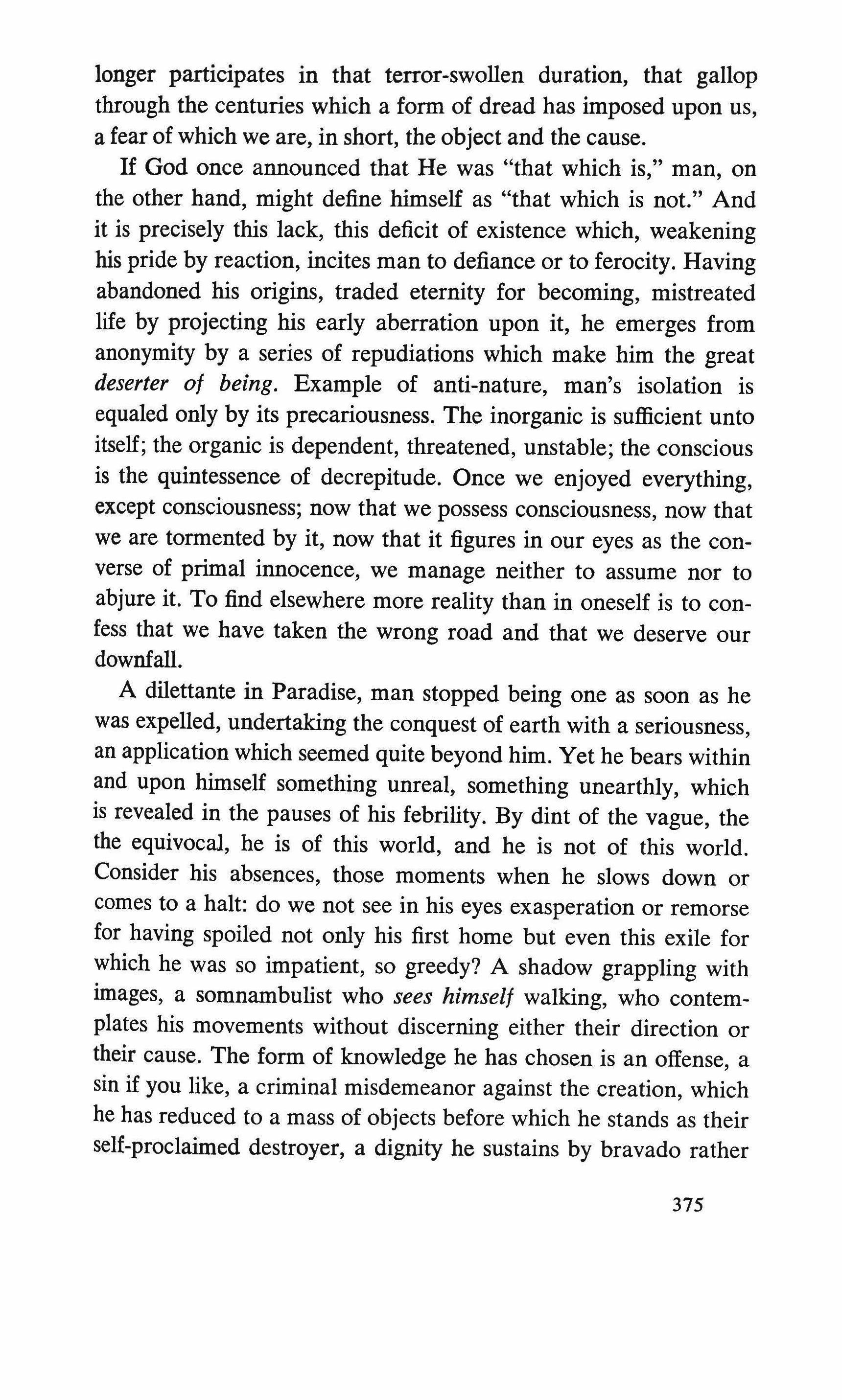
longer participates in that terror-swollen duration, that gallop through the centuries which a form of dread has imposed upon us, a fear of which we are, in short, the object and the cause.
If God once announced that He was "that which is," man, on the other hand, might define himself as "that which is not." And it is precisely this lack, this deficit of existence which, weakening his pride by reaction, incites man to defiance or to ferocity. Having abandoned his origins, traded eternity for becoming, mistreated life by projecting his early aberration upon it, he emerges from anonymity by a series of repudiations which make him the great deserter of being. Example of anti-nature, man's isolation is equaled only by its precariousness. The inorganic is sufficient unto itself; the organic is dependent, threatened, unstable; the conscious is the quintessence of decrepitude. Once we enjoyed everything, except consciousness; now that we possess consciousness, now that we are tormented by it, now that it figures in our eyes as the converse of primal innocence, we manage neither to assume nor to abjure it. To find elsewhere more reality than in oneself is to confess that we have taken the wrong road and that we deserve our downfall.
A dilettante in Paradise, man stopped being one as soon as he was expelled, undertaking the conquest of earth with a seriousness, an application which seemed quite beyond him. Yet he bears within and upon himself something unreal, something unearthly, which is revealed in the pauses of his febrility. By dint of the vague, the the equivocal, he is of this world, and he is not of this world. Consider his absences, those moments when he slows down or comes to a halt: do we not see in his eyes exasperation or remorse for having spoiled not only his first home but even this exile for which he was so impatient, so greedy? A shadow grappling with images, a somnambulist who sees himself walking, who contemplates his movements without discerning either their direction or their cause. The form of knowledge he has chosen is an offense, a sin if you like, a criminal misdemeanor against the creation, which he has reduced to a mass of objects before which he stands as their self-proclaimed destroyer, a dignity he sustains by bravado rather
375
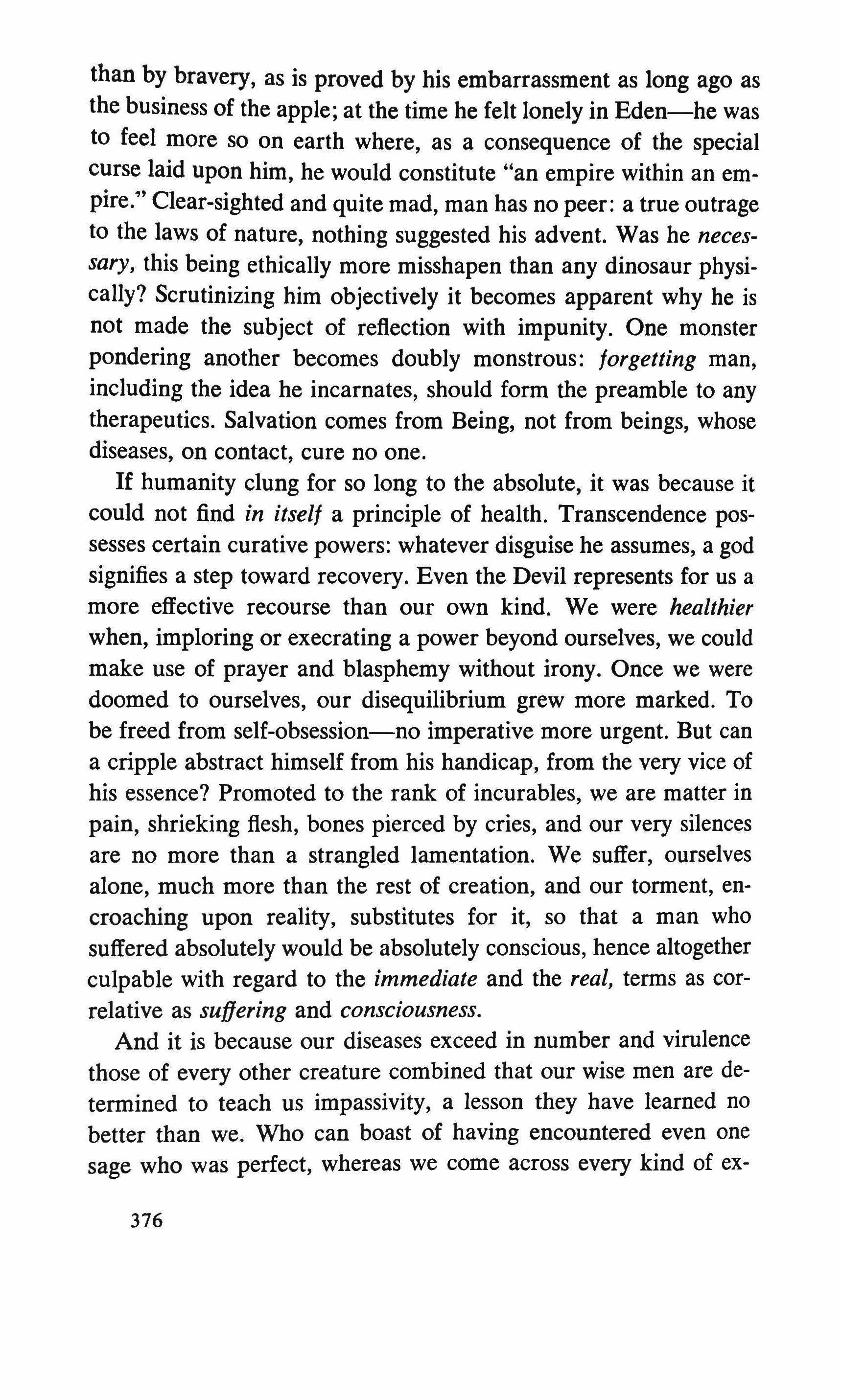
than by bravery, as is proved by his embarrassment as long ago as the business of the apple; at the time he felt lonely in Eden-he was to feel more so on earth where, as a consequence of the special curse laid upon him, he would constitute "an empire within an empire." Clear-sighted and quite mad, man has no peer: a true outrage to the laws of nature, nothing suggested his advent. Was he necessary, this being ethically more misshapen than any dinosaur physically? Scrutinizing him objectively it becomes apparent why he is not made the subject of reflection with impunity. One monster pondering another becomes doubly monstrous: forgetting man, including the idea he incarnates, should form the preamble to any therapeutics. Salvation comes from Being, not from beings, whose diseases, on contact, cure no one.
If humanity clung for so long to the absolute, it was because it could not find in itself a principle of health. Transcendence possesses certain curative powers: whatever disguise he assumes, a god signifies a step toward recovery. Even the Devil represents for us a more effective recourse than our own kind. We were healthier when, imploring or execrating a power beyond ourselves, we could make use of prayer and blasphemy without irony. Once we were doomed to ourselves, our disequilibrium grew more marked. To be freed from self-obsession-no imperative more urgent. But can a cripple abstract himself from his handicap, from the very vice of his essence? Promoted to the rank of incurables, we are matter in pain, shrieking flesh, bones pierced by cries, and our very silences are no more than a strangled lamentation. We suffer, ourselves alone, much more than the rest of creation, and our torment, encroaching upon reality, substitutes for it, so that a man who suffered absolutely would be absolutely conscious, hence altogether culpable with regard to the immediate and the real, terms as correlative as suffering and consciousness.
And it is because our diseases exceed in number and virulence those of every other creature combined that our wise men are determined to teach us impassivity, a lesson they have learned no better than we. Who can boast of having encountered even one sage who was perfect, whereas we come across every kind of ex-
376
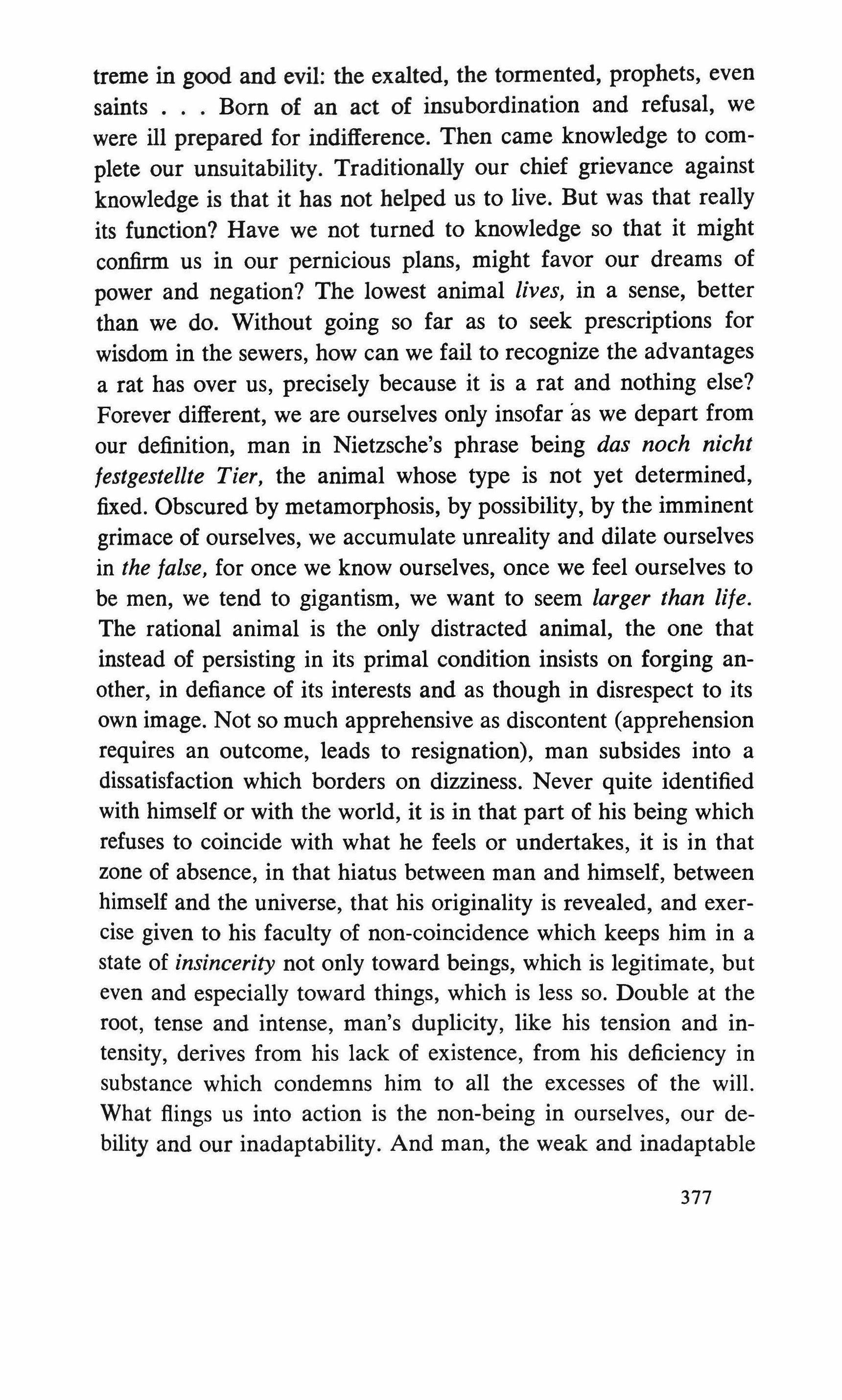
treme in good and evil: the exalted, the tormented, prophets, even saints Born of an act of insubordination and refusal, we were ill prepared for indifference. Then came knowledge to complete our unsuitability. Traditionally our chief grievance against knowledge is that it has not helped us to live. But was that really its function? Have we not turned to knowledge so that it might confirm us in our pernicious plans, might favor our dreams of power and negation? The lowest animal lives, in a sense, better than we do. Without going so far as to seek prescriptions for wisdom in the sewers, how can we fail to recognize the advantages a rat has over us, precisely because it is a rat and nothing else? Forever different, we are ourselves only insofar as we depart from our definition, man in Nietzsche's phrase being das noch nicht festgestellte Tier, the animal whose type is not yet determined, fixed. Obscured by metamorphosis, by possibility, by the imminent grimace of ourselves, we accumulate unreality and dilate ourselves in the false, for once we know ourselves, once we feel ourselves to be men, we tend to gigantism, we want to seem larger than life. The rational animal is the only distracted animal, the one that instead of persisting in its primal condition insists on forging another, in defiance of its interests and as though in disrespect to its own image. Not so much apprehensive as discontent (apprehension requires an outcome, leads to resignation), man subsides into a dissatisfaction which borders on dizziness. Never quite identified with himself or with the world, it is in that part of his being which refuses to coincide with what he feels or undertakes, it is in that zone of absence, in that hiatus between man and himself, between himself and the universe, that his originality is revealed, and exercise given to his faculty of non-coincidence which keeps him in a state of insincerity not only toward beings, which is legitimate, but even and especially toward things, which is less so. Double at the root, tense and intense, man's duplicity, like his tension and intensity, derives from his lack of existence, from his deficiency in substance which condemns him to all the excesses of the will. What flings us into action is the non-being in ourselves, our debility and our inadaptability. And man, the weak and inadaptable
377
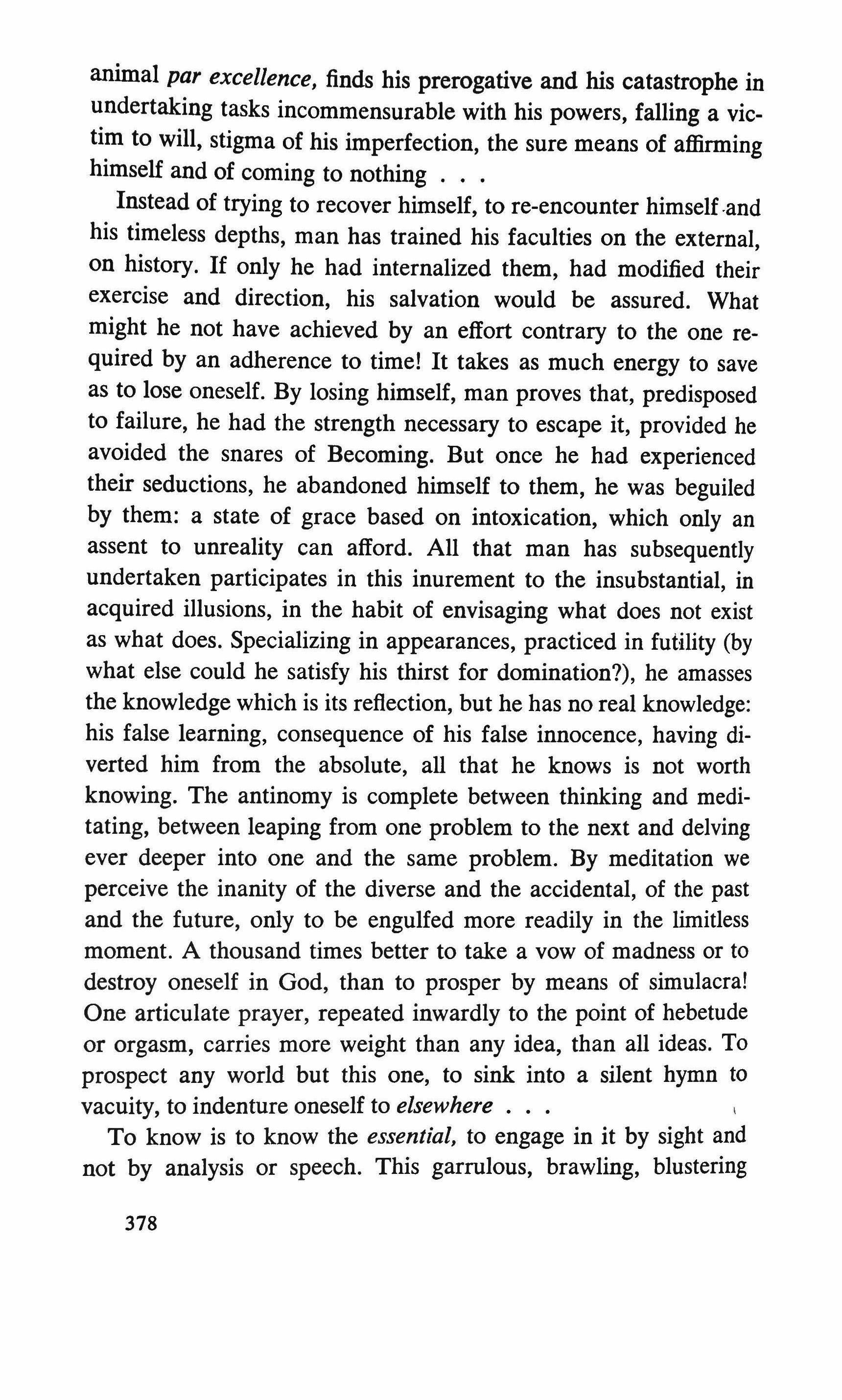
animal par excellence, finds his prerogative and his catastrophe in undertaking tasks incommensurable with his powers, falling a victim to will, stigma of his imperfection, the sure means of affirming himself and of coming to nothing
Instead of trying to recover himself, to re-encounter himself ·and his timeless depths, man has trained his faculties on the external, on history. If only he had internalized them, had modified their exercise and direction, his salvation would be assured. What might he not have achieved by an effort contrary to the one required by an adherence to time! It takes as much energy to save as to lose oneself. By losing himself, man proves that, predisposed to failure, he had the strength necessary to escape it, provided he avoided the snares of Becoming. But once he had experienced their seductions, he abandoned himself to them, he was beguiled by them: a state of grace based on intoxication, which only an assent to unreality can afford. All that man has subsequently undertaken participates in this inurement to the insubstantial, in acquired illusions, in the habit of envisaging what does not exist as what does. Specializing in appearances, practiced in futility (by what else could he satisfy his thirst for domination?), he amasses the knowledge which is its reflection, but he has no real knowledge: his false learning, consequence of his false innocence, having diverted him from the absolute, all that he knows is not worth knowing. The antinomy is complete between thinking and meditating, between leaping from one problem to the next and delving ever deeper into one and the same problem. By meditation we perceive the inanity of the diverse and the accidental, of the past and the future, only to be engulfed more readily in the limitless moment. A thousand times better to take a vow of madness or to destroy oneself in God, than to prosper by means of simulacra! One articulate prayer, repeated inwardly to the point of hebetude or orgasm, carries more weight than any idea, than all ideas. To prospect any world but this one, to sink into a silent hymn to vacuity, to indenture oneself to elsewhere
To know is to know the essential, to engage in it by sight and not by analysis or speech. This garrulous, brawling, blustering
378
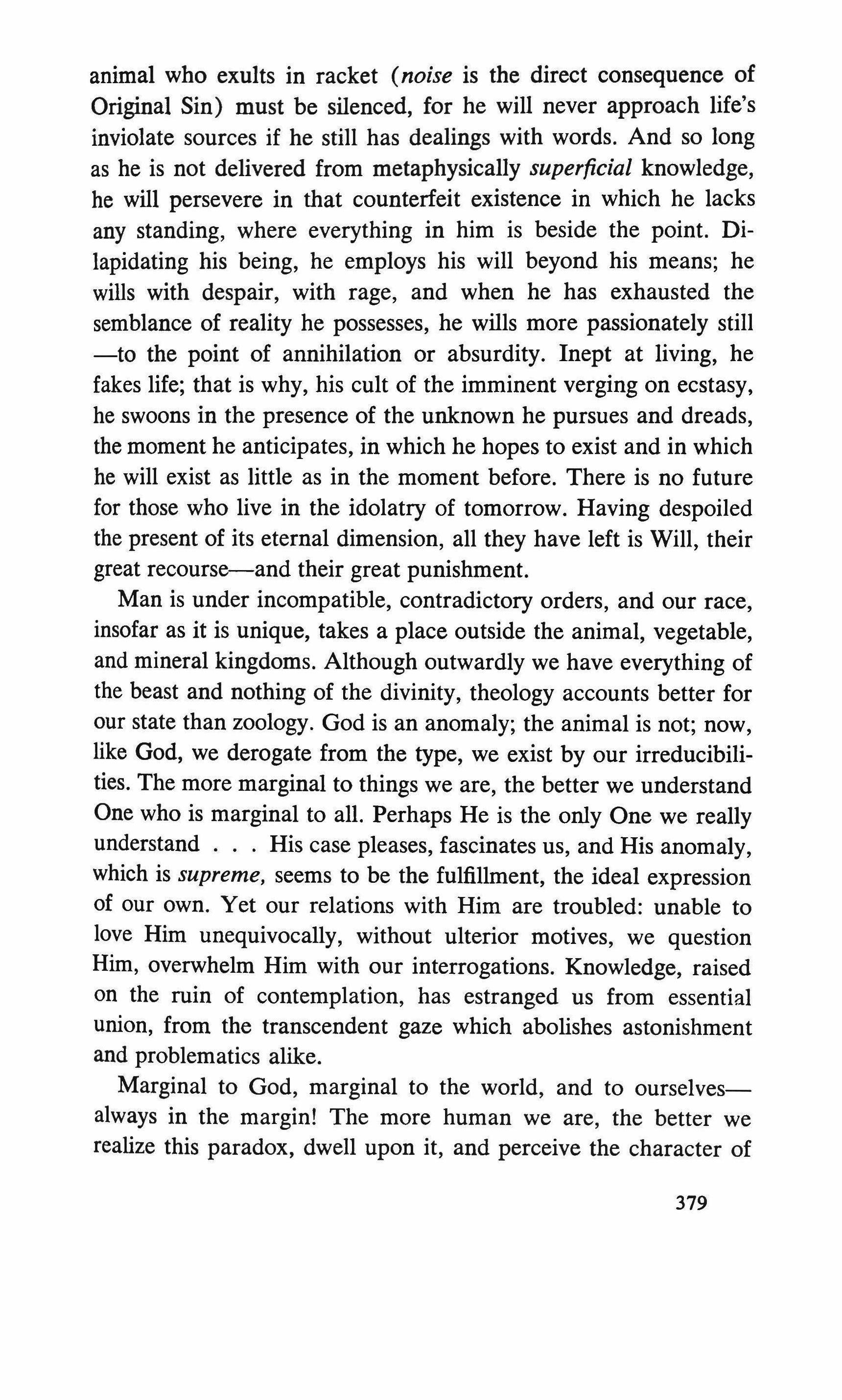
animal who exults in racket (noise is the direct consequence of Original Sin) must be silenced, for he will never approach life's inviolate sources if he still has dealings with words. And so long as he is not delivered from metaphysically superficial knowledge, he will persevere in that counterfeit existence in which he lacks any standing, where everything in him is beside the point. Dilapidating his being, he employs his will beyond his means; he wills with despair, with rage, and when he has exhausted the semblance of reality he possesses, he wills more passionately still -to the point of annihilation or absurdity. Inept at living, he fakes life; that is why, his cult of the imminent verging on ecstasy, he swoons in the presence of the unknown he pursues and dreads, the moment he anticipates, in which he hopes to exist and in which he will exist as little as in the moment before. There is no future for those who live in the idolatry of tomorrow. Having despoiled the present of its eternal dimension, all they have left is Will, their great recourse-and their great punishment.
Man is under incompatible, contradictory orders, and our race, insofar as it is unique, takes a place outside the animal, vegetable, and mineral kingdoms. Although outwardly we have everything of the beast and nothing of the divinity, theology accounts better for our state than zoology. God is an anomaly; the animal is not; now, like God, we derogate from the type, we exist by our irreducibilities. The more marginal to things we are, the better we understand One who is marginal to all. Perhaps He is the only One we really understand His case pleases, fascinates us, and His anomaly, which is supreme, seems to be the fulfillment, the ideal expression of our own. Yet our relations with Him are troubled: unable to love Him unequivocally, without ulterior motives, we question Him, overwhelm Him with our interrogations. Knowledge, raised on the ruin of contemplation, has estranged us from essential union, from the transcendent gaze which abolishes astonishment and problematics alike.
Marginal to God, marginal to the world, and to ourselvesalways in the margin! The more human we are, the better we realize this paradox, dwell upon it, and perceive the character of
379
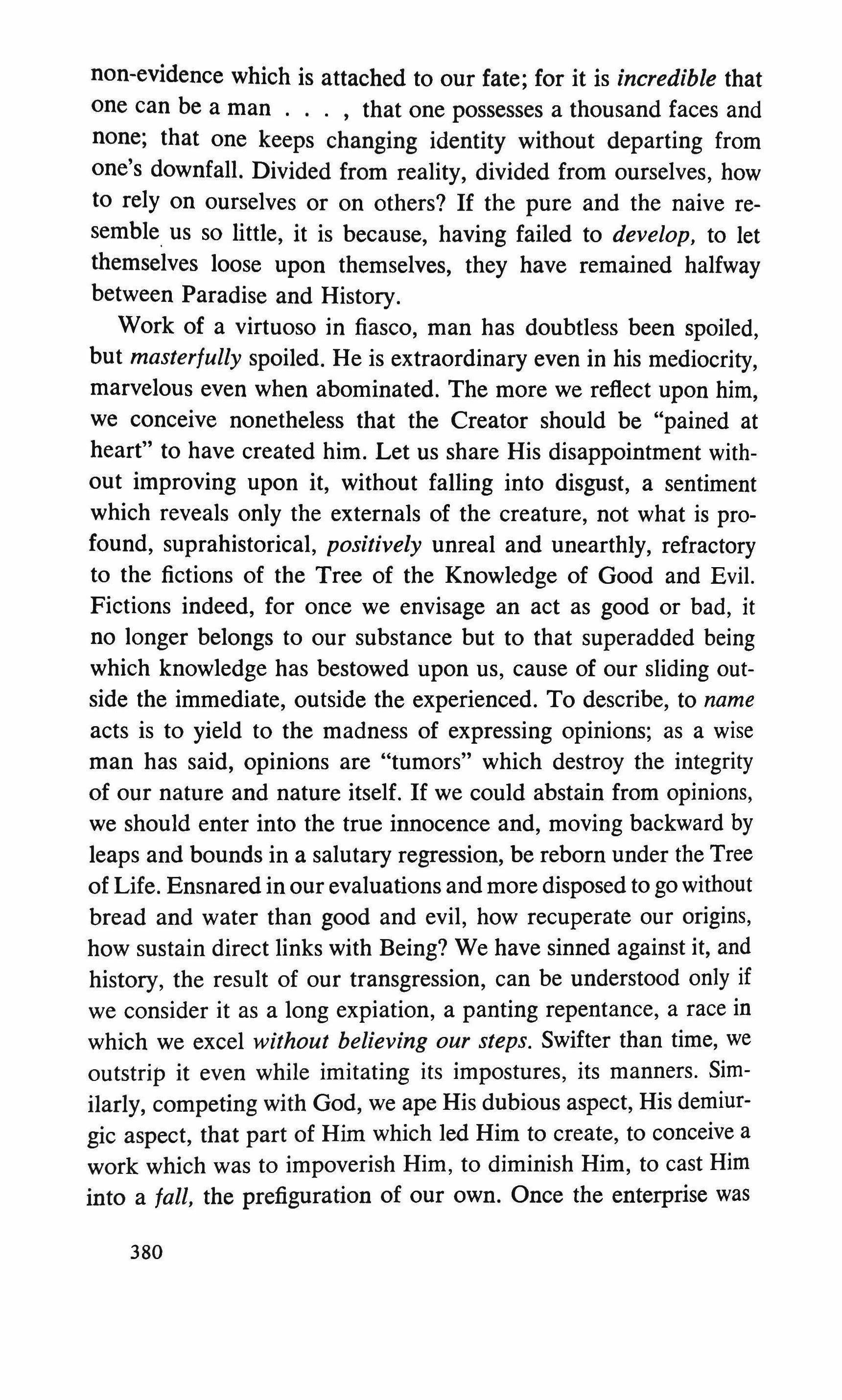
non-evidence which is attached to our fate; for it is incredible that one can be a man , that one possesses a thousand faces and none; that one keeps changing identity without departing from one's downfall. Divided from reality, divided from ourselves, how to rely on ourselves or on others? If the pure and the naive resemble, us so little, it is because, having failed to develop, to let themselves loose upon themselves, they have remained halfway between Paradise and History.
Work of a virtuoso in fiasco, man has doubtless been spoiled, but masterfully spoiled. He is extraordinary even in his mediocrity, marvelous even when abominated. The more we reflect upon him, we conceive nonetheless that the Creator should be "pained at heart" to have created him. Let us share His disappointment without improving upon it, without falling into disgust, a sentiment which reveals only the externals of the creature, not what is profound, suprahistorical, positively unreal and unearthly, refractory to the fictions of the Tree of the Knowledge of Good and Evil. Fictions indeed, for once we envisage an act as good or bad, it no longer belongs to our substance but to that superadded being which knowledge has bestowed upon us, cause of our sliding outside the immediate, outside the experienced. To describe, to name acts is to yield to the madness of expressing opinions; as a wise man has said, opinions are "tumors" which destroy the integrity of our nature and nature itself. If we could abstain from opinions, we should enter into the true innocence and, moving backward by leaps and bounds in a salutary regression, be reborn under the Tree of Life. Ensnared in our evaluations and more disposed to go without bread and water than good and evil, how recuperate our origins, how sustain direct links with Being? We have sinned against it, and history, the result of our transgression, can be understood only if we consider it as a long expiation, a panting repentance, a race in which we excel without believing our steps. Swifter than time, we outstrip it even while imitating its impostures, its manners. Similarly, competing with God, we ape His dubious aspect, His demiurgic aspect, that part of Him which led Him to create, to conceive a work which was to impoverish Him, to diminish Him, to cast Him into a fall, the prefiguration of our own. Once the enterprise was
380

under way, He left us the bother of completing it and withdrew into Himself, into His eternal apathy from which He should never have emerged. Since He judged otherwise, what can be expected of us? The impossibility of abstaining, the obsession of praxis denotes, on every level, the presence of a demonic principle. Carried away to excess, to outrage, to action, we are following more or less consciously the One Who, rushing upon non-being in order to extract being from it, in order to hand it over to us, made Himself the instigator of our future usurpations. There must exist in Him a catastrophic light which matches our shadows. History, temporal reflection of that accursed glow, History manifests and extends the non-divine dimension of divinity.
Related to God, it would be indecorous to treat Him as a stranger, especially since our solitude, on a more modest scale, evokes His own. But however modest it may be, it nonetheless overwhelms, and when it falls upon us like a penalty, when it demands, to be endured, supernatural talents, where else might we take refuge except with Him Who, aside from the episode of Creation, was always apart from everything? What is sole tends to the Solitary, to the One whose negative aspects remain, since the adventure of knowledge, the one thing we share. It would not have been the same had we inclined toward Life. Then we should have known another face of divinity and perhaps, today, haloed with a pure light, not sullied with shadows nor with any diabolic element, we should be as incurious and as exempt from death as the Angels are.
For not having been, at the start, up to the mark, we run, we flee into the future. What are our greed and our frenzy but the remorse for having sidestepped true innocence, whose memory cannot fail to torment us? Despite our haste and our competition with time, we cannot drown out the appeals rising from the depths of our memory scarred by the image of Paradise, the genuine one which is not that of the Tree of Knowledge but of the Tree of Life, access to which, in reprisal for Adam's sin, was to be forbidden by "Cherubims with flaming swords which turned every way." Only that Tree deserves to be regained, that Tree alone merits the effort of our regrets. And it is stilI that Tree which Revelations mentions 381
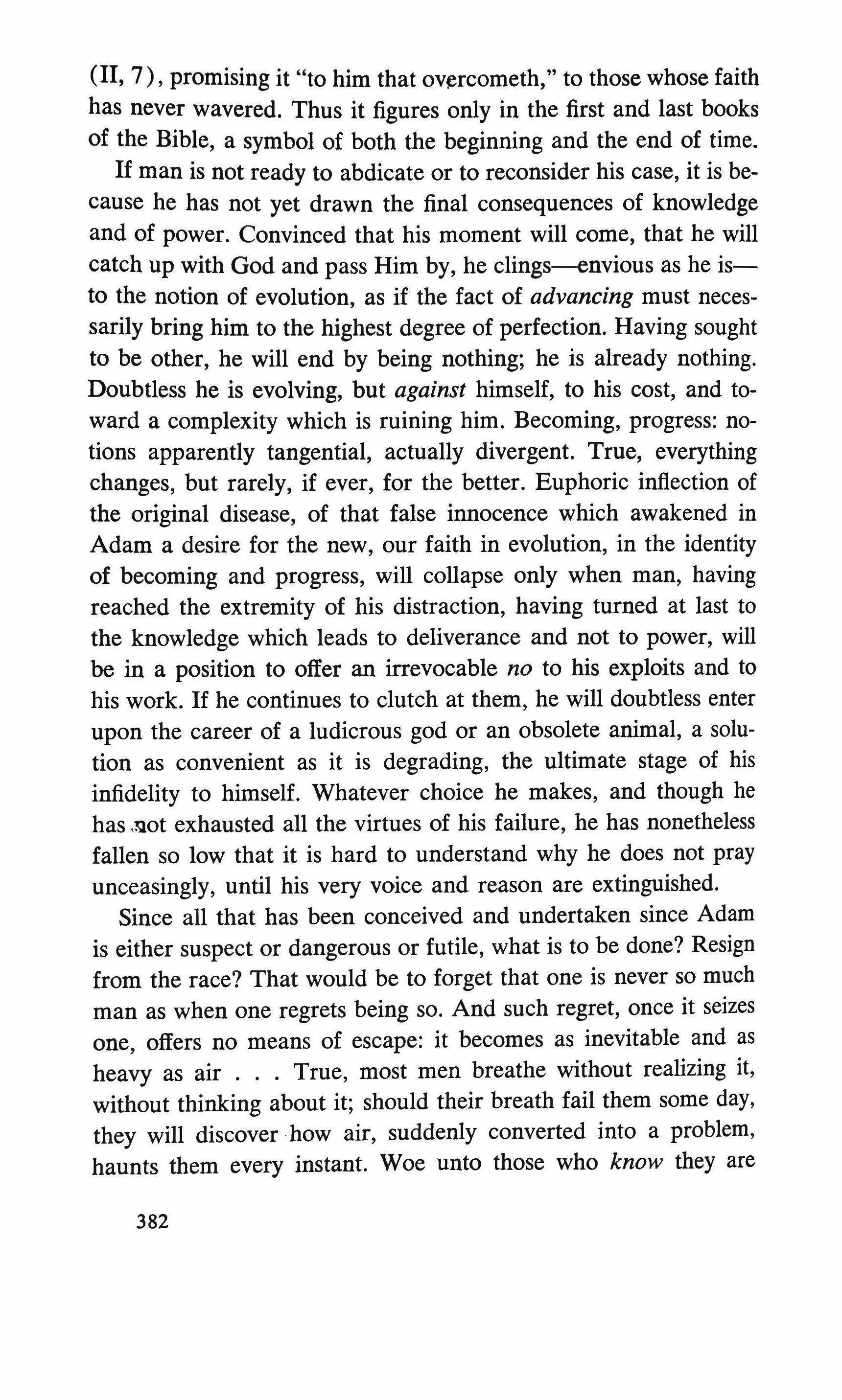
(II, 7), promising it "to him that overcometh," to those whose faith has never wavered. Thus it figures only in the first and last books of the Bible, a symbol of both the beginning and the end of time. If man is not ready to abdicate or to reconsider his case, it is because he has not yet drawn the final consequences of knowledge and of power. Convinced that his moment will come, that he will catch up with God and pass Him by, he clings-envious as he isto the notion of evolution, as if the fact of advancing must necessarily bring him to the highest degree of perfection. Having sought to be other, he will end by being nothing; he is already nothing. Doubtless he is evolving, but against himself, to his cost, and toward a complexity which is ruining him. Becoming, progress: notions apparently tangential, actually divergent. True, everything changes, but rarely, if ever, for the better. Euphoric inflection of the original disease, of that false innocence which awakened in Adam a desire for the new, our faith in evolution, in the identity of becoming and progress, will collapse only when man, having reached the extremity of his distraction, having turned at last to the knowledge which leads to deliverance and not to power, will be in a position to offer an irrevocable no to his exploits and to his work. If he continues to clutch at them, he will doubtless enter upon the career of a ludicrous god or an obsolete animal, a solution as convenient as it is degrading, the ultimate stage of his infidelity to himself. Whatever choice he makes, and though he has ,!;lot exhausted all the virtues of his failure, he has nonetheless fallen so low that it is hard to understand why he does not pray unceasingly, until his very voice and reason are extinguished. Since all that has been conceived and undertaken since Adam is either suspect or dangerous or futile, what is to be done? Resign from the race? That would be to forget that one is never so much man as when one regrets being so. And such regret, once it seizes one, offers no means of escape: it becomes as inevitable and as heavy as air True, most men breathe without realizing it, without thinking about it; should their breath fail them some day, they will discover how air, suddenly converted into a problem, haunts them every instant. Woe unto those who know they are
382
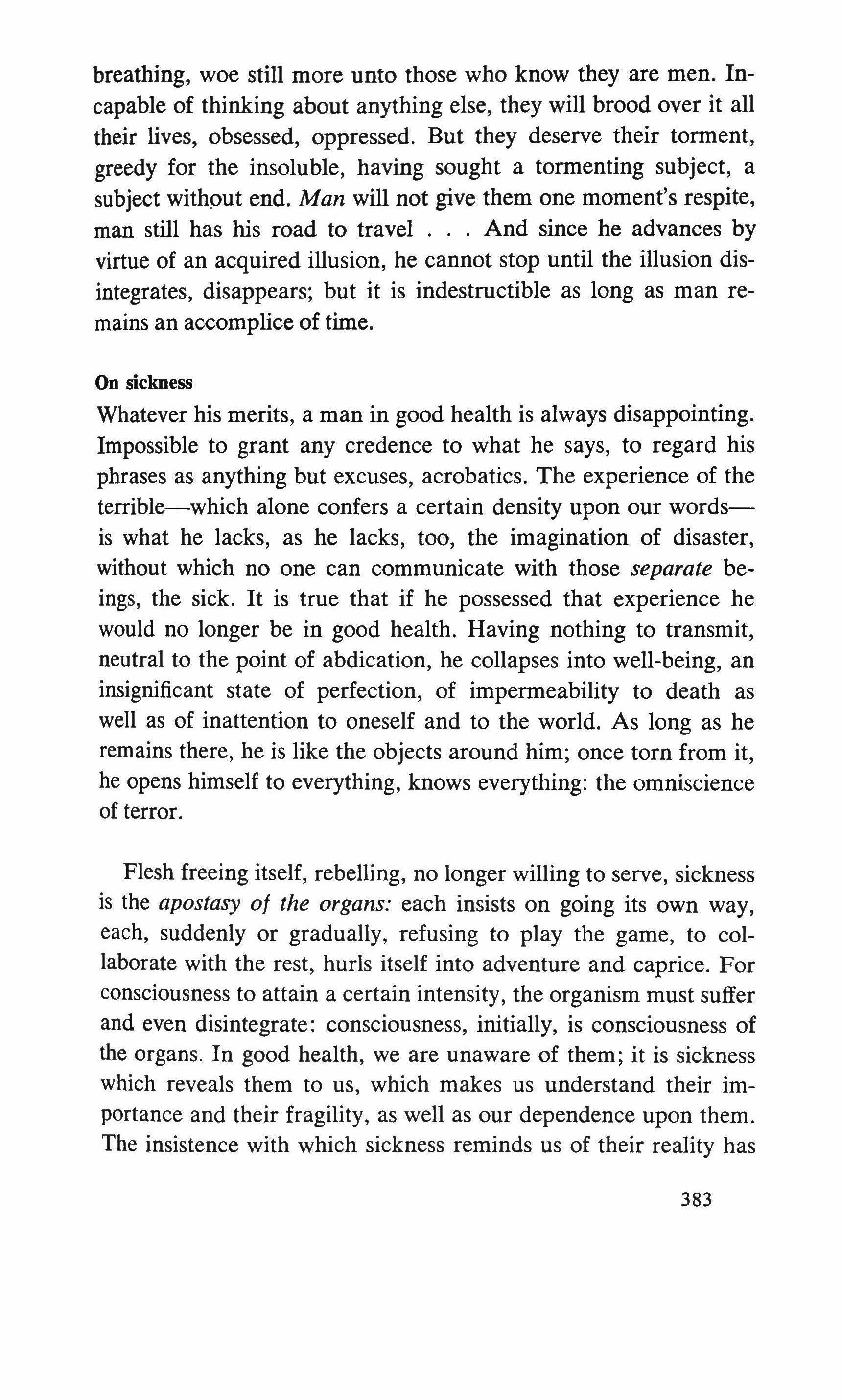
breathing, woe still more unto those who know they are men. Incapable of thinking about anything else, they will brood over it all their lives, obsessed, oppressed. But they deserve their torment, greedy for the insoluble, having sought a tormenting subject, a subject without end. Man will not give them one moment's respite, man still has his road to travel And since he advances by virtue of an acquired illusion, he cannot stop until the illusion disintegrates, disappears; but it is indestructible as long as man remains an accomplice of time.
On sickness
Whatever his merits, a man in good health is always disappointing. Impossible to grant any credence to what he says, to regard his phrases as anything but excuses, acrobatics. The experience of the terrible-which alone confers a certain density upon our wordsis what he lacks, as he lacks, too, the imagination of disaster, without which no one can communicate with those separate beings, the sick. It is true that if he possessed that experience he would no longer be in good health. Having nothing to transmit, neutral to the point of abdication, he collapses into well-being, an insignificant state of perfection, of impermeability to death as well as of inattention to oneself and to the world. As long as he remains there, he is like the objects around him; once torn from it, he opens himself to everything, knows everything: the omniscience of terror.
Flesh freeing itself, rebelling, no longer willing to serve, sickness is the apostasy of the organs: each insists on going its own way, each, suddenly or gradually, refusing to play the game, to collaborate with the rest, hurls itself into adventure and caprice. For consciousness to attain a certain intensity, the organism must suffer and even disintegrate: consciousness, initially, is consciousness of the organs. In good health, we are unaware of them; it is sickness which reveals them to us, which makes us understand their importance and their fragility, as well as our dependence upon them. The insistence with which sickness reminds us of their reality has 383

something inexorable about it; no matter how much we want to forget them, sickness will not permit us to; this impossibility of forgetting, which is the drama of having a body, fills the space of our waking nights. In sleep, we participate in the universal anonymity, we are every being; once pain rouses us, there is no one but ourselves, alone with our disease, with the thousand thoughts it provokes in us and against us. "Woe to this flesh which is at the mercy of the soul, and woe to this soul, at the mercy of the flesh!" -it is in the dead of certain nights that we grasp the entire significance of these words from the Gospel According to Thomas. The flesh boycotts the soul, the soul boycotts the flesh; deadly to each other, they are incapable of cohabiting, of elaborating in common a salutary lie, a tonic fiction.
The more consciousness increases .as a consequence of our diseases, the more liberated we should feel. It is the converse which is true. As our infirmities accumulate, we fall victim to our body, whose whims are equivalent to so many decrees. It is our body that commands and controls us, it is our body that dictates our moods; it supervises us, spies on us, keeps us under its thumb; and, while we submit to its will and accept so humiliating a servitude, we understand why, in good health, we shrink from the notion of fatality: when our body scarcely troubles to make itself known, we do not perceive its existence in any practical sense. If, in health, the organs are discreet, in sickness, impatient to call attention to themselves, they enter into competition with each other; the one which most attracts our attention reta�ns this advantage only by a real show of zeal; but it exhausts itself in the performance, whereupon another, more enterprising and more vigorous, takes over its role. The irritating thing about this rivalry is that we are obliged to be both its object and its witness.
Like every factor of disequilibrium, sickness arouses-whips up and encourages an element of tension and of conflict. Life is an uprising within the inorganic, a tragic leap out of the inert-life is matter animated and, it must be said, spoiled by pain. From so
384
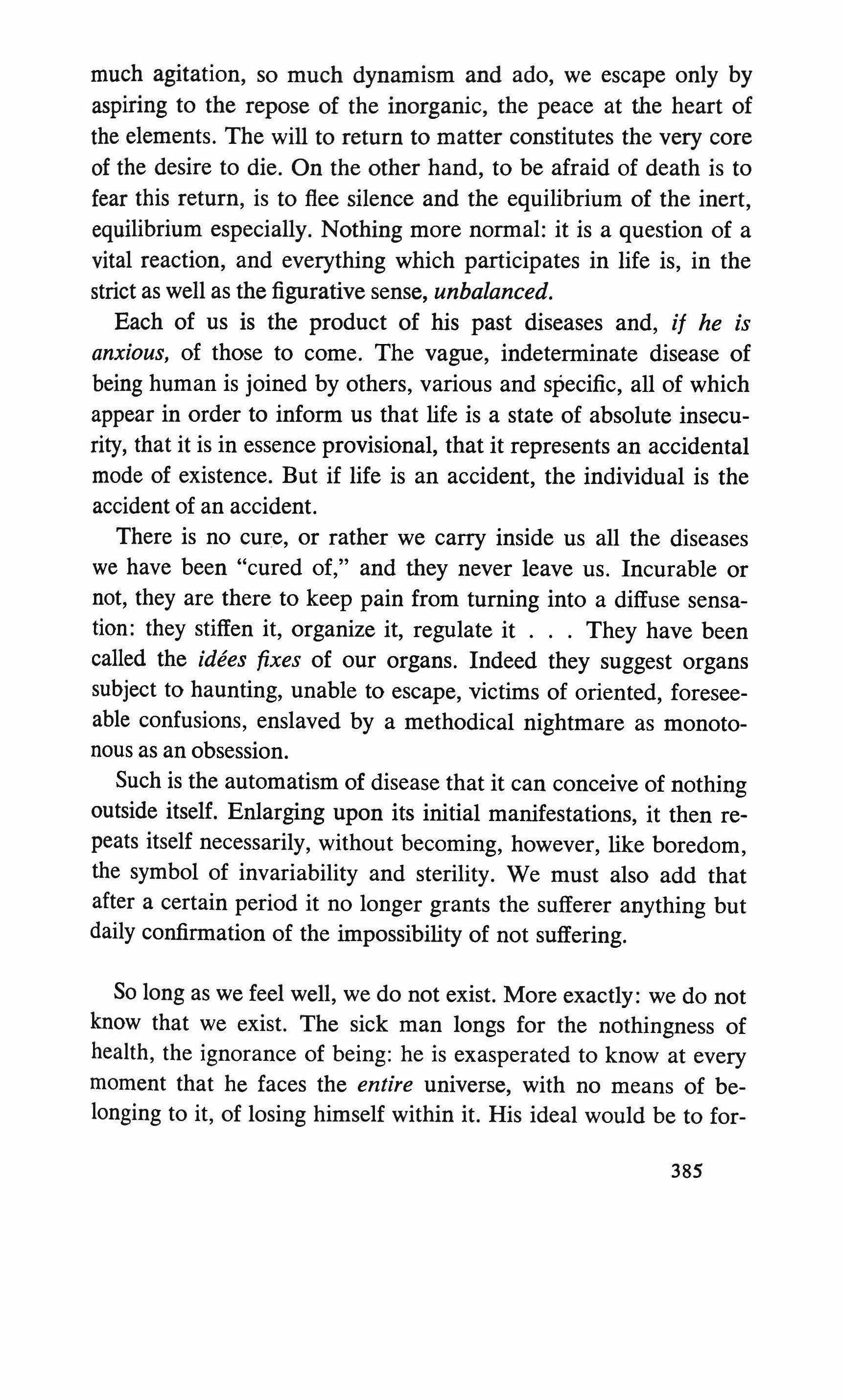
much agitation, so much dynamism and ado, we escape only by aspiring to the repose of the inorganic, the peace at the heart of the elements. The will to return to matter constitutes the very core of the desire to die. On the other hand, to be afraid of death is to fear this return, is to flee silence and the equilibrium of the inert, equilibrium especially. Nothing more normal: it is a question of a vital reaction, and everything which participates in life is, in the strict as well as the figurative sense, unbalanced.
Each of us is the product of his past diseases and, if he is anxious, of those to come. The vague, indeterminate disease of being human is joined by others, various and specific, all of which appear in order to inform us that life is a state of absolute insecurity, that it is in essence provisional, that it represents an accidental mode of existence. But if life is an accident, the individual is the accident of an accident.
There is no cure, or rather we carry inside us all the diseases we have been "cured of," and they never leave us. Incurable or not, they are there to keep pain from turning into a diffuse sensation: they stiffen it, organize it, regulate it They have been called the idees fixes of our organs. Indeed they suggest organs subject to haunting, unable to escape, victims of oriented, foreseeable confusions, enslaved by a methodical nightmare as monotonous as an obsession.
Such is the automatism of disease that it can conceive of nothing outside itself. Enlarging upon its initial manifestations, it then repeats itself necessarily, without becoming, however, like boredom, the symbol of invariability and sterility. We must also add that after a certain period it no longer grants the sufferer anything but daily confirmation of the impossibility of not suffering.
So long as we feel well, we do not exist. More exactly: we do not know that we exist. The sick man longs for the nothingness of health, the ignorance of being: he is exasperated to know at every moment that he faces the entire universe, with no means of belonging to it, of losing himself within it. His ideal would be to for-
385

get everything and, relieved of his past, to wake up one fine day naked before the future. "I can no longer undertake anything, starting from myself. Better to explode or dissolve than to continue like this," he tells himself. He envies, scorns or detests all other mortals, the healthy most of all. Inveterate pain, far from purifying, brings out whatever is bad in the individual, physically and morally alike. A rule of conduct: mistrust the sickly, fear anyone who has been bedridden. The invalid's secret desire is that everyone should be sick, and the dying man longs to see everyone on his deathbed. What we desire in our ordeals is that the others should be as unhappy as we: not more, merely as much. For we must make no mistake: the only equality which matters to us, and also the only one of which we are capable, is an equality in hell. One can dispossess man, one can take everything away from him, he will manage somehow. One thing, however, must not be touched, for if he is deprived of that he will be unremittingly lost: the faculty, or better still the ecstasy, of complaining. If you strip him of this, he will no longer take any interest or any pleasure in his diseases. He adjusts to them as long as he can talk about them and display them, particularly as long as he can narrate them to those around him in order to punish them for not suffering from them, for being momentarily exempt from them. And when he complains, what he is saying is: "Just wait a little, your turn will come too, you will not escape." All sick men are sadists; but their sadism is acquired; that is their only excuse.
To yield, amidst all our diseases, to the temptation of believing that they will have been of no use to us, that without them we should be infinitely better off, is to forget the double aspect of sickness: annihilation and revelation; sickness cuts us off from our appearances and destroys them only the better to open us to our ultimate reality, and sometimes to the invisible. In another sense, one cannot deny that each invalid is a cheat in his own way. If he broods over his infirmities and concerns himself with them so scrupulously, it is in order not to think about death; he conjures
386

it away by taking care of himself. Death is looked in the face only by those, and indeed they are rare, who having understood the "disadvantages of health," disdain to take measures to preserve or reconquer it. They let themselves die, gently enough, contrary to the rest, who struggle and bustle and suppose they are escaping death because they haven't time to succumb to it.
In the equilibrium of our faculties, it is impossible for us to perceive other worlds; upon the slightest disorder, we raise ourselves to them, we feel them. It is as if a crevice had appeared in reality, through which we glimpse a mode of existence at the antipodes of our own. This opening, however improbable it may be objectively, we yet hesitate to reduce to a mere accident of our mind. Everything we perceive has a reality value, once the object perceived, even if it is imaginary, is incorporated into our life. Angels, for the man who cannot avoid thinking about them, certainly exist. But when he sees them, when he imagines that they visit him, what a revolution in his being, what a crisis! A man in good health could never feel their presence, nor arrive at an exact notion of them. To imagine them is to race to one's destruction; to see them, to touch them is to be destroyed. In certain tribes, a man suffering from convulsions is said to have the gods. "He has the angels," we should say of the man who is devoured by secret terrors.
To be given over to angels or gods, well and good; worse is to consider oneself, for long periods, the most normal man who ever lived, exempt from the flaws which afflict the others, immune from the consequences of the Fall, inaccessible to divine malediction, a healthy man in every respect, constantly dominated at every moment by the impression of having strayed into a mob of maniacs and plague-victims. How recover from the obsession of absolute "normality," how manage to be an ordinary man, saved or fallen? Nullity, abjection, anything rather than this baleful perfection!
If man has been able to leave the animals behind, it is doubtless because he was more exposed and more receptive to diseases than they. And if he manages to maintain himself in his present state, 387
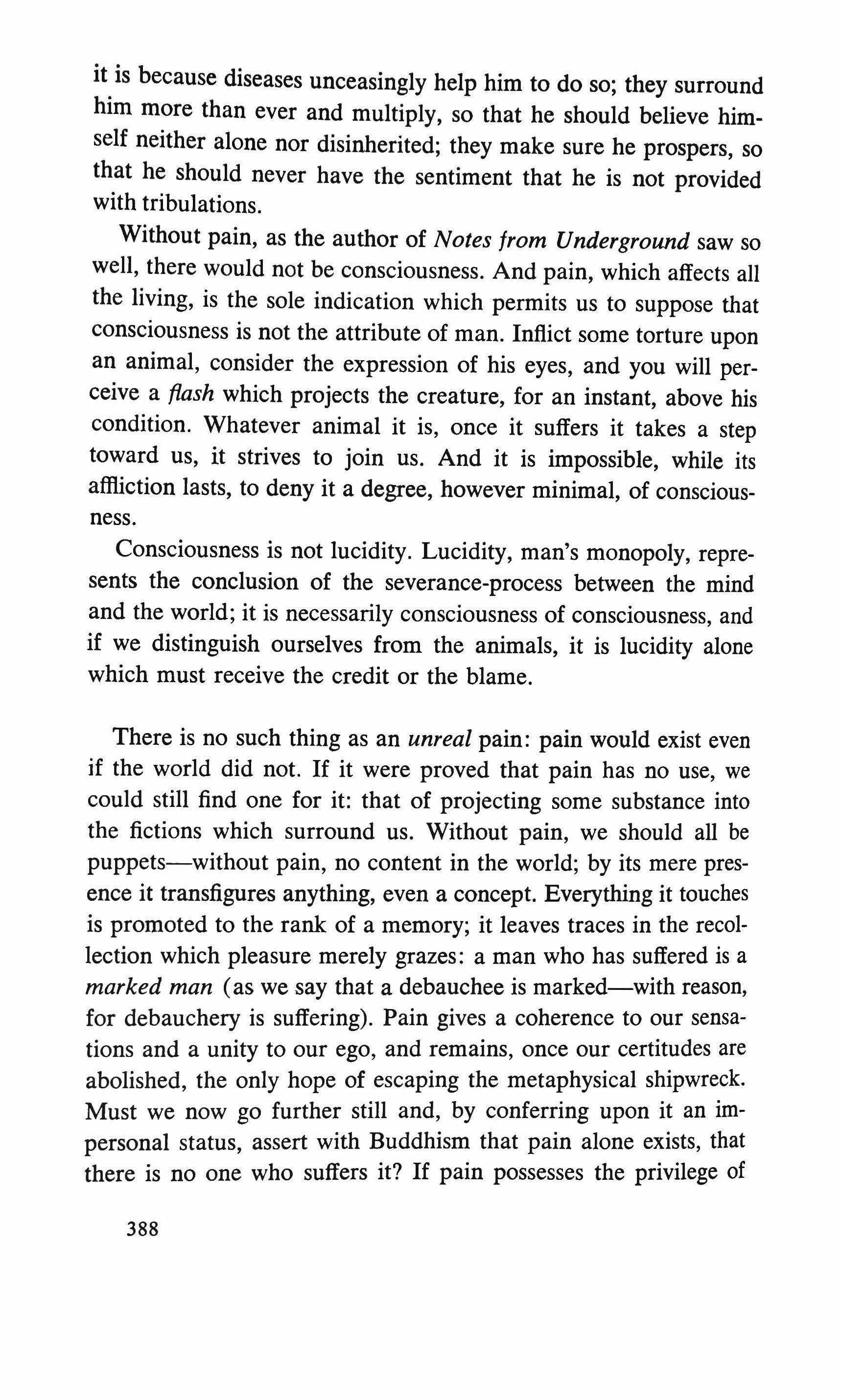
it is because diseases unceasingly help him to do so; they surround him more than ever and multiply, so that he should believe himself neither alone nor disinherited; they make sure he prospers, so that he should never have the sentiment that he is not provided with tribulations.
Without pain, as the author of Notes from Underground saw so well, there would not be consciousness. And pain, which affects all the living, is the sole indication which permits us to suppose that consciousness is not the attribute of man. Inflict some torture upon an animal, consider the expression of his eyes, and you will perceive a flash which projects the creature, for an instant, above his condition. Whatever animal it is, once it suffers it takes a step toward us, it strives to join us. And it is impossible, while its affliction lasts, to deny it a degree, however minimal, of consciousness.
Consciousness is not lucidity. Lucidity, man's monopoly, represents the conclusion of the severance-process between the mind and the world; it is necessarily consciousness of consciousness, and if we distinguish ourselves from the animals, it is lucidity alone which must receive the credit or the blame.
There is no such thing as an unreal pain: pain would exist even if the world did not. If it were proved that pain has no use, we could still find one for it: that of projecting some substance into the fictions which surround us. Without pain, we should all be puppets-without pain, no content in the world; by its mere presence it transfigures anything, even a concept. Everything it touches is promoted to the rank of a memory; it leaves traces in the recollection which pleasure merely grazes: a man who has suffered is a marked man (as we say that a debauchee is marked-with reason, for debauchery is suffering). Pain gives a coherence to our sensations and a unity to our ego, and remains, once our certitudes are abolished, the only hope of escaping the metaphysical shipwreck. Must we now go further still and, by conferring upon it an impersonal status, assert with Buddhism that pain alone exists, that there is no one who suffers it? If pain possesses the privilege of
388

subsisting in and of itself, and if the ego comes down to an illusion, then we wonder who suffers and what meaning this mechanical development to which it is reduced can have. It seems that Buddhism discovers pain everywhere only to belittle it all the more. But we, even when we admit that pain exists independently of ourselves, cannot conceive of ourselves without it nor separate it from ourselves, from our being, of which it is the substance, even the cause. How conceive of a sensation as such, without the support of the "1," how imagine a suffering which is not "ours"? To suffer is to be totally oneself, it is to accede to a state of noncoincidence with the world, for suffering is the generator of intervals; and, when it seizes us, we no longer identify ourselves with anything, not even with suffering: it is then that, doubly conscious, we keep vigil over our vigils.
Beyond the evils we endure, which strike us down and which we adjust ourselves to more or less, there are others which we desire as much by instinct as by calculation: an insistent thirst summons them, as if we were afraid that, ceasing to suffer, there would be nothing to hold on to. We need a reassuring datum, we wait to be given proof that we are touching something solid, that we are not divagating, wide of the mark. Pain, any pain, fills this role, and, when we have it within reach, we know with certainty that something exists. We can counter the world's flagrant unreality only by sensations; which explains why, when we are convinced that nothing affords any foundation, we cling to all that offers a positive content, to all that makes us suffer. The man who has passed through the Void will see in each painful sensation a providential succor, and what he most fears is to devour it, to exhaust it too quickly and to relapse into the state of dispossession and absence from which it had rescued him. Since he lives in a sterile laceration, he knows to satiety the disaster of tormenting himself without torments, of suffering without pain; and therefore he dreams of a series of precise, determined ordeals which free him from that intolerable vagueness, from that crucifying vacancy in which nothing is profitable, in which he advances to no purpose,
389

following the rhythm of a long and insubstantial agony. The Void, infinite impasse, longs to set limits to itself, and it is out of hunger for boundaries that it flings itself upon the first pain to appear, upon any sensation likely to wrest it from the pangs of the indefinite. This is because pain, circumscribed and hostile to the vague, is always charged with a meaning, even a negative one, whereas the Void is too vast to be able to contain any at all.
The ills which overwhelm us, the involuntary ones, are much more frequent and more real than the others; they are also the ills before which we are most helpless: accept them? escape them? we do not know how to react, and yet it is the one thing that matters. Pascal was right not to dwell upon diseases but upon the use they were to be put to. Yet it is impossible to follow him when he assures us that "the ills of the body are merely the punishment for and the entire representation of the ills of the soul." The assertion is so gratuitous that, to contradict it, we need merely look around us: obviously, disease strikes innocent and guilty alike, it even shows a visible predilection for the innocent; which is moreover to be expected, innocence, internal purity, almost always supposing a weak constitution. No doubt about it, Providence takes no particular pains with the delicate. Causes rather than reflections of our spiritual ills, our physical ills determine our vision of things and decide the direction our ideas will take. Pascal's formula is true, provided we reverse it.
No trace of moral necessity nor of equity in the distribution of health and disease. Should this annoy us, must we fall into the exaggerations of a Job? It is futile to rebel against pain. On the other hand, resignation is no longer in fashion: does it not refuse to flatter, to embellish our miseries? One does not depoeticize Hell with impunity. Resignation is not only out of date, it is even doomed: a virtue which corresponds to none of our weaknesses.
Once we commit ourselves to a passion, noble or sordid, it is of no importance, we are certain to proceed from torment to torment.
390
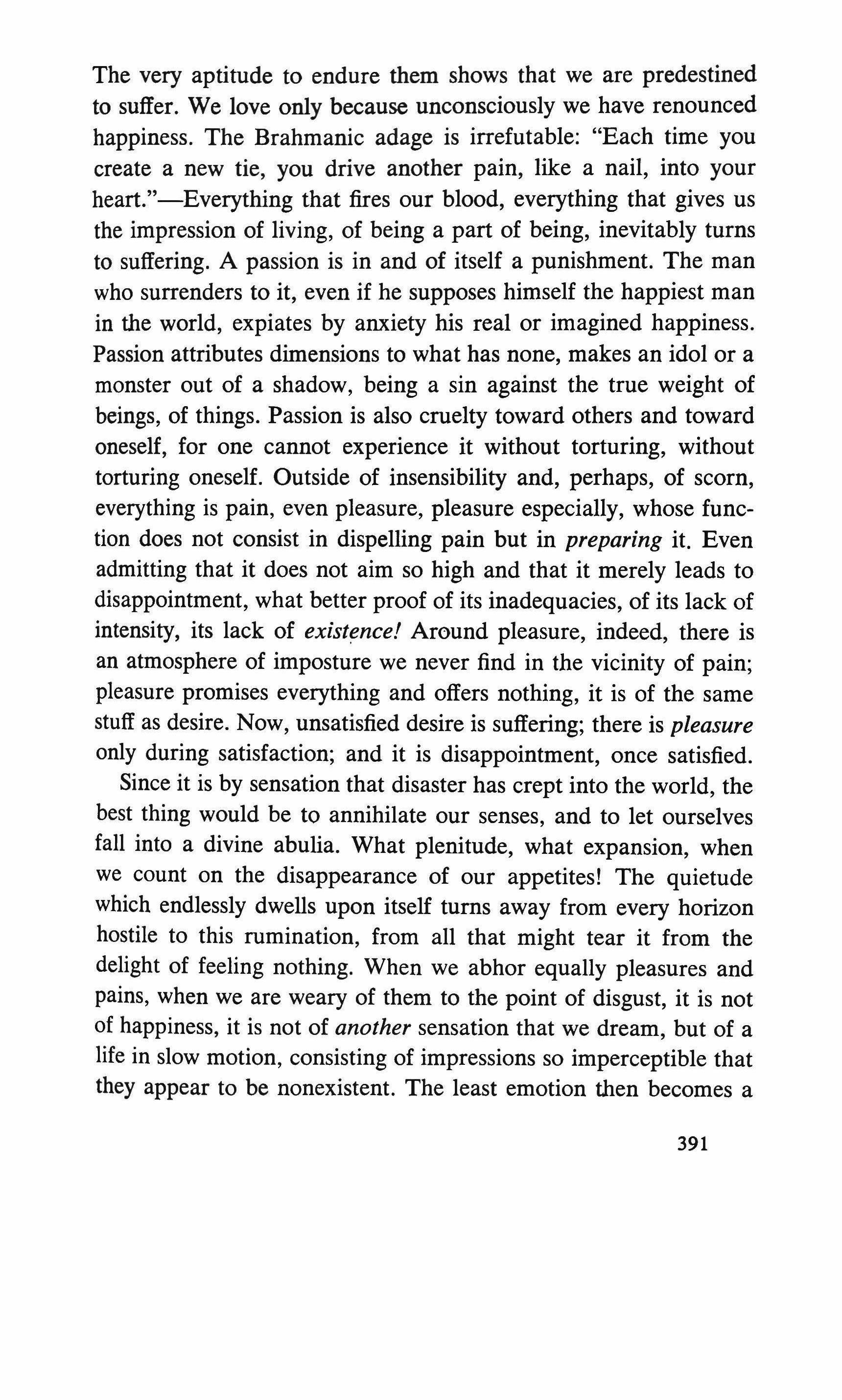
The very aptitude to endure them shows that we are predestined to suffer. We love only because unconsciously we have renounced happiness. The Brahmanic adage is irrefutable: "Each time you create a new tie, you drive another pain, like a nail, into your heart."-Everything that fires our blood, everything that gives us the impression of living, of being a part of being, inevitably turns to suffering. A passion is in and of itself a punishment. The man who surrenders to it, even if he supposes himself the happiest man in the world, expiates by anxiety his real or imagined happiness. Passion attributes dimensions to what has none, makes an idol or a monster out of a shadow, being a sin against the true weight of beings, of things. Passion is also cruelty toward others and toward oneself, for one cannot experience it without torturing, without torturing oneself. Outside of insensibility and, perhaps, of scorn, everything is pain, even pleasure, pleasure especially, whose function does not consist in dispelling pain but in preparing it. Even admitting that it does not aim so high and that it merely leads to disappointment, what better proof of its inadequacies, of its lack of intensity, its lack of existence! Around pleasure, indeed, there is an atmosphere of imposture we never find in the vicinity of pain; pleasure promises everything and offers nothing, it is of the same stuff as desire. Now, unsatisfied desire is suffering; there is pleasure only during satisfaction; and it is disappointment, once satisfied. Since it is by sensation that disaster has crept into the world, the best thing would be to annihilate our senses, and to let ourselves fall into a divine abulia. What plenitude, what expansion, when we count on the disappearance of our appetites! The quietude which endlessly dwells upon itself turns away from every horizon hostile to this rumination, from all that might tear it from the delight of feeling nothing. When we abhor equally pleasures and pains, when we are weary of them to the point of disgust, it is not of happiness, it is not of another sensation that we dream, but of a life in slow motion, consisting of impressions so imperceptible that they appear to be nonexistent. The least emotion then becomes a
391
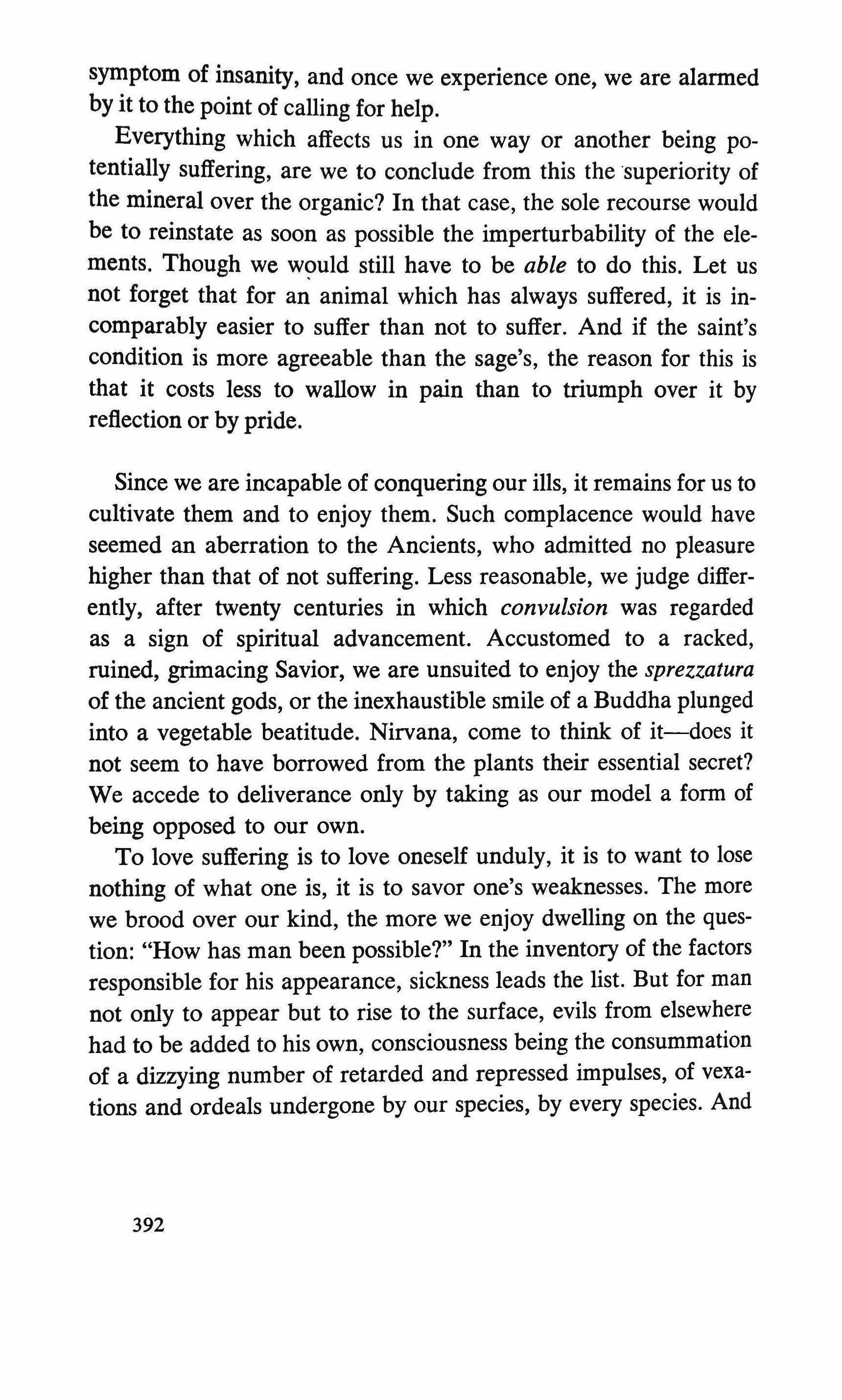
symptom of insanity, and once we experience one, we are alarmed by it to the point of calling for help.
Everything which affects us in one way or another being potentially suffering, are we to conclude from this the 'superiority of the mineral over the organic? In that case, the sole recourse would be to reinstate as soon as possible the imperturbability of the elements. Though we would still have to be able to do this. Let us not forget that for an animal which has always suffered, it is incomparably easier to suffer than not to suffer. And if the saint's condition is more agreeable than the sage's, the reason for this is that it costs less to wallow in pain than to triumph over it by reflection or by pride.
Since we are incapable of conquering our ills, it remains for us to cultivate them and to enjoy them. Such complacence would have seemed an aberration to the Ancients, who admitted no pleasure higher than that of not suffering. Less reasonable, we judge differently, after twenty centuries in which convulsion was regarded as a sign of spiritual advancement. Accustomed to a racked, ruined, grimacing Savior, we are unsuited to enjoy the sprezzatura of the ancient gods, or the inexhaustible smile of a Buddha plunged into a vegetable beatitude. Nirvana, come to think of it-does it not seem to have borrowed from the plants their essential secret? We accede to deliverance only by taking as our model a form of being opposed to our own.
To love suffering is to love oneself unduly, it is to want to lose nothing of what one is, it is to savor one's weaknesses. The more we brood over our kind, the more we enjoy dwelling on the question: "How has man been possible?" In the inventory of the factors responsible for his appearance, sickness leads the list. But for man not only to appear but to rise to the surface, evils from elsewhere had to be added to his own, consciousness being the consummation of a dizzying number of retarded and repressed impulses, of vexations and ordeals undergone by our species, by every species. And 392

man, after having profited by this infinity of ordeals, strives to justify them, to give them a meaning. "They will not have been futile, they have prepared and announced mine, more various and more intolerable than yours," he says to all other living beings in order to console them for not achieving torments as exceptional as his.
Skeptic & barbarian
If it is not hard to imagine all humanity in the grip of convulsions or, at least, of fear, it would be an overestimate of the race to suppose it can ever raise itself as a whole to the level of doubt, generally reserved for a few elite outcasts. Yet humanity accedes to doubt in part during those rare moments when it changes gods and when men's minds, subject to contradictory solicitations, no longer know which cause to defend, which truth to adopt. When Christianity burst upon Rome, the slaves appropriated it without hesitation; the patricians resisted, needing time to shift fr�m aversion to curiosity, from curiosity to fervor. Imagine a reader of the Pyrrhonian Hypotyposes faced with the Gospels! What artifice could reconcile not two doctrines but two universes? How greet ingenuous parables when one is grappling with the ultimate perplexities of the intellect? The treatises in which Sextus Empiricus, early in the third century A.D., reckoned up all the ancient world's doubts are an exhaustive compilation of the Unbreathable, the most dizzying pages ever written and, it must be said, the most boring. Too subtle and too methodical to compete with the new superstitions, they were the expression of a world already consummated, futureless, doomed. Yet skepticism, whose theses they had codified, managed to survive a while on lost positions, until the day when Christians and barbarians joined forces to reduce and abolish it.
A civilization begins by myth and ends in doubt; a theoretical doubt which, once it turns against itself, becomes quite practical. No civilization can begin by questioning values it has not yet ere-
393
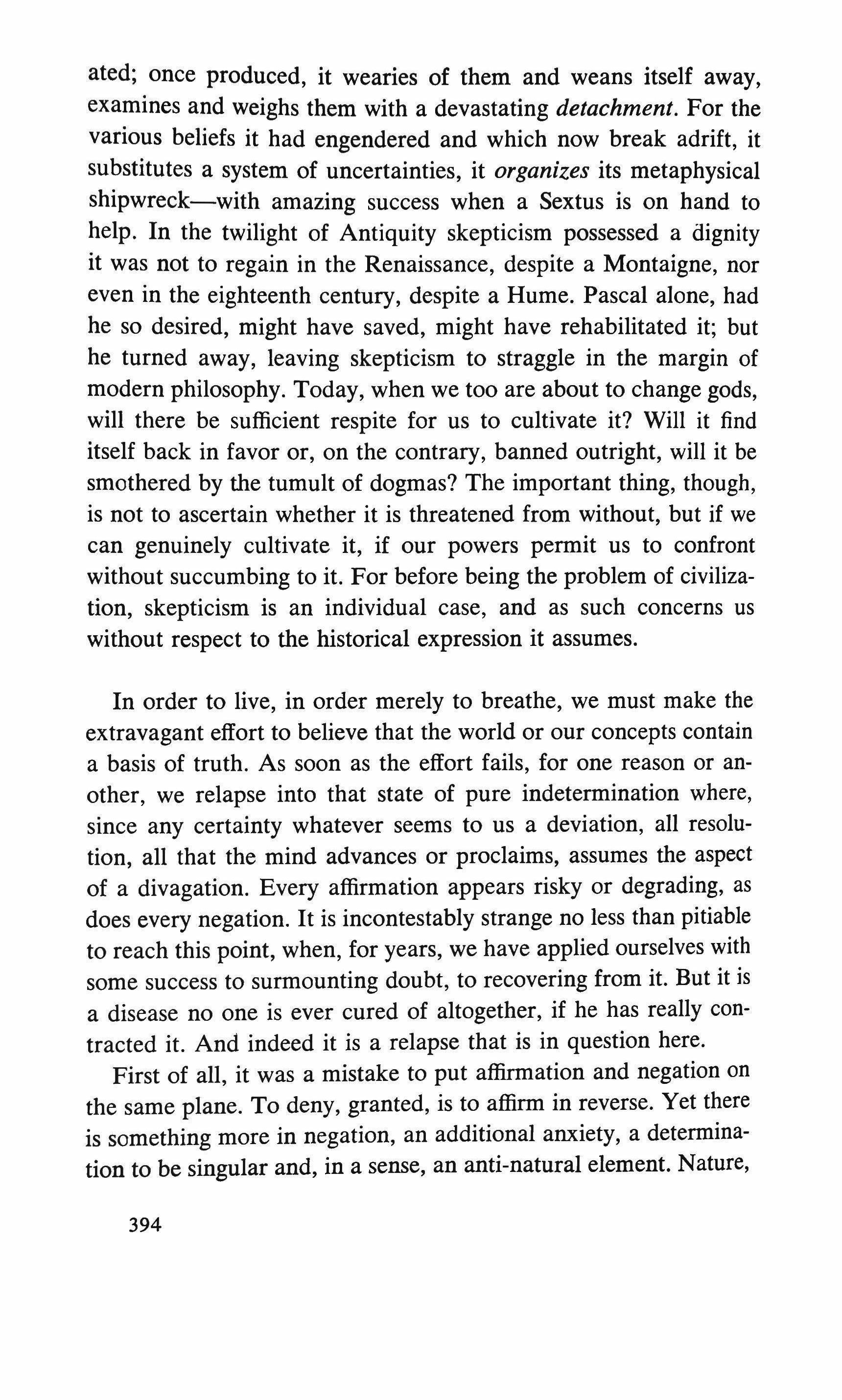
ated; once produced, it wearies of them and weans itself away, examines and weighs them with a devastating detachment. For the various beliefs it had engendered and which now break adrift, it substitutes a system of uncertainties, it organizes its metaphysical shipwreck-with amazing success when a Sextus is on hand to help. In the twilight of Antiquity skepticism possessed a dignity it was not to regain in the Renaissance, despite a Montaigne, nor even in the eighteenth century, despite a Hume. Pascal alone, had he so desired, might have saved, might have rehabilitated it; but he turned away, leaving skepticism to straggle in the margin of modern philosophy. Today, when we too are about to change gods, will there be sufficient respite for us to cultivate it? Will it find itself back in favor or, on the contrary, banned outright, will it be smothered by the tumult of dogmas? The important thing, though, is not to ascertain whether it is threatened from without, but if we can genuinely cultivate it, if our powers permit us to confront without succumbing to it. For before being the problem of civilization, skepticism is an individual case, and as such concerns us without respect to the historical expression it assumes.
In order to live, in order merely to breathe, we must make the extravagant effort to believe that the world or our concepts contain a basis of truth. As soon as the effort fails, for one reason or another, we relapse into that state of pure indetermination where, since any certainty whatever seems to us a deviation, all resolution, all that the mind advances or proclaims, assumes the aspect of a divagation. Every affirmation appears risky or degrading, as does every negation. It is incontestably strange no less than pitiable to reach this point, when, for years, we have applied ourselves with some success to surmounting doubt, to recovering from it. But it is a disease no one is ever cured of altogether, if he has really contracted it. And indeed it is a relapse that is in question here. First of all, it was a mistake to put affirmation and negation on the same plane. To deny, granted, is to affirm in reverse. Yet there is something more in negation, an additional anxiety, a determination to be singular and, in a sense, an anti-natural element. Nature,
394
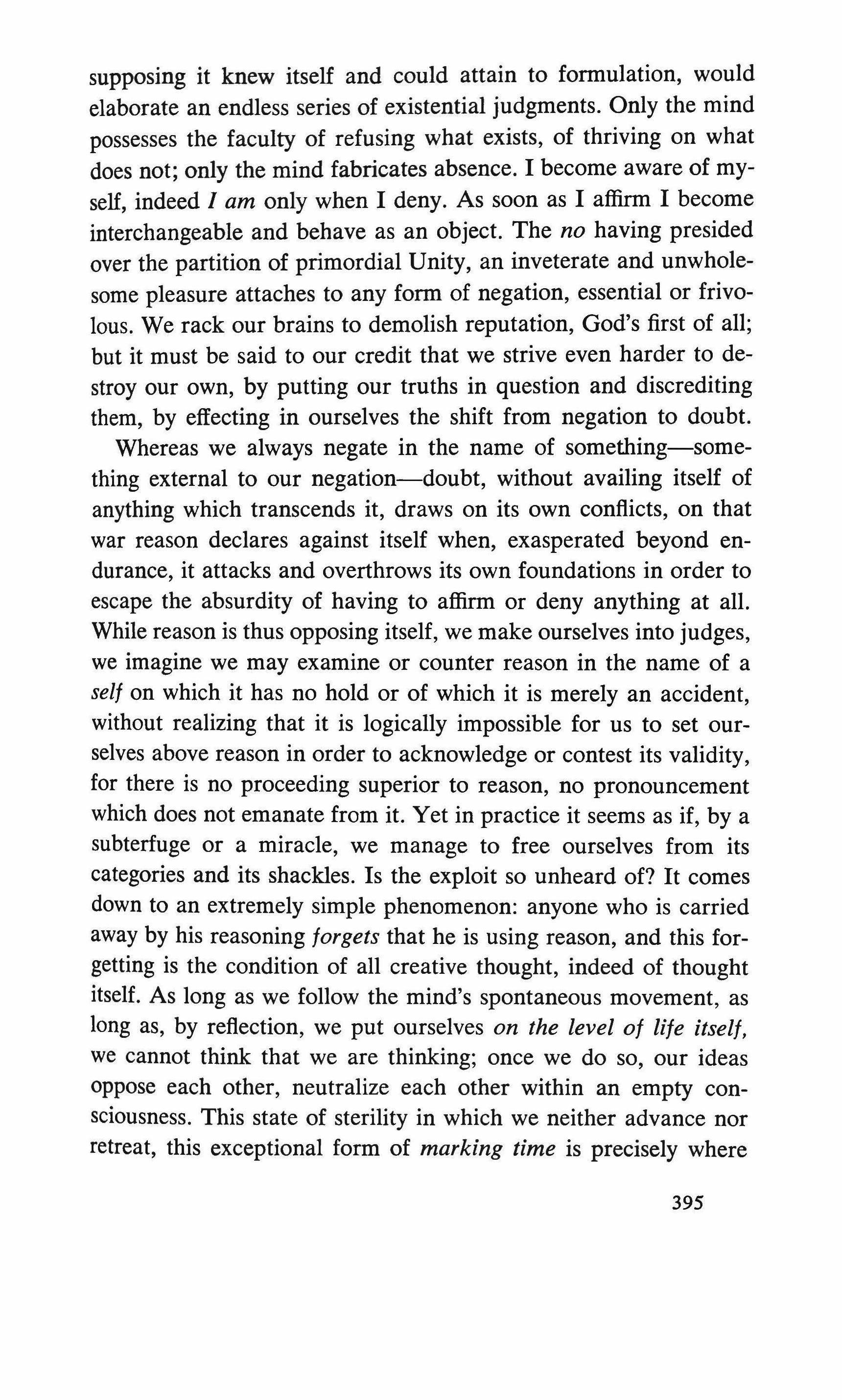
supposing it knew itself and could attain to formulation, would elaborate an endless series of existential judgments. Only the mind possesses the faculty of refusing what exists, of thriving on what does not; only the mind fabricates absence. I become aware of myself, indeed I am only when I deny. As soon as I affirm I become interchangeable and behave as an object. The no having presided over the partition of primordial Unity, an inveterate and unwholesome pleasure attaches to any form of negation, essential or frivolous. We rack our brains to demolish reputation, God's first of all; but it must be said to our credit that we strive even harder to destroy our own, by putting our truths in question and discrediting them, by effecting in ourselves the shift from negation to doubt. Whereas we always negate in the name of something-something external to our negation-doubt, without availing itself of anything which transcends it, draws on its own conflicts, on that war reason declares against itself when, exasperated beyond endurance, it attacks and overthrows its own foundations in order to escape the absurdity of having to affirm or deny anything at all. While reason is thus opposing itself, we make ourselves into judges, we imagine we may examine or counter reason in the name of a self on which it has no hold or of which it is merely an accident, without realizing that it is logically impossible for us to set ourselves above reason in order to acknowledge or contest its validity, for there is no proceeding superior to reason, no pronouncement which does not emanate from it. Yet in practice it seems as if, by a subterfuge or a miracle, we manage to free ourselves from its categories and its shackles. Is the exploit so unheard of? It comes down to an extremely simple phenomenon: anyone who is carried away by his reasoning forgets that he is using reason, and this forgetting is the condition of all creative thought, indeed of thought itself. As long as we follow the mind's spontaneous movement, as long as, by reflection, we put ourselves on the level of life itself, we cannot think that we are thinking; once we do so, our ideas oppose each other, neutralize each other within an empty consciousness. This state of sterility in which we neither advance nor retreat, this exceptional form of marking time is precisely where 395

doubt leads us, a state which in many respects is related to the acedia of the mystics. We had expected to realize the definitive, to establish ourselves in the ineffable; instead we are cast into the uncertain, devoured by the insipid. Everything frays in the intellect's self-torsion, a kind of furious stupor. Doubt crashes down upon us like a calamity; far from choosing it, we fall into it. And try as we will to wrest ourselves from it, to conjure it away, doubt never loses sight of us, for it is not even true that doubt crashes down upon us-doubt was within us, and we were foredoomed to it. No one chooses the lack of choice, nor strives to opt for the absence of option, for nothing that affects us deeply is willed. We are free to invent torments for ourselves, but they are no more than posture, attitude; only those torments count which emerge from us in spite of ourselves. Only the inevitable counts, which proceeds from our weaknesses and our ordeals, in short from our impossibilities. True doubt will never be deliberate; even in its elaborated form, it is merely the speculative disguise assumed by our intolerance for Being. Hence when it seizes us and we suffer its pangs, there is nothing whose nonexistence we cannot conceive.
We must posit a self-destructive principle of conceptual essence if we would understand the process by which reason manages to undermine its foundations, to devour itself. Not content to declare certainty impossible, it excludes even the notion of certainty, it will go further still and reject any form of evidence, for evidence originates in Being, from which reason has severed itself; and this severance engenders, defines, and consolidates doubt. Every judgment, even a negative one, is rooted in the immediate or implies a self-imposed blindness-without which reason finds nothing manifest to hold on to. The more resistant reason is to obscuring itself, the more it considers anyone proposition as gratuitous and void as the next. Since the least adherence-assent in any formseems to reason inexplicable, unheard of, supernatural, it will cultivate the uncertain and extend its range with a zeal which includes a touch of vice and, curiously, of vitality. This delights the skeptic, for without this panting quest of the improbable (which
396
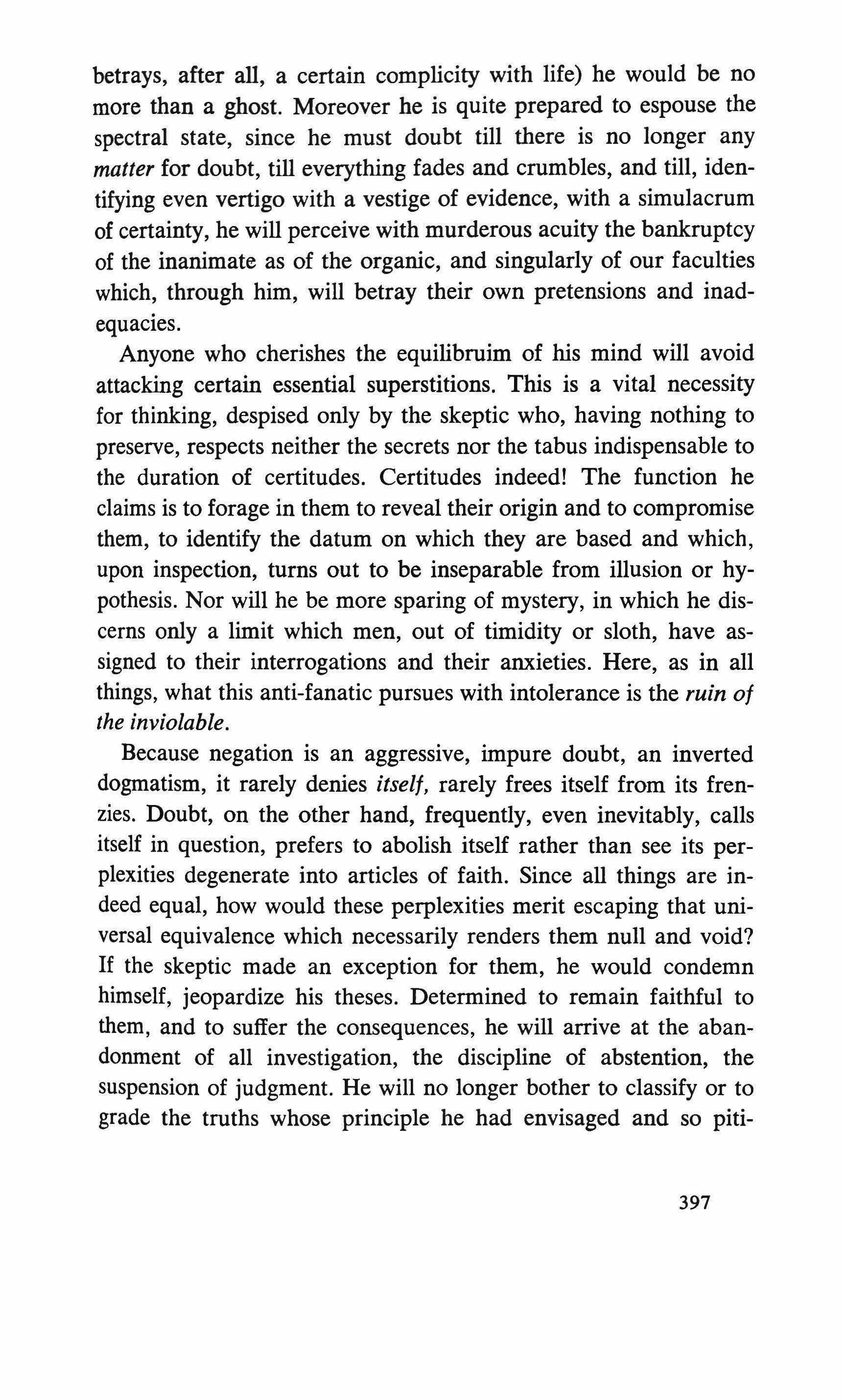
betrays, after all, a certain complicity with life) he would be no more than a ghost. Moreover he is quite prepared to espouse the spectral state, since he must doubt till there is no longer any matter for doubt, till everything fades and crumbles, and till, identifying even vertigo with a vestige of evidence, with a simulacrum of certainty, he will perceive with murderous acuity the bankruptcy of the inanimate as of the organic, and singularly of our faculties which, through him, will betray their own pretensions and inadequacies.
Anyone who cherishes the equilibruim of his mind will avoid attacking certain essential superstitions. This is a vital necessity for thinking, despised only by the skeptic who, having nothing to preserve, respects neither the secrets nor the tabus indispensable to the duration of certitudes. Certitudes indeed! The function he claims is to forage in them to reveal their origin and to compromise them, to identify the datum on which they are based and which, upon inspection, turns out to be inseparable from illusion or hypothesis. Nor will he be more sparing of mystery, in which he discerns only a limit which men, out of timidity or sloth, have assigned to their interrogations and their anxieties. Here, as in all things, what this anti-fanatic pursues with intolerance is the ruin of the inviolable.
Because negation is an aggressive, impure doubt, an inverted dogmatism, it rarely denies itself, rarely frees itself from its frenzies. Doubt, on the other hand, frequently, even inevitably, calls itself in question, prefers to abolish itself rather than see its perplexities degenerate into articles of faith. Since all things are indeed equal, how would these perplexities merit escaping that universal equivalence which necessarily renders them null and void? If the skeptic made an exception for them, he would condemn himself, jeopardize his theses. Determined to remain faithful to them, and to suffer the consequences, he will arrive at the abandonment of all investigation, the discipline of abstention, the suspension of judgment. He will no longer bother to classify or to grade the truths whose principle he had envisaged and so piti397
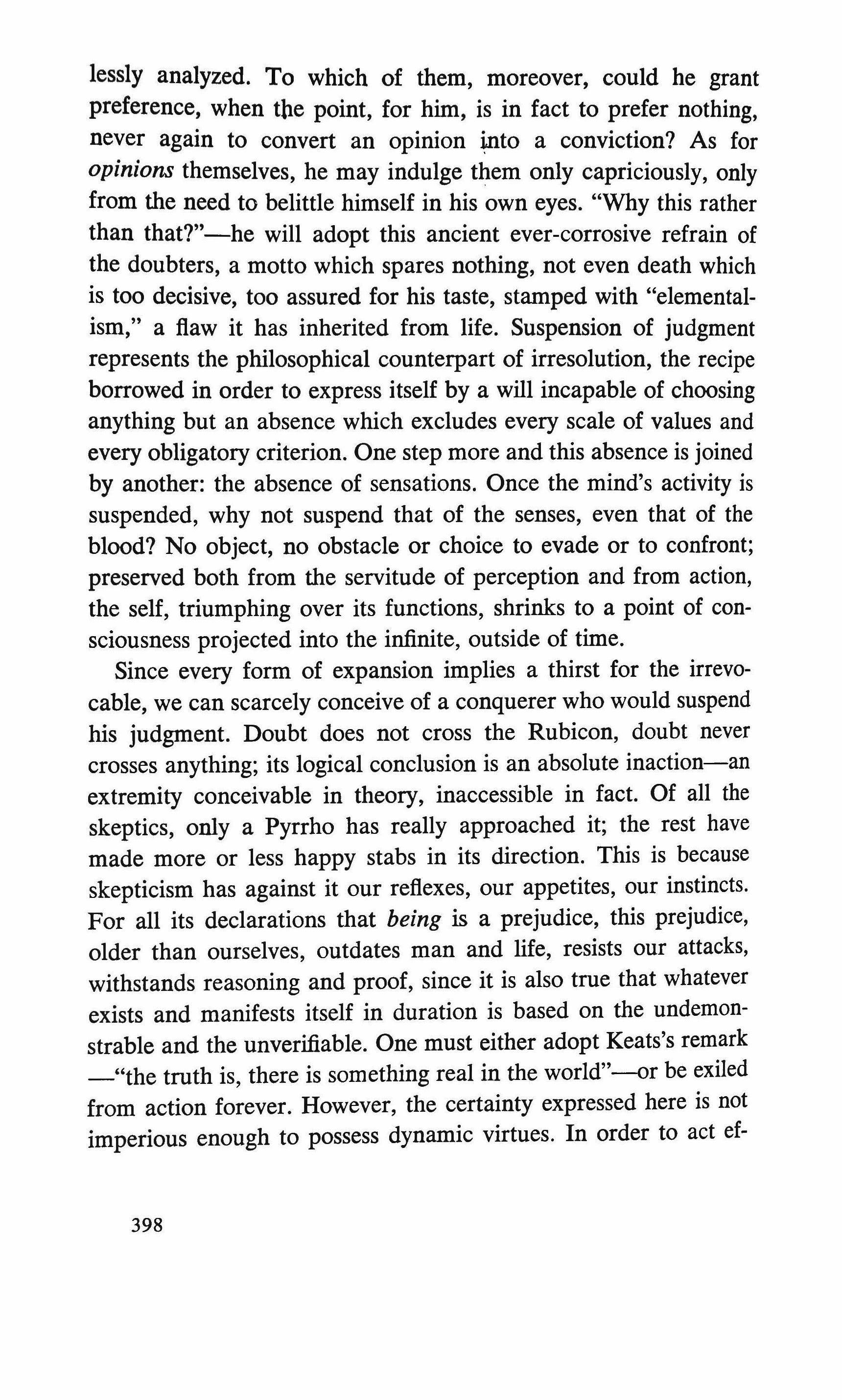
lessly analyzed. To which of them, moreover, could he grant preference, when the point, for him, is in fact to prefer nothing, never again to convert an opinion into a conviction? As for opinions themselves, he may indulge them only capriciously, only from the need to belittle himself in his own eyes. "Why this rather than that?"-he will adopt this ancient ever-corrosive refrain of the doubters, a motto which spares nothing, not even death which is too decisive, too assured for his taste, stamped with "elementalism," a flaw it has inherited from life. Suspension of judgment represents the philosophical counterpart of irresolution, the recipe borrowed in order to express itself by a will incapable of choosing anything but an absence which excludes every scale of values and every obligatory criterion. One step more and this absence is joined by another: the absence of sensations. Once the mind's activity is suspended, why not suspend that of the senses, even that of the blood? No object, no obstacle or choice to evade or to confront; preserved both from the servitude of perception and from action, the self, triumphing over its functions, shrinks to a point of consciousness projected into the infinite, outside of time.
Since every form of expansion implies a thirst for the irrevocable, we can scarcely conceive of a conquerer who would suspend his judgment. Doubt does not cross the Rubicon, doubt never crosses anything; its logical conclusion is an absolute inaction-an extremity conceivable in theory, inaccessible in fact. Of all the skeptics, only a Pyrrho has really approached it; the rest have made more or less happy stabs in its direction. This is because skepticism has against it our reflexes, our appetites, our instincts. For all its declarations that being is a prejudice, this prejudice, older than ourselves, outdates man and life, resists our attacks, withstands reasoning and proof, since it is also true that whatever exists and manifests itself in duration is based on the undemonstrable and the unverifiable. One must either adopt Keats's remark -"the truth is, there is something real in the world"-or be exiled from action forever. However, the certainty expressed here is not imperious enough to possess dynamic virtues. In order to act ef-
398
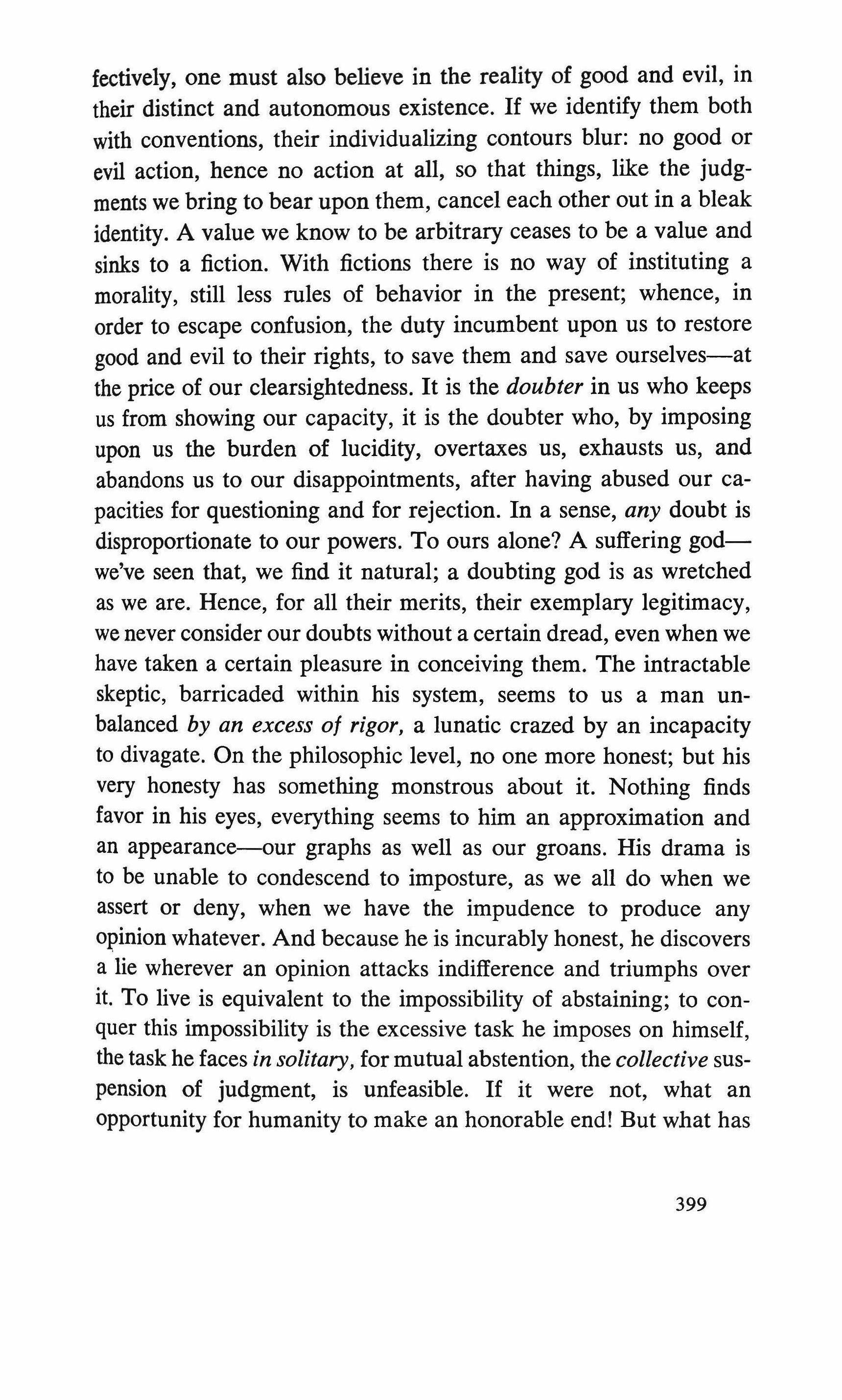
fectively, one must also believe in the reality of good and evil, in their distinct and autonomous existence. If we identify them both with conventions, their individualizing contours blur: no good or evil action, hence no action at all, so that things, like the judgments we bring to bear upon them, cancel each other out in a bleak identity. A value we know to be arbitrary ceases to be a value and sinks to a fiction. With fictions there is no way of instituting a morality, still less rules of behavior in the present; whence, in order to escape confusion, the duty incumbent upon us to restore good and evil to their rights, to save them and save ourselves-at the price of our c1earsightedness. It is the doubter in us who keeps us from showing our capacity, it is the doubter who, by imposing upon us the burden of lucidity, overtaxes us, exhausts us, and abandons us to our disappointments, after having abused our capacities for questioning and for rejection. In a sense, any doubt is disproportionate to our powers. To ours alone? A suffering godwe've seen that, we find it natural; a doubting god is as wretched as we are. Hence, for all their merits, their exemplary legitimacy, we never consider our doubts without a certain dread, even when we have taken a certain pleasure in conceiving them. The intractable skeptic, barricaded within his system, seems to us a man unbalanced by an excess of rigor, a lunatic crazed by an incapacity to divagate. On the philosophic level, no one more honest; but his very honesty has something monstrous about it. Nothing finds favor in his eyes, everything seems to him an approximation and an appearance-our graphs as well as our groans. His drama is to be unable to condescend to imposture, as we all do when we assert or deny, when we have the impudence to produce any opinion whatever. And because he is incurably honest, he discovers a lie wherever an opinion attacks indifference and triumphs over it. To live is equivalent to the impossibility of abstaining; to conquer this impossibility is the excessive task he imposes on himself, the task he faces in solitary, for mutual abstention, the collective suspension of judgment, is unfeasible. If it were not, what an opportunity for humanity to make an honorable end! But what has 399
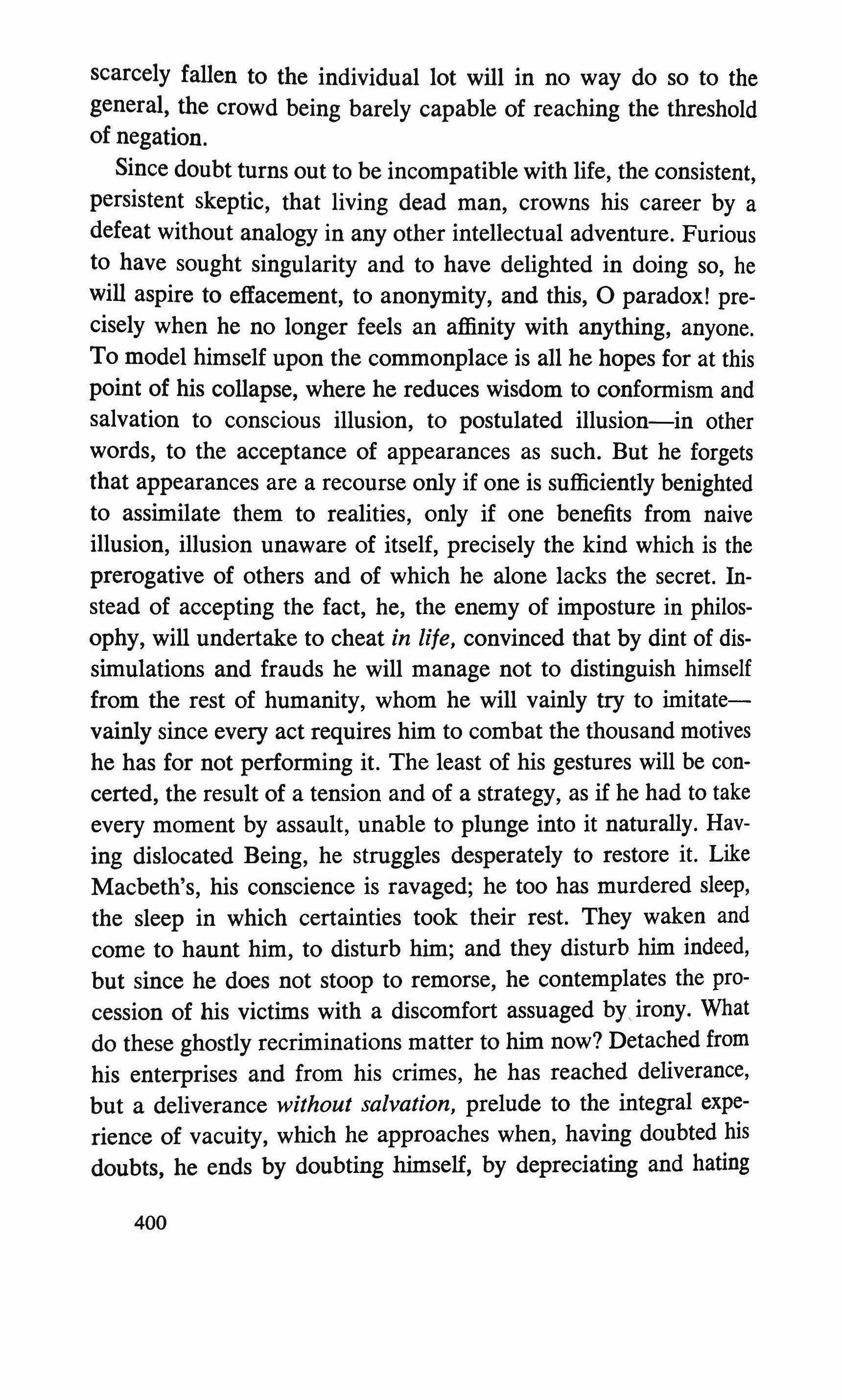
scarcely fallen to the individual lot will in no way do so to the general, the crowd being barely capable of reaching the threshold of negation.
Since doubt turns out to be incompatible with life, the consistent, persistent skeptic, that living dead man, crowns his career by a defeat without analogy in any other intellectual adventure. Furious to have sought singularity and to have delighted in doing so, he will aspire to effacement, to anonymity, and this, 0 paradox! precisely when he no longer feels an affinity with anything, anyone. To model himself upon the commonplace is all he hopes for at this point of his collapse, where he reduces wisdom to conformism and salvation to conscious illusion, to postulated illusion-in other words, to the acceptance of appearances as such. But he forgets that appearances are a recourse only if one is sufficiently benighted to assimilate them to realities, only if one benefits from naive illusion, illusion unaware of itself, precisely the kind which is the prerogative of others and of which he alone lacks the secret. Instead of accepting the fact, he, the enemy of imposture in philosophy, will undertake to cheat in life, convinced that by dint of dissimulations and frauds he will manage not to distinguish himself from the rest of humanity, whom he will vainly try to imitatevainly since every act requires him to combat the thousand motives he has for not performing it. The least of his gestures will be concerted, the result of a tension and of a strategy, as if he had to take every moment by assault, unable to plunge into it naturally. Having dislocated Being, he struggles desperately to restore it. Like Macbeth's, his conscience is ravaged; he too has murdered sleep, the sleep in which certainties took their rest. They waken and come to haunt him, to disturb him; and they disturb him indeed, but since he does not stoop to remorse, he contemplates the procession of his victims with a discomfort assuaged byirony, What do these ghostly recriminations matter to him now? Detached from his enterprises and from his crimes, he has reached deliverance, but a deliverance without salvation, prelude to the integral experience of vacuity, which he approaches when, having doubted his doubts, he ends by doubting himself, by depreciating and hating
400

himself, by no longer believing in his mission as destroyer. Once the last link is broken, the one which attached him to himself, and without which even self-destruction is impossible, he will seek refuge in primordial vacancy, in the most intimate of origins, before that friction between seed and substance which extends through the entire series of beings, from the insect to the most tormented of mammals. Since neither life nor death any longer excites his mind, he is less real than those shades whose reproaches he has just been subjected to. Not one subject any longer intrigues him which he would raise to the dignity of a problem, a scourge. His incuriosity attains to such breadth that it borders on total relinquishment, a nothingness more denuded than that on which the mystics pride themselves or lament after their peregrinations across the "desert" of divinity. Amid his seamless hebetude, a single thought still agonizes him, a single question-stupid, laughable, obsessive: "What did God do when He did nothing? how did He spend, before the Creation, His terrible leisure?" If he speaks to God as an equal, it is because they are both at the same degree of stagnation and futility. When his senses wither for lack of objects that might solicit them, and his reason ceases to function from the horror of passing judgment, he has reached the point where he can address himself only to the Non-Creator, Whom he resembles, with Whom he identifies himself, and Whose All, indiscernible from Nothing, is the space where, sterile and exhausted, he fulfills himself, he rests.
Beside the rigorous or, one might say; orthodox skeptic, whose lamentable and in certain respects grandiose end we have just seen, there exists another-heretical, capricious, who while suffering doubt only intermittently is capable of conceiving it to the last and of drawing its ultimate consequences. He too will know the suspension of judgment and the abolition of sensations, but only within a crisis, which he will surmount by projecting into the indetermination in which he sees himself cast a content and a irisson it seemed incapable of affording. Leaping outside the aporias in which his mind vegetated, he shifts from inertia to
401

exultation, he raises himself to a hallucinated enthusiasm which would turn mineral itself lyrical, if there were still minerals in his world. No consistency anywhere-everything is transfigured, everything vanishes; he alone remains, confronting a triumphal void. Free of the world's shackles and of understanding's as well, he too compares himself to God, this time a God Who will be brimming, excessive, intoxicated, plunged into the ecstasies of Creation and Whose privileges he will adopt, stricken with a sudden omniscience, a miraculous moment when the possible, deserting the Future, will dissolve into the moment, enlarging it, dilating it to the bursting point.
Whereupon this skeptic sui generis fears nothing so much as to fall back into another crisis. At least it will be permissible for him to consider from outside the doubt over which he has momentarily triumphed, contrary to the other kind who has hooked himself on it forever. Further he possesses another advantage, that of being able to open himself to experiences of another order, to those of religious minds especially, which utilize and exploit doubt, make it a stage, a provisional but indispensable hell in order to embark upon the absolute and take anchor there. These are the traitors to skepticism, whose example he would like to follow: insofar as he succeeds, he glimpses that the abolition of sensations can lead to something besides an impasse. When Sariputta, one of Buddha's disciples, exclaims: "Nirvana is bliss!" and when the objection is raised that there can be no bliss where there are no sensations, Sariputta answers: "Bliss is precisely that there is no sensation." -This paradox is no longer one for the man who, despite his tribulations and his attrition, still has enough resources to join Being on the borders of the Void, and to vanquish, even if only for brief intervals, that appetite for unreality out of which appears the irrefragable clarity of doubt, which can be opposed only by extra-rational evidence, conceived by another appetite, the appetite for what is real. Yet, taking advantage of the slightest weakness, the refrain "Why this rather than that?" returns, and its insistence and its repetition cast consciousness into an accursed
402

timelessness, into a frozen Becoming, whereas any yes and even a no make that consciousness participate in the substance of Time, from which they emanate and which they proclaim.
Every affirmation and, with all the more reason, every belief proceeds from a depth of barbarism which the majority, which virtually the totality of men have the good fortune to preserve, and which only the skeptic--once again, the true skeptic, the consistent one-has lost or liquidated, so that he retains only vague vestiges of it, too weak to influence his behavior or the conduct of his ideas. Hence, if there exist isolated skeptics in each period, skepticism, as a historical phenomenon, is to be met with only at the moments when a civilization no longer has a "soul" in the sense Plato gives the word: "what moves of itself." In the absence of any principle of movement, how should it still have a present, how especially a future? And just as the skeptic, at the end of his sapper's labor, reached a downfall like the one he had reserved for certitudes, so a civilization, after having undermined its values, collapses with them, and falls into a deliquescence in which barbarism appears the only remedy, as is evidenced by the apostrophe flung at the Romans by Salvianus early in the fifth century: "There is not one of your cities which is pure, unless it is those in which the barbarians dwell." -In this case, it was perhaps less a matter of licentiousness than of perplexity. Licentiousness, even debauchery, is becoming to a civilization, or at least a civilization adapts itself to them. But perplexity, once it spreads, terrorizes a civilization, which will turn to those who escape it, who are immune to it. And it is then that the barbarian begins to seduce, to fascinate delicate minds, minds in conflict who envy and admire him, sometimes openly, more often in secret, and long-without always admitting it to themselves-to become his slaves. That they also fear him is undeniable; but this fear, in no way salutary, contributes rather to their future subjection, weakens them, paralyzes them, and drives them deeper into their scruples, their impasses. For them, abdication, their sole solution, involves less a suspension 403
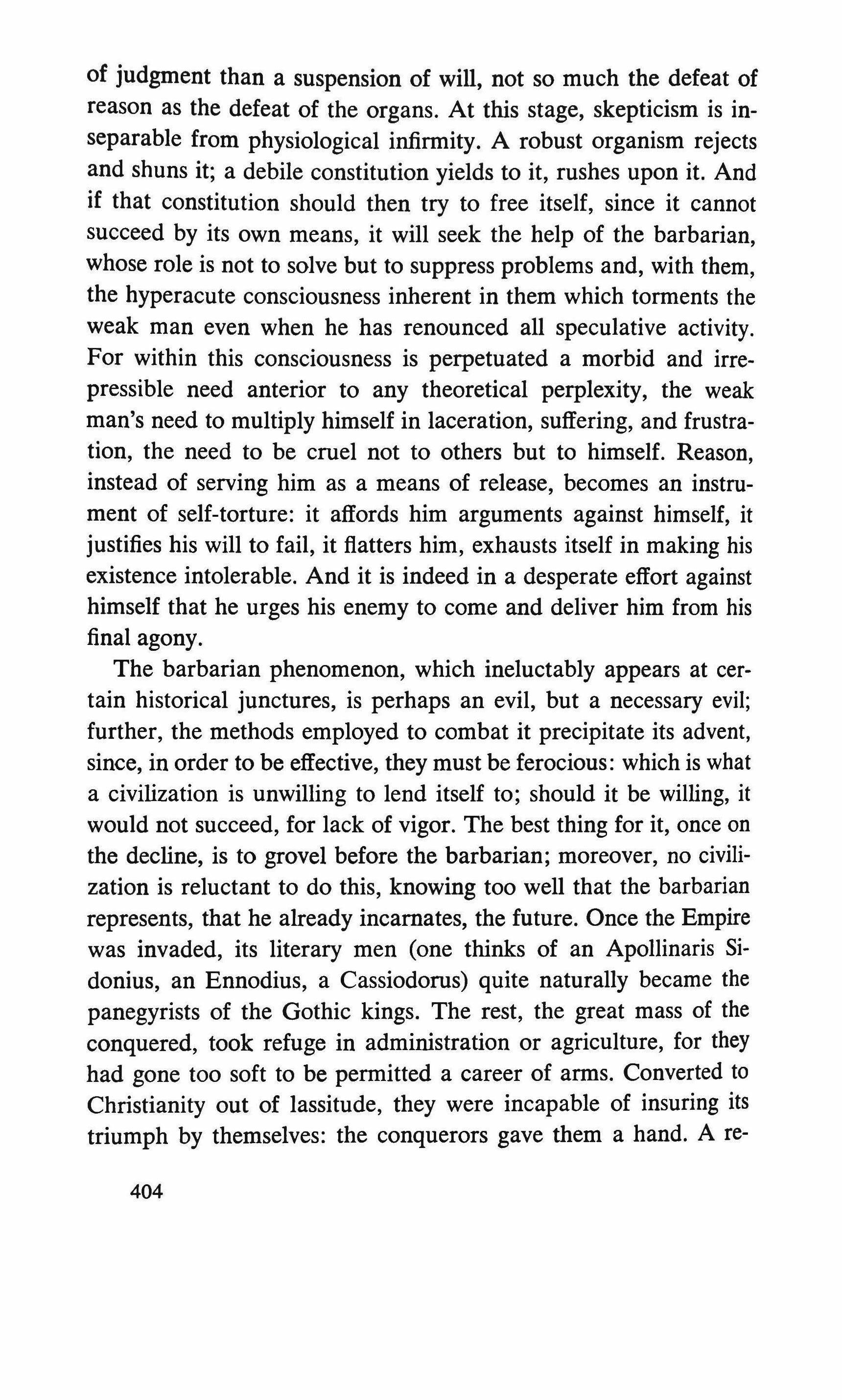
of judgment than a suspension of will, not so much the defeat of reason as the defeat of the organs. At this stage, skepticism is inseparable from physiological infirmity. A robust organism rejects and shuns it; a debile constitution yields to it, rushes upon it. And if that constitution should then try to free itself, since it cannot succeed by its own means, it will seek the help of the barbarian, whose role is not to solve but to suppress problems and, with them, the hyperacute consciousness inherent in them which torments the weak man even when he has renounced all speculative activity. For within this consciousness is perpetuated a morbid and irrepressible need anterior to any theoretical perplexity, the weak man's need to multiply himself in laceration, suffering, and frustration, the need to be cruel not to others but to himself. Reason, instead of serving him as a means of release, becomes an instrument of self-torture: it affords him arguments against himself, it justifies his will to fail, it flatters him, exhausts itself in making his existence intolerable. And it is indeed in a desperate effort against himself that he urges his enemy to come and deliver him from his final agony.
The barbarian phenomenon, which ineluctably appears at certain historical junctures, is perhaps an evil, but a necessary evil; further, the methods employed to combat it precipitate its advent, since, in order to be effective, they must be ferocious: which is what a civilization is unwilling to lend itself to; should it be willing, it would not succeed, for lack of vigor. The best thing for it, once on the decline, is to grovel before the barbarian; moreover, no civilization is reluctant to do this, knowing too well that the barbarian represents, that he already incarnates, the future. Once the Empire was invaded, its literary men (one thinks of an Apollinaris Sidonius, an Ennodius, a Cassiodorus) quite naturally became the panegyrists of the Gothic kings. The rest, the great mass of the conquered, took refuge in administration or agriculture, for they had gone too soft to be permitted a career of arms. Converted to Christianity out of lassitude, they were incapable of insuring its triumph by themselves: the conquerors gave them a hand. A re-
404

ligion is nothing by itself; its fate depends on those who adopt it. The new gods demand new men, capable, in any circumstance, of decision, of choice, of saying firmly yes or no, instead of floundering in quibbles or becoming anemic by abuse of nuance. Since the virtues of barbarians consist precisely in the power of taking sides, of affirming or denying, they will always be celebrated by declining periods. The nostalgia for barbarism is the last word of a civilization, and thereby of skepticism.
At the expiration of a cycle, what else can a disenchanted mind dream of but the brute luck of betting on the possible, of wallowing in it? Unsuited to defend the doubts it no longer practices or to subscribe to the dawning dogma it despises, such a mind applauds -supreme secession of the intellect-the irrefutable demonstrations of instinct: the Greek mind bows before the Roman, which in its turn will bow before the Goth, according to an inexorable rhythm, a law which history eagerly illustrates, today even more than at the beginning of the Christian era. The combat is unequal between the peoples who argue and the peoples who keep still, all the more in that the former, having eroded their vitality in caviling, feel drawn to the latter's coarseness and silence. If this is true of a collectivity, what can we say of an individual, especially of the skeptic? Indeed we must not be surprised to find him, specialist in subtlety though he is, at the heart of the ultimate solitude to which he has come, turning himself into a friend and accomplice of the hordes.
translated by Richard Howard
The above three chapters are from E. M._Cioran's book, The Fall into Time, just published by Quadrangle Books, Chicago.
405
On Cioran CHARLES NEWMAN

"And there, sir, lies the entire problem, to have within oneself the inseparable reality and the material clarity of feeling, to have it in such a degree that the feeling cannot but express itself, to have a wealth of words and of formal constructions which can join in the dance, serve one's purpose-and at the very moment when the soul is about to organize its wealth, its discoveries, this revelation, at the unconscious moment when the thing is about to emanate, a higher and evil will attacks the soul like vitriol, attacks the word and image mass, attacks the mass of feeling and leaves me panting at the very door of life."
--ANTONIN ARTAUD
A
fanatic without convictions
To say that Cioran is a paradox would be only a half-truth. He is ambivalent even about the possibility of being self-contradictory, profoundly skeptical of irony itself. Nevertheless, he is, crabwise, on the attack. The obsessive theme of these interrelated essays -his fifth of six such collections,t and the second to appear in English-is his revulsion against fashionable despair, that democratic access to bathos and absurdity which serves as the intellectual superstructure of our time.
t This essay will appear as the Introduction to E. M. Cioran's The Fall into Time, published by Quadrangle Books, Chicago.
406 TriQuarterJy
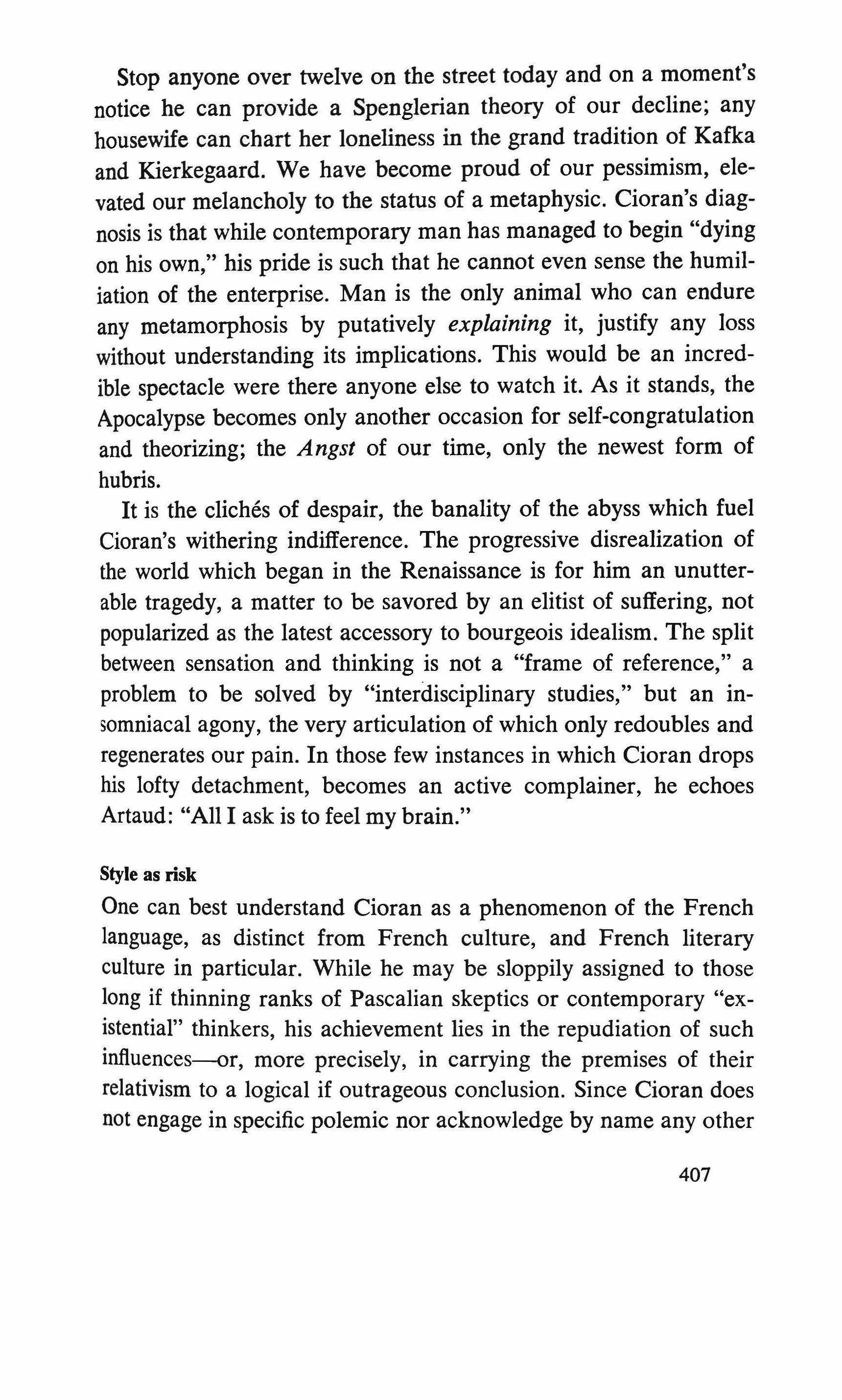
Stop anyone over twelve on the street today and on a moment's notice he can provide a Spenglerian theory of our decline; any housewife can chart her loneliness in the grand tradition of Kafka and Kierkegaard. We have become proud of our pessimism, elevated our melancholy to the status of a metaphysic. Cioran's diagnosis is that while contemporary man has managed to begin "dying on his own," his pride is such that he cannot even sense the humiliation of the enterprise. Man is the only animal who can endure any metamorphosis by putatively explaining it, justify any loss without understanding its implications. This would be an incredible spectacle were there anyone else to watch it. As it stands, the Apocalypse becomes only another occasion for self-congratulation and theorizing; the Angst of our time, only the newest form of hubris.
It is the cliches of despair, the banality of the abyss which fuel Cioran's withering indifference. The progressive disrealization of the world which began in the Renaissance is for him an unutterable tragedy, a matter to be savored by an elitist of suffering, not popularized as the latest accessory to bourgeois idealism. The split between sensation and thinking is not a "frame of reference," a problem to be solved by "interdisciplinary studies," but an insomniacal agony, the very articulation of which only redoubles and regenerates our pain. In those few instances in which Cioran drops his lofty detachment, becomes an active complainer, he echoes Artaud: "All I ask is to feel my brain."
Style as risk
One can best understand Cioran as a phenomenon of the French language, as distinct from French culture, and French literary culture in particular. While he may be sloppily assigned to those long if thinning ranks of Pascalian skeptics or contemporary "existential" thinkers, his achievement lies in the repudiation of such influences--or, more precisely, in carrying the premises of their relativism to a logical if outrageous conclusion. Since Cioran does not engage in specific polemic nor acknowledge by name any other 407

living writer, one can only imagine the extent of his contempt for the "committed" literature of a Sartre, for the systematic and relentless attempt to justify the duality of being and nonbeing, for the entire enterprise of attempting to resolve the ambiguities of literature and life. Similarly, one can see him jeering at the plight of Camus' Sisyphus, or for that matter at any other of those humorless existential trade unionists who compound their incompetence with stoicism, pit their solipsism against determinism and call it dignity. These "heroic" poses represent for Cioran only the latest revenge of the intellect against itself and confirm the loss of our best instincts. "To be human is no solution," as he says, "any more than ceasing to be so."
For Cioran, ontology itself is a specious problem, even an "ontology of nothingness," to use Michel Foucault's phrase, since reports of "the void" tend to be just as unverifiable as those about what we "know." There is nothing particularly affirmative about acknowledging the negative. Just because we hate ourselves, he observes apropos of Tolstoy, does not mean we still are not living a lie. The realization of "nothingness" is one thing-like going into a room and reporting that "nothing was there"-but one cannot begin at the beginning of nothingness any more than one can start at the beginning of any learning process; one cannot make assertions about language or nature from a hypothetical vantage point outside them. Anomie is our condition, anomia our curse, anomaly our profession. Or to put it another way: our scabrous individuality consists of trying to name our condition. Man loses his primordial grace in literally trying to "make a name" for himself.
The central concern of The Temptation to Exist, Cioran's first book to appear in English, was to confirm the total disjunction between language and reality. That work represents a kind of final assault on the typology which has formed the basis of Western thought-the notion that the physical world embodies signs of metaphysical reality; and, more, that if human intelligence is pure, it can define these correspondences through language. "The works of God" as Jonathan Edwards had it, "are but a kind of voice
408

or language to instruct beings in things pertaining to himself wherever we are, and whatever we are about, we may see divine things excellently represented and it will abundantly tend to confirm the Scriptures, for there is an excellent agreement between these things and the Scripture."
But for Cioran, language is a sticky symbolic net, an infinite regression from things cutting men off from the world, as they once cut themselves off from God; and so, to scramble the metaphor, humans are no more than shadows who project their images upon the mirror of infinity. ("A shadow grappling with images, a somnambulist who sees himself walking ") What Edwards called the "images or shadows of divine things," Cioran would rearrange as 'divined images by shadows of no things.' This conclusion of The Temptation to Exist becomes the working hypothesis of The Fall into Time. Nothing divine, only the divined: language, insofar as it can reorient our behavior, perhaps slows the death of the species; but at the same time, in increasing our endless analogies for experience, it prevents us from being fully alive to ourselves. Neutralized by our uniqueness, we become incapable of capitalizing even on what sets us apart from the animals-our capacity for indifference. Style is the man-unfortunately for us. As Cioran puts it: "Consciousness is not lucidity. Lucidity, man's monopoly, represents the severance process between the mind and the world; it is necessarily consciousness of consciousness, and if we are to distinguish ourselves from the animals, it is lucidity alone which must receive the credit or the blame."
Language as a vicious circle literally signifying nothing except itself becomes the exaggeration pro forma of man's condition-all speech hyperbole, all prose rhetorical, all poetry prosedemic, all thought proleptic. It is not a new idea. Nietzsche elaborated it better than anyone. Wittgenstein confirmed it with positivist precision: "Philosophy is a battle against bewitchment of our intelligence by the means of language." Cioran would be appalled if anyone accused him of originality in thought, which would not be necessarily desirable even if it were possible. What is original is his personalization of these ideas through his style: "Every idolatry of style
409
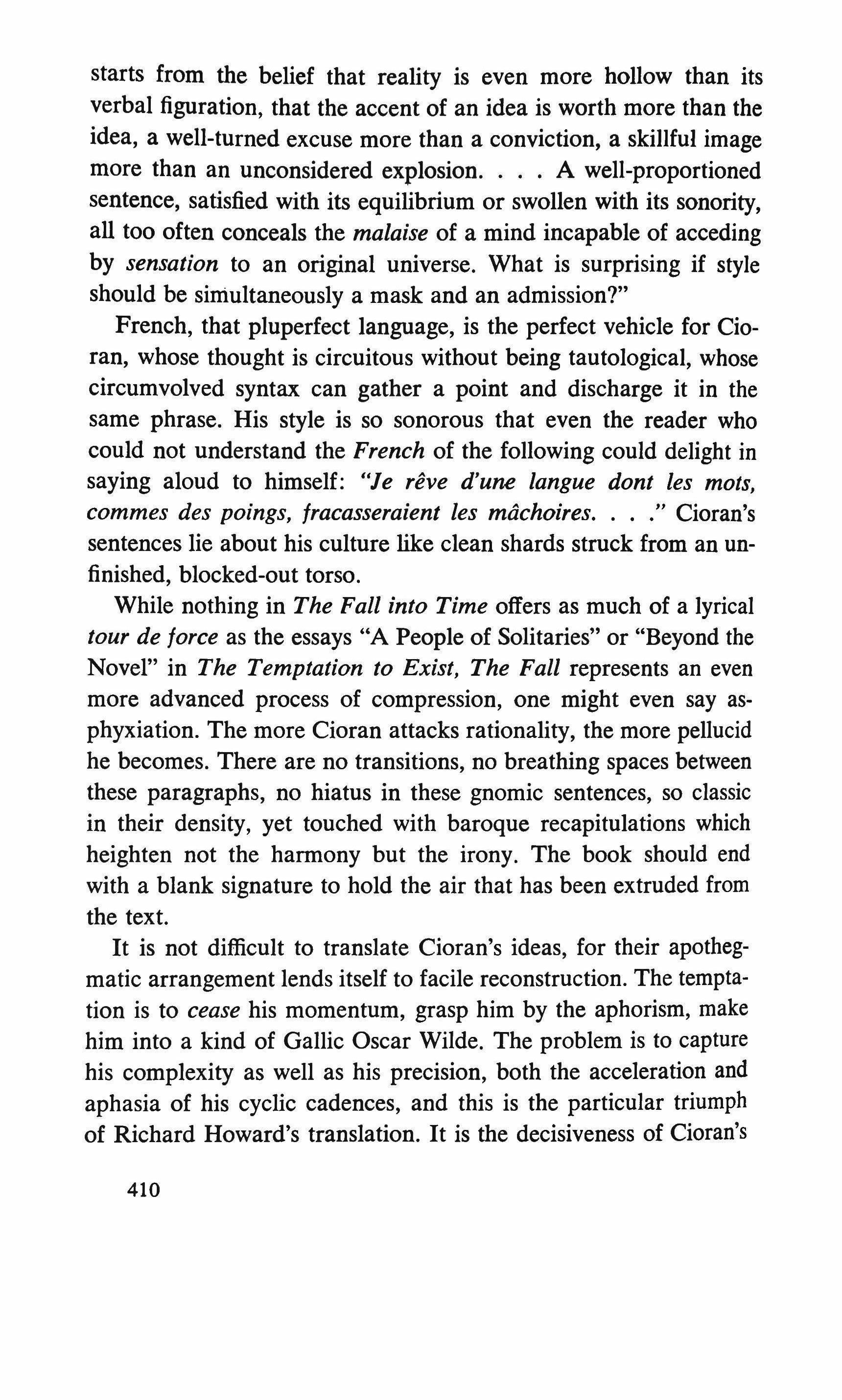
starts from the belief that reality is even more hollow than its verbal figuration, that the accent of an idea is worth more than the idea, a well-turned excuse more than a conviction, a skillful image more than an unconsidered explosion
A well-proportioned sentence, satisfied with its equilibrium or swollen with its sonority, all too often conceals the malaise of a mind incapable of acceding by sensation to an original universe. What is surprising if style should be simultaneously a mask and an admission?" French, that pluperfect language, is the perfect vehicle for Cioran, whose thought is circuitous without being tautological, whose circumvolved syntax can gather a point and discharge it in the same phrase. His style is so sonorous that even the reader who could not understand the French of the following could delight in saying aloud to himself: "Ie reve d'une langue dont les mots, commes des poings, fracasseraient les mdchoires " Cioran's sentences lie about his culture like clean shards struck from an unfinished, blocked-out torso.
While nothing in The Fall into Time offers as much of a lyrical tour de force as the essays "A People of Solitaries" or "Beyond the Novel" in The Temptation to Exist, The Fall represents an even more advanced process of compression, one might even say asphyxiation. The more Cioran attacks rationality, the more pellucid he becomes. There are no transitions, no breathing spaces between these paragraphs, no hiatus in these gnomic sentences, so classic in their density, yet touched with baroque recapitulations which heighten not the harmony but the irony. The book should end with a blank signature to hold the air that has been extruded from the text.
It is not difficult to translate Cioran's ideas, for their apothegmatic arrangement lends itself to facile reconstruction. The temptation is to cease his momentum, grasp him by the aphorism, make him into a kind of Gallic Oscar Wilde. The problem is to capture his complexity as well as his precision, both the acceleration and aphasia of his cyclic cadences, and this is the particular triumph of Richard Howard's translation. It is the decisiveness of Cioran's
410

style which both accentuates and gives the lie to the ambivalence of his message; it is a style which does not embody his thoughts as much as it exemplifies the consequences of his thought. As Edward Said has pointed out, Cioran is to the essay what Borges is to fiction.t
His friends, the enemy
For Cioran, sterility itself becomes a strategy. His method is calculated to defy introduction, his individual works serve to undermine his oeuvre. The parts are always more than the whole. But at the same time he infects us with what he insists is man's worst impulse-to append, explain, refute, to add to-to take language as seriously as we might take life were we abler. Other writers cry out for attention; one reads Cioran to be rid of him. One writes in order to ignore him. One is "fair" to him at one's peril. For his attenuation and ascesis demand that we justify those impure energies which activate our willingness to account for him, to put him in context-for in doing so, we confess our inability to take him at his word, becoming one of that "throng of readers, those omnipresent and invisible murderers." Not unlike certain great ladies, he possesses you in order to disdain your interest.
In this respect, he asks to be demolished, but only totally, and so maintains a certain invulnerability. For what he says of Sextus Empericus applies to himself: "Too subtle and too methodical to compete with the new superstitions, [his treatises] were the expression of a world already consummated, futureless, doomed. Yet skepticism, whose theses they had codified, managed to survive a while on lost positions."
It is easy to quote Cioran against himself; indeed, he demands it. But the strategy requires that you have the last word. No one who has written on him to date has been able to resist it. I first came across him--or rather his essay on the novel-nine years ago, and that essay was later to serve as a departure point for a t Edward W. Said, "Amateur of the Insoluble," Hudson Review, XXI, No.4 (Winter 1968-69). This is the best consideration of The Temptation to Exist to appear in either English or French.
411
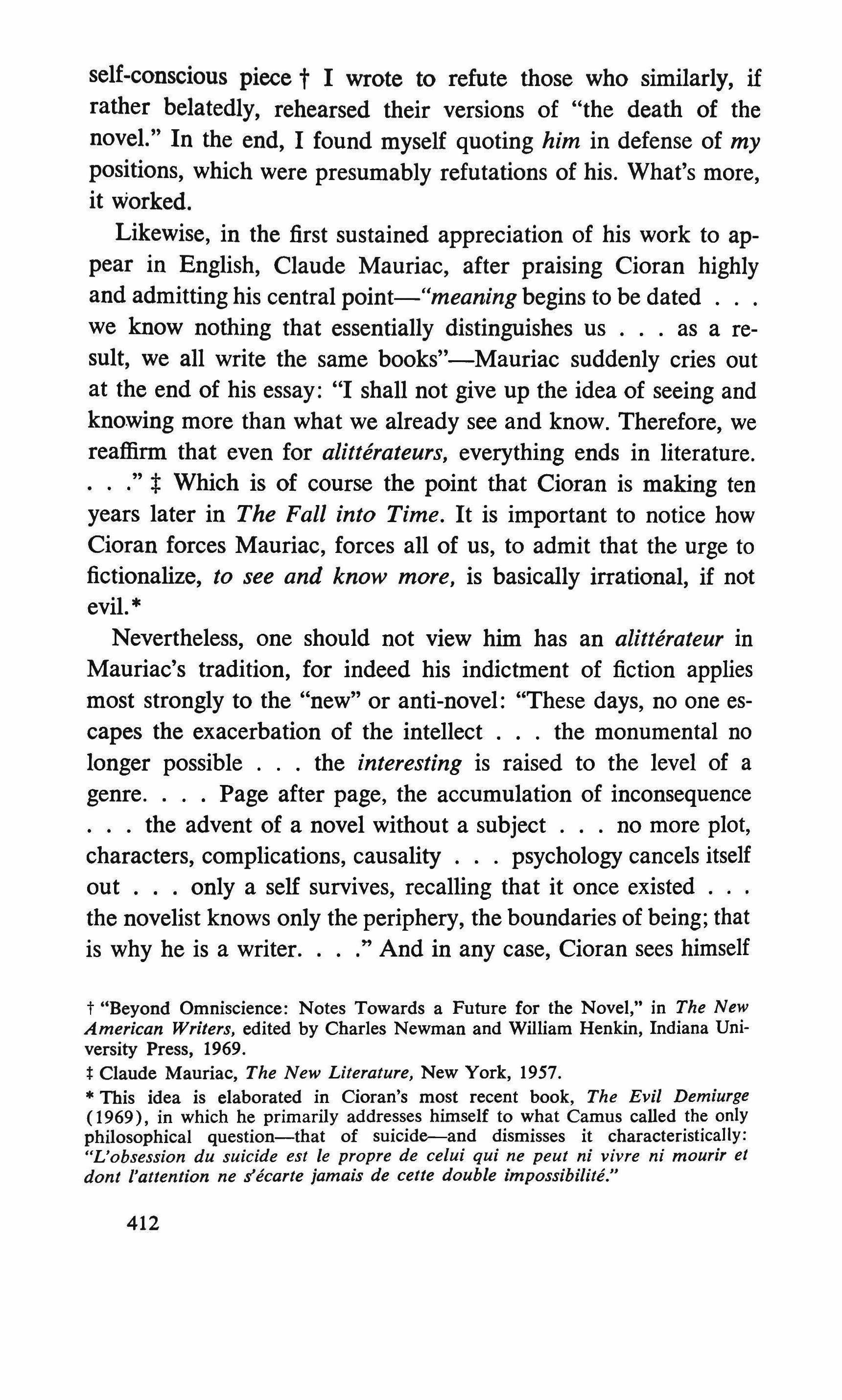
self-conscious piece t I wrote to refute those who similarly, if rather belatedly, rehearsed their versions of "the death of the novel." In the end, I found myself quoting him in defense of my positions, which were presumably refutations of his. What's more, it worked.
Likewise, in the first sustained appreciation of his work to appear in English, Claude Mauriac, after praising Cioran highly and admitting his central point-"meaning begins to be dated we know nothing that essentially distinguishes us as a result, we all write the same books"-Mauriac suddenly cries out at the end of his essay: "I shall not give up the idea of seeing and knowing more than what we already see and know. Therefore, we reaffirm that even for alitterateurs, everything ends in literature. ." t Which is of course the point that Cioran is making ten years later in The Fall into Time. It is important to notice how Cioran forces Mauriac, forces all of us, to admit that the urge to fictionalize, to see and know more, is basically irrational, if not evil. *
Nevertheless, one should not view him has an alitterateur in Mauriac's tradition, for indeed his indictment of fiction applies most strongly to the "new" or anti-novel: "These days, no one escapes the exacerbation of the intellect the monumental no longer possible the interesting is raised to the level of a genre. Page after page, the accumulation of inconsequence the advent of a novel without a subject no more plot, characters, complications, causality psychology cancels itself out only a self survives, recalling that it once existed the novelist knows only the periphery, the boundaries of being; that is why he is a writer And in any case, Cioran sees himself
t "Beyond Omniscience: Notes Towards a Future for the Novel," in The New American Writers, edited by Charles Newman and William Henkin, Indiana University Press, 1969.
t Claude Mauriac, The New Literature, New York, 1957.
• This idea is elaborated in Cioran's most recent book, The Evil Demiurge (1969), in which he primarily addresses himself to what Camus called the only philosophical question-that of suicide--and dismisses it characteristically: "L'obsession du suicide est le propre de celui qui ne peut ni vivre ni mourir et dont l'attention ne s'ecarte jamais de cette double impossibilite:" 412

less a negator than a doubter, because "to live without a goal is more difficult than to live for a bad cause."
Finally, Cioran knows he has an advantage and admits it. "Criticism is of the ages," he says, religious inspirations [and, we presume, other art] a privilege of certain eminently rare periods. It requires a great deal of thoughtlessness and intoxication to engender a god, to kill one requires only a little attention." Cioran reaffirms Thomas Mann's pronouncement that every modern artist must become his own critic-but for Cioran this is hardly a salutary event, just the necessity of the artist to explain what he might have done.
In another vein, William Gass makes use of a vitriolic and lengthy attack upon Cioran t to append some epistolary paragraphs on the possibilities of love and growth as an antidote to Cioran's "incurable pessimism": "To feel at home in our body, to sense the true nostos of it, is to have it move to our will so smoothly we seem will-less altogether." Actually, what Cioran is saying in The Temptation to Exist is that it is our penchant for diagnosis which is our sickness, and that is precisely why it is incurable. It is our relentless attempt to be well that distracts us and finishes us off in the end. Again, Cioran has provoked the reader-who-isalso-a-writer into the kind of self-justificatory and sentimental outburst which he defines as the seat of our hopelessness. And to the analogy of the will-less body with which Gass attacks his Temptation to Exist, Cioran would seem to offer an oblique rejoinder in The Fall into Time: "True, most men breathe without realizing, without thinking about it; should their breath fail them someday, they will discover how air, suddenly converted into a problem, haunts them every instant. Woe unto those who know they are b thirea mg
Similarly, or at least more topically, Susan Sontag, after much praise and brilliant analysis, ends up by placing Cioran against John Cage, which is precisely the sort of ludicrous juxtaposition and oblation that Cioran asks for-but again, the critic is finally
t William H. Gass, "The Evil Demiurge,' New York Review of Books, August 22, 1968.
413
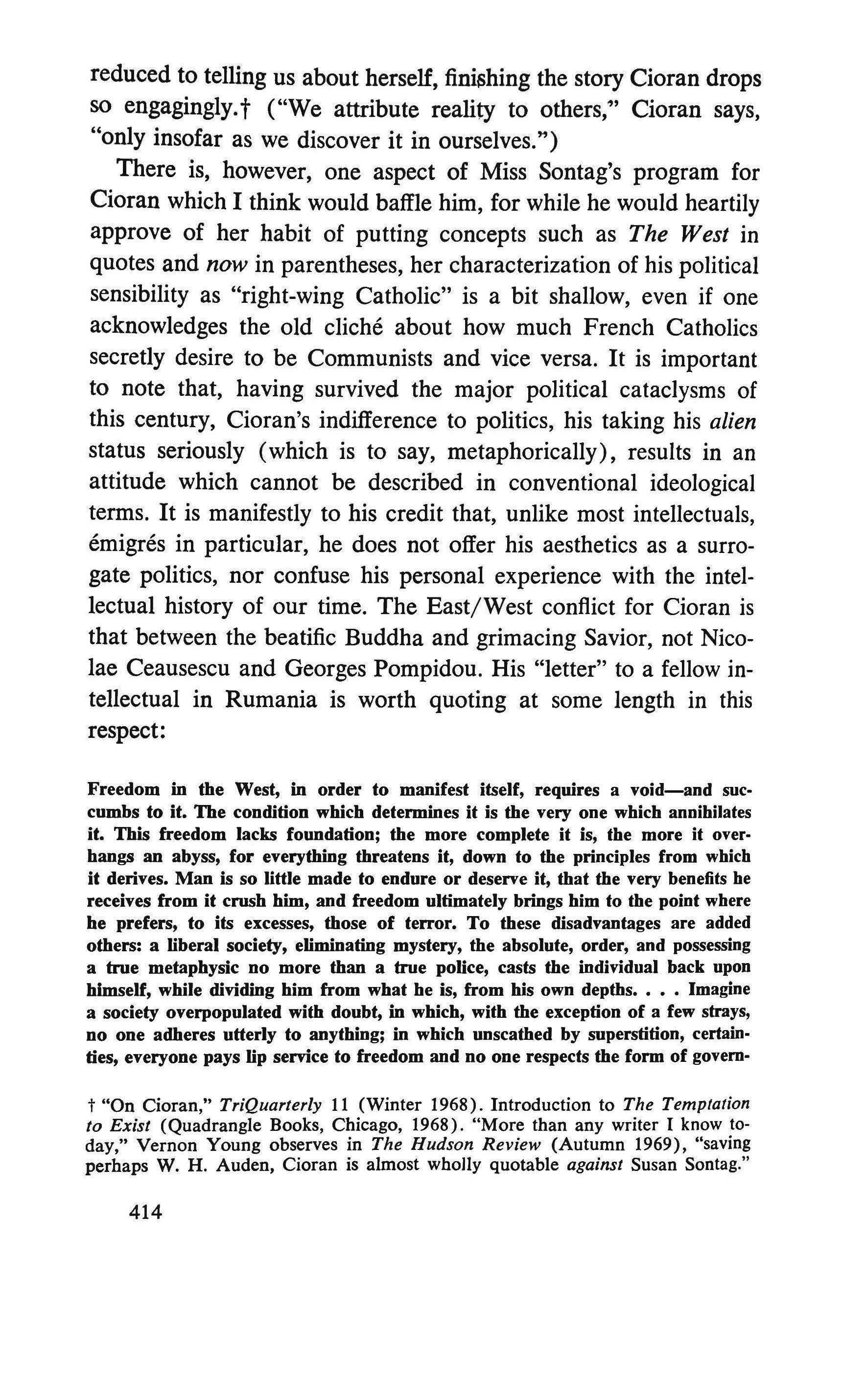
reduced to telling us about herself, finishing the story Cioran drops so engagingly.t ("We attribute reality to others," Cioran says, "only insofar as we discover it in ourselves.")
There is, however, one aspect of Miss Sontag's program for Cioran which I think would baffle him, for while he would heartily approve of her habit of putting concepts such as The West in quotes and now in parentheses, her characterization of his political sensibility as "right-wing Catholic" is a bit shallow, even if one acknowledges the old cliche about how much French Catholics secretly desire to be Communists and vice versa. It is important to note that, having survived the major political cataclysms of this century, Cioran's indifference to politics, his taking his alien status seriously (which is to say, metaphorically), results in an attitude which cannot be described in conventional ideological terms. It is manifestly to his credit that, unlike most intellectuals, emigres in particular, he does not offer his aesthetics as a surrogate politics, nor confuse his personal experience with the intellectual history of our time. The East/West conflict for Cioran is that between the beatific Buddha and grimacing Savior, not Nicolae Ceausescu and Georges Pompidou. His "letter" to a fellow intellectual in Rumania is worth quoting at some length in this respect:
Freedom in the West, in order to manifest itself, requires a void-and succumbs to it. The condition which determines it is the very one which annihilates it. This freedom lacks foundation; the more complete it is, the more it overhangs an abyss, for everything threatens it, down to the principles from which it derives. Man is so little made to endure or deserve it, that the very benefits he receives from it crush him, and freedom ultimately brings him to the point where he prefers, to its excesses, those of terror. To these disadvantages are added others: a liberal society, eliminating mystery, the absolute, order, and possessing a true metaphysic no more than a true police, casts the individual back upon himself, while dividing him from what he is, from his own depths. Imagine a society overpopulated with doubt, in which, with the exception of a few strays, no one adheres utterly to anything; in which unscathed by superstition, certainties, everyone pays lip service to freedom and no one respects the form of govern-
t "On Cioran," TriQuarterly 11 (Winter 1968). Introduction to The Temptation to Exist (Quadrangle Books, Chicago, 1968). "More than any writer I know today," Vernon Young observes in The Hudson Review (Autumn 1969), "saving perhaps W. H. Auden, Cioran is almost wholly quotable against Susan Sontag."
414
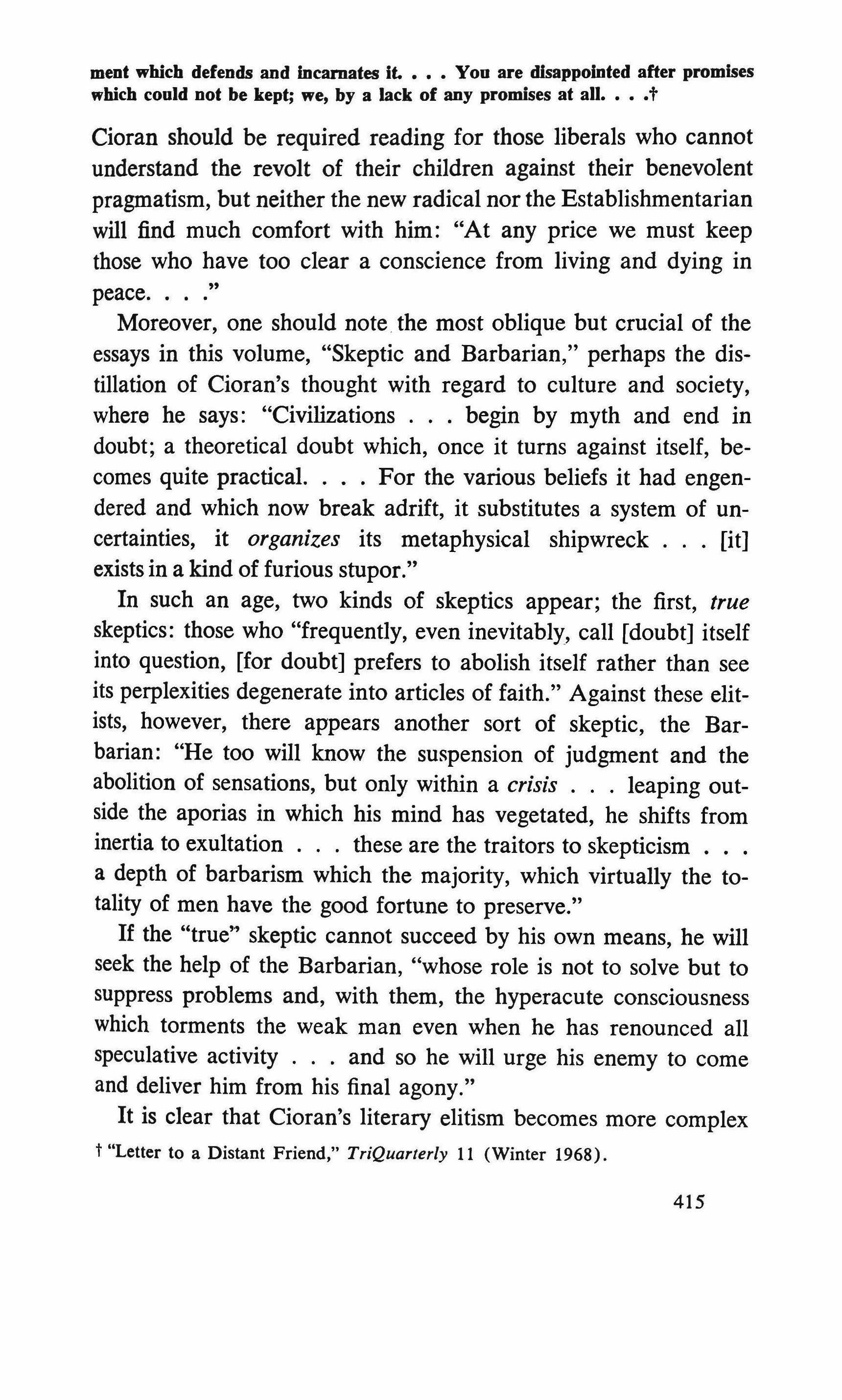
ment which defends and incarnates it. You are disappointed after promises which could not be kept; we, by a lack of any promises at all. t
Cioran should be required reading for those liberals who cannot understand the revolt of their children against their benevolent pragmatism, but neither the new radical nor the Establishmentarian will find much comfort with him: "At any price we must keep those who have too clear a conscience from living and dying in peace
Moreover, one should note. the most oblique but crucial of the essays in this volume, "Skeptic and Barbarian," perhaps the distillation of Cioran's thought with regard to culture and society, where he says: "Civilizations begin by myth and end in doubt; a theoretical doubt which, once it turns against itself, becomes quite practical. For the various beliefs it had engendered and which now break adrift, it substitutes a system of uncertainties, it organizes its metaphysical shipwreck [it] exists in a kind of furious stupor."
In such an age, two kinds of skeptics appear; the first, true skeptics: those who "frequently, even inevitably, call [doubt] itself into question, [for doubt] prefers to abolish itself rather than see its perplexities degenerate into articles of faith." Against these elitists, however, there appears another sort of skeptic, the Barbarian: "He too will know the suspension of judgment and the abolition of sensations, but only within a crisis leaping outside the aporias in which his mind has vegetated, he shifts from inertia to exultation these are the traitors to skepticism a depth of barbarism which the majority, which virtually the totality of men have the good fortune to preserve."
If the "true" skeptic cannot succeed by his own means, he will seek the help of the Barbarian, "whose role is not to solve but to suppress problems and, with them, the hyperacute consciousness which torments the weak man even when he has renounced all speculative activity and so he will urge his enemy to come and deliver him from his final agony."
It is clear that Cioran's literary elitism becomes more complex t "Letter to a Distant Friend," TriQuarterly 11 (Winter 1968).
415
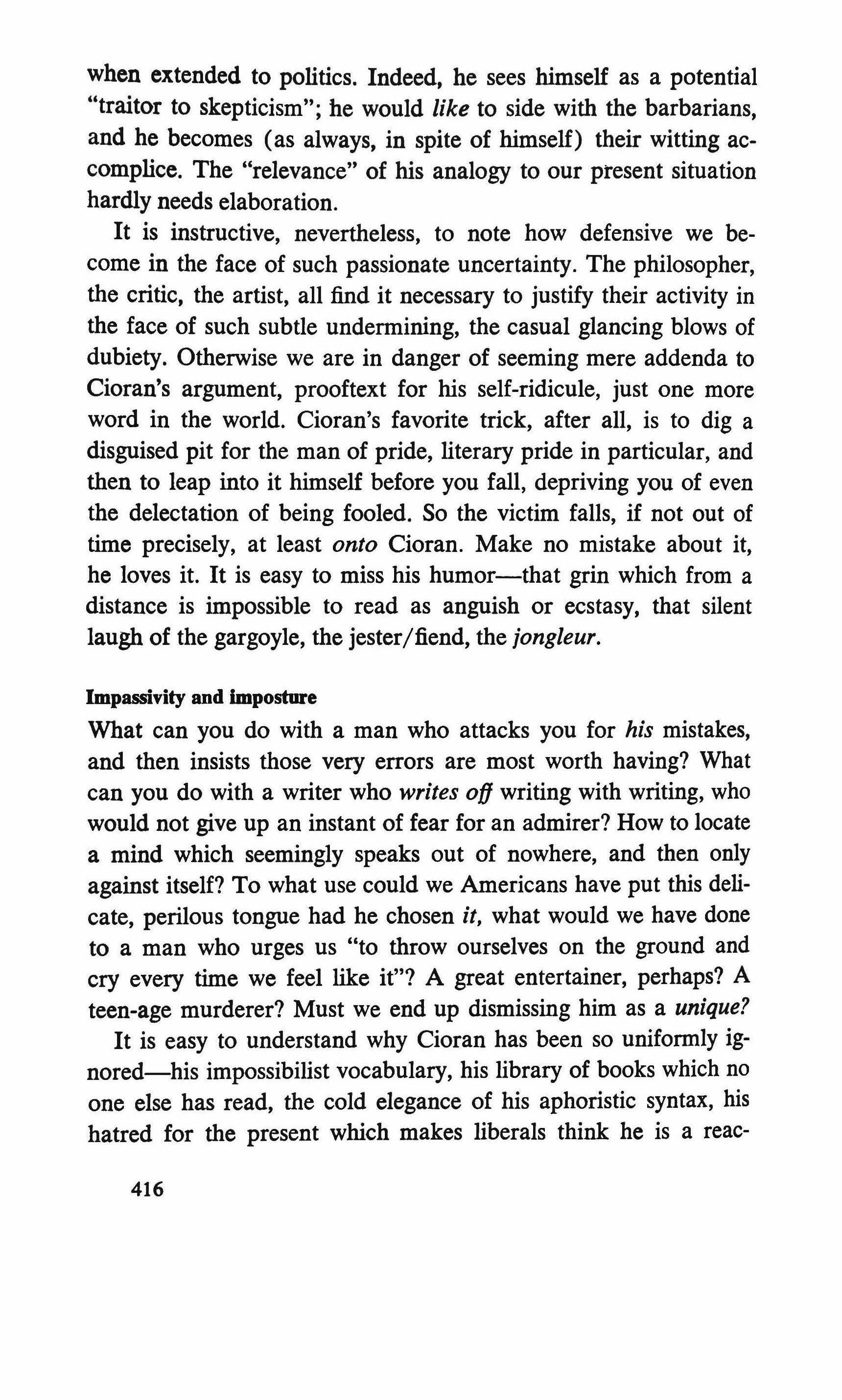
when extended to politics. Indeed, he sees himself as a potential "traitor to skepticism"; he would like to side with the barbarians, and he becomes (as always, in spite of himself) their witting accomplice. The "relevance" of his analogy to our present situation hardly needs elaboration.
It is instructive, nevertheless, to note how defensive we become in the face of such passionate uncertainty. The philosopher, the critic, the artist, all find it necessary to justify their activity in the face of such subtle undermining, the casual glancing blows of dubiety. Otherwise we are in danger of seeming mere addenda to Cioran's argument, prooftext for his self-ridicule, just one more word in the world. Cioran's favorite trick, after all, is to dig a disguised pit for the man of pride, literary pride in particular, and then to leap into it himself before you fall, depriving you of even the delectation of being fooled. So the victim falls, if not out of time precisely, at least onto Cioran. Make no mistake about it, he loves it. It is easy to miss his humor-that grin which from a distance is impossible to read as anguish or ecstasy, that silent laugh of the gargoyle, the jester/fiend, the jongleur.
Impassivity and imposture
What can you do with a man who attacks you for his mistakes, and then insists those very errors are most worth having? What can you do with a writer who writes off writing with writing, who would not give up an instant of fear for an admirer? How to locate a mind which seemingly speaks out of nowhere, and then only against itself? To what use could we Americans have put this delicate, perilous tongue had he chosen it, what would we have done to a man who urges us "to throw ourselves on the ground and cry every time we feel like it"? A great entertainer, perhaps? A teen-age murderer? Must we end up dismissing him as a unique? It is easy to understand why Cioran has been so uniformly ignored-his impossibilist vocabulary, his library of books which no one else has read, the cold elegance of his aphoristic syntax, his hatred for the present which makes liberals think he is a reac-
416

tionary; the insistent isolato voice which makes conservatives think he is an anarchist, the effortless erudition which gains him the suspicion of scholars, the astringent elitism which can only put the wider audience he deserves hopelessly on the defensive. Too tough-minded to be considered tragic, too funny to be a true terrorist, the Barbarian appears on the rim of the Carpathians to preside at the death of a civilization, only to be "civilized" in spite of himself, a redundant eremite, a specialist in the last gasp.
Given Cioran's enormous efforts to repudiate writing as a career, the contemporary reader may tend to underestimate what is most striking about his accomplishment. For the most difficult task for the writer is not how to "make a living," to ignore both insult and loneliness, but how to survive one's "circle," one's own supportive contemporaries. While most of the intelligentsia of Cioran's Sixth Arrondissement in the late '30's and '40's have long since repaired to their respective ministries of culture and/or ceased writing altogether, we still receive terse messages from one who has stayed put, made a profession of not being for sale, had the strength to let his talent mature at its own pace. (Cioran was thirty-six before he even decided to write in French.) t As Edward Dahlberg, the only living writer 1 know of who has affinities with Cioran, says: "I don't think we write for anybody, just like we die for nobody every time we compose a good line, a forest springs up in our hearts." Cioran could only concur with an imperceptible nod. Neither of them can forgive a society in which hermeticism is the only possible honesty.
There is really only one problem for writers, how to keep working-and one for other humans, how to endure lucidity without bitterness. Here is an exemplar, one who has survived both the vacuity of contemporary life and claustrophobic dedoublage of Europe. living off his own reserve of strangulated fury, "per-
t American readers should bear in mind that Fall into Time was first published over six years ago, and Temptation to Exist over fourteen. Among those texts available in English which share similar concerns from quite different perspectives, see Roland Barthes' Degree Zero and Michel Butor's Inventory. Also, re-read LeviStrauss to acquaint oneself with many of the basic ideas Cioran is writing against. 417

petually irritated at the heart of inanity." He remains a strangely endearing reaffirmation of consciousness, of sleeplessness, in an era of sleepwalkers:
Our contemporaries, those Indiscreet, frustrated creatures who by deifying confession, appetite and effort are guilty of having turned us into lyrical puppets, are Insatiable as we are exhausted. The only excuse for their fury is that it derives not from a fresh instinct or a sincere impulse, but from panic in the face of a clogged horizon. So many of our philosophers who brood, flabbergasted, over the future are reaDy no more than interpreters of a humanity which, realizing that the moments are escaping, struggles not to think about it-and thinks about it continually. Their systems generally offer the image and in a sense the discursive development of the obsession. Similarly, History could solicit their attention only at a moment when man has every reason to doubt that it still belongs to him, that he continues to be its agent. Indeed, everything suggests that since History too escapes him, man is beginning a non-historical career, brief, convulsive, which relegates to the ranks of insipidity the disasters with which it was hitherto so smitten.
It is doubtful whether any American literary sensibility can fully comprehend Cioran's strategy. We have made the void our myth, and our traditional technique has been that of appropriating the world--engorgement. Placeless autodidacts, we have congratulated ourselves on creating a few legends where there were none, erected an immense peopleless mythology which we find now, rather sullenly, somewhat less comprehensive than we expected. Cioran could sympathize: "Man emerges from anonymity by a series of repudiations which make him the great deserter of being." But his own response is to move subtly from defiance and despair to relinquishment. Victim of the accumulation of legends rather than their lack, it falls to him to execute whatever myth remains, and so he calls for the final blow to the old world's pieties; distills, divagates the remains until his consciousness relapses from itself-
The self, triumphing over Its functions, shrinks to a point of consciousness projected into the infinite, outside of time.
He knows he could have become a great mystic-a connoisseur of that last frontier for Western will-for then his disdain of attention could have been given the texture of a tradition. But as much as he admires the vegetable, he knows we are incapable of surfeiting ourselves, even with pain. Western man is de-natured,
418

and can only work himself back, not to his God, but His Condition: "Amid his seamless hebetude, a single thought still agonizes [man]. What did God do when He did nothing? How did He spend, before the Creation, His terrible leisure? I was, I am, I will be, me is a question of grammar and not of existence."
Perhaps Cioran adopts the pose of a man without influence, since his own writing seems so totally without influences. Certainly, he can be best defined in terms of what he has bypassed. What other twentieth-century thinker is so untouched by either Marx or Freud? Partially, this is due to his assault on determinism-economic, erotic, or existential. It would be clearly preferable, he would say, to deny our freedom, that ugly knowledge that our paralysis is self-inflicted, or to adopt some utopian view of the past or an apocalyptic future. Then we could exist by either renouncing ourselves or denouncing our enemies. But the trick, in every sense, is' to will "just enough to live," since our choice is between "impassivity and imposture," and though the finest thing about us is our rage, direct repudiation implies a "complicity with certainty," and as such denies our condition.
Reformist critiques of society, then, degenerate into equally profane analyses, instances only of our genius for turning back on ourselves-Marxism merely an involuted example of what capitalist societies have done to "backward" cultures. "The civilized man in order to push them there will inoculate them with the poison of anxiety and release them only when he has observed in them the same symptoms of haste as in himself." Cast by knowledge into time, it becomes doubly impossible for us to imagine a present; the future becomes only something to be remembered, "the past that is to come." No system, more than any man, is immune to the deceptions of technology, and our inhuman means of production are the consequence, not the cause, of our condition.
As for psychoanalysis, that "sadistic therapeutics singularly expert in the art of substituting, for our naive discomforts, an intricate variety ," why should we expect any more from health than from history since our will ejects us from both? If
419
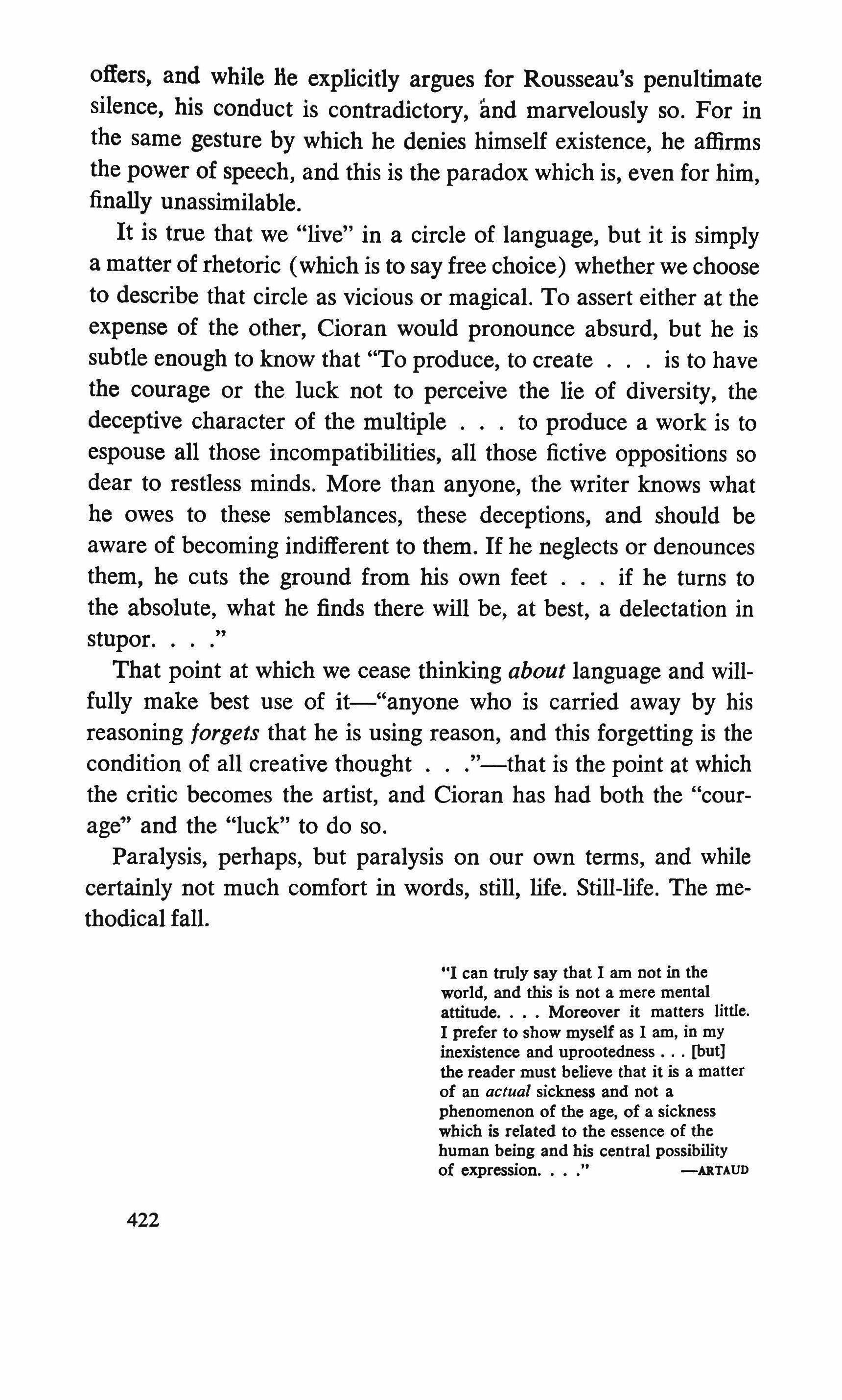
offers, and while lie explicitly argues for Rousseau's penultimate silence, his conduct is contradictory, and marvelously so. For in the same gesture by which he denies himself existence, he affirms the power of speech, and this is the paradox which is, even for him, finally unassimilable.
It is true that we "live" in a circle of language, but it is simply a matter of rhetoric (which is to say free choice) whether we choose to describe that circle as vicious or magical. To assert either at the expense of the other, Cioran would pronounce absurd, but he is subtle enough to know that "To produce, to create is to have the courage or the luck not to perceive the lie of diversity, the deceptive character of the multiple to produce a work is to espouse all those incompatibilities, all those fictive oppositions so dear to restless minds. More than anyone, the writer knows what he owes to these semblances, these deceptions, and should be aware of becoming indifferent to them. If he neglects or denounces them, he cuts the ground from his own feet if he turns to the absolute, what he finds there will be, at best, a delectation in stupor. ."
That point at which we cease thinking about language and willfully make best use of it-"anyone who is carried away by his reasoning forgets that he is using reason, and this forgetting is the condition of all creative thought "-that is the point at which the critic becomes the artist, and Cioran has had both the "courage" and the "luck" to do so.
Paralysis, perhaps, but paralysis on our own terms, and while certainly not much comfort in words, still, life. Still-life. The methodical fall.
"I can truly say that 1 am not in the world, and this is not a mere mental attitude. Moreover it matters little. 1 prefer to show myself as I am, in my inexistence and uprootedness [but] the reader must believe that it is a matter of an actual sickness and not a phenomenon of the age, of a sickness which is related to the essence of the human being and his central possibility of expression -AlI.TAUD
422
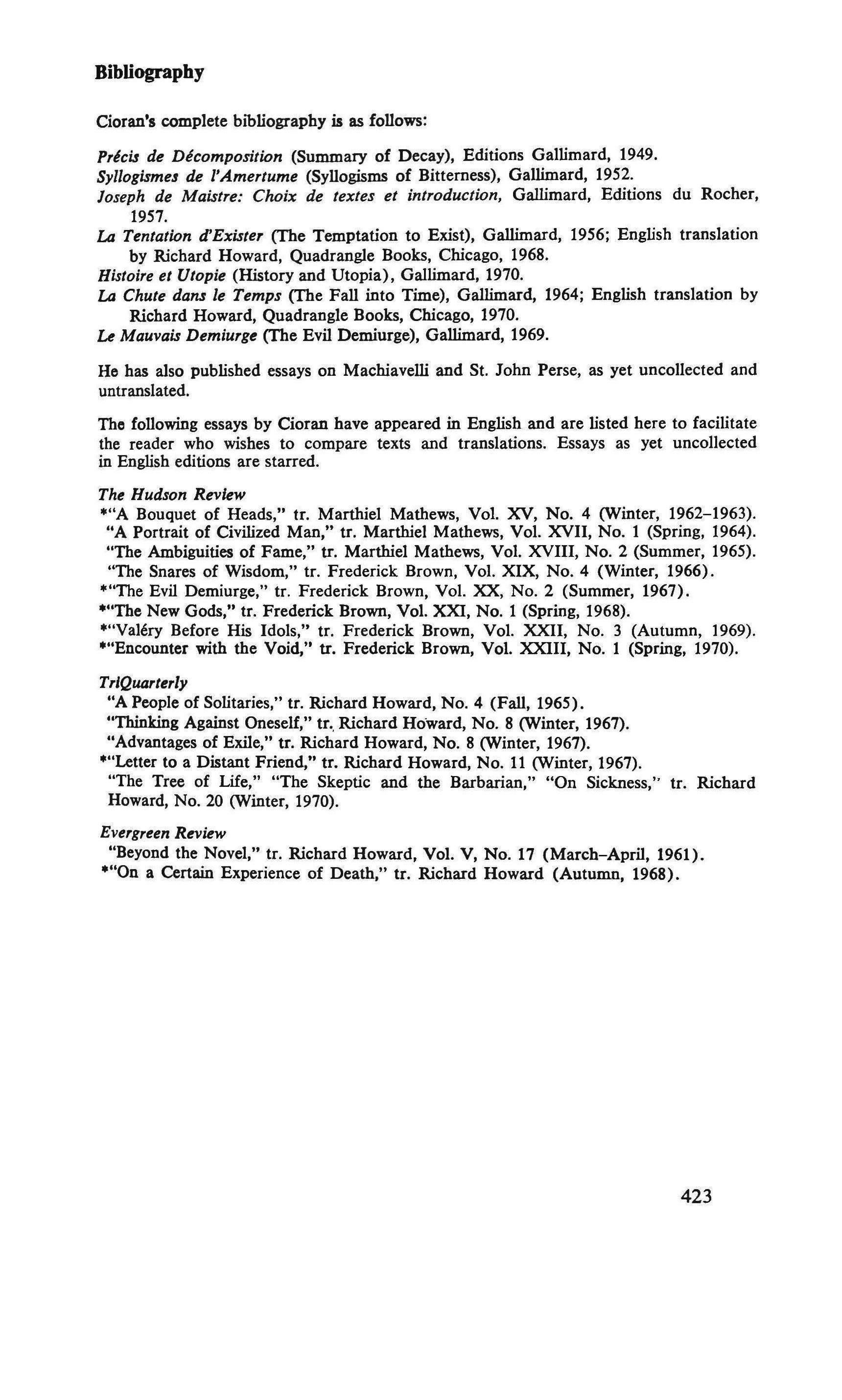
Bibliography
Cioran's complete bibliography is as follows:
Precis de Decomposition (Summary of Decay), Editions Gallimard, 1949. Syllogi.JmeJ de l'Amertume (Syllogisms of Bitterness), Gallimard, 1952.
Joseph de Maistre: Choix de textes et introduction, Gallimard, Editions du Rocher, 1957.
La Tentation d'Exister (The Temptation to Exist), Gallimard, 1956; English translation by Richard Howard, Quadrangle Books, Chicago, 1968.
Histoire et Utopie (History and Utopia), Gallimard, 1970.
La Chute dans le Temps (The Fall into Time), Gallimard, 1964; English translation by Richard Howard, Quadrangle Books, Chicago, 1970.
Le Mauvais Demiurge (The Evil Demiurge), Gallimard, 1969.
He has also published essays on Machiavelli and St. John Perse, as yet uncollected and untranslated.
The following essays by Cioran have appeared in English and are listed here to facilitate the reader who wishes to compare texts and translations. Essays as yet uncollected in English editions are starred.
The Hudson Review
*"A Bouquet of Heads," tr. Marthiel Mathews, Vol. XV, No.4 (Winter, 1962-1963).
"A Portrait of Civilized Man," tr. Marthiel Mathews, Vol. XVII, No.1 (Spring, 1964).
"The Ambiguities of Fame," tr, Marthiel Mathews, Vol. XVIII, No.2 (Summer, 1965).
"The Snares of Wisdom," tr. Frederick Brown, Vol. XIX, No.4 (Winter, 1966).
*"The Evil Demiurge," tr. Frederick Brown, Vol. XX, No.2 (Summer, 1967).
·"The New Gods," tr. Frederick Brown, Vol. XXI, No.1 (Spring, 1968).
·"Valery Before His Idols," tr. Frederick Brown, Vol. XXII, No.3 (Autumn, 1969).
·"Encounter with the Void," tr. Frederick Brown, Vol. XXIII, No. 1 (Spring, 1970).
TrlQuarterly
"A People of Solitaries," tr. Richard Howard, No.4 (Fall, 1965).
"Thinking Against Oneself," tr, Richard Howard, No.8 (Winter, 1967).
"Advantages of Exile," tr. Richard Howard, No.8 (Winter, 1967).
·"Letter to a Distant Friend," tr. Richard Howard, No. 11 (Winter, 1967).
"The Tree of Life," "The Skeptic and the Barbarian," "On Sickness," tr. Richard Howard, No. 20 (Winter, 1970).
Evergreen Review
"Beyond the Novel," tr. Richard Howard, Vol. V, No. 17 (March-April, 1961).
·"On a Certain Experience of Death," tr. Richard Howard (Autumn, 1968).
423
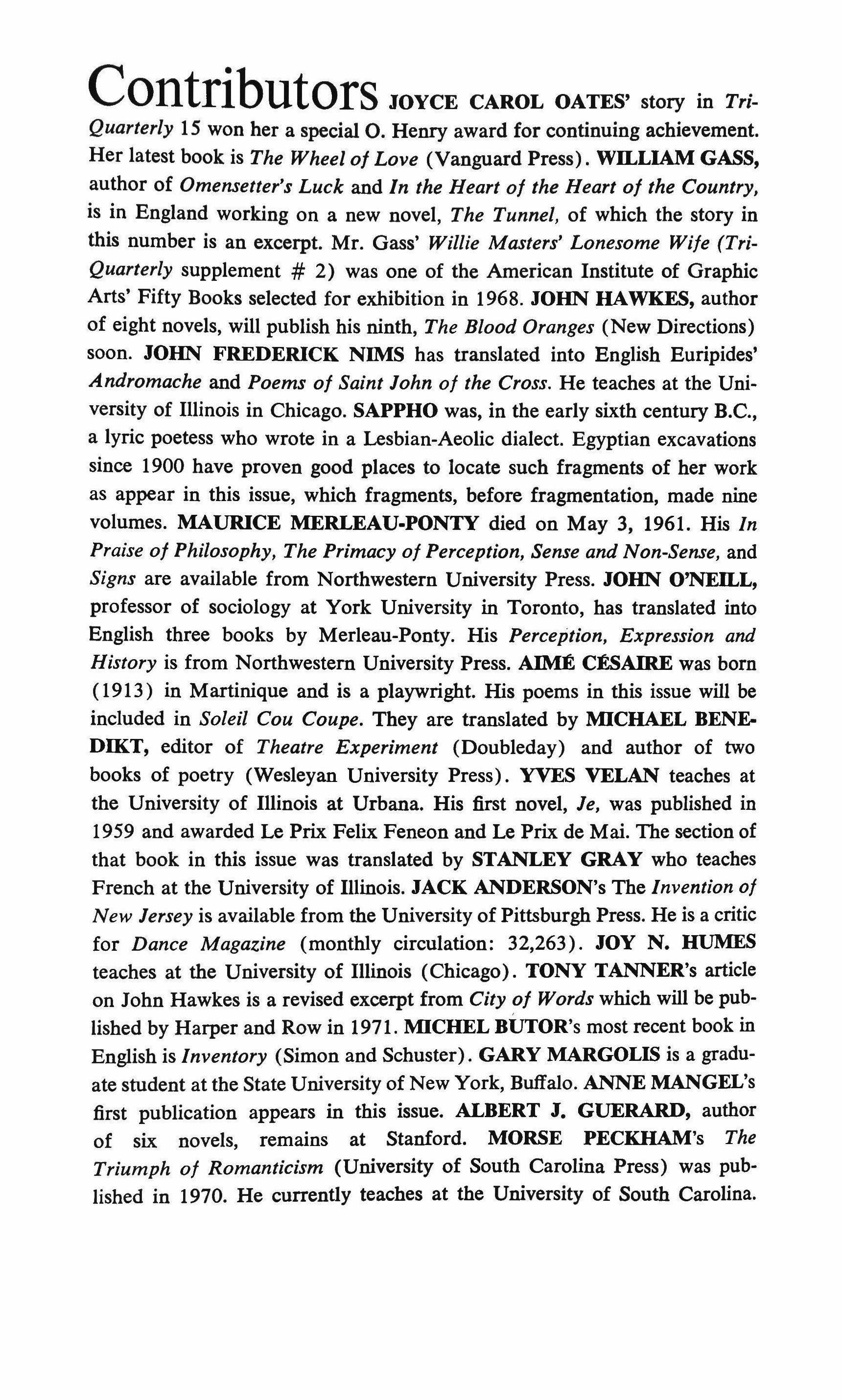
Contributors
JOYCE CAROL OATES' story in TriQuarterly 15 won her a special O. Henry award for continuing achievement. Her latest book is The Wheel of Love (Vanguard Press). WILLIAM GASS, author of Omensetter's Luck and In the Heart of the Heart of the Country, is in England working on a new novel, The Tunnel, of which the story in this number is an excerpt. Mr. Gass' Willie Masters' Lonesome Wife (TriQuarterly supplement # 2) was one of the American Institute of Graphic Arts' Fifty Books selected for exhibition in 1968. JOHN HAWKES, author of eight novels, will publish his ninth, The Blood Oranges (New Directions) soon. JOHN FREDERICK NIMS has translated into English Euripides' Andromache and Poems of Saint John of the Cross. He teaches at the University of Illinois in Chicago. SAPPHO was, in the early sixth century B.C., a lyric poetess who wrote in a Lesbian-Aeolic dialect. Egyptian excavations since 1900 have proven good places to locate such fragments of her work as appear in this issue, which fragments, before fragmentation, made nine volumes. MAURICE MERLEAU·PONTY died on May 3, 1961. His In Praise of Philosophy, The Primacy of Perception, Sense and Non-Sense, and Signs are available from Northwestern University Press. JOHN O'NEILL, professor of sociology at York University in Toronto, has translated into English three books by Merleau-Ponty. His Perception, Expression and History is from Northwestern University Press. AIME CESAIRE was born (1913) in Martinique and is a playwright. His poems in this issue will be included in Soleil Cou Coupe. They are translated by MICHAEL BENEDIKT, editor of Theatre Experiment (Doubleday) and author of two books of poetry (Wesleyan University Press). YVES VELAN teaches at the University of Illinois at Urbana. His first novel, Je, was published in 1959 and awarded Le Prix Felix Feneon and Le Prix de Mai. The section of that book in this issue was translated by STANLEY GRAY who teaches French at the University of Illinois. JACK ANDERSON's The Invention of New Jersey is available from the University of Pittsburgh Press. He is a critic for Dance Magazine (monthly circulation: 32,263). JOY N. HUMES teaches at the University of Illinois (Chicago). TONY TANNER's article on John Hawkes is a revised excerpt from City of Words which will be published by Harper and Row in 1971. MICHEL BUTOR's most recent book in English is Inventory (Simon and Schuster). GARY MARGOLIS is a graduate student at the State University of New York, Buffalo. ANNE MANGEL's first publication appears in this issue. ALBERT J. GUERARD, author of six novels, remains at Stanford. MORSE PECKHAM's The Triumph of Romanticism (University of South Carolina Press) was published in 1970. He currently teaches at the University of South Carolina.
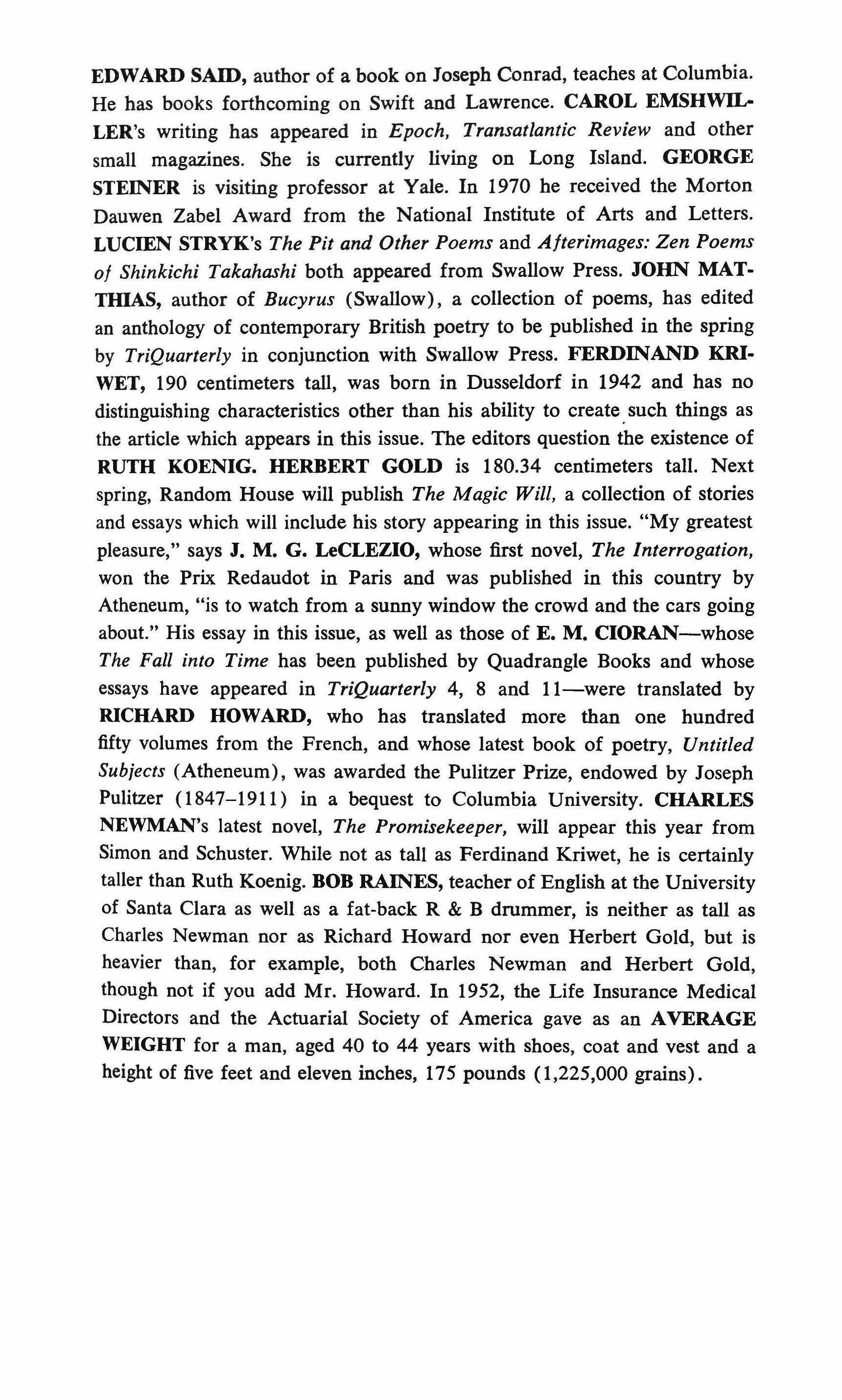
EDWARD SAID, author of a book on Joseph Conrad, teaches at Columbia. He has books forthcoming on Swift and Lawrence. CAROL EMSHWILLER's writing has appeared in Epoch, Transatlantic Review and other small magazines. She is currently living on Long Island. GEORGE STEINER is visiting professor at Yale. In 1970 he received the Morton Dauwen Zabel Award from the National Institute of Arts and Letters. LUCIEN STRYK's The Pit and Other Poems and Afterimages: Zen Poems of Shinkichi Takahashi both appeared from Swallow Press. JOHN MATTHIAS, author of Bucyrus (Swallow), a collection of poems, has edited an anthology of contemporary British poetry to be published in the spring by TriQuarterly in conjunction with Swallow Press. FERDINAND KRIWET, 190 centimeters tall, was born in Dusseldorf in 1942 and has no distinguishing characteristics other than his ability to create. such things as the article which appears in this issue. The editors question the existence of RUTH KOENIG. HERBERT GOLD is 180.34 centimeters tall. Next spring, Random House will publish The Magic Will, a collection of stories and essays which will include his story appearing in this issue. "My greatest pleasure," says J. M. G. LeCLEZIO, whose first novel, The Interrogation, won the Prix Redaudot in Paris and was published in this country by Atheneum, "is to watch from a sunny window the crowd and the cars going about." His essay in this issue, as well as those of E. M. CIORAN-whose The Fall into Time has been published by Quadrangle Books and whose essays have appeared in TriQuarterly 4, 8 and l l=-were translated by RICHARD HOWARD, who has translated more than one hundred fifty volumes from the French, and whose latest book of poetry, Untitled Subjects (Atheneum), was awarded the Pulitzer Prize, endowed by Joseph Pulitzer (1847-1911) in a bequest to Columbia University. CHARLES NEWMAN's latest novel, The Promisekeeper, will appear this year from Simon and Schuster. While not as tall as Ferdinand Kriwet, he is certainly taller than Ruth Koenig. BOB RAINES, teacher of English at the University of Santa Clara as well as a fat-back R & B drummer, is neither as tall as Charles Newman nor as Richard Howard nor even Herbert Gold, but is heavier than, for example, both Charles Newman and Herbert Gold, though not if you add Mr. Howard. In 1952, the Life Insurance Medical Directors and the Actuarial Society of America gave as an AVERAGE WEIGHT for a man, aged 40 to 44 years with shoes, coat and vest and a height of five feet and eleven inches, 175 pounds (1,225,000 grains).
Notes on contributors
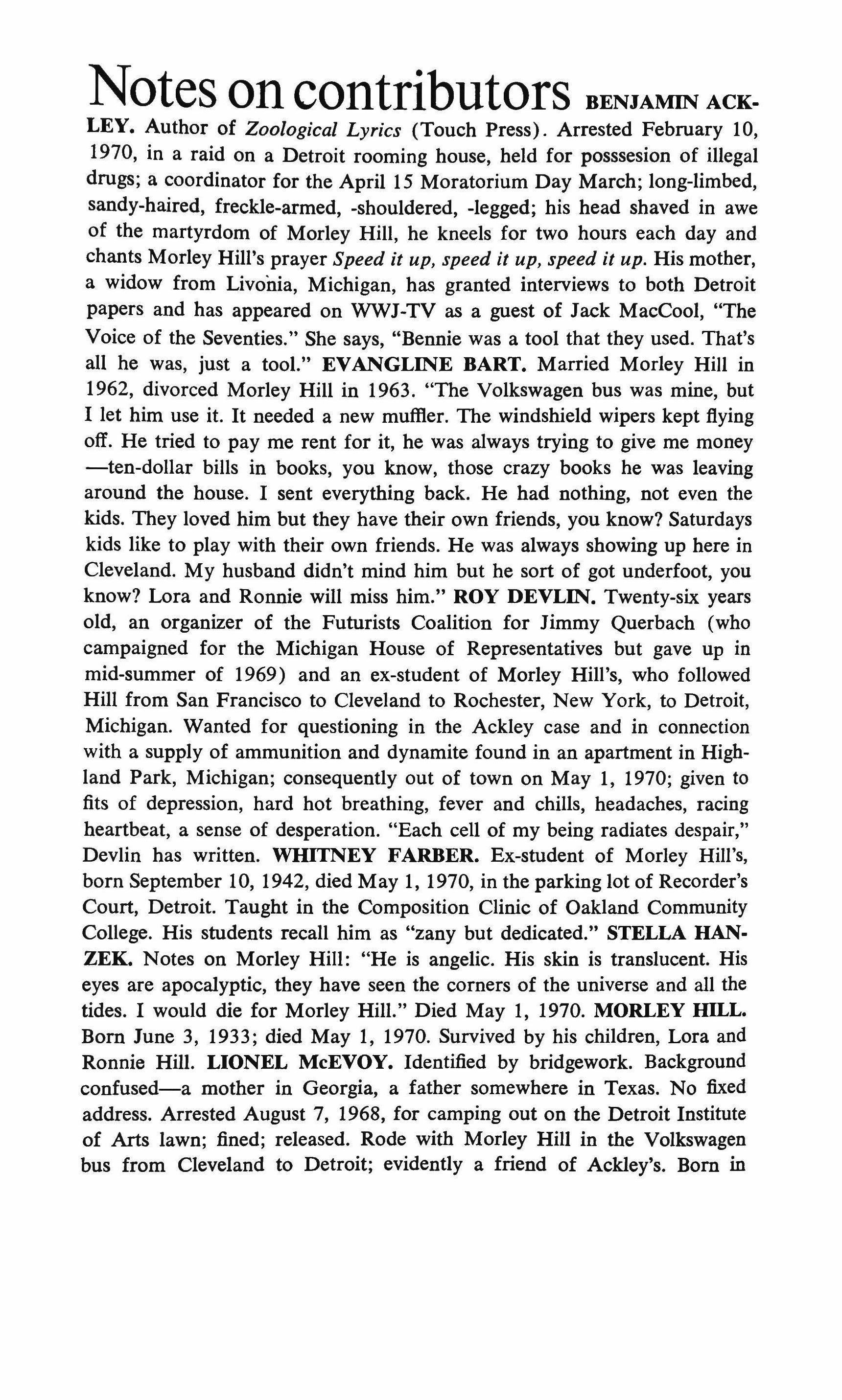
BENJAMIN ACK-
LEY. Author of Zoological Lyrics (Touch Press). Arrested February 10, 1970, in a raid on a Detroit rooming house, held for posssesion of illegal drugs; a coordinator for the April 15 Moratorium Day March; long-limbed, sandy-haired, freckle-armed, -shouldered, -legged; his head shaved in awe of the martyrdom of Morley Hill, he kneels for two hours each day and chants Morley Hill's prayer Speed it up, speed it up, speed it up. His mother, a widow from Livonia, Michigan, has granted interviews to both Detroit papers and has appeared on WWJ-TV as a guest of Jack MacCool, "The Voice of the Seventies." She says, "Bennie was a tool that they used. That's all he was, just a tool."
EVANGLINE BART. Married Morley Hill in 1962, divorced Morley Hill in 1963. "The Volkswagen bus was mine, but I let him use it. It needed a new muffler. The windshield wipers kept flying off. He tried to pay me rent for it, he was always trying to give me money -ten-dollar bills in books, you know, those crazy books he was leaving around the house. I sent everything back. He had nothing, not even the kids. They loved him but they have their own friends, you know? Saturdays kids like to play with their own friends. He was always showing up here in Cleveland. My husband didn't mind him but he sort of got underfoot, you know? Lora and Ronnie will miss him." ROY DEVLIN. Twenty-six years old, an organizer of the Futurists Coalition for Jimmy Querbach (who campaigned for the Michigan House of Representatives but gave up in mid-summer of 1969) and an ex-student of Morley Hill's, who followed Hill from San Francisco to Cleveland to Rochester, New York, to Detroit, Michigan. Wanted for questioning in the Ackley case and in connection with a supply of ammunition and dynamite found in an apartment in Highland Park, Michigan; consequently out of town on May 1, 1970; given to fits of depression, hard hot breathing, fever and chills, headaches, racing heartbeat, a sense of desperation. "Each cell of my being radiates despair," Devlin has written. WHITNEY FARBER. Ex-student of Morley Hill's, born September 10, 1942, died May 1, 1970, in the parking lot of Recorder's Court, Detroit. Taught in the Composition Clinic of Oakland Community College. His students recall him as "zany but dedicated." STELLA HANZEK. Notes on Morley Hill: "He is angelic. His skin is translucent. His eyes are apocalyptic, they have seen the corners of the universe and all the tides. I would die for Morley Hill." Died May 1, 1970. MORLEY HILL. Born June 3, 1933; died May 1, 1970. Survived by his children, Lora and Ronnie Hill. LIONEL McEVOY. Identified by bridgework. Background confused-a mother in Georgia, a father somewhere in Texas. No fixed address. Arrested August 7, 1968, for camping out on the Detroit Institute of Arts lawn; fined; released. Rode with Morley Hill in the Volkswagen bus from Cleveland to Detroit; evidently a friend of Ackley's. Born in
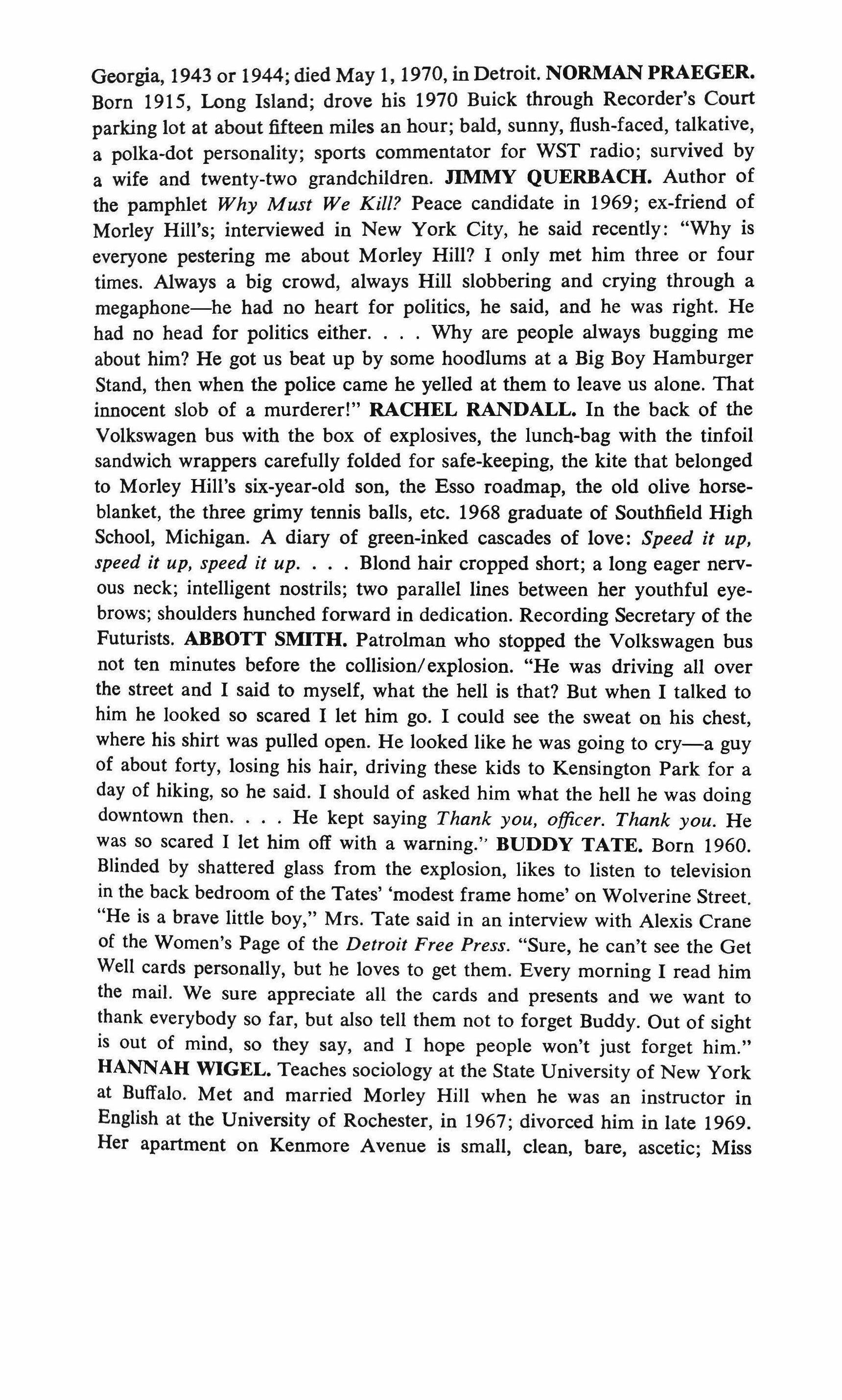
Georgia, 1943 or 1944; died May 1, 1970, in Detroit. NORMAN PRAEGER. Born 1915, Long Island; drove his 1970 Buick through Recorder's Court parking lot at about fifteen miles an hour; bald, sunny, flush-faced, talkative, a polka-dot personality; sports commentator for WST radio; survived by a wife and twenty-two grandchildren. JIMMY QUERBACH. Author of the pamphlet Why Must We Kill? Peace candidate in 1969; ex-friend of Morley Hill's; interviewed in New York City, he said recently: "Why is everyone pestering me about Morley Hill? I only met him three or four times. Always a big crowd, always Hill slobbering and crying through a megaphone-he had no heart for politics, he said, and he was right. He had no head for politics either. Why are people always bugging me about him? He got us beat up by some hoodlums at a Big Boy Hamburger Stand, then when the police came he yelled at them to leave us alone. That innocent slob of a murderer!" RACHEL RANDALL. In the back of the Volkswagen bus with the box of explosives, the lunch-bag with the tinfoil sandwich wrappers carefully folded for safe-keeping, the kite that belonged to Morley Hill's six-year-old son, the Esso roadmap, the old olive horseblanket, the three grimy tennis balls, etc. 1968 graduate of Southfield High School, Michigan. A diary of green-inked cascades of love: Speed it up, speed it up, speed it up. Blond hair cropped short; a long eager nervous neck; intelligent nostrils; two parallel lines between her youthful eyebrows; shoulders hunched forward in dedication. Recording Secretary of the Futurists. ABBOTT SMITH. Patrolman who stopped the Volkswagen bus not ten minutes before the collision/explosion. "He was driving all over the street and I said to myself, what the hell is that? But when I talked to him he looked so scared I let him go. I could see the sweat on his chest, where his shirt was pulled open. He looked like he was going to cry-a guy of about forty, losing his hair, driving these kids to Kensington Park for a day of hiking, so he said. I should of asked him what the hell he was doing downtown then He kept saying Thank you, officer. Thank you. He was so scared I let him off with a warning." BUDDY TATE. Born 1960. Blinded by shattered glass from the explosion, likes to listen to television in the back bedroom of the Tates' 'modest frame home' on Wolverine Street. "He is a brave little boy," Mrs. Tate said in an interview with Alexis Crane of the Women's Page of the Detroit Free Press. "Sure, he can't see the Get Well cards personally, but he loves to get them. Every morning I read him the mail. We sure appreciate all the cards and presents and we want to thank everybody so far, but also tell them not to forget Buddy. Out of sight is out of mind, so they say, and I hope people won't just forget him."
HANNAH W1GEL. Teaches sociology at the State University of New York at Buffalo. Met and married Morley Hill when he was an instructor in English at the University of Rochester, in 1967; divorced him in late 1969. Her apartment on Kenmore Avenue is small, clean, bare, ascetic; Miss
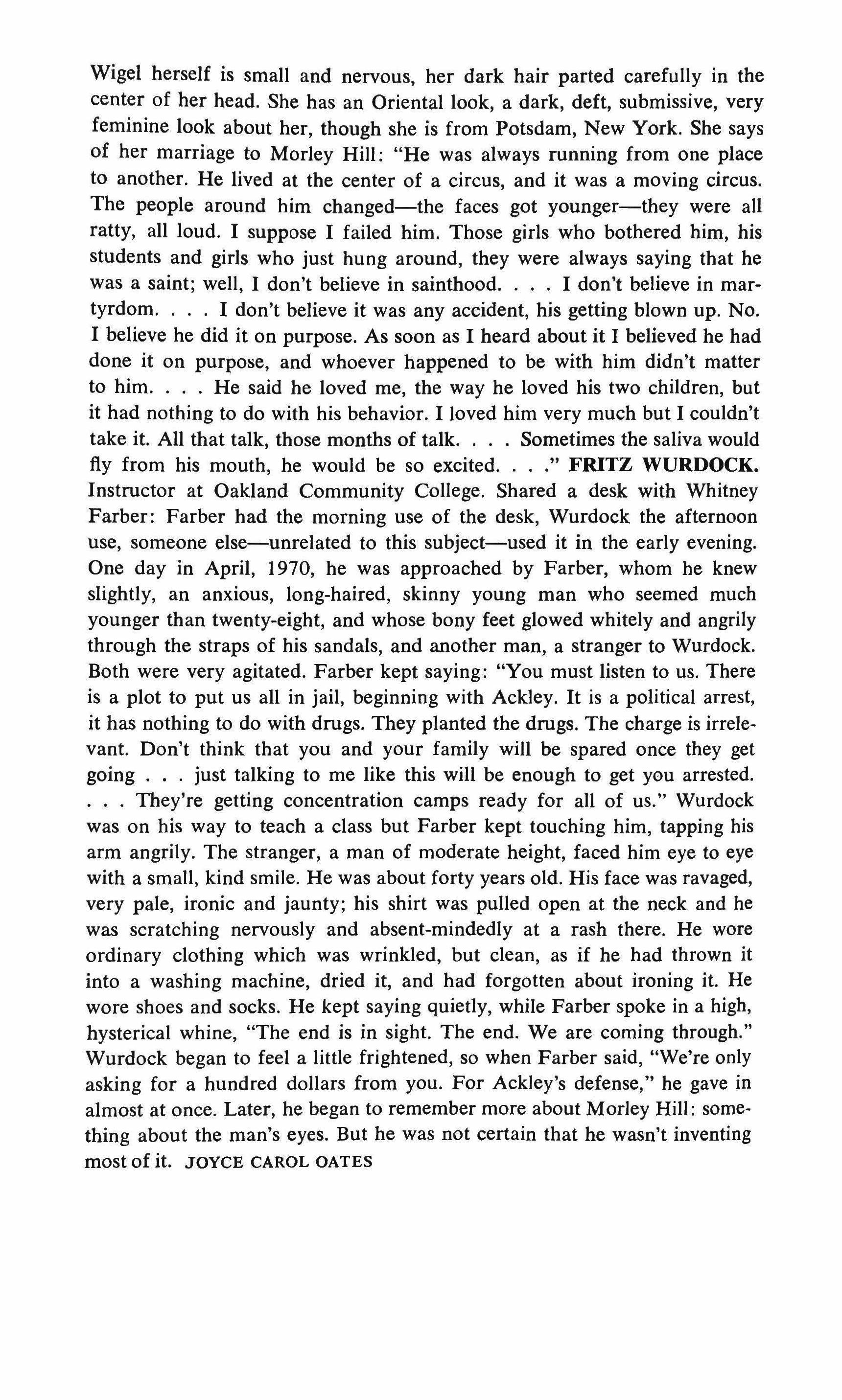
Wigel herself is small and nervous, her dark hair parted carefully in the center of her head. She has an Oriental look, a dark, deft, submissive, very feminine look about her, though she is from Potsdam, New York. She says of her marriage to Morley Hill: "He was always running from one place to another. He lived at the center of a circus, and it was a moving circus. The people around him changed-the faces got younger-they were all ratty, all loud. I suppose I failed him. Those girls who bothered him, his students and girls who just hung around, they were always saying that he was a saint; well, I don't believe in sainthood I don't believe in martyrdom I don't believe it was any accident, his getting blown up. No. I believe he did it on purpose. As soon as I heard about it I believed he had done it on purpose, and whoever happened to be with him didn't matter to him. He said he loved me, the way he loved his two children, but it had nothing to do with his behavior. I loved him very much but I couldn't take it. All that talk, those months of talk. Sometimes the saliva would fly from his mouth, he would be so excited FRITZ WURDOCK. Instructor at Oakland Community College. Shared a desk with Whitney Farber: Farber had the morning use of the desk, Wurdock the afternoon use, someone else-unrelated to this subject-used it in the early evening. One day in April, 1970, he was approached by Farber, whom he knew slightly, an anxious, long-haired, skinny young man who seemed much younger than twenty-eight, and whose bony feet glowed whitely and angrily through the straps of his sandals, and another man, a stranger to Wurdock, Both were very agitated. Farber kept saying: "You must listen to us. There is a plot to put us all in jail, beginning with Ackley. It is a political arrest, it has nothing to do with drugs. They planted the drugs. The charge is irrelevant. Don't think that you and your family will be spared once they get going just talking to me like this will be enough to get you arrested They're getting concentration camps ready for all of us." Wurdock was on his way to teach a class but Farber kept touching him, tapping his arm angrily. The stranger, a man of moderate height, faced him eye to eye with a small, kind smile. He was about forty years old. His face was ravaged, very pale, ironic and jaunty; his shirt was pulled open at the neck and he was scratching nervously and absent-mindedly at a rash there. He wore ordinary clothing which was wrinkled, but clean, as if he had thrown it into a washing machine, dried it, and had forgotten about ironing it. He wore shoes and socks. He kept saying quietly, while Farber spoke in a high, hysterical whine, "The end is in sight. The end. We are coming through." Wurdock began to feel a little frightened, so when Farber said, "We're only asking for a hundred dollars from you. For Ackley's defense," he gave in almost at once. Later, he began to remember more about Morley Hill: something about the man's eyes. But he was not certain that he wasn't inventing most of it.
JOYCE CAROL OATES
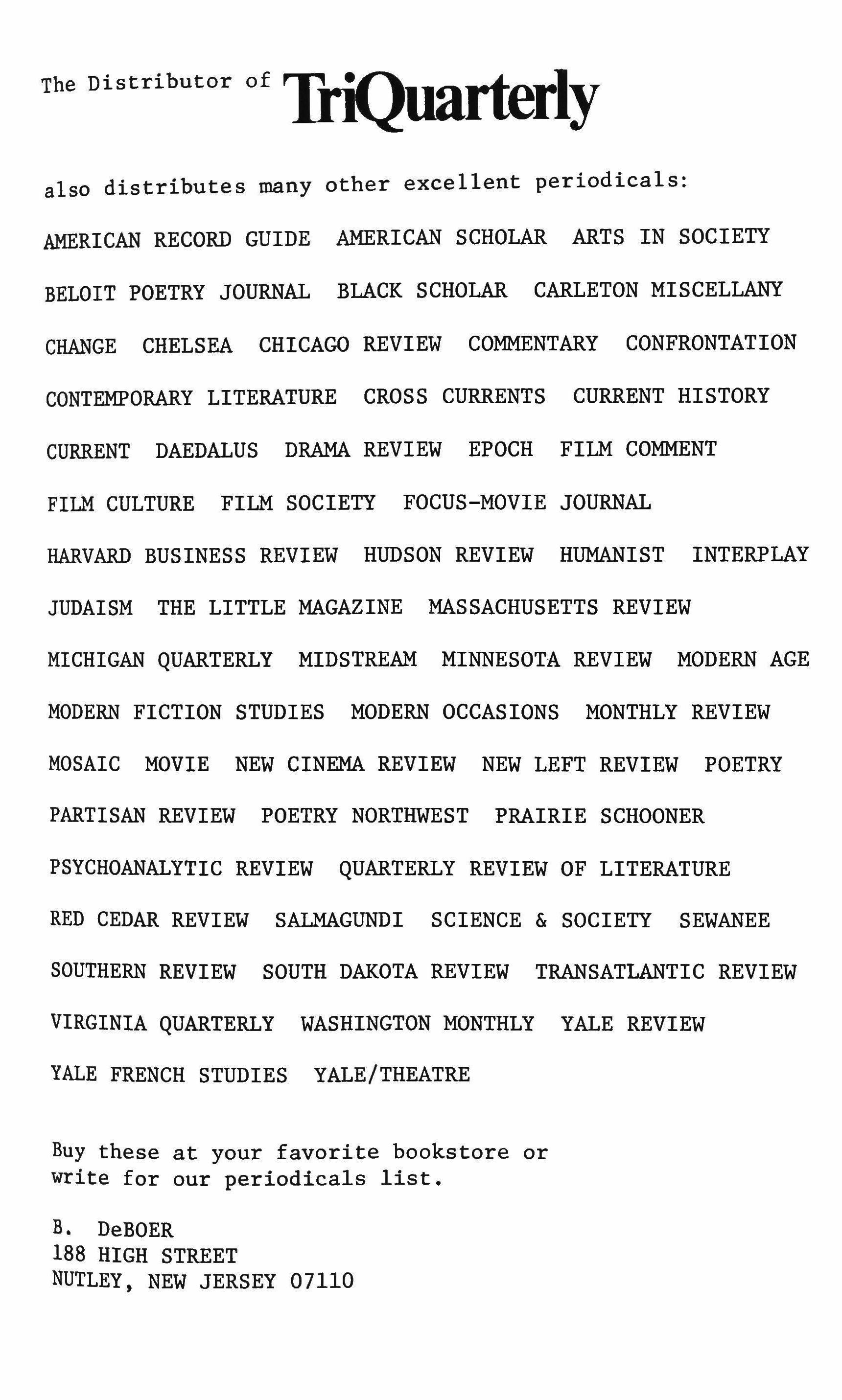
also distributes many other excellent periodicals:
AMERICAN RECORD GUIDE AMERICAN SCHOLAR ARTS IN SOCIETY
BELOIT POETRY JOURNAL BLACK SCHOLAR CARLETON MISCELLANY
CHANGE CHELSEA CHICAGO REVIEW COMMENTARY CONFRONTATION
CONTEMPORARY LITERATURE CROSS CURRENTS CURRENT HISTORY
CURRENT DAEDALUS DRAMA REVIEW EPOCH FILM COMMENT
FILM CULTURE FILM SOCIETY FOCUS-MOVIE JOURNAL
HARVARD BUSINESS REVIEW HUDSON REVIEW HUMANIST INTERPLAY
JUDAISM THE LITTLE MAGAZINE MASSACHUSETTS REVIEW
MICHIGAN QUARTERLY MIDSTREAM MINNESOTA REVIEW MODERN AGE
MODERN FICTION STUDIES MODERN OCCASIONS MONTHLY REVIEW
MOSAIC MOVIE NEW CINEMA REVIEW NEW LEFT REVIEW POETRY
PARTISAN REVIEW POETRY NORTHWEST PRAIRIE SCHOONER
PSYCHOANALYTIC REVIEW QUARTERLY REVIEW OF LITERATURE RED CEDAR REVIEW SALMAGUNDI SCIENCE & SOCIETY SEWANEE
SOUTHERN REVIEW SOUTH DAKOTA REVIEW TRANSATLANTIC REVIEW
VIRGINIA QUARTERLY WASHINGTON MONTHLY YALE REVIEW
YALE FRENCH STUDIES YALE/THEATRE
Buy these at your favorite bookstore or write for our periodicals list.
B. DeBOER 188 HIGH STREET NUTLEY, NEW JERSEY 07110
The Fall
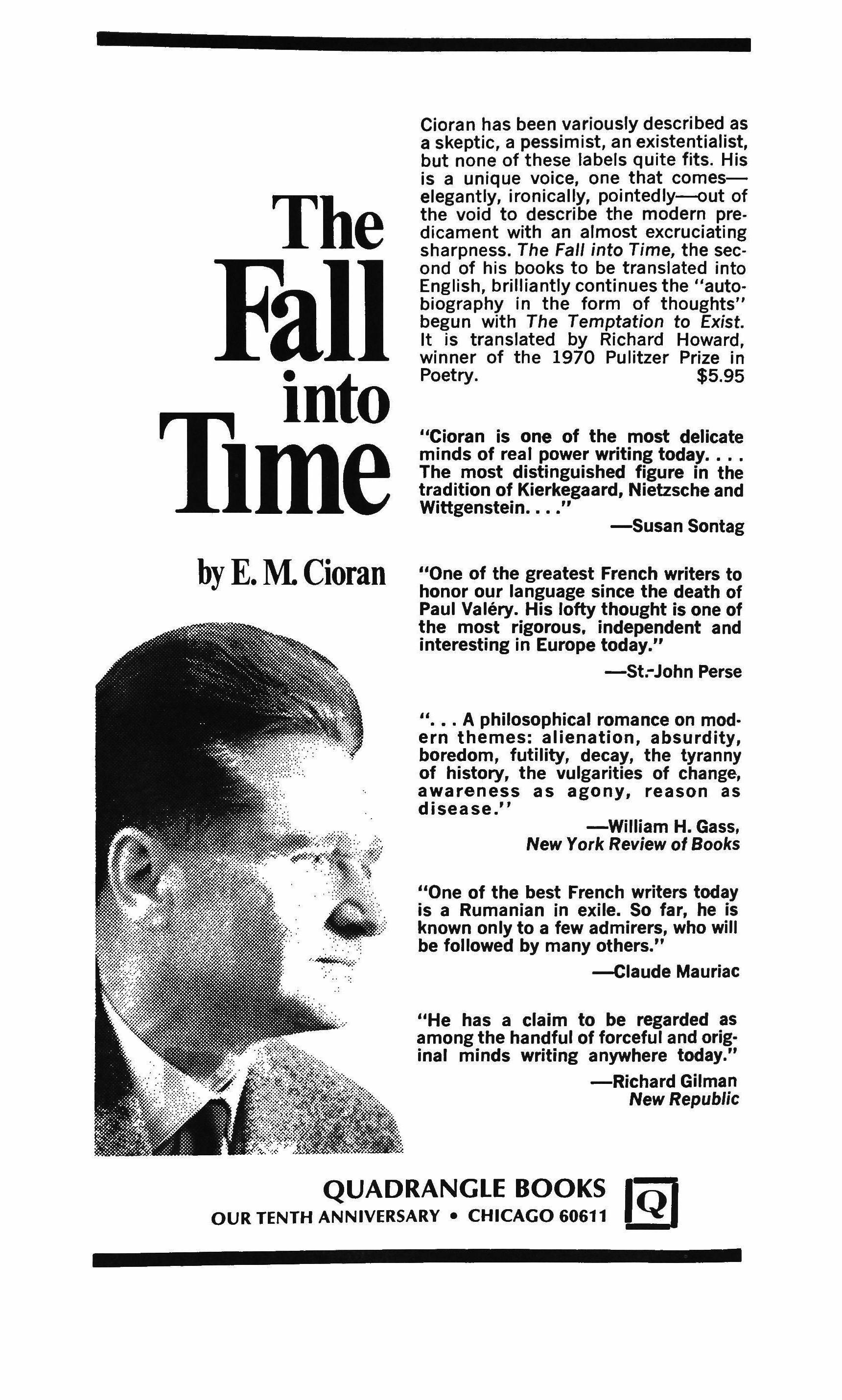 by E. M Cioran
by E. M Cioran
Cioran has been variously described as a skeptic, a pessimist, an existentialist, but none of these labels quite fits. His is a unique voice, one that comeselegantly, ironically, pointedly--out of the void to describe the modern predicament with an almost excruciating sharpness. The Fall into Time, the second of his books to be translated into English, brilliantly continues the "autobiography in the form of thoughts" begun with The Temptation to Exist. It is translated by Richard Howard, winner of the 1970 Pulitzer Prize in Poetry. $5.95
"Cioran is one of the most delicate minds of real power writing today The most distinguished figure in the tradition of Kierkegaard, Nietzsche and Wittgenstein
-Susan Sontag
"One of the greatest French writers to honor our language since the death of Paul Valery. His lofty thought is one of the most rigorous, independent and interesting in Europe today."
-St.-John Perse
A philosophical romance on modern themes: alienation, absurdity, boredom, futility, decay, the tyranny of history, the vulgarities of change, awareness as agony, reason as disease."
-William H. Gass, New York Review of Books
"One of the best French writers today is a Rumanian in exile. So far, he is known only to a few admirers, who will be followed by many others."
-Claude Mauriac
"He has a claim to be regarded as among the handful of forceful and orig· inal minds writing anywhere today."
-Richard Gilman New Republic
QUADRANGLE BOOKS IQI OUR TENTH ANNIVERSARY CHICAGO 60611
blinkers, nashers, 3-speed windshield washer switches you without taking hands off wheel.
Aerodynamic shape to not only cut wind resistance, but make air stream itself produce better road-holding and reduce fuel consumption.
fan for fo",ed air oooling and heating,
radial tires.

Rack and pinionsteering, ultra.simple and precise, reinforced by a steering wheel that goes only 3.2 turns lock to lock.
Transmission and diHerentialln one lightweight unit right over rear wheels to further improve road balance. 4-wheellndependent suspension.
Seat belts and shoulder harnesses.
3-speed
� TheUniversityofChicagoPress
THE DRAWINGS OF THE FLORENTINE PAINTERS
Bernard Berenson
Out of print for over a quarter of a century, this unique publication IS once again available. The new slipcased edition contains three volumes, each handsomely reproduced with gold-tooled covers based on a sixteenth-centuryexampleof Florentinebinding, containing the results of Berenson's pioneering efforts in the classification of more than a thousand unsigned drawings by such masters as Ucello, Leonardo da Vinci, Boticelli, Michelangelo, and Andrea del Sarto. 3 vols., 1206 pages, 1009 illustrations
$32.50 until Dec. 31,1970 ($37.00 thereafter)
NOW DON'T TRY TO REASON WITH ME
Essays and Ironies for a Credulous
Age
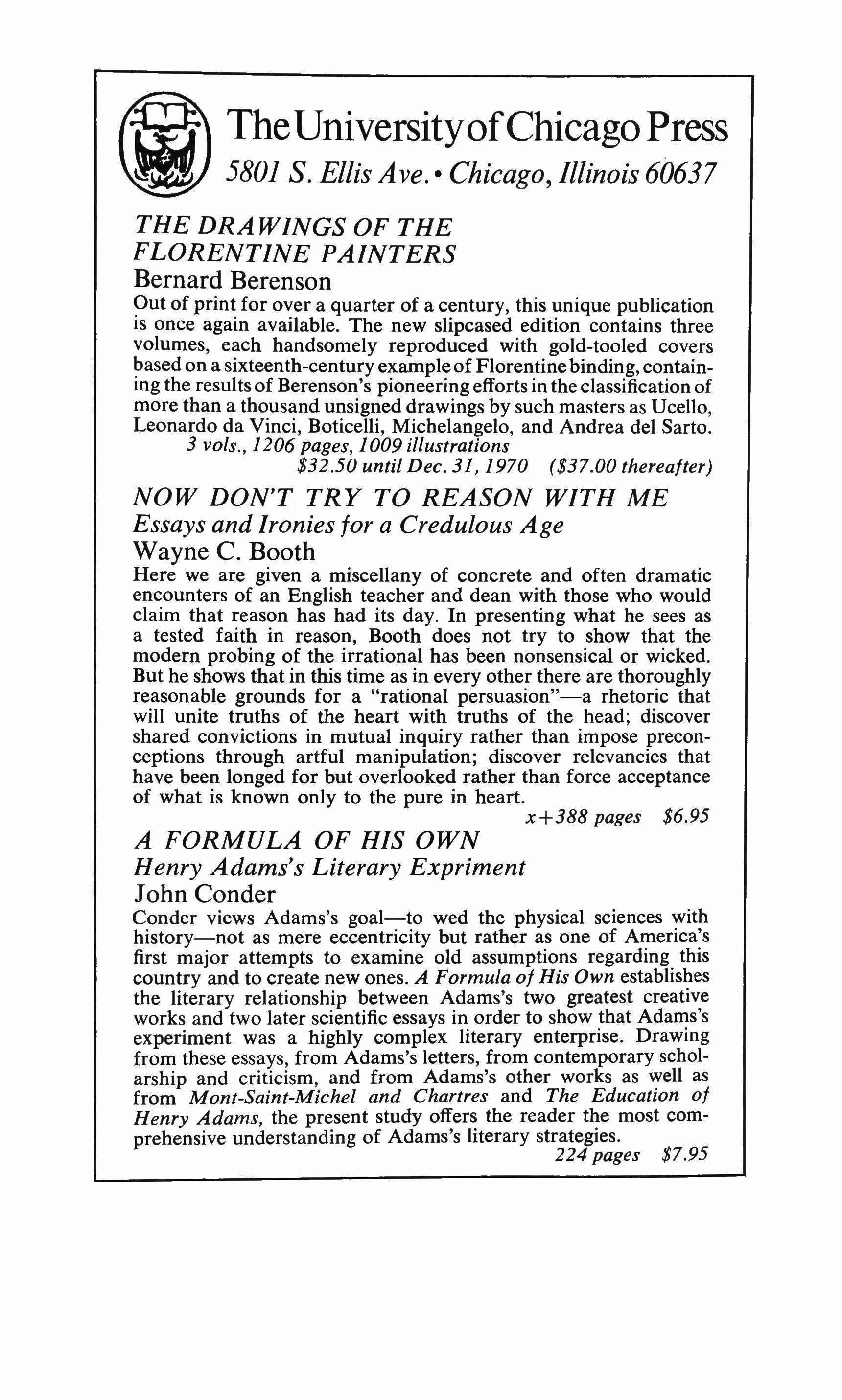 Wayne C. Booth
Wayne C. Booth
Here we are given a miscellany of concrete and often dramatic encounters of an English teacher and dean with those who would claim that reason has had its day. In presenting what he sees as a tested faith in reason, Booth does not try to show that the modern probing of the irrational has been nonsensical or wicked. But he shows that in this time as in every other there are thoroughly reasonable grounds for a "rational persuasion"-a rhetoric that will unite truths of the heart with truths of the head; discover shared convictions in mutual inquiry rather than impose preconceptions through artful manipulation; discover relevancies that have been longed for but overlooked rather than force acceptance of what is known only to the pure in heart.
x+388 pages $6.95
A FORMULA OF HIS OWN
Henry Adams's Literary Expriment
John Conder
Conder views Adams's goal-to wed the physical sciences with history-not as mere eccentricity but rather as one of America's first major attempts to examine old assumptions regarding this country and to create new ones. A Formula of His Own establishes the literary relationship between Adams's two greatest creative works and two later scientific essays in order to show that Adams's experiment was a highly complex literary enterprise. Drawing from these essays, from Adams's letters, from contemporary scholarship and criticism, and from Adams's other works as well as from Mont-Saint-Michel and Chartres and The Education of Henry Adams, the present study offers the reader the most comprehensive understanding of Adams's literary strategies.
224 pages $7.95
� 5801
Ellis Ave.· Chicago, Illinois 60637
S.
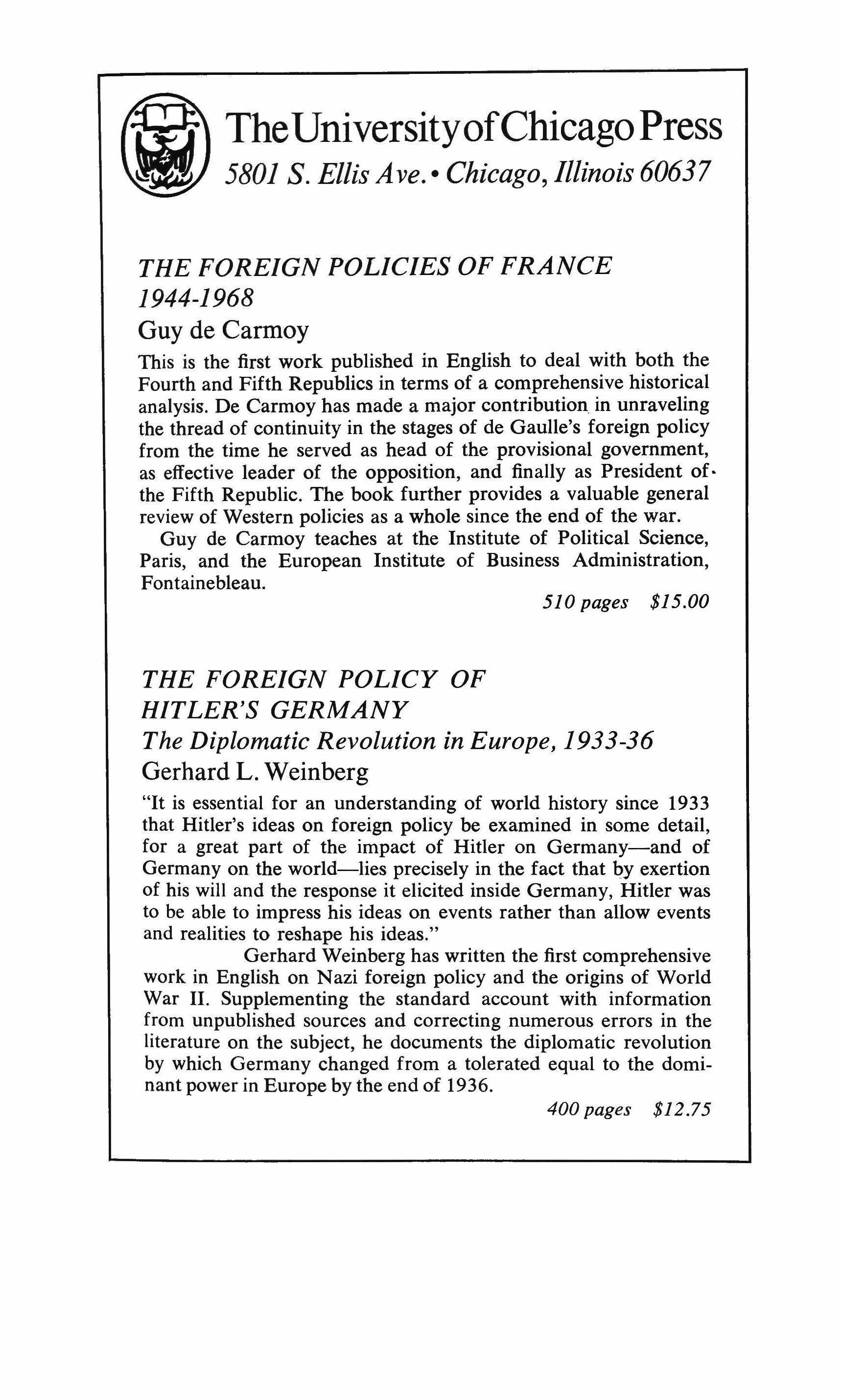
TheUniversityofChicagoPress
THE FOREIGN POLICIES OF FRANCE
1944-1968
Guy de Carmoy
This is the first work published in English to deal with both the Fourth and Fifth Republics in terms of a comprehensive historical analysis. De Carmoy has made a major contribution in unraveling the thread of continuity in the stages of de Gaulle's foreign policy from the time he served as head of the provisional government, as effective leader of the opposition, and finally as President ofthe Fifth Republic. The book further provides a valuable general review of Western policies as a whole since the end of the war.
Guy de Carmoy teaches at the Institute of Political Science, Paris, and the European Institute of Business Administration, Fontainebleau.
510 pages $15.00
THE FOREIGN POLICY OF HITLER'S GERMANY
The Diplomatic Revolution in Europe, 1933-36
Gerhard L. Weinberg
"It is essential for an understanding of world history since 1933 that Hitler's ideas on foreign policy be examined in some detail, for a great part of the impact of Hitler on Germany-and of Germany on the world-lies precisely in the fact that by exertion of his will and the response it elicited inside Germany, Hitler was to be able to impress his ideas on events rather than allow events and realities to reshape his ideas."
Gerhard Weinberg has written the first comprehensive work in English on Nazi foreign policy and the origins of World War II. Supplementing the standard account with information from unpublished sources and correcting numerous errors in the literature on the subject, he documents the diplomatic revolution by which Germany changed from a tolerated equal to the dominant power in Europe by the end of 1936.
400 pages $12.75
5801 s. Ellis Ave. Chicago, Illinois 60637
The TriQuarterly wishes to thank the Depot Press at the University of Illinois forassistance in conceiving this issue. Their latest publication is The Last Poem of Volcek Kalsaretz by Cesar Calvo (60¢), translated by James Stephens.
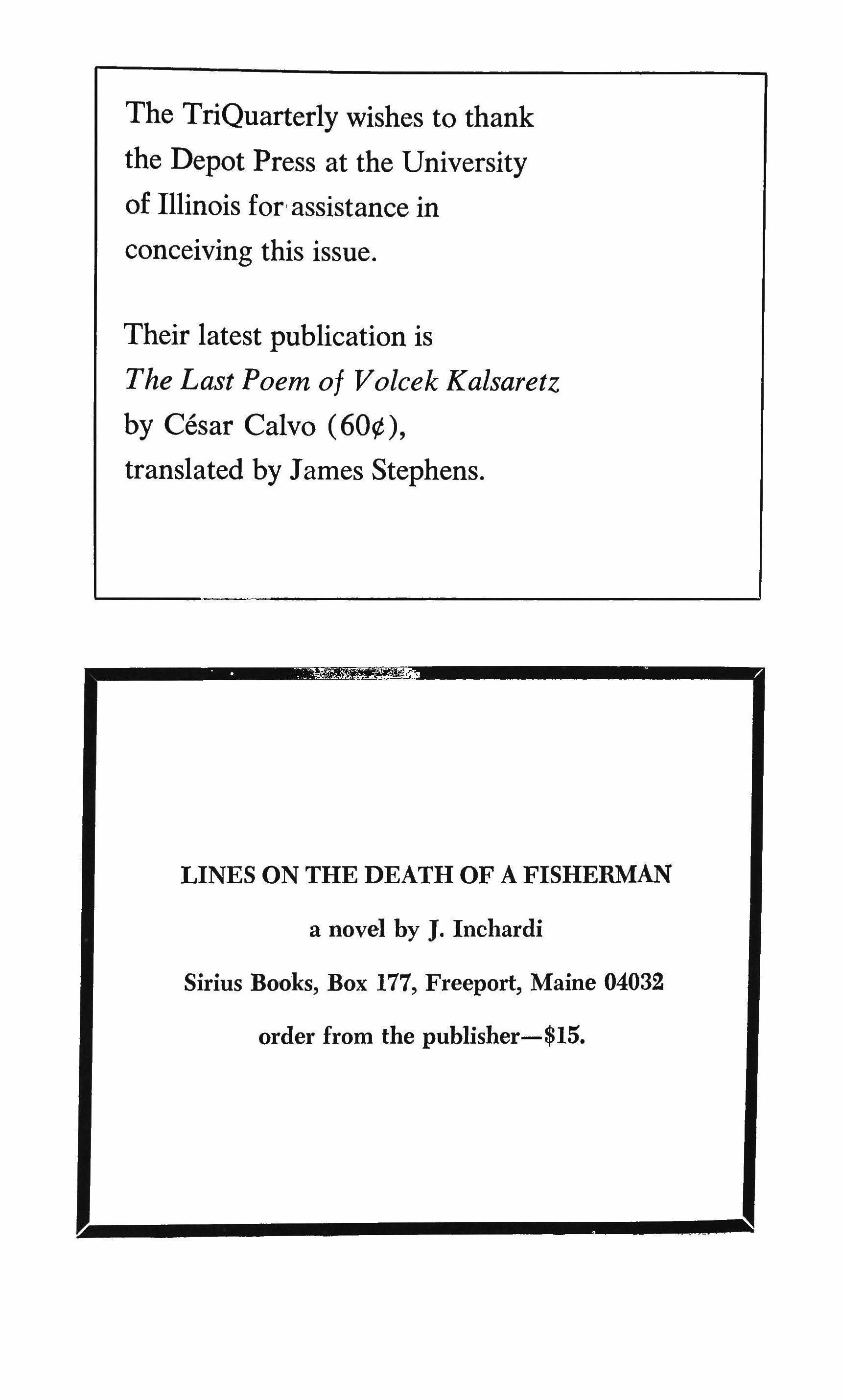
LINES ON THE DEATH OF A FISHERMAN a novel by J. Inchardi Sirius Books, Box 177, Freeport, Maine 04032 order from the publisher-$15.
The True Adventures of Huckleberry Finn
as told by John Seelye Scholars and critics alike have questioned the integrity and credibility of Mark Twain's version of Huck Finn's story. Here, for the first time, is the full account of Huck's epic journey the way Huck himself would have told it - unvarnished, unbowdlerized, and unexpurgated. Curiously enough, this work answers all the critical and scholarly objections to Mark Twain's version.
"For many years other American novelists have been moved by the sense that somewhere buried in Twain's marvelous book is an even better one. I think Seelye has, with great discretion and integrity, recovered that other better book for us. His work represents, in that sense, a larger contribution to criticism, as well as a considerable addition to American literature. Besides, it is very funny." - Leslie A. Fiedler a real tour de force, one that Mark Twain himself might have conceived." - Malcolm Cowley $6.50
The Crisis of European Sciences and Transcendental Phenomenology An Introduction to Phenomenological Philosophy
by Edmund Husserl translated by David Carr
In The Crisis, universally accepted as his last great work, Husserl made what he doubtless knew would be his last attempt before his death to ground and explain his phenomological philosophy. By making use of historical considerations and a discussion of what he calls the "lifeworld" Husserl makes a radical departure from his earlier works; the significance of this departure is still the focus of controversy among scholars. Merleau-Ponty, among others, has held that it constitutes a distinct break with Husserl's earlier transcendental phenomenology and that his notion of the life-world - first introduced in The Crisis - points toward a union of phenomenology and existentialism. $12.95

1735 Benson Avenue, Evanston, Illinois 60201
NORTHWESTERN UNIVERSITY PRESS
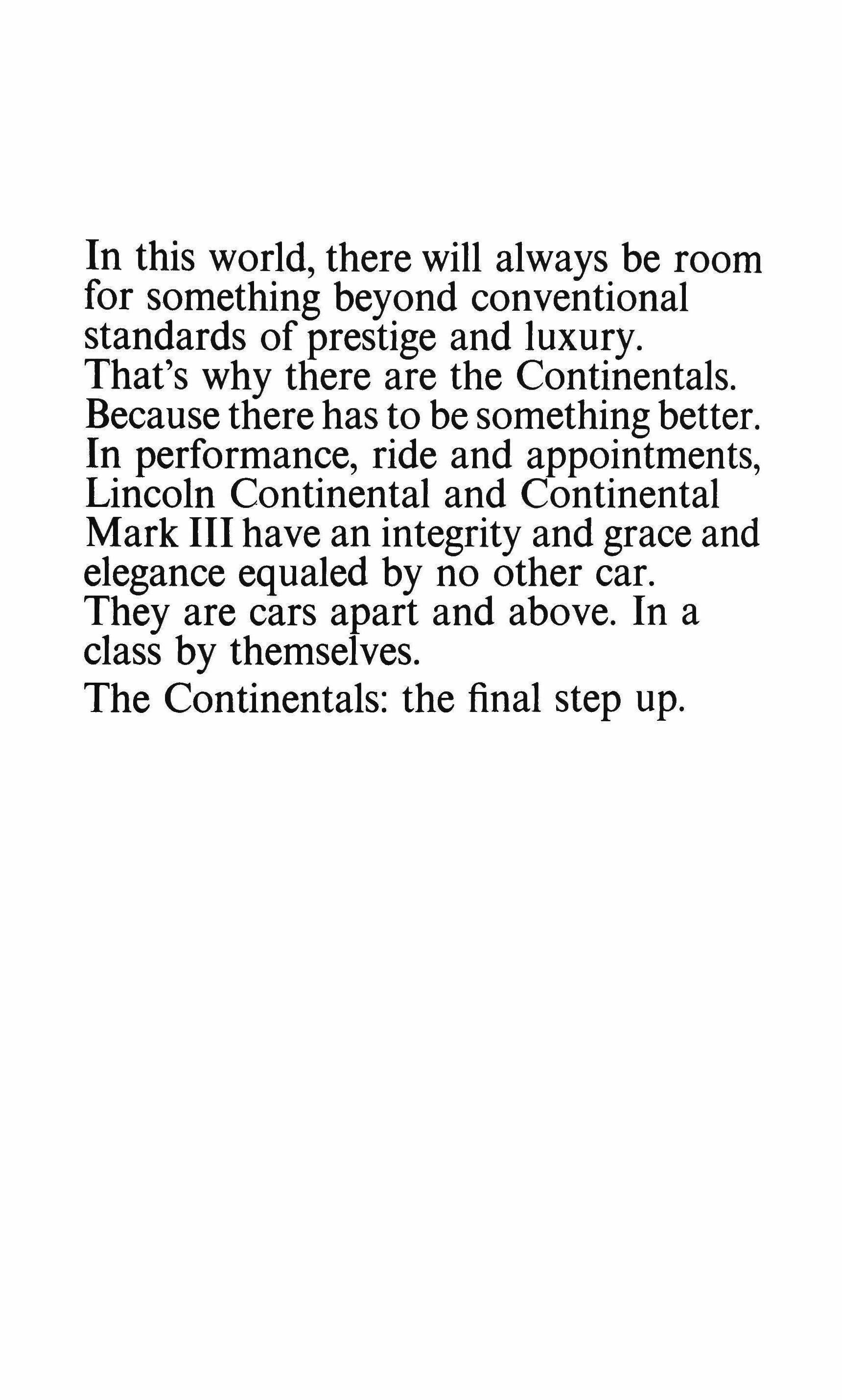
In this world, there will always be room for something beyond conventional standards of prestige and luxury. That's why there are the Continentals. Because there has to be something better. In performance, ride and appointments, Lincoln Continental and Continental Mark III have an integrity and grace and elegance equaled by no other car. They are cars apart and above. In a class by themselves. The Continentals: the final step up.

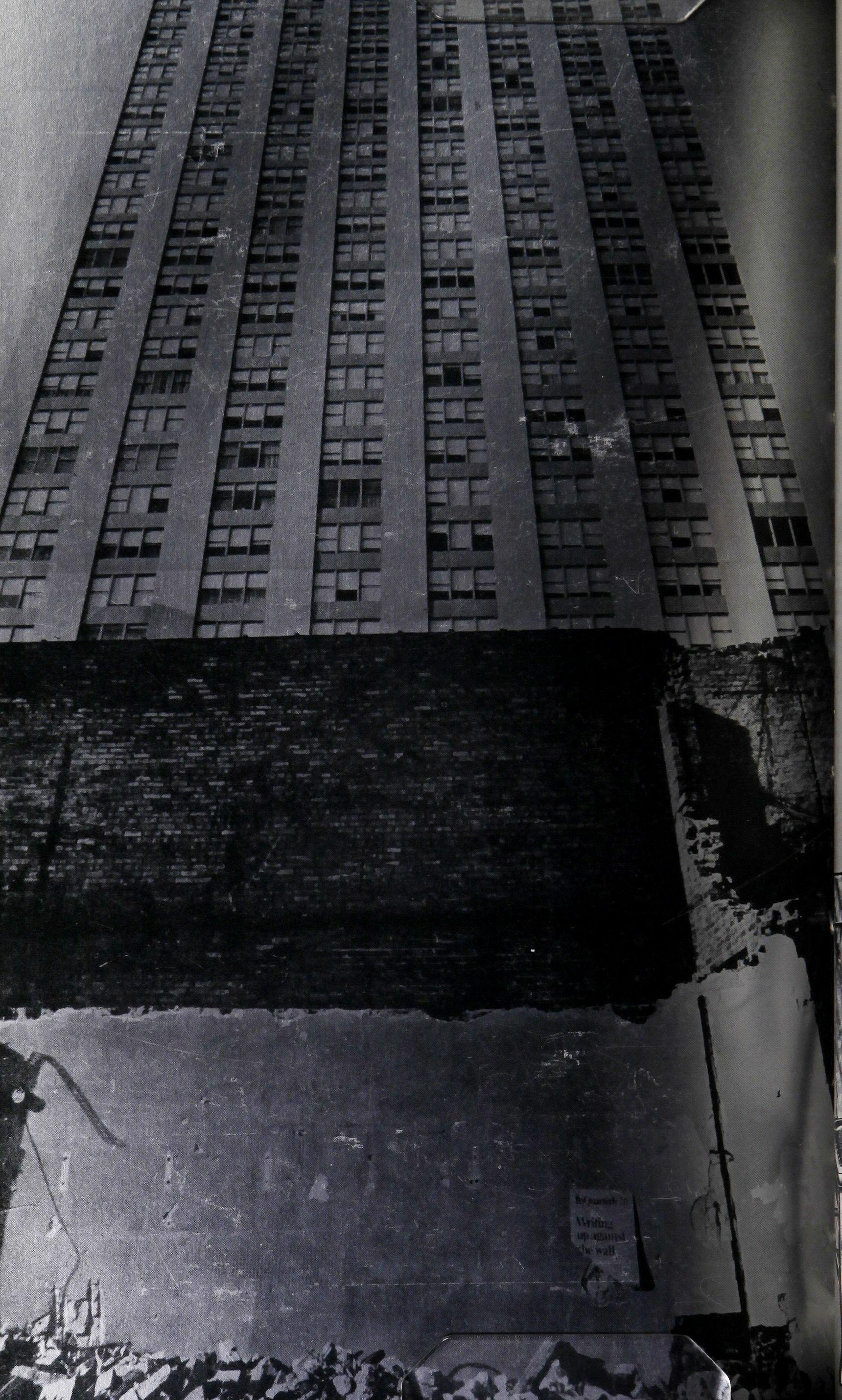













 translated by Richard Howard
translated by Richard Howard














































































































































































































 Franz Mon: Abstraktion (1963)
Franz Mon: Abstraktion (1963)





















 Hains and Bryen: Hep(Jrile ectet» (1956)
Franz Mon: Textbild (1961)
Hains and Bryen: Hep(Jrile ectet» (1956)
Franz Mon: Textbild (1961)


 Kriwet: Grosses Textdia (Great Text-slide), 350x350 em., silksereen on vinyl
Kriwet: Grosses Textdia (Great Text-slide), 350x350 em., silksereen on vinyl








 Kriwet: Rundschelbe Nr. XV; ··HE-DON: NICE" (1964)
Kriwet: Rundschelbe Nr. XV; ··HE-DON: NICE" (1964)






 Kriwet: Von teehts mach liuks, silkscreen on vinyl
Kriwet: Von teehts mach liuks, silkscreen on vinyl













































































































































































 by E. M Cioran
by E. M Cioran

 Wayne C. Booth
Wayne C. Booth




